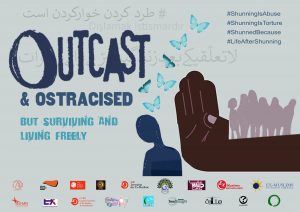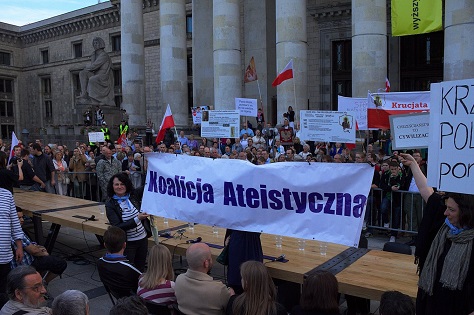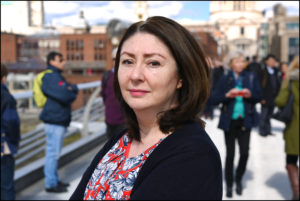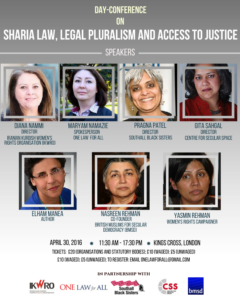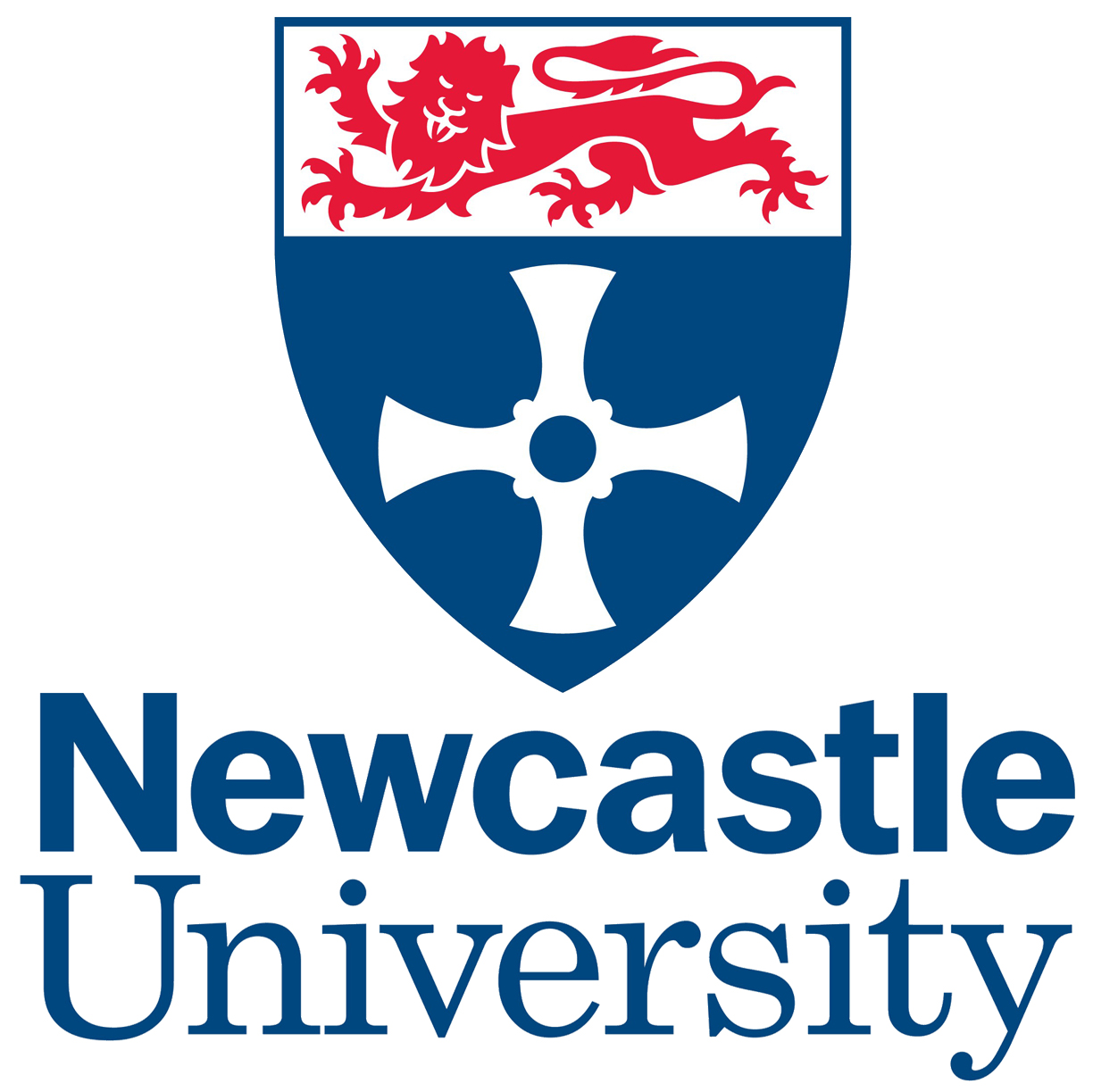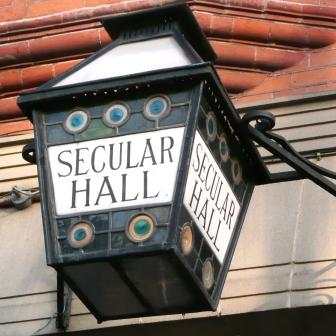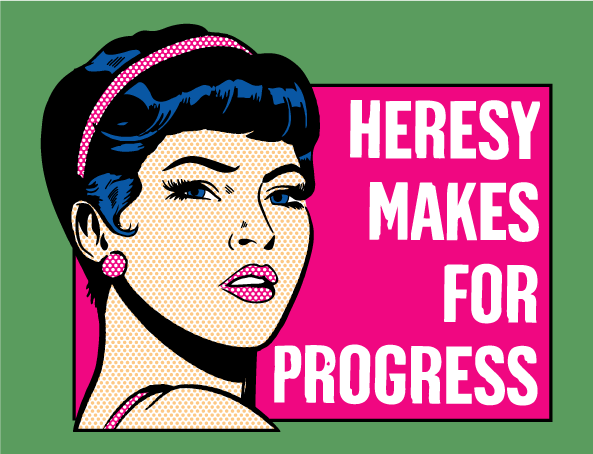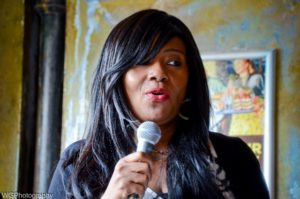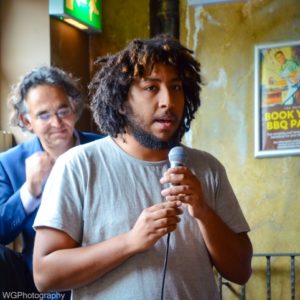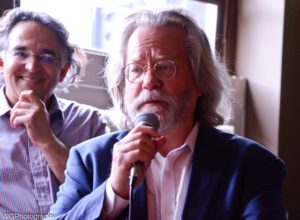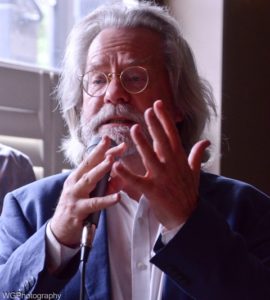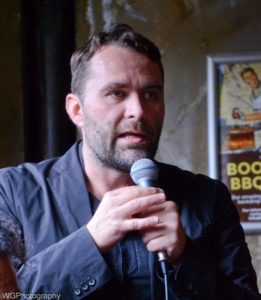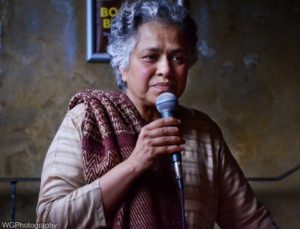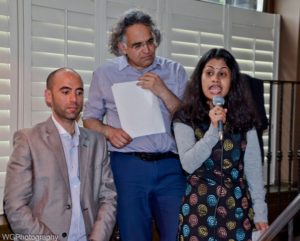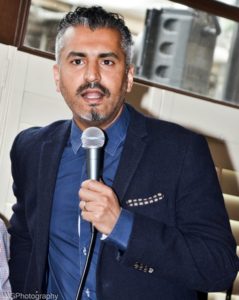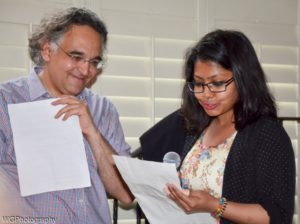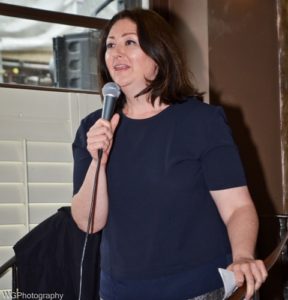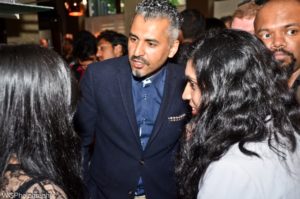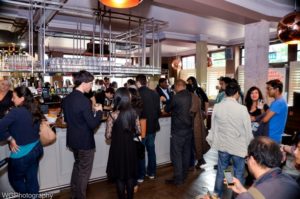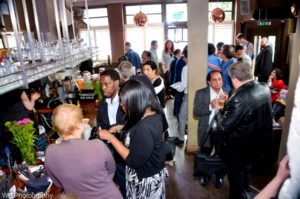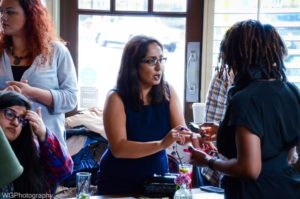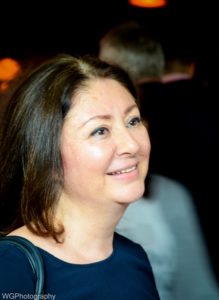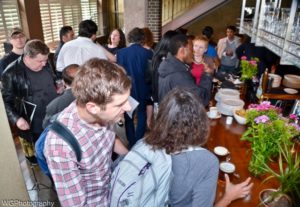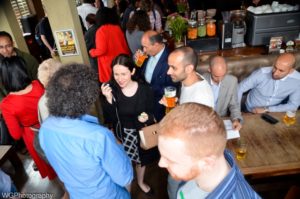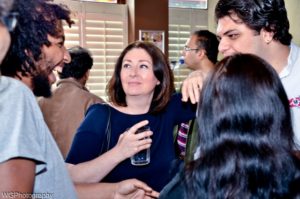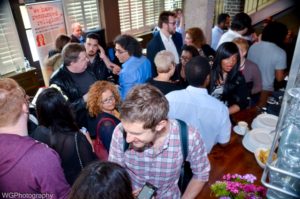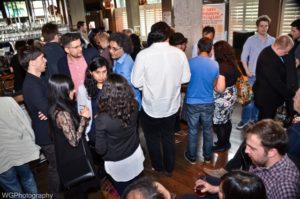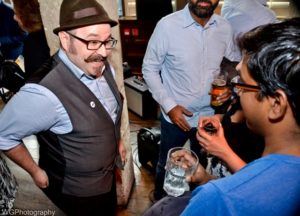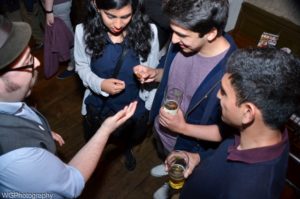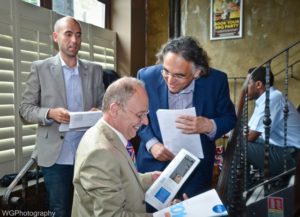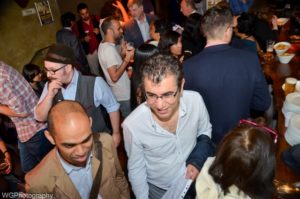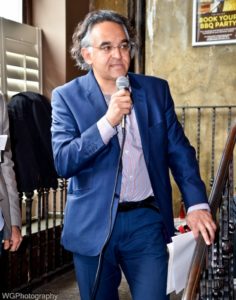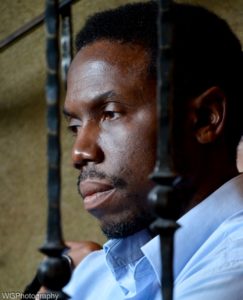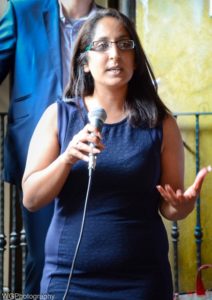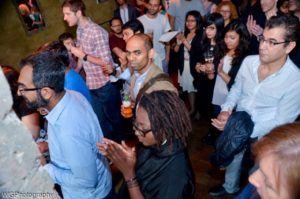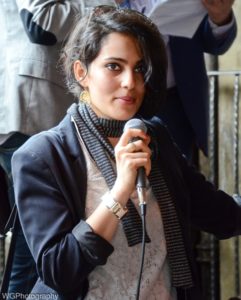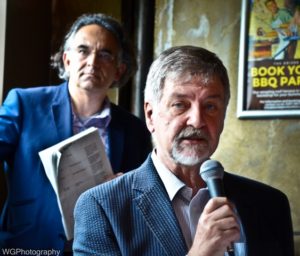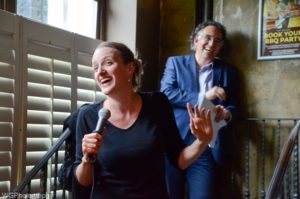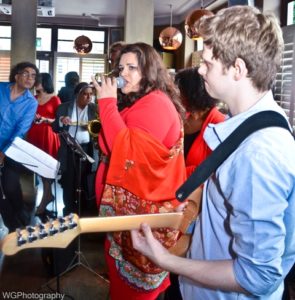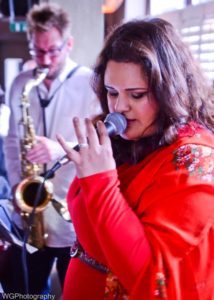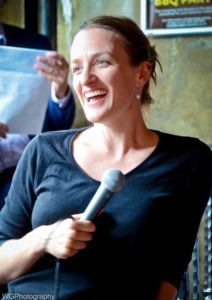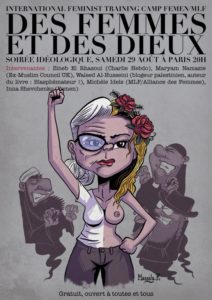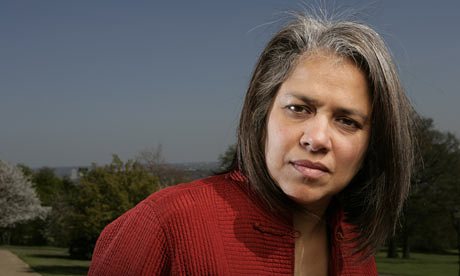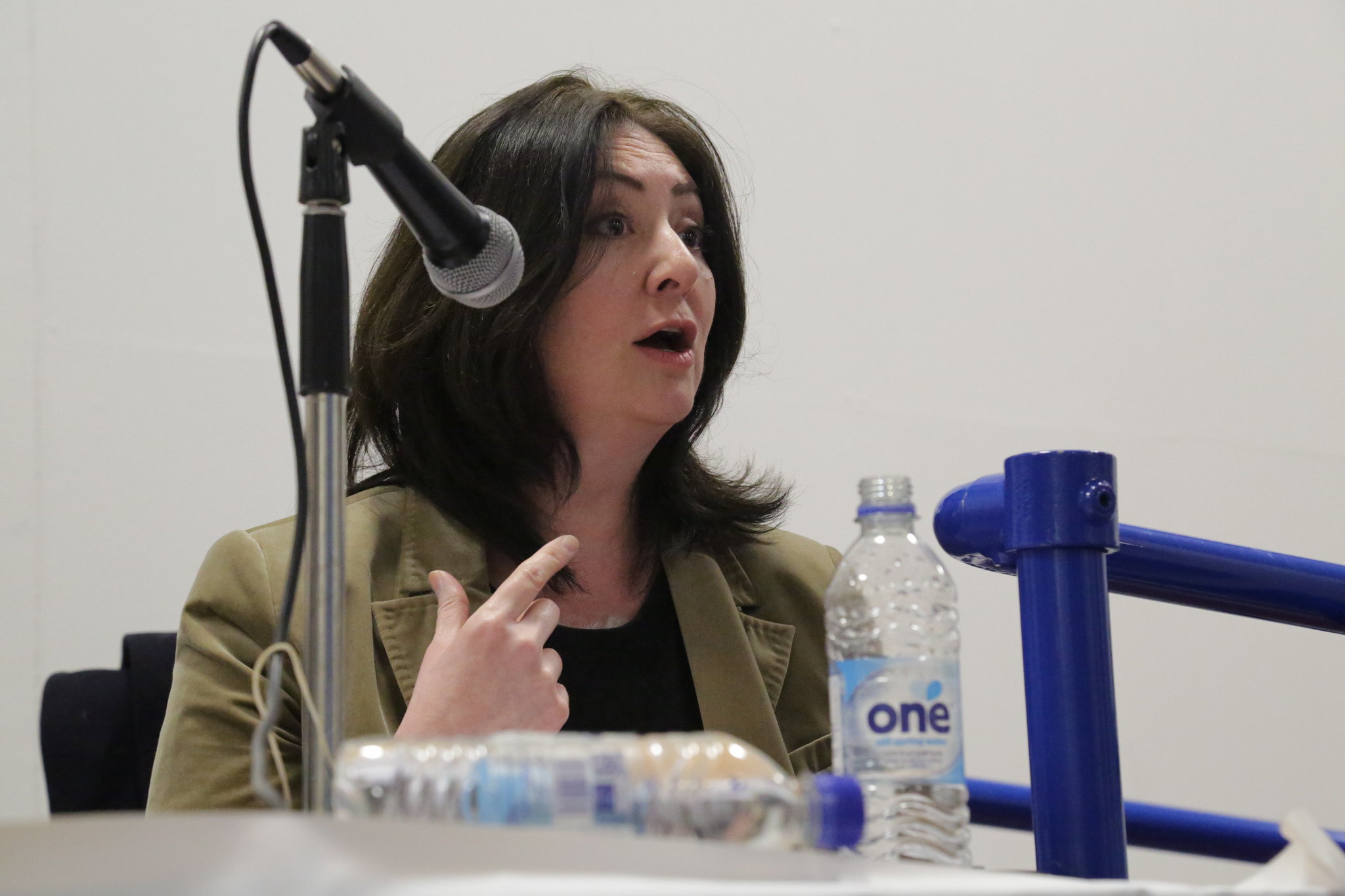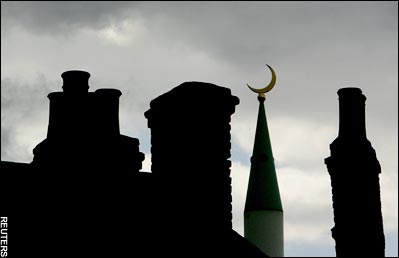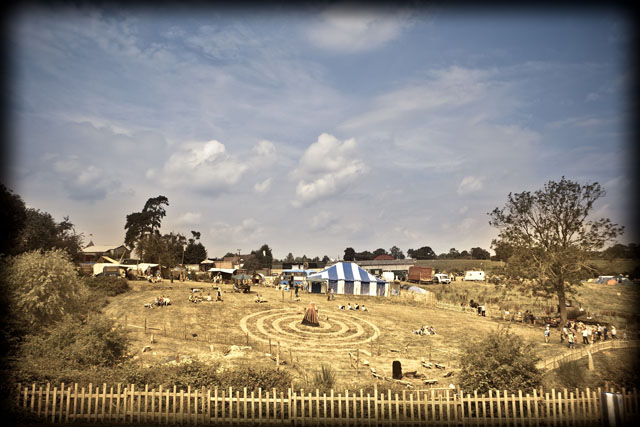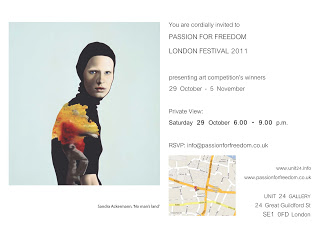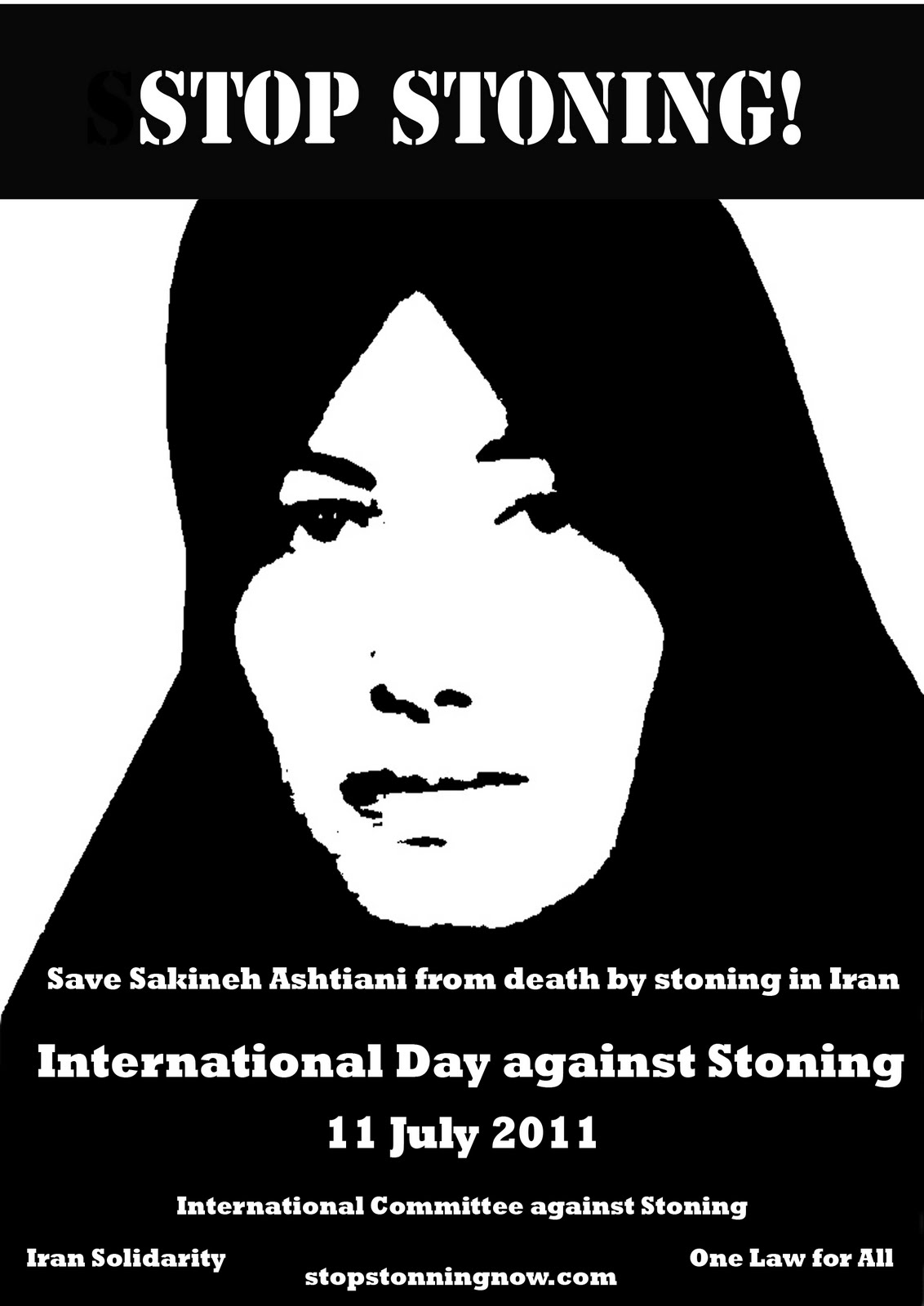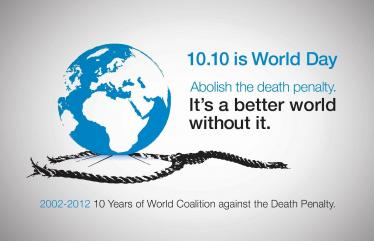Here’s a list of all previous events held by the CEMB in the past years, please feel free to contact us, should you have any questions.
Past Events
january 2024
2024mon22jan7:00 pmmon8:00 pmMonthly Meet-up: January Social with Ali Malik7:00 pm - 8:00 pm
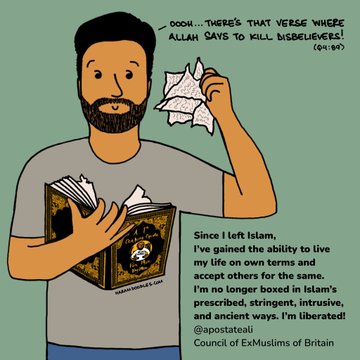
Event Details
Monthly Meetups are held on the third Tuesday of every month, 7.00-8.00 pm UK time in central London. Meetups are run by Ali Malik. RSVP with ali.malik@council-of-ex-muslims-of-britain-e5a565.ingress-baronn.ewp.live for location details.
Event Details
Monthly Meetups are held on the third Tuesday of every month, 7.00-8.00 pm UK time in central London. Meetups are run by Ali Malik.
RSVP with ali.malik@council-of-ex-muslims-of-britain-e5a565.ingress-baronn.ewp.live for location details.
Time
(Monday) 7:00 pm - 8:00 pm
2024mon15jan6:30 pmmon8:00 pmOnline Women's Support Group Session6:30 pm - 8:00 pm















































































































Event Details
Join monthly support groups to talk about issues that affect ex-Muslims. CEMB currently has two 90-minute online sessions on the first Monday and Wednesday of every month, 6.30-8.00pm UK time. There
Event Details
Join monthly support groups to talk about issues that affect ex-Muslims.
CEMB currently has two 90-minute online sessions on the first Monday and Wednesday of every month, 6.30-8.00pm UK time. There is also a woman’s support group on the second Monday of every month. The sessions are led by Counselling Psychologist Dr SAVIN BAPIR-TARDY.
If you have never attended a session before, please email hello@council-of-ex-muslims-of-britain-e5a565.ingress-baronn.ewp.live.
Time
(Monday) 6:30 pm - 8:00 pm
2024wed10jan6:30 pmwed8:00 pmOnline Support Group Session6:30 pm - 8:00 pm















































































































Event Details
Join monthly support groups to talk about issues that affect ex-Muslims. CEMB currently has two 90-minute online sessions on the first Monday and Wednesday of every month, 6.30-8.00pm UK time. There
Event Details
Join monthly support groups to talk about issues that affect ex-Muslims.
CEMB currently has two 90-minute online sessions on the first Monday and Wednesday of every month, 6.30-8.00pm UK time. There is also a woman’s support group on the second Monday of every month. The sessions are led by Counselling Psychologist Dr SAVIN BAPIR-TARDY.
If you have never attended a session before, please email hello@council-of-ex-muslims-of-britain-e5a565.ingress-baronn.ewp.live.
Time
(Wednesday) 6:30 pm - 8:00 pm
2024mon08jan6:30 pmmon8:00 pmOnline Support Group Session6:30 pm - 8:00 pm















































































































Event Details
Join monthly support groups to talk about issues that affect ex-Muslims. CEMB currently has two 90-minute online sessions on the first Monday and Wednesday of every month, 6.30-8.00pm UK time. There
Event Details
Join monthly support groups to talk about issues that affect ex-Muslims.
CEMB currently has two 90-minute online sessions on the first Monday and Wednesday of every month, 6.30-8.00pm UK time. There is also a woman’s support group on the second Monday of every month. The sessions are led by Counselling Psychologist Dr SAVIN BAPIR-TARDY.
If you have never attended a session before, please email hello@council-of-ex-muslims-of-britain-e5a565.ingress-baronn.ewp.live.
Time
(Monday) 6:30 pm - 8:00 pm
february 2024











Event Details
Monthly Meetup in London Monthly Meetups are
Event Details
Monthly Meetup in London
Monthly Meetups are held on the third Monday of every month, 7-8pm UK time in central London. Meetups are run by Ali Malik.
RSVP with ali.malik@council-of-ex-muslims-of-britain-e5a565.ingress-baronn.ewp.live to book your attendance.
Victoria Gugenheim is an award-winning body painter, artist, and make-up artist, Victoria is also the resident artist for CEMB.
Drawing before she could talk, starting makeup at age 6, progressing to face and bodypainting at 9, Victoria Gugenheim has always had an intense drive to create. Deeply studious and compulsively curious, it is this intense need to understand the world around us that fuels her desire to create beautiful works that provoke a reaction, and make people think. Her drive is to understand why we do what we do, and how we can become more than we are.
Through her questioning of the world and her research into art and our origins, she has become passionate about the necessity of, and merges, art with science. She believes art and science share a common ancestor with the human imagination, and without imagination there can be no hypothesising. Art is the first visual, material, tangible “What if?” that humanity had, and it started 300,000 years ago deep in the caves near the twin Zambini Rivers of Zimbabwe. There, Homo Heildelbergenesis created the first known art; art on the human body. This was used for rituals, accessing altered states of consciousness, tribal hierarchies, and more besides. The key was its immediate, visceral effect that had the capacity to transform our ancestors into greater versions of themselves. After learning of this, she was hooked on bodypainting and makeup for good.
Victoria’s art, both mainstream and alternative, has been part of a lifelong quest of both adorning and “de-othering” people through art, public speaking and personal aesthetic choice, and understands that when someone others another human being, it dehumanizes them, objectifies them and makes them a target for everything, from stereotyping at best to at worst, victims of violence, poverty and death; This is most oftentimes caused by fear born of ignorance. Through connecting art, science, visual representations of the self, human rights activism and questioning what we can become both aesthetically and intellectually, Victoria has carved a niche that no other artist to date has dared step into.
Fully committed to living her art, Victoria is not afraid of standing out in the crowd, and encourages others to raise their voices and be heard in a world which cherishes the average over the individual. She believes that only with the realisation of yourself and a willingness to connect with others without othering them, can humanity progress.
Her art ranges from bodypainting, makeup, photography, performances, installations, digital art, clothing design, drawing and painting, merging with science and technology. Never wanting to be limited, she sought out any media necessary to make a concept work- and it is this industriousness that has helped bring her her current success.
Her clients have included Cirque le Soir, Nokia, London Fashion Week, Models of Diversity, Charlotte Church, Alice Cooper’s Halloween Night of Fear, Girls Roc and The World Bodypainting Festival among many others, as well as private commissions that are undertaken with great care, attention to detail and patience. She uses bodypainting as a way of empowering the human spirit, giving the person painted a new found confidence that can be life changing.
more
Time
(Monday) 7:00 pm - 8:00 pm
2024mon12feb6:30 pmmon8:00 pmOnline Women's Support Group Session6:30 pm - 8:00 pm















































































































Event Details
Join monthly support groups to talk about issues that affect ex-Muslims. CEMB currently has two 90-minute online sessions on the first Monday and Wednesday of every month, 6.30-8.00pm UK time. There
Event Details
Join monthly support groups to talk about issues that affect ex-Muslims.
CEMB currently has two 90-minute online sessions on the first Monday and Wednesday of every month, 6.30-8.00pm UK time. There is also a woman’s support group on the second Monday of every month. The sessions are led by Counselling Psychologist Dr SAVIN BAPIR-TARDY.
If you have never attended a session before, please email hello@council-of-ex-muslims-of-britain-e5a565.ingress-baronn.ewp.live.
Time
(Monday) 6:30 pm - 8:00 pm
2024wed07feb6:30 pmwed8:00 pmOnline Support Group Session6:30 pm - 8:00 pm















































































































Event Details
Join monthly support groups to talk about issues that affect ex-Muslims. CEMB currently has two 90-minute online sessions on the first Monday and Wednesday of every month, 6.30-8.00pm UK time. There
Event Details
Join monthly support groups to talk about issues that affect ex-Muslims.
CEMB currently has two 90-minute online sessions on the first Monday and Wednesday of every month, 6.30-8.00pm UK time. There is also a woman’s support group on the second Monday of every month. The sessions are led by Counselling Psychologist Dr SAVIN BAPIR-TARDY.
If you have never attended a session before, please email hello@council-of-ex-muslims-of-britain-e5a565.ingress-baronn.ewp.live.
Time
(Wednesday) 6:30 pm - 8:00 pm
2024mon05feb6:30 pmmon8:00 pmOnline Support Group Session6:30 pm - 8:00 pm















































































































Event Details
Join monthly support groups to talk about issues that affect ex-Muslims. CEMB currently has two 90-minute online sessions on the first Monday and Wednesday of every month, 6.30-8.00pm UK time. There
Event Details
Join monthly support groups to talk about issues that affect ex-Muslims.
CEMB currently has two 90-minute online sessions on the first Monday and Wednesday of every month, 6.30-8.00pm UK time. There is also a woman’s support group on the second Monday of every month. The sessions are led by Counselling Psychologist Dr SAVIN BAPIR-TARDY.
If you have never attended a session before, please email hello@council-of-ex-muslims-of-britain-e5a565.ingress-baronn.ewp.live.
Time
(Monday) 6:30 pm - 8:00 pm
march 2024
2024sat23marAll Day23 March, #AtheistDayRUMadan(All Day: saturday)
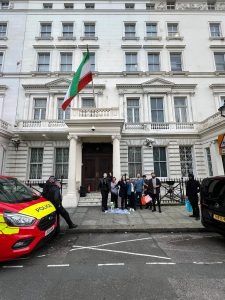

Event Details
23 March, #AtheistDayRUMadan On Atheist Day, 23 March, take a shot of Rum for atheists and ex-Muslims across the globe. Since it’s Ramadan, we will use the hashtag #AtheistDayRUMadan. Post your
Event Details
23 March, #AtheistDayRUMadan
On Atheist Day, 23 March, take a shot of Rum for atheists and ex-Muslims across the globe. Since it’s Ramadan, we will use the hashtag #AtheistDayRUMadan. Post your video or photo online using the hashtag and tag CEMB. Cheers.
Time
All Day (Saturday)
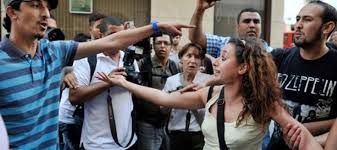










Event Details
Monthly Meetup in London Monthly Meetups are
Event Details
Monthly Meetup in London
Monthly Meetups are held on the third Monday of every month, 7-8pm UK time in central London. Meetups are run by Ali Malik.
RSVP with ali.malik@ex-muslim.org.uk to book your attendance.
Ibtissame Betty Lachgar is Moroccan. She is a clinical psychologist specialised in Criminology and Victimology, in the fight against sexist and sexual violence. In 2009, she founded the Alternative Movement for Individual Liberties (M.A.L.I.) in Morocco. As a result of her activism, she has been the target of harassment, intimidation and threats, as well as arbitrary arrests and prosecution.
more
Time
(Monday) 7:00 pm - 8:00 pm
2024mon18mar4:00 pmmon6:00 pmFast-Defying Picnic for Ramadan4:00 pm - 6:00 pm
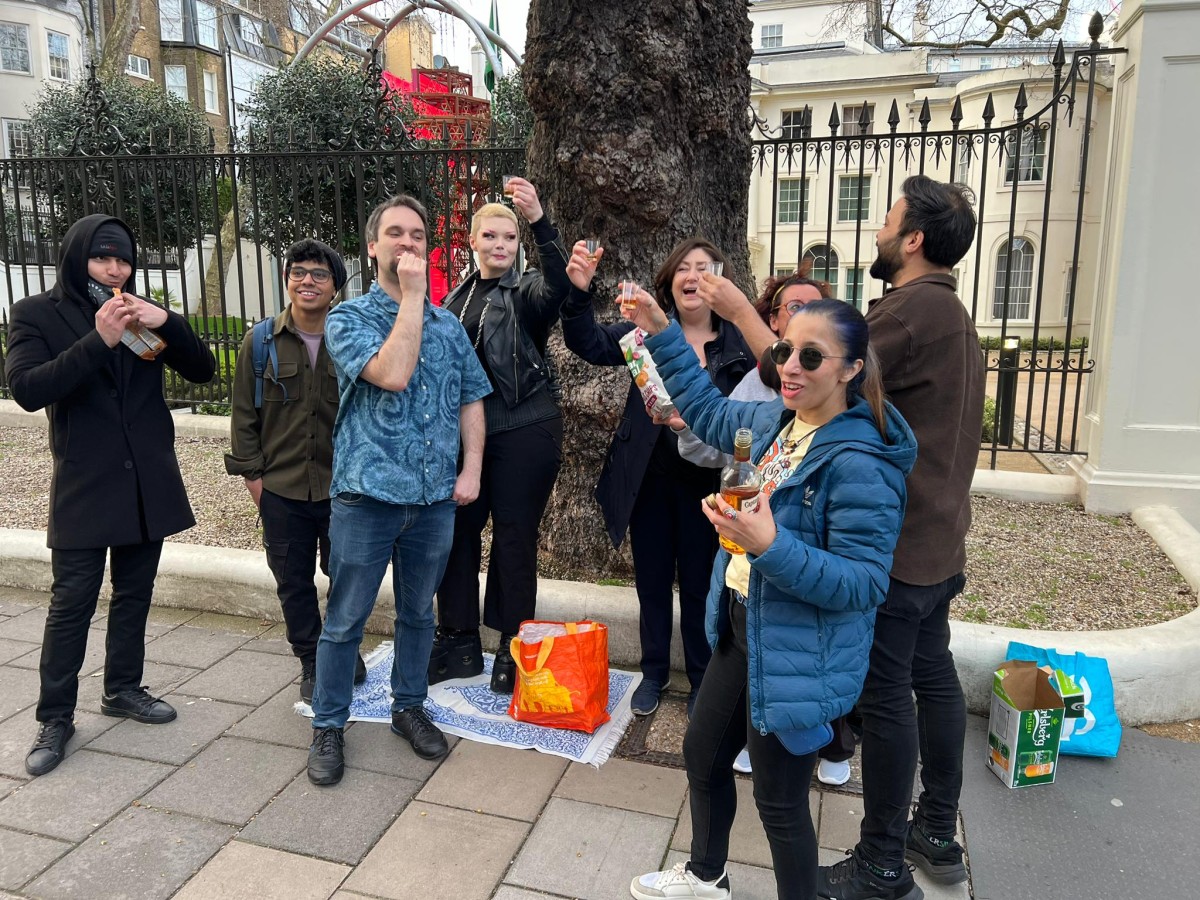

Event Details
CEMB is organising a picnic at embassies that persecute those who refuse to fast during Ramadan on 18 March at 4pm. The picnic will be followed by a Meet-Up in
Event Details
CEMB is organising a picnic at embassies that persecute those who refuse to fast during Ramadan on 18 March at 4pm. The picnic will be followed by a Meet-Up in Central London with Betty Ibtissame Lachgar, the founder of Alternative Movement for Individual Liberties (M.A.L.I.) in Morocco. She will speak of their fast-defying actions in Morocco. To join picnic at embassies including of Iran, Morocco, Pakistan and Saudi Arabia and meet-up, please contact Ali Malik at ali.malik@ex-muslim.org.uk.
more
Time
(Monday) 4:00 pm - 6:00 pm
2024mon11mar6:30 pmmon8:00 pmOnline Women's Support Group Session6:30 pm - 8:00 pm















































































































Event Details
Join monthly support groups to talk about issues that affect ex-Muslims. CEMB currently has two 90-minute online sessions on the first Monday and Wednesday of every month, 6.30-8.00pm UK time. There
Event Details
Join monthly support groups to talk about issues that affect ex-Muslims.
CEMB currently has two 90-minute online sessions on the first Monday and Wednesday of every month, 6.30-8.00pm UK time. There is also a woman’s support group on the second Monday of every month. The sessions are led by Counselling Psychologist Dr SAVIN BAPIR-TARDY.
If you have never attended a session before, please email hello@council-of-ex-muslims-of-britain-e5a565.ingress-baronn.ewp.live.
Time
(Monday) 6:30 pm - 8:00 pm
2024wed06mar6:30 pmwed8:00 pmOnline Support Group Session6:30 pm - 8:00 pm















































































































Event Details
Join monthly support groups to talk about issues that affect ex-Muslims. CEMB currently has two 90-minute online sessions on the first Monday and Wednesday of every month, 6.30-8.00pm UK time. There
Event Details
Join monthly support groups to talk about issues that affect ex-Muslims.
CEMB currently has two 90-minute online sessions on the first Monday and Wednesday of every month, 6.30-8.00pm UK time. There is also a woman’s support group on the second Monday of every month. The sessions are led by Counselling Psychologist Dr SAVIN BAPIR-TARDY.
If you have never attended a session before, please email hello@council-of-ex-muslims-of-britain-e5a565.ingress-baronn.ewp.live.
Time
(Wednesday) 6:30 pm - 8:00 pm
2024mon04mar6:30 pmmon8:00 pmOnline Support Group Session6:30 pm - 8:00 pm















































































































Event Details
Join monthly support groups to talk about issues that affect ex-Muslims. CEMB currently has two 90-minute online sessions on the first Monday and Wednesday of every month, 6.30-8.00pm UK time. There
Event Details
Join monthly support groups to talk about issues that affect ex-Muslims.
CEMB currently has two 90-minute online sessions on the first Monday and Wednesday of every month, 6.30-8.00pm UK time. There is also a woman’s support group on the second Monday of every month. The sessions are led by Counselling Psychologist Dr SAVIN BAPIR-TARDY.
If you have never attended a session before, please email hello@council-of-ex-muslims-of-britain-e5a565.ingress-baronn.ewp.live.
Time
(Monday) 6:30 pm - 8:00 pm
april 2024
2024fri26aprAll Daysun28Spring of Reason and Exuberance Conference(All Day)
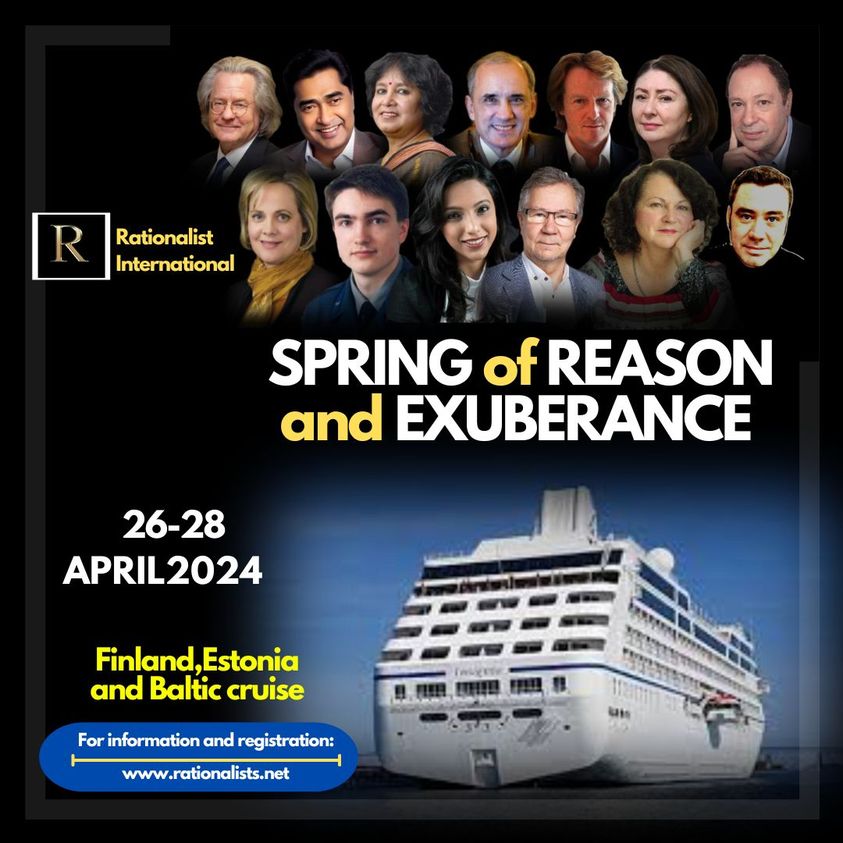

Event Details
26-28 April 2024, Finland, Estonia, and Baltic Sea Rationalist International Spring of Reason and Exuberance Conference Confirmed Speakers: Dan Barker (USA), Robert Brotherus (Finland), Sanal Edamaruku (India-Finland), AC Grayling (UK),
Event Details
26-28 April 2024, Finland, Estonia, and Baltic Sea
Rationalist International Spring of Reason and Exuberance Conference
Confirmed Speakers: Dan Barker (USA), Robert Brotherus (Finland), Sanal Edamaruku (India-Finland), AC Grayling (UK), Zara Kay (Tanzania-Sweden), Annie Laurie (USA), Stephen Law (UK), Maryam Namazie (Iran-UK), Taslima Nasrin (Bangladesh-India), David Orenstein (USA), Nina Sankari (Poland), Michael Sherlock (Australia), Esa Ylikoski (Finland). More information.
Time
april 26 (Friday) - 28 (Sunday)
2024mon15apr7:00 pmmon8:00 pmMonthly social in London with Ali Malik7:00 pm - 8:00 pm














Event Details
Monthly Meetups are held on the third Monday of every month, 7-8pm UK time in central London. Meetups
Event Details
Monthly Meetups are held on the third Monday of every month, 7-8pm UK time in central London. Meetups are run by Ali Malik.
RSVP with ali.malik@ex-muslim.org.uk or https://twitter.com/apostateali to book your attendance.
Time
(Monday) 7:00 pm - 8:00 pm
2024mon08apr6:30 pmmon8:00 pmOnline women's Support Group Session6:30 pm - 8:00 pm















































































































Event Details
Join monthly support groups to talk about issues that affect ex-Muslims. CEMB currently has two 90-minute online sessions on the first Monday and Wednesday of every month, 6.30-8.00pm UK
Event Details
Join monthly support groups to talk about issues that affect ex-Muslims.
CEMB currently has two 90-minute online sessions on the first Monday and Wednesday of every month, 6.30-8.00pm UK time. There is also a woman’s support group on the second Monday of every month. The sessions are led by Counselling Psychologist Dr SAVIN BAPIR-TARDY.
If you have never attended a session before, please email hello@council-of-ex-muslims-of-britain-e5a565.ingress-baronn.ewp.live.
more
Time
(Monday) 6:30 pm - 8:00 pm
2024wed03apr6:30 pmwed8:00 pmOnline Support Group Session6:30 pm - 8:00 pm















































































































Event Details
Join monthly support groups to talk about issues that affect ex-Muslims. CEMB currently has two 90-minute online sessions on the first Monday and Wednesday of every month, 6.30-8.00pm
Event Details
Join monthly support groups to talk about issues that affect ex-Muslims.
CEMB currently has two 90-minute online sessions on the first Monday and Wednesday of every month, 6.30-8.00pm UK time. There is also a woman’s support group on the second Monday of every month. The sessions are led by Counselling Psychologist Dr SAVIN BAPIR-TARDY.
If you have never attended a session before, please email hello@council-of-ex-muslims-of-britain-e5a565.ingress-baronn.ewp.live.
more
Time
(Wednesday) 6:30 pm - 8:00 pm
2024mon01apr6:30 pmmon8:00 pmOnline Support Group Session6:30 pm - 8:00 pm















































































































Event Details
Join monthly support groups to talk about issues that affect ex-Muslims. CEMB currently has two 90-minute online sessions on the first Monday and Wednesday of every month, 6.30-8.00pm UK time. There
Event Details
Join monthly support groups to talk about issues that affect ex-Muslims.
CEMB currently has two 90-minute online sessions on the first Monday and Wednesday of every month, 6.30-8.00pm UK time. There is also a woman’s support group on the second Monday of every month. The sessions are led by Counselling Psychologist Dr SAVIN BAPIR-TARDY.
If you have never attended a session before, please email hello@council-of-ex-muslims-of-britain-e5a565.ingress-baronn.ewp.live.
Time
(Monday) 6:30 pm - 8:00 pm
may 2024
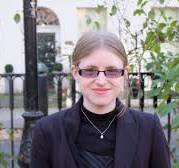










Event Details
Monthly Meetups are held on the third Monday of every month, 7-8pm UK time in central London. Meetups
Event Details
Monthly Meetups are held on the third Monday of every month, 7-8pm UK time in central London. Meetups are run by Ali Malik.
RSVP with ali.malik@ex-muslim.org.uk or https://twitter.com/apostateali to book your attendance.
About the Speaker:
Megan Manson is head of campaigns at the NSS. She previously worked for the Japanese government promoting cultural exchange and language learning. She has long been active in local interfaith initiatives.
more
Time
(Monday) 7:00 pm - 8:00 pm


Event Details
World Award-winning body painter and world-ranking make-up artist, Victoria Gugenheim is a revolutionary pushing the boundaries of her craft, integrating it with fantasy, high fashion, fine art, fact and fortitude with
Event Details
World Award-winning body painter and world-ranking make-up artist, Victoria Gugenheim is a revolutionary pushing the boundaries of her craft, integrating it with fantasy, high fashion, fine art, fact and fortitude with an impeccable track record.
We are very lucky to have Victoria running a body painting workshop as part of the Spring Mayven Festival. In this female only space, Victoria will introduce how to utilise bodypainting as a means of self-expression, working through trauma, embracing personal power and radical autonomy away from the male gaze.
Photos will only be taken with explicit consent given, and women will have a chance to sign up to her new documentary and exhibition project, Painted Powerful: My Body is Mine.
Tickets: £10, £8 concessions or pay what you can. Book here.
Victoria Gugenheim is a world award winning bodypainter and world ranking makeup artist.
She has worked on clients as diverse as Marvel, Charlotte Church, Wintercon, and has been in a number of feature films including James Bond. A woman’s rights and human rights activist, she has also worked for CEMB with Maryam Namazie for the part decade, helping women who have fled oppressive Islamist regimes work with their body as radical protest.
You can follow Victoria on Twitter, Facebook, and Instagram.
more
Time
(Sunday) 4:00 pm - 6:00 pm
2024wed08may6:30 pmwed8:00 pmOnline women's Support Group Session6:30 pm - 8:00 pm















































































































Event Details
Join monthly support groups to talk about issues that affect ex-Muslims. CEMB currently has one 90-minute online session on the first Wednesday of every month, 6.30-8.00pm UK time and
Event Details
Join monthly support groups to talk about issues that affect ex-Muslims.
CEMB currently has one 90-minute online session on the first Wednesday of every month, 6.30-8.00pm UK time and a woman’s support group on the second Wednesday of every month, 6.30-8.00pm UK time. The sessions are led by Counselling Psychologist Dr SAVIN BAPIR-TARDY.
If you have never attended a session before, please email hello@ex-muslim.org.uk.
Time
(Wednesday) 6:30 pm - 8:00 pm
2024wed01may6:30 pmwed8:00 pmOnline Support Group Session6:30 pm - 8:00 pm















































































































Event Details
Join monthly support groups to talk about issues that affect ex-Muslims. CEMB currently has one 90-minute online session on the first Wednesday of every month, 6.30-8.00pm UK time and
Event Details
Join monthly support groups to talk about issues that affect ex-Muslims.
CEMB currently has one 90-minute online session on the first Wednesday of every month, 6.30-8.00pm UK time and a woman’s support group on the second Wednesday of every month, 6.30-8.00pm UK time. The sessions are led by Counselling Psychologist Dr SAVIN BAPIR-TARDY.
If you have never attended a session before, please email hello@ex-muslim.org.uk.
Time
(Wednesday) 6:30 pm - 8:00 pm
june 2024


Event Details
28 June 2024, 730pm, De St Saulge, France Conversation on women’s struggle in Iran Maryam Namazie and Sofia Amara shed light on the inextricable. Maryam Namazie is a rights activist who is
Event Details
28 June 2024, 730pm, De St Saulge, France
Conversation on women’s struggle in Iran
Maryam Namazie and Sofia Amara shed light on the inextricable. Maryam Namazie is a rights activist who is leading the fight of women, in Iran and elsewhere, against Islamic oppression. Sofia Amara is a journalist who has been fighting for information in the Middle East for around thirty years. They will talk about the struggle of women in Iran, prospects for a democratic revolution and its effects in the region.
In a free conversation, Sofia interviewing Maryam, they will answer all these questions or others, for a fascinating talk where we know in advance that we will only be able to understand the world better after having heard them.
more
Time
28 (Friday) 7:30 pm - 30 (Sunday) 9:00 pm














Event Details
Monthly Meetup in London Monthly Meetups are
Event Details
Monthly Meetup in London
Monthly Meetups are held on the third Monday of every month, 7-8pm UK time in central London. Meetups are run by Ali Malik.
Ali Malik with speak about the establishment of Council of Ex-Muslims of Britain and the ex-Muslim movement for the CEMB’s 17th anniversary. RSVP with ali.malik@ex-muslim.org.uk to book your attendance.
more
Time
(Monday) 7:00 pm - 8:00 pm
2024wed12jun6:30 pmwed8:00 pmOnline Women's Support Group Session6:30 pm - 8:00 pm















































































































Event Details
Join monthly support groups to talk about issues that affect ex-Muslims. CEMB currently has one 90-minute online session on the first Wednesday of every month, 6.30-8.00pm UK time and
Event Details
Join monthly support groups to talk about issues that affect ex-Muslims.
CEMB currently has one 90-minute online session on the first Wednesday of every month, 6.30-8.00pm UK time and a woman’s support group on the second Wednesday of every month, 6.30-8.00pm UK time. The sessions are led by Counselling Psychologist Dr SAVIN BAPIR-TARDY.
If you have never attended a session before, please email hello@ex-muslim.org.uk.
Time
(Wednesday) 6:30 pm - 8:00 pm
2024wed05jun6:30 pmwed8:00 pmOnline Support Group Session6:30 pm - 8:00 pm















































































































Event Details
Join monthly support groups to talk about issues that affect ex-Muslims. CEMB currently has one 90-minute online session on the first Wednesday of every month, 6.30-8.00pm UK time and
Event Details
Join monthly support groups to talk about issues that affect ex-Muslims.
CEMB currently has one 90-minute online session on the first Wednesday of every month, 6.30-8.00pm UK time and a woman’s support group on the second Wednesday of every month, 6.30-8.00pm UK time. The sessions are led by Counselling Psychologist Dr SAVIN BAPIR-TARDY.
If you have never attended a session before, please email hello@ex-muslim.org.uk.
Time
(Wednesday) 6:30 pm - 8:00 pm
july 2024
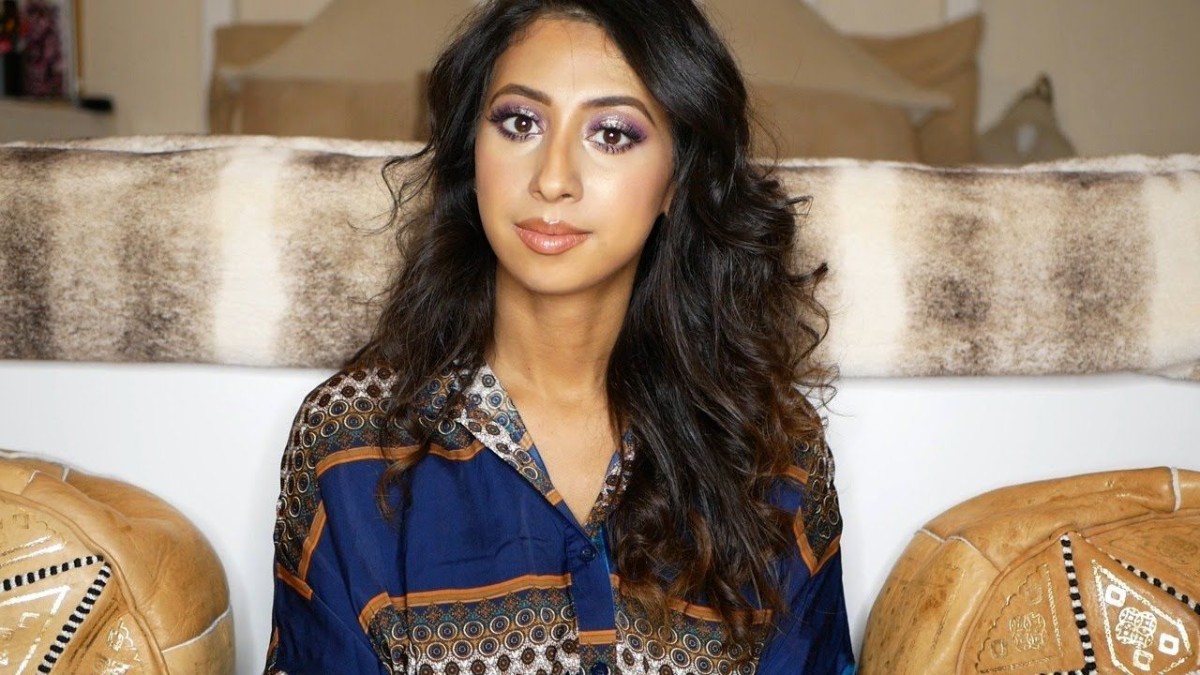










Event Details
Monthly Meetups are held on the third Monday of every month, 7-8pm UK time in central London. Meetups
Event Details
Monthly Meetups are held on the third Monday of every month, 7-8pm UK time in central London. Meetups are run by Ali Malik.
RSVP with ali.malik@ex-muslim.org.uk or https://twitter.com/apostateali to book your attendance.
About the speaker:
Mimzi Vidz is a counsellor, life coach, a YouTuber. Mimzi runs Wain Coaching with her husband Veedu Vidz.
Links:
https://www.waincoaching.com
more
Time
(Monday) 7:00 pm - 8:00 pm
2024wed10jul6:30 pmwed8:00 pmOnline Women's Support Group Session6:30 pm - 8:00 pm















































































































Event Details
Join monthly support groups to talk about issues that affect ex-Muslims. CEMB currently has one 90-minute online session on the first Wednesday of every month, 6.30-8.00pm UK time and
Event Details
Join monthly support groups to talk about issues that affect ex-Muslims.
CEMB currently has one 90-minute online session on the first Wednesday of every month, 6.30-8.00pm UK time and a woman’s support group on the second Wednesday of every month, 6.30-8.00pm UK time. The sessions are led by Counselling Psychologist Dr SAVIN BAPIR-TARDY.
If you have never attended a session before, please email hello@ex-muslim.org.uk.
Time
(Wednesday) 6:30 pm - 8:00 pm
2024wed03jul6:30 pmwed8:00 pmOnline Support Group Session6:30 pm - 8:00 pm















































































































Event Details
Join monthly support groups to talk about issues that affect ex-Muslims. CEMB currently has one 90-minute online session on the first Wednesday of every month, 6.30-8.00pm UK time and
Event Details
Join monthly support groups to talk about issues that affect ex-Muslims.
CEMB currently has one 90-minute online session on the first Wednesday of every month, 6.30-8.00pm UK time and a woman’s support group on the second Wednesday of every month, 6.30-8.00pm UK time. The sessions are led by Counselling Psychologist Dr SAVIN BAPIR-TARDY.
If you have never attended a session before, please email hello@ex-muslim.org.uk.
Time
(Wednesday) 6:30 pm - 8:00 pm
january 2023
2023mon09jan6:30 pmmon8:00 pmOnline Support Group Session6:30 pm - 8:00 pm















































































































Event Details
Join monthly support groups to talk about issues that affect ex-Muslims. CEMB currently has two 90-minute online sessions on the first Monday and Tuesday of every month, 6.30-8.00pm UK time. The
Event Details
Join monthly support groups to talk about issues that affect ex-Muslims.
CEMB currently has two 90-minute online sessions on the first Monday and Tuesday of every month, 6.30-8.00pm UK time. The sessions are led by Counselling Psychologist Dr SAVIN BAPIR-TARDY.
In January, due to bank holiday, the sessions will take place 9 and 10 January.
If you have never attended a session before, please email hello@council-of-ex-muslims-of-britain-e5a565.ingress-baronn.ewp.live.
Time
(Monday) 6:30 pm - 8:00 pm
2023tue10jan6:30 pmtue8:00 pmOnline Support Group Session6:30 pm - 8:00 pm















































































































Event Details
Join monthly support groups to talk about issues that affect ex-Muslims. CEMB currently has two 90-minute online sessions on the first Monday and Tuesday of every month, 6.30-8.00pm UK time. The
Event Details
Join monthly support groups to talk about issues that affect ex-Muslims.
CEMB currently has two 90-minute online sessions on the first Monday and Tuesday of every month, 6.30-8.00pm UK time. The sessions are led by Counselling Psychologist Dr SAVIN BAPIR-TARDY.
In January, due to bank holiday, the sessions will take place 9 and 10 January.
If you have never attended a session before, please email hello@council-of-ex-muslims-of-britain-e5a565.ingress-baronn.ewp.live.
Time
(Tuesday) 6:30 pm - 8:00 pm
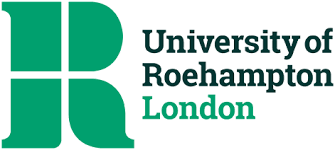


Event Details
18 January 2023, 3:15pm, London – Not taking place due to support for strike action Maryam Namazie’s speaks to a Inclusion, Ethics and Social Justice students at Roehampton University on
Event Details
18 January 2023, 3:15pm, London – Not taking place due to support for strike action
Maryam Namazie’s speaks to a Inclusion, Ethics and Social Justice students at Roehampton University on the women’s revolution in Iran and its links to social justice struggles.
Time
(Wednesday) 3:15 pm - 5:15 pm
2023tue24jan4:00 pmtue5:00 pm#EducationNotExecution4:00 pm - 5:00 pm
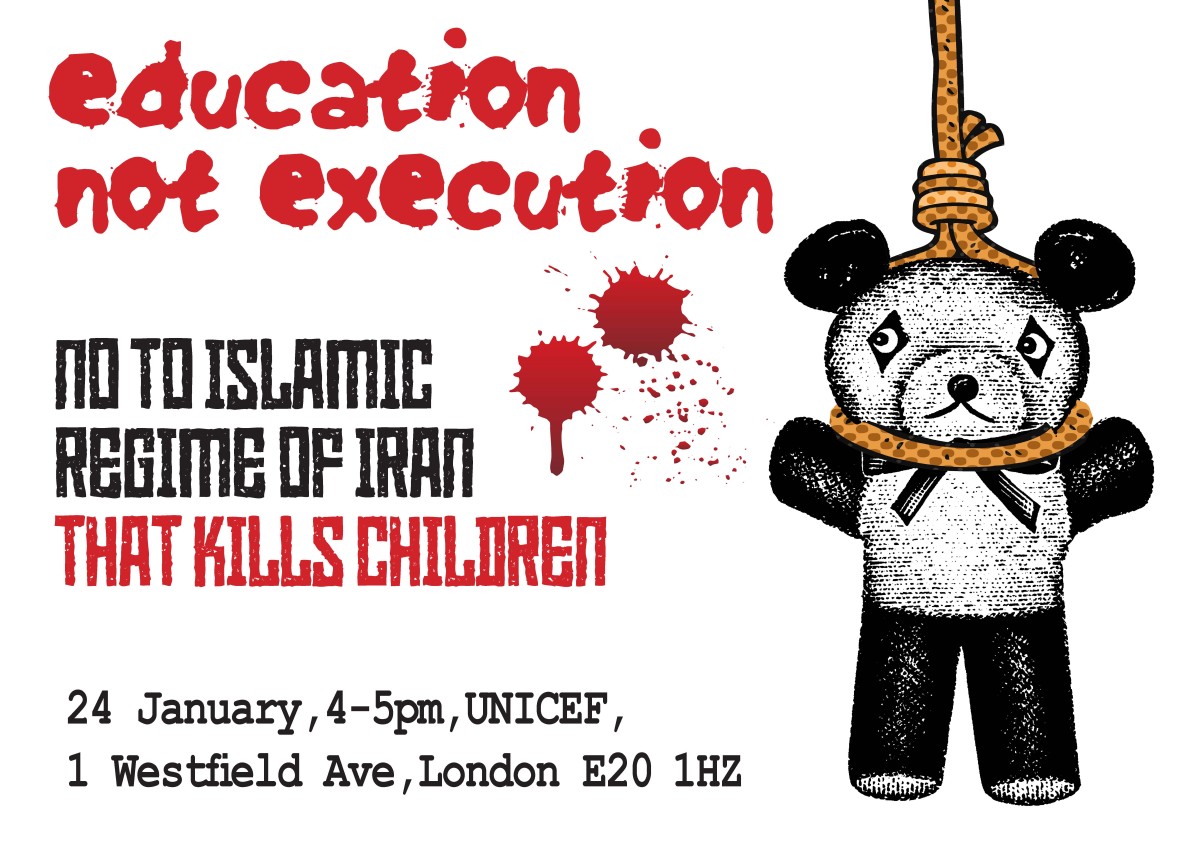

Event Details
24 January protest at UNICEF London against Islamic
Event Details
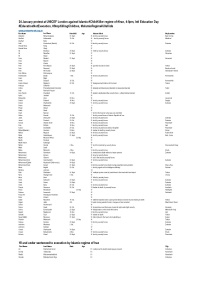

| First Name | Last Name | Date-2022 | Age |
| Abdollah | Mohammadpour | 21 Sept. | 16 |
| Abolfazl | Adinezadeh | 12 Oct. | 16 |
| Abulfazl | Baho | 17 | |
| Adel | Kouchakzai (Barichi) | 28 Oct. | 14 |
| Ahmad Reza | Falaji | 17 | |
| Ahmad Reza | Gholji | 17 | |
| Ali | Barahoui | 30 Sept. | 11 |
| Ali | Mozaffari | 21 Sept. | 17 |
| Ali | Abiyar | 17 | |
| Amin | Marefat | 21 Sept. | 16 |
| Amin | Maarofi | 16 | |
| Amin | Khanlo | 16 | |
| Amir | Farrokhipour | 28 Sept. | 17 |
| Amir | Nowrouzi | 22 Sept. | 16 |
| Amir | Ali Fouladi | 22 Sept. | 16 |
| Amir Mohan | Rahmanipour | 16 | |
| Amirhossein | Basati | 1 Oct. | 15 |
| Aram | Majid | 17 | |
| Armin | Sayyadi | 12 Oct. | 15 |
| Arnika Ghaem | Maghami | 22 Oct. | 17 |
| Arshaya | Soltanleh | 12 | |
| Arshia | Emamgholizadeh Alamdari | 16 | |
| Artin | Rahmani Paryani | 13 | |
| Asra Panahi | Khanghah | 13 Oct. | 15 |
| Ayrez | Javaheri | 15 | |
| Bahaoddin | Veisi | 20 Nov. | 16 |
| Danial | Pabandi | 16 Nov. | 17 |
| Danial | Shahbakhsh | 30 Sept. | 11 |
| Diana | Mahmoudi | 9 | |
| Ehsan | Alibazi | 16 | |
| Hadis | Abadi | 16 | |
| Hasti | Narooei | 7 | |
| Helen | Ahmadi | 12 Oct. | 7 |
| Jaber | Shirouzehi | 30 Sept. | 12 |
| Javad | Pousheh | 30 Oct. | 12 |
| Karvan | Ghader Shikri | 19 Nov. | 16 |
| Kian | Pirfalak | 16 Nov. | 9 |
| Kumar | Daroftadeh | 30 Oct. | 16 |
| Mahak(Maedeh) | Hashemi | 24 Nov. | 16 |
| Mahsa | Mogouei | 22 Sept. | 18 |
| Matin | Abdollahpour | 21 Sept. | 16 |
| Medhi | Moussavi Nikou | 22-Sep | 16 |
| Medhi | Farahani | 17 | |
| Medhi Kandi | Kafshagiri | 15 | |
| Mehdi | Hazrati | 8 Nov. | 17 |
| Milad | Saedi | 16 | |
| Mobin | Mirkazehi | 4 Nov. | 14 |
| Mohammad | Rakhshani | 30 Sept. | 12 |
| Mohammad | Zamani | 16 | |
| Mohammad | Ghaemi | 17 | |
| Mohammad Amin | Gamshadzehi | 30 Sept. | 17 |
| Mohammad Eghbal | Nayebzehi (Shahnavazi) | 30 Sept. | 16 |
| Mohammad Reza | Sarvari | 21 Sept. | 14 |
| Mona | Naghib | 22 Oct. | 8 |
| Morteza | unknown | 14 | |
| Nika | Shakarami | 21 Sept. | 17 |
| Nima | Shafagh Dost | 5 Oct. | 16 |
| Nima | Noori | 17 | |
| Omid | Safarzehi | 30 Sept. | 17 |
| Omid | Sarani | 30 Sept. | 13 |
| Omid | Narui | 28 Oct. | 12 |
| Parmis | Hamnava | 25 Oct. | 14 |
| Parsa | Rezadoust | 23-Sep | 17 |
| Pedram | Azarnoush | 22 Sept. | 16 |
| Pooya Ali | Ahmadpour Pasikhani | 17 | |
| Reza | Kazemi | 16 | |
| Sadaf | Movahedi | 18 Oct. | 17 |
| Sajjad | Jafari | Oct. | 14 |
| Samer | Hashemzehi | 16 | |
| Sarina | Saedi | 26 Oct. | 16 |
| Sarina | Esmailzadeh | 22 Sept. | 16 |
| Sepehr | Maghsoudi | 16 Nov. | 14 |
| Setareh | Tajik | 23 Sept. | 17 |
| Seyed Medhi | Mousavai | 21 Sept. | 16 |
| Siavash | Mahmoudi | 25-Sep | 16 |
| Sodeys | Keshani | 30 Sept. | 14 |
| unknown | Mirshekar | 2 Oct. | 2 |
| unknown | Kebdani | 12 | |
| Yasser | Shahouzehi | 30 Sept. | 16 |
| Yasser | Bahadorzehi | 4 Nov. | 17 |
| Zakaria | Khaial | 20 Sept. | 16 |
| 18 and under sentenced to execution by Islamic regime of Iran | |||
| First Name | Last Name | Date | Age |
| Ali | Rakhshani Azad | 16 | |
| Arshia | Takdastan | 18 | |
| Medhi | Mohammadadifard | 18 | |
| Shoaib | Mirbalochzahi Rigi | 18 | |
more
Time
(Tuesday) 4:00 pm - 5:00 pm



Event Details
25 January 2023, 3:15pm, London Maryam Namazie’s speaks to Inclusion, Ethics and Social Justice students at Roehampton University on the women’s revolution in Iran and its links to social justice
Event Details
25 January 2023, 3:15pm, London
Maryam Namazie’s speaks to Inclusion, Ethics and Social Justice students at Roehampton University on the women’s revolution in Iran and its links to social justice struggles.
Time
(Wednesday) 3:15 pm - 5:15 pm
2023sun29jan2:02 pmsun5:02 pmLondon in solidarity with Woman, Life, Freedom2:02 pm - 5:02 pm
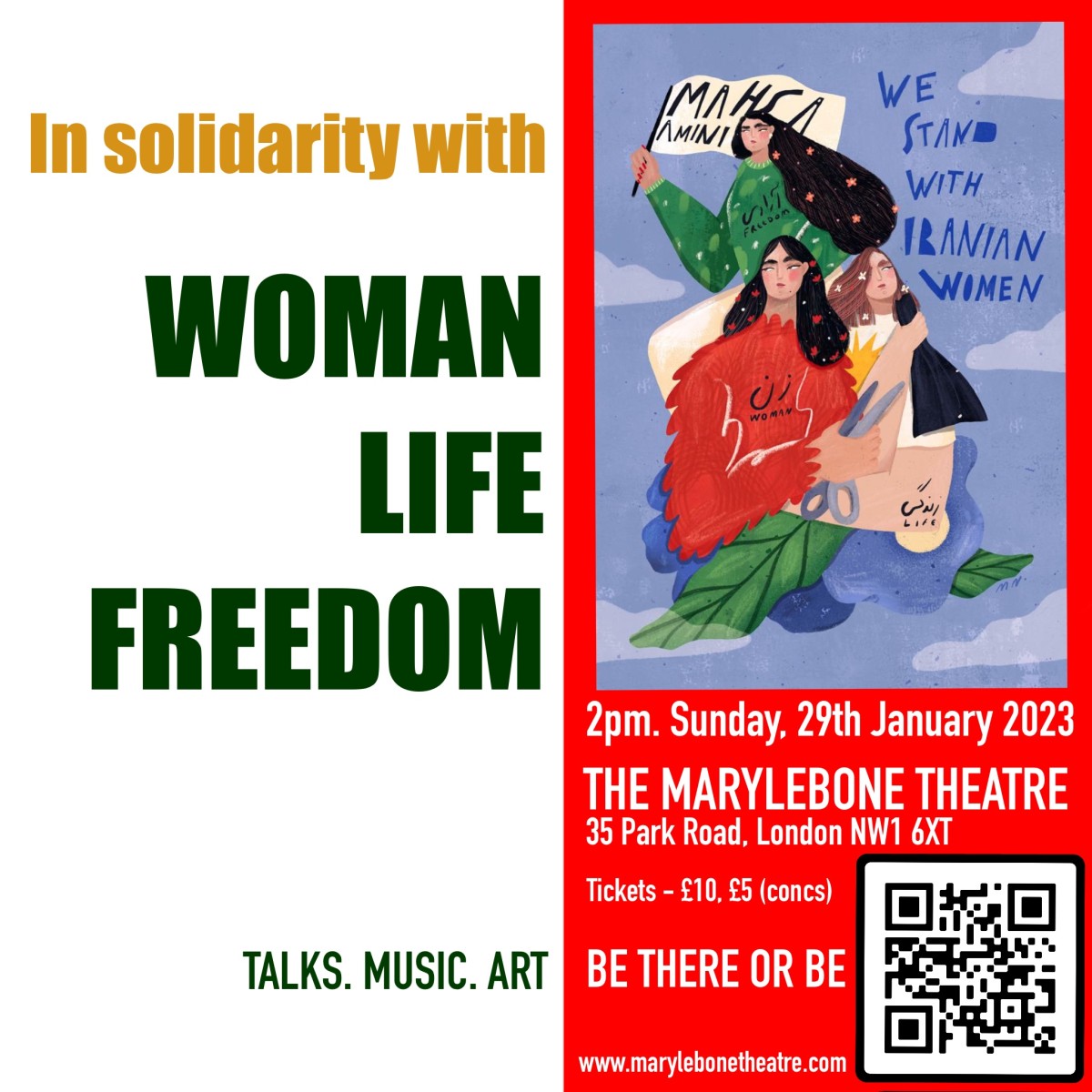

Event Details
29 January 2023, 2pm, London, Marylebone Theatre. Maryam Namazie will speak at London in solidarity with ZAN ZENDEGI AZADI / JIN JIYAN AZADI! An afternoon of talks, music and art.
Event Details
29 January 2023, 2pm, London, Marylebone Theatre.
Maryam Namazie will speak at London in solidarity with ZAN ZENDEGI AZADI / JIN JIYAN AZADI! An afternoon of talks, music and art.
Tickets can be found here.
Time
(Sunday) 2:02 pm - 5:02 pm
february 2023
2023wed01febAll DayBody Riot on World Hijab Day(All Day: wednesday)
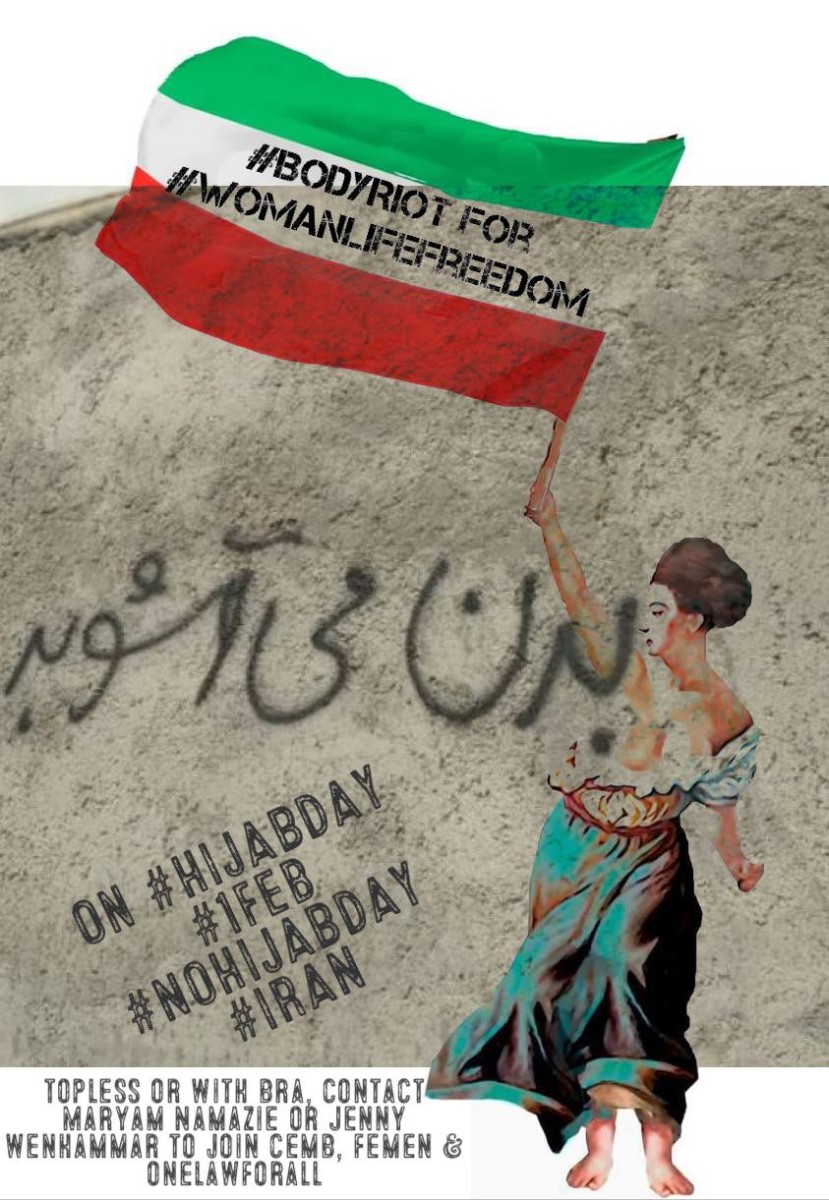

Event Details
#BODYRIOT for #WomanLifeFreedom On #HIJABDAY #1Feb #NOHIJABDAY #IRAN CEMB, FEMEN & One Law For All are calling for a global day of action to bare breasts and bras as a challenge
Event Details
#BODYRIOT for #WomanLifeFreedom
On #HIJABDAY #1Feb
#NOHIJABDAY #IRAN
CEMB, FEMEN & One Law For All are calling for a global day of action to bare breasts and bras as a challenge to Hijab Day and for Woman, Life, Freedom.
Please note that women who would prefer can keep their bras on and/or hide their faces.
Message Jenny Wenhammar or Maryam Namazie to join action.
#بدن_می_آشوبد برای #زن_زندگی_آزادی
در #روز_حجاب
#نه_به_روز_حجاب #ایران
سازمانهای فمن، اکس_مسلم و قانون برابر برای همه فراخوان یک روز جهانی برای سینهها و سوتینهای برهنه به عنوان چالشی علیه روز حجاب و برای زن، زندگی، آزادی داده اند.
لطفاً توجه داشته باشید که زنانی که ترجیح می دهند می توانند سوتین خود را نگه دارند و/یا صورت خود را پنهان کنند.
برای پیوستن به این اعتراض به جنی ونهمار یا مریم نمازی پیام دهید.
Jenny A Wenhammar
Maryam Namazie
Victoria Gugenheim
Council of Ex-Muslims of Britain (CEMB)
FEMEN
One Law for All
more
Time
All Day (Wednesday)
2023sat04feb11:30 amsat1:00 pmWomen's access to education11:30 am - 1:00 pm


Event Details
4 February 2023, London, 11:30-13:00pm Maryam will join “The global history of women’s access to education” panel at UCL Women’s Liberation and WPUK 2023 conference. There is also
Event Details
4 February 2023, London, 11:30-13:00pm
Maryam will join “The global history of women’s access to education” panel at UCL Women’s Liberation and WPUK 2023 conference. There is also a workshop on Rojava and Iran with Maryam Namazie and Rahila Gupta. Tickets are on sale here.
Time
(Saturday) 11:30 am - 1:00 pm
2023sat04feb2:30 pmsat4:00 pmBringing to revolution home: Iran and Rojava2:30 pm - 4:00 pm
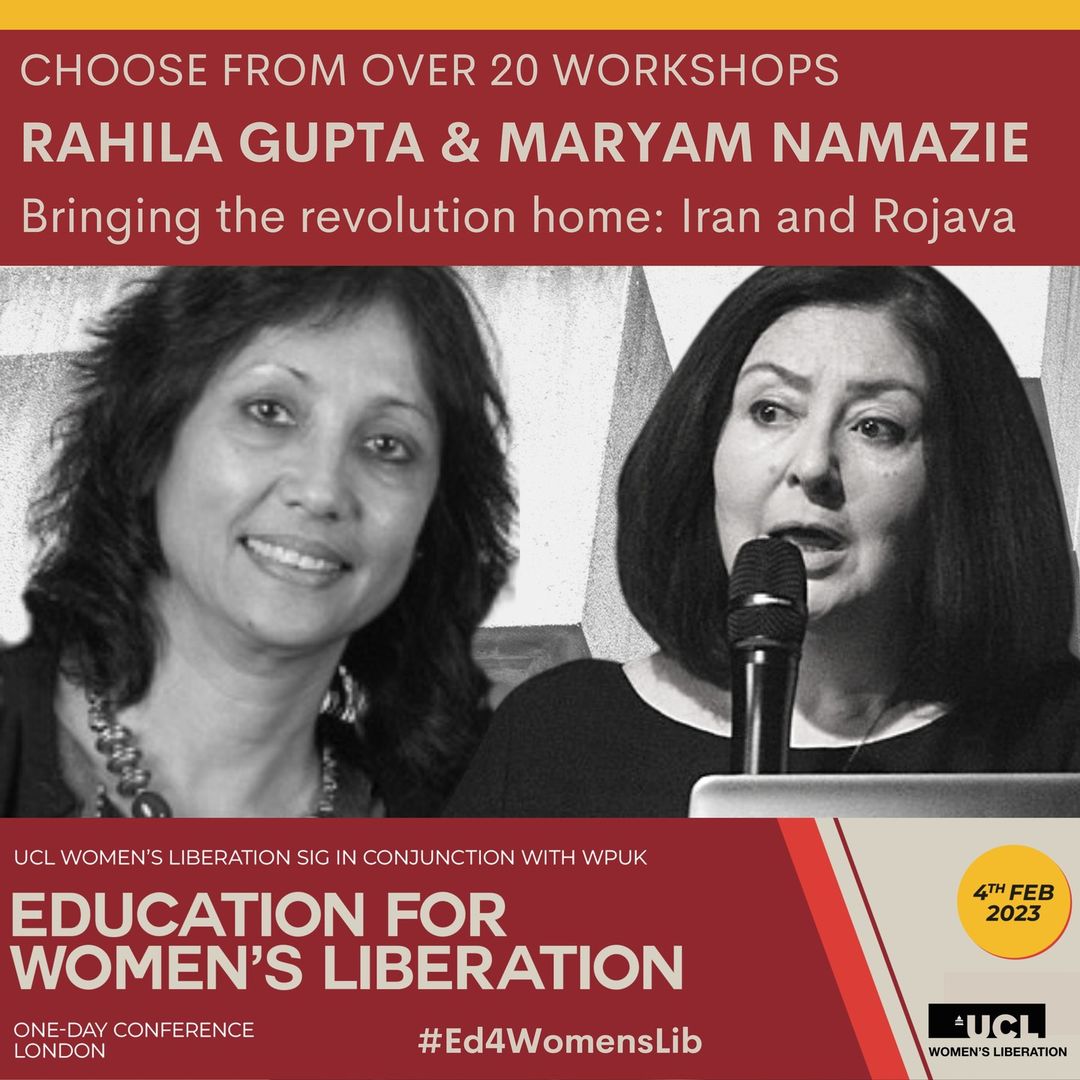

Event Details
WORKSHOP: BRINGING THE REVOLUTION HOME:
Event Details
WORKSHOP: BRINGING THE REVOLUTION HOME: #Iran & #Rojava, 2:30-4:00pm
Interactive workshop led by Rahila Gupta & Maryam Namazie
Woman’s Place Conference
Maryam & Rahila will talk about the revolutions in Iran & Rojava where women are driving the change. The workshop will be full of practical & unexpected ideas on how you can provide solidarity & bridge the political, psychological & geographical distance between you and them.
This is part of a one day feminist conference at The Institute of Education, UCL. Workshops, keynotes, panels, feminist market place, networking & an evening of entertainment.
more
Time
(Saturday) 2:30 pm - 4:00 pm
2023sat04feb5:30 pmsat6:30 pmGlobal Day of action to free Soheil Arabi5:30 pm - 6:30 pm
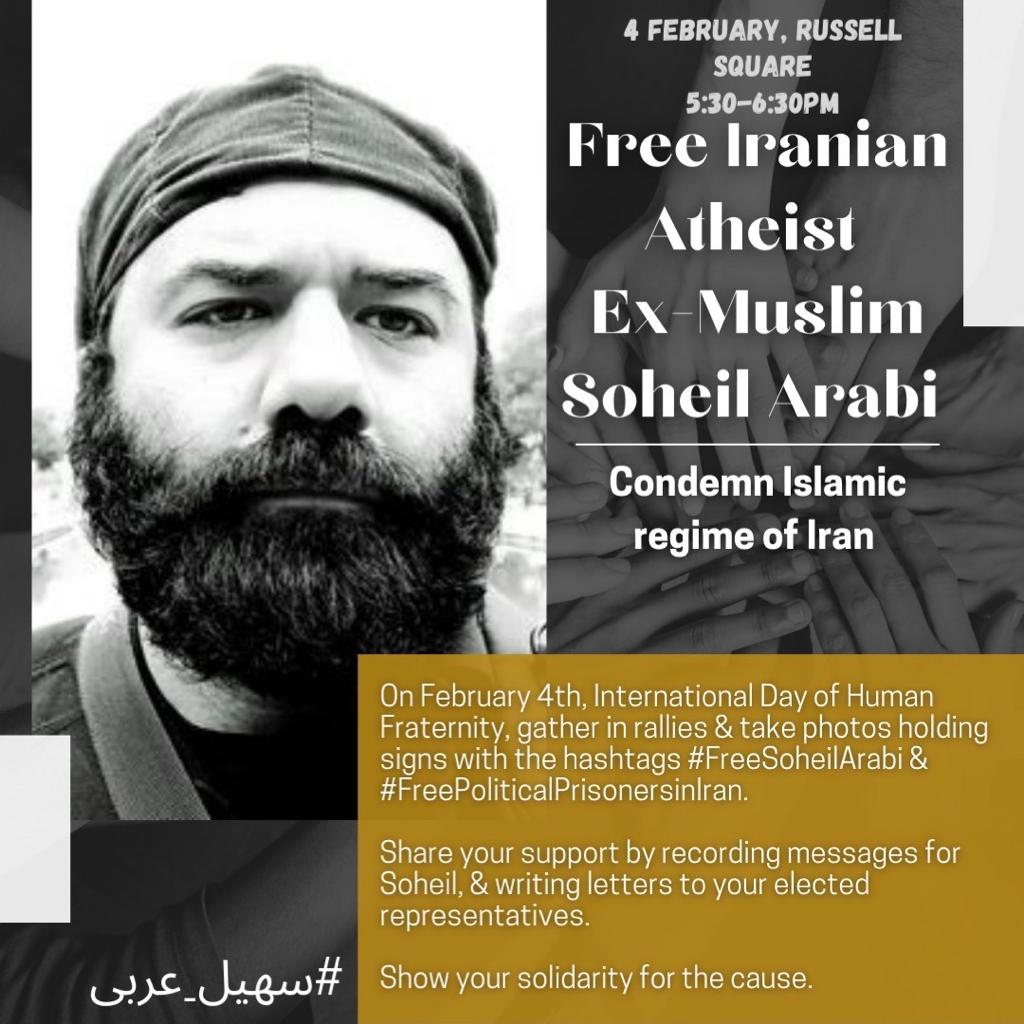

Event Details
DAY OF ACTION TO #FREESOHEIL 4 February 2023, Global In London: 5:30-6:30pm, Russell Square 40 atheist, ex-Muslim and secularist organisations that have taken on Soheil Arabi’s
Event Details
DAY OF ACTION TO #FREESOHEIL
4 February 2023, Global
In London: 5:30-6:30pm, Russell Square
40 atheist, ex-Muslim and secularist organisations that have taken on Soheil Arabi’s political sponsorship are calling for a day of action on International Day of Human Fraternity.
Join us in highlighting his case and bringing pressure to secure his release. The action is organised by the Council of Ex-Muslims of Britain and One Law for All.
more
Time
(Saturday) 5:30 pm - 6:30 pm
2023mon06feb6:30 pmmon8:00 pmOnline Support Group Session6:30 pm - 8:00 pm















































































































Event Details
Join monthly support groups to talk about issues that affect ex-Muslims. CEMB currently has two 90-minute online sessions on the first Monday and Tuesday of every month, 6.30-8.00pm UK time. The
Event Details
Join monthly support groups to talk about issues that affect ex-Muslims.
CEMB currently has two 90-minute online sessions on the first Monday and Tuesday of every month, 6.30-8.00pm UK time. The sessions are led by Counselling Psychologist Dr SAVIN BAPIR-TARDY.
If you have never attended a session before, please email hello@council-of-ex-muslims-of-britain-e5a565.ingress-baronn.ewp.live.
Time
(Monday) 6:30 pm - 8:00 pm
2023tue07feb6:30 pmtue8:00 pmOnline Support Group Session6:30 pm - 8:00 pm















































































































Event Details
Join monthly support groups to talk about issues that affect ex-Muslims. CEMB currently has two 90-minute online sessions on the first Monday and Tuesday of every month, 6.30-8.00pm UK time. The
Event Details
Join monthly support groups to talk about issues that affect ex-Muslims.
CEMB currently has two 90-minute online sessions on the first Monday and Tuesday of every month, 6.30-8.00pm UK time. The sessions are led by Counselling Psychologist Dr SAVIN BAPIR-TARDY.
If you have never attended a session before, please email hello@council-of-ex-muslims-of-britain-e5a565.ingress-baronn.ewp.live.
Time
(Tuesday) 6:30 pm - 8:00 pm
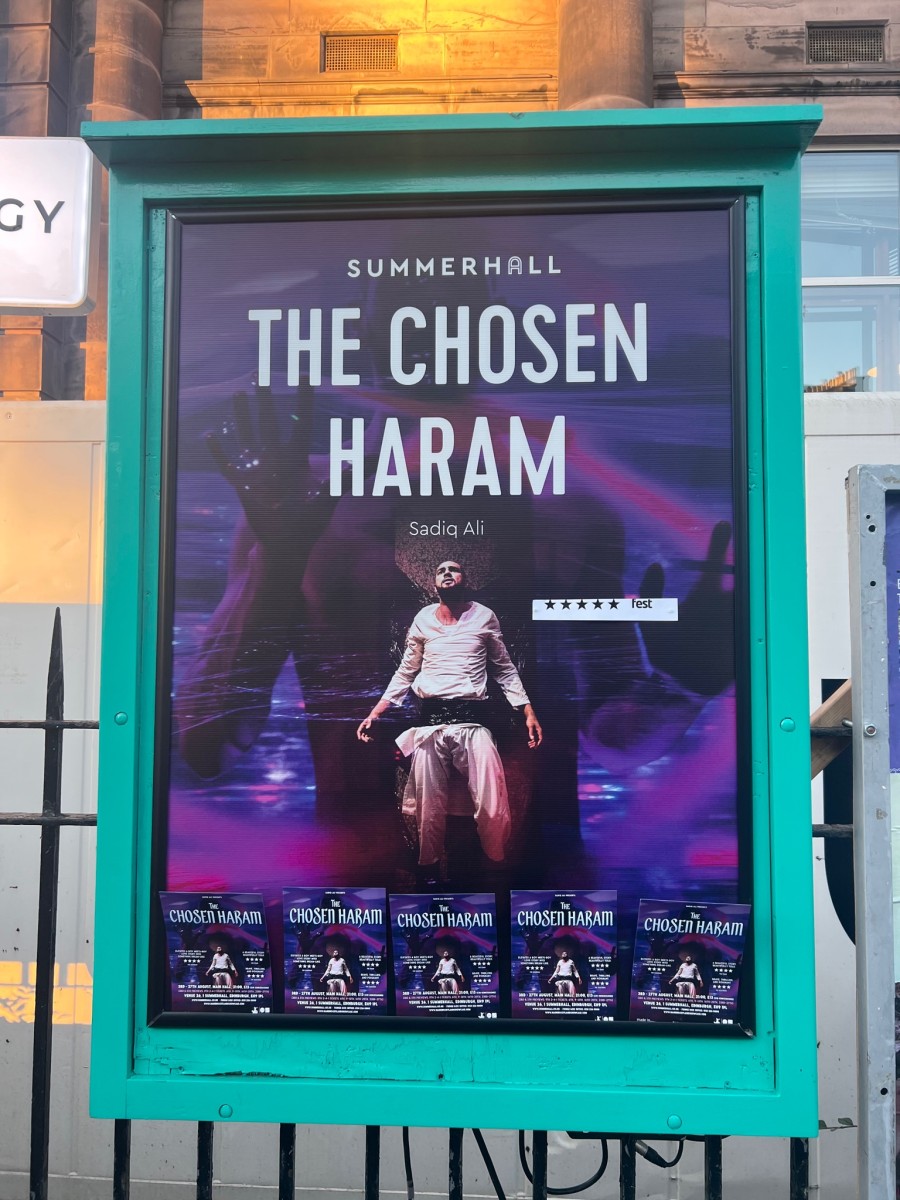

Event Details
The Chosen Haram is a unique take on circus, performed on two Chinese Poles, it’s emotionally candid, heart-warming with moments of humour, and set to a banging soundtrack. It is the
Event Details
The Chosen Haram is a unique take on circus, performed on two Chinese Poles, it’s emotionally candid, heart-warming with moments of humour, and set to a banging soundtrack.
It is the story of two gay men, their chance of meeting through a dating app, the highs and lows of their relationship, and the barriers – social, cultural, and personal – they must overcome.
Join the post-show panel discussion featuring creator and performer Sadiq Ali and our Co-spokesperson Jimmy Bangash.
For more information on all UK locations, Dates, and Booking information:
https://www.turtlekeyarts.org.uk/thechosenharam
more
Time
(Wednesday) 7:30 pm - 9:00 pm
2023mon13feb6:30 pmmon8:00 pmOnline Women's Support Group Session6:30 pm - 8:00 pm















































































































Event Details
Join monthly support group to talk about issues that affect ex-Muslim women. This 90-minute online session is for women only and is held on the second Monday of every month, 6.30-8.00pm
Event Details
Join monthly support group to talk about issues that affect ex-Muslim women.
This 90-minute online session is for women only and is held on the second Monday of every month, 6.30-8.00pm UK time. The sessions are led by Counselling Psychologist Dr SAVIN BAPIR-TARDY.
If you have never attended a session before, please email hello@council-of-ex-muslims-of-britain-e5a565.ingress-baronn.ewp.live.
Time
(Monday) 6:30 pm - 8:00 pm
march 2023
2023mon06mar1:00 pmmon3:00 pmYork University for IWD1:00 pm - 3:00 pm
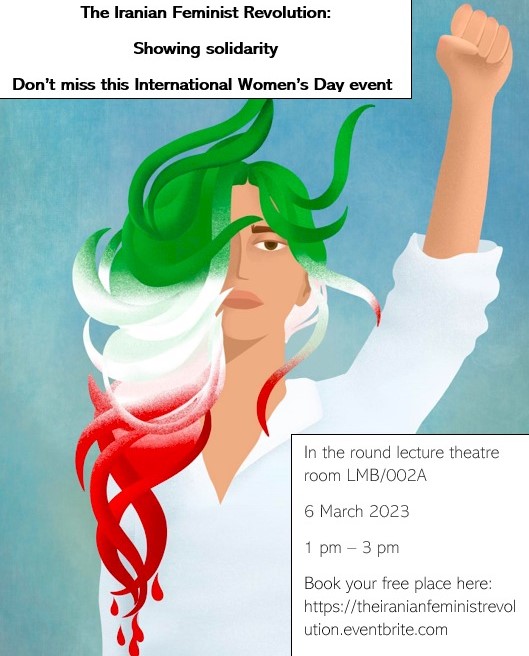

Event Details
6 March 2023, York University, 1-3pm The Woman Life Freedom Collective York are hosting this event at York Law School to mark International Women’s Day. Maryam Namazie, a prominent Iranian-born
Event Details
6 March 2023, York University, 1-3pm
The Woman Life Freedom Collective York are hosting this event at York Law School to mark International Women’s Day. Maryam Namazie, a prominent Iranian-born writer and campaigner will be speaking and sharing her thoughts on the current Iranian revolution. The discussion will focus on two important issues: How and why the movement is feminist and the particular role of women; And how, in York and in the UK broadly, we can show our solidarity and support the movement.
The event will take place in room LMB/002A at York Law School, University of York, YO10 5GD (Campus East).
Please contact atoosa.khatiri@york.ac.uk for any queries.
more
Time
(Monday) 1:00 pm - 3:00 pm
2023mon06mar6:30 pmmon8:00 pmOnline Support Group Session6:30 pm - 8:00 pm















































































































Event Details
Join monthly support groups to talk about issues that affect ex-Muslims. CEMB currently has two 90-minute online sessions on the first Monday and Tuesday of every month, 6.30-8.00pm UK time. The
Event Details
Join monthly support groups to talk about issues that affect ex-Muslims.
CEMB currently has two 90-minute online sessions on the first Monday and Tuesday of every month, 6.30-8.00pm UK time. The sessions are led by Counselling Psychologist Dr SAVIN BAPIR-TARDY.
If you have never attended a session before, please email hello@council-of-ex-muslims-of-britain-e5a565.ingress-baronn.ewp.live.
Time
(Monday) 6:30 pm - 8:00 pm
2023wed08mar6:00 pmwed10:00 pmOn IWD: Paying Homage to Woman, Life, Freedom6:00 pm - 10:00 pm
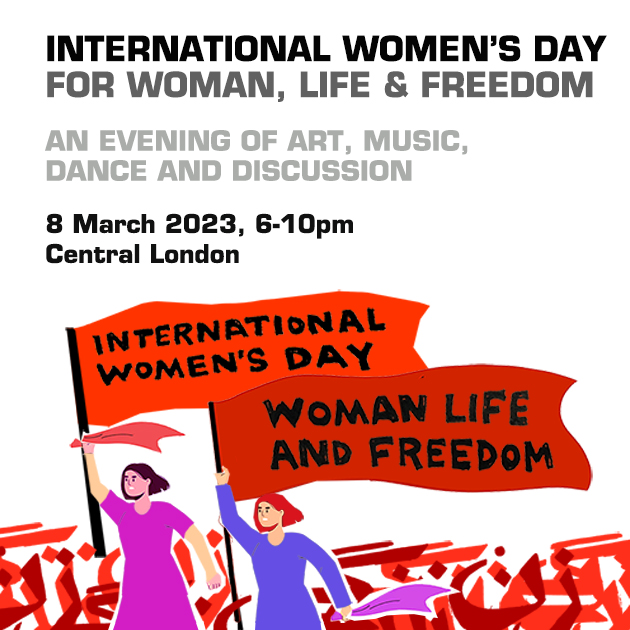

Event Details
8 March 2023, London, 6-10pm On International Women’s Day, we pay homage to and celebrate ‘Woman, Life, Freedom’ and the women’s revolution in Iran. An evening of discussion, art, music,
Event Details
8 March 2023, London, 6-10pm
On International Women’s Day, we pay homage to and celebrate ‘Woman, Life, Freedom’ and the women’s revolution in Iran. An evening of discussion, art, music, dance, film and performances. Sponsored by One Law for All and Woman, Life, Freedom Charter. Get Tickets Here.
Time
(Wednesday) 6:00 pm - 10:00 pm
2023wed08mar6:30 pmwed8:00 pmOnline Support Group Session6:30 pm - 8:00 pm















































































































Event Details
Join monthly support groups to talk about issues that affect ex-Muslims. CEMB currently has two 90-minute online sessions on the first Monday and Tuesday of every month, 6.30-8.00pm UK time. The
Event Details
Join monthly support groups to talk about issues that affect ex-Muslims.
CEMB currently has two 90-minute online sessions on the first Monday and Tuesday of every month, 6.30-8.00pm UK time. The sessions are led by Counselling Psychologist Dr SAVIN BAPIR-TARDY.
This month only, Tuesday’s support group changed to Wednesday.
If you have never attended a session before, please email hello@council-of-ex-muslims-of-britain-e5a565.ingress-baronn.ewp.live.
Time
(Wednesday) 6:30 pm - 8:00 pm
2023mon13mar6:30 pmmon8:00 pmOnline Women's Support Group Session6:30 pm - 8:00 pm















































































































Event Details
Join monthly support group to talk about issues that affect ex-Muslim women. This 90-minute online session is for women only and is held on the second Monday of every month, 6.30-8.00pm
Event Details
Join monthly support group to talk about issues that affect ex-Muslim women.
This 90-minute online session is for women only and is held on the second Monday of every month, 6.30-8.00pm UK time. The sessions are led by Counselling Psychologist Dr SAVIN BAPIR-TARDY.
If you have never attended a session before, please email hello@council-of-ex-muslims-of-britain-e5a565.ingress-baronn.ewp.live.
Time
(Monday) 6:30 pm - 8:00 pm
2023mon13mar7:00 pmmon8:30 pmSpring Social: 13-03-2023, Central London7:00 pm - 8:30 pm


Event Details
Come join us for a Social meet-up on the 13th of march at 19:00 PM at a central london pub. Contact Ali Malik at ali.malik@ex-muslim.otg.uk.
Event Details
Come join us for a Social meet-up on the 13th of march at 19:00 PM at a central london pub.
Contact Ali Malik at ali.malik@ex-muslim.otg.uk.


Time
(Monday) 7:00 pm - 8:30 pm
2023sat25mar7:00 pmsat9:00 pmFaithless Hijabi Event7:00 pm - 9:00 pm
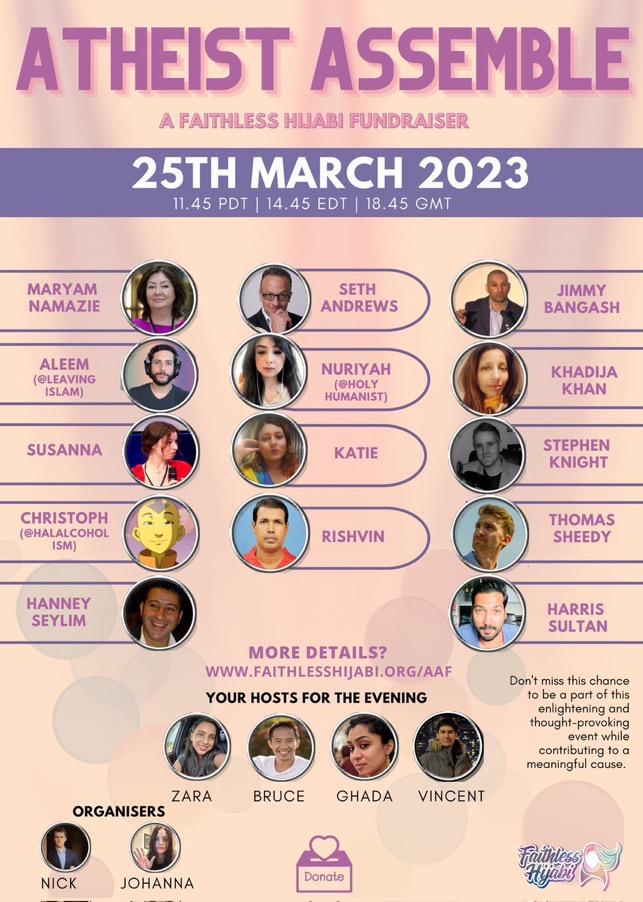

Event Details
25 March 2023, Online, 7pm Faithless Hijabi Event
Event Details
25 March 2023, Online, 7pm
Faithless Hijabi Event
Time
(Saturday) 7:00 pm - 9:00 pm
2023sun26mar6:00 pmsun8:00 pmMaryam Namazie to speak at Leicester Secular Society6:00 pm - 8:00 pm
Event Details
26 March, Leicester, 6:30pm-8pm Maryam Namazie to speak at Leicester Secular Society on Woman, Life, Freedom
Event Details
26 March, Leicester, 6:30pm-8pm
Maryam Namazie to speak at Leicester Secular Society on Woman, Life, Freedom
Time
(Sunday) 6:00 pm - 8:00 pm
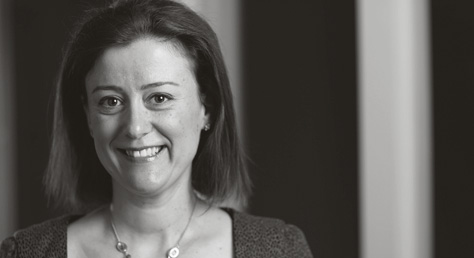


Event Details
27 March, 7:00-8:00pm, Central London Join us for our monthly meet-up on Apostasy and Asylum with Ana Gonzalez. Meet-ups are run by Ali Malik. Ana Gonzalez is a solicitor and partner at
Event Details
27 March, 7:00-8:00pm, Central London
Join us for our monthly meet-up on Apostasy and Asylum with Ana Gonzalez. Meet-ups are run by Ali Malik.
Ana Gonzalez is a solicitor and partner at Wilson Solicitors. She practises in immigration and asylum work, and has interests in human rights and European Law. Ana is an internationally recognised expert in gender and sexuality-based asylum claims as well as having extensive expertise in representing individuals from vulnerable, marginalised client groups such as victims of human trafficking, apostates and transgender individuals. Ana is frequently instructed by Local Authorities all over the Greater London area to act for children and adults in their care.
Ana is praised in Chambers and Partners for her “constant attention to cases, leading client care and real knowledge of the law.” She “continues to stand out for significant work on human trafficking cases, often raising new country guidance points” (2012). “She is a stand-out practitioner in the field of refugee law, with particular expertise in trafficking cases” (2014). She “is very experienced, passionate and has very good judgement” (2016). Ana has been described “the epitome of a fighter who cares very deeply about her clients,” in the 2019 edition.
She practises in all aspects of immigration and asylum work, and has a specialist interest in European law. Ana has extensive experience of litigating in the higher courts, having had numerous cases over the years in the Administrative Court/Upper Tribunal and Court of Appeal. She has also conducted cases in the Supreme Court and the Court of Justice of the European Union in Luxembourg.
Talks will be followed by Q&A.
more
Time
(Monday) 7:00 pm - 8:00 pm
2023thu30mar4:00 pmthu6:00 pmWhy Free Speech? Feminist Dissent panel discussion4:00 pm - 6:00 pm
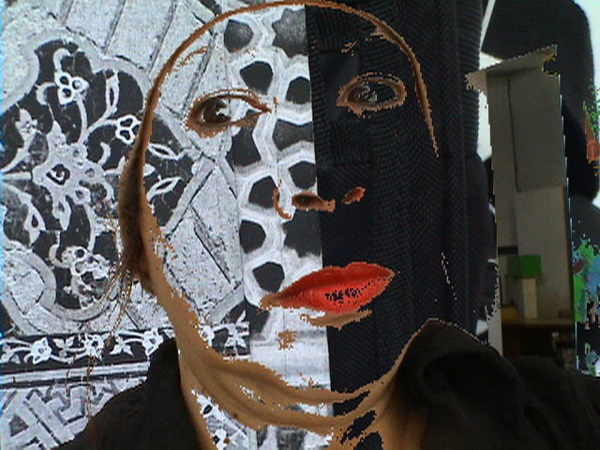

Event Details
30 March, 4-6pm Online This public meeting will address the question of Why Free Speech? Debates about freedom of speech are not new; however, across the world, we are witnessing disturbing
Event Details
30 March, 4-6pm Online
This public meeting will address the question of Why Free Speech? Debates about freedom of speech are not new; however, across the world, we are witnessing disturbing moves to curtail free speech in liberal democracies and totalitarian states alike and among left wing as well as right wing movements. As recent events show, free speech is the first casualty of all forms of authoritarianism, including religious fundamentalism. This is why the debate on freedom of speech has become increasingly urgent and we invite you to join the conversation. Get your free tickets here.
Featured Speakers:
Stephen Cowden (teaches Social Work at the University of Gloucestershire; Editorial Collective member of Feminist Dissent)
Maryam Namazie (British-Iranian secularist, human rights activist, commentator and broadcaster; author of Sharia Law in Britain)
Pragna Patel (founding member of Southall Black Sisters and its former Director, co-founder of Women Against Fundamentalism and Editorial Collective member of Feminist Dissent)
Salil Tripathi (writer and policy adviser based in New York, Chair of Pen International’s Writers in Prison Committee)
Chaired by: Georgie Wemyss (Co-Director of the Centre for Research on Migration, Refugees, and Belonging, University of East London, Editorial Collective Member of Feminist Dissent)
About Us:
Feminist Dissent is an online journal based at the University of Warwick. It brings together innovative and critical insights to enhance our understanding of the relationship between gender, fundamentalism and related socio-political issues. It aims to fill a gap in the existing literature by creating space to interrogate the multi-faceted links between historical and resurgent religious fundamentalism and gender. It further aims to open up new ways of thinking about secularism, religious freedom, civil liberties and human rights, nationalism and identity politics, anti-racism and multiculturalism, neoliberalism, and feminist resistance.
Cover Art: Houria Niati
more
Time
(Thursday) 4:00 pm - 6:00 pm
2023fri31marAll Daysat01aprAtheism Day in Poland(All Day)
Event Details
Our spokesperson Maryam Namazie will be sending an online message to the atheist day event in Warsaw, Poland. 31 March-1 April, Warsaw Atheism Day in Poland
Event Details
Our spokesperson Maryam Namazie will be sending an online message to the atheist day event in Warsaw, Poland.
31 March-1 April, Warsaw
Atheism Day in Poland
Time
March 31 (Friday) - April 1 (Saturday)
april 2023
2023fri31marAll Daysat01aprAtheism Day in Poland(All Day)
Event Details
Our spokesperson Maryam Namazie will be sending an online message to the atheist day event in Warsaw, Poland. 31 March-1 April, Warsaw Atheism Day in Poland
Event Details
Our spokesperson Maryam Namazie will be sending an online message to the atheist day event in Warsaw, Poland.
31 March-1 April, Warsaw
Atheism Day in Poland
Time
March 31 (Friday) - April 1 (Saturday)
2023mon03apr6:30 pmmon8:00 pmOnline Support Group Session6:30 pm - 8:00 pm















































































































Event Details
Join monthly support groups to talk about issues that affect ex-Muslims. CEMB currently has two 90-minute online sessions on the first Monday and Tuesday of every month, 6.30-8.00pm UK time. The
Event Details
Join monthly support groups to talk about issues that affect ex-Muslims.
CEMB currently has two 90-minute online sessions on the first Monday and Tuesday of every month, 6.30-8.00pm UK time. The sessions are led by Counselling Psychologist Dr SAVIN BAPIR-TARDY.
If you have never attended a session before, please email hello@council-of-ex-muslims-of-britain-e5a565.ingress-baronn.ewp.live.
Time
(Monday) 6:30 pm - 8:00 pm
2023tue04apr6:30 pmtue8:00 pmOnline Support Group Session6:30 pm - 8:00 pm















































































































Event Details
Join monthly support groups to talk about issues that affect ex-Muslims. CEMB currently has two 90-minute online sessions on the first Monday and Tuesday of every month, 6.30-8.00pm UK time. The
Event Details
Join monthly support groups to talk about issues that affect ex-Muslims.
CEMB currently has two 90-minute online sessions on the first Monday and Tuesday of every month, 6.30-8.00pm UK time. The sessions are led by Counselling Psychologist Dr SAVIN BAPIR-TARDY.
If you have never attended a session before, please email hello@council-of-ex-muslims-of-britain-e5a565.ingress-baronn.ewp.live.
Time
(Tuesday) 6:30 pm - 8:00 pm
2023mon10apr6:30 pmmon8:00 pmOnline Women's Support Group Session6:30 pm - 8:00 pm















































































































Event Details
Join monthly support group to talk about issues that affect ex-Muslim women. This 90-minute online session is for women only and is held on the second Monday of every month, 6.30-8.00pm
Event Details
Join monthly support group to talk about issues that affect ex-Muslim women.
This 90-minute online session is for women only and is held on the second Monday of every month, 6.30-8.00pm UK time. The sessions are led by Counselling Psychologist Dr SAVIN BAPIR-TARDY.
If you have never attended a session before, please email hello@council-of-ex-muslims-of-britain-e5a565.ingress-baronn.ewp.live.
Time
(Monday) 6:30 pm - 8:00 pm
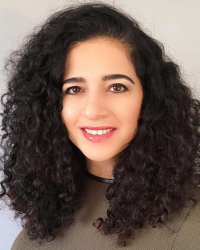

Event Details
Monthly Meetup in London Bio: As a Counselling Psychologist, I use a variety of psychotherapeutic methods that are supported by
Event Details
Monthly Meetup in London
Bio:
As a Counselling Psychologist, I use a variety of psychotherapeutic methods that are supported by clinical research. My work focuses on helping people who are experiencing a variety of psychological issues such as anxiety, worry, depression, betrayal trauma or have been subjected to harmful practices such as ‘Honour’ Based Violence and Female Genital Mutilation. I work with clients wanting to begin a journey of healing, rebuild self-esteem, build a self that is independent of their past or space for reflection. I work collaboratively with my clients gaining an insight into their coping responses towards a variety of concerns.
Monthly Meetups are held on the third Monday of every month, 7.30-8.30pm UK time in central London. Meetups are run by Ali Malik.
RSVP with ali.malik@council-of-ex-muslims-of-britain-e5a565.ingress-baronn.ewp.live to book your attendance.
more
Time
(Monday) 7:00 pm - 8:00 pm
2023thu20aprAll DayOn Islam and Women, Berlin(All Day: thursday)
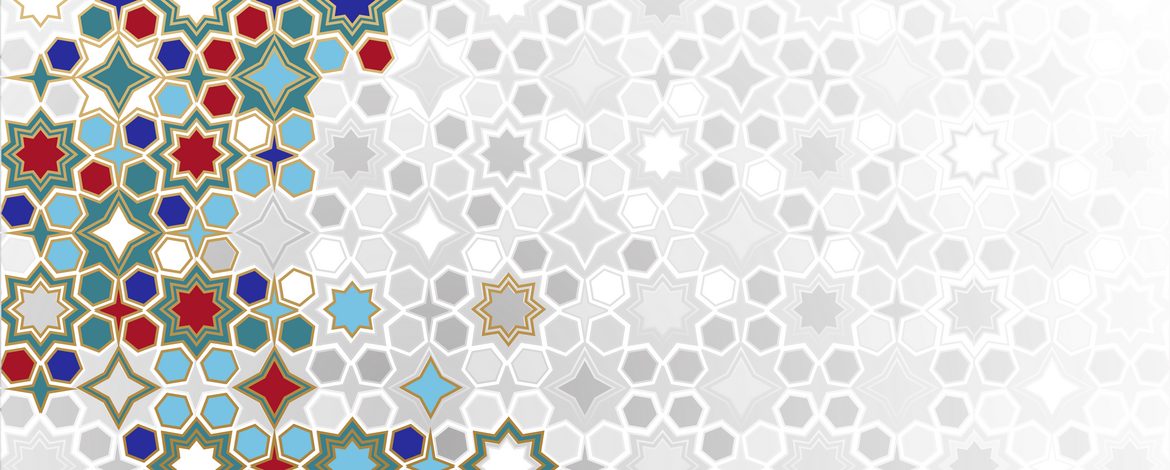

Event Details
20 April 2023, Berlin Maryam Namazie will be speaking at WZB, Berlin Social Science Centre on Women’s rights and Islam: Inherent oxymoron or possible harmony? More details here.
Event Details
20 April 2023, Berlin
Maryam Namazie will be speaking at WZB, Berlin Social Science Centre on Women’s rights and Islam: Inherent oxymoron or possible harmony? More details here.
Time
All Day (Thursday)
may 2023
2023mon01may6:30 pmmon8:00 pmOnline Support Group Session6:30 pm - 8:00 pm















































































































Event Details
Join monthly support groups to talk about issues that affect ex-Muslims. CEMB currently has two 90-minute online sessions on the first Monday and Tuesday of every month, 6.30-8.00pm UK time. The
Event Details
Join monthly support groups to talk about issues that affect ex-Muslims.
CEMB currently has two 90-minute online sessions on the first Monday and Tuesday of every month, 6.30-8.00pm UK time. The sessions are led by Counselling Psychologist Dr SAVIN BAPIR-TARDY.
If you have never attended a session before, please email hello@council-of-ex-muslims-of-britain-e5a565.ingress-baronn.ewp.live.
Time
(Monday) 6:30 pm - 8:00 pm
2023tue02may6:30 pmtue8:00 pmOnline Support Group Session6:30 pm - 8:00 pm















































































































Event Details
Join monthly support groups to talk about issues that affect ex-Muslims. CEMB currently has two 90-minute online sessions on the first Monday and Tuesday of every month, 6.30-8.00pm UK time. The
Event Details
Join monthly support groups to talk about issues that affect ex-Muslims.
CEMB currently has two 90-minute online sessions on the first Monday and Tuesday of every month, 6.30-8.00pm UK time. The sessions are led by Counselling Psychologist Dr SAVIN BAPIR-TARDY.
If you have never attended a session before, please email hello@council-of-ex-muslims-of-britain-e5a565.ingress-baronn.ewp.live.
Time
(Tuesday) 6:30 pm - 8:00 pm
2023mon08may6:30 pmmon8:00 pmOnline Women's Support Group Session6:30 pm - 8:00 pm















































































































Event Details
Join monthly support group to talk about issues that affect ex-Muslim women. This 90-minute online session is for women only and is held on the second Monday of every month, 6.30-8.00pm
Event Details
Join monthly support group to talk about issues that affect ex-Muslim women.
This 90-minute online session is for women only and is held on the second Monday of every month, 6.30-8.00pm UK time. The sessions are led by Counselling Psychologist Dr SAVIN BAPIR-TARDY.
If you have never attended a session before, please email hello@council-of-ex-muslims-of-britain-e5a565.ingress-baronn.ewp.live.
Time
(Monday) 6:30 pm - 8:00 pm
june 2023
2023mon05jun6:30 pmmon8:00 pmOnline Support Group Session6:30 pm - 8:00 pm















































































































Event Details
Join monthly support groups to talk about issues that affect ex-Muslims. CEMB currently has two 90-minute online sessions on the first Monday and Tuesday of every month, 6.30-8.00pm UK time. The
Event Details
Join monthly support groups to talk about issues that affect ex-Muslims.
CEMB currently has two 90-minute online sessions on the first Monday and Tuesday of every month, 6.30-8.00pm UK time. The sessions are led by Counselling Psychologist Dr SAVIN BAPIR-TARDY.
If you have never attended a session before, please email hello@council-of-ex-muslims-of-britain-e5a565.ingress-baronn.ewp.live.
Time
(Monday) 6:30 pm - 8:00 pm
2023tue06jun6:30 pmtue8:00 pmOnline Support Group Session6:30 pm - 8:00 pm















































































































Event Details
Join monthly support groups to talk about issues that affect ex-Muslims. CEMB currently has two 90-minute online sessions on the first Monday and Tuesday of every month, 6.30-8.00pm UK time. The
Event Details
Join monthly support groups to talk about issues that affect ex-Muslims.
CEMB currently has two 90-minute online sessions on the first Monday and Tuesday of every month, 6.30-8.00pm UK time. The sessions are led by Counselling Psychologist Dr SAVIN BAPIR-TARDY.
If you have never attended a session before, please email hello@council-of-ex-muslims-of-britain-e5a565.ingress-baronn.ewp.live.
Time
(Tuesday) 6:30 pm - 8:00 pm


Event Details
9 June 2023, Durham Union, 8pm Maryam Namazie will debate against “This House Believes Islam is Compatible With Human Rights.” More information here.
Event Details
9 June 2023, Durham Union, 8pm
Maryam Namazie will debate against “This House Believes Islam is Compatible With Human Rights.” More information here.
Time
(Friday) 8:30 pm - 10:00 pm
2023mon12jun6:30 pmmon8:00 pmOnline Women's Support Group Session6:30 pm - 8:00 pm















































































































Event Details
Join monthly support group to talk about issues that affect ex-Muslim women. This 90-minute online session is for women only and is held on the second Monday of every month, 6.30-8.00pm
Event Details
Join monthly support group to talk about issues that affect ex-Muslim women.
This 90-minute online session is for women only and is held on the second Monday of every month, 6.30-8.00pm UK time. The sessions are led by Counselling Psychologist Dr SAVIN BAPIR-TARDY.
If you have never attended a session before, please email hello@council-of-ex-muslims-of-britain-e5a565.ingress-baronn.ewp.live.
Time
(Monday) 6:30 pm - 8:00 pm
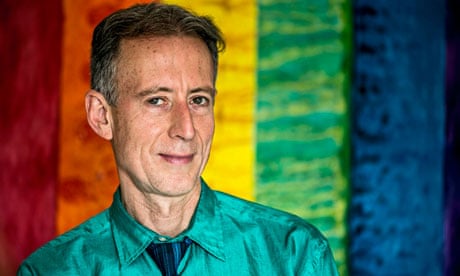





Event Details
We are pleased to announce that a staple of LGBT And freedom activism Peter Tatchell will be speaking at our monthly meet-up on Monday the 19th of June at 7
Event Details
We are pleased to announce that a staple of LGBT And freedom activism Peter Tatchell will be speaking at our monthly meet-up on Monday the 19th of June at 7 PM in central London. You can read more about Peter Tatchell below
Monthly Meetup in London
Monthly Meetups are held on the third Monday of every month, 7.30-8.30pm UK time in central London. Meetups are run by Ali Malik.
RSVP with ali.malik@council-of-ex-muslims-of-britain-e5a565.ingress-baronn.ewp.live to book your attendance.
more
Time
(Monday) 7:00 pm - 8:00 pm
july 2023
2023sat01julAll DayPride in London: Liberation is a Riot!(All Day: saturday)
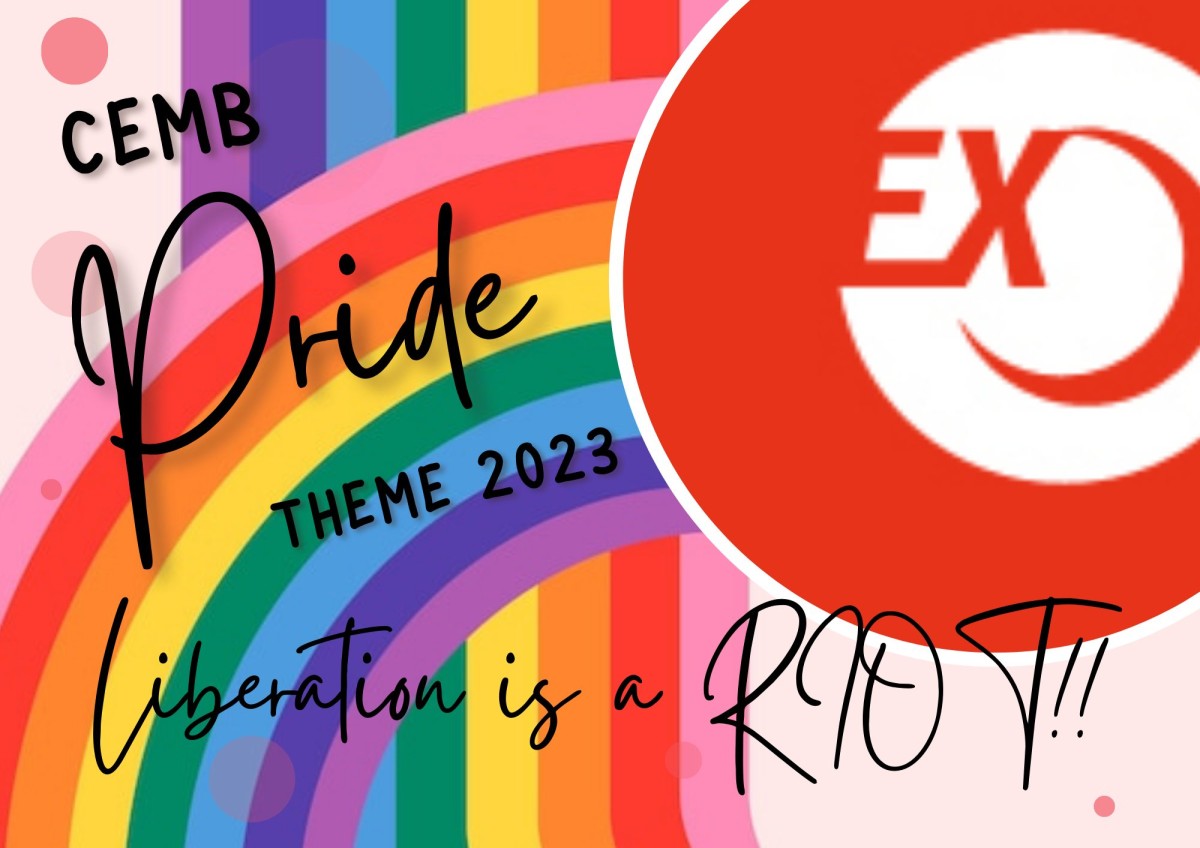





Event Details
1 July 2023, Pride in London On 1 July,
Event Details
1 July 2023, Pride in London
CEMB will once again be marching in pride this year and our theme for this year will be Liberation Is A Riot!!
If you would like to join us on 1 July, please note that space is limited, If you haven’t registered to march with us and plan to do so, please let Ali Malik know immediately at ali.malik@council-of-ex-muslims-of-britain-e5a565.ingress-baronn.ewp.live so he can reserve a wristband for you and send you further details. The brilliant Victoria Gugenheim will be body and face painting on the day.
more
Time
All Day (Saturday)
2023mon03jul6:30 pmmon8:00 pmOnline Support Group Session6:30 pm - 8:00 pm















































































































Event Details
Join monthly support groups to talk about issues that affect ex-Muslims. CEMB currently has two 90-minute online sessions on the first Monday and Tuesday of every month, 6.30-8.00pm UK time. The
Event Details
Join monthly support groups to talk about issues that affect ex-Muslims.
CEMB currently has two 90-minute online sessions on the first Monday and Tuesday of every month, 6.30-8.00pm UK time. The sessions are led by Counselling Psychologist Dr SAVIN BAPIR-TARDY.
If you have never attended a session before, please email hello@council-of-ex-muslims-of-britain-e5a565.ingress-baronn.ewp.live.
Time
(Monday) 6:30 pm - 8:00 pm
2023tue04jul6:30 pmtue8:00 pmOnline Support Group Session6:30 pm - 8:00 pm















































































































Event Details
Join monthly support groups to talk about issues that affect ex-Muslims. CEMB currently has two 90-minute online sessions on the first Monday and Tuesday of every month, 6.30-8.00pm UK time. The
Event Details
Join monthly support groups to talk about issues that affect ex-Muslims.
CEMB currently has two 90-minute online sessions on the first Monday and Tuesday of every month, 6.30-8.00pm UK time. The sessions are led by Counselling Psychologist Dr SAVIN BAPIR-TARDY.
If you have never attended a session before, please email hello@council-of-ex-muslims-of-britain-e5a565.ingress-baronn.ewp.live.
Time
(Tuesday) 6:30 pm - 8:00 pm
2023mon10jul6:30 pmmon8:00 pmOnline Women's Support Group Session6:30 pm - 8:00 pm















































































































Event Details
Join monthly support group to talk about issues that affect ex-Muslim women. This 90-minute online session is for women only and is held on the second Monday of every month, 6.30-8.00pm
Event Details
Join monthly support group to talk about issues that affect ex-Muslim women.
This 90-minute online session is for women only and is held on the second Monday of every month, 6.30-8.00pm UK time. The sessions are led by Counselling Psychologist Dr SAVIN BAPIR-TARDY.
If you have never attended a session before, please email hello@council-of-ex-muslims-of-britain-e5a565.ingress-baronn.ewp.live.
Time
(Monday) 6:30 pm - 8:00 pm
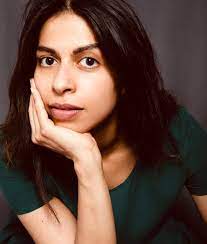

Event Details
Speaker’s Bio: https://www.joholeassociates.com/actors/freny-nina-pavri/ Women Life Freedom Yoga and dance Introduction to principles of yogic movement and its application to dance as a way to release stress, trauma, anxiety, connecting with a calmer and
Event Details
Speaker’s Bio: https://www.joholeassociates.com/actors/freny-nina-pavri/
Women Life Freedom
Yoga and dance
Introduction to principles of yogic movement and its application to dance as a way to release stress, trauma, anxiety, connecting with a calmer and more peaceful self.
Dancing in public is an act of protest, no matter where in the world we are. When we dance on the streets, we are dancing for women in countries like Iran where freedom is banned and torture is paramount.
This work therefore symbolises and dedicates itself to the freedom of the body, mind, spirit and movement.
Dance is sacred.
Monthly Meetup in London
Monthly Meetups are held on the third Monday of every month, 7.30-8.30pm UK time in central London. Meetups are run by Ali Malik.
RSVP with ali.malik@council-of-ex-muslims-of-britain-e5a565.ingress-baronn.ewp.live to book your attendance.
more
Time
(Monday) 7:00 pm - 8:00 pm
august 2023
2023tue01aug6:30 pmtue8:00 pmOnline Support Group Session6:30 pm - 8:00 pm















































































































Event Details
Join monthly support groups to talk about issues that affect ex-Muslims. CEMB currently has two 90-minute online sessions usually on the first Monday and Tuesday of every month, 6.30-8.00pm UK time.
Event Details
Join monthly support groups to talk about issues that affect ex-Muslims.
CEMB currently has two 90-minute online sessions usually on the first Monday and Tuesday of every month, 6.30-8.00pm UK time. The sessions are led by Counselling Psychologist Dr SAVIN BAPIR-TARDY.
If you have never attended a session before, please email hello@council-of-ex-muslims-of-britain-e5a565.ingress-baronn.ewp.live.
Time
(Tuesday) 6:30 pm - 8:00 pm
2023wed02aug6:30 pmwed8:00 pmOnline Support Group Session6:30 pm - 8:00 pm















































































































Event Details
Join monthly support groups to talk about issues that affect ex-Muslims. CEMB currently has two 90-minute online sessions on the first Monday and Tuesday of every month, 6.30-8.00pm UK time. The
Event Details
Join monthly support groups to talk about issues that affect ex-Muslims.
CEMB currently has two 90-minute online sessions on the first Monday and Tuesday of every month, 6.30-8.00pm UK time. The sessions are led by Counselling Psychologist Dr SAVIN BAPIR-TARDY.
If you have never attended a session before, please email hello@council-of-ex-muslims-of-britain-e5a565.ingress-baronn.ewp.live.
Time
(Wednesday) 6:30 pm - 8:00 pm
2023mon07aug6:30 pmmon8:00 pmCANCELLED - Online Women's Support Group Session6:30 pm - 8:00 pm















































































































Event Details
Join monthly support group to talk about issues that affect ex-Muslim women. This 90-minute online session is for women only and is held on the second Monday of every month, 6.30-8.00pm
Event Details
Join monthly support group to talk about issues that affect ex-Muslim women.
This 90-minute online session is for women only and is held on the second Monday of every month, 6.30-8.00pm UK time. The sessions are led by Counselling Psychologist Dr SAVIN BAPIR-TARDY.
If you have never attended a session before, please email hello@council-of-ex-muslims-of-britain-e5a565.ingress-baronn.ewp.live.
Time
(Monday) 6:30 pm - 8:00 pm
Event Details
Monthly Meetup in London Monthly Meetups are
Event Details
Monthly Meetup in London
Monthly Meetups are held on the third Monday of every month, 7-8pm UK time in central London. Meetups are run by Ali Malik. This one is held earlier in run up to aspostasy day on 14th.
RSVP with ali.malik@council-of-ex-muslims-of-britain-e5a565.ingress-baronn.ewp.live to book your attendance.
Bring religious books with you for this doodling exercise.
You are invited to join the Council of Ex-Muslims of Britain (CEMB) on International Apostasy Day to defend freedom of expression and the right to apostasy and blasphemy by subverting religious texts.
Whilst we might not agree with burning Qurans and books (usually associated with a long history of state and religious censorship against dissent), we nonetheless recognise the right of individuals to express their abhorrence to bad ideas and the persecution and murder of freethinkers and apostates.
On Apostasy Day, join us in celebrating blasphemy and apostasy as rights by subverting and doodling on the Quran, Bible, Torah, the Vedas or any other religious texts to proclaim:
Ideas are not sacred, human beings are.
It is important to reiterate that burning, murdering, torturing, persecuting human beings are violence and hate, not burning the Quran or religious texts.
Tag CEMB with your videos or photos subverting religious texts and publish them online using the hashtags: #ApostasyDay #ApostasyDayDoodles.
See an example of doodling on the Quran by Maryam Namazie for some ideas on what you can do.
CEMB’s next meet up will be a doodling session in preparation for Apostasy Day.
more
Time
(Monday) 7:00 pm - 8:00 pm
2023tue22augAll DayApostasy Day online action(All Day: tuesday)
Event Details
You are invited to join the Council of Ex-Muslims of Britain (CEMB) on International Apostasy Day to defend freedom of expression and the right to apostasy and blasphemy by
Event Details
You are invited to join the Council of Ex-Muslims of Britain (CEMB) on International Apostasy Day to defend freedom of expression and the right to apostasy and blasphemy by subverting religious texts.
Whilst we might not agree with burning Qurans and books (usually associated with a long history of state and religious censorship against dissent), we nonetheless recognise the right of individuals to express their abhorrence to bad ideas and the persecution and murder of freethinkers and apostates.
On Apostasy Day, join us in celebrating blasphemy and apostasy as rights by subverting and doodling on the Quran, Bible, Torah, the Vedas or any other religious texts to proclaim:
Ideas are not sacred, human beings are.
It is important to reiterate that burning, murdering, torturing, persecuting human beings are violence and hate, not burning the Quran or religious texts.
Tag CEMB with your videos or photos subverting religious texts and publish them online using the hashtags: #ApostasyDay #ApostasyDayDoodles.
See an example of doodling on the Quran by Maryam Namazie for some ideas on what you can do.
CEMB’s next meet up will be a doodling session in preparation for Apostasy Day.
more
Time
All Day (Tuesday)
september 2023
2023mon04sep6:30 pmmon8:00 pmOnline Support Group Session6:30 pm - 8:00 pm















































































































Event Details
Join monthly support groups to talk about issues that affect ex-Muslims. CEMB currently has two 90-minute online sessions on the first Monday and Wednesday of every month, 6.30-8.00pm UK time. The
Event Details
Join monthly support groups to talk about issues that affect ex-Muslims.
CEMB currently has two 90-minute online sessions on the first Monday and Wednesday of every month, 6.30-8.00pm UK time. The sessions are led by Counselling Psychologist Dr SAVIN BAPIR-TARDY.
If you have never attended a session before, please email hello@council-of-ex-muslims-of-britain-e5a565.ingress-baronn.ewp.live.
Time
(Monday) 6:30 pm - 8:00 pm
2023wed06sep6:30 pmwed8:00 pmOnline Support Group Session6:30 pm - 8:00 pm















































































































Event Details
Join monthly support groups to talk about issues that affect ex-Muslims. CEMB currently has two 90-minute online sessions on the first Monday and Wednesday of every month, 6.30-8.00pm UK time. The
Event Details
Join monthly support groups to talk about issues that affect ex-Muslims.
CEMB currently has two 90-minute online sessions on the first Monday and Wednesday of every month, 6.30-8.00pm UK time. The sessions are led by Counselling Psychologist Dr SAVIN BAPIR-TARDY.
If you have never attended a session before, please email hello@council-of-ex-muslims-of-britain-e5a565.ingress-baronn.ewp.live.
Time
(Wednesday) 6:30 pm - 8:00 pm
2023mon11sep6:30 pmmon8:00 pmOnline Women's Support Group Session6:30 pm - 8:00 pm















































































































Event Details
Join monthly support group to talk about issues that affect ex-Muslim women. This 90-minute online session is for women only and is held on the second Monday of every month, 6.30-8.00pm
Event Details
Join monthly support group to talk about issues that affect ex-Muslim women.
This 90-minute online session is for women only and is held on the second Monday of every month, 6.30-8.00pm UK time. The sessions are led by Counselling Psychologist Dr SAVIN BAPIR-TARDY.
If you have never attended a session before, please email hello@council-of-ex-muslims-of-britain-e5a565.ingress-baronn.ewp.live.
Time
(Monday) 6:30 pm - 8:00 pm
2023sat16sepAll DaySing4Freedom in support of woman's revolution in Iran(All Day: saturday)
Event Details
16 September 2023, 1130-1pm, Piccadilly Circus, London Action for Women’s Revolution on anniversary of Mahsa Amini’s murder
Event Details
16 September 2023, 1130-1pm, Piccadilly Circus, London
Action for Women’s Revolution on anniversary of Mahsa Amini’s murder
Time
All Day (Saturday)
2023mon18sep7:00 pmmon8:00 pmMonthly Meetup in London7:00 pm - 8:00 pm
Event Details
Monthly Meetup in London Monthly Meetups are
Event Details
Monthly Meetup in London
Monthly Meetups are held on the third Monday of every month, 7-8pm UK time in central London. Meetups are run by Ali Malik.
RSVP with ali.malik@council-of-ex-muslims-of-britain-e5a565.ingress-baronn.ewp.live to book your attendance.
Time
(Monday) 7:00 pm - 8:00 pm
2023mon25sep6:45 pmmon10:30 pmChanging Minds in Changing Times, Birmingham6:45 pm - 10:30 pm
Event Details
25 September 2023, Midlands Art Centre, Birmingham Changing Minds in Changing Times with AC Grayling, Lawrence Krauss, Maryam Namazie and Richard Dawkins. For tickets, click here.
Event Details
25 September 2023, Midlands Art Centre, Birmingham
Changing Minds in Changing Times with AC Grayling, Lawrence Krauss, Maryam Namazie and Richard Dawkins. For tickets, click here.
Time
(Monday) 6:45 pm - 10:30 pm
october 2023
2023mon02oct6:30 pmmon8:00 pmOnline Support Group Session6:30 pm - 8:00 pm















































































































Event Details
Join monthly support groups to talk about issues that affect ex-Muslims. CEMB currently has two 90-minute online sessions on the first Monday and Wednesday of every month, 6.30-8.00pm UK time. The
Event Details
Join monthly support groups to talk about issues that affect ex-Muslims.
CEMB currently has two 90-minute online sessions on the first Monday and Wednesday of every month, 6.30-8.00pm UK time. The sessions are led by Counselling Psychologist Dr SAVIN BAPIR-TARDY.
If you have never attended a session before, please email hello@council-of-ex-muslims-of-britain-e5a565.ingress-baronn.ewp.live.
Time
(Monday) 6:30 pm - 8:00 pm
2023wed04oct6:30 pmwed8:00 pmOnline Support Group Session6:30 pm - 8:00 pm















































































































Event Details
Join monthly support groups to talk about issues that affect ex-Muslims. CEMB currently has two 90-minute online sessions on the first Monday and Wednesday of every month, 6.30-8.00pm UK time. The
Event Details
Join monthly support groups to talk about issues that affect ex-Muslims.
CEMB currently has two 90-minute online sessions on the first Monday and Wednesday of every month, 6.30-8.00pm UK time. The sessions are led by Counselling Psychologist Dr SAVIN BAPIR-TARDY.
If you have never attended a session before, please email hello@council-of-ex-muslims-of-britain-e5a565.ingress-baronn.ewp.live.
Time
(Wednesday) 6:30 pm - 8:00 pm
2023mon09oct6:30 pmmon8:00 pmOnline Women's Support Group Session6:30 pm - 8:00 pm















































































































Event Details
Join monthly support group to talk about issues that affect ex-Muslim women. This 90-minute online session is for women only and is held on the second Monday of every month, 6.30-8.00pm
Event Details
Join monthly support group to talk about issues that affect ex-Muslim women.
This 90-minute online session is for women only and is held on the second Monday of every month, 6.30-8.00pm UK time. The sessions are led by Counselling Psychologist Dr SAVIN BAPIR-TARDY.
If you have never attended a session before, please email hello@council-of-ex-muslims-of-britain-e5a565.ingress-baronn.ewp.live.
Time
(Monday) 6:30 pm - 8:00 pm
2023fri13octAll Daysun15FiLiA conference(All Day)
Event Details
13-15 October, Glasgow FiLiA conference
Event Details
13-15 October, Glasgow
FiLiA conference
Time
october 13 (Friday) - 15 (Sunday)
Event Details
Monthly Meetups are held on the third Tuesday of every month, 7.30-9.00pm UK time in central London. Meetups are run by Ali Malik. Khadija Khan is a Pakistani journalist and commentator
Event Details
Monthly Meetups are held on the third Tuesday of every month, 7.30-9.00pm UK time in central London. Meetups are run by Ali Malik.
Khadija Khan is a Pakistani journalist and commentator currently based in the UK. She writes about human rights, mainly women’s rights, as well as minorities, extremism, and Islamism. She is an advocate for women’s rights, strongly believes that religion infringes on women’s rights and
Islam is no exception. She denounces the idea of Islamic feminism since finding refuge for women’s rights under organised religion is not more
than a myth. Being a humanist, she believes in tolerance and equality for all human beings. She criticizes the usage of blasphemy laws as a
tool to crack down on dissent and supports freedom of and from religion. She stresses the need for having freedom of speech to counter extremist
ideologies in her write-ups. She believes that freedom to challenge bad ideas is the most effective way to counter extremist narratives.
please RSVP with ali.malik@council-of-ex-muslims-of-britain-e5a565.ingress-baronn.ewp.live.
more
Time
(Monday) 7:00 pm - 8:00 pm
november 2023
2023mon06nov6:30 pmmon8:00 pmOnline Support Group Session6:30 pm - 8:00 pm















































































































Event Details
Join monthly support groups to talk about issues that affect ex-Muslims. CEMB currently has two 90-minute online sessions on the first Monday and Wednesday of every month, 6.30-8.00pm UK time. The
Event Details
Join monthly support groups to talk about issues that affect ex-Muslims.
CEMB currently has two 90-minute online sessions on the first Monday and Wednesday of every month, 6.30-8.00pm UK time. The sessions are led by Counselling Psychologist Dr SAVIN BAPIR-TARDY.
If you have never attended a session before, please email hello@council-of-ex-muslims-of-britain-e5a565.ingress-baronn.ewp.live.
Time
(Monday) 6:30 pm - 8:00 pm
2023wed08nov6:30 pmwed8:00 pmOnline Support Group Session6:30 pm - 8:00 pm















































































































Event Details
Join monthly support groups to talk about issues that affect ex-Muslims. CEMB currently has two 90-minute online sessions on the first Monday and Wednesday of every month, 6.30-8.00pm UK time. The
Event Details
Join monthly support groups to talk about issues that affect ex-Muslims.
CEMB currently has two 90-minute online sessions on the first Monday and Wednesday of every month, 6.30-8.00pm UK time. The sessions are led by Counselling Psychologist Dr SAVIN BAPIR-TARDY.
If you have never attended a session before, please email hello@council-of-ex-muslims-of-britain-e5a565.ingress-baronn.ewp.live.
Time
(Wednesday) 6:30 pm - 8:00 pm
2023mon13nov6:30 pmmon8:00 pmOnline Women's Support Group Session6:30 pm - 8:00 pm















































































































Event Details
Join monthly support group to talk about issues that affect ex-Muslim women. This 90-minute online session is for women only and is held on the second Monday of every month, 6.30-8.00pm
Event Details
Join monthly support group to talk about issues that affect ex-Muslim women.
This 90-minute online session is for women only and is held on the second Monday of every month, 6.30-8.00pm UK time. The sessions are led by Counselling Psychologist Dr SAVIN BAPIR-TARDY.
If you have never attended a session before, please email hello@council-of-ex-muslims-of-britain-e5a565.ingress-baronn.ewp.live.
Time
(Monday) 6:30 pm - 8:00 pm
Event Details
Monthly Meetup in London This meet-up will be held on Friday the 17th of November instead of our usual,
Event Details
Monthly Meetup in London
This meet-up will be held on Friday the 17th of November instead of our usual, the 3rd Monday of the month, to fit in with the itinerary of our speaker who is visiting from India.
Monthly Meetups are held on the third Monday of every month, 7-8pm UK time in central London. Meetups are run by Ali Malik.
RSVP with ali.malik@council-of-ex-muslims-of-britain-e5a565.ingress-baronn.ewp.live to book your attendance.
more
Time
(Friday) 7:00 pm - 8:00 pm
december 2023
2023mon04dec6:30 pmmon8:00 pmOnline Support Group Session6:30 pm - 8:00 pm















































































































Event Details
Join monthly support groups to talk about issues that affect ex-Muslims. CEMB currently has two 90-minute online sessions on the first Monday and Wednesday of every month, 6.30-8.00pm UK time. The
Event Details
Join monthly support groups to talk about issues that affect ex-Muslims.
CEMB currently has two 90-minute online sessions on the first Monday and Wednesday of every month, 6.30-8.00pm UK time. The sessions are led by Counselling Psychologist Dr SAVIN BAPIR-TARDY.
If you have never attended a session before, please email hello@council-of-ex-muslims-of-britain-e5a565.ingress-baronn.ewp.live.
Time
(Monday) 6:30 pm - 8:00 pm
2023wed06dec6:30 pmwed8:00 pmOnline Support Group Session6:30 pm - 8:00 pm















































































































Event Details
Join monthly support groups to talk about issues that affect ex-Muslims. CEMB currently has two 90-minute online sessions on the first Monday and Wednesday of every month, 6.30-8.00pm UK time. The
Event Details
Join monthly support groups to talk about issues that affect ex-Muslims.
CEMB currently has two 90-minute online sessions on the first Monday and Wednesday of every month, 6.30-8.00pm UK time. The sessions are led by Counselling Psychologist Dr SAVIN BAPIR-TARDY.
If you have never attended a session before, please email hello@council-of-ex-muslims-of-britain-e5a565.ingress-baronn.ewp.live.
Time
(Wednesday) 6:30 pm - 8:00 pm
2023fri08decAll Daysat09Celebrating Laicite Conference Paris(All Day)
Event Details
INTERNATIONAL CONFERENCE CELEBRATING LAICITE PARIS, 8-9 December 2023 For civil states free from the tutelage of religion, we demand Laïcite as a human right and a step towards peace in the
Event Details
INTERNATIONAL CONFERENCE CELEBRATING LAICITE PARIS, 8-9 December 2023
For civil states free from the tutelage of religion, we demand Laïcite as a human right and a step towards peace in the world.
Celebrating Laïcite Paris 2023 is being organised by Council of Ex-Muslims of Britain and Laiques sans Frontieres in partnership with Comite Laïcite Republique and Egale.
The international conference marks December 9, the anniversary of the 1905 law on separation of church and state and will take place at the Paris Town Hall, courtesy of the Mayor of Paris.
The conference is a continuation of the hugely successful Celebrating Dissent conferences held in London (2017), Amsterdam (2019) and Cologne (2022), which were the largest gatherings of ex-Muslims defending freedom of conscience, thought and expression.
The aim of this conference is to make the principle of Laicite, which is the complete separation of Church and State and total disengagement of the state vis-a-vis religions, a human rights priority.
Panel discussions include: • Laicite, the basis of democracy. • The revolution underway: The Iranian Women’s Uprising Today • Without Laicite, no Feminism, no LGBTQI rights • Totalitarianism and Religion • We Exist. We are the Alternative • Atheism in Islam, the Impossible Formulation? • Laïcs of all countries unite!
Nearly 40 contributors include: Journalist Abnousse Shalmani, Freedom from Religion Foundation President Annie Laurie Gaylor, Writer Chahla Chafiq, Activist Fariborz Pooya, President of Atheist & Agnostic Alliance Pakistan Fauzia Ilyas, President of Comite Laïcite Republique Gilbert Abergel, Middle Eastern Women and Society Organisation Director Halaleh Taheri, Poet Halima Salat, Political Scientist Hamadi Redissi, MALI Founder Ibtissame Betty Lachgar, FEMEN Leader Inna Shevchenko, Historian Jean-Paul Scot, Journalist Joumana Haddad, Journalist Khadija Khan, Women’s Initiative for Citizenship and Universal Rights founding member Lalia Ducos, Writer and Journalist Laure Daussy, FiLiA CEO Lisa-Marie Taylor, Secularism is a Woman’s Issue Founder Marieme Helie Lucas, Secretary General of Egale Martine Cerf, Council of Ex-Muslims Spokesperson Maryam Namazie, National Secular Society Head of Campaigns Megan Manson, Vision Laïque Africaine Founder Mohamed Cheikh Mkhaitir, Political Scientist Mohamed Chérif Ferjani, Activist Mohamed Hisham, Podcaster Mouhamad El Jabbari, Lawyer and LGBT Mounir Baatour, Founder of Laiques sans Frontieres Nadia El Fani, Clinical Psychologist Ndeye Khaira Thiam, Vice President of the Kazimierz Lyszczynski Foundation Nina Sankari, Women’s Rights Campaigner Pragna Patel, Atheist Refugee Relief Founder Rana Ahmad, Philosopher Razika Adnani, Lawyer and Writer Richard Malka, Charlie Hebdo Cartoonist Riss, Writer Sonya Zadig, Journalist Taha Siddiqi, Body Artist Victoria Guggenheim, Faithless Hijabi Founder Zara Kay and Activist Zehra Pala.
To gain entry to the invitation-only event, you can donate £150 for a one-day ticket to the not-to-be-missed international conference, which will be conducted in English and French: https://ex-muslim.org.uk/donate/. Please email your name to exmuslimcouncil@gmail.com so we can add you to the list of guests.
Sponsors of the conference include: Charlie Hebdo, Freedom from Religion Foundation, National Secular Society and Center for Inquiry.
For more information, contact Nadia El Fani, LSF, laiquessansfrontieres@gmail.com or Maryam Namazie, CEMB, exmuslimcouncil@gmail.com.
more
Time
december 8 (Friday) - 9 (Saturday)
2023mon11dec6:30 pmmon8:00 pmOnline Women's Support Group Session6:30 pm - 8:00 pm















































































































Event Details
Join monthly support group to talk about issues that affect ex-Muslim women. This 90-minute online session is for women only and is held on the second Monday of every month, 6.30-8.00pm
Event Details
Join monthly support group to talk about issues that affect ex-Muslim women.
This 90-minute online session is for women only and is held on the second Monday of every month, 6.30-8.00pm UK time. The sessions are led by Counselling Psychologist Dr SAVIN BAPIR-TARDY.
If you have never attended a session before, please email hello@council-of-ex-muslims-of-britain-e5a565.ingress-baronn.ewp.live.
Time
(Monday) 6:30 pm - 8:00 pm
january 2022
2022mon10jan6:30 pmmon8:00 pmJanuary Online Support Group Session6:30 pm - 8:00 pm















































































































Event Details
Join monthly support groups to talk about issues that affect ex-Muslims. CEMB currently has two 90-minute online sessions on the first Monday and Tuesday of every month, 6.30-8.00pm UK time. The
Event Details
Join monthly support groups to talk about issues that affect ex-Muslims.
CEMB currently has two 90-minute online sessions on the first Monday and Tuesday of every month, 6.30-8.00pm UK time. The sessions are led by Counselling Psychologist Dr SAVIN BAPIR-TARDY.
If you have never attended a session before, please email hello@council-of-ex-muslims-of-britain-e5a565.ingress-baronn.ewp.live.
Time
(Monday) 6:30 pm - 8:00 pm
2022tue11jan6:30 pmtue8:00 pmJanuary Online Support Group Session6:30 pm - 8:00 pm















































































































Event Details
Join monthly support groups to talk about issues that affect ex-Muslims. CEMB currently has two 90-minute online sessions on the first Monday and Tuesday of every month, 6.30-8.00pm UK time. The
Event Details
Join monthly support groups to talk about issues that affect ex-Muslims.
CEMB currently has two 90-minute online sessions on the first Monday and Tuesday of every month, 6.30-8.00pm UK time. The sessions are led by Counselling Psychologist Dr SAVIN BAPIR-TARDY.
If you have never attended a session before, please email hello@council-of-ex-muslims-of-britain-e5a565.ingress-baronn.ewp.live.
Time
(Tuesday) 6:30 pm - 8:00 pm
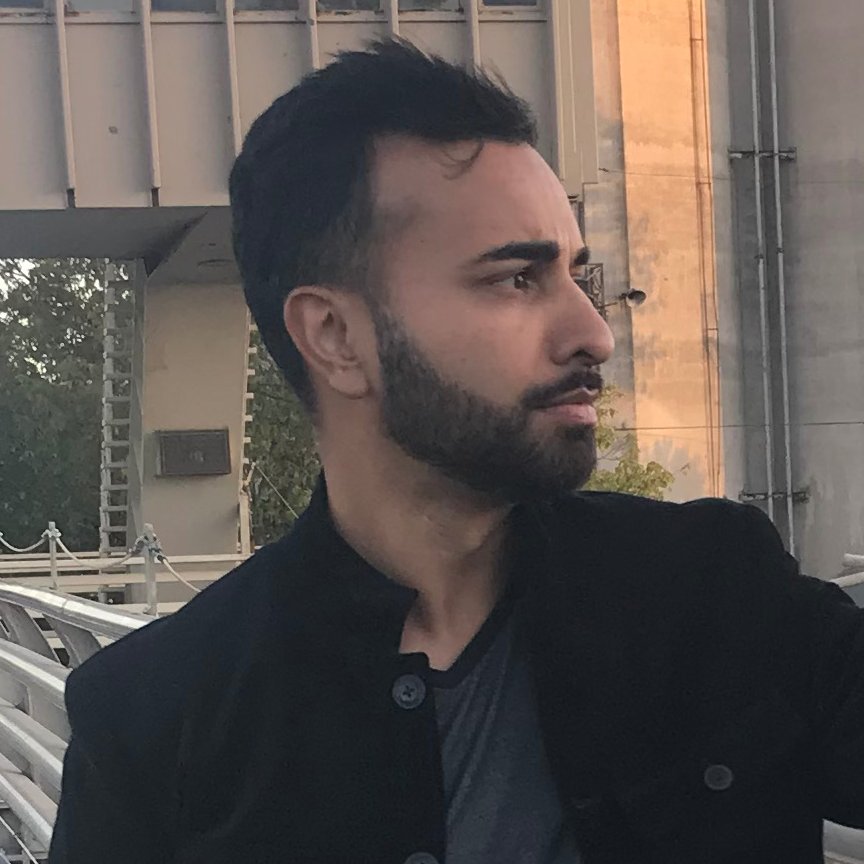

Event Details
Monthly Meetups are held on the third Tuesday of every month, 7.30-9.00pm UK time in central London. Meetups are run by Ali Malik. This month’s meet up is with Sohail Ahmad
Event Details
Monthly Meetups are held on the third Tuesday of every month, 7.30-9.00pm UK time in central London. Meetups are run by Ali Malik.
This month’s meet up is with Sohail Ahmad of ReasonOnFaith.org.
Since space is limited due to Covid regulations, please RSVP with ali.malik@council-of-ex-muslims-of-britain-e5a565.ingress-baronn.ewp.live.
Time
(Tuesday) 7:30 pm - 9:00 pm
february 2022
2022mon07feb6:30 pmmon8:00 pmFebruary Online Support Group Session6:30 pm - 8:00 pm















































































































Event Details
Join monthly support groups to talk about issues that affect ex-Muslims. CEMB currently has two 90-minute online sessions on the first Monday and Tuesday of every month, 6.30-8.00pm UK time. The
Event Details
Join monthly support groups to talk about issues that affect ex-Muslims.
CEMB currently has two 90-minute online sessions on the first Monday and Tuesday of every month, 6.30-8.00pm UK time. The sessions are led by Counselling Psychologist Dr SAVIN BAPIR-TARDY.
If you have never attended a session before, please email hello@council-of-ex-muslims-of-britain-e5a565.ingress-baronn.ewp.live.
Time
(Monday) 6:30 pm - 8:00 pm
2022tue08feb6:30 pmtue8:00 pmFebruary Online Support Group Session6:30 pm - 8:00 pm















































































































Event Details
Join monthly support groups to talk about issues that affect ex-Muslims. CEMB currently has two 90-minute online sessions on the first Monday and Tuesday of every month, 6.30-8.00pm UK time. The
Event Details
Join monthly support groups to talk about issues that affect ex-Muslims.
CEMB currently has two 90-minute online sessions on the first Monday and Tuesday of every month, 6.30-8.00pm UK time. The sessions are led by Counselling Psychologist Dr SAVIN BAPIR-TARDY.
If you have never attended a session before, please email hello@council-of-ex-muslims-of-britain-e5a565.ingress-baronn.ewp.live.
Time
(Tuesday) 6:30 pm - 8:00 pm
2022tue15feb7:30 pmtue9:00 pmFebruary 2022 Monthly Meetup with Khadija Khan7:30 pm - 9:00 pm


Event Details
Monthly Meetups are held on the third Tuesday of every month, 7.30-9.00pm UK time in central London. Meetups are run by Ali Malik. Khadija Khan is a Pakistani journalist and a
Event Details
Monthly Meetups are held on the third Tuesday of every month, 7.30-9.00pm UK time in central London. Meetups are run by Ali Malik.
Khadija Khan is a Pakistani journalist and a commentator currently based in the UK. She writes about human rights, mainly women’s rights, as well as minorities, extremism, and Islamism. She is an advocate for women’s rights, strongly believes that religion infringes women’s rights and
Islam is no exception. She denounces the idea of Islamic feminism, since finding refuge for women’s rights under organised religion is not more
than a myth. Being a humanist, she believes in tolerance and equality for all human beings. She criticizes the usage of blasphemy laws as a
tool to crack down on dissent and supports freedom of and from religion. She stresses the need for having freedom of speech to counter extremist
ideologies in her write-ups. She believes that freedom to challenge bad ideas is the most effective way to counter extremist narratives.
Since space is limited due to Covid regulations, please RSVP with ali.malik@council-of-ex-muslims-of-britain-e5a565.ingress-baronn.ewp.live.
more
Time
(Tuesday) 7:30 pm - 9:00 pm
march 2022
2022mon07mar6:30 pmmon8:00 pmMarch Online Support Group Session6:30 pm - 8:00 pm















































































































Event Details
Join monthly support groups to talk about issues that affect ex-Muslims. CEMB currently has two 90-minute online sessions on the first Monday and Tuesday of every month, 6.30-8.00pm UK time. The
Event Details
Join monthly support groups to talk about issues that affect ex-Muslims.
CEMB currently has two 90-minute online sessions on the first Monday and Tuesday of every month, 6.30-8.00pm UK time. The sessions are led by Counselling Psychologist Dr SAVIN BAPIR-TARDY.
If you have never attended a session before, please email hello@council-of-ex-muslims-of-britain-e5a565.ingress-baronn.ewp.live.
Time
(Monday) 6:30 pm - 8:00 pm
2022tue08mar6:30 pmtue8:00 pmMarch Online Support Group Session6:30 pm - 8:00 pm















































































































Event Details
Join monthly support groups to talk about issues that affect ex-Muslims. CEMB currently has two 90-minute online sessions on the first Monday and Tuesday of every month, 6.30-8.00pm UK time. The
Event Details
Join monthly support groups to talk about issues that affect ex-Muslims.
CEMB currently has two 90-minute online sessions on the first Monday and Tuesday of every month, 6.30-8.00pm UK time. The sessions are led by Counselling Psychologist Dr SAVIN BAPIR-TARDY.
If you have never attended a session before, please email hello@council-of-ex-muslims-of-britain-e5a565.ingress-baronn.ewp.live.
Time
(Tuesday) 6:30 pm - 8:00 pm
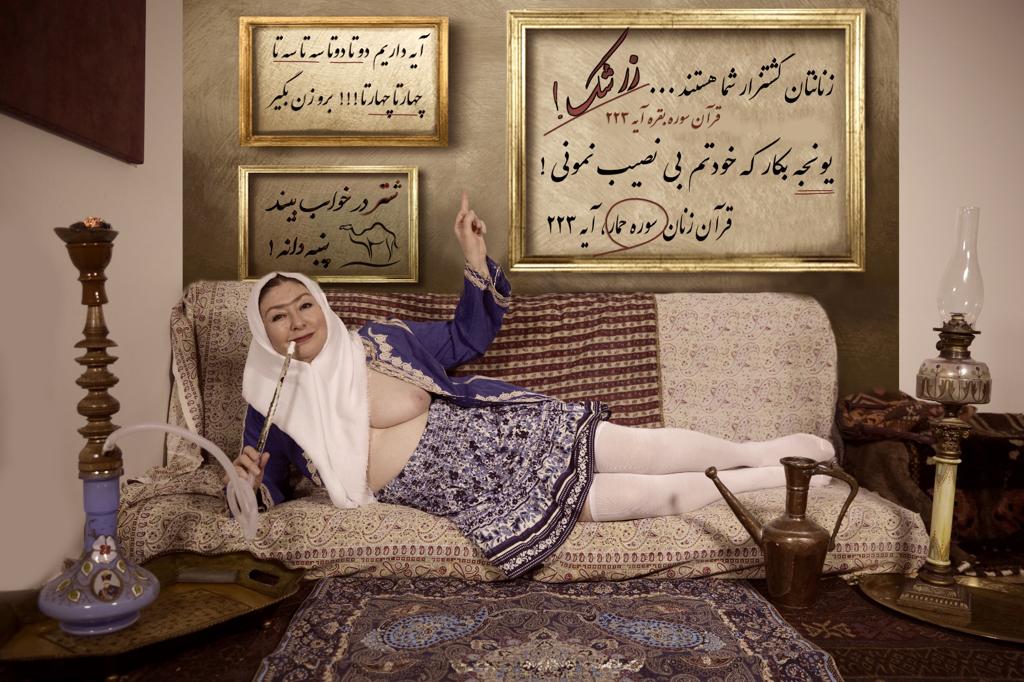

Event Details
UK: 19:00-20:00pm, UK time Women’s bodies as political tools against Islamism and in defence of secularism In English Speakers: Victoria Gugenheim: Body Artist. Passionate about the necessity of and is merging, art with science. Rahila
Event Details
UK: 19:00-20:00pm, UK time
Women’s bodies as political tools against Islamism and in defence of secularism
In English
Speakers:
Victoria Gugenheim: Body Artist. Passionate about the necessity of and is merging, art with science.
Rahila Gupta: Journalist, Writer, Poet. Acting Director of Southall Black Sisters, an advocacy and campaigning group for women escaping domestic violence.
Maryam Namazie: Iranian-born Activist and Writer and Spokesperson of Council of Ex-Muslims of Britain and One Law for All.
Jenny Wenhammar: Artist and Activist. Behavioural Scientist with focus on environmental psychology. Leader in FEMEN International.
Meeting ID:
853 3934 9360
Passcode: IWD
There are also other programmes in various languages throughout the day. See full schedule here.
more
Time
(Tuesday) 7:00 pm - 8:00 pm
2022wed23mar9:00 amwed10:00 amSoheil Arabi and Maryam Namazie live on #AtheistDay9:00 am - 10:00 am
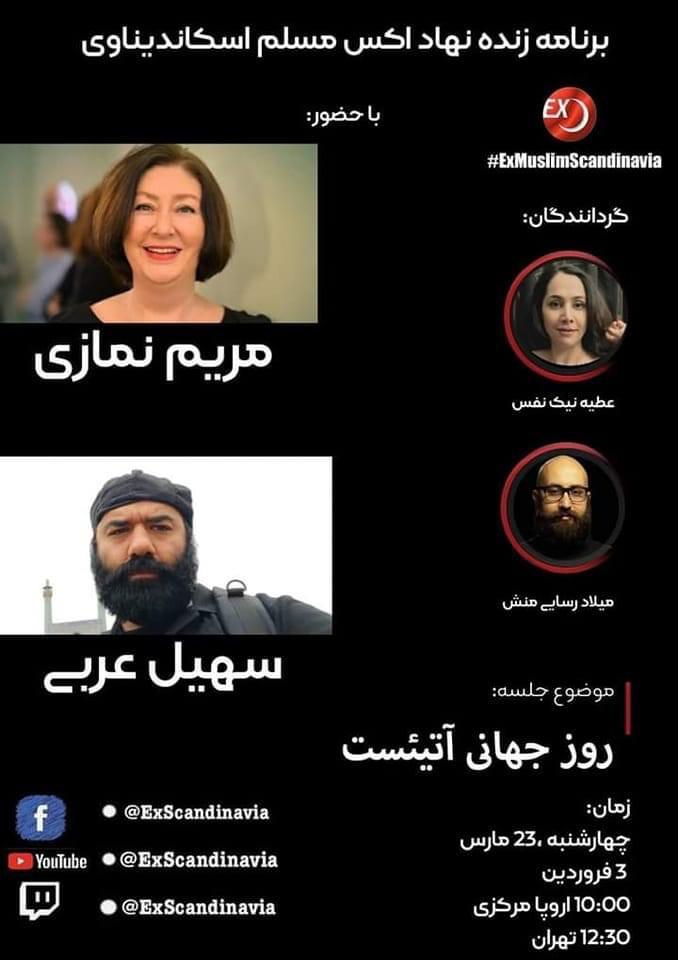

Event Details
Soheil Arabi and Maryam Namazie will be live on a special #AtheistDay programme of Ex-Muslims of Scandinavia with hosts Atieh Niknafas and Milad Resaeimanesh at 9:00am UK time, 10:00am CET,
Event Details
Soheil Arabi and Maryam Namazie will be live on a special #AtheistDay programme of Ex-Muslims of Scandinavia with hosts Atieh Niknafas and Milad Resaeimanesh at 9:00am UK time, 10:00am CET, 12:30pm Tehran time. In Persian.
See the programme here:
more
Time
(Wednesday) 9:00 am - 10:00 am
april 2022
2022mon04apr6:30 pmmon8:00 pmApril Online Support Group Session6:30 pm - 8:00 pm















































































































Event Details
Join monthly support groups to talk about issues that affect ex-Muslims. CEMB currently has two 90-minute online sessions on the first Monday and Tuesday of every month, 6.30-8.00pm UK time. The
Event Details
Join monthly support groups to talk about issues that affect ex-Muslims.
CEMB currently has two 90-minute online sessions on the first Monday and Tuesday of every month, 6.30-8.00pm UK time. The sessions are led by Counselling Psychologist Dr SAVIN BAPIR-TARDY.
If you have never attended a session before, please email hello@council-of-ex-muslims-of-britain-e5a565.ingress-baronn.ewp.live.
Time
(Monday) 6:30 pm - 8:00 pm
2022tue05apr6:30 pmtue8:00 pmApril Online Support Group Session6:30 pm - 8:00 pm















































































































Event Details
Join monthly support groups to talk about issues that affect ex-Muslims. CEMB currently has two 90-minute online sessions on the first Monday and Tuesday of every month, 6.30-8.00pm UK time. The
Event Details
Join monthly support groups to talk about issues that affect ex-Muslims.
CEMB currently has two 90-minute online sessions on the first Monday and Tuesday of every month, 6.30-8.00pm UK time. The sessions are led by Counselling Psychologist Dr SAVIN BAPIR-TARDY.
If you have never attended a session before, please email hello@council-of-ex-muslims-of-britain-e5a565.ingress-baronn.ewp.live.
Time
(Tuesday) 6:30 pm - 8:00 pm
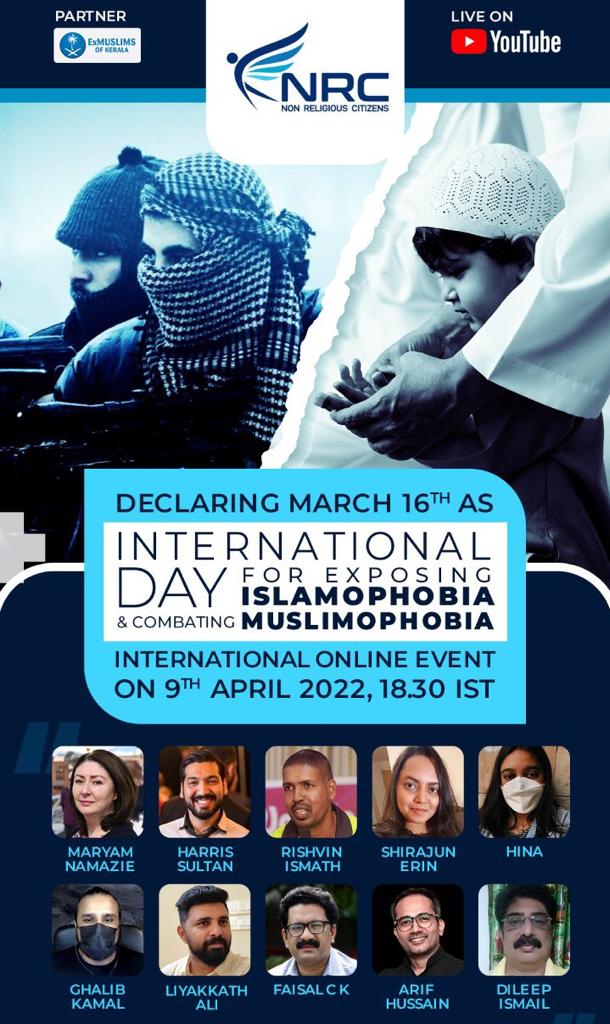

Event Details
Declaring March 16 as International day for “Exposing ISLAMOPHOBIA and combating MUSLIMOPHOBIA” Online event on April 9th – 18.30 IST Will be live on YouTube @nrcindiaorg Collab with @keralaexmuslims
Event Details
Declaring March 16 as International day for “Exposing ISLAMOPHOBIA and combating MUSLIMOPHOBIA”
Online event on April 9th – 18.30 IST
Will be live on YouTube @nrcindiaorg
Collab with @keralaexmuslims
Time
(Saturday) 2:00 pm - 3:30 pm
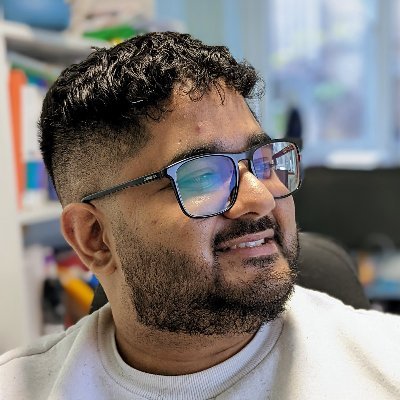

Event Details
Monthly Meetups are held on the third Tuesday of every month, 7.30-9.00pm UK time in central London. Meetups are run by Ali Malik. This month’s meet up on LGBT and
Event Details
Monthly Meetups are held on the third Tuesday of every month, 7.30-9.00pm UK time in central London. Meetups are run by Ali Malik. This month’s meet up on LGBT and Ex-Muslim with Sohail Ahmed is a reformed former radical Islamist who was at one point on the cusp of carrying out violence in his home city, London. Raised in an extreme and austere form of Islam, he was taught to hate non-Muslims and even other Muslims who happened to follow a different form of Islam. Eventually he began to question the beliefs he had been raised with and stopped believing in Islam altogether. He now considers himself to be a Cultural Muslim who rejects the truth claims of Islam whilst still retaining a connection with its culture and practices. He now works in the fields of counter-extremism, counter-terrorism, and social integration. He has featured in the media and has written for a number of publications exploring his personal journey, LGBT rights in the Muslim world, and Islamic extremism in particular.
Since space is limited due to Covid regulations, please RSVP with ali.malik@council-of-ex-muslims-of-britain-e5a565.ingress-baronn.ewp.live.
more
Time
(Tuesday) 7:30 pm - 9:00 pm
may 2022
2022mon02may6:30 pmmon8:00 pmMay Online Support Group Session6:30 pm - 8:00 pm















































































































Event Details
Join monthly support groups to talk about issues that affect ex-Muslims. CEMB currently has two 90-minute online sessions on the first Monday and Tuesday of every month, 6.30-8.00pm UK time. The
Event Details
Join monthly support groups to talk about issues that affect ex-Muslims.
CEMB currently has two 90-minute online sessions on the first Monday and Tuesday of every month, 6.30-8.00pm UK time. The sessions are led by Counselling Psychologist Dr SAVIN BAPIR-TARDY.
If you have never attended a session before, please email hello@council-of-ex-muslims-of-britain-e5a565.ingress-baronn.ewp.live.
Time
(Monday) 6:30 pm - 8:00 pm
2022tue03may6:30 pmtue8:00 pmMay Online Support Group Session6:30 pm - 8:00 pm















































































































Event Details
Join monthly support groups to talk about issues that affect ex-Muslims. CEMB currently has two 90-minute online sessions on the first Monday and Tuesday of every month, 6.30-8.00pm UK time. The
Event Details
Join monthly support groups to talk about issues that affect ex-Muslims.
CEMB currently has two 90-minute online sessions on the first Monday and Tuesday of every month, 6.30-8.00pm UK time. The sessions are led by Counselling Psychologist Dr SAVIN BAPIR-TARDY.
If you have never attended a session before, please email hello@council-of-ex-muslims-of-britain-e5a565.ingress-baronn.ewp.live.
Time
(Tuesday) 6:30 pm - 8:00 pm
2022tue17may7:30 pmtue9:00 pmMay 2022 Monthly Meetup7:30 pm - 9:00 pm


Event Details
Monthly Meetups are held on the third Tuesday of every month, 7.30-9.00pm UK time in central London. Meetups are run by Ali Malik. Since space is limited due to Covid regulations,
Event Details
Monthly Meetups are held on the third Tuesday of every month, 7.30-9.00pm UK time in central London. Meetups are run by Ali Malik.
Since space is limited due to Covid regulations, please RSVP with ali.malik@council-of-ex-muslims-of-britain-e5a565.ingress-baronn.ewp.live.
Time
(Tuesday) 7:30 pm - 9:00 pm
june 2022
2022mon06jun(jun 6)6:30 pmtue07(jun 7)8:00 pmJune Online Support Group Session6:30 pm - 8:00 pm (7)















































































































Event Details
Join monthly support groups to talk about issues that affect ex-Muslims. CEMB currently has two 90-minute online sessions on the first Monday and Tuesday of every month, 6.30-8.00pm UK time. The
Event Details
Join monthly support groups to talk about issues that affect ex-Muslims.
CEMB currently has two 90-minute online sessions on the first Monday and Tuesday of every month, 6.30-8.00pm UK time. The sessions are led by Counselling Psychologist Dr SAVIN BAPIR-TARDY.
If you have never attended a session before, please email hello@council-of-ex-muslims-of-britain-e5a565.ingress-baronn.ewp.live.
Time
6 (Monday) 6:30 pm - 7 (Tuesday) 8:00 pm
2022tue07jun6:30 pmtue8:00 pmJune Online Support Group Session6:30 pm - 8:00 pm















































































































Event Details
Join monthly support groups to talk about issues that affect ex-Muslims. CEMB currently has two 90-minute online sessions on the first Monday and Tuesday of every month, 6.30-8.00pm UK time. The
Event Details
Join monthly support groups to talk about issues that affect ex-Muslims.
CEMB currently has two 90-minute online sessions on the first Monday and Tuesday of every month, 6.30-8.00pm UK time. The sessions are led by Counselling Psychologist Dr SAVIN BAPIR-TARDY.
If you have never attended a session before, please email hello@council-of-ex-muslims-of-britain-e5a565.ingress-baronn.ewp.live.
Time
(Tuesday) 6:30 pm - 8:00 pm
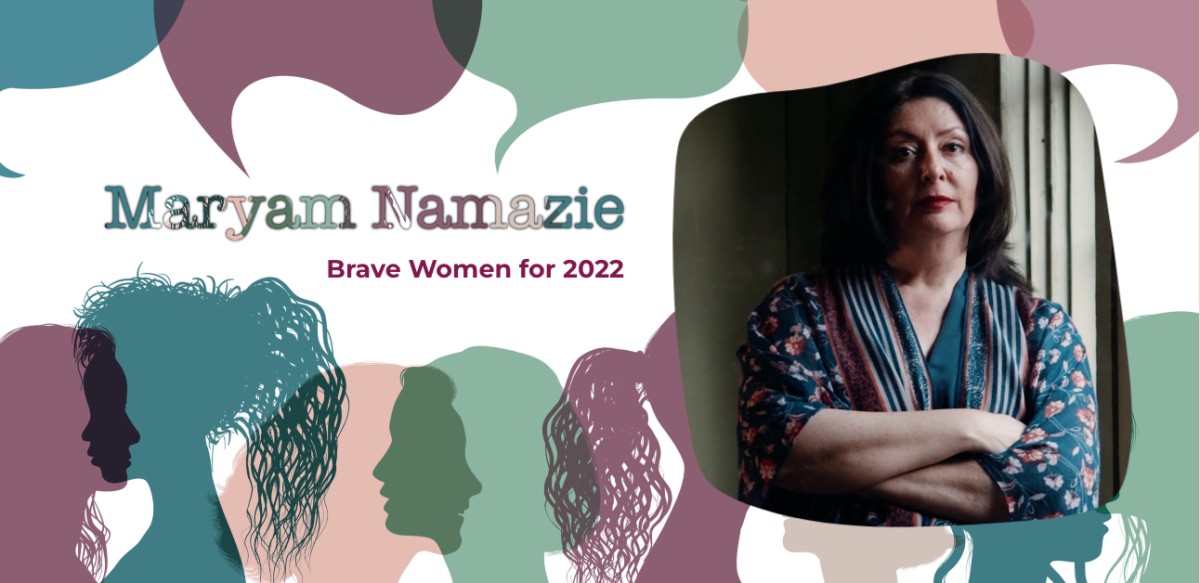

Event Details
Maryam Namazie will be speaking on Blasphemous Women on 13 June 2022 at 6pm UK time. Organised by Center for Civil Courage from Croatia and Women’s Solidarity from Serbia, Brave Women
Event Details
Maryam Namazie will be speaking on Blasphemous Women on 13 June 2022 at 6pm UK time.
Organised by Center for Civil Courage from Croatia and Women’s Solidarity from Serbia, Brave Women for 2022 presents courageous women from all over the world whose thoughts and deeds encourage us every day in our struggle for women’s liberation.
To register for the talk, click here.
more
Time
(Monday) 6:00 pm - 7:00 pm
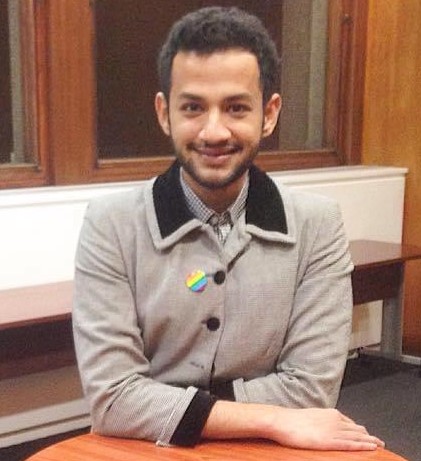

Event Details
Monthly Meetups are held on the third Tuesday of every month, 7.30-9.00pm UK time in central London. Meetups are run by Ali Malik. Topic: Living on Periphery: Queer Bodies under the
Event Details
Monthly Meetups are held on the third Tuesday of every month, 7.30-9.00pm UK time in central London. Meetups are run by Ali Malik.
Topic: Living on Periphery: Queer Bodies under the Islamic Rule
With: Usmann Rana, a Queer Activist and Rationalist who lives in London.
Since space is limited due to Covid regulations, please RSVP with ali.malik@council-of-ex-muslims-of-britain-e5a565.ingress-baronn.ewp.live.
Time
(Tuesday) 7:30 pm - 9:00 pm
2022thu30junAll DayOn Nude Protest in Clubhouse(All Day: thursday)
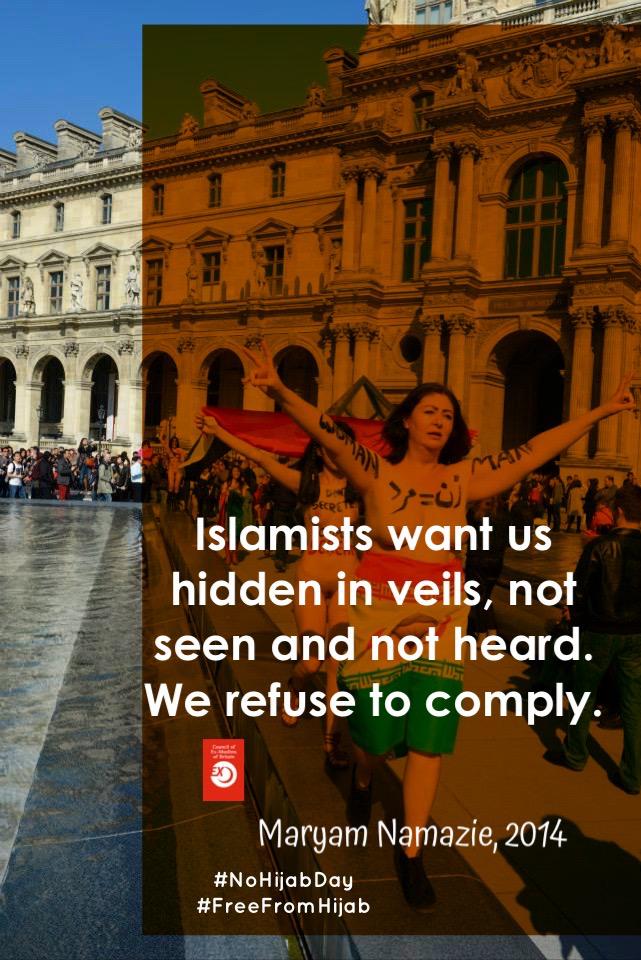

Event Details
Maryam Namazie speaks in ClubHouse on the taboo-breaking actions of Nude Protest. In Persian. More details to follow.
Event Details
Maryam Namazie speaks in ClubHouse on the taboo-breaking actions of Nude Protest. In Persian. More details to follow.
Time
All Day (Thursday)
july 2022
2022sat02julAll DayCEMB Joins Pride in London(All Day: saturday)
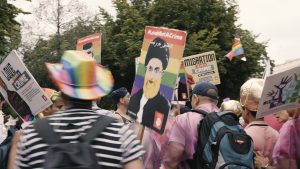

Event Details
CEMB will be marching in Pride in London on 2 July 2022. Due to Pride in London restrictions, only 50 can join CEMB in the march. If you are interested in
Event Details
CEMB will be marching in Pride in London on 2 July 2022. Due to Pride in London restrictions, only 50 can join CEMB in the march.
If you are interested in marching with us, please register your interest with Ali Malik at hello@council-of-ex-muslims-of-britain-e5a565.ingress-baronn.ewp.live.
Time
All Day (Saturday)
2022mon04jul6:30 pmmon8:00 pmJuly Online Support Group Session6:30 pm - 8:00 pm















































































































Event Details
Join monthly support groups to talk about issues that affect ex-Muslims. CEMB currently has two 90-minute online sessions on the first Monday and Tuesday of every month, 6.30-8.00pm UK time. The
Event Details
Join monthly support groups to talk about issues that affect ex-Muslims.
CEMB currently has two 90-minute online sessions on the first Monday and Tuesday of every month, 6.30-8.00pm UK time. The sessions are led by Counselling Psychologist Dr SAVIN BAPIR-TARDY.
If you have never attended a session before, please email hello@council-of-ex-muslims-of-britain-e5a565.ingress-baronn.ewp.live.
Time
(Monday) 6:30 pm - 8:00 pm
2022tue05jul6:30 pmtue8:00 pmJuly Online Support Group Session6:30 pm - 8:00 pm















































































































Event Details
Join monthly support groups to talk about issues that affect ex-Muslims. CEMB currently has two 90-minute online sessions on the first Monday and Tuesday of every month, 6.30-8.00pm UK time. The
Event Details
Join monthly support groups to talk about issues that affect ex-Muslims.
CEMB currently has two 90-minute online sessions on the first Monday and Tuesday of every month, 6.30-8.00pm UK time. The sessions are led by Counselling Psychologist Dr SAVIN BAPIR-TARDY.
If you have never attended a session before, please email hello@council-of-ex-muslims-of-britain-e5a565.ingress-baronn.ewp.live.
Time
(Tuesday) 6:30 pm - 8:00 pm
august 2022
2022mon15aug6:30 pmmon8:00 pmAugust Online Support Group Session6:30 pm - 8:00 pm















































































































Event Details
Join monthly support groups to talk about issues that affect ex-Muslims. CEMB currently has two 90-minute online sessions on a Monday and Tuesday in August, 6.30-8.00pm UK time. The sessions are
Event Details
Join monthly support groups to talk about issues that affect ex-Muslims.
CEMB currently has two 90-minute online sessions on a Monday and Tuesday in August, 6.30-8.00pm UK time. The sessions are led by Counselling Psychologist Dr SAVIN BAPIR-TARDY.
If you have never attended a session before, please email hello@council-of-ex-muslims-of-britain-e5a565.ingress-baronn.ewp.live.
Time
(Monday) 6:30 pm - 8:00 pm
2022tue16aug6:30 pmtue8:00 pmAugust Online Support Group Session6:30 pm - 8:00 pm















































































































Event Details
Join monthly support groups to talk about issues that affect ex-Muslims. CEMB currently has two 90-minute online sessions on a Monday and Tuesday in August, 6.30-8.00pm UK time. The sessions are
Event Details
Join monthly support groups to talk about issues that affect ex-Muslims.
CEMB currently has two 90-minute online sessions on a Monday and Tuesday in August, 6.30-8.00pm UK time. The sessions are led by Counselling Psychologist Dr SAVIN BAPIR-TARDY.
If you have never attended a session before, please email hello@council-of-ex-muslims-of-britain-e5a565.ingress-baronn.ewp.live.
Time
(Tuesday) 6:30 pm - 8:00 pm
2022sat20augAll Daysun21Celebrating Dissent 2022(All Day)
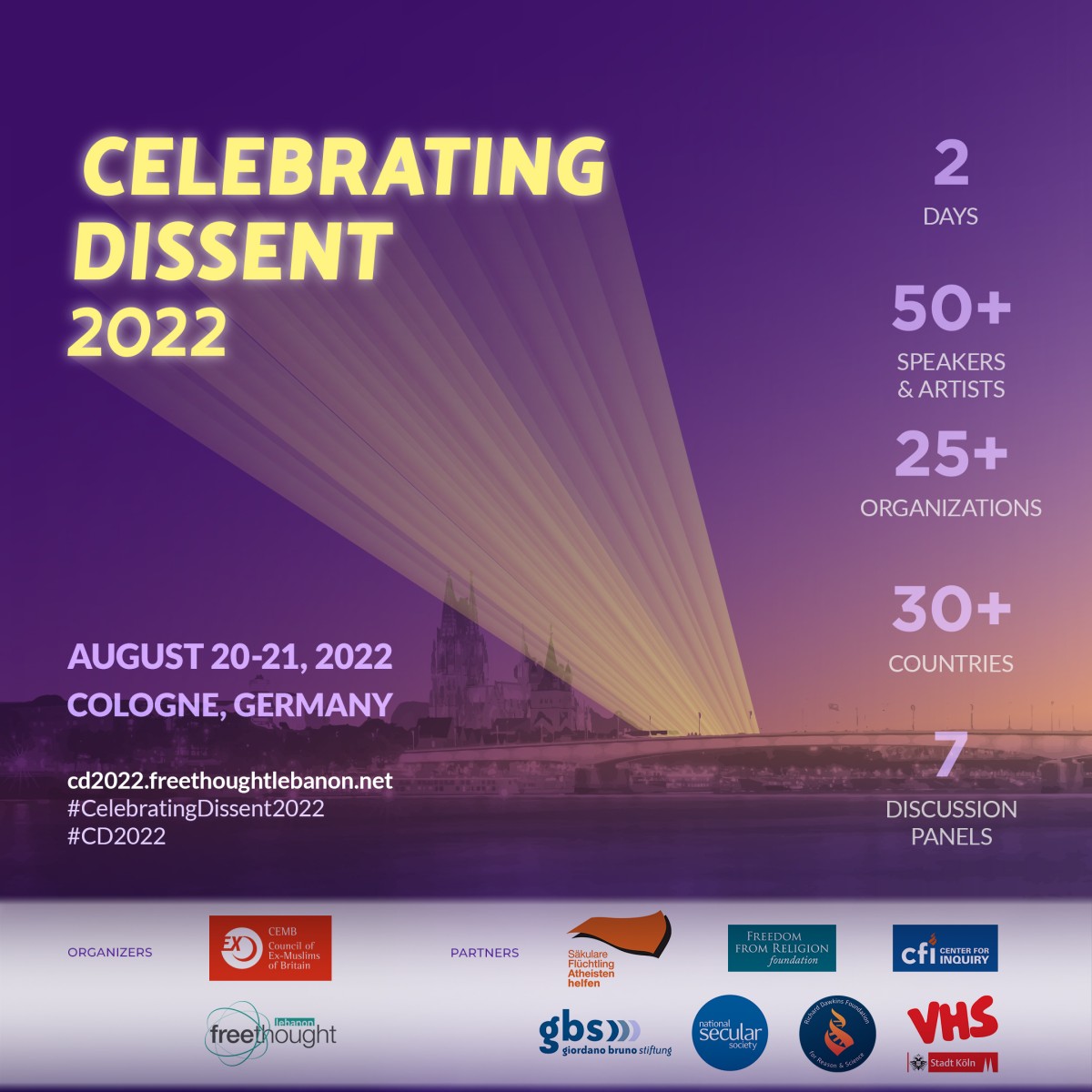

Event Details
#CelebratingDissent2022 will be held in Cologne, Germany during 21-22 August 2022 with over 50 speakers from 30 countries in the largest gathering of #exMuslims, #atheists and #freethinkers since lockdown. It
Event Details
#CelebratingDissent2022 will be held in Cologne, Germany during 21-22 August 2022 with over 50 speakers from 30 countries in the largest gathering of #exMuslims, #atheists and #freethinkers since lockdown. It follows from the highly successful Celebrating Dissent Festival in Amsterdam in 2019 and the Freedom of Conscience and Expression conference in London in 2017.
The two-day event is organised by the Council of Ex-Muslims of Britain and Freethought Lebanon and in partnership with Atheist Refugee Relief (Säkulare Flüchtlingshilfe Deutschland), Center for Inquiry, Freedom From Religion Foundation, Giordano Bruno Stiftung, National Secular Society and Volkshochschule Köln (VHS Köln).
More info can be found on the conference website.
more
Time
august 20 (Saturday) - 21 (Sunday)
september 2022
2022mon05sep6:30 pmmon8:00 pmSeptember Online Support Group Session6:30 pm - 8:00 pm















































































































Event Details
Join monthly support groups to talk about issues that affect ex-Muslims. CEMB currently has two 90-minute online sessions on the first Monday and Tuesday of every month, 6.30-8.00pm UK time. The
Event Details
Join monthly support groups to talk about issues that affect ex-Muslims.
CEMB currently has two 90-minute online sessions on the first Monday and Tuesday of every month, 6.30-8.00pm UK time. The sessions are led by Counselling Psychologist Dr SAVIN BAPIR-TARDY.
If you have never attended a session before, please email hello@council-of-ex-muslims-of-britain-e5a565.ingress-baronn.ewp.live.
Time
(Monday) 6:30 pm - 8:00 pm
2022tue06sep6:30 pmtue8:00 pmSeptember Online Support Group Session6:30 pm - 8:00 pm















































































































Event Details
Join monthly support groups to talk about issues that affect ex-Muslims. CEMB currently has two 90-minute online sessions on the first Monday and Tuesday of every month, 6.30-8.00pm UK time. The
Event Details
Join monthly support groups to talk about issues that affect ex-Muslims.
CEMB currently has two 90-minute online sessions on the first Monday and Tuesday of every month, 6.30-8.00pm UK time. The sessions are led by Counselling Psychologist Dr SAVIN BAPIR-TARDY.
If you have never attended a session before, please email hello@council-of-ex-muslims-of-britain-e5a565.ingress-baronn.ewp.live.
Time
(Tuesday) 6:30 pm - 8:00 pm
2022sat10sep7:00 pmsat1:17 amIBKA-Sapio Award to Maryam Namazie7:00 pm - 1:17 am
Event Details
10 September 2022, Cologne IBKA-Sapio Award to Maryam Namazie. More information.
Event Details
10 September 2022, Cologne
IBKA-Sapio Award to Maryam Namazie. More information.
Time
(Saturday) 7:00 pm - 1:17 am
october 2022
2022mon03oct6:30 pmmon8:00 pmOctober Online Support Group Session6:30 pm - 8:00 pm















































































































Event Details
Join monthly support groups to talk about issues that affect ex-Muslims. CEMB currently has two 90-minute online sessions on the first Monday and Tuesday of every month, 6.30-8.00pm UK time. The
Event Details
Join monthly support groups to talk about issues that affect ex-Muslims.
CEMB currently has two 90-minute online sessions on the first Monday and Tuesday of every month, 6.30-8.00pm UK time. The sessions are led by Counselling Psychologist Dr SAVIN BAPIR-TARDY.
If you have never attended a session before, please email hello@council-of-ex-muslims-of-britain-e5a565.ingress-baronn.ewp.live.
Time
(Monday) 6:30 pm - 8:00 pm
2022tue04oct6:30 pmtue8:00 pmOctober Online Support Group Session6:30 pm - 8:00 pm















































































































Event Details
Join monthly support groups to talk about issues that affect ex-Muslims. CEMB currently has two 90-minute online sessions on the first Monday and Tuesday of every month, 6.30-8.00pm UK time. The
Event Details
Join monthly support groups to talk about issues that affect ex-Muslims.
CEMB currently has two 90-minute online sessions on the first Monday and Tuesday of every month, 6.30-8.00pm UK time. The sessions are led by Counselling Psychologist Dr SAVIN BAPIR-TARDY.
If you have never attended a session before, please email hello@council-of-ex-muslims-of-britain-e5a565.ingress-baronn.ewp.live.
Time
(Tuesday) 6:30 pm - 8:00 pm
2022sat22octAll Daymon24FiLiA Women's Liberation Conference(All Day)
Event Details
22-24 October 2022 FiLiA 2022 More information here.
Event Details
Time
october 22 (Saturday) - 24 (Monday)
november 2022
2022tue01nov6:00 pmtue7:30 pmHow should UK respond to Iran's Women's Revolution6:00 pm - 7:30 pm
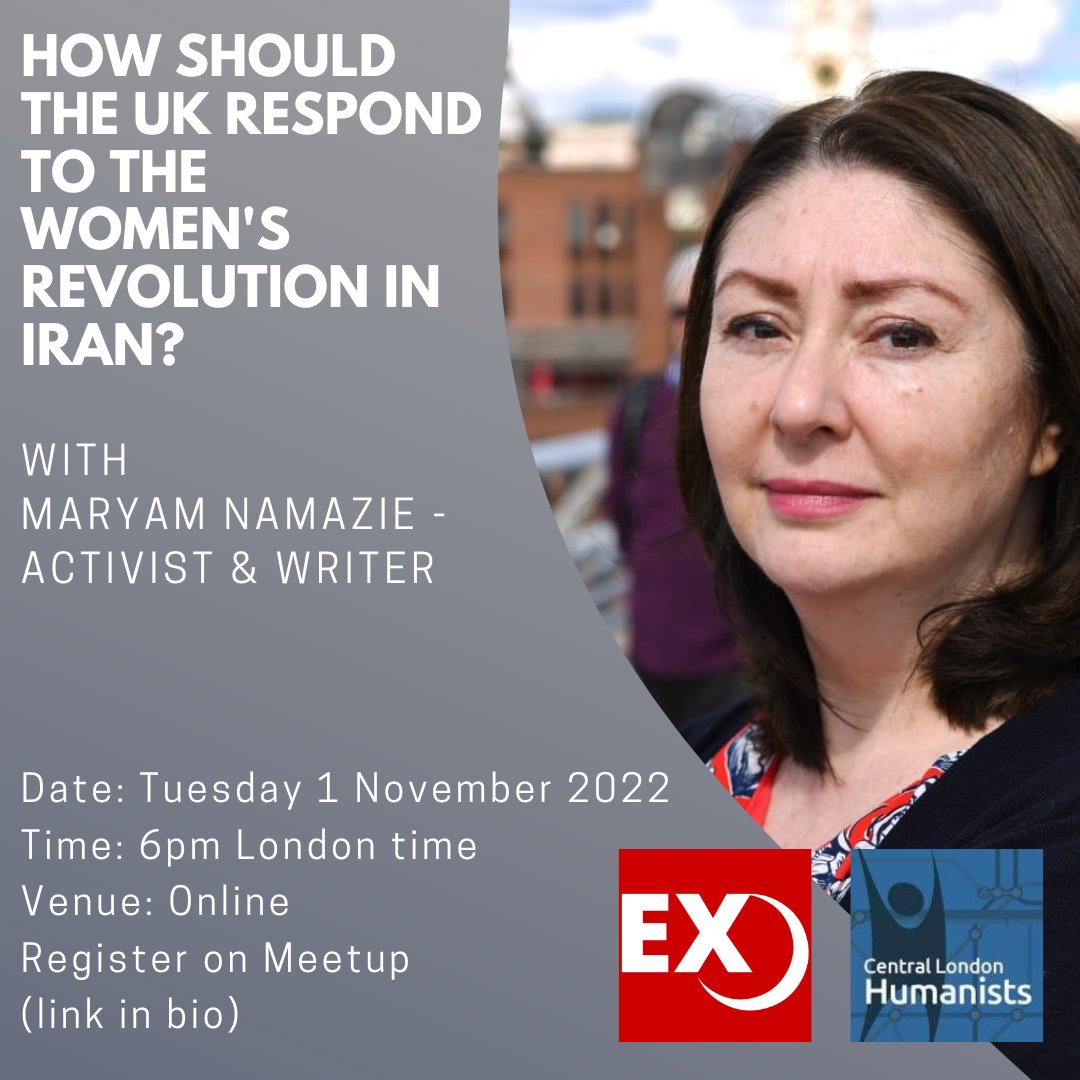

Event Details
CLH & the Council of Ex-Muslims of Britain invite you to this talk on the human rights situation in Iran highlighted in recent weeks by
Event Details
CLH & the Council of Ex-Muslims of Britain invite you to this talk on the human rights situation in Iran highlighted in recent weeks by the death of Mahsa Amini. Sign up
#Mahsa_Amini
Time
(Tuesday) 6:00 pm - 7:30 pm
2022mon07nov6:30 pmmon8:00 pmNovember Online Support Group Session6:30 pm - 8:00 pm















































































































Event Details
Join monthly support groups to talk about issues that affect ex-Muslims. CEMB currently has two 90-minute online sessions on the first Monday and Tuesday of every month, 6.30-8.00pm UK time. The
Event Details
Join monthly support groups to talk about issues that affect ex-Muslims.
CEMB currently has two 90-minute online sessions on the first Monday and Tuesday of every month, 6.30-8.00pm UK time. The sessions are led by Counselling Psychologist Dr SAVIN BAPIR-TARDY.
If you have never attended a session before, please email hello@council-of-ex-muslims-of-britain-e5a565.ingress-baronn.ewp.live.
Time
(Monday) 6:30 pm - 8:00 pm
2022tue08nov6:30 pmtue8:00 pmNovember Online Support Group Session6:30 pm - 8:00 pm















































































































Event Details
Join monthly support groups to talk about issues that affect ex-Muslims. CEMB currently has two 90-minute online sessions on the first Monday and Tuesday of every month, 6.30-8.00pm UK time. The
Event Details
Join monthly support groups to talk about issues that affect ex-Muslims.
CEMB currently has two 90-minute online sessions on the first Monday and Tuesday of every month, 6.30-8.00pm UK time. The sessions are led by Counselling Psychologist Dr SAVIN BAPIR-TARDY.
If you have never attended a session before, please email hello@council-of-ex-muslims-of-britain-e5a565.ingress-baronn.ewp.live.
Time
(Tuesday) 6:30 pm - 8:00 pm
2022sat12nov1:19 amsat1:19 amNacht van de vrijdenker, Ghent1:19 am - 1:19 am
Event Details
12 November 2022, Ghent Nacht van de vrijdenker. More information.
Event Details
12 November 2022, Ghent
Nacht van de vrijdenker. More information.
Time
(Saturday) 1:19 am - 1:19 am
december 2022
2022mon05dec6:30 pmmon8:00 pmDecember Online Support Group Session6:30 pm - 8:00 pm















































































































Event Details
Join monthly support groups to talk about issues that affect ex-Muslims. CEMB currently has two 90-minute online sessions on the first Monday and Tuesday of every month, 6.30-8.00pm UK time. The
Event Details
Join monthly support groups to talk about issues that affect ex-Muslims.
CEMB currently has two 90-minute online sessions on the first Monday and Tuesday of every month, 6.30-8.00pm UK time. The sessions are led by Counselling Psychologist Dr SAVIN BAPIR-TARDY.
If you have never attended a session before, please email hello@council-of-ex-muslims-of-britain-e5a565.ingress-baronn.ewp.live.
Time
(Monday) 6:30 pm - 8:00 pm















































































































Event Details
Join monthly support groups to talk about issues that affect ex-Muslims. CEMB currently has two 90-minute online sessions on the first Monday and Tuesday of every month, 6.30-8.00pm UK time. The
Event Details
Join monthly support groups to talk about issues that affect ex-Muslims.
CEMB currently has two 90-minute online sessions on the first Monday and Tuesday of every month, 6.30-8.00pm UK time. The sessions are led by Counselling Psychologist Dr SAVIN BAPIR-TARDY.
If you have never attended a session before, please email hello@council-of-ex-muslims-of-britain-e5a565.ingress-baronn.ewp.live.
Time
6 (Tuesday) 6:30 pm - 7 (Wednesday) 8:00 pm
january 2021
2021mon04jan6:30 pmmon8:00 pmOnline Support Group6:30 pm - 8:00 pm















































































































Event Details
Join us for our monthly support group, to talk about issues that still affect us after leaving Islam. If you would like to come along, please email exmuslimcouncil@gmail.com for details of
Event Details
Join us for our monthly support group, to talk about issues that still affect us after leaving Islam.
If you would like to come along, please email exmuslimcouncil@gmail.com for details of virtual support group meeting.
Time
(Monday) 6:30 pm - 8:00 pm
2021tue05jan6:30 pmtue8:00 pmOnline Support Group6:30 pm - 8:00 pm















































































































Event Details
Join us for our monthly support group, to talk about issues that still affect us after leaving Islam. If you would like to come along, please email exmuslimcouncil@gmail.com for details of
Event Details
Join us for our monthly support group, to talk about issues that still affect us after leaving Islam.
If you would like to come along, please email exmuslimcouncil@gmail.com for details of virtual support group meeting.
Time
(Tuesday) 6:30 pm - 8:00 pm




Event Details
19 January 2021, 7.00-8.00pm UK time. Halima Salat and Mimzy Vidz speak to Ali Malik for CEMB’s monthly meetup on campaigning for #JusticeForZaraKay and #exMuslim #women. Link to live event on Youtube:
Event Details
19 January 2021, 7.00-8.00pm UK time.
Halima Salat and Mimzy Vidz speak to Ali Malik for CEMB’s monthly meetup on campaigning for #JusticeForZaraKay and #exMuslim #women.
Link to live event on Youtube: https://youtu.be/tT1a_V6yZb4
Time
(Tuesday) 7:00 pm - 8:00 pm
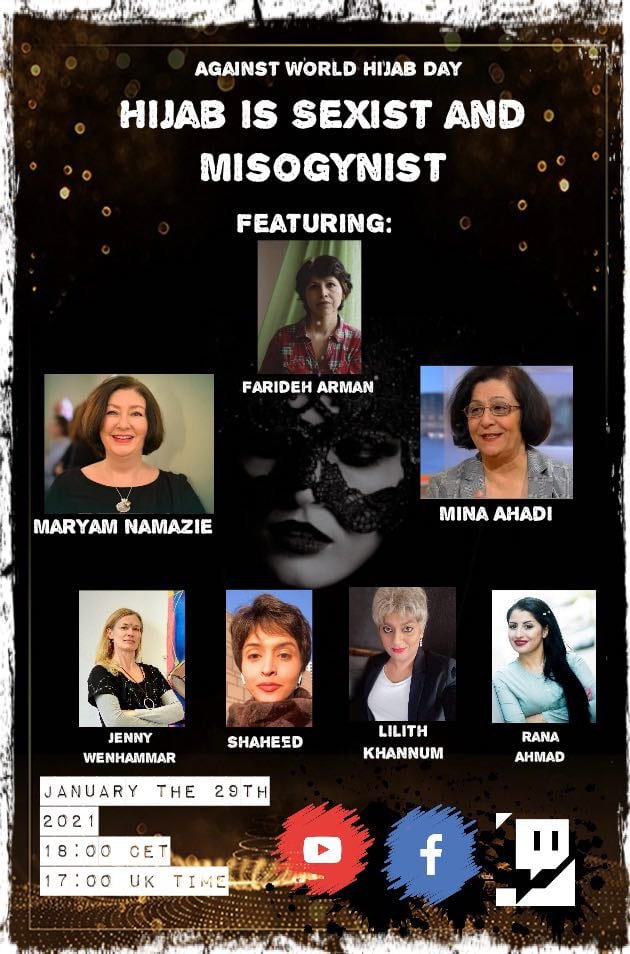

Event Details
29 January 2021, 5pm UK time Hijab is Sexist and Misogynist Online event challenging World Hijab Day
Event Details
29 January 2021, 5pm UK time
Hijab is Sexist and Misogynist
Online event challenging World Hijab Day
Time
(Friday) 5:00 pm - 6:30 pm
february 2021
2021mon01febAll DayPremiere: Women Leaving Islam(All Day: monday)
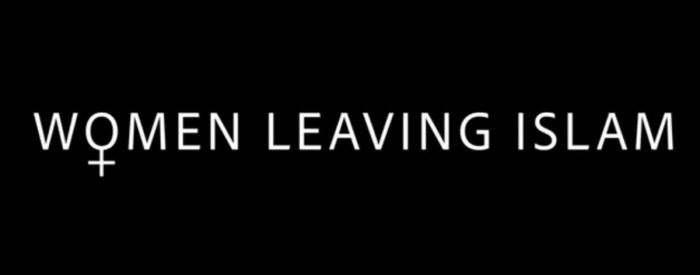

Event Details
In this powerful film, six ex-Muslim women activists share their moving stories of growing up in Muslim families and Muslim-majority countries and the violence, loss and shunning they faced because
Event Details
In this powerful film, six ex-Muslim women activists share their moving stories of growing up in Muslim families and Muslim-majority countries and the violence, loss and shunning they faced because of their scepticism and apostasy.
The women talk about everything from tearing their hijab on door handles as a child, wearing a burkini on a beach in Italy, wanting to scream their atheism in Mecca during Hajj, losing custody of a child after a husband’s accusations of blasphemy, reporting a violent fundamentalist father, forging a male guardian’s signature in order to flee their country and being shunned for defending LGBT rights…
Despite the risks, the women speak of hope, happiness and finding freedom in leaving Islam.
The brave women: Fauzia Ilyas, Fay Rahman, Halima Salat, Mimzy Vidz, Rana Ahmad and Zara Kay reside/have resided in Australia, Britain, Germany and the Netherlands. They are from backgrounds as diverse as Bangladeshi, British, Egyptian/Moroccan, Saudi, Somali/Kenyan, Pakistani and Tanzanian. The
more
Time
All Day (Monday)
2021mon01feb6:30 pmmon8:00 pmFebruary Online Support Group Session6:30 pm - 8:00 pm















































































































Event Details
Join monthly support groups to talk about issues that affect ex-Muslims. CEMB currently has two 90-minute online sessions on the first Monday and Tuesday of every month, 6.30-8.00pm UK time. The
Event Details
Join monthly support groups to talk about issues that affect ex-Muslims.
CEMB currently has two 90-minute online sessions on the first Monday and Tuesday of every month, 6.30-8.00pm UK time. The sessions are led by Counselling Psychologist Dr SAVIN BAPIR-TARDY.
If you have never attended a session before, please email hello@council-of-ex-muslims-of-britain-e5a565.ingress-baronn.ewp.live.
Time
(Monday) 6:30 pm - 8:00 pm
2021tue02feb6:30 pmtue8:00 pmFebruary Online Support Group Session6:30 pm - 8:00 pm















































































































Event Details
Join monthly support groups to talk about issues that affect ex-Muslims. CEMB currently has two 90-minute online sessions on the first Monday and Tuesday of every month, 6.30-8.00pm UK time. The
Event Details
Join monthly support groups to talk about issues that affect ex-Muslims.
CEMB currently has two 90-minute online sessions on the first Monday and Tuesday of every month, 6.30-8.00pm UK time. The sessions are led by Counselling Psychologist Dr SAVIN BAPIR-TARDY.
If you have never attended a session before, please email hello@council-of-ex-muslims-of-britain-e5a565.ingress-baronn.ewp.live.
Time
(Tuesday) 6:30 pm - 8:00 pm
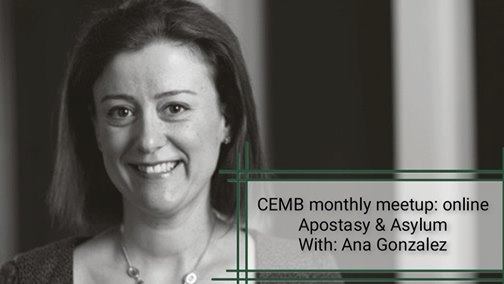

Event Details
Online Monthly Meetups are held on the third Tuesday of every month, 7.00-8.00pm UK time. Meetups are run by Ali Malik. Link to live event on Youtube and Facebook will be
Event Details
Online Monthly Meetups are held on the third Tuesday of every month, 7.00-8.00pm UK time. Meetups are run by Ali Malik.
Link to live event on Youtube and Facebook will be posted here closer to the time.
This monthly meet-up is on Apostasy and Asylum with Ana Gonzalez. Meet-ups are run by Ali Malik.
Ana Gonzalez is a solicitor and partner at Wilson Solicitors. She practises in immigration and asylum work, and has interests in human rights and European Law. Ana is an internationally recognised expert in gender and sexuality-based asylum claims as well as having extensive expertise in representing individuals from vulnerable, marginalised client groups such as victims of human trafficking, apostates and transgender individuals. Ana is frequently instructed by Local Authorities all over the Greater London area to act for children and adults in their care.
Ana is praised in Chambers and Partners for her “constant attention to cases, leading client care and real knowledge of the law.” She “continues to stand out for significant work on human trafficking cases, often raising new country guidance points” (2012). “She is a stand-out practitioner in the field of refugee law, with particular expertise in trafficking cases” (2014). She “is very experienced, passionate and has very good judgement” (2016). Ana has been described “the epitome of a fighter who cares very deeply about her clients,” in the 2019 edition.
She practises in all aspects of immigration and asylum work, and has a specialist interest in European law. Ana has extensive experience of litigating in the higher courts, having had numerous cases over the years in the Administrative Court/Upper Tribunal and Court of Appeal. She has also conducted cases in the Supreme Court and the Court of Justice of the European Union in Luxembourg.
more
Time
(Tuesday) 7:00 pm - 8:00 pm
march 2021
2021mon01mar6:30 pmmon8:00 pmMarch Online Support Group Session6:30 pm - 8:00 pm















































































































Event Details
Join monthly support groups to talk about issues that affect ex-Muslims. CEMB currently has two 90-minute online sessions on the first Monday and Tuesday of every month, 6.30-8.00pm UK time. The
Event Details
Join monthly support groups to talk about issues that affect ex-Muslims.
CEMB currently has two 90-minute online sessions on the first Monday and Tuesday of every month, 6.30-8.00pm UK time. The sessions are led by Counselling Psychologist Dr SAVIN BAPIR-TARDY.
If you have never attended a session before, please email hello@council-of-ex-muslims-of-britain-e5a565.ingress-baronn.ewp.live.
Time
(Monday) 6:30 pm - 8:00 pm
2021tue02mar6:30 pmtue8:00 pmMarch Online Support Group Session6:30 pm - 8:00 pm















































































































Event Details
Join monthly support groups to talk about issues that affect ex-Muslims. CEMB currently has two 90-minute online sessions on the first Monday and Tuesday of every month, 6.30-8.00pm UK time. The
Event Details
Join monthly support groups to talk about issues that affect ex-Muslims.
CEMB currently has two 90-minute online sessions on the first Monday and Tuesday of every month, 6.30-8.00pm UK time. The sessions are led by Counselling Psychologist Dr SAVIN BAPIR-TARDY.
If you have never attended a session before, please email hello@council-of-ex-muslims-of-britain-e5a565.ingress-baronn.ewp.live.
Time
(Tuesday) 6:30 pm - 8:00 pm




Event Details
Online Monthly Meetups are held on the third Tuesday of every month, 7.00-8.00pm UK time. Meetups are run by Ali Malik. This month’s meetup is with Khadija Khan on Religious Misogyny. Link
Event Details
Online Monthly Meetups are held on the third Tuesday of every month, 7.00-8.00pm UK time. Meetups are run by Ali Malik.
This month’s meetup is with Khadija Khan on Religious Misogyny.
Link to live event on Youtube and Facebook will be posted here closer to the time.
Khadija Khan is a Pakistani journalist and a commentator currently based in UK. She writes about human rights, mainly women’s rights, as well as minorities, extremism and Islamism. She is an advocate for women’s rights, strongly believes that religion infringes women’s rights and Islam is no exception. She denounces the idea of Islamic feminism, since finding refuge for women’s rights under organised religion is not more than a myth. Being a humanist, she believes in tolerance and equality for all human beings. She criticizes the usage of blasphemy laws as a tool to crackdown on dissent and supports freedom of and from religion. She stresses the need of having freedom of speech to counter extremist ideologies in her write ups. She believes that freedom to challenge bad idea is the most effective way to counter extremist narratives.
more
Time
(Tuesday) 7:00 pm - 8:00 pm
2021wed31mar6:56 pmwed6:56 pm100 Women Defend Rojava6:56 pm - 6:56 pm


Event Details
31 March, 100 Women Defend Rojava Women Defend Rojava UK campaign online event commemorating women killed by the femicidal Turkish state.
Event Details
31 March, 100 Women Defend Rojava
Women Defend Rojava UK campaign online event commemorating women killed by the femicidal Turkish state.
Time
(Wednesday) 6:56 pm - 6:56 pm
april 2021
2021mon12apr6:30 pmmon8:00 pmApril Online Support Group Session6:30 pm - 8:00 pm















































































































Event Details
Join monthly support groups to talk about issues that affect ex-Muslims. CEMB currently has two 90-minute online sessions on the first Monday and Tuesday of every month, 6.30-8.00pm UK time. The
Event Details
Join monthly support groups to talk about issues that affect ex-Muslims.
CEMB currently has two 90-minute online sessions on the first Monday and Tuesday of every month, 6.30-8.00pm UK time. The sessions are led by Counselling Psychologist Dr SAVIN BAPIR-TARDY. In April, the sessions will be held on 12 and 13 April due to half-term holidays.
If you have never attended a session before, please email hello@council-of-ex-muslims-of-britain-e5a565.ingress-baronn.ewp.live.
Time
(Monday) 6:30 pm - 8:00 pm
2021tue13apr6:30 pmtue8:00 pmApril Online Support Group Session6:30 pm - 8:00 pm















































































































Event Details
Join monthly support groups to talk about issues that affect ex-Muslims. CEMB currently has two 90-minute online sessions on the first Monday and Tuesday of every month, 6.30-8.00pm UK time. The
Event Details
Join monthly support groups to talk about issues that affect ex-Muslims.
CEMB currently has two 90-minute online sessions on the first Monday and Tuesday of every month, 6.30-8.00pm UK time. The sessions are led by Counselling Psychologist Dr SAVIN BAPIR-TARDY. In April, the sessions will be held on 12 and 13 April due to half-term holidays.
If you have never attended a session before, please email hello@council-of-ex-muslims-of-britain-e5a565.ingress-baronn.ewp.live.
Time
(Tuesday) 6:30 pm - 8:00 pm
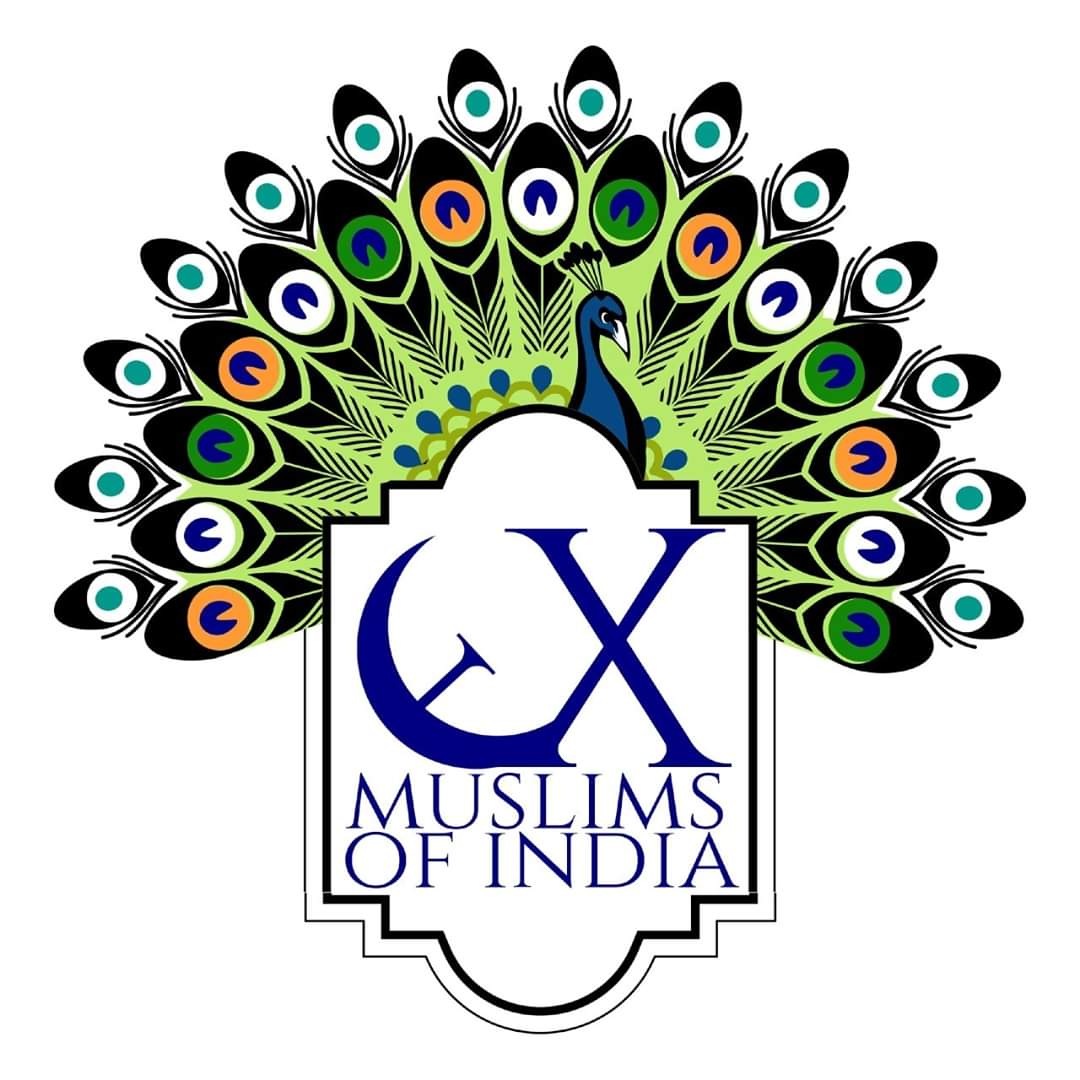

Event Details
April Online Monthly Meetup on 27 April, 7.00-8.00pm UK time. Meetups are run by Ali Malik. This meetup is on Minority Within a Minority, a conversation With Ex-Muslims of India’s
Event Details
April Online Monthly Meetup on 27 April, 7.00-8.00pm UK time. Meetups are run by Ali Malik. This meetup is on Minority Within a Minority, a conversation With Ex-Muslims of India’s Hina & Dovhakiin
Dovhakiin is a 28 year old ex-Muslim, active in atheist and ex-Muslim groups and Hina is the Founder of Ex-Muslims of India
Time
(Tuesday) 7:00 pm - 8:00 pm
may 2021
2021mon03may6:30 pmmon8:00 pmMay Online Support Group Session6:30 pm - 8:00 pm















































































































Event Details
Join monthly support groups to talk about issues that affect ex-Muslims. CEMB currently has two 90-minute online sessions on the first Monday and Tuesday of every month, 6.30-8.00pm UK time. The
Event Details
Join monthly support groups to talk about issues that affect ex-Muslims.
CEMB currently has two 90-minute online sessions on the first Monday and Tuesday of every month, 6.30-8.00pm UK time. The sessions are led by Counselling Psychologist Dr SAVIN BAPIR-TARDY.
If you have never attended a session before, please email hello@council-of-ex-muslims-of-britain-e5a565.ingress-baronn.ewp.live.
Time
(Monday) 6:30 pm - 8:00 pm
2021tue04may6:30 pmtue8:00 pmMay Online Support Group Session6:30 pm - 8:00 pm















































































































Event Details
Join monthly support groups to talk about issues that affect ex-Muslims. CEMB currently has two 90-minute online sessions on the first Monday and Tuesday of every month, 6.30-8.00pm UK time. The
Event Details
Join monthly support groups to talk about issues that affect ex-Muslims.
CEMB currently has two 90-minute online sessions on the first Monday and Tuesday of every month, 6.30-8.00pm UK time. The sessions are led by Counselling Psychologist Dr SAVIN BAPIR-TARDY.
If you have never attended a session before, please email hello@council-of-ex-muslims-of-britain-e5a565.ingress-baronn.ewp.live.
Time
(Tuesday) 6:30 pm - 8:00 pm
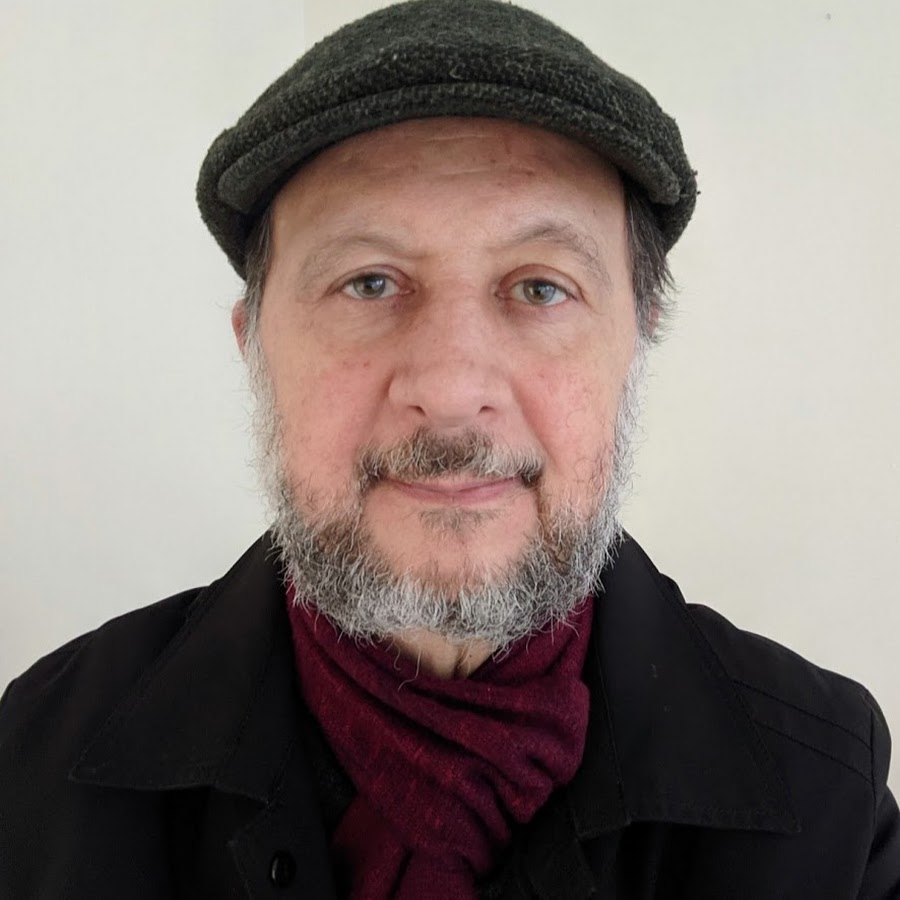

Event Details
Online Monthly Meetups are held on the third Tuesday of every month, 7.00-8.00pm UK time. Meetups are run by Ali Malik. This meetup is with Hassan Radwan on Reformation in
Event Details
Online Monthly Meetups are held on the third Tuesday of every month, 7.00-8.00pm UK time. Meetups are run by Ali Malik. This meetup is with Hassan Radwan on Reformation in Islamic History.
Link to live event on Youtube and Facebook will be posted here closer to the time.
Hassan Radwan is a graduate of SOAS University of London where his specialist subjects were Tafseer and Pre-Islamic Poetry. He spent 15 years as a teacher at the Islamia Primary School in London founded by Yusuf Islam. He has written four books for Muslim children as well as translating the book “My Ordeal with the Qur’an,” from Arabic to English. He runs the blog: Agnostic Muslim Khutbahs and founded the Agnostic Muslims & Friends group on Facebook.
more
Time
(Tuesday) 7:00 pm - 8:00 pm
2021sun30may2:00 pmsun5:00 pmCEMB Social in Regent's Park2:00 pm - 5:00 pm
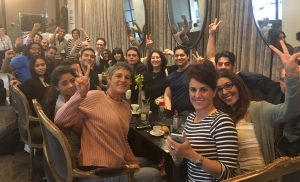



Event Details
Sunday 30th May, 2PM in Regent’s Park, CEMB Social CEMB Socials are a chance for ex-Muslims to come together and socialise without any fear of being judged about their apostasy from
Event Details
Sunday 30th May, 2PM in Regent’s Park, CEMB Social
CEMB Socials are a chance for ex-Muslims to come together and socialise without any fear of being judged about their apostasy from Islam. As we are all apostates, we understand apostasy from Islam can be a scary experience and you how difficult it can be to open up about our experiences. Join the CEMB community and meet others who’ve been thorough the same.
Contact Ali Malik at ali.malik@council-of-ex-muslims-of-britain-e5a565.ingress-baronn.ewp.live to register and for details.
Time
(Sunday) 2:00 pm - 5:00 pm
june 2021
2021mon07jun6:30 pmmon8:00 pmJune Online Support Group Session6:30 pm - 8:00 pm















































































































Event Details
Join monthly support groups to talk about issues that affect ex-Muslims. CEMB currently has two 90-minute online sessions on the first Monday and Tuesday of every month, 6.30-8.00pm UK time. The
Event Details
Join monthly support groups to talk about issues that affect ex-Muslims.
CEMB currently has two 90-minute online sessions on the first Monday and Tuesday of every month, 6.30-8.00pm UK time. The sessions are led by Counselling Psychologist Dr SAVIN BAPIR-TARDY. In June, the sessions will be held on 7 and 8 June due to half-term holidays.
If you have never attended a session before, please email hello@council-of-ex-muslims-of-britain-e5a565.ingress-baronn.ewp.live.
Time
(Monday) 6:30 pm - 8:00 pm
2021tue08jun6:30 pmtue8:00 pmJune Online Support Group Session6:30 pm - 8:00 pm















































































































Event Details
Join monthly support groups to talk about issues that affect ex-Muslims. CEMB currently has two 90-minute online sessions on the first Monday and Tuesday of every month, 6.30-8.00pm UK time. The
Event Details
Join monthly support groups to talk about issues that affect ex-Muslims.
CEMB currently has two 90-minute online sessions on the first Monday and Tuesday of every month, 6.30-8.00pm UK time. The sessions are led by Counselling Psychologist Dr SAVIN BAPIR-TARDY. In June, the sessions will be held on 7 and 8 June due to half-term holidays.
If you have never attended a session before, please email hello@council-of-ex-muslims-of-britain-e5a565.ingress-baronn.ewp.live.
Time
(Tuesday) 6:30 pm - 8:00 pm
july 2021
2021mon05jul6:30 pmmon8:00 pmJuly Online Support Group Session6:30 pm - 8:00 pm















































































































Event Details
Join monthly support groups to talk about issues that affect ex-Muslims. CEMB currently has two 90-minute online sessions on the first Monday and Tuesday of every month, 6.30-8.00pm UK time. The
Event Details
Join monthly support groups to talk about issues that affect ex-Muslims.
CEMB currently has two 90-minute online sessions on the first Monday and Tuesday of every month, 6.30-8.00pm UK time. The sessions are led by Counselling Psychologist Dr SAVIN BAPIR-TARDY.
If you have never attended a session before, please email hello@council-of-ex-muslims-of-britain-e5a565.ingress-baronn.ewp.live.
Time
(Monday) 6:30 pm - 8:00 pm
2021tue06jul6:30 pmtue8:00 pmJuly Online Support Group Session6:30 pm - 8:00 pm















































































































Event Details
Join monthly support groups to talk about issues that affect ex-Muslims. CEMB currently has two 90-minute online sessions on the first Monday and Tuesday of every month, 6.30-8.00pm UK time. The
Event Details
Join monthly support groups to talk about issues that affect ex-Muslims.
CEMB currently has two 90-minute online sessions on the first Monday and Tuesday of every month, 6.30-8.00pm UK time. The sessions are led by Counselling Psychologist Dr SAVIN BAPIR-TARDY.
If you have never attended a session before, please email hello@council-of-ex-muslims-of-britain-e5a565.ingress-baronn.ewp.live.
Time
(Tuesday) 6:30 pm - 8:00 pm




Event Details
Online Monthly Meetups are held on the third Tuesday of every month, 7.00-8.00pm UK time. Meetups are run by Ali Malik. Link to live event on Youtube and Facebook will be
Event Details
Online Monthly Meetups are held on the third Tuesday of every month, 7.00-8.00pm UK time. Meetups are run by Ali Malik.
Link to live event on Youtube and Facebook will be posted here closer to the time.
This monthly meet-up is on Apostasy and Asylum with Ana Gonzalez. Meet-ups are run by Ali Malik.
Ana Gonzalez is a solicitor and partner at Wilson Solicitors. She practises in immigration and asylum work, and has interests in human rights and European Law. Ana is an internationally recognised expert in gender and sexuality-based asylum claims as well as having extensive expertise in representing individuals from vulnerable, marginalised client groups such as victims of human trafficking, apostates and transgender individuals. Ana is frequently instructed by Local Authorities all over the Greater London area to act for children and adults in their care.
Ana is praised in Chambers and Partners for her “constant attention to cases, leading client care and real knowledge of the law.” She “continues to stand out for significant work on human trafficking cases, often raising new country guidance points” (2012). “She is a stand-out practitioner in the field of refugee law, with particular expertise in trafficking cases” (2014). She “is very experienced, passionate and has very good judgement” (2016). Ana has been described “the epitome of a fighter who cares very deeply about her clients,” in the 2019 edition.
She practises in all aspects of immigration and asylum work, and has a specialist interest in European law. Ana has extensive experience of litigating in the higher courts, having had numerous cases over the years in the Administrative Court/Upper Tribunal and Court of Appeal. She has also conducted cases in the Supreme Court and the Court of Justice of the European Union in Luxembourg.
more
Time
(Tuesday) 7:00 pm - 8:00 pm
august 2021
2021tue03aug6:30 pmtue8:00 pmAugust Online Support Group Session6:30 pm - 8:00 pm















































































































Event Details
Join monthly support groups to talk about issues that affect ex-Muslims. CEMB currently has two 90-minute online sessions on the first Monday and Tuesday of every month, 6.30-8.00pm UK time. The
Event Details
Join monthly support groups to talk about issues that affect ex-Muslims.
CEMB currently has two 90-minute online sessions on the first Monday and Tuesday of every month, 6.30-8.00pm UK time. The sessions are led by Counselling Psychologist Dr SAVIN BAPIR-TARDY.
If you have never attended a session before, please email hello@council-of-ex-muslims-of-britain-e5a565.ingress-baronn.ewp.live.
Time
(Tuesday) 6:30 pm - 8:00 pm


Event Details
August will be the first month we are back with face-to-face meet-ups. 7.30-9.00pm UK time. Meetups are run by Ali Malik. The event will be held at our regular meet-up
Event Details
August will be the first month we are back with face-to-face meet-ups. 7.30-9.00pm UK time. Meetups are run by Ali Malik. The event will be held at our regular meet-up space. If it will be your first time, please email ali.malik@council-of-ex-muslims-of-britain-e5a565.ingress-baronn.ewp.live to register and get more information.
This month’s meetup is with Youtuber Harris Sultan.
Harris Sultan is an Australian ex-Muslim atheist of Pakistani descent. Harris moved to Australia at the age of 19 and was exposed to the big wide world other than his hometown of Lahore, Pakistan. He credits Richard Dawkins for exposing the counter-arguments against God resulting in his Atheism however, the honest study of the Quran and Muhammad’s biography moved him away from Islam. Harris’ deep understanding of Islam and his ability to explain the flaws of Islam in the simplest of styles makes his book, blogs and videos the best way to understand Islam.
more
Time
(Tuesday) 7:30 pm - 9:00 pm
september 2021
2021mon06sep6:30 pmmon8:00 pmSeptember Online Support Group Session6:30 pm - 8:00 pm















































































































Event Details
Join monthly support groups to talk about issues that affect ex-Muslims. CEMB currently has two 90-minute online sessions on the first Monday and Tuesday of every month, 6.30-8.00pm UK time. The
Event Details
Join monthly support groups to talk about issues that affect ex-Muslims.
CEMB currently has two 90-minute online sessions on the first Monday and Tuesday of every month, 6.30-8.00pm UK time. The sessions are led by Counselling Psychologist Dr SAVIN BAPIR-TARDY.
If you have never attended a session before, please email hello@council-of-ex-muslims-of-britain-e5a565.ingress-baronn.ewp.live.
Time
(Monday) 6:30 pm - 8:00 pm
2021tue07sep6:30 pmtue8:00 pmSeptember Online Support Group Session6:30 pm - 8:00 pm















































































































Event Details
Join monthly support groups to talk about issues that affect ex-Muslims. CEMB currently has two 90-minute online sessions on the first Monday and Tuesday of every month, 6.30-8.00pm UK time. The
Event Details
Join monthly support groups to talk about issues that affect ex-Muslims.
CEMB currently has two 90-minute online sessions on the first Monday and Tuesday of every month, 6.30-8.00pm UK time. The sessions are led by Counselling Psychologist Dr SAVIN BAPIR-TARDY.
If you have never attended a session before, please email hello@council-of-ex-muslims-of-britain-e5a565.ingress-baronn.ewp.live.
Time
(Tuesday) 6:30 pm - 8:00 pm


Event Details
Monthly Meetups are held on the third Tuesday of every month, 7.30-9.00pm UK time in central London. Meetups are run by Ali Malik. This month’s meet-up is with Nuriyah Khan on
Event Details
Monthly Meetups are held on the third Tuesday of every month, 7.30-9.00pm UK time in central London. Meetups are run by Ali Malik.
This month’s meet-up is with Nuriyah Khan on Women and Islam.
Nuriyah Khan is a British Pakistani aspiring lawyer and activist who mostly grew up between Saudi Arabia and Dubai. Nuriyah has a YouTube
channel called Holy Humanist. Holy Humanist is a platform dedicated to exploring the dogma of Islam, human rights, freedom, oppression, and the surrounding socio-political issues, with a strong emphasis on women’s rights (or lack thereof!).
If you have already attend meet-ups, you can just show up but please RSVP via email to ali.malik@council-of-ex-muslims-of-britain-e5a565.ingress-baronn.ewp.live. Due to Covid rules, space is limited.
more
Time
(Tuesday) 7:30 pm - 9:00 pm
2021thu30sepAll DayBLASPHEMY DAY(All Day: thursday)
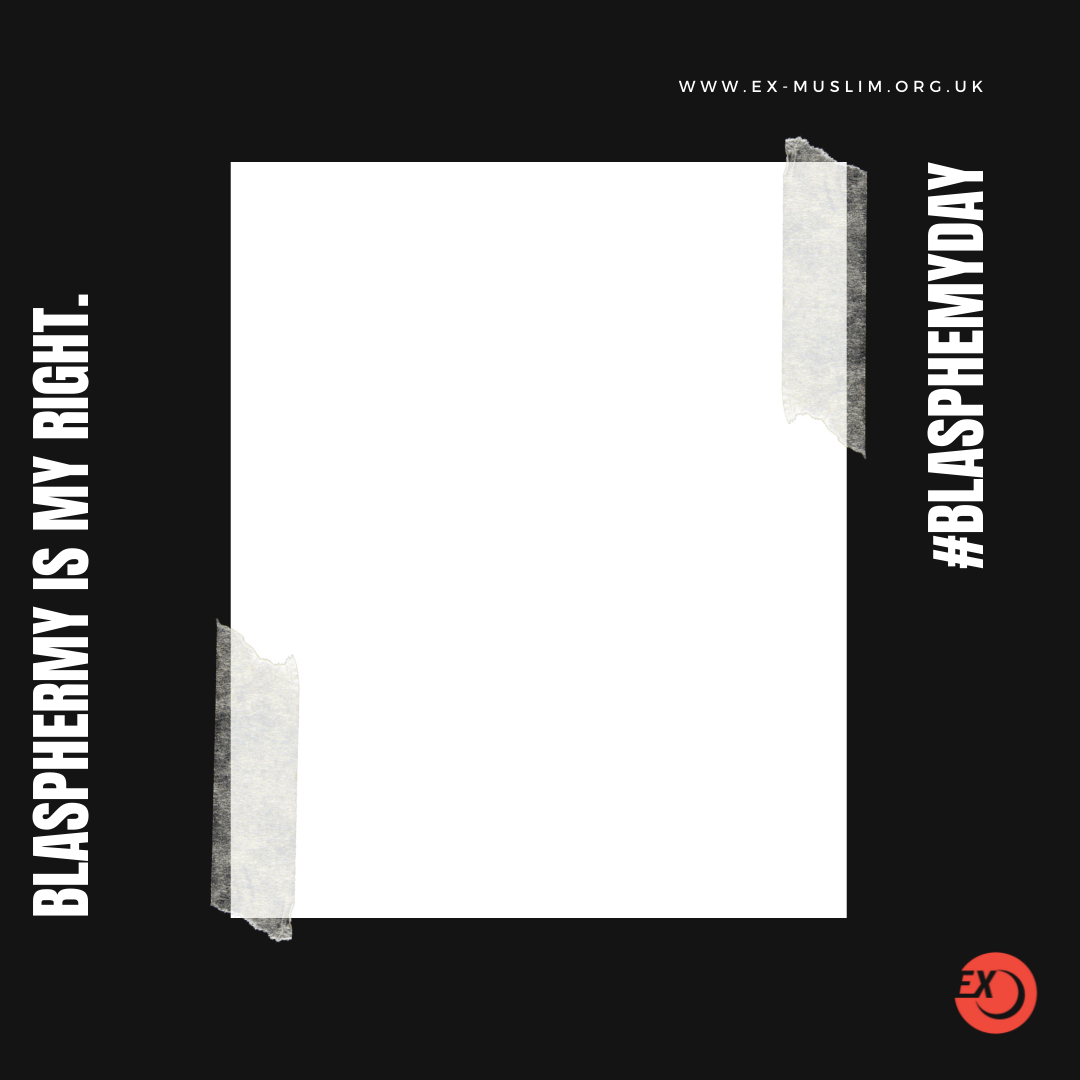

Event Details
Join CEMB in celebrating blasphemy by uploading your photo into our #blasphemyday frame and sharing on social media. If you can’t show your face because it may put you
Event Details
Join CEMB in celebrating blasphemy by uploading your photo into our #blasphemyday frame and sharing on social media. If you can’t show your face because it may put you at risk, hide it or leave it blank. Artist Victoria Gugenheim explains how to add your photo to the frame here.
On this day, we reiterate that blasphemy is not a crime. It is part and parcel of freedom of conscience and expression and that ideas don’t need rights, people do.
If you have problems adding your photo to the blasphemy day frame, email it to us at hello@council-of-ex-muslims-of-britain-e5a565.ingress-baronn.ewp.live and Victoria will help.
more
Time
All Day (Thursday)
october 2021
2021sun03octAll DayInternational Soheil Day(All Day: sunday)


Event Details
Farsi, Arabic, French and Spanish translations and list of Signatories below. To add your signature, please email maryamnamazie@gmail.com or add your name and description here. The list will be
Event Details
Farsi, Arabic, French and Spanish translations and list of Signatories below.
To add your signature, please email maryamnamazie@gmail.com or add your name and description here. The list will be updated daily until end of 3 October, International Soheil Day.
Soheil Arabi is an Iranian atheist initially sentenced to death for ‘insulting the Prophet of Islam’ in Facebook posts. Due to public pressure, his sentence was reduced but he continues to face multiple additional charges in attempts to silence him since his arrest in November 2013.
In August 2021, his lawyer Tweeted that Soheil had been sentenced to yet another 2 years in prison for ‘spreading propaganda with the intention of disturbing public opinion,’ because of his outspoken advocacy for atheism and prisoner rights.
We, the undersigned, are extremely concerned about Soheil’s life and safety and demand his immediate and unconditional release. We unequivocally condemn blasphemy laws that persecute freethinkers for their conscience and expression.
In order to defend and stand with Soheil Arabi, we call for 3 October to be International Soheil Day.
On this day, we urge the public to highlight his plight by rallying at Iranian embassies, contacting members of parliament in their countries of residence, writing protest letters, Tweeting #FreeSoheil #SoheilDay #SoheilArabi and sending messages of solidarity to Soheil and his mother Farangis Mazloum who has been targeted for defending her detained son.
#FreeSoheil
#SoheilDay
#SoheilArabi
more
Time
All Day (Sunday)
2021mon04oct6:30 pmmon8:00 pmOctober Online Support Group Session6:30 pm - 8:00 pm















































































































Event Details
Join monthly support groups to talk about issues that affect ex-Muslims. CEMB currently has two 90-minute online sessions on the first Monday and Tuesday of every month, 6.30-8.00pm UK time. The
Event Details
Join monthly support groups to talk about issues that affect ex-Muslims.
CEMB currently has two 90-minute online sessions on the first Monday and Tuesday of every month, 6.30-8.00pm UK time. The sessions are led by Counselling Psychologist Dr SAVIN BAPIR-TARDY.
If you have never attended a session before, please email hello@council-of-ex-muslims-of-britain-e5a565.ingress-baronn.ewp.live.
Time
(Monday) 6:30 pm - 8:00 pm
2021tue05oct6:30 pmtue8:00 pmOctober Online Support Group Session6:30 pm - 8:00 pm















































































































Event Details
Join monthly support groups to talk about issues that affect ex-Muslims. CEMB currently has two 90-minute online sessions on the first Monday and Tuesday of every month, 6.30-8.00pm UK time. The
Event Details
Join monthly support groups to talk about issues that affect ex-Muslims.
CEMB currently has two 90-minute online sessions on the first Monday and Tuesday of every month, 6.30-8.00pm UK time. The sessions are led by Counselling Psychologist Dr SAVIN BAPIR-TARDY.
If you have never attended a session before, please email hello@council-of-ex-muslims-of-britain-e5a565.ingress-baronn.ewp.live.
Time
(Tuesday) 6:30 pm - 8:00 pm
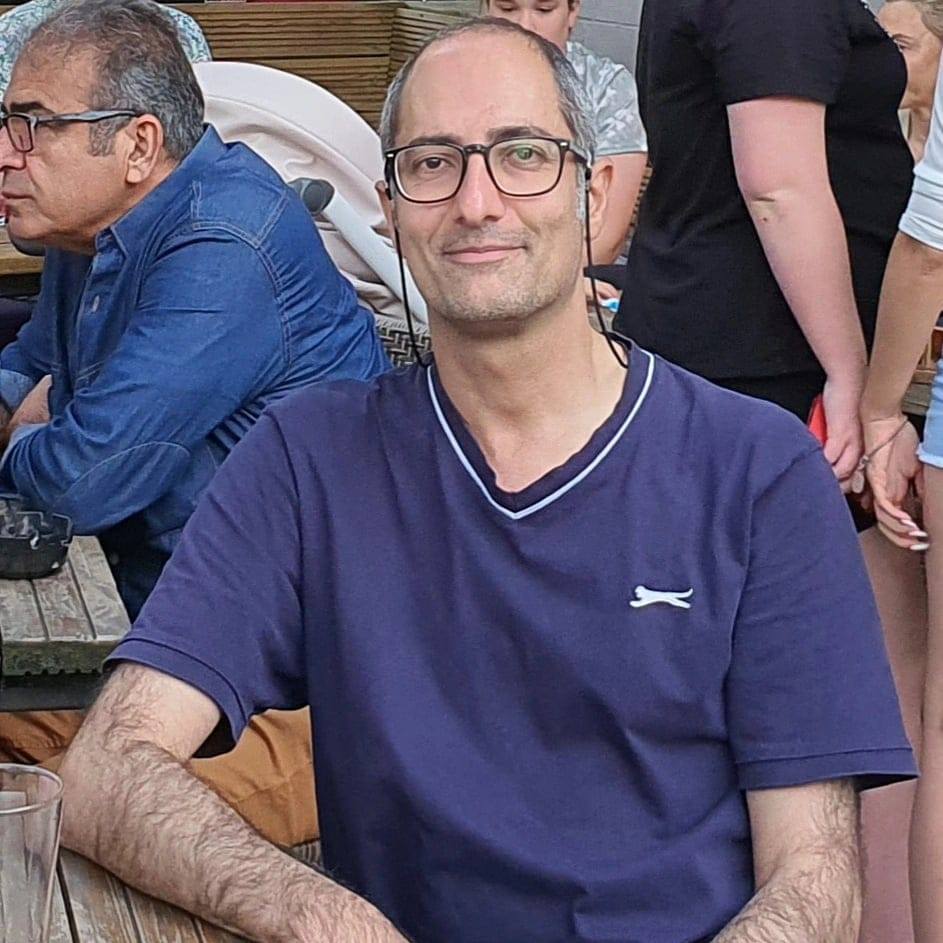

Event Details
Monthly Meetups are held on the third Tuesday of every month, 7.30-9.00pm UK time in central London. Meetups are run by Ali Malik. This month’s meet up is with Mehran Torkzadeh
Event Details
Monthly Meetups are held on the third Tuesday of every month, 7.30-9.00pm UK time in central London. Meetups are run by Ali Malik.
This month’s meet up is with Mehran Torkzadeh Tabrizi on ‘History of Islamic governance in Iran.’ Born in Tehran, Iran in 1973, Mehran lived through the Iranian revolution and the Iran-Iraq war. He did his Bachelors in German Literature and his Masters in Ancient Languages and Cultures of Iran. He credits his studies in mentioned subjects to have broadened his horizons and the understanding of religions as man-made. Mehran moved to the UK in 2008 for further studies and used the freedom of speech he was now afforded to speak out about his criticism of Islam.
Since space is limited due to Covid regulations, please RSVP with ali.malik@council-of-ex-muslims-of-britain-e5a565.ingress-baronn.ewp.live.
more
Time
(Tuesday) 7:30 pm - 9:00 pm
2021fri29octAll Daysat30Vrijdenkersfestival 2021 (Freethinkers Festival 2021)(All Day)
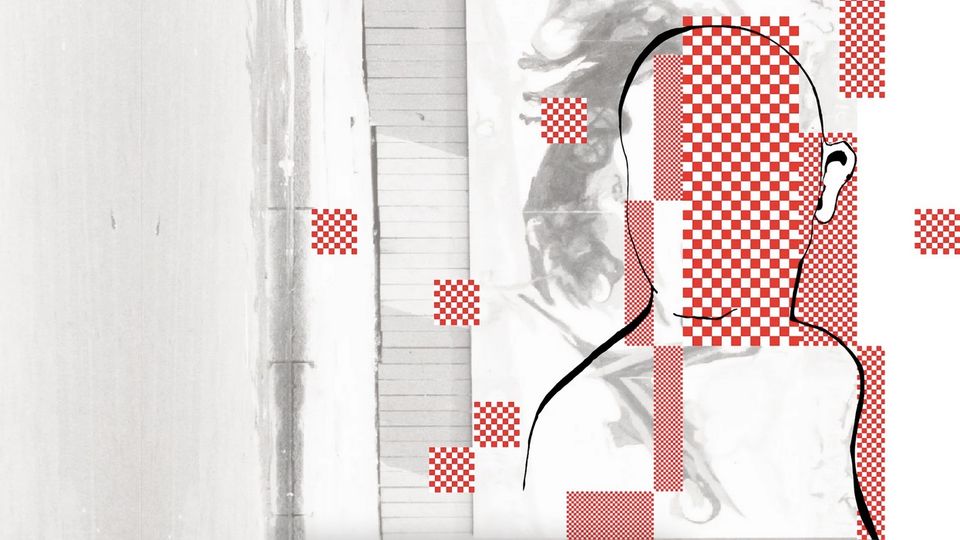

Event Details
29-30 October 2021 Vrijdenkersfestival 2021 (Freethinkers Festival 2021) De Balie, Amsterdam Met onafhankelijke geesten uit alle windhoeken, de een nog moediger dan de ander. Het begrip vrijheid is onlosmakelijk
Event Details
29-30 October 2021
Vrijdenkersfestival 2021 (Freethinkers Festival 2021)
De Balie, Amsterdam
Met onafhankelijke geesten uit alle windhoeken, de een nog moediger dan de ander.
Het begrip vrijheid is onlosmakelijk verbonden met Amsterdam. De stad deed in de 17e eeuw al dienst als veilige haven. Voor vrijdenkers, afvalligen en andere lastpakken. Vanzelfsprekend trokken scherpe geesten als René Descartes, John Locke en Baruch de Spinoza naar de stad. Waar anders konden ze wonen, denken, schrijven en publiceren? Wie elders om zijn denkbeelden werd verjaagd, kreeg in Amsterdam een warm welkom. Als andersdenkende werd je er gezien en gehoord. Vanaf dat moment is onze stad een brandpunt gebleven. Voor filosofen, dolle mina’s en onruststokers.
In aanloop naar het 750-jarige bestaan van de stad staan we stil bij ons vrijheidsbegrip en wat voor betekenis dit heeft. Hoe vrij zijn wij? Vrijgemaakt van religie, dogma’s of ideologie? En wat heeft die vrijheid ons gebracht? Hoe verhoudt vrijheid zich tot empathie en inlevingsvermogen voor anderen? Hoe verdedigen we onze vrijheden en wat kunnen we daarbij leren van de geschiedenis?
Van vrijdagavond 29 tot en met zaterdagavond 30 oktober organiseren we het Vrijdenkersfestival 2021, met onafhankelijke geesten uit alle windhoeken, de een nog moediger dan de ander.


Met oa:
De Brits-Iraanse Maryam Namazie is een vooraanstaand mensenrechtenactivist. Zij is woordvoerster van Iran Solidarity, One Law for All en de Council of Ex-Muslims of Britain. Hoewel Namazie al vele jaren in Engeland woont, houden de Iraanse staat en media haar nog steeds in de gaten.
Mohamedou Ould Slahi zat 14 jaar lang zonder proces vast in de Amerikaanse gevangenis op Guantanamo Bay. Het boek dat hij hierover schreef, Guantánamo Diary, groeide uit tot een internationale bestseller en is recentelijk verfilmd als het gevierde The Mauritanian. Mohamedou Ould Slahi is als ‘writer-in-residence’ een jaar lang in dienst is bij NITE (Club Guy & Roni en Noord Nederlands Toneel). Hij schreef de tekst voor de op zijn verhaal gebaseerde voorstelling Freedom, die op 16 oktober in première gaat in Groningen. In De Balie komt hij vertellen over zijn leven in gevangenschap, en wat het ervaren van totale onvrijheid deed met zijn blik op vrijheid.
Alexander Noordijk was als homoseksuele dominee werkzaam in Amsterdam. Wat betekent het geloof voor hem, op welke manier vindt hij God en hoe kunnen we elkaar in vrijheid laten leven, en toch naar elkaar omkijken? Alexander Noordijk heeft ook in Amsterdam bedreigingen en intimidatie meegemaakt. Hoe kunnen we elkaar in vrijheid accepteren en van elkaar leren?
Can Dündar is journalist in ballingschap. Icoon van de vrije pers in Turkije. Als hoofdredacteur van dagblad Cumhuriyet was hij in 2015 verantwoordelijk voor een stuk over Turkse vrachtwagens die met wapens naar Syrië onderweg waren. Als fel verdediger van het vrije woord en politiek vluchteling in Duitsland draagt Dündar een essay voor waarin hij vooruitblikt. Kunnen we nog samenleven in vrijheid én veiligheid in het Europa van morgen?
Deborah Feldman schreef de autobiografie Unorthodox: The Scandalous Rejection of My Hasidic Roots. Dat debuut vertelt het verhaal van haar breuk met de orthodox-joodse gemeenschap in Brooklyn. Het boek werd gebruikt als basis voor de Netflix-serie Unorthodox uit 2020, en werd een wereldwijde hit. In augustus dit jaar verscheen haar nieuwste boek Exodus, Revisited.
Keyvan Shahbazi vluchtte in 1983 uit Iran. In zijn net verschenen autobiografische debuutroman De Amerikaan van Karadj is te lezen hoe hij en zijn familie slachtoffer werden van het regime van Khomeini. Na zijn vlucht werd hij gebeld en geïntimideerd door de inlichtingendienst in Iran. Ze gebruikten zijn moeder, die daar nog was, om hem onder druk te zetten. Het staat symbool voor de invloed die buitenlandse staten kunnen hebben op Nederlandse burgers.
De 21-jarige Alerk Ablikim is een Nederlands-Oeigoerse activist. Zijn vader zit op dit moment vast in een concentratiekamp. Ablikim krijgt ook in Nederland veel te maken met intimidatie vanuit zijn thuisland, in de vorm van mailtjes, sms’jes, en zelfs belletjes waarop geschreeuw en gehijg te horen is. Hoe vrij is hij om zich uit te spreken, als zijn thuisland altijd over zijn schouder mee kijkt?
Diederik Boomsma is fractievoorzitter van CDA Amsterdam en promovendus in de rechtsfilosofie. Hij nam het initiatief tot een bundel over de verschillende opvattingen van vrijheid binnen de gemeenteraad.
Laila Ezzeroili is een Marokkaans-Nederlandse journalist en publicist. Haar Marokkaanse paspoort mag ze van de regering niet afstaan, met als gevolg dat ze nog onder de wetgeving valt van een land waar ze niet woont en zelfs niet is geboren. Hoe kan het dat het buitenland zoveel invloed heeft op Nederlandse staatsburgers?
Tirza de Fockert is raadslid van GroenLinks Amsterdam, waar ze zich voornamelijk richt op onderwijs, integratie, en LHBTIQ+ rechten. Tijdens dit programma deelt ze haar visie op tolerantie, vrijheid en samen leven in de stad. Wat delen Amsterdammers ondanks onderlinge verschillen met elkaar?
**Meer namen volgen. Hou deze pagina in de gaten voor meer info over de kaartverkoop
more
Time
october 29 (Friday) - 30 (Saturday)
2021sun31oct2:00 pmsun5:00 pmCEMB Social2:00 pm - 5:00 pm




Event Details
Join CEMB at its regular socials. CEMB Socials are a chance for ex-Muslims to come together and socialise without any fear of being judged about their apostasy from Islam. As we
Event Details
Join CEMB at its regular socials.
CEMB Socials are a chance for ex-Muslims to come together and socialise without any fear of being judged about their apostasy from Islam. As we are all apostates, we understand apostasy from Islam can be a scary experience and you how difficult it can be to open up about our experiences. Join the CEMB community and meet others who’ve been thorough the same.
Contact Ali Malik at ali.malik@council-of-ex-muslims-of-britain-e5a565.ingress-baronn.ewp.live to register and for details.
Time
(Sunday) 2:00 pm - 5:00 pm
november 2021
2021mon01nov6:30 pmmon8:00 pmNovember Online Support Group Session6:30 pm - 8:00 pm















































































































Event Details
Join monthly support groups to talk about issues that affect ex-Muslims. CEMB currently has two 90-minute online sessions on the first Monday and Tuesday of every month, 6.30-8.00pm UK time. The
Event Details
Join monthly support groups to talk about issues that affect ex-Muslims.
CEMB currently has two 90-minute online sessions on the first Monday and Tuesday of every month, 6.30-8.00pm UK time. The sessions are led by Counselling Psychologist Dr SAVIN BAPIR-TARDY.
If you have never attended a session before, please email hello@council-of-ex-muslims-of-britain-e5a565.ingress-baronn.ewp.live.
Time
(Monday) 6:30 pm - 8:00 pm
2021tue02nov6:30 pmtue8:00 pmNovember Online Support Group Session6:30 pm - 8:00 pm















































































































Event Details
Join monthly support groups to talk about issues that affect ex-Muslims. CEMB currently has two 90-minute online sessions on the first Monday and Tuesday of every month, 6.30-8.00pm UK time. The
Event Details
Join monthly support groups to talk about issues that affect ex-Muslims.
CEMB currently has two 90-minute online sessions on the first Monday and Tuesday of every month, 6.30-8.00pm UK time. The sessions are led by Counselling Psychologist Dr SAVIN BAPIR-TARDY.
If you have never attended a session before, please email hello@council-of-ex-muslims-of-britain-e5a565.ingress-baronn.ewp.live.
Time
(Tuesday) 6:30 pm - 8:00 pm
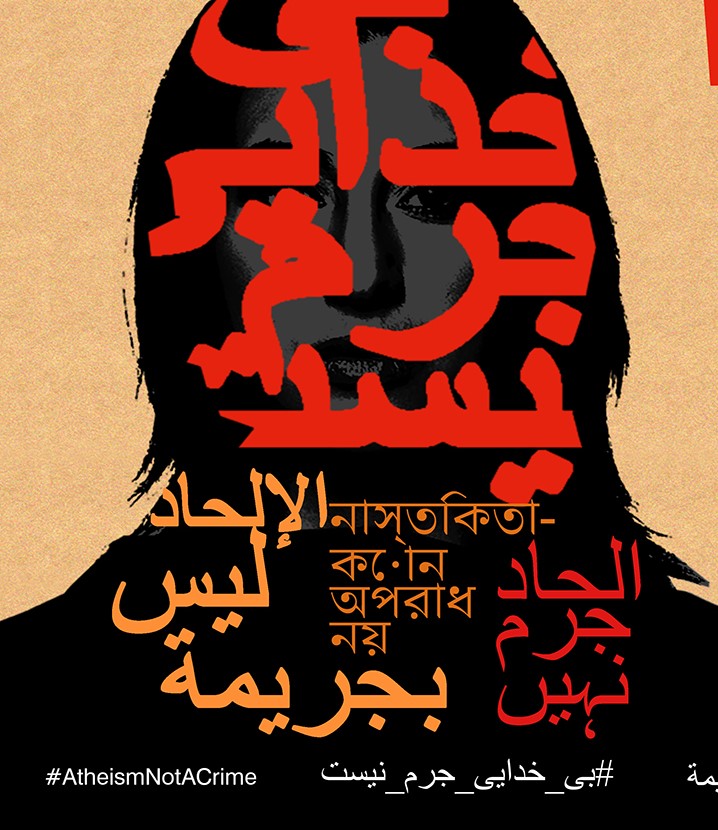

Event Details
Blasphemous Women and Equality Film Screening and Panel On Saturday 20 November from 6-8pm, CEMB is screening “Women Leaving Islam” for the first time in London. After the film, there will
Event Details
Blasphemous Women and Equality Film Screening and Panel
On Saturday 20 November from 6-8pm, CEMB is screening “Women Leaving Islam” for the first time in London. After the film, there will be a panel discussion on Blasphemous Women and Equality. Speakers include Somali Ex-Muslim Voices Founder Halima Salat, CEMB Spokesperson Maryam Namazie, Youtuber and Counsellor Mimzy Vidz, Youtuber Nuriyeh Khan, Clinical Psychologist Savin Bapir-Tardy, and Writer and Southall Black Sisters Activist Rahila Gupta. Tickets are £5.00. Due to Covid rules, space is limited so please get your tickets today.
more
Time
(Saturday) 6:00 pm - 8:00 pm
2021sun28nov2:00 pmsun5:00 pmNovember CEMB Social2:00 pm - 5:00 pm




Event Details
Join CEMB at its regular socials on the last Sunday of the month. CEMB Socials are a chance for ex-Muslims to come together and socialise without any fear of being judged
Event Details
Join CEMB at its regular socials on the last Sunday of the month.
CEMB Socials are a chance for ex-Muslims to come together and socialise without any fear of being judged about their apostasy from Islam. As we are all apostates, we understand apostasy from Islam can be a scary experience and you how difficult it can be to open up about our experiences. Join the CEMB community and meet others who’ve been thorough the same.
Contact Ali Malik at ali.malik@council-of-ex-muslims-of-britain-e5a565.ingress-baronn.ewp.live to register and for details.
Time
(Sunday) 2:00 pm - 5:00 pm
december 2021
2021mon06dec6:30 pmmon8:00 pmDecember Online Support Group Session6:30 pm - 8:00 pm















































































































Event Details
Join monthly support groups to talk about issues that affect ex-Muslims. CEMB currently has two 90-minute online sessions on the first Monday and Tuesday of every month, 6.30-8.00pm UK time. The
Event Details
Join monthly support groups to talk about issues that affect ex-Muslims.
CEMB currently has two 90-minute online sessions on the first Monday and Tuesday of every month, 6.30-8.00pm UK time. The sessions are led by Counselling Psychologist Dr SAVIN BAPIR-TARDY.
If you have never attended a session before, please email hello@council-of-ex-muslims-of-britain-e5a565.ingress-baronn.ewp.live.
Time
(Monday) 6:30 pm - 8:00 pm
2021tue07dec6:30 pmtue8:00 pmDecember Online Support Group Session6:30 pm - 8:00 pm















































































































Event Details
Join monthly support groups to talk about issues that affect ex-Muslims. CEMB currently has two 90-minute online sessions on the first Monday and Tuesday of every month, 6.30-8.00pm UK time. The
Event Details
Join monthly support groups to talk about issues that affect ex-Muslims.
CEMB currently has two 90-minute online sessions on the first Monday and Tuesday of every month, 6.30-8.00pm UK time. The sessions are led by Counselling Psychologist Dr SAVIN BAPIR-TARDY.
If you have never attended a session before, please email hello@council-of-ex-muslims-of-britain-e5a565.ingress-baronn.ewp.live.
Time
(Tuesday) 6:30 pm - 8:00 pm
january 2020
2020sat25jan2:30 pmsat5:00 pmMonthly Meet and Eat Social2:30 pm - 5:00 pm
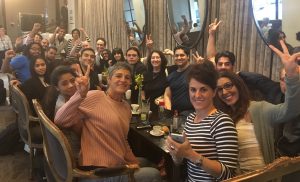

Event Details
Join us for our Monthly Meet and Eat Socials. Many of us feel isolated after leaving Islam, our meet and eats are created to help you connect with other fellow
Event Details
Join us for our Monthly Meet and Eat Socials. Many of us feel isolated after leaving Islam, our meet and eats are created to help you connect with other fellow ex Muslims.
If you would like to come along, please email Sadia on sadia.hameed@council-of-ex-muslims-of-britain-e5a565.ingress-baronn.ewp.live for details of the venue. Please leave enough time for us to call you to discuss your support needs ahead of your first social.
Time
(Saturday) 2:30 pm - 5:00 pm
2020wed22janAll DayGAPF, Stockholm, Sweden(All Day: wednesday)


Event Details
CEMB’s Jimmy Bangash speaking Sweden’s parliament organised by GAPF discussing honour culture and its impact on LGBT.
Event Details
CEMB’s Jimmy Bangash speaking Sweden’s parliament organised by GAPF discussing honour culture and its impact on LGBT.
Time
All Day (Wednesday)
2020tue07jan6:00 pmtue8:00 pmMonthly Support Group6:00 pm - 8:00 pm address























Event Details
Join us for our monthly support group, to talk about issues that still affect us after leaving Islam. If you would like to come along, please email Sadia on sadia.hameed@council-of-ex-muslims-of-britain-e5a565.ingress-baronn.ewp.live for details of
Event Details
Join us for our monthly support group, to talk about issues that still affect us after leaving Islam.
If you would like to come along, please email Sadia on sadia.hameed@council-of-ex-muslims-of-britain-e5a565.ingress-baronn.ewp.live for details of the venue, as it will be different every time.
Time
(Tuesday) 6:00 pm - 8:00 pm
Location
See post
address
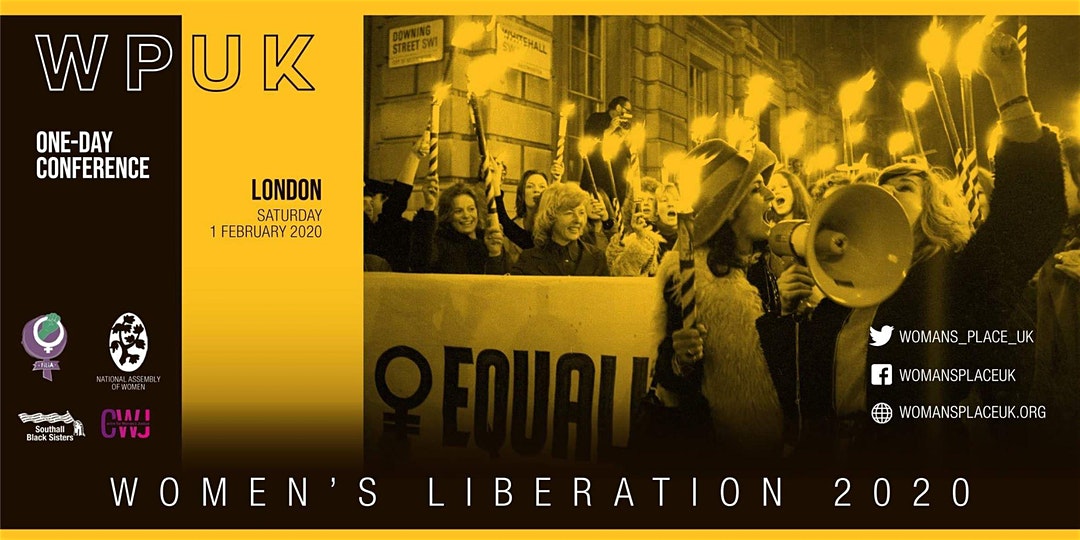

Event Details
1 February 2020 Maryam Namazie and Yasmin Rehman will give workshops on Secularism, faith and the women’s movement at the Women’s Liberation 2020 Conference organised by Women’s Place UK in
Event Details
1 February 2020
Maryam Namazie and Yasmin Rehman will give workshops on Secularism, faith and the women’s movement at the Women’s Liberation 2020 Conference organised by Women’s Place UK in London. For tickets, visit here.
Time
All Day (Monday)
february 2020
2020sat29febAll DayTedX Warwick Creativity within Crisis(All Day: saturday)
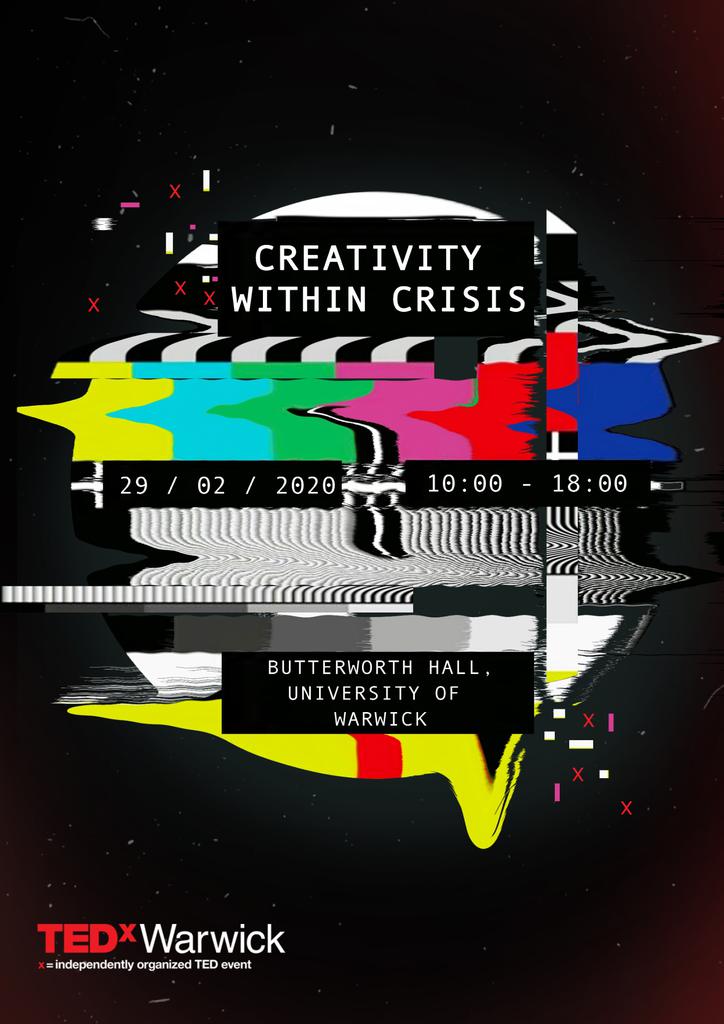

Event Details
29 February 2020 Maryam will be speaking at TedX Warwick Creativity within Crisis Event. For more information and tickets, visit here.
Event Details
29 February 2020
Maryam will be speaking at TedX Warwick Creativity within Crisis Event. For more information and tickets, visit here.
Time
All Day (Saturday)
2020tue25feb6:30 pmtue8:00 pmNew College of the Humanities6:30 pm - 8:00 pm
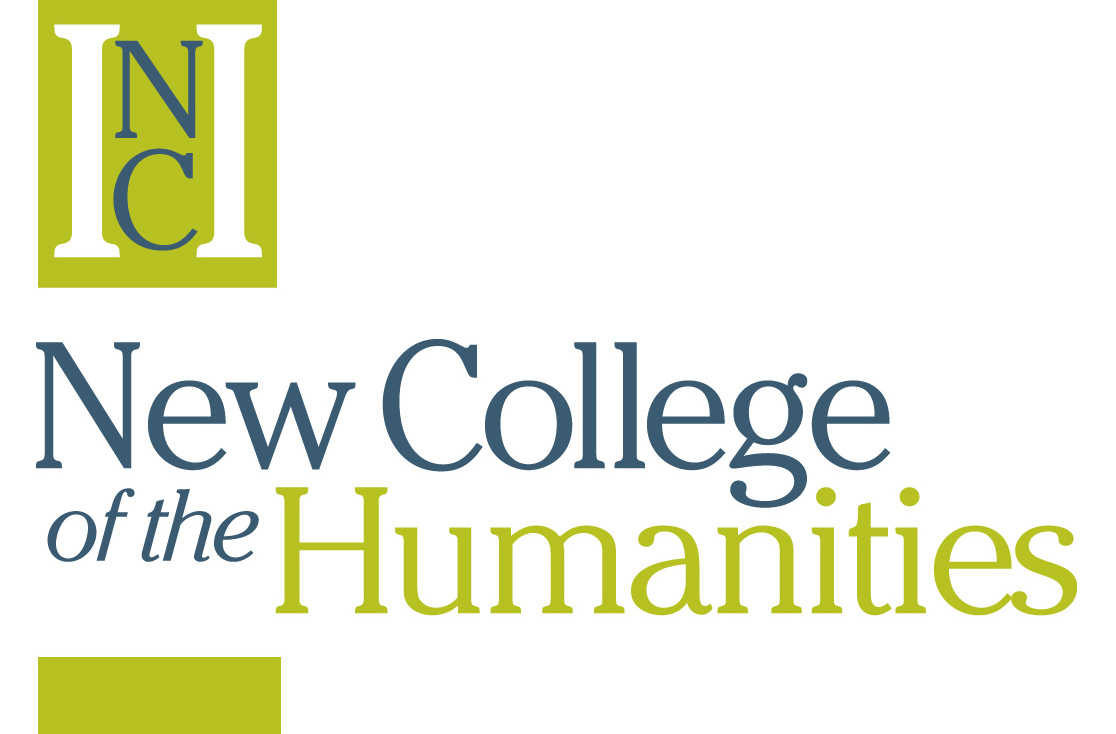

Event Details
25 February 2020, 6:30pm Maryam will be speaking to the Atheist Secularist and Humanist Society on Celebrating Apostasy and Blasphemy at the New College of the Humanities.
Event Details
25 February 2020, 6:30pm
Maryam will be speaking to the Atheist Secularist and Humanist Society on Celebrating Apostasy and Blasphemy at the New College of the Humanities.
Time
(Tuesday) 6:30 pm - 8:00 pm
2020tue18feb7:00 pmtue9:00 pmLondon Meet-Up: On Islamic Timeline with Ali Malik7:00 pm - 9:00 pm
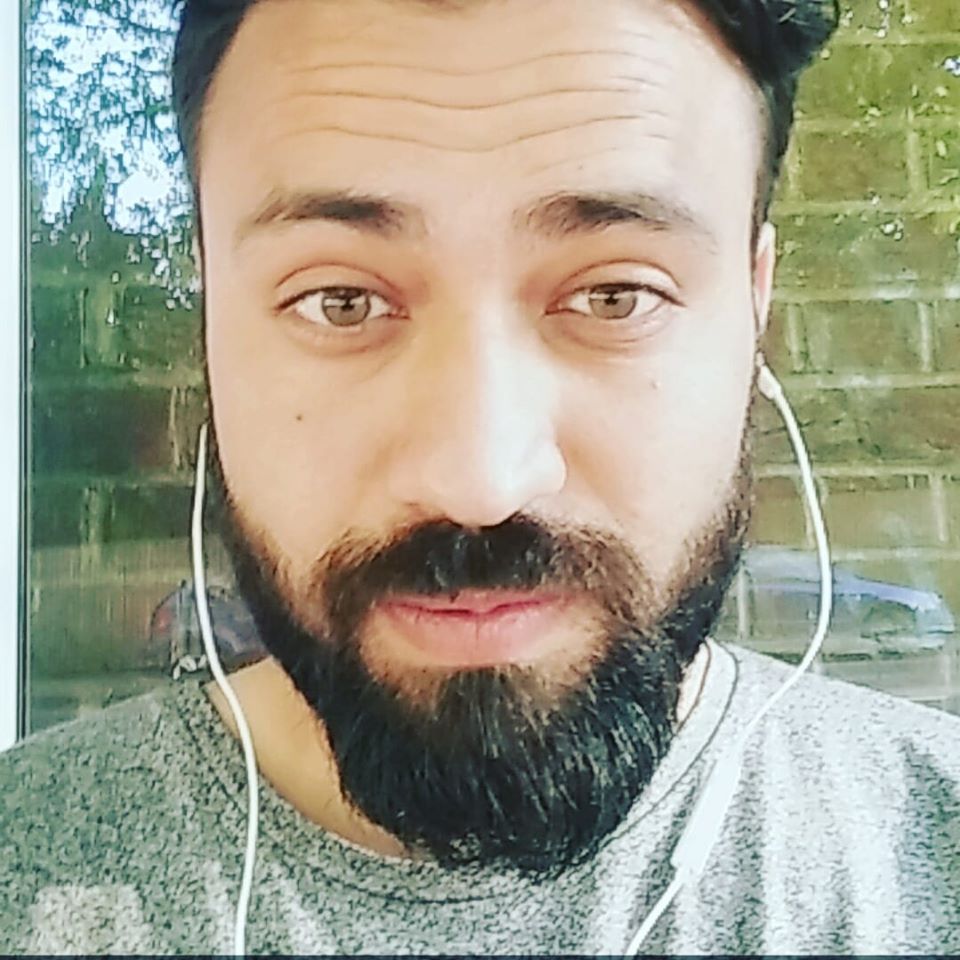

Event Details
Join us for our monthly meet up to explore the Islamic timeline with Youtuber Ali Malik from Paak Atheists. Ali will be talking about how the Quran and Hadith were out
Event Details
Join us for our monthly meet up to explore the Islamic timeline with Youtuber Ali Malik from Paak Atheists.
Ali will be talking about how the Quran and Hadith were out together after the death of Mohammed and analysing what this means.
If it is your first time attending the meet ups, please email exmuslimcouncil@gmail.com to register.
Time
(Tuesday) 7:00 pm - 9:00 pm
march 2020


Event Details
This event has been cancelled because of coronavirus epidemic. 21 March 2020, 8-10pm, Zurich, Switzerland Maryam Namazie, Sarah Haider, Inna Shevchenko and others at Apostasy Day event Tickets can be
Event Details
This event has been cancelled because of coronavirus epidemic.
21 March 2020, 8-10pm, Zurich, Switzerland
Maryam Namazie, Sarah Haider, Inna Shevchenko and others at Apostasy Day event
Tickets can be bought here.
Time
(Saturday) 8:00 pm - 10:00 pm
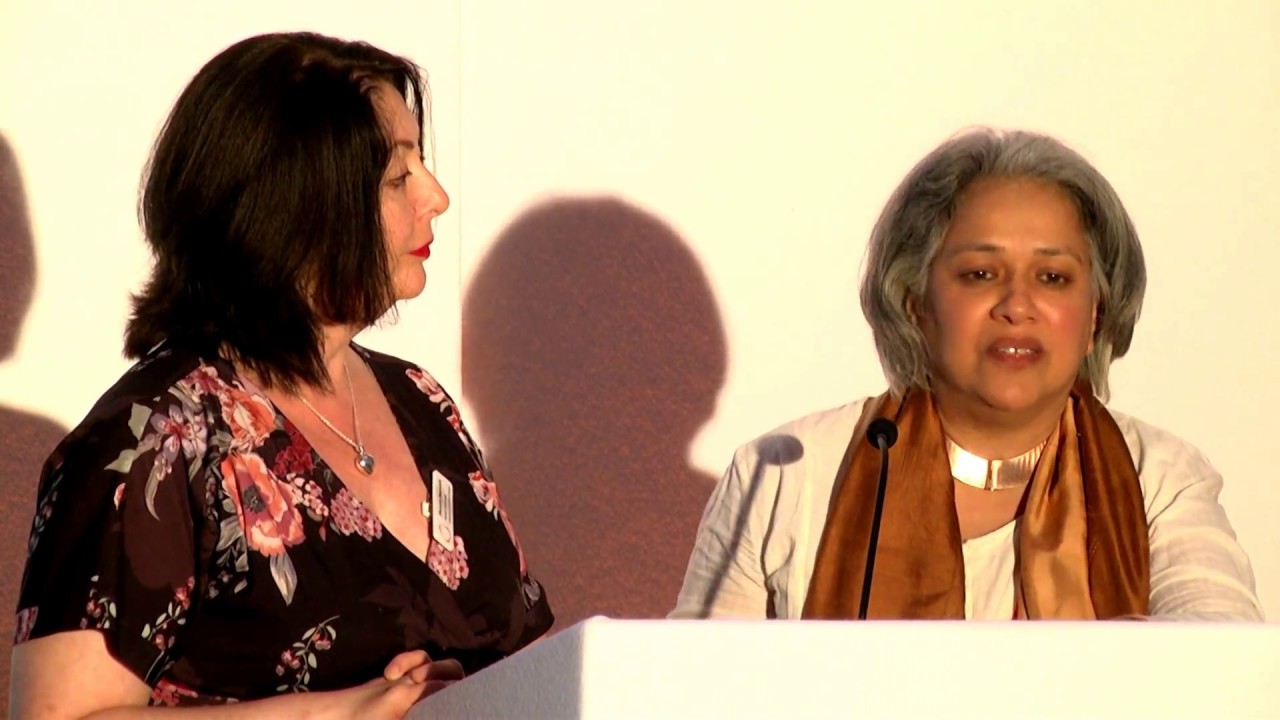


Event Details
CANCELLED BECAUSE OF CORONAVIRUS Please note that this meeting will be cancelled because of the risk of spreading coronavirus. We feel it particularly important to take action to stop the spread,
Event Details
CANCELLED BECAUSE OF CORONAVIRUS
Please note that this meeting will be cancelled because of the risk of spreading coronavirus. We feel it particularly important to take action to stop the spread, particularly given the government’s inaction in the face of this epidemic.
All events will be cancelled until further notice.
17 March, 7-8:30pm, Central London, few minutes walk from Kings Cross station
Join us for our monthly meet-up to explore Identity Politics, Racism and Liberation with Gita Sahgal and Maryam Namazie.
Gita Sahgal is a writer, journalist, film-maker and rights activist. She is currently Founder and Director of Centre for Secular Space. She was formerly Head of the Gender Unit at Amnesty International; she was suspended in 2010 after she was quoted criticising Amnesty for its high-profile associations with the Islamist Moazzam Begg, the director of a group called Cageprisoners.
Maryam Namazie is an Iranian-born writer and activist. She is the Spokesperson of One Law for All and the Council of Ex-Muslims of Britain. She hosts a weekly television programme broadcast in Iran on Saturday evenings in Persian and English called Bread and Roses.
If it is your first time attending the monthly meet-up, please email exmuslimcouncil@gmail.com to register.
Talks will be followed by Q&A, drinks and snacks.
more
Time
(Tuesday) 7:00 pm - 8:30 pm
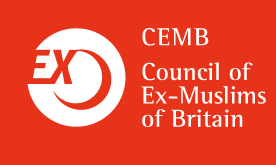











Event Details
EVENTS ORGANISED BY CEMB UPCOMING EVENTS 23 June 2017, 2:00-4:00pm, Meet at 2pm at Green Park Station entrance On 23 June 2017 at 14:00, we will meet at Green Park station
Event Details
EVENTS ORGANISED BY CEMB
UPCOMING EVENTS
23 June 2017, 2:00-4:00pm, Meet at 2pm at Green Park Station entrance
On 23 June 2017 at 14:00, we will meet at Green Park station and go on to “eat-in” at the Saudi, Iranian, Egyptian, Bangladeshi, Pakistani, Moroccan and other embassies in London in solidarity with those defying fasting rules during Ramadan. This is hugely important given that there are many people across the globe who are arrested, beaten and fined for eating during the month; many others are pressured into fasting, including in Europe. Join us at the ‘eat-in’ if you can. Alternately, you can upload photos of yourself eating during fasting times or holding signs with messages of solidarity using hashtag: #IWillNotFast #لن_اصوم #روزه خوارى #Ramadan until the end of Ramadan. Happy fast-defiance! To participate, just show up. Email exmuslimcouncil@gmail.com for more details.
Tuesday 27 June 2017, 6:30pm-8:30pm, central London by Kings Cross
Evening with Rahila Gupta, Journalist and Activist on Rojava, Northern Syria and secular space in the middle of a war
PLEASE NOTE: This is a new venue for our monthly meet-ups; if you would like to attend, please email exmuslimcouncil@gmail.com to register and receive further information. If you already know the new location, just show up.
Suggested donation: £3 waged; £1 unwaged.
22-23 July 2017: International Conference on Freedom of Expression and Conscience in 21 Century. Central London. Get your tickets today.
Tuesday 26 September 2017, 6:30pm-8:30pm, central London by Kings Cross
Evening with lawyer Ana González on apostasy and asylum
Ana will go through asylum procedures and also provide one-on-one advice during the evening.
PLEASE NOTE: This is a new venue for our monthly meet-ups; if you would like to attend, please email exmuslimcouncil@gmail.com to register and receive further information.
Suggested donation: £3 waged; £1 unwaged.
Tuesday 24 October 2017, 6:30pm-8:30pm, central London by Kings Cross
Evening with Peter Tatchell, Human Rights Campaigner, on the links between the gay rights and ex-Muslim rights
PLEASE NOTE: This is a new venue for our monthly meet-ups; if you would like to attend, please email exmuslimcouncil@gmail.com to register and receive further information. If you already know the new location, just show up.
Suggested donation: £3 waged; £1 unwaged.
PAST EVENTS
Tuesday 23 May 2017, 6:30pm-8:30pm, central London by Kings Cross
Evening with Imad Iddine Habib and Jimmy Bangash on Pride and the CEMB contingent which will march in the gay pride parade in London on 8 July 2017.
PLEASE NOTE: This is a new venue for our monthly meet-ups; if you would like to attend, please email exmuslimcouncil@gmail.com to register and receive further information. If you already know the new location, just show up.
Suggested donation: £3 waged; £1 unwaged.
Tuesday 4 April 2017, 6:30pm-8:30pm, central London by Kings Cross
Evening with Wissam Charafeddine, Co-Founder, Muslimish Support Network on Why the Classical Proof of God Does Not Work Anymore (based on his background on Islamic theology)
PLEASE NOTE: This is a new venue for our monthly meet-ups; if you would like to attend, please email exmuslimcouncil@gmail.com to register and receive further information. If you already know the new location, just show up.
Suggested donation: £3 waged; £1 unwaged.
On 8 March 2017, Islam’s Non Believers will be screened by Goldsmiths University with Goldsmiths Atheist Society so there will be no meet-up this month.
Tuesday 7 February 2017, 6:30pm-8:30pm, central London by Kings Cross
Evening with lawyer Ana González on apostasy and asylum
Ana will go through asylum procedures and also provide one-on-one advice during the evening.
PLEASE NOTE: This is a new venue for our monthly meet-ups; if you would like to attend, please email exmuslimcouncil@gmail.com to register and receive further information.
Suggested donation: £3 waged; £1 unwaged.
18 October 2016, central London by Kings Cross station, 19:00-21:00 hours
Hang-out with Secular Activist Chris Moos on gender segregation at universities
The event will be held at our regular meet-up space near Kings Cross station. You need to register if you have not been to our events before by emailing exmuslimcouncil@gmail.com with your name and phone number. Entry can be paid at the door: £1 unwaged; £3 waged.
18 July 2016
Evening Drinks with lawyer Ana González on apostasy and asylum Ana will go through the procedures and also provide one-on-one advice during the evening. E-mail exmuslimcouncil@gmail.com to register if this is the first time you will be attending our monthly meetups – otherwise just show up.
July 2016
Flashmob of apostates: “We need your Love”. To join, email exmuslimcouncil@gmail.com.
27 June 2016, central London by Kings Cross station, 19:00-21:00 hours
Evening with Yasmin Rehman, Centre for Secular Space on Polygamy
£3 entry (waged); £1 entry (unwaged). E-mail exmuslimcouncil@gmail.com to register if this is the first time you will be attending our monthly meetups – otherwise just show up.
24 June 2016
Fast-defying during Ramadan in front of Saudi, Iranian and Bangladeshi Embassies at 5pm. To join, email exmuslimcouncil@gmail.com.
12 June 2016
“Mean Tweets party” – reading and filming mean tweets received by apostates. To join, email exmuslimcouncil@gmail.com.
30 April 2016, Day Conference on Sharia Law, Legal Pluralism and Access to Justice, Central London, near Kings Cross Station
Speakers include:
Diana Nammi, Director of Iranian Kurdish Women’s Rights Organisation
Elham Manea, Author of Women And Sharia Law: The Impact Of Legal Pluralism In The UK
Gita Sahgal, Director of Centre for Secular Space
Pragna Patel, Director of Southall Black Sisters
Maryam Namazie, Spokesperson of One Law for All and Council of Ex-Muslims of Britain
Nareen Rehman, Co-Founder and Chair of British Muslims for Secular Democracy
Yasmin Rehman, Women’s Rights Campaigner
12 April 2016, central London by Kings Cross station, 19:00-21:00 hours
Evening with Halima Begum, ex-Muslim feminist researcher and blogger.
After a decade-long journey from Sunni and Shia Islam over Islamism to Secular Liberalism, Halima wrote a study on “British ex-Muslims: Negotiating the Essential and the Revolutionary”, which won the Best Dissertation Award at Birkbeck University in 2014. Halima plans to expand her research to incorporate a gendered experience of Ex-Muslim apostasy. Being a seasoned Ex-Muslim, Halima is keen to promote freedom of expression and uphold rights of personal autonomy. She hopes to share her journey and help others find the best way they can be true to themselves. £3 entry (waged); £1 entry (unwaged). E-mail exmuslimcouncil@gmail.com to register if this is the first time you will be attending our monthly meetups.
10 March 2016, central London by Kings Cross station, 19:00-21:00 hours
Evening with Atheist Vlogger and Activist AronRa
£3 entry (waged); £1 entry (unwaged). E-mail exmuslimcouncil@gmail.com to register if this is the first time you will be attending our monthly meetups.
15 February 2016, central London by Kings Cross station, 19:00-21:00 hours
Evening with CEMB Spokesperson and #ExMuslimBecause organiser Rayhana Sultan
£3 entry (waged); £1 entry (unwaged). E-mail exmuslimcouncil@gmail.com to register if this is the first time you will be attending our monthly meetups.
18 January 2016, central London by Kings Cross station, 19:00-21:00 hours
Apostasy and Asylum Meet-up with Lawyer Ana Gonzales.
£3 entry (waged); £1 entry (unwaged). E-mail exmuslimcouncil@gmail.com to register if this is the first time you will be attending our monthly meetups.
13 December 2015, central London, End-Year Celebration
Tickets are selling fast for One the Law for All and CEMB end-year celebration with Philosopher AC Grayling, Secular Activist Aliyah Saleem, British Iraqi singer Alya Marquardt, Warwick Atheist Society President Benjamin David, Bread and Roses TV Host Fariborz Pooya, Founder of Council of Ex-Muslims of Morocco Imad Iddine Habib, Comedian Kate Smurthwaite, Libyan Women’s Rights Campaigner Magdulien Abaida, CEMB Spokesperson Maryam Namazie, CEMB Spokesperson Nahla Mahmoud, Ex-Muslims of Scotland founder Ramin Forghani, Bangladeshi campaigner Rayhana Sultan, Scientist Richard Dawkins and more.
16 November 2015, central London by Kings Cross station, 19:00-21:00 hours
Evening drinks with Ibrahim Abdallah, Muslimish New York Organiser.
£3 entry (waged); £1 entry (unwaged). E-mail exmuslimcouncil@gmail.com to register.
26 October 2015, central London by Kings Cross, 21:00-23:00 hours
Kafir Comedy Night with Maha Kamal
£3 entry (waged); £1 entry (unwaged). E-mail exmuslimcouncil@gmail.com to register.
26 October 2015, central London by Kings Cross station, 19:00-21:00 hours
Evening drinks with Tom Holland, Historian and Author of In the Shadow of the Sword.
£3 entry (waged); £1 entry (unwaged). E-mail exmuslimcouncil@gmail.com to register.
28 September 2015, central London by Kings Cross station, 19:00-21:00 hours
Evening drinks with Arif Rahman, Bangladeshi Blogger.
£3 entry (waged); £1 entry (unwaged). E-mail exmuslimcouncil@gmail.com to register.
27 July 2015, central London by Kings Cross station, 19:00-21:00 hours
with Karima Bennoune, Author of Your Fatwa does not Apply Here marking one month anniversary of the ISIS attack in Sousse.
£3 entry (waged); £1 entry (unwaged). E-mail exmuslimcouncil@gmail.com to register.
6 July 2015, central London by Kings Cross station, 19:00-21:00 hours
EVENT CANCELLED BECAUSE OF VENUE’S DOUBLE BOOKING
with Founder of Women Living Under Muslims Laws and Secularism is a Women’s Issue Founder Marieme Helie Lucas who will speak about why we need strong international secular networks.
£3 entry (waged); £1 entry (unwaged). E-mail exmuslimcouncil@gmail.com to register.
Join us to celebrate the 8th anniversary of the CEMB
Saturday 20 June 2015, 1500-1800 Hours
Walking distance to London Kings Cross/St Pancras stations
Join us for appetisers, drinks, music, speeches and laughs to celebrate the CEMB’s 8th anniversary.
Speakers and acts include: Iraqi British Singer Alya Marquardt, Secular activist Aliyah Saleem, Council of Ex-Muslims of Morocco Founder Imad Iddine Habib, Comedian Kate Smurthwaite, Author Kenan Malik, Southall Black Sisters Director Pragna Patel, CEMB Spokesperson Maryam Namazie and more.
Tickets: £18 (waged); £10 (unwaged)
To register, please email your name and mobile number to exmuslimcouncil@gmail.com. You can purchase your ticket(s) via Paypal or by sending a cheque made payable to ‘CEMB’ to: BM Box 1919, London WC1N 3XX.
Space is limited so buy your tickets today.
No tickets will be sold at the door.
18 May 2015, central London by Kings Cross station, 19:00-21:00 hours
Apostasy and Asylum Meet-up with Lawyer Ana Gonzales.
£3 entry (waged); £1 entry (unwaged). E-mail exmuslimcouncil@gmail.com to register.
27 April 2015, central London by Kings Cross station, 19:00-21:00 hours
Evening drinks with Imad Iddine Habib, Founder of the Council of Ex-Muslims of Morocco.
£3 entry (waged); £1 entry (unwaged). E-mail exmuslimcouncil@gmail.com to register.
16 March 2015, central London by Kings Cross station, 19:00-21:00 hours
International Women’s Day evening drinks with Pragna Patel from Southall Black Sisters. £3 entry (waged); £1 entry (unwaged). E-mail exmuslimcouncil@gmail.com to register.
7 FEBRUARY 2015 SHARIA LAW, APOSTASY AND SECULARISM DAY-CONFERENCE NEAR KINGS CROSS WILL PAY TRIBUTE TO CHARLIE HEBDO AND THE MANY PERSECUTED FOR CRITICISING ISLAM AND RELIGION.
Near London Kings Cross
9am registration; 10am-5:30pm
The exciting day-conference will include discussions on Charlie Hebdo and freedom of expression, apostasy and blasphemy laws, Islamism and the religious-Right, Sharia in the Law, Educational System and Public Policy, as well as Secularism and Citizenship Rights. Speakers will discuss the successful campaigns against the Law Society and Universities UK and how the fight for equal rights and an end to discrimination against ex-Muslims and for free expression are integral to the urgent fight against Islamism and the religious-Right and for a secular society.
Speakers at the 7 February conference will include Activist Ahmed Idris, Campaigner for Secular Education Aliyah Saleem, Spokesperson of the Council of Ex-Muslims of Britain Amal Farah, Activist Atoosa Khatiri, Secular Activist Chris Moos, Director of the Centre for Secular Space Gita Sahgal, Founder of the Council of Ex-Muslims of Morocco Imad Iddine Habib, Spokesperson of One Law for All Maryam Namazie, Spokesperson of the Council of Ex-Muslims of Britain Nahla Mahmoud, Human Rights Campaigner Peter Tatchell, Southall Black Sisters Director Pragna Patel, Founder of Ex-Muslims of Scotland Ramin Forghani, Nari Diganta’s Rumana Hashem, National Secular Society President Terry Sanderson and Women’s Rights Campaigner Yasmin Rehman. See the schedule, speaker biographies and information on how to register here.
On the Religious-Right, Secularism and Civil Rights
11-12 October 2014
The Tower Hotel, St Katharine’s Way, London E1W 1LD, UK
CONFERENCE WEBSITE
Join notable free-thinkers, atheists and secularists from around the world for a weekend of discussions and debates on the religious-Right, its attacks on civil rights and freedoms, and the role of secularism for 21st century humanity. The exciting two-day conference will discuss the Arab Spring, Sharia and religious laws, the limits of religion’s role in society, free expression, honour killings, apostasy and blasphemy laws, faith schools, women’s rights, secular values and much more.
The conference will be held at the Tower Hotel with spectacular views of the River Thames and the Tower of London. On the evening of 11 October, participants will enjoy cocktails followed by a delicious three-course meal and entertainment in the company of our speakers.
Distinguished speakers and acts:
• AC Grayling is a Philosopher, Fellow of the Royal Society of Literature and the Royal Society of Arts, Honorary Associate of the National Secular Society and author and commentator.
• Amal Farah is Spokesperson for the Council of Ex-Muslims of Britain and One Law for All. She is Somali-born and was raised in a conservative and literalist Muslim household.
• Amel Grami is Professor at the Tunisian University of Manouba; she was on the frontlines of Manouba’s successful struggle to defy a Salafist siege last year and is a leading expert on Religion and Women’s Studies.
• Amina Sboui is a Tunisian activist threatened and imprisoned after posting topless photos of herself on Facebook carrying the slogan: “My Body is not the Source of Anyone’s Honour”.
• Bahram Soroush is Public Relations Officer of the Free Them Now! Campaign to Free Jailed Workers in Iran and a co-host of Bread and Roses TV Programme.
• Ben Baz Aziz is a Presenter at Arab Atheist broadcasting and a blogger focusing on LGBT and atheist rights in the Middle East who was imprisoned in Kuwait for blasphemy.
• Caroline Fourest is a French writer, editor of the magazine ProChoix, and author of Frère Tariq, a critical look at the works of Tariq Ramadan and books on topics such as the conservative right, the pro-life movement and the fundamentalist trends in the Abrahamic religions.
• Chetan Bhatt is the director of the Centre for the Study of Human rights at LSE. His current projects include work on the emergence of virtue in modern political ideologies, new forms of the regional state in South Asia and the sociology of religious paramilitia groups.
• Chris Moos is a secular student activist who has led a successful campaign for the right to wear ‘Jesus and Mo’ t-shirts after being harassed and threatened with removal at his university. He was a nominee for the NSS’ Secularist of the Year 2014 award.
• Elham Manea is a Yemeni associate professor specialized in the Middle East, a writer, and a human rights activist. Her concept of humanistic Islam was first published in a series of articles in Arabic.
• Faisal Saeed Al-Mutar is an Iraqi born writer and a social activist living in the United States. He is the founder of the Global Secular Humanist Movement and Secular Post.
• Fariborz Pooya is the founder of the Iranian Secular Society, was one of the founding members of the Council of Ex-Muslims of Britain and is a co-host of Bread and Roses TV.
• Fatou Sow is a Senegalese Sociologist, and a member of a number of African and international associations as well as the International Director of Women Living Under Muslim Laws.
• Gita Sahgal is an Indian-born writer, journalist, film-maker and rights activist, Director of Centre for Secular Space who was suspended by Amnesty International as head of its Gender Unit in 2010 for criticising the organisation’s relations with an Islamist group.
• Hamid Taqvaee is the Secretary of the Worker-Communist Party of Iran’s Central Committee and a leading Marxist opposition figure to the Islamic regime of Iran.
• Houzan Mahmoud is a Kurdish women’s rights campaigner and the Spokesperson of the Organisations of Women’s Freedom in Iraq. She has written and campaigned extensively on women’s rights issues.
• Horia Mosadiq has been Director of the Afghanistan Human Rights Research and Advocacy Consortium and an advisor to the Afghanistan Independent Human Rights Commission, as well as a journalist in Afghanistan and Pakistan.
• Imad Iddine Habib is a Moroccan atheist threatened for his atheism, founder of the Council of Ex-Muslims of Morocco, the first public atheist organisation in a country with Islam as the state religion.
• Inna Shevchenko is leader of FEMEN topless activists who was kidnapped and threatened by the Belarus KGB in 2011 for her activism. She was granted political asylum in France.
• Julie Bindel is an English writer, feminist and co-founder of the group Justice for Women. She was listed in the Independent’s “Pink List” as one of the top 101 most influential gay and lesbian people in the UK.
• Kacem El Ghazzali is a Moroccan secularist writer, blogger, activist and atheist. He was the head of the Moroccan Center for Human Rights’ Youth Chapter and is a member of the Executive Board of the Moroccan Bloggers Association.
• Karima Bennoune is a law professor at the University of California Davis School of Law, and author of “Your Fatwa Does Not Apply Here: Untold Stories from the Fight Against Muslim Fundamentalism”.
• Kate Smurthwaite is a stand-up comedian and political activist. She has appeared on more than 500 TV and radio shows including This Morning, The Big Questions, Woman’s Hour and The Moral Maze.
• Kenan Malik is a writer, lecturer and broadcaster, a presenter of BBC Radio 4’s Analysis and a panellist on The Moral Maze. His book From Fatwa to Jihad was shortlisted for the Orwell Prize.
• Kiran Opal is a Pakistani-born human rights activist, writer, and editor living in Canada. She is co-founder of Ex-Muslims of North America and Editor of ExMuslimBlogs.
• LCP is a multimedia and multiethnic dance company which emphasises human rights issues mainly human trafficking.
• Lila Ghobady is an Iranian writer-journalist and documentary filmmaker. Her first independent release, Forbidden Sun Dance, was banned by the Islamic Republic of Iran.
• Maha Kamal is an ex-Muslim who was disowned by her parents for leaving Islam, President of the Colorado Prison Law Project, and Commissioner at the Colorado Supreme Court Chief Justice’s Commission on Inclusiveness.
• Magdulien Abaida is a Libyan Activist and president of Hakki (My Right) Organization for Women Rights. She was kidnapped by Islamists in Benghazi in August 2012 and fled after her release three days later.
• Marieme Helie Lucas is an Algerian sociologist, founder and former International Coordinator of the Women Living Under Muslim Laws. She is also the founder of Secularism Is A Women’s Issue.
• Maryam Namazie is Spokesperson for Fitnah, One Law for All and Council of Ex-Muslims of Britain; editor of Fitnah’s Unveiled; and producer and co-host of Bread and Roses.
• Nadia El Fani is a Tunisian filmmaker who risks arrest and up to five years in prison if she returns to Tunisia after Islamists filed a complaint against her film “Neither Allah nor Master”.
• Nahla Mahmoud is an environmentalist and human right activist originally from Sudan. She leads the Sudanese Humanists Group and is Spokesperson for the Council of Ex-Muslims of Britain.
• Nina Sankari is President of the European Feminist Initiative in Poland, and Vice-President of the Polish Rationalist Association.
• Pervez Hoodbhoy is a Pakistani nuclear physicist and recipient of a number of awards. He is also a prominent environmentalist and social activist.
• Peter Tatchell has been campaigning for rights and global justice since 1967. New Statesman readers voted him sixth on their list of “Heroes of our time”. He was Campaigner of the Year in The Observer Ethical Awards.
• Pragna Patel is a founding member of the Southall Black Sisters and Women Against Fundamentalism. She was listed in The Guardian’s Top 100 women: activists and campaigners.
• Randa Kassis is President and founder of the Movement for a Pluralistic Society. She was a member of the Syrian National Council until she was excluded for her warnings against Muslim fundamentalists in 2012.
• Rumy Hassan is Senior Lecturer at University of Sussex and author of “Dangerous Liaisons: The Clash between Islamism and Zionism” and “Multiculturalism: Some Inconvenient Truths”.
• Sanal Edamaruku is an author and founder-president of Rationalist International and the Indian Rationalist Association. In 2012, he was charged with hurting religious sentiments for his role in examining a claimed miracle at a local Catholic Church.
• Shelley Segal is a Melbourne based singer-songwriter involved in secular activism. ‘An Atheist Album’ is a passionate response to dogmatic belief, inequality, religious oppression and the idea that only the devout can be grateful and good.
• Siba Shakib is an Iranian/German film-maker, writer and political activist. She was born and raised in Tehran, Iran. Her international best-seller Afghanistan, Where God Only Comes to Weep has been translated into 27 languages and won a P.E.N. prize.
• Sue Cox is the co-founder of Survivors Voice Europe, an international organisation that has at its heart the support and empowerment of catholic clergy abuse survivors of which she is one.
• Taj Hargey is South African Muslim scholar. He was an anti-apartheid activist in South Africa and founder of the Muslim Education Centre of Oxford and the Imam of the Summertown Islamic congregation.
• Tarek Fatah is a Pakistani born Canadian writer, broadcaster and a secular activist. He is the author of “Chasing a Mirage: The Tragic Illusion of an Islamic State” and founder of the Muslim Canadian Congress.
• Taslima Nasrin is a Bangladeshi-born award-winning writer, physician, and activist, known for her powerful writings on women oppression and unflinching criticism of religion, despite forced exile and multiple fatwas calling for her death.
• Terry Sanderson is a writer and journalist and current President of the National Secular Society, which campaigns for the separation of church and state.
• Waleed Husseini is a Palestinian blogger arrested in 2010 by the Palestinian Authority for blaspheming against Islam on Facebook and in his blog. He founded the Council of Ex-Muslims of France in 2013.
An International Secular Manifesto and the establishment of a united front of secularists to meet future challenges will be the final outcome of the Conference. Conference contributions will also be published in a book.
For full details of the conference, including on registration and obtaining tickets, visit the event’s dedicated website or email maryamnamazie@gmail.com.
Please also join the event’s Facebook page and follow the conference on Twitter or Tweet #SecularConf.
The conference is endorsed by Atheist Alliance International; Children First Now; Center for Inquiry; Council of Ex-Muslims of Britain; Equal Rights Now – Organisation against Women’s Discrimination in Iran; Fitnah – Movement for Women’s Liberation; International Committee against Stoning; International Committee against Execution; International Federation of Iranian Refugees; Iran Solidarity; National Secular Society; One Law for All; Secularism is a Women’s Issue; The Richard Dawkins Foundation for Reason and Science UK; and Women Living Under Muslim Laws amongst others.
3 August 2014, 14:00 hours
CEMB Picnic
London’s Hyde Park
By Speakers’ Corner
For more details, contact: sandbad_behzad@yahoo.com
28th of June 2014
14:00 – 17:00
CitizenM Hotel
60 Renfrew St, Glasgow, G2 3BW
Apostasy, Atheism, Secularism and Ex-Muslims
THE FIRST PUBLIC SEMINAR Of Ex-Muslims Scotland
Date: Monday 28 April 2014
Time: 18:30-20:00
Ana Gonzalez, a lawyer of a well-respected law firm which has represented a number of apostate asylum claimants and CEMB members will speak about the right to asylum and apostasy.
Entry: £3; £1 unwaged.
Second Kafir Comedy Night Hosted by Maha
Date: Monday 10 March 2014
Time: 19:00-21:00
Venue: The George, 213 Strand, London WC2R 1AP (nearest Tube: Temple)
Open mic comedy for interested kuffar starts at 8pm. Look, we know it’s not easy defending yourself constantly against a religious mob. So take a break from the forums and let out the frustration with a laugh. If you’ve got some steam to let off, this is your night to do it. RSVP at exmuslimcouncil@gmail.com. But don’t laugh too much, Hell awaits us all later.*
Entry: £3; £1 unwaged.
* “Let them laugh a little: much will they weep: a recompense for the (evil) that they do” (Surah At-Taubah 9:82).
Fundraiser for Council of Ex-Muslims of Britain: Marlene Dietrich – an affectionate tribute
Date: Thursday 27 February 2014
Time: 19:30-21:45
Venue: Conway Hall, 25 Red Lion Square, London WC1R 4RL
Join Terry Sanderson as he explores the extraordinary life and career of one of the 20th century’s great entertainers. Using generous extracts from her films, he’ll examine her fantastic Hollywood career, and then accessing rare archive material, will look at her heroic war time efforts against the Nazis. The show culminates with a complete showing on the big screen of her famous one-woman show with which she toured the world. Accompanied by Burt Bacharach and his orchestra, this is Dietrich at her peak. The event is a fundraiser for the Council of Ex-Muslims of Britain and coincides with LGBT history month. Tickets can be purchased here.
Manchester Meet and Greet
To join the 1 February Ex-Muslim North Meet and Greet in Manchester at 1pm, visit here.
29 November 2013
Evening drinks with Lawyer Ana Gonzalez on Apostasy and Asylum
5:00-6:00pm
There will be a CEMB London meetup for apostate refugees and asylum seekers at The George on the Strand, 213 Strand, London WC2R 1AP. To register your attendance, email exmuslimcouncil@gmail.com.
29 November 2013
7:00-9:00pm
Kafir Comedy Club
Hosted by DJ Zee Jay & Maha
Open mic comedy for interested kuffar starts at 8 pm.
Look, we know it’s not easy defending yourself constantly against a religious mob. So take a break from the Facebook forums and let out the frustration with a laugh. If you’ve got some steam to let off, this is your night to do it. RSVP below to get on the list. But don’t laugh too much, Hell awaits us all later.*
Entry: £3; £1 unwaged
Sponsored by the Council of Ex-Muslims Britain.
exmuslimcouncil@gmail.com | The George, 213 Strand, London (nearest Tube: Temple) | Friday November 29, 2013, 7 PM
* “Let them laugh a little: much will they weep: a recompense for the (evil) that they do.” (Surah At-Taubah 9:82)
29 October 2013
6:00pm
Ex-Muslim North In Da Pub
For more details, see the full listing.
2 November 2013
12:00 noon
Ex-Muslim North Buffet in Manchester
For more details, see the full listing.
19 September 2013
There will be a CEMB London meetup for apostate refugees and asylum seekers from 5-6pm at The George on the Strand, 213 Strand, London WC2R 1AP. For more information, email exmuslimcouncil@gmail.com
19 September 2013
Evening Drinks with philosopher Arif Ahmed. 6:30-8:00pm at The George on the Strand, 213 Strand, London WC2R 1AP. Entry is £3; £1 for unwaged, which can be paid at the door. All are welcome. For more information, email exmuslimcouncil@gmail.com.
7 September 2013
The Northern Ex-Muslim Meetup Group is organising a Ex-Muslim Super Event in Birmingham. For more details, see the full listing.
24 August 2013
Northern Ex-Muslim Meet-Up Group is organising a lunch in Manchester. For more details, see the full listing.
10 August 2013
Northern Ex-Muslim Meet-Up Group is organising a lunch in Dewsbury. For more details, see the full listing.
22 July 2013
Northern Ex-Muslim Meet-Up Group is organising a camping trip. For more details, see the full listing.
Saturday 6 July 2013, 14.00-17.00 hours
Paris, France
Launch of the Council of Ex-Muslims of France.
Join us for the launch of the Council of Ex-Muslims of France. Speakers include Femme Solidaires’ Soad Baba Aïssa, Palestinian blogger Waleed Al-Husseini, WICUR’s Lalia Ducos, Algerian Filmmaker Nadia El-Fani, Secularist Caroline Fourest, Africa 93’s Mimouna Hajjam, Secularism is a Women’s Issue Coordinator Marieme Helie Lucas, Council of Ex-Muslims of Britain’s Maryam Namazie and Women Living Under Muslim Laws’ Fatou Sow.
PLEASE NOTE YOU MUST REGISTER FOR THE MEETING AT cafem1310@live.fr. IF YOU ARE NOT REGISTERED, YOU WILL NOT BE GIVEN ENTRY INTO THE MEETING.
Here are more details about the aims of the organisation.
6 July 2013, 1pm
The Northern Ex-Muslim Meetup Group is organising a Pre-Ramadhan Lunch in Bradford. For more details, see the full listing.
29 June 2013, 12pm
Northern Ex-Muslim Meet-Up Group is doing a Lunch in Manchester. To join the event, visit here.
15 June 2013
Join us to celebrate the 6th anniversary of the Council of Ex-Muslims of Britain 15 June 2013 at 12pm for a 12:30pm start at an Italian restaurant in central London. The keynote speaker will be writer Kenan Malik. Other speakers and acts include Magician Neil Edwards, Centre for Secular Space’s Executive Director Gita Sahgal, comedian Kate Smurthwaite and CEMB spokesperson Maryam Namazie. Nahla Mahmoud will be the MC for the event. Special guests present include scientist Richard Dawkins.
Book your tickets today. Tickets for the event, which includes a three-course meal and glass of wine at a wonderful Italian restaurant, are £35.00 per person or £30.00 for students/unwaged.
To purchase tickets, send a cheque made payable to CEMB to BM Box 1919, London WC1N 3XX or pay via Paypal or Worldpay. Please make sure to include an email address and/or telephone number so that further details can be provided. Additional donations are welcome to help ensure the attendance of CEMB volunteers at the event.
7 June 2013
Northern Ex-Muslim Meet-Up group dinner in Leeds at 8pm. To join the event, visit here.
9 May 2013
Evening drinks with Gita Sahgal, Executive Director of Centre for Secular Space. 6:30-8:00pm at The George on the Strand, 213 Strand, London WC2R 1AP. Entry is £3; £1 for unwaged, which can be paid at the door. All are welcome. For more information, email exmuslimcouncil@gmail.com. Author Rumy Hasan who was meant to give a talk is ill and cannot attend.
20 April 2013
Bradford, 2pm
Northern Ex-Muslim Meet-Up Group is meeting in Bradford at 2pm. For more details, see the full listing
6 April 2013, 7pm
Northern Desi M-Eatup in Bradford
Northern Ex-Muslim Meet-Up Group is doing a Northern Desi M-Eatup in Bradford. To join the event, visit here.
30 March 2013, 12pm
Northern Ex-Muslim Meet-Up Group is doing a Manch March Lunch in Manchester. To join the event, visit here.
24 March 2013, 2:30pm
Northern Ex-Muslim Meet-Up Group is celebrating Spring equinox/Nowroz with a party in Manchester. To join the event, visit here.
22 March 2013
Evening Drinks with Sudanese Atheist Nahla Mahmoud. 6:30-8:00pm. To RSVP and receive further details, email exmuslimcouncil@gmail.com. £3 entry; £1 for unwaged.
15 March 2013
Muslimish is launching a new group in Chicago, USA. If you or someone you know is an ex-Muslim who is willing to start a meet-up in your city or wants to participate in the NYC, Detroit, Washington DC, Chicago or the online meetings please contact us at muslimishnyc@gmail.com. Muslimish is affiliated with the Council of Ex-Muslims of Britain.
2 March 2013
The Northern Ex-Muslim Meet-up Group is going out bowling in Leeds at 2pm. To join the event, visit here.
28 February 2013
Ex-Muslim Women’s Meet-up group will meet for lunch in central London from 11:30am-1:30pm. To RSVP and receive further details, email exmuslimcouncil@gmail.com.
25 February 2013
Ex-Muslim apostate and refugee meet-up group from 11:30-1:00pm. To RSVP and receive further details, email exmuslimcouncil@gmail.com.
23 February 2013
12pm, the Northern Ex-Muslim Meet-up Group is organising an Infidelicious lunch in Leeds. To join the event, visit here.
15 February 2013
Muslimish is launching a new group in Washington DC, USA. If you or someone you know is an ex-Muslim who is willing to start a meet-up in your city or wants to participate in the NYC, Detroit, Washington DC, Chicago or the online meetings please contact us at muslimishnyc@gmail.com. Muslimish is affiliated with the Council of Ex-Muslims of Britain.
14 February 2013, 6pm
The Northern Ex-Muslim Meet-up Group is organising a meet-up in Manchester.
9 February 2013
Northern Ex-Muslim Meet-up Group is organising a day trip to Liverpool. To join the event, visit here.
28 January 2013
London, UK
There will be an ex-Muslim women’s coffee morning in January from 11:30-1:00pm and an apostate asylum seekers meet-up from 1:30-3:00pm. To RSVP, emailexmuslimcouncil@gmail.com.
29 December 2012
Ex-Muslim Manchester Meet-Up Group Lunch
A CEMB-affiliated Manchester meet-up group has just been established by Sandbad. To join the group, visit here.
11 December 2012
End-Year Drinks with CEMB
Time: 18:30-20:00 Hours
Location: Central London
Entry: £10 per person; £7 for unwaged (including one drink and canapés).
Special Guest Speaker: Philosopher A C Grayling on ‘Secularism as a Human Right’.
Space is limited. Reservations will be granted on a first come, first served basis. Reservations and payment deadline: 6 December 2012 via post and 10 December via email. For more information, click here.
17 November 2012
Private Luncheon for CEMB Web-Forum users
Forum members are invited to a private luncheon to celebrate the CEMB’s forum 4th anniversary. If you are interested in attending, please email exmuslimcouncil@gmail.com.
Council of Ex-Muslims of Britain’s fifth anniversary
23 June 2012, London
1-4pm
To celebrate the work, significance and achievements of this unique organisation on its fifth birthday, the Council of Ex-Muslims of Britain are holding a fundraising luncheon on Saturday 23 June 2012 in London from 13.00-16:00 hours. Ticket(s) are £45.00 per person or £35.00 for students/unwaged. For more information, click here.
11 February 2012
Day in Defence of Free Expression
London Rally from 2-4pm, Old Palace Yard opposite the House of Lords. For more information, visit One Law for All.
International Conference on Women’s Rights, Sharia Law and Secularism
12 March 2011
10.00-19.00 hours
University of London Union, The Venue, Malet Street, London WC1E 7HY
Conference on Apostasy, Sharia Law and Human Rights
11 December 2010
10:00-19:00 hours
Conway Hall, 25 Red Lion Square, London WC1R 4RL
Sponsored by Council of Ex-Muslims of Britain, Iran Solidarity, National Secular Society, One Law for All and South Place Ethical Society.
Date: Thursday, January 28, 2010
Time: 1900 hours
Venue: Central London gastropub
Fundraising Dinner to raise money for the Council of Ex-Muslims of Britain and One Law for All
Keynote Speaker: AC Grayling
Comedian Nick Doody, Singer/Songwriter David Fisher and Magician Neil Edward will do acts
To buy tickets to the event, which includes a three-course meal at one of the finest gastropubs in London , contact onelawforall@gmail.com or exmuslimcouncil@gmail.com. Tickets are £45 per person. If you can’t come to the event, please donate the equivalent so that volunteers of the campaign can attend the dinner.
Sharia Law, Sexual Apartheid and Women’s Rights, march 7, 2009, London
3:30-4:30pm, North Terrace, Trafalgar Square, London
Symbolic rally and march towards Red Lion Square from 4:30-5:30pm
6:00-8:00pm, Public Meeting on Sharia Law, Sexual Apartheid and Women’s Rights
Conway Hall, 25 Red Line Square, London, WC1R 4RL
Speakers at the public meeting include: Sargul Ahmad (International Campaign against Civil Law in Kurdistan Iraq Head), Yasmin Alibhai-Brown (Journalist and British Muslims for Secular Democracy Chair), Naser Khader (Democratic Muslims Founder), Gina Khan (One Law for All Spokesperson), Kenan Malik (Writer and Broadcaster), Yasaman Molazadeh (One Law for All Legal Coordinator):Maryam Namazie (Equal Rights Now Organisation against Women’s Discrimination in Iran and One Law for All Spokesperson), Pragna Patel (Southall Black Sisters and Women Against Fundamentalism founding member), Fariborz Pooya (Iranian Secular Society and Council of Ex-Muslims of Britain Chair), and Carla Revere (Lawyers’ Secular Society Chair).
One law for all: campaign against sharia law in britain launch, house of Lords, 4-5pm, December 10, 2008, london
Political Islam, Sharia Law and Civil Society, October 10, 2008 at Conway Hall, London
The Council of Ex-Muslims of Britain presents its first international conference: Political Islam, Sharia Law, And Civil Society on Friday 10 October 2008 – International day against the Death Penalty – from 10am-6pm (Registration begins at 9am) at Conway Hall London 25 Red Lion Square WC1R 4RL (Closest station: Holborn). Speakers at the event are: Mina Ahadi, Mahin Alipour, Roy Brown, Andrew Copson, Richard Dawkins,Giles Enders, AC Grayling, Johann Hari, Ehsan Jami, Rony Miah, Maryam Namazie, Fariborz Pooya, Terry Sanderson, Joan Smith, Bahram Soroush, Hanne Stinson, Hamid Taqvaee, Ibn Warraq, Keith Porteous Wood, and Zia Zaffar. Thee vent includes a comedy act by Nick Doody, Fitna Remade by Reza Moradi and Breaking the Taboo by Patty Debonitas. To see the conference proceedings, visit CEMB site: https://ex-muslim.org.uk/indexPressreleases.html.
CEMB’s One year anniversary celebration, Central London , July 5, 2008, from 2pm onwards
We are asking members and supporters to join CEMB executive committee members for drinks to celebrate the one-year anniversary of the establishment of the Council of Ex-Muslims of Britain and to meet other like-minded people in central London on 5th July 2008 from 2pm onwards. For more details, please RSVP by emailing us.
Sexual apartheid, Islam and political Islam and Women’s Rights, International Women’s Day seminar, March 10, 2008, Conway Hall, London
The Council of Ex-Muslims and Equal Rights Now, an organisation against women’s discrimination in Iran are holding a seminar in commemoration of the 100th anniversary of International Women’s Day on March 10, 2008 from 6-10pm at Conway Hall. The seminar will focus on Sexual apartheid, Sharia law, Islam and political Islam and Women’s Rights. Confirmed speakers at the seminar are: Louise Couling, Chair of the Regional Women’s Committee and member of the National Executive Council of Unison; Joan Smith, Novelist, columnist and human rights activist; Maryam Namazie and Mina Ahadi, the Councils of Ex-Muslims of Britain and Germany and National Secular Society Secularist of the Year award winners in 2005 and 2007 respectively, and Houzan Mahmoud, spokesperson of the Organisation for Women’s Freedom in Iraq. The event will be chaired by Hanne Stinson, Chief Executive of the British Humanist Association. The seminar has been endorsed by the National Secular Society, the British Humanist Association, the Gay and Lesbian Humanist Association and Organisation for Women’s Freedom in Iraq.
more
Time
(Wednesday) 10:28 am - 10:28 am
Location
See post
address
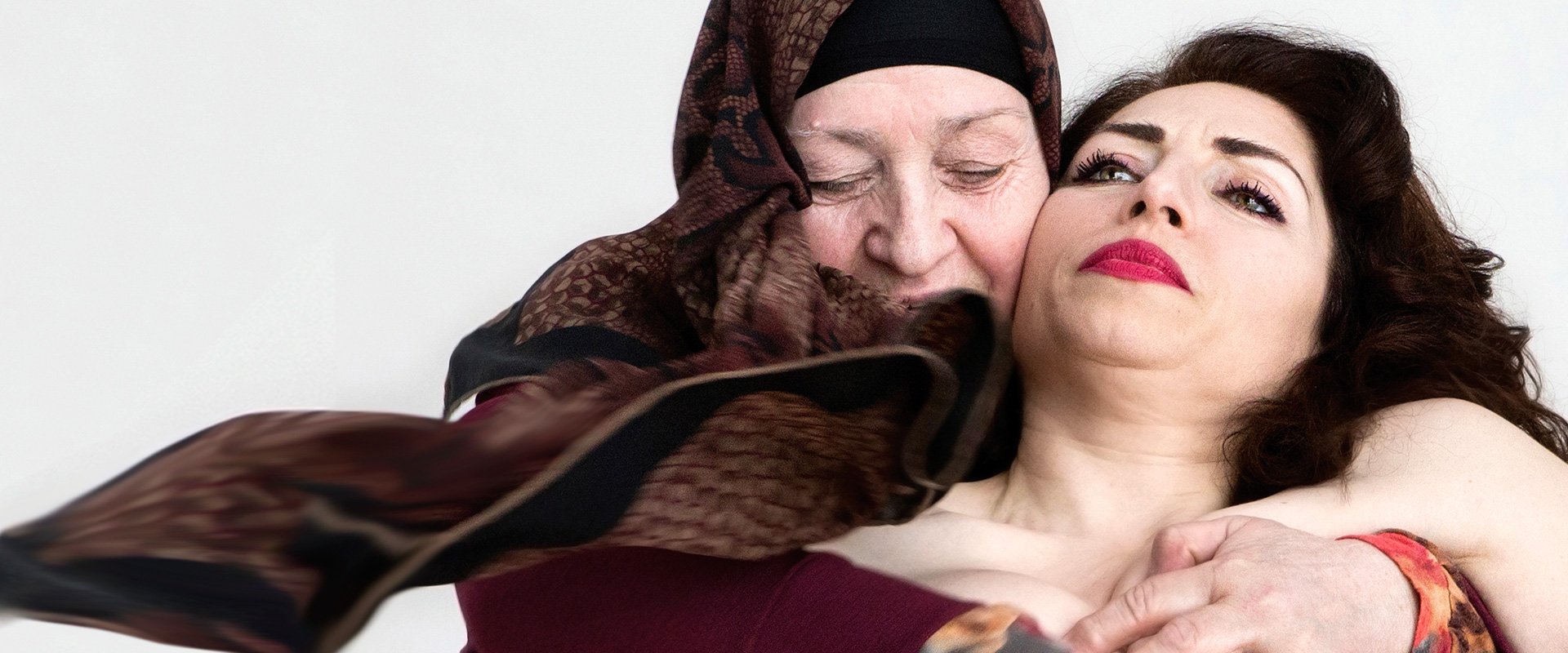

Event Details
Join Council of Ex-Muslims of Britain (CEMB) and Født Fri (Born Free) Foundation for an evening of Film, Discussion and Poetry to mark 8 March, International Women’s Day Sunday 8 March
Event Details
Join Council of Ex-Muslims of Britain (CEMB) and Født Fri (Born Free) Foundation for an evening of Film, Discussion and Poetry to mark 8 March, International Women’s Day
Sunday 8 March 2020, 5:30pm for 6:00pm start until 9:00pm
Central London
Ticket holders will be sent London venue details closer to the event. Venue is in Clerkenwell and is walking distance from Farringdon Station.
UK FILM SCREENING: “No Longer Without You”
‘I will not do what you say. I’ll follow my own path, but I will not let myself be cast out. I will be different, but No Longer Without You.’
“No Longer Without You” is a documentary about a searing conversation about parenthood, tradition, religion, sex, and independence between a free-spirited daughter, Nazmiye Oral and her traditional Muslim mother, Havva in the intimate circle of a living room in front of their family following several public performances.
“How can I walk away when my legs are not my own? And how do I pave my path back? Because my place within the family is my right.”
The film screening will be followed by POETRY by Playwright and Poet Elewisa Mwhamadu Kuusi and A PANEL DISCUSSION ON APOSTASY, SHUNNING AND SURVIVAL with Actress Nazmiye Oral, Youtuber Fay Rahman, Journalist Khadija Khan, Student Activist Saff Khalique, Clinical Psychologist Savin Bapir-Tardy and Født Fri (Born Free) Foundation Director Shabana Rehman. Chair: CEMB Spokesperson Maryam Namazie. The event will be MCed by Nahla Mahmoud. There will also be a drinks reception.
BIOGRAPHIES
NAZMIYE ORAL is an actress, writer, columnist and TV presenter. She began her acting career in the 1990s in the Netherlands with series like Baantjer, Combat, Oppassen! and Westenwind. She also performed in De Gesluierde Monologen, The SuburbSafari and in No Longer Without You, a play she wrote herself. The play was selected for the Holland Festival and Crossing the Line Festival in New York and has also been made into a documentary. Nazmiye has performed in television productions like A’dam E.V.A., Undercover, Moordvrouw and Oh Mijn Hemel, starred in the series Icarus: Zorgondernemer and In Vrijheid by Floor van der Meulen for which she was awarded Best Actress at the Netherlands Film Festival and at the Lucania Film Festival. In 2011 her debut novel ‘Zehra’ was released, for which she was nominated for the E. du Perron prize. She co-founded the Zina Foundation in 2003, a theatre initiative that travels through different neighbourhoods in the Netherlands using local stories.
ELEWISA MWHAMADU KUUSI is a British-born writer, playwright, actor and spoken word artist. Being of Jamaican parentage and born into Islam has given him a niche yet broad and ever-broadening perspective on life and a yearning to expose the flaws, discrepancies and lies of mainstream paradigms. While his works do not adhere to any particular genre, he does like to tell stories and messages that would normally be ignored or left unknown. Leaving Islam in 2013 and identifying as atheist since 2019 has made his truth-seeking disposition all the stronger. He is published in the anthology ‘100 Years Unheard’ (2018), has written and performed in his own stage play ‘Love Hurts’ (2016-17), has lectured on the subject ‘What is a Man? What is a Black Man?’ for the Association of Black Humanists (2018) and West London Humanists (2019), and has performed in various stage plays throughout London since 2012.
FAY RAHMAN is a British-Bangladeshi ex-Muslim atheist Youtuber. Fay grew up in the UK, in a non-practicing Muslim family. Through Islamic schooling she joined the Tableeghi Jamaat and then later adopted the even more conservative Salafi practice of Islam with the encouragement of her father and later her extended family. Fay left Islam in secret in February 2017 and openly in October 2018 – avoiding an arranged marriage, surviving an attempt on her life and causing her family to disown her. Fay collaborates with Faith2Faithless, the Council of Ex-Muslims of Britain and Faithless Hijabi for activism in free-speech, women’s rights and religious freedom. She has an active YouTube channel where she shares her experience as a young woman who has left Islam, the challenges she faces and the inconsistencies in Islam in order to reach others who are doubting or closeted and assure them that they are not alone.
KHADIJA KHAN is a Pakistani journalist and a commentator currently based in UK. She writes about human rights, mainly women’s rights, as well as minorities, extremism and Islamism. She is an advocate for women’s rights, strongly believes that religion infringes women’s rights and Islam is no exception. She denounces the idea of Islamic feminism, since finding refuge for women’s rights under organised religion is not more than a myth. Being a humanist, she believes in tolerance and equality for all human beings. She criticizes the usage of blasphemy laws as a tool to crackdown on dissent and supports freedom of and from religion. She stresses the need of having freedom of speech to counter extremist ideologies in her write ups. She believes that freedom to challenge bad idea is the most effective way to counter extremist narratives.
MARYAM NAMAZIE is an Iranian-born writer and activist. She is the Spokesperson of One Law for All and the Council of Ex-Muslims of Britain and hosts a weekly TV programme broadcast in called Bread and Roses. She is on the International Advisory Board of the Raif Badawi Foundation for Freedom and Euromind. Maryam and CEMB were featured in a 2016 film “Islam’s Non-Believers” by Deeyah Khan. She was also a character in DV8 Physical Theatre’s “Can We Talk About This?”. She was joint winner of the 2019 Emma Humphreys Memorial Prize; awarded the 2017 Henry H. Zumach Freedom From Religious Fundamentalism award; 2016 International Secularism (Laicite) Prize from the Comité Laïcité République; Atheist of the Year by Kazimierz Lyszczynski (2014); Journalist of the Year at the Dods Women in Public Life Awards (2013); awarded the National Secular Society’s Secularist of the Year Award (2005), amongst others. The Islamic regime of Iran’s media outlets has called Namazie “immoral and corrupt.”
NAHLA MAHMOUD is an environment and human rights activist originally from Sudan. She works with a number of campaigns in the UK, including One Law for All and Secular Middle East and North Africa. She leads the Sudanese Humanists Group and is former Spokesperson for the Council of Ex-Muslims of Britain.
SAFF KHALIQUE is a British Pakistani ex-Muslim student and activist, currently studying a masters in International Journalism. Saff left Islam in May 2018 but it was not until September 2019 that she went public with her disbelief. She launched The Sinning Skeptics podcast with the aim to provide a safe space for young Ex-Muslims and Muslims to discuss, question and critique the religion they grew up in. Through her blog, The Amber Journals, she covers issues surrounding freedom of religion, politics and women’s rights, such as collecting women’s experiences with the hijab for No Hijab day. She recently joined the Index on Censorship’s Youth Advisory Board, in which she aims to shed light on repressive apostasy and blasphemy laws across the globe and how this can impact the state’s control of its media and peoples.
SAVIN BAPIR-TARDY is a Lecturer in Psychology at the University of West London. Bapir-Tardy conducted her doctoral research at City University into how traumatic events are experienced. She has worked with adolescents, adults and older adults in a variety of mental health settings. She worked for 8 years as a Counselling Psychologist at the Iranian and Kurdish Women’s Rights Organisation (IKWRO) providing psychological therapy to women who have experienced “honour” based violence, forced marriage, domestic violence and female genital mutilation. Bapir-Tardy also provided training to professionals in mainstream mental health services on “honour” based violence, forced marriage and female genital mutilation.
SHABANA REHMAN is Director of Født Fri (Born Free) Foundation and a performance artist and human and animal rights advocate. She is Norwegian with Pakistani descent. Shabana entered the stage in Oslo, Norway in 2000. In the following years, she quickly built a reputation for groundbreaking and iconoclastic comedy. Her controversial and popular comedy style along with public political stunts like Mullah-Lifting, and bodypainted with Norwegian flag as a performance artist, have given her a unique position in her native Norway. Among substantial international press cover, she has been featured both by The New York Times and by Times Magazine. In addition to her prolific comedy career, Shabana is a highly respected columnist, satirist, and public speaker in Scandinavia and the Scandinavian community in USA. She regularly writes for major newspaper and magazines in the region. A frequent participant and contributor in talk shows and public debates, she is among the most respected celebrities in Norway. Shabana has received several awards for her writing and fearless comedy. She had played her shows in several countries, among them Canada, USA, Denmark, Iceland, Faroe Islands and Germany. She recently founded the Secular Feminist Front.
For more information, contact m.namazie@council-of-ex-muslims-of-britain-e5a565.ingress-baronn.ewp.live or visit ex-muslim.org.uk.
more
Time
(Sunday) 5:30 pm - 9:30 pm
2020sun01mar6:30 pmsun8:00 pmCANCELLED BECAUSE OF CORONAVIRUS: London Support Group6:30 pm - 8:00 pm
Event Details
Join us for our monthly support group, to talk about issues that still affect us after leaving Islam. If you would like to come along, please email hello@council-of-ex-muslims-of-britain-e5a565.ingress-baronn.ewp.live for details of
Event Details
Join us for our monthly support group, to talk about issues that still affect us after leaving Islam.
If you would like to come along, please email hello@council-of-ex-muslims-of-britain-e5a565.ingress-baronn.ewp.live for details of the venue. Please leave enough time for us to call you to discuss your support needs ahead of your first session.
Time
(Sunday) 6:30 pm - 8:00 pm
april 2020
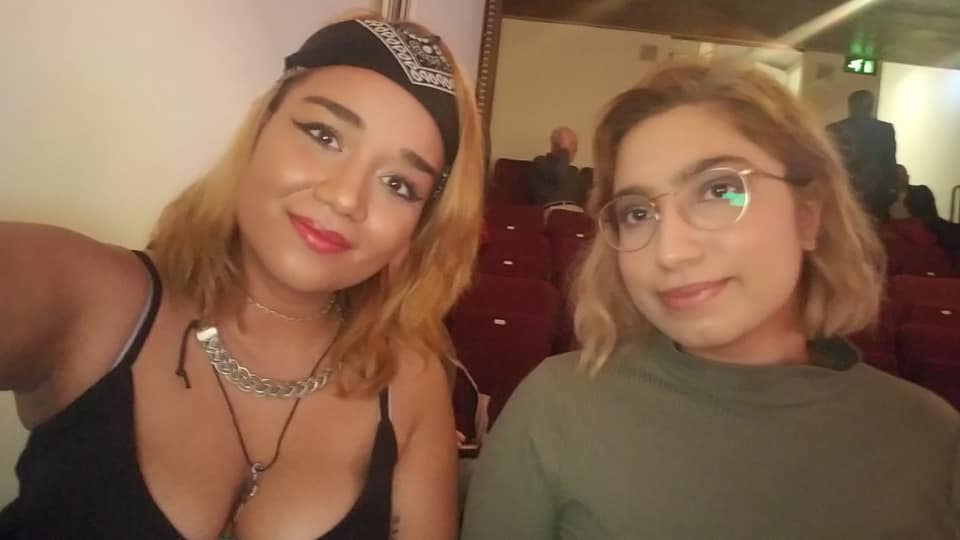

Event Details
On 25th April 2020 at 6:00pm (BST) Fay Rahman and Saff Khalique are livestreaming a Pre-Iftaar Mukbang: a fast-defying feast in conjunction with Council of Ex-Muslims of Britain
Event Details
On 25th April 2020 at 6:00pm (BST) Fay Rahman and Saff Khalique are livestreaming a Pre-Iftaar Mukbang: a fast-defying feast in conjunction with Council of Ex-Muslims of Britain (CEMB). The feast is in solidarity with those who are punished for eating and drinking during Ramadan with floggings, beatings and imprisonment. We would like to also stress the importance of such an action in times such as these, where many are trapped in their homes and forced to fast against their will. Join our live “eat-in.”
#Ramadan
#Fast_Defying_My_Right
more
Time
(Saturday) 6:00 pm - 8:00 pm
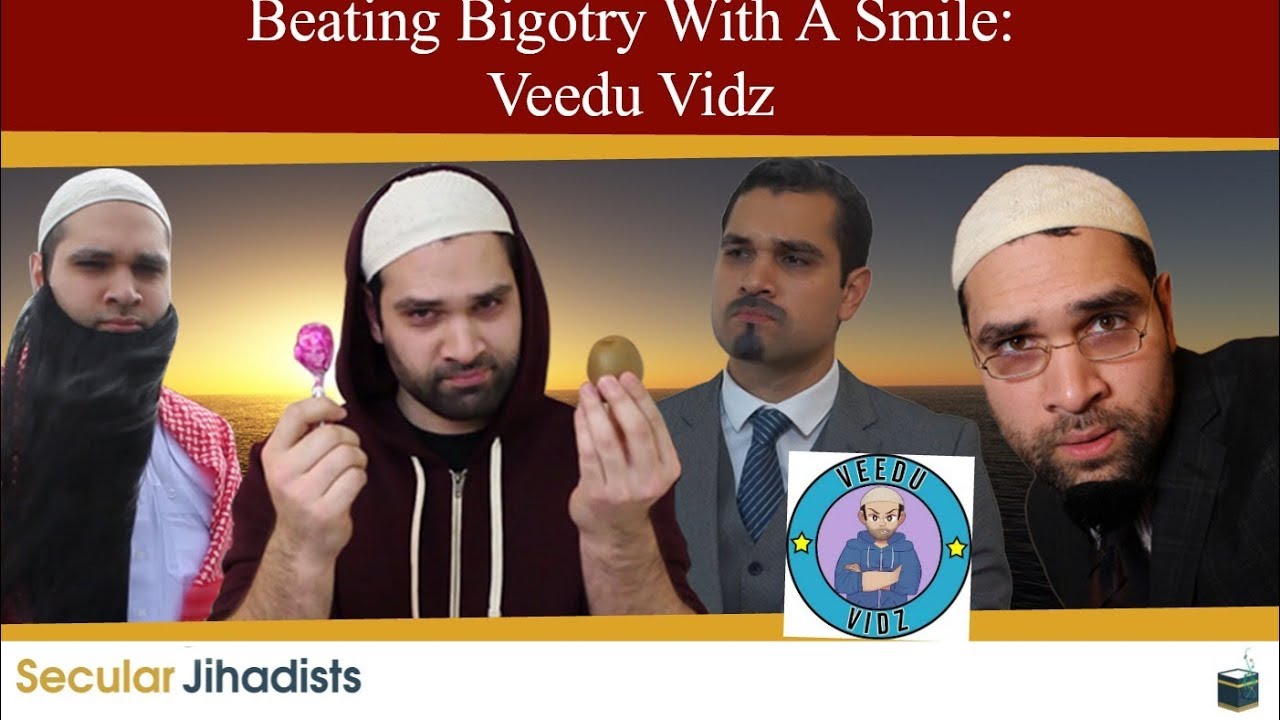

Event Details
JOIN VEEDU VIDZ ON 21 APRIL VIA YOUTUBE AT 7-8:00PM LONDON TIME. Talks will be followed by Q&A. ONLINE – 21 April, 7-8:00pm Join us for our monthly meet-up with Comedian and
Event Details
JOIN VEEDU VIDZ ON 21 APRIL VIA YOUTUBE AT 7-8:00PM LONDON TIME.
Talks will be followed by Q&A.
ONLINE – 21 April, 7-8:00pm
Join us for our monthly meet-up with Comedian and Youtuber Veedu Vidz: To laugh is to live! Importance of comedy in speaking against Islam. Meet-ups are run by Ali Malik.
Veedu Vidz is a YouTube comedian who creates satirical videos on a range of topics mainly focusing on Islam. Veedu is an ex-Muslim who enjoys engaging with his religious and cultural heritage by exploring different ideas and religious preachers in the form of parodies and discussions. Veedu is a free speech advocate and stands for individual rights.
more
Time
(Tuesday) 7:00 pm - 8:00 pm
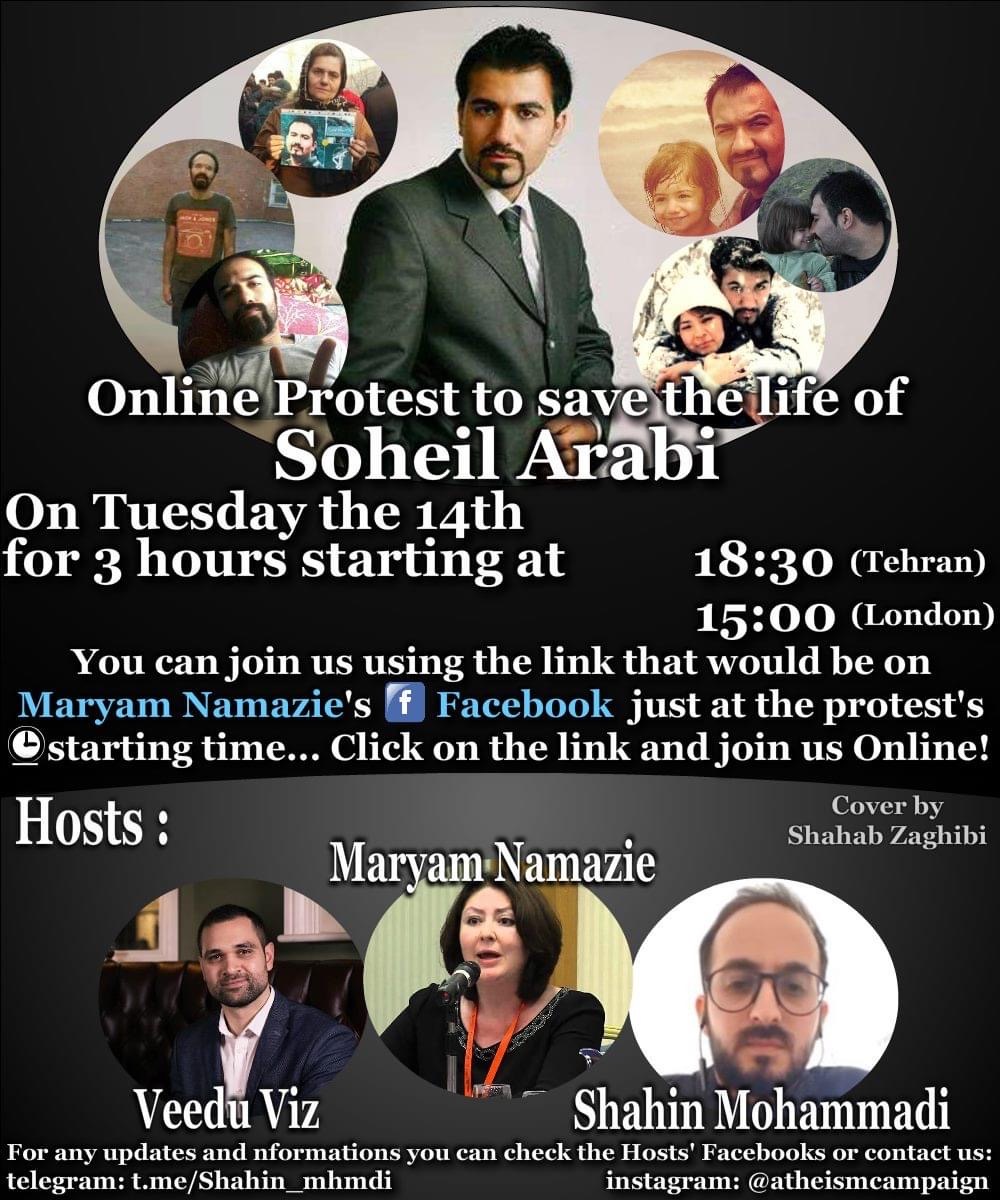

Event Details
Join Urgent Online Solidarity Protest to Save Soheil Arabi’s Life Via Livestream on Youtube and Facebook 14 April 2020 3:00-6:00pm London time/6:30-9:30pm Tehran time Iranian atheist, activist and blogger Soheil Arabi has resumed his hunger
Event Details
Join Urgent Online Solidarity Protest to Save Soheil Arabi’s Life
Via Livestream on Youtube and Facebook
14 April 2020
3:00-6:00pm London time/6:30-9:30pm Tehran time
Iranian atheist, activist and blogger Soheil Arabi has resumed his hunger strike on April 4 in protest to the Iranian regime’s denial of medical care and leave during the Coronavirus epidemic, inhuman prison conditions and unjust sentencing. In addition to physical problems caused by various hunger strikes, Arabi has been tortured, resulting in blunt trauma to his testicles and a broken nose, amongst other injuries. He is in need of urgent medical attention.
Arabi was arrested in December 2013 and sentenced to death for blasphemy, namely insulting the prophet, Iran’s Supreme Leader Khamenei and other Iranian officials in a Facebook post.
Upon appeal, his death sentence was reduced to seven and a half years in prison and two years of religious studies as well as a two-year ban from traveling abroad.
He was later sentenced to an additional 3 years in prison, exile and a fine on charges of “propaganda against the state” and “insulting the sacred and the supreme leader” because of his brave open letters highlighting injustice, inhumane prison conditions, torture and the situation of political prisoners in Iran.
Join our online protest action on Tuesday 14 April 2020, 3:00-6:00pm London time/6:30-9:30pm Tehran time by sending photos, videos, messages… of solidarity to be broadcast during the three-hour livestream. Do a drawing, take a photo, sing a song, recite a poem… Anything to save his life and secure his freedom. The livestream will be hosted by Veedu Vidz, Shahin Mohamadi and Maryam Namazie.
Soheil Arabi has done nothing wrong. He has a right to his opinion, belief and expression and must be released immediately as must all political prisoners and those imprisoned because of their conscience and opinion.
Join the livestream on Youtube or on Facebook.
Sign the Petition to save Soheil’s life.
#FreeSoheil
#Iran
#EndBlasphemyLaws
more
Time
(Tuesday) 3:00 pm - 6:00 pm
2020sat04aprAll Daysun05PULLED OUT OF Anti-theism conference Brighton(All Day)
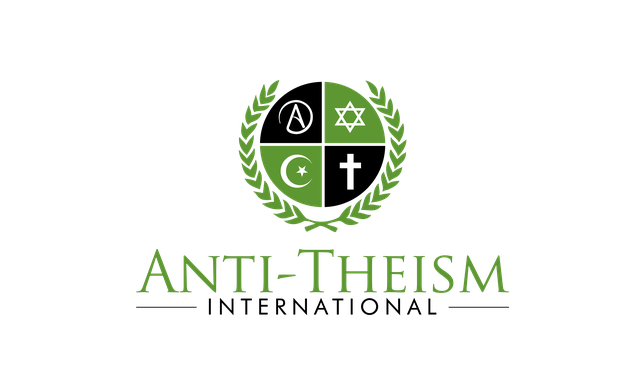

Event Details
Anti-theism conference, Brighton, 4-5 April 2020. Maryam Namazie no longer speaking at the event. For more information, see comments by conference organiser justifying sexual misconduct.
Event Details
Anti-theism conference, Brighton, 4-5 April 2020.
Maryam Namazie no longer speaking at the event. For more information, see comments by conference organiser justifying sexual misconduct.
Time
april 4 (Saturday) - 5 (Sunday)


Event Details
3 April 2020, Emerging Leaders Programme, Cumberland Lodge, Windsor Maryam will join a panel discussion on ‘FoRB and implications for non-religious belief’ More details here.
Event Details
3 April 2020, Emerging Leaders Programme, Cumberland Lodge, Windsor
Maryam will join a panel discussion on ‘FoRB and implications for non-religious belief’
Time
(Friday) 5:00 pm - 7:00 pm


Event Details
CANCELLED BECAUSE OF CORONAVIRUS Please note that this support group will be cancelled because of the risk of spreading coronavirus. We feel it particularly important to take action to stop the
Event Details
CANCELLED BECAUSE OF CORONAVIRUS
Please note that this support group will be cancelled because of the risk of spreading coronavirus. We feel it particularly important to take action to stop the spread, particularly given the government’s inaction in the face of this epidemic.
All events will be cancelled until further notice.
Join us for our monthly support group, to talk about issues that still affect us after leaving Islam. Support group will be led by Marwa Wain.
If you would like to come along and have not been to a support group, please email hello@council-of-ex-muslims-of-britain-e5a565.ingress-baronn.ewp.live for details of the venue. Otherwise show up at usual venue for support groups.
more
Time
(Thursday) 6:30 pm - 8:00 pm
may 2020
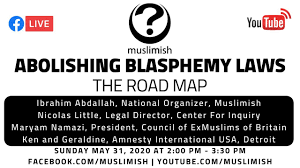

Event Details
Muslimish Virtual Live Conference Broadcast talking about the Road Map to Abolishing Blasphemy Laws across the globe, and especially in the Muslim World. Speakers include: Ibrahim Abdallah, National Organizer, Muslimish Nicolas Little,
Event Details
Muslimish Virtual Live Conference Broadcast talking about the Road Map to Abolishing Blasphemy Laws across the globe, and especially in the Muslim World. Speakers include:
Ibrahim Abdallah, National Organizer, Muslimish
Nicolas Little, Legal Director, Center For Inquiry
Maryam Namazie, Spokesperson, Council of Ex-Muslims of Britain
Ken Grunow, Amnesty International USA, Legislative Coordinator for Michigan and Local Group Co-ordinator
Geraldine Grunow, Amnesty International USA, Local Group Coordinator
You can see it live on Youtube
more
Time
(Sunday) 7:00 pm - 8:30 pm
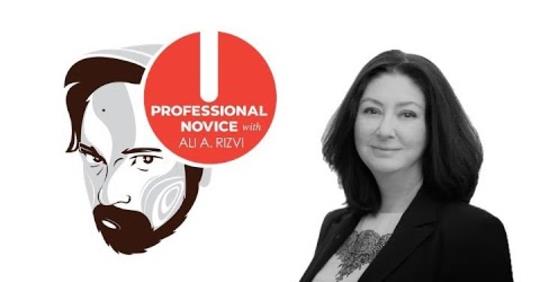



Event Details
Why Ex-Muslims Should Speak Up About #BlackLivesMatter: Ali Rizvi With Maryam Namazie, 15 June 2020 The murder of George Floyd and the protests that followed have sparked passionate conversations within many
Event Details
Why Ex-Muslims Should Speak Up About #BlackLivesMatter: Ali Rizvi With Maryam Namazie, 15 June 2020
The murder of George Floyd and the protests that followed have sparked passionate conversations within many marginalized communities about how insidious systems of oppression can be, especially in this day and age. I’m going to be speaking to Maryam Namazie — the British-Iranian secularist and human rights activist often credited for making the ex-Muslim movement the global phenomenon it is today — about systemic racism, parallels between Islamic and White supremacy, showing solidarity with BLM protesters, and her own personal experience being beaten by the NYPD and thrown in jail during a protest in the early 1990s.
more
Time
May 15 (Friday) 9:00 pm - June 15 (Monday) 11:00 pm
2020thu07may6:30 pmthu8:00 pmONLINE Support Group6:30 pm - 8:00 pm















































































































Event Details
Join us for our monthly support group, to talk about issues that still affect us after leaving Islam. If you would like to come along, please email exmuslimcouncil@gmail.com for details of
Event Details
Join us for our monthly support group, to talk about issues that still affect us after leaving Islam.
If you would like to come along, please email exmuslimcouncil@gmail.com for details of virtual support group meeting.
Five person 90 minute support group sessions are led by Savin Bapir Tardy. Larger 15 group sessions are led by Marwa Wain.
Time
(Thursday) 6:30 pm - 8:00 pm
june 2020
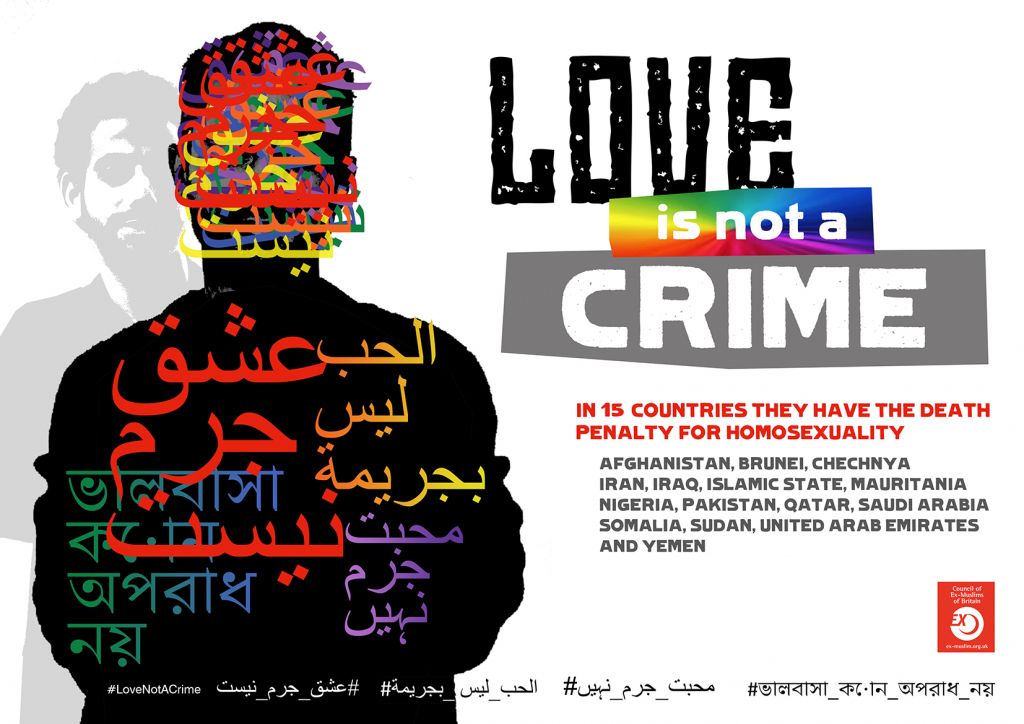


Event Details
Join Council of Ex-Muslims of Britain (CEMB) in a livestreamed online discussion – on Persecution, Shunning and Survival: Being Ex-Muslim/Muslim and LGBT for Pride Month, 5:00-8:00pm London time Livestreamed on Facebook
Event Details
Join Council of Ex-Muslims of Britain (CEMB) in a livestreamed online discussion – on Persecution, Shunning and Survival: Being Ex-Muslim/Muslim and LGBT for Pride Month, 5:00-8:00pm London time
Livestreamed on Facebook and Youtube here: https://youtu.be/fBNkn4iUap4
With Jimmy Bangash, Council of Ex-Muslims of Britain Spokesperson; Khakan Qureshi, Gay Muslim activist and Stonewall LGBT+ school role model and Diversity Role Mode; Lilith, Trans Woman with migration background; Ludovic-Mohamed Zahed, French-Algerian openly gay Imam and founder of the first European inclusive mosque in Paris; Nadia El Fani, Tunisian Filmmaker; Nemat Sadat, Author of the Carpet Weaver and first public gay ex-Muslim from Afghanistan; Saima Razzaq, Birmingham Community Activist and first Muslim woman to lead UK Pride event; and Sohail Ahmed, Counter-extremism and LGBT Activist. Poetry by Halima Salat. Event will be chaired by CEMB spokesperson Maryam Namazie and Youtuber Fay Rahman.
BIOGRAPHIES
FAY RAHMAN is a British-Bangladeshi ex-Muslim atheist Youtuber. Fay grew up in the UK, in a non-practicing Muslim family. Through Islamic schooling she joined the Tableeghi Jamaat and then later adopted the even more conservative Salafi practice of Islam with the encouragement of her father and later her extended family. Fay left Islam in secret in February 2017 and openly in October 2018 – avoiding an arranged marriage, surviving an attempt on her life and causing her family to disown her. Fay collaborates with Faith2Faithless, the Council of Ex-Muslims of Britain and Faithless Hijabi for activism in free-speech, women’s rights and religious freedom. She has an active YouTube channel where she shares her experience as a young woman who has left Islam, the challenges she faces and the inconsistencies in Islam in order to reach others who are doubting or closeted and assure them that they are not alone.
HALIMA SALAT is an ex-Muslim Kenyan Somali. She defines herself as a free thinker, a rebel and an atheist. She was born Muslim but no longer believes in Islam. She was a closet non-believer for a while until when she came to live in the Netherlands 3 years ago. Halima just recently had her “coming out” declaration in Amsterdam. She has many problems with Islam but the core problem is that she truly believes Islam is against a woman’s individual right to steer her own path. Halima is also a spoken word artist and reads her poetry in the few English spoken word scenes in Amsterdam.
JIMMY BANGASH is a Gay Ex-Muslim Human Rights Activist living in the UK. He grew up in a traditional Pashtun family in London where he struggled with both the homophobia and ardent misogyny within his community. He is a contributing author to the book ‘Leaving Faith Behind’ a collection of stories of individuals who have left Islam and he has published poetry and prose on Sedaa; a website that gives voice to people of Muslim heritage. His activist work involves; Spokesperson for the Council of Ex-Muslims of Britain; Committee Member of Faith to Faithless and he is the resident Life Coach at Free Heart Free Minds where he provides one to one coaching and mental health support to Ex-Muslim in Muslim Majority Countries. As an activist, he seeks to unbridle the reins of patriarchy from gays and women of Muslim heritage. As a coach, he works to empower individuals to live lives of authenticity, wellness and self-expression.
KHAKAN QURESHI is the founder of Birmingham South Asians LGBT – Finding A Voice – Birmingham’s first independent non funded social/support group for South Asians who identify as LGBTQI+ regardless of faith and culture. He sits on the multi-faith advisory panel for the National “Impact on Faith and Sexuality” survey created by The Ozanne Foundation, is Administrator for Gay Muslims United, an international online support group on FB, is Co-administrator for British Asians LGBTI, another online support page which attempts to support those within the UK. He is also Stonewall LGBT School Role Model, Diversity Role Model and Independent Speaker, listed on The Independent Rainbow List 2015, Shortlisted for the European Diversity Award 2016, National Diversity Award 2018 and British LGBT Award 2019. He was nominated for the NDA 2019, organised the first South Asians LGBT Conference 2018 in Birmingham and co-ordinated the LGBTIQ+ Intersectionality and Islam Conference 2019. He has written articles about his personal experiences, homophobia within South Asian communities and Islamophobia within the wider community for Attitude, Gay Times, The Gay UK, Gay Star News and other digital magazines.
LILITH is a trans woman with migration background. She is working for the rights of LGBTI refugees and asylum seekers in Germany since 2015. Since November 2017 she is working for the German-wide LSVD e.V Project “Queers Refugees Deutschland”. The aim of the project is to network the structures existing throughout Germany as well as refugee LGBTI activists and to support them in their work. Other than that she is a board member of “Schwules Netzwerk NRW e.V.” and provide her expertise on the matters of trans* persons in the state of NRW. She is involved in the “Queer European Asylum Network” where she provides information on the Queer Refugees and their needs in Germany so that the project can help further for policy briefing for federal government in Germany. She has a degree in Environmental Sciences with a focus on migration due to environmental changes in Island States. She is also an active supporter for the rights of atheists and Ex-Muslims.
LUDOVIC-MOHAMED ZAHED is a French-Algerian openly gay imam, founder of the first European inclusive mosque and CALEM confederation, Founder member of the interfaith network GIN-SSOGIE, Founder member of the Inimuslim international network, and Member of INERELA – theologians living with HIV/aids. He is Associate editor of the Arab research and development (Batna & Amaan universities), one of the 3 French gays of the year (2012), Queer Muslim Award winner of the year (2014), Pierre Guénin prize (for CALEM, 2012), and awarded for Moral Courage (2013). He is currently rector of the CALEM Institute and has Doctorates in Anthropology and in Psychology of religious facts.
MARYAM NAMAZIE is an Iranian-born writer and activist. She is the Spokesperson of One Law for All and the Council of Ex-Muslims of Britain and hosts a weekly TV programme broadcast in called Bread and Roses. She is on the International Advisory Board of the Raif Badawi Foundation for Freedom and Euromind. Maryam and CEMB were featured in a 2016 film “Islam’s Non-Believers” by Deeyah Khan. She was also a character in DV8 Physical Theatre’s “Can We Talk About This?”. She was joint winner of the 2019 Emma Humphreys Memorial Prize; awarded the 2017 Henry H. Zumach Freedom From Religious Fundamentalism award; 2016 International Secularism (Laicite) Prize from the Comité Laïcité République; Atheist of the Year by Kazimierz Lyszczynski (2014); Journalist of the Year at the Dods Women in Public Life Awards (2013); awarded the National Secular Society’s Secularist of the Year Award (2005), amongst others. The Islamic regime of Iran’s media outlets has called Namazie “immoral and corrupt.”
NADIA EL FANI a Tunisian film-maker who risked arrest and up to five years in prison in Tunisia after Islamists filed a complaint against her for her film “Neither Allah nor Master”. The film is an account of Tunisian life immediately before and after the fall of Zine El-Abidine Ben Ali. She was unable to return to Tunisia for 7 years because of the complaint. She lost her production company and is now living between France and Italy. Others films include, “Bedwin Hacker”, “Lenin’s Children”,”It doesn’t even hurt” and “Our breasts, our weapons!”
NEMAT SADAT is the author of the debut novel The Carpet Weaver, which was published by Penguin Random House India in June 2019. Sadat’s debut opened to wide critical acclaim in the Indian national press and was India’s most written about debut fiction last year. Sadat was also profiled in many publications such as Grazia India, The Sunday Guardian, and VOGUE India. Sadat is the first native from Afghanistan to have publicly come out as gay and ex-Muslim and to campaign for LGBTQIA rights in Afghanistan and Muslim communities worldwide. He was interviewed by CNN’s Christiane Amanpour and many other journalists after the Orlando massacre–the largest single attack on LGBT people in recorded history. While teaching at the American University of Afghanistan, Sadat secretly mobilized a gay movement off campus but was then persecuted by the Afghan authorities and deemed a national security threat for allegedly subverting Islam. Sadat has previously worked as a journalist at the UN Chronicle, CNN’s Fareed Zakaria GPS, and ABC News Nightline, and has earned six university degrees, including graduate degrees from Harvard, Columbia, and Oxford. He is working on his second novel, Keeping Up With The Hepburns, while pursuing a master’s degree in writing at Johns Hopkins University.
SAIMA RAZZAQ is a community activist from Birmingham and the first Queer Muslim woman to lead a pride event in the U.K. She is chair of SEEDS (Supporting the Education of Equality and Diversity in Schools), a campaigning group that was formed in light of anti-LGBTQI protests outside schools in Birmingham, in 2019. Saima also runs Birmingham’s only floating hotel; Boatel Birmingham with which she hopes to diversify the inhabitants of the city’s waterways.
SOHAIL AHMED is a counter-extremism and LGBT rights activist. He has appeared on various UK and US TV channels / networks, including the BBC, ITV, CNN, MSNBC, and Fox News. He has also written for various outlets including the International Business Times and Gay Star News. Sohail is a former Islamist radical, and now describes himself as an ex-Muslim / Cultural Muslim. He is currently studying undergraduate Mathematics and Statistics and his interests include politics, science, and psychology.
more
Time
(Saturday) 5:00 pm - 8:00 pm
Location
London
Organizer
Virtual Event Details
RUN
Event has already taken place!



Event Details
27 June 2020, 5-8pm London time Join Council of Ex-Muslims of Britain (CEMB) in a livestreamed online discussion 27 June – on Persecution, Shunning and Survival: Being Ex-Muslim/Muslim and LGBT for Pride
Event Details
27 June 2020, 5-8pm London time
Join Council of Ex-Muslims of Britain (CEMB) in a livestreamed online discussion 27 June – on Persecution, Shunning and Survival: Being Ex-Muslim/Muslim and LGBT for Pride Month, 5:00-8:00pm London time
Livestreamed on Facebook and Youtube here: https://youtu.be/fBNkn4iUap4
With Jimmy Bangash, Council of Ex-Muslims of Britain Spokesperson; Khakan Qureshi, Gay Muslim activist and Stonewall LGBT+ school role model and Diversity Role Mode; Lilith, Trans Woman with migration background; Ludovic-Mohamed Zahed, French-Algerian openly gay Imam and founder of the first European inclusive mosque in Paris; Nadia El Fani, Tunisian Filmmaker; Nemat Sadat, Author of the Carpet Weaver and first public gay ex-Muslim from Afghanistan; Saima Razzaq, Birmingham Community Activist and first Muslim woman to lead UK Pride event; and Sohail Ahmed, Counter-extremism and LGBT Activist. Poetry by Halima Salat. Event will be chaired by CEMB spokesperson Maryam Namazie and Youtuber Fay Rahman.
BIOGRAPHIES
FAY RAHMAN is a British-Bangladeshi ex-Muslim atheist Youtuber. Fay grew up in the UK, in a non-practicing Muslim family. Through Islamic schooling she joined the Tableeghi Jamaat and then later adopted the even more conservative Salafi practice of Islam with the encouragement of her father and later her extended family. Fay left Islam in secret in February 2017 and openly in October 2018 – avoiding an arranged marriage, surviving an attempt on her life and causing her family to disown her. Fay collaborates with Faith2Faithless, the Council of Ex-Muslims of Britain and Faithless Hijabi for activism in free-speech, women’s rights and religious freedom. She has an active YouTube channel where she shares her experience as a young woman who has left Islam, the challenges she faces and the inconsistencies in Islam in order to reach others who are doubting or closeted and assure them that they are not alone.
HALIMA SALAT is an ex-Muslim Kenyan Somali. She defines herself as a free thinker, a rebel and an atheist. She was born Muslim but no longer believes in Islam. She was a closet non-believer for a while until when she came to live in the Netherlands 3 years ago. Halima just recently had her “coming out” declaration in Amsterdam. She has many problems with Islam but the core problem is that she truly believes Islam is against a woman’s individual right to steer her own path. Halima is also a spoken word artist and reads her poetry in the few English spoken word scenes in Amsterdam.
JIMMY BANGASH is a Gay Ex-Muslim Human Rights Activist living in the UK. He grew up in a traditional Pashtun family in London where he struggled with both the homophobia and ardent misogyny within his community. He is a contributing author to the book ‘Leaving Faith Behind’ a collection of stories of individuals who have left Islam and he has published poetry and prose on Sedaa; a website that gives voice to people of Muslim heritage. His activist work involves; Spokesperson for the Council of Ex-Muslims of Britain; Committee Member of Faith to Faithless and he is the resident Life Coach at Free Heart Free Minds where he provides one to one coaching and mental health support to Ex-Muslim in Muslim Majority Countries. As an activist, he seeks to unbridle the reins of patriarchy from gays and women of Muslim heritage. As a coach, he works to empower individuals to live lives of authenticity, wellness and self-expression.
KHAKAN QURESHI is the founder of Birmingham South Asians LGBT – Finding A Voice – Birmingham’s first independent non funded social/support group for South Asians who identify as LGBTQI+ regardless of faith and culture. He sits on the multi-faith advisory panel for the National “Impact on Faith and Sexuality” survey created by The Ozanne Foundation, is Administrator for Gay Muslims United, an international online support group on FB, is Co-administrator for British Asians LGBTI, another online support page which attempts to support those within the UK. He is also Stonewall LGBT School Role Model, Diversity Role Model and Independent Speaker, listed on The Independent Rainbow List 2015, Shortlisted for the European Diversity Award 2016, National Diversity Award 2018 and British LGBT Award 2019. He was nominated for the NDA 2019, organised the first South Asians LGBT Conference 2018 in Birmingham and co-ordinated the LGBTIQ+ Intersectionality and Islam Conference 2019. He has written articles about his personal experiences, homophobia within South Asian communities and Islamophobia within the wider community for Attitude, Gay Times, The Gay UK, Gay Star News and other digital magazines.
LILITH is a trans woman with migration background. She is working for the rights of LGBTI refugees and asylum seekers in Germany since 2015. Since November 2017 she is working for the German-wide LSVD e.V Project “Queers Refugees Deutschland”. The aim of the project is to network the structures existing throughout Germany as well as refugee LGBTI activists and to support them in their work. Other than that she is a board member of “Schwules Netzwerk NRW e.V.” and provide her expertise on the matters of trans* persons in the state of NRW. She is involved in the “Queer European Asylum Network” where she provides information on the Queer Refugees and their needs in Germany so that the project can help further for policy briefing for federal government in Germany. She has a degree in Environmental Sciences with a focus on migration due to environmental changes in Island States. She is also an active supporter for the rights of atheists and Ex-Muslims.
LUDOVIC-MOHAMED ZAHED is a French-Algerian openly gay imam, founder of the first European inclusive mosque and CALEM confederation, Founder member of the interfaith network GIN-SSOGIE, Founder member of the Inimuslim international network, and Member of INERELA – theologians living with HIV/aids. He is Associate editor of the Arab research and development (Batna & Amaan universities), one of the 3 French gays of the year (2012), Queer Muslim Award winner of the year (2014), Pierre Guénin prize (for CALEM, 2012), and awarded for Moral Courage (2013). He is currently rector of the CALEM Institute and has Doctorates in Anthropology and in Psychology of religious facts.
MARYAM NAMAZIE is an Iranian-born writer and activist. She is the Spokesperson of One Law for All and the Council of Ex-Muslims of Britain and hosts a weekly TV programme broadcast in called Bread and Roses. She is on the International Advisory Board of the Raif Badawi Foundation for Freedom and Euromind. Maryam and CEMB were featured in a 2016 film “Islam’s Non-Believers” by Deeyah Khan. She was also a character in DV8 Physical Theatre’s “Can We Talk About This?”. She was joint winner of the 2019 Emma Humphreys Memorial Prize; awarded the 2017 Henry H. Zumach Freedom From Religious Fundamentalism award; 2016 International Secularism (Laicite) Prize from the Comité Laïcité République; Atheist of the Year by Kazimierz Lyszczynski (2014); Journalist of the Year at the Dods Women in Public Life Awards (2013); awarded the National Secular Society’s Secularist of the Year Award (2005), amongst others. The Islamic regime of Iran’s media outlets has called Namazie “immoral and corrupt.”
NADIA EL FANI a Tunisian film-maker who risked arrest and up to five years in prison in Tunisia after Islamists filed a complaint against her for her film “Neither Allah nor Master”. The film is an account of Tunisian life immediately before and after the fall of Zine El-Abidine Ben Ali. She was unable to return to Tunisia for 7 years because of the complaint. She lost her production company and is now living between France and Italy. Others films include, “Bedwin Hacker”, “Lenin’s Children”,”It doesn’t even hurt” and “Our breasts, our weapons!”
NEMAT SADAT is the author of the debut novel The Carpet Weaver, which was published by Penguin Random House India in June 2019. Sadat’s debut opened to wide critical acclaim in the Indian national press and was India’s most written about debut fiction last year. Sadat was also profiled in many publications such as Grazia India, The Sunday Guardian, and VOGUE India. Sadat is the first native from Afghanistan to have publicly come out as gay and ex-Muslim and to campaign for LGBTQIA rights in Afghanistan and Muslim communities worldwide. He was interviewed by CNN’s Christiane Amanpour and many other journalists after the Orlando massacre–the largest single attack on LGBT people in recorded history. While teaching at the American University of Afghanistan, Sadat secretly mobilized a gay movement off campus but was then persecuted by the Afghan authorities and deemed a national security threat for allegedly subverting Islam. Sadat has previously worked as a journalist at the UN Chronicle, CNN’s Fareed Zakaria GPS, and ABC News Nightline, and has earned six university degrees, including graduate degrees from Harvard, Columbia, and Oxford. He is working on his second novel, Keeping Up With The Hepburns, while pursuing a master’s degree in writing at Johns Hopkins University.
SAIMA RAZZAQ is a community activist from Birmingham and the first Queer Muslim woman to lead a pride event in the U.K. She is chair of SEEDS (Supporting the Education of Equality and Diversity in Schools), a campaigning group that was formed in light of anti-LGBTQI protests outside schools in Birmingham, in 2019. Saima also runs Birmingham’s only floating hotel; Boatel Birmingham with which she hopes to diversify the inhabitants of the city’s waterways.
SOHAIL AHMED is a counter-extremism and LGBT rights activist. He has appeared on various UK and US TV channels / networks, including the BBC, ITV, CNN, MSNBC, and Fox News. He has also written for various outlets including the International Business Times and Gay Star News. Sohail is a former Islamist radical, and now describes himself as an ex-Muslim / Cultural Muslim. He is currently studying undergraduate Mathematics and Statistics and his interests include politics, science, and psychology.
more
Time
(Saturday) 5:00 pm - 8:00 pm
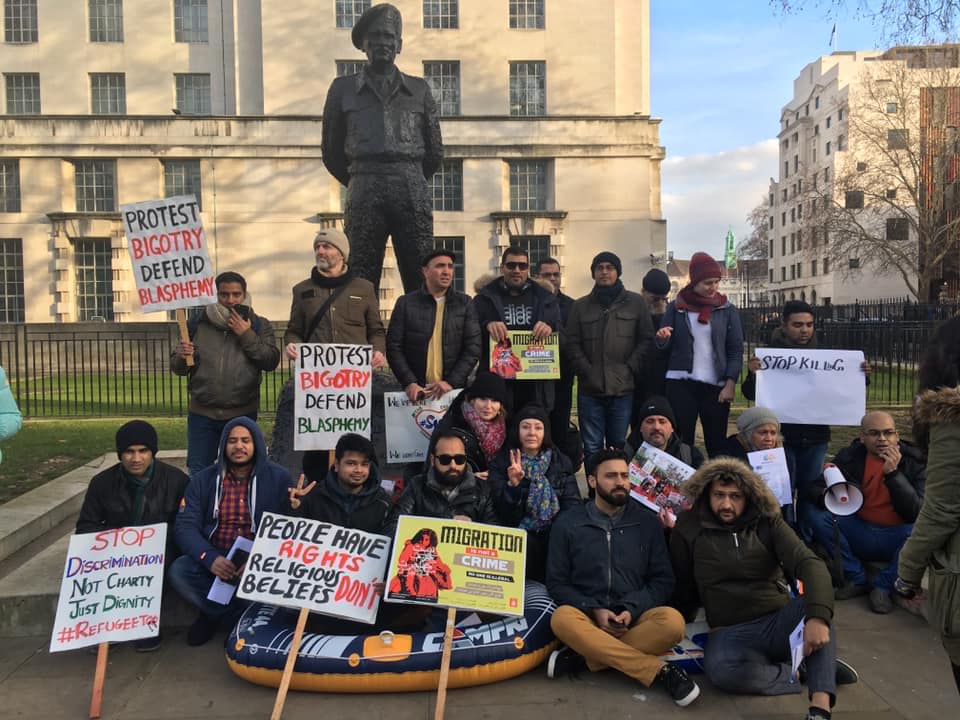

Event Details
16 June – Open Mic for World Refugee Day, 7-8:00pm (London time) Livestreamed on Youtube and Facebook here: https://youtu.be/YSgJbKa97FE This month’s meet-up will be an open mic session to hear the
Event Details
16 June – Open Mic for World Refugee Day, 7-8:00pm (London time)
Livestreamed on Youtube and Facebook here: https://youtu.be/YSgJbKa97FE
This month’s meet-up will be an open mic session to hear the stories of ex-Muslim refugees and asylum seekers in order to mark World Refugee Day. If you want to speak at this event, please email Ali Malik who runs the meet-ups at ali.malik@council-of-ex-muslims-of-britain-e5a565.ingress-baronn.ewp.live.
more
Time
(Tuesday) 7:00 pm - 8:00 pm




Event Details
On Why Ex-Muslims should support BLM and the Fight against Systematic Racism Edited and Expanded Conversation between Ali Rizvi and Maryam Namazie on Professional Novice Podcast Ali Rizvi: Welcome to Professional
Event Details
On Why Ex-Muslims should support BLM and the Fight against Systematic Racism
Edited and Expanded Conversation between Ali Rizvi and Maryam Namazie on Professional Novice Podcast
Ali Rizvi: Welcome to Professional Novice with Ali Rizvi.
I like bringing people on who I really respect in terms of their ideas and their thoughts. And today’s obviously no exception. We will be speaking with one of my heroes, Maryam Namazie. Maryam is a British-Iranian secularist and human rights activist. She’s often credited for making the ex Muslim movement the global phenomenon that it is today. She launched the Council of Ex-Muslims of Britain in 2007. I think the first time I saw you, Maryam, was at a conference in 2008. I don’t know if you remember, but it was a conference here in Toronto and I was in the audience and asked you question. I was completely in awe. There were very few people openly talking critically about Islam. And you were one of them. So you’ve been a hero of mine ever since.
Today, we’re talking about the Black Lives Matter movement. The murder of George Floyd, as everybody knows, triggered a range of protests in the US and worldwide. It’s sparked a lot of passionate conversations, not only amongst the black community but also within other marginalised communities about systems of oppression, how insidious they are, and how we might detect them, especially in this day and age. So Maryam, I think, is the perfect person to talk to about this. There has been a lot of conversations about this in ex-Muslim circles as well. Some are saying systemic racism is real; others are saying it’s not.
We’re going to get into the stats and the data on this a little bit. But one of the things those refuting systematic racism do the most is quote studies about police shootings, which are the most lethal form of police intervention, but also the rarest. Here, I want to drive home the point that George Floyd wasn’t shot by police. Eric Garner, Freddie Gray, Trayvon Martin or Rodney King weren’t shot by police. None of these were police shootings. And the slogan, “I can’t breathe,” which we see with Black Lives Matter was not only about shootings. We have to zoom out from the focus on shootings and talk about systemic racism and all the different ways that it manifests itself. It will obviously include the killings and the shootings as well, but this is about much more than that.
Maryam, thank you for coming on. You have also had a personal experience being subjected to police brutality at the hands of the NYPD for protesting peacefully. But I wanted to start with some of your initial thoughts about the protests and the way this conversation is unfolding in the ex-Muslim community.
Maryam Namazie: Thank you, Ali, for organising this hugely important discussion. Let me preface by saying that some ex-Muslims have been concerned about disagreements within our “community” and the polarization over BLM but the reality is that we’re not a homogeneous community any more than any other so-called community – whether it be Muslim, LGBT, black, white… Also, differences are not a “betrayal” of some imagined collective “identity” but as a result of our individual politics and choices. I have seen these differences often, when for example, I have defended open borders and refugee rights or condemned Brexit. Similarly, discussion on BLM, systematic racism and police brutality are uncomfortable because of fundamental differences in politics but that is why we need to have them. It has to be added that discomfort is not the same as “bullying,” Also, vehement disagreements are not the same as being silenced.
As someone firmly on the Left, for me, BLM is an important movement that has brought the issue of systematic racism in policing into the mainstream narrative. It’s inspiring to see and I feel very much like we are witnessing a new phase of an unfinished civil rights movement. As an activist, I believe that it is in the streets that the status quo can be challenged and this is what BLM is doing. The fact that we have seen protests in other countries shows how much institutional racism is part of the experience of black and minority women and men in countries outside the US too. That doesn’t mean I don’t have criticisms of aspects of BLM as I do of the ex-Muslim movement, for example, but I understand its importance and relevance (beyond a limited organisational scope), particularly during a Trump presidency that relies on white supremacy and identity politics.
Before we delve into the issue I depth, I would also like to add that one cannot address the issue of systematic racism in policing without seeing its pervasiveness in other aspects of the lives of black and minority women and men in the US, for example in education, mortgages, jobs, in the prison industrial complex, the health care system…
Ali Rizvi: I work in the healthcare system, where there is overwhelming, demonstrated evidence of racial bias. In fact, we are trained to be aware of these racial biases, particularly with conditions like sickle cell disease where the racial stigma is so strong that black people often avoid seeking treatment for it. Our students and residents have received training on this, and we are taking all kinds of measures to address it as well.
Maryam Namazie: Of course, police violence is meted out against primarily the poor and working class, including white people, so class is hugely relevant to the discussion. And yes, statistics are important, especially for a movement that prides itself on rationalism but if you focus only on some statistics, whilst disregarding others, and you refuse to recognise the historical and ongoing systems at play, the biases that inform the statistics, the flaws in statistics… then you miss the point. Feigning impartiality by hiding behind statistics is dishonest because no one is impartial here; everyone uses statistics and facts to prove their politics. We are activists after all. But a focus on some statistics and class aspects cannot erase the existence of systematic racism.
Ali Rizvi: This is a really important point that I wanted to talk about. As someone who has worked in science and medicine for several decades, we are trained to read research articles critically. We took specific courses on critical reading. The way that I look at a journal article, or any kind of scientific publication, is that I look at the figures first, then the materials and methods, results, and then go on to the introduction and discussion. Critical reading is key to the processing of any presentation of data. This is why peer review is so important. Moreover, data must be contextualized. Of course, statistics and data are the only way we have to eventually get to some sort of objective sense of what is happening, but it can’t always be evaluated in a vacuum.
For example, according to the UN, the prevalence of rape in Sweden is 24 times higher than India and 135 times higher than in Saudi Arabia. Now, most of us will look at this data and we won’t believe it. And there is a good reason we won’t believe it: we know that reporting rape carries a heavy stigma—and even risk of punishment—in India and Saudi Arabia, and many times, it is being actively covered up by the authorities. The data that we’re getting from Saudi Arabia and India is often coming from the same establishment that is covering up for these crimes. The Catholic Church is another example. Child molestation is systemic in the Catholic Church. They say, we have a few bad apples and this doesn’t represent the Church. But what happens to these “bad apples”? They are simply moved from one place to another. Their colleagues just look the other way. What makes the child molestation systemic is the complicity of their colleagues that helps the perpetrators get away with it.
Remember, the 1992 LA riots didn’t happen after the beating of Rodney King. Rodney King was beaten by police a year earlier. The riots were sparked by the acquittal of the four officers who beat him. Similarly, Black Lives Matter didn’t start because of Trayvon Martin’s shooting. It started after his murderer was acquitted. This is about justice and accountability. I’d also like to note here for those who cite police shooting data all the time that neither of these cases were cases of police shootings.
Maryam Namazie: Moreover, many things cannot be measured with available statistics for a number of reasons, including bias in data collection as well as cover-ups – e.g. much of the statistics on policing in the US, for example, is provided by the police themselves. It can also be a question of blind spots. When I started the Council of Ex-Muslims of Britain in 2007, a number of journalists and others asked why there was a need when there were no statistics available to show that leaving Islam was even an issue. That’s why for me statistics or facts collected by activist campaigns are so important as they bring attention to problems that have been ignored – e.g. in the case of honour-related crimes, apostasy and also systematic racism in policing.
Ali Rizvi: Whenever we talk about these protests and the importance of them, a lot of people point out that the US is actually one of the least racist countries in the world. I understand this as somebody who is also an immigrant, who has come to North America from places like Saudi Arabia and Pakistan, where, racism is much more rampant, open, and even state-endorsed. The way the Saudis treat Indians, Pakistanis, Filipinos and non Arabs, I can tell them I agree that yes, it is one of the least racist countries in the world, though Canada is much better. These are pluralistic nations of immigrants, and I appreciate that. But it is important to understand how the US became this way. It is precisely because of protests like the ones we’re seeing today, many of which were much more violent and bloody in the past, even if you don’t count the Civil War. In contrast, the vast majority of protesters today—and this is now the largest protest in US history—are peaceful.
Maryam Namazie: One response to the assertion that the US is not a racist country would be that things might be better because of struggles similar to BLM – like the civil rights movement in the US, which was met with incredible violence by the state and white supremacists, including for example the assassination of civil rights leaders. Even so, it is questionable to consider the US as one of the least racist countries in the world given its history of slavery, racial segregation via Jim Crow laws, and the continued racism practiced today. 13th is an excellent film on how this racism continues in the prison industrial complex by incarcerating huge numbers of black men in particular and like slavery facilitates slave labour and the denial of citizenship rights. Much of the US’ criminal justice system was established during the Jim Crow era so it is unsurprising that racial biases continue in all areas, including in education. Despite changes in law– e.g. Brown vs Board of Education – to desegregate schools, segregation is still rife. My sister is a teacher in Yonkers where most of the students are black and minority.
Also, saying other countries are more racist is a form of whataboutery that we ex-Muslims are familiar with. When we speak about Islamism, we are reminded about US imperialism as if one cannot speak about a specific injustice and inequity. Now, we are reminded about racism in Saudi Arabia or Pakistan when we defend protests against racism in the US. I think those who try to take the focus elsewhere are more interested in making political and ideological points rather than addressing issues like Islamism or racism.
Racism is institutionalised in the US because as the abolitionist Angela Davis says, it hasn’t transitioned into a post-slavery society to include former slaves. The people who think that the US is the least racist country in the world really have no idea what racism means and its effects on people’s lives.
Ali Rizvi: I want to talk about the looting and vandalism that many right-wingers have tried to make the face of BLM, despite the fact that the majority of protesters are peaceful. We did see it initially in the first few days as we have in past historical events when particularly egregious incidents, in this case the horrific Floyd killing, spark intense public anger. People get angry. They immediately react. They want to be seen and heard for once. And then the conversation begins. It’s worth noting that the leaders of the Black Lives Matter movement, President Obama, Atlanta mayor Keisha Bottoms, celebrities like Killer Mike, and even the family of George Floyd, have denounced the looting as a distraction from the goal. To be sure, people do understand why it happens, they sympathize with the anger and the frustration and the helplessness, but it nevertheless did die down. And of course, there were opportunistic actors also coming in. But again, people who want to oppose the protests want to make looting the face of it, but these are the largest protests in the history of the US, and they have been astoundingly peaceful. People in my family, my nephews, nieces, they’ve all participated in them. Interestingly, since we’re talking about police brutality, it’s curious that when you look at these videos of looters, there’s no police in sight; but you see countless videos of the police tear gassing peaceful protesters.
Maryam Namazie: When you have mass movements and people on the streets, there will be those who want to take advantage of the situation. As ex-Muslims we know how the far-Right tries to hijack our movement and we have those who have bought into this narrative but you cannot tar a mass movement for equality and an end to discrimination in this way. Mass movements are messy and often not coordinated and not everything always goes according to plan but you need to look at the aims and the actions of movements to determine their legitimacy. BLM has brought attention to an epidemic of police violence and state violence against black and also minority people in the United States. And what it’s done is it has shifted culture in a very short period of time. Seeing George Floyd die in front of our eyes helped people see what anti-racists have been saying for many decades. So this shift has to be celebrated and strengthened and supported so that change can come about. It’s particularly important at this period in time too given that Trump is in the presidency – someone who clearly promotes white identity politics and privileges supremacy. In a period of Trump, Boris Johnson, and far-Right parties in Europe,
a progressive people’s movement taking a stand for equality is a victory for us all. And I think that’s one of the most important points that I want to raise – BLM is a gain for us. When we agree that Black Lives Matter, we’re not saying that other lives are not important, but that all lives can truly matter if black lives matter.
I don’t see myself merely as an ally of BLM. I don’t like the term ally. I have skin in the game. For me, this is my movement. And as I would like others who are not ex-Muslim to see our movement as their own. And this is what BLM has managed to do despite all the misinformation. They have brought lots of different people out on the streets. The protests have been inclusive and inspiring. And because of this deep-seated impact, everybody’s jumping on the bandwagon – from the NFL to Starbucks to Boris Johnson – because the narrative has shifted and it’s shifted in people’s favour.
We need to recognise important moments like these if we are going to build on them and push for equality and human rights for everyone.
Let me also add that not everyone defending or opposing Black Lives Matters are friends or enemies. Also, your enemy’s enemy is not necessarily your friend. I decide what side I take based on its politics and its positive impact on human life and welfare. I know Islamists are jumping on the BLM movement to promote their anti-Americanism. Ayatollah Khamenei speaks of African American’s being brutalised when a pillar of his regime has been based on the brutalisation of minorities, workers, women, LGBT, atheists, dissenters and so on. Also, his regime promotes racism and bigotry against migrants, including Afghan migrants in Iran. But I cannot stop defending BLM because the Iranian regime has Tweeted in its favour, nor am I going to stop defending protests in Iran because Trump Tweeted in their favour. Trump’s or the Islamic regime of Iran’s “support” is only to win political points against one another rather than out of any real concern for people’s lives.
Moreover, there are some on the Left (what is now for me at least confusingly called Woke) that denigrate and accuse anyone who doesn’t agree with them. This section of the Left has long accused us of Islamophobia when criticism of religion and the religious-Right is clearly not the same as bigotry against believers but I am not going to start supporting the far-Right and white nationalists just because some on the Left make false accusations. I do not determine my politics based on what the Islamists or the so-called Woke Left say. And I don’t think anyone should.
As an aside, though, I think there is a lot of hypocrisy with the focus being solely on what is called the woke Left or Social Justice Warriors. To me, it seems like a sly, underhanded way of attacking the Left in general whilst legitimising right-wing politics or at the very least remaining silent on the Right’s role in promoting Islamism or racism or what have you. For example, much of the support for Islamism has come from Right-wing governments. Islamism was brought to centre-stage because of United States foreign policy during the Cold War and its attempt at creating a green Islamic belt around the Soviet Union at the time. Some of the US’ or UK’s closest allies are Islamist states like the Saudi government that can even cut into pieces a journalist in their embassy in another country and business carries on as usual. What I want to say is that there are those on the Right and Left that defend Islamism. The Right’s role has had the most impact because it has been part of state policy so the focus on SWJs saying something on Twitter or even cancelling a talk is not on par with how those in power have facilitated Islamism. A little perspective might help those who only seem to see the Left bogeyman but never manage to hold the Right responsible for its actions. There is never any excuse for the SJW or Wore Left but there are always excuses for the far-Right and the white nationalists. You can see this in all the discussions taking place nowadays. For example, people are quick to rightly condemn identity politics which homogenises the Muslim “community” and equate criticism with bigotry but some of those very same people buy into white identity politics and its victimhood narrative to the extent that they will say that there is not systematic racism against black people in policing (using limited statistics) whilst saying – without their almighty statistics mind you – that there is in fact systematic racism against white people!
For me, in the end, where you stand on BLM boils down to your politics and which side one stands with. People should stop hiding behind statistics and instead they should have the courage to defend their politics. My politics are clear. I’m going to keep pushing for people to support Black Lives Matter, to support an end to police violence, racism in policing in the same way that I’m going to push for an end to blasphemy and apostasy laws. I think they’re linked. And I think it’s important that we see those links if we’re going to move forward. No movement can win in isolation. You can’t win women’s rights if men are not involved in the fight for liberation. You can’t win rights for ex-Muslim if Muslims are not fighting in your corner. Black Lives Matter has become a mass movement. We need to both support them but also show them how our movements are linked, how our lives are linked, how our rights are linked. That’s how change always comes about I think that is key for me.
Ali Rizvi: Well, for once, you’re far from alone. Something very different is happening this time round. I’ve heard all the doomsday prophesizing about a moral panic and impending chaos, but most people don’t think so. For the first time, and this is actually incredible, 74% percent of people in the US support the protests. And even more amazingly, 53 percent of Republicans—that’s Trump’s party—support the protests. These are very, very compelling numbers and we can see the impact. NASCAR has banned Confederate flags from its races. Mississippi, the last state to have it on its flag, is now removing it. Major sports leagues in the US have embraced Black Lives Matter, including the NFL, which once shunned Colin Kaepernick for taking a knee, but now openly admits that was a mistake. People often dismiss these cultural changes, but they are very significant. Corporations and companies that never get into these charged issues have released strong statements. This is something that I have never seen before.
They’re talking seriously about getting rid of qualified immunity, a special tier of immunity that’s given to police officers, allowing them to get away with much more than the rest of us can. There is a bipartisan effort now to try to get rid of it. So, this is a fight that we’re winning.
For all of you who are disillusioned by the systemic racism-deniers, especially on social media, know that for once, this movement is really gaining ground, not only in the US, but internationally.
Maryam Namazie: Statistics are often used to deny systematic racism so we should look more carefully at these statistics but if I am completely frank, I feel some are hiding behind statistics in order to put forward a certain type of politics. There is political impetus for denying systematic racism against black people (using statistics) whilst maintaining systematic racism against white people (without any statistics). None of us are impartial and we are all trying to put forward our political perspectives – including the far-right, the Islamists… As I said before, differences are about politics and there is a level of dishonesty to hide behind statistics rather than defend one’s position clearly.
For me, placing the focus on “racism against white people” and denying racism against black people is because those people have bought into white nationalism and white identity politics, which is another form of identity politics.
On the issue of statistics, though, I want to reiterate a few points. There are many things you can’t show with statistics, especially if biases or blind spots exist. The statistics on police violence, for example, is gathered by the police themselves, and that’s one of the main problems with available government statistics. The police can lie, can hide the truth and the blue shield of silence means that they will never be held to account. It’s only when video evidence comes to light and their narrative is challenged that we get to see what really happened.
For example, when I was arrested by the NYPD in 1991 at a protest against the War Parade welcoming returning soldiers from the first Gulf War, I was pulled over the barricades, kicked in the face, my glasses broken; one police jumped on my stomach with his knee. I was so shocked I remember asking him “What are you doing?” while he was on my stomach. I had internal bleeding. It was a traumatic experience for me. In jail, we were woken up in the middle of the night and photographed and told we wouldn’t be protesting if we had been fucked properly… We became known as the War Parade 18 (I was working on a one year contract at Amnesty International at the time) and charged with obstructing government administration, resisting arrest, disorderly conduct, felony riot… charges that could have ended with 13 years in prison. The court case took many years. We were attacked by police at the court as well. None of us had money for lawyers so we were lucky that a group of left-wing lawyers agreed to take up our case pro bono and that a War Parade 18 Defence Campaign helped to raise funds for court-related costs. Eventually, news footage was discovered showing how the police had actually attacked and beaten us and the charges were finally dropped.
I tell you my experience to explain how you cannot rely on police statistics. Police brutality, if recorded, will blame the victim by claiming – for example – that they resisted arrest. My own arrest and the ensuing court case opened my and my family’s eyes to the immense violence and brutality of the police. One of the black women arrested with me had braids from her head completely pulled out. Another 16 year old black woman had a concussion as cops told her she would get the Rodney King treatment when they attacked us in the court house! I hope I would have had empathy without my traumatic experience but because of what happened to me, a world previously hidden opened up. Political commentator Trevor Noah makes an excellent point about this; with only 21% of US adults coming in contact with police, and opinions on police formed via television programmes showing how they can do no wrong, one can begin to see why the general public have taken so long to understand the extent of racism in policing. Until George Floyd when perceptions shifted considerably. As we know from his case, the initial police report was very different from what we all saw on our screens during the last harrowing nearly 9 minutes of George Floyd’s life. Initially, the police report said he was resisting arrest but the video clearly showed otherwise – him pleading for his life, calling for his mother and saying he couldn’t breathe. In the case of Breonna Taylor who was shot dead in her own home, the police report initially listed her injuries as none – though she had been shot 8 times. In the case of Ahmaud Arbery in Georgia, the father and son who killed him whilst he was jogging were only arrested two months later. Initially, the police said there were no grounds for arrest as the father and son had used their citizen’s arrest rights in confronting Arbery. Later when the video came to light showing that he was in fact jogging, it was revealed that there had even been orders not to arrest the two white men. Two District Attorneys also had to recuse themselves because of connections with one of the killers…
So, if statistics are based on police reports, you can see very clearly how they can be fallible and deceptive. And we only know the reality is very different in the rare cases that video footage or other evidence comes to light.
Therefore, I find it absurd when some say that according to statistics only a few of those killed were actually innocent! More importantly, even if someone has committed a crime, why should they be killed during arrest? And how many were killed like George Floyd and there is no video footage to prove it?
In 2016, a US government pilot project to count police killings which drew on open-source data and a survey of local authorities found that the rate of those killed were much more than official reports. It recorded 270 homicides by officers in three months in 2015. The FBI said earlier this year that it had counted just 442 in all of 2015 because the FBI’s annual count of homicides by police, depends on police chiefs voluntarily submitting their numbers. So, clearly, data is not being fully shared. Also, when other police officers are the only witnesses, they will defend other cops and it is hard to get the facts and data in all the cases.
Ali Rizvi: One of the studies that is quoted by a lot of systemic racism-deniers is the Harvard study by Roland Fryer, which looked both at police shootings and non-lethal force—which is serious in and of itself. As I said before, George Floyd, Eric Garner, and Freddie Gray weren’t shot by police. Fryer found that black people are at least 50% more likely to be roughed up by police, and this disparity cannot be explained by offending rates alone. But he found no racial disparities when it comes to shootings. The paper was widely criticised. For one, it wasn’t peer-reviewed and this is stated in a disclaimer at the outset. Second, the police shootings data came almost entirely from police reports, often written by the involved officers themselves. This is like obtaining data on medical malpractice from the accused doctors themselves. Obviously, when you’re getting your data from law enforcement authorities who also have the power and interest to hide these incidents from the public eye, you’re not going to get an accurate picture. Third, looking at racial bias among police shootings alone ignores a fundamental component of the story: police encounters. Most police killings happen during routine traffic stops, arrests for non-violent or petty crimes, responses to domestic disturbances, and so on. And every killing begins with an encounter. Studies on police shootings that find no racial disparities, such as the PNAS Johnson and Cesario study, typically analyse all shootings, when they should really be looking at how frequently police use force in all encounters, and then correct for differences between blacks and whites. Recently, the authors of the PNAS study retracted the study in full for this reason. And a letter criticising the study for being based on “flawed science” was signed by an astounding 871 academics and researchers from a variety of disciplines, ranging from criminal justice and economics to medicine, engineering, and statistics.
And by the way, the data on systemic racism in police encounters is unequivocal. Many studies show that black people are more likely to be stopped by police. A recent study of 95 million traffic stops—the largest study of this kind to date, I believe—showed that this disparity disappears at night, when the race of the driver can’t be clearly discerned. That’s jarring. And once stopped, black people are more likely than whites to be searched, but less likely to be carrying contraband. Once arrested, they are more likely to be charged, incarcerated, and receive longer sentences and higher bail for similar offenses compared to whites. They are more likely to be subjected to physical force, even after adjusting for higher offense rates. Young black men are more likely to be seen as threatening by police than young white men. People sometimes say black people resist arrest. This is also baseless. The data shows that black people are less likely to resist arrest, and more likely to be unarmed. And even when they’re compliant, black people are 21% more likely to experience police aggression than compliant whites. So being compliant and cooperative with arresting officers actually disproportionately benefits whites significantly more than blacks.
The thing is, you simply cannot divorce police shootings from police encounters, where the evidence of systemic racism is robust and unambiguous. Physicist Neil deGrasse Tyson knows a thing or two about data analysis, and he puts it simply and clearly when he says, “If your demographic gets stopped ten times more than others, then your demographic will die at ten times the rate.”
Maryam Namazie: As an aside, even if someone resists arrest, how does that justify killing them? Why is it considered justifiable for the police to kill? We are always hearing about how the person in question would have been alive if only they hadn’t resisted arrest or ran or … As Trevor Noah says “There’s one common thread beyond all the ifs. If you weren’t black, maybe you’d still be alive.”
And BLM isn’t just relevant in the US. Some ask why BLM exists in the UK as if the UK doesn’t have a racism problem. One of the reasons, George Floyd’s death moved so many across the world is because the racism, the dehumanisation, the brutality hit a nerve. It was personal for a lot of people who had seen this day in and day out throughout their own lives. And racism isn’t history or old news as some would like us to believe. Take into account the wider context, from race science and eugenics, which Angela Saini documents in her book “Superior,” the perpetuation of the idea that black people are biologically inferior and white people biologically superior, colonialism, the hostile environment… and you can see its ugly effects very much today. The recent Windrush scandal in Britain shows that this is not past history and that it’s very much part of present-day British history in the making. People who came to Britain 50-60 years ago as children and Commonwealth/British citizens were detained and abused and deported from the only home they had known because no proof was enough to show they had lived here all their lives. Later, it was revealed that the Home Office had actually torn up their landing cards so they could deport large numbers of people. Some died before being able to return to Britain and some have not yet been able to return to their homes and families.
Even slavery is not in the past. British taxpayers only stopped paying for slavery in Britain in 2015. An equivalent of 17 billion pounds was paid in reparations not to the enslaved but to slave owners for loss of property!
Ali Rizvi: I don’t think those who say slavery or the Jim Crow laws ended many years ago understand how the collective mindset behind these, still continue to this day. Yuval Noah Harari wrote about this in one of the most eloquent ways that I’ve seen, in Sapiens. From the time they were brought to America as slaves, black people were thought of as unclean, unintelligent, and incompetent. When slavery ended, they were still thought of that same way—the stereotype persisted into the segregated Jim Crow era, which was essentially premised on the stereotype. If some of these freed black people got a good education and then applied for a good job, they were very likely to lose it to an equally or even less qualified white person because of the stereotype. Then, the society sees that despite being freed and having a shot at education, white people still hold all the good jobs, and that probably means that black people really aren’t as smart or competent, so our stereotype was right. To quote Harari: “Trapped in this vicious circle, blacks were not hired for white-collar jobs because they were deemed unintelligent, and the proof of their inferiority was the paucity of blacks in white-collar jobs.” So no, it hasn’t ended, and Black Lives Matter isn’t just about George Floyd. It’s about the overall system. George Floyd was just a catalyst. His killing was the straw that broke the camel’s back. The system was built in the Jim Crow era and hasn’t significantly been updated since.
Maryam Namazie: There are instances in history where masks are removed and the truth comes through despite all the propaganda and lies and I think George Floyd’s death was one such moment. It was 8 minutes and 46 seconds of police sitting on his back and neck with such impunity and disregard for human life even though they knew they were being filmed. It’s because there is never any accountability and they felt they would get away with it. Chauvin who kneeled on Floyd’s neck had 18 prior complaints against him as did some of the other officers involved.
Apart from that fact that there is no accountability, the problem is systematic, which doesn’t mean that everyone in the system is racist but that regardless of individuals within, the systems and institutions perpetrates racism and produce disparate outcomes.
In the UK, it was the killing of Stephen Lawrence in 1993 that highlighted institutionalised racism in policing. Stephen was an 18-year-old young black man who was murdered by a group of white racists in Eltham, southeast London whilst waiting for a bus. It took 20 years for two of those who were responsible to be prosecuted. The McPherson inquiry into his killing found that his family were failed because the police were not able to recognise both the racism that killed him but also the racism in the police. All the officers involved in the investigation denied racism or racist conduct and genuinely believed that he or she had acted without bias or discrimination. They also wouldn’t accept that the murder was racially motivated. So what this case showed is that racism is often hidden, unconscious, insidious, difficult to detect and even unintentional so it doesn’t show up in statistics.
Racism in general terms consists of conduct or words or practices which disadvantage or advantage people because of their colour, culture, or ethnic origin. In its more subtle forms, it can be as damaging as in its overt forms.
The McPherson inquiry stated that institutional racism was “the collective failure of an organisation to provide an appropriate and professional service to people because of their colour, culture, or ethnic origin. It can be seen or detected in processes, attitudes and behaviour which amount to discrimination through unwitting prejudice, ignorance, thoughtlessness and racist stereotyping which disadvantage minority ethnic people.”
Ali Rizvi: It is also important to recognise what systemic racism isn’t. It is expressly not about an army of racist cops going out and looking to kill black people. You can’t see what’s going on inside someone’s head. We don’t even know if Chauvin was genuinely racist, or just a general sociopath who may have done the same to a white man—unless we have mind-reading fMRI type technology, we can’t objectively evaluate that. But what we can say is that the criminal justice system produces racially disparate outcomes. For that, the evidence is overwhelming, as I cited earlier. This system produces and trains white cops, black cops, good cops, and bad cops. It’s similar to what we see with religion. Major religions like Islam and Christianity are fundamentally misogynistic, and we can see these misogynistic attitudes manifest themselves in religious women as well. Sure, no analogy is perfect, but you do see, and studies have shown, that black officers who come out of the system can also harbour its inherent biases. Now you have artificial intelligence being used to predict crime, where some communities are given more policing attention than others. And if the data being fed into these AI algorithms is bad, you will have officers of all races making assumptions about people in one community potentially being more violent than another, and that will affect how they approach, say, routine traffic stops. This problem is huge, and its roots are deeply entrenched in very contaminated soil.
Maryam Namazie: The criminalisation of the black male in particular has helped pave the way for a new form of slavery as shown very clearly in Ava DuVernay’s brilliant documentary – 13th – on mass incarceration in America. The view of black men as naturally violent and criminal hasn’t changed much from the view that was perpetrated during slavery and the Jim Crow era. This view of black men gives permission to the police to act with impunity.
Ignoring all these facts and realities and using limited statistics to “prove” there is no racism against black people, whilst also regurgitating the racist narrative of the “violent criminal” black man isn’t about being rational but about hiding behind some statistics to promote a politics that is informed by white identity politics. My politics in support of BLM is clear. What is unclear to me at least is why those who hide behind statistics don’t just come out and defend their politics rather than reducing an important social and political issue to a question of statistics.
If you rely on statistics alone, you can reach the shocking conclusion of Tulsa police major who said “All of the research says we’re shooting African Americans about 24% less than we probably ought to be, based on the crimes being committed”!
Also, as I mentioned before, official statistics can be misleading and deceptive. So when looking at statistics, it helps to look at those gathered by activists and human rights defenders like Mapping Police Violence, which shows how there were only 27 days in 2019 where police didn’t kill someone with black people being three times more likely to be killed than white people; three times more likely to be unarmed compared to white people. Also, the level of violent crime in US cities doesn’t determine the rate of police violence. For example, in Buffalo, New York, where the percentage of “people of colour” is 50 percent, violent crime rate is twelve per thousand and no one has been killed by Buffalo police from 2013-16. In Florida, where the percentage of “people of colour” is 42 percent and violent crime rate is nine per thousand – less than Buffalo – 13 people have been killed by Orlando police in that same period. And there’s no accountability for these killings. 99 percent of police killings from 2013-19 haven’t resulted in anyone being charged.
As Maurice Mcleod writes: “Black people are being killed by law enforcement in the USA at a rate of about two deaths per week. This is almost identical to the rate that lynchings took place in the Jim Crow era. Lynching didn’t stop in the USA, it just put on a uniform.”
Ali Rizvi: And while we’re talking about evidence, there’s the data from the National Academy of Sciences Frank Edwards, Hedwig Lee, and Michael Esposito, showing the lifetime risk of a black man being killed by police to be 1 in 1000. That’s staggering. Over the course of their lifetime, one of every 1000 black men can expect to be killed by police. And when they point out that black people offend at a higher rate than whites—which many of the studies showing racial bias adjust for, by the way—we also have to look at what is being implied. Why did it become that way? Is it in their DNA? Is it genetic? Could it possibly be the effect of the same systemic biases that these people are denying? Are we going to talk about that? Why are black people on average at a lower socioeconomic tier? What are the reasons for it? And are those reasons systemic? And that will also bring you back to this whole conversation about systemic racism. Some things become so deeply entrenched in society that we consciously forget how big they are. It’s like Google, which just started as a company, but is now literally a verb that means “search for on the web.” Google this, Google that. It becomes part of our day-to-day living, and we consciously forget that it’s actually a brand. The demonisation and criminalisation of black men, I think, operates at that level.
Maryam Namazie: The Sentencing Project shows that “African Americans are more likely than white Americans to be arrested; once arrested, they are more likely to be convicted; and once convicted, and they are more likely to experience lengthy prison sentences. African-American adults are 5.9 times as likely to be incarcerated than whites and Hispanics are 3.1 times as likely. As of 2001, one of every three black boys born in that year could expect to go to prison in his lifetime…” Also, they show that the same crime by a white and black person doesn’t have the same consequences.
A large part of this is as I mentioned before the criminalisation of black men in America. It’s like the criminalisation of migrant men who are seen as threats to “our white women”. This is a continuation of racist propaganda seen in the Jim Crow era that feeds into fear and legitimises scapegoating and dehumanisation whilst encouraging silence.
On the issue of violence, too, it is interesting how the more expansive all-encompassing, institutionalised violence inflicted by the state is never seen as violence but taking food or shoes from a shop is. I’m not for looting, but the British Museum is filled with things that have been looted from Iran and other countries. The West was built on the looting of other countries. The looting of those in power, however, is completely legal and legitimate. But if you are poor and disenfranchised, then it is a major offence. The division between legal and illegal looting is important here as is legal and illegal violence.
It is perfectly legal for the police to kill you with impunity. And still be fully funded. Look at police budgets. The NYPD budget is $11 Billion – imagine! 1 in every 125 New Yorker is homeless, people don’t have health care, schools are dilapidated, services are being cut but the police budget keeps growing and growing. That’s why people are calling for defunding the police and pouring money into the communities instead. Community policing can be dangerous as Rahila Gupta explains with “community leaders” acting as gatekeepers and it’s difficult to see how police can be abolished in a capitalist system but transformation is desperately needed. Much of the money poured into police departments should be poured into social services and welfare.
Ali Rizvi: Police reform is key. And smarter funding isn’t just a hypothetical thought experiment. It has been tried and tested in places like Camden, New Jersey. As you said, these police departments have monstrous budgets. But the problem is they’re dealing with things that they really shouldn’t have to deal with, like traffic stops, where so many of these unfortunate incidents happen. Why do you need super armed police with tasers and guns giving out speeding tickets? Why do you need super armed police to deal with homelessness, domestic disputes, mental health issues, or drug addiction? You should have substance abuse specialists dealing with that. You should have social workers dealing with domestic issues. Of course, it’s still dangerous work, and police could still have a role, but it would be a secondary role. It’s putting too much pressure on the police that if there is a mental health issue, if there is a homelessness issue, well, call the police. They’re underqualified for all of this and overworked already. We should absolutely be talking about redistributing these resources to other disciplines as well. I do want to say here that from a branding perspective, I don’t exactly love slogans like “defund the police” or “abolish the police.” You always end up having to explain what it means, and that becomes a distraction from the issue. I hope they call it something that’s quicker and clearer to understand, even something more aggressive sounding, like “radical police reform.”
Maryam Namazie: Now that attention is on the police, there is a chance to push for fundamental changes. It is going to be difficult because I think the police play an important role in managing communities for those in power. And violence is an important component of that control and management. I wonder if the police are really reformable and if reform is enough?
Ali Rizvi: It’s like the conversation we have about reforming Islam versus being ex-Muslim. It really depends what you mean by “reform.” If you look at it, what Minneapolis is doing is they’re dismantling the entire police force and then they’re building it again from the ground up. Right-wing alarmists love to talk about the dismantling part without mentioning the part about rebuilding. Nonetheless, that is also a form of reform. There is a misunderstanding that this means that they’re going to absolutely get rid of policing, which is not the case there, and it certainly wasn’t the case in Camden, New Jersey. No one serious is talking about getting rid of the police. In Camden, they dismantled what they had, and then rehired a lot of the officers. They implemented new systems of training. They established new protocols on de-escalation of situations. In this sense, yes, I do think reform is possible. I’ve had friends who are police officers who genuinely want to help, have good intentions, and want to do the right thing, often at great risk to their lives, livelihoods, and mental health. Another parallel with Islam and Muslims: I often hear apologists say that the problems in the Muslim world aren’t because of Islam. Islam is great, they say, but Muslims are the problem and they misrepresent it. The “bad apples” thing. And I think it’s the other way around. Most Muslims are good, conscientious people. It’s the system, the ideology that is warped.
Maryam Namazie: I understand what you’re saying but, if I’m honest, I hate the police as I hate immigration. I shake when I pass a border, when I see the police as I do when I pass the embassy of the Islamic Republic of Iran. It makes me feel very uncomfortable. And again, there might be wonderful police officers but the system is unjust and it has to change. And because of public attention and pressure right now, there is the possibility for demanding accountability. But for transformation, I can’t see it happening under this system. I am very much on the left. And I do think that racism, sexism… is intertwined with capitalism and a system that puts profit before human welfare. Whatever gains we make, if we’re not vigilant, can easily be taken away so the fight for equality or an end to racism is ongoing. But whilst attention is on BLM, it is important to push for change. And to remember that an injury to one is an injury to all. This is not a slogan. If our societies are unequal and racist, it affects everybody, even those who are not facing that inequality directly.
Ali Rizvi: I think you’re right that it is the system that is unjust, and it tars everyone who is a part of it. We may not align on everything politically even as fellow left-liberals, but on that fundamental point, I’m with you.
I also wanted to talk to you about identity politics. I’ve often heard you talk about identity politics and how problematic it is. This is also something we hear right-wingers complain about all the time, even though identity politics is even more rampant on the right. They’ll complain about how the left fetishizes black and brown identity. I saw a funny comic about what would happen if these Trumpistanis were around at Martin Luther King, Jr.’s time, saying, “There you go, Martin, making everything about race again!” But they’re so obviously blind to the much more insidious identity politics on their side, about white nationalism, “race realism,” preserving their European or Judeo-Christian heritage, and so on. They talk about how the nation states of Europe must maintain their identity, as if it’s somehow immutable. But you, I think, are one of the only people I know who has called both sides out on this.
Maryam Namazie: There’s confusion on what identity politics is. Some feel Black Lives Matter is about identity politics. But there is a difference between promoting difference / superiority and demanding equality and rights. Like ex-Muslims are. I think it’s important to make distinctions between liberation movements, between movements that are defending rights, that are defending equality like BLM versus identity politics, which defends difference and superiority (two sides of the same coin) and promotes a form of narrow nationalism and the idea that it’s only authentic members of your in-group that matter. We’ve seen this perspective often and it’s detrimental to liberation movements. With BLM, like with any movement, it is important to look at what they say and do and their aims. BLM protests include all types of people – and is based not on identity – but on common cause – to end institutional racism in the police.
Ali Rizvi: If your identity has been the basis of discrimination against you and you call it out, that’s not the kind of identity politics we’re talking about. We are talking about identity politics being problematic when identity is exploited to gain some kind of privilege, not when it is asserted to fight for equal treatment. Which brings us to the question of white privilege, which I also want to ask you about. One thing that has been really unprecedented about these protests is the diversity. You have white people, black people, brown people, men, women, gay, straight, trans—all marching together. Not only are a majority of white people showing solidarity with the protesters, but also, as we mentioned earlier, a majority of Republicans. So even though we know white privilege is real, how helpful is it to bring it up in this context? Is it a distraction? Does it take away from BLM’s focus on trying to get rid of systemic racism?
Maryam Namazie: Personally, I don’t like the term white privilege because I agree with the writer Kenan Malik that “viewing white people – all white people – as ‘guilty and complicit’ distorts political issues and deflects from real causes.” Just as men can be feminists, white people can be anti-racists but I can understand the concepts of privilege and entitlement. As ex-Muslims, as LGBT, as women, once can understand how the default in society is religious, straight or male. It’s also white.
Ali Rizvi: Another issue I wanted to get your views on. A lot of people are concerned about vandalism and the destroying of statues. Anti-BLM folk have made this the face of the movement. Do they have a point? Are they right to be concerned about historical revisionism? They want to get rid of the statues of Winston Churchill. There is a street in the city that I live called Winston Churchill and they want to change the name of it. Some wanted to get rid of statues of Gandhi. There’s a petition saying we must bring down the Gandhi statue because he was a racist. Set aside the long-overdue acknowledgment here that people of colour can also be racist, but how do you view this issue of statues?
Maryam Namazie: It’s not really revisionism or erasure of political figures if there are no statues glorifying them. There is a space for historical statues in museums but in the public space? Is it fitting to have statues of slave owners, for example, or the Belgian king Leopold II whose rule killed 10 million Africans or of Winston Churchill whose crimes included 50,000 men, women and children forced into concentration camps? Stalin also fought the Nazis, but do we want a statue of murderer like him in the public space? In history, victors decide who is glorified and a large part of that actually includes erasure and revisionism of reality.
Ali Rizvi: I understand. But there is another way that I look at this. First of all, I’ve never cared all that much for statues in general. It doesn’t really matter to me. And I don’t have a problem with some of these statues being moved from the public space into museums. But I want to channel something that Barack Obama said: people are complex, and people change. I grew up in the 80s, when homophobia was vastly normalised. In my school, we used anti-gay slurs as part of what was the norm. We would use the “f” word and call things we didn’t like “gay.” As I grew older, more aware, and the public conversation changed, I evolved my views on this, and felt embarrassed about how I used to think. We sometimes underestimate the power of indoctrination from your environment. We have seen countless examples of people who embraced misogyny and anti-scientific thinking when they were religious, and then changed when they left the religion. Cultural and political views work the same way. So when the questions come up, “Is this a statue we should destroy?” or “Is this a historical figure we should permanently cancel?” I put it through a test: If I was a white man living in North America in the early 1800s, would I be sympathetic to the idea of owning slaves? Chances are, yes. If I were a man living in 1915, would I subscribe to the idea of determined gender roles? Most of us would. A lot of these white Antifa kids today would probably harbour any number of racist and homophobic attitudes if they were transported back to the 1940s. From that lens, I give some historical figures a pass. But if I were transported back to the time of the Civil War, I know I wouldn’t be on the side of the Confederacy. If I went back to 1930, I know I would be evolving in favour of suffrage, just as I evolved in favour of LGBTQ+ rights in the late 1980s and early 1990s. So for me, there is a clear distinction between tearing down a Lincoln statue versus the statue of a Confederate general. It’s strange to me to imagine if two generations in the future, when lab-grown meat is the norm and killing animals for food is obsolete, people began to equate Obama and Trump as equally bad because both ate meat. It muddles history when we view it through the lens of our current ethics and moral standards.
Maryam Namazie: But current moral and ethics standards matter because it is part of human progress and history. Why celebrate slaver owners and criminals when there is so much of human history that deserves celebration. Those in power have very good reason for why they glorify slave traders and criminals and no amount of discussion will get them to change their minds. There had been years of petitioning to remove the statue of Colston in Bristol. He was a slave trader! Let that sink in and they did nothing so protesters took action and dumped the statue in the sea. I don’t see anything wrong with it. It’s not an act of violence. But it pushes boundaries and makes the authorities understand that glorifying slave traders is not acceptable – not in the 21 century. Every right that has been fought for has pushed boundaries and made unacceptable what was normal before the struggle reached fruition. “Riots” for civil rights, gay rights, for women’s suffrage, people arrested, killed…
Ali Rizvi: They were killed, Martin Luther King and Harvey Milk were assassinated.
Maryam Namazie: After a fight has been won, it shifts culture, perceptions, laws, policies, society and it is seen as a positive movement in hindsight but not so when it is taking place all around us. Then it is labelled violence, rioting, vandalism, criminal…
Ali Rizvi: I’m with you on that. The transformative revolutions of the past that brought about changes like suffrage for women, civil rights, abolition of slavery, and gay rights were much more violent and bloody than what you’re seeing today. All those movements were called riots in their time. That doesn’t mean violence is okay, of course, but those who want to make a few incidents of violence and vandalism the face of the largest protest in American history are laughable.
I wanted to talk to you about one last point. We were talking about statistics and some of the problems with them, like data on shootings coming from police officers themselves. Often with data, people start dismissing lived experiences as anecdotes, as if they are of no significance. And I find that especially strange coming from ex-Muslims. How many times have we been told, well, your experience isn’t real, you only left Islam so you could get attention, make money, have sex and drink alcohol? In Bangladesh in 2015, when we saw a half-dozen secular bloggers violently hacked to death with machetes in a matter of months, people were talking about how this is not a serious issue in Bangladesh, the government is officially secular, and these are just a few bad Muslims who don’t represent Islam. Where were the statistics and data? I see the videos that Ex-Muslims of North America does, they are personal stories, anecdotal for sure, but do you dismiss them for want of more data?
When Rodney King was beaten, and black people were telling us this was the norm and not the exception, how much data was there on systemic racism and police brutality? Not everyone had a cell phone camera in 1992 like they do now so there is every reason to think that this was much more rampant back then than it is now, even though we see more videos of it now. When people asked at that time, we don’t know if this is really happening—where’s the evidence?—there wasn’t really a lot of it, was there? I was in high school at the time and it was no surprise to me, maybe because I used to listen to a lot of the early ‘90s hip-hop. NWA’s Fuck the Police was amazing, and Ice-T had a great song called Cop Killer, which sparked a lot of controversy for those who didn’t understand it. It obviously wasn’t a call to kill cops. It was a cry of protest, an expression of the frustration and anger around being on the receiving end of this immense injustice that remained invisible to the public eye. Funny enough, he plays a cop on TV now. So when Rodney King was beaten, my friends and I thought, okay, that’s what these guys have been rapping about for a few years now. It was depressing, obviously, but not as shocking as it was to the deniers. The thing with data and statistics when it comes to systemic racism in policing is that this is an ongoing inquiry where we’re still finding out about it. There are many things about it you can’t draw firm conclusions on, especially those who say it doesn’t exist. I think it was Carolyn Porco who talked about how hard it is to prove that something doesn’t exist. To prove there’s a cockroach in your house, all you need is to find one cockroach and you’re done. But to prove there isn’t, you have to search every nook and cranny thoroughly, repeatedly, and simultaneously. It’s essentially impossible. It is irresponsible and dangerous to conclude that systemic racism isn’t real when the evidence for it is so overwhelming. As rationalists, we should be following the evidence, in all its forms, and not the political narratives of denial that have almost become dogma in themselves.
It is bizarre to see some ex-Muslims who rightly lambasted the regressive left for turning a blind eye to Islamic supremacy now themselves turning a blind eye to white supremacy. Do you have any final comments on this?
Maryam Namazie: I would like to end by saying that BLM as a movement must be supported. I am not talking about a specific organisation. But about a movement for equality and an end to racism in policing. This isn’t saying that only black lives matter but that they matter too. The writer, Arundhuti Roy says arguing #alllivesmatter… “is a sly way of draining the politics out of what is being said by resorting to meaningless truisms. Asians and Whites are not being murdered, incarcerated, disenfranchised and impoverished in the US in the way African Americans are. Ever since slavery in the US ended there has been a concerted effort to violently hobble, hold down and enslave African Americans in other ways that appear to fit into the social contract and legal framework of a democracy.” Saying All Lives Matter is like saying AllPeopleMatter during Gay Pride or AllMenMatter during International Women’s Day. The aim is not to defend everyone but to trivialise and diminish the fight for gay rights or women’s rights and in this instance black lives.
As feminist Jessica Crispin wrote recently: “When we are dealing with someone who is indoctrinated or besotted with bad or regressive thinking, the intuitive approach is to educate or instruct. But there truly is no replacement for actual, physical, social encounter between humans to create a shared perspective. And right now, in this uprising, that is where the counterintuitive, but constructive, answer is forming. We are encountering each other in our shared (and forced) encounters with the police. The building can start from there. There is no shortcut. We must find one another on the streets.”
Whist things have shifted in such a short time in favour of those fighting against racism, what becomes of this fight in terms of lasting change depends on us all. No fight for equality or liberation is guaranteed. What happens in the end will depend on what we each do next.
It is an uphill battle. There are huge historical and real forces that are against racial equality, that are against an end to racism in policing because racism is a useful tool for control like religion or sexism as is a policy of divide and rule. But if there is hope, it is the streets where we find it most by standing with and for each other and recognising our common humanity.
Ali Rizvi: Well said. Thank you, Maryam.
Ali Rizvi is Pakistani-Canadian author of The Atheist Muslim and host of the Professional Novice. Maryam Namazie is Iranian-born activist and Spokesperson of Council of Ex-Muslims of Britain. The above is an edited and expanded transcript of a 15 June 2020 podcast discussion.
more
Time
(Monday) 9:00 pm - 11:00 pm
2020thu04jun6:30 pmthu8:00 pmONLINE Support Group6:30 pm - 8:00 pm















































































































Event Details
Join us for our monthly support group, to talk about issues that still affect us after leaving Islam. If you would like to come along, please email exmuslimcouncil@gmail.com for details of
Event Details
Join us for our monthly support group, to talk about issues that still affect us after leaving Islam.
If you would like to come along, please email exmuslimcouncil@gmail.com for details of virtual support group meeting.
Five person 90 minute support group sessions are led by Savin Bapir Tardy. Larger 15 group sessions are led by Marwa Wain.
A larger support group led by ex-Muslim Marwa Wain. Marwa is an ACCPH accredited Counsellor and Psychology certified Life Coach. She specialises in Anxiety, Depression and Relationship issues. For the past three years has worked alongside the lead psychotherapist in managing individual and group therapy for the Grenfell fire survivors. She is a member within the Domestic Violence Forum for the East London area and part of the counselling committee for East London schools. Marwa also has a wealth of experience working with ex-Muslims and the struggles they face.
A small, five-person support group led by Savin Bapir Tardy. Savin is a Counselling Psychologist and conducted her doctoral research at City University into the experience of traumatic events. Savin has worked with adolescents, adults and older adults in a variety of mental health settings, including ex-Muslims and victims of domestic violence, ‘honour’ based violence, forced marriage and female genital mutilation.
more
Time
(Thursday) 6:30 pm - 8:00 pm




Event Details
Why Ex-Muslims Should Speak Up About #BlackLivesMatter: Ali Rizvi With Maryam Namazie, 15 June 2020 The murder of George Floyd and the protests that followed have sparked passionate conversations within many
Event Details
Why Ex-Muslims Should Speak Up About #BlackLivesMatter: Ali Rizvi With Maryam Namazie, 15 June 2020
The murder of George Floyd and the protests that followed have sparked passionate conversations within many marginalized communities about how insidious systems of oppression can be, especially in this day and age. I’m going to be speaking to Maryam Namazie — the British-Iranian secularist and human rights activist often credited for making the ex-Muslim movement the global phenomenon it is today — about systemic racism, parallels between Islamic and White supremacy, showing solidarity with BLM protesters, and her own personal experience being beaten by the NYPD and thrown in jail during a protest in the early 1990s.
more
Time
May 15 (Friday) 9:00 pm - June 15 (Monday) 11:00 pm
july 2020
2020sun26julAll DayCEMB Social in Hyde Park!(All Day: sunday)
Event Details
26 July 2020 CEMB will be organising its first social following the lock-down in Hyde Park. All welcome to join us for a picnic. Those interested in attending, please RSVP
Event Details
26 July 2020
CEMB will be organising its first social following the lock-down in Hyde Park. All welcome to join us for a picnic. Those interested in attending, please RSVP with Ali Malik who runs the socials at ali.malik@council-of-ex-muslims-of-britain-e5a565.ingress-baronn.ewp.live. Looking forward to seeing you there!
Time
All Day (Sunday)



Event Details
Due to the Coronavirus pandemic, our meet-ups will be online until further notice. All meet-ups will be livestreamed via Facebook or Youtube. Relevant link will be posted here the day before
Event Details
Due to the Coronavirus pandemic, our meet-ups will be online until further notice.
All meet-ups will be livestreamed via Facebook or Youtube. Relevant link will be posted here the day before event.
Talks will be followed by Q&A.
21 July 2020, 7-8:00pm
Join us for our monthly meet-up to explore identity politics, racism and liberation with Gita Sahgal and Maryam Namazie. Meet-ups are run by Ali Malik.
Gita Sahgal is a writer, journalist, film-maker and rights activist. She is currently Founder and Director of Centre for Secular Space. She was formerly Head of the Gender Unit at Amnesty International; she was suspended in 2010 after she was quoted criticising Amnesty for its high-profile associations with the Islamist Moazzam Begg, the director of a group called Cageprisoners. For many years she served on the board of Southall Black Sisters and was a founder of Women Against Fundamentalism and Awaaz: South Asia Watch. With Nira Yival Davis, she edited “Refusing Holy Orders: Women and Fundamentalism in Britain” (London, 1992). Among her articles are “Legislating Utopia? Violence Against Women, Identities and Interventions” in “The Situated Politics of Belonging”. During the 1980s, she worked for a Black current affairs programme called “Bandung File” on Channel 4 TV. She made two films about the Rushdie affair, “Hullaballoo Over Satanic Verses” and “Struggle or Submission”. She has also made two programmes for Dispatches Channel 4, “The Provoked Wife” on the case of Kiranjit Ahluwalia and “The War Crimes File”, an investigation into allegations of war crimes, committed by members of the Jamaat i Islami in Bangladesh in 1971.
Maryam Namazie is Co-Spokesperson for One Law for All, the Council of Ex-Muslims of Britain and Fitnah. She hosts a weekly television programme called Bread and Roses. She is on the International Advisory Board of the Raif Badawi Foundation for Freedom; National Secular Society Honorary Associate; a Patron of London Black Atheists and Pink Triangle Trust; International Advisory Board Member of Feminist Dissent and a columnist for The Freethinker. The Islamic regime of Iran’s media outlets has called Namazie immoral and corrupt and did an ‘exposé’ on her entitled “Meet this anti-religion woman.” Maryam was a character in DV8 Physical Theatre’s Can We Talk About This?, which deals with freedom of speech, censorship and Islam. She was awarded the 2017 Henry H. Zumach Freedom From Religious Fundamentalism award; 2016 International Secularism (Laicite) Prize from the Comité Laïcité République and was honoured by the National Secular Society for her campaigning work defending free speech at universities (2016) despite attempts at barring her by Student Unions or Islamic Society efforts to intimidate her and cancel her talks. She was also awarded Atheist of the Year by Kazimierz Lyszczynski (2014); Journalist of the Year at the Dods Women in Public Life Awards (2013); selected one of the top 45 women of the year by Elle magazine Quebec (2007); one of 2006′s most intriguing people by DNA, awarded the National Secular Society’s Secularist of the Year Award (2005), amongst others.
more
Time
(Tuesday) 7:00 pm - 8:00 pm
2020thu02jul6:30 pmthu8:00 pmOnline Support Group6:30 pm - 8:00 pm















































































































Event Details
Join us for our monthly support group, to talk about issues that still affect us after leaving Islam. If you would like to come along, please email exmuslimcouncil@gmail.com for details of
Event Details
Join us for our monthly support group, to talk about issues that still affect us after leaving Islam.
If you would like to come along, please email exmuslimcouncil@gmail.com for details of virtual support group meeting.
Five person 90 minute support group sessions are led by Savin Bapir Tardy. Larger 15 group sessions are led by Marwa Wain.
Time
(Thursday) 6:30 pm - 8:00 pm
august 2020
Event Details
August 18, 2020 This month’s online Meet-up is with Cemal Knudsen Yucel, founder of Ex-Muslims of Norway on Islam, Childhood, Superstitions and their impact on growth. Meet-ups are run by Ali
Event Details
August 18, 2020
This month’s online Meet-up is with Cemal Knudsen Yucel, founder of Ex-Muslims of Norway on Islam, Childhood, Superstitions and their impact on growth. Meet-ups are run by Ali Malik. Talk will be followed by Q&A.
Due to the Coronavirus pandemic, our meet-ups will be online until further notice.
You can click on this link to view it live.
Cemal Knudsen Yucel was active in the youth branch of an Islamist movement. He is now an ex-Muslim atheist activist and founder and chair of Ex-Muslims of Norway. He writes articles, participates in debates related to apostasy, blasphemy, women’s status in Islam, Islamic reform, and political and social issues.
more
Time
(Tuesday) 7:00 pm - 8:00 pm
2020thu06aug6:30 pmthu8:00 pmOnline Support Group6:30 pm - 8:00 pm


Event Details
Join us for our monthly support group, to talk about issues that still affect us after leaving Islam. If you would like to come along, please email exmuslimcouncil@gmail.com for details of
Event Details
Join us for our monthly support group, to talk about issues that still affect us after leaving Islam.
If you would like to come along, please email exmuslimcouncil@gmail.com for details of virtual support group meeting.
Five person 90 minute support group sessions are led by Savin Bapir Tardy. Larger 15 group sessions are led by Marwa Wain.
Time
(Thursday) 6:30 pm - 8:00 pm
september 2020
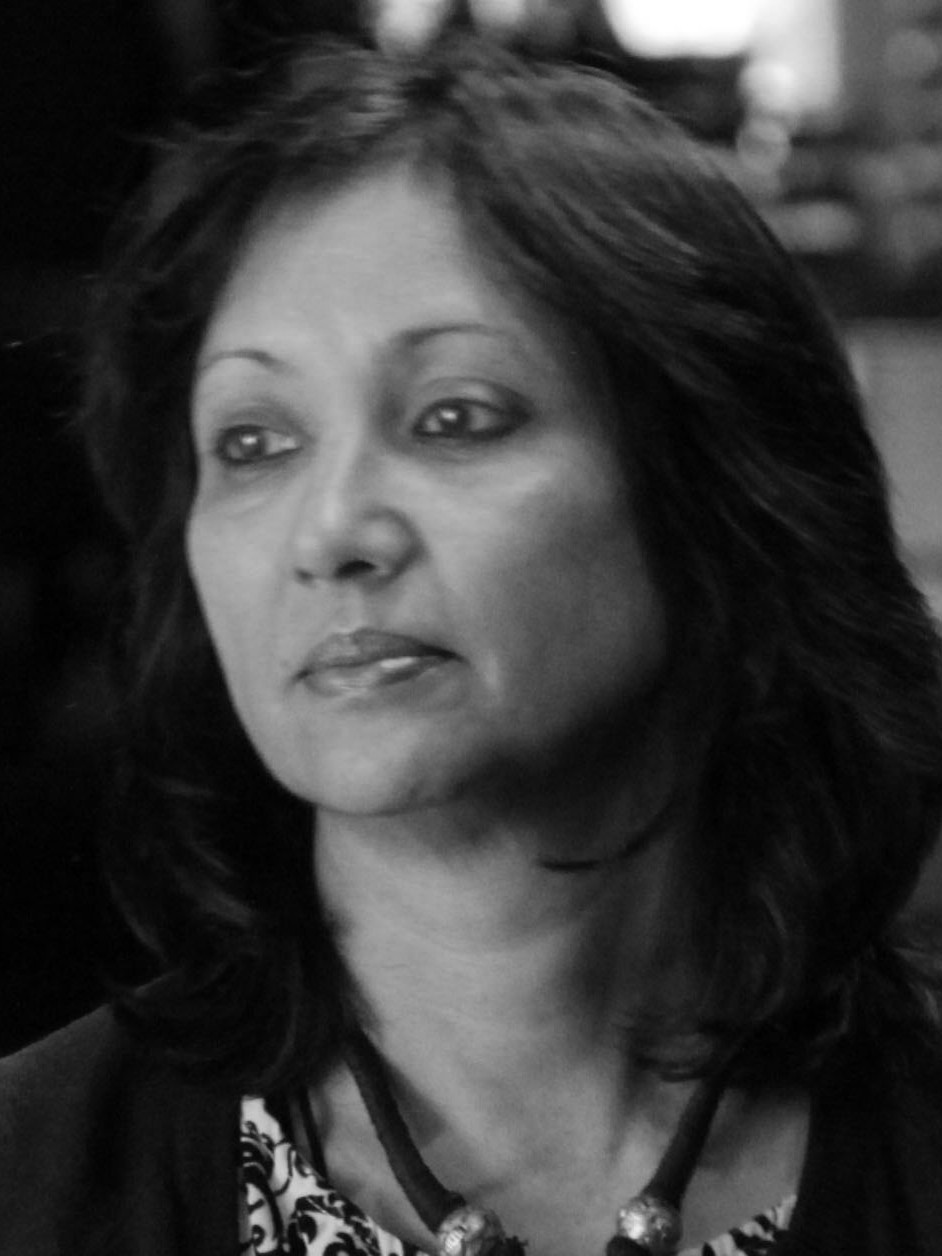

Event Details
15 September, 7-8:00pm, Online WATCH HERE. Join us for our monthly meet-up with Writer and Activist Rahila Gupta on Political Blackness. Meet-ups are run by Ali Malik. Rahila Gupta is a freelance
Event Details
15 September, 7-8:00pm, Online
Join us for our monthly meet-up with Writer and Activist Rahila Gupta on Political Blackness. Meet-ups are run by Ali Malik.
Rahila Gupta is a freelance journalist and writer. Her work has appeared in The Guardian and New Humanist among other papers and magazines. Her books include, “Enslaved: The New British Slavery”; “From Homebreakers to Jailbreakers: Southall Black Sisters”; “Provoked”; and “Don’t Wake Me: The Ballad of Nihal Armstrong” (Playdead Press, 2013). She is co-authoring a book with Beatrix Campbell with the title “Why Doesn’t Patriarchy Die?” She is also patron of Peace in Kurdistan, on the management committee of Southall Black Sisters, chair of the Nihal Armstrong Trust which she set up in 2004 in memory of her dearly loved, disabled son who died in 2001, a judge on the Emma Humphreys Memorial Prize awarded to individual women and groups who have campaigned, raised awareness of and supported women escaping violence, amongst others.
If it is your first time attending the monthly meet-up, please email hello@council-of-ex-muslims-of-britain-e5a565.ingress-baronn.ewp.live to register.
Talk will be followed by Q&A.
more
Time
(Tuesday) 7:00 pm - 8:00 pm
2020thu03sep6:30 pmthu8:00 pmOnline Support Group6:30 pm - 8:00 pm















































































































Event Details
Join us for our monthly support group, to talk about issues that still affect us after leaving Islam. If you would like to come along, please email exmuslimcouncil@gmail.com for details of
Event Details
Join us for our monthly support group, to talk about issues that still affect us after leaving Islam.
If you would like to come along, please email exmuslimcouncil@gmail.com for details of virtual support group meeting.
Five person 90 minute support group sessions are led by Savin Bapir Tardy. Larger 15 group sessions are led by Marwa Wain.
Time
(Thursday) 6:30 pm - 8:00 pm
october 2020
2020tue20oct7:00 pmtue8:00 pmApostasy and Asylum with Ana Gonzalez7:00 pm - 8:00 pm



Event Details
20 October, 7-8:00pm, Online Join it Live Or Watch it Here. Join us for our monthly meet-up on Apostasy and Asylum with Ana Gonzalez. Meet-ups are run by Ali Malik. Ana Gonzalez
Event Details
20 October, 7-8:00pm, Online
Join it Live Or Watch it Here.
Join us for our monthly meet-up on Apostasy and Asylum with Ana Gonzalez. Meet-ups are run by Ali Malik.
Ana Gonzalez is a solicitor and partner at Wilson Solicitors. She practises in immigration and asylum work, and has interests in human rights and European Law. Ana is an internationally recognised expert in gender and sexuality-based asylum claims as well as having extensive expertise in representing individuals from vulnerable, marginalised client groups such as victims of human trafficking, apostates and transgender individuals. Ana is frequently instructed by Local Authorities all over the Greater London area to act for children and adults in their care.
Ana is praised in Chambers and Partners for her “constant attention to cases, leading client care and real knowledge of the law.” She “continues to stand out for significant work on human trafficking cases, often raising new country guidance points” (2012). “She is a stand-out practitioner in the field of refugee law, with particular expertise in trafficking cases” (2014). She “is very experienced, passionate and has very good judgement” (2016). Ana has been described “the epitome of a fighter who cares very deeply about her clients,” in the 2019 edition.
She practises in all aspects of immigration and asylum work, and has a specialist interest in European law. Ana has extensive experience of litigating in the higher courts, having had numerous cases over the years in the Administrative Court/Upper Tribunal and Court of Appeal. She has also conducted cases in the Supreme Court and the Court of Justice of the European Union in Luxembourg.
If it is your first time attending the monthly meet-up, please email hello@council-of-ex-muslims-of-britain-e5a565.ingress-baronn.ewp.live to register.
Talks will be followed by Q&A, drinks and snacks. Ana will also do one on one sessions with asylum cases.
more
Time
(Tuesday) 7:00 pm - 8:00 pm
2020tue06oct6:30 pmtue8:00 pmOnline Support Group6:30 pm - 8:00 pm















































































































Event Details
Join us for our monthly support group, to talk about issues that still affect us after leaving Islam. If you would like to come along, please email exmuslimcouncil@gmail.com for details of
Event Details
Join us for our monthly support group, to talk about issues that still affect us after leaving Islam.
If you would like to come along, please email exmuslimcouncil@gmail.com for details of virtual support group meeting.
Five person 90 minute support group sessions are led by Savin Bapir Tardy
Time
(Tuesday) 6:30 pm - 8:00 pm
2020mon05oct6:30 pmmon8:00 pmOnline Support Group6:30 pm - 8:00 pm















































































































Event Details
Join us for our monthly support group, to talk about issues that still affect us after leaving Islam. If you would like to come along, please email exmuslimcouncil@gmail.com for details of
Event Details
Join us for our monthly support group, to talk about issues that still affect us after leaving Islam.
If you would like to come along, please email exmuslimcouncil@gmail.com for details of virtual support group meeting.
Five person 90 minute support group sessions are led by Savin Bapir Tardy
Time
(Monday) 6:30 pm - 8:00 pm
november 2020
2020mon30nov6:30 pmmon8:00 pmOnline Support Group6:30 pm - 8:00 pm















































































































Event Details
Join us for our monthly support group, to talk about issues that still affect us after leaving Islam. If you would like to come along, please email exmuslimcouncil@gmail.com for details of
Event Details
Join us for our monthly support group, to talk about issues that still affect us after leaving Islam.
If you would like to come along, please email exmuslimcouncil@gmail.com for details of virtual support group meeting.
Five person 90 minute support group sessions are led by Savin Bapir Tardy
Time
(Monday) 6:30 pm - 8:00 pm
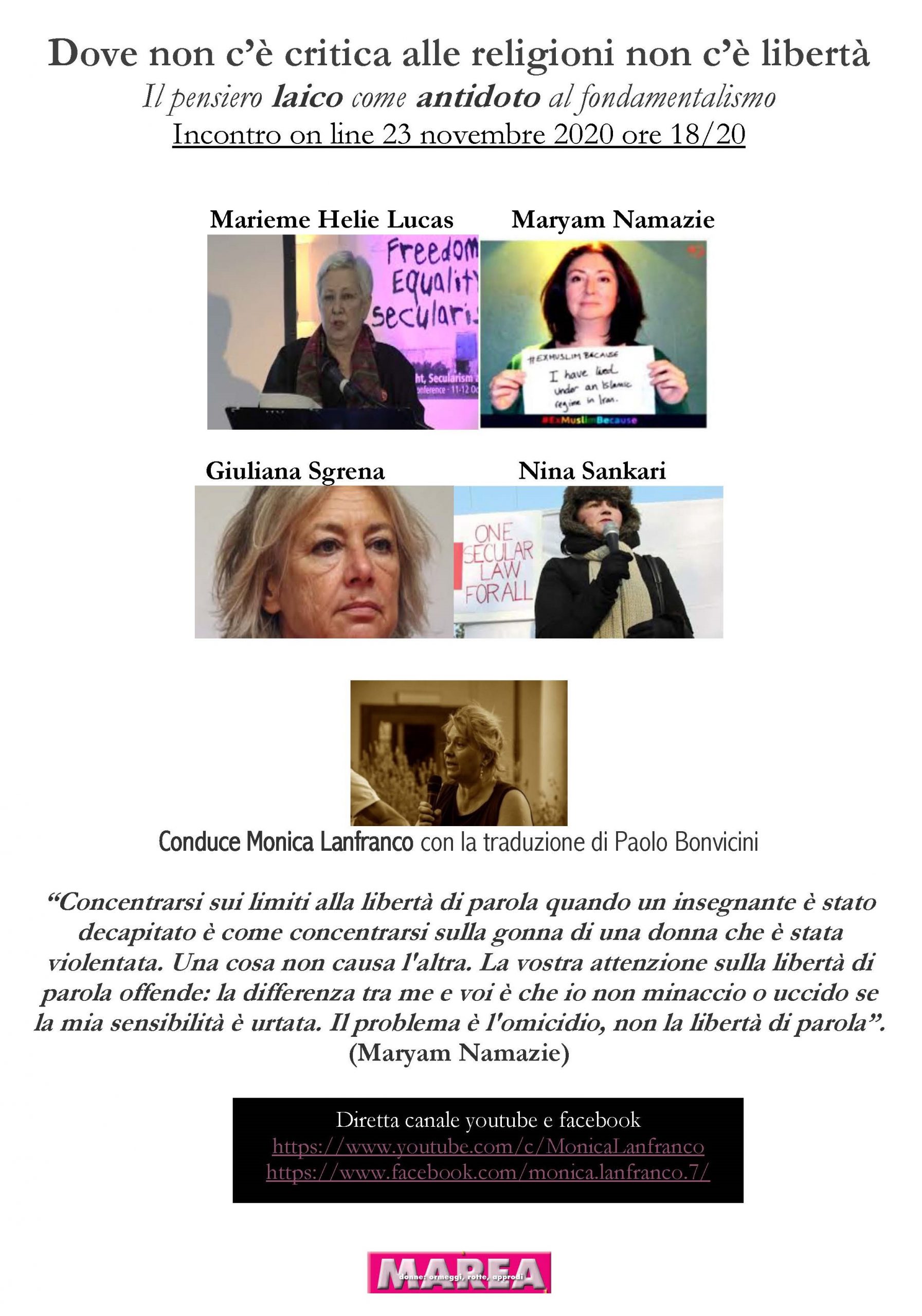

Event Details
On 23 November, from 18:00-20:00 hours Central European Standard Time (17:00-19:00 UK time), there is a webinar organised by the Italian feminist
Event Details
more
Time
(Monday) 5:00 pm - 7:00 pm
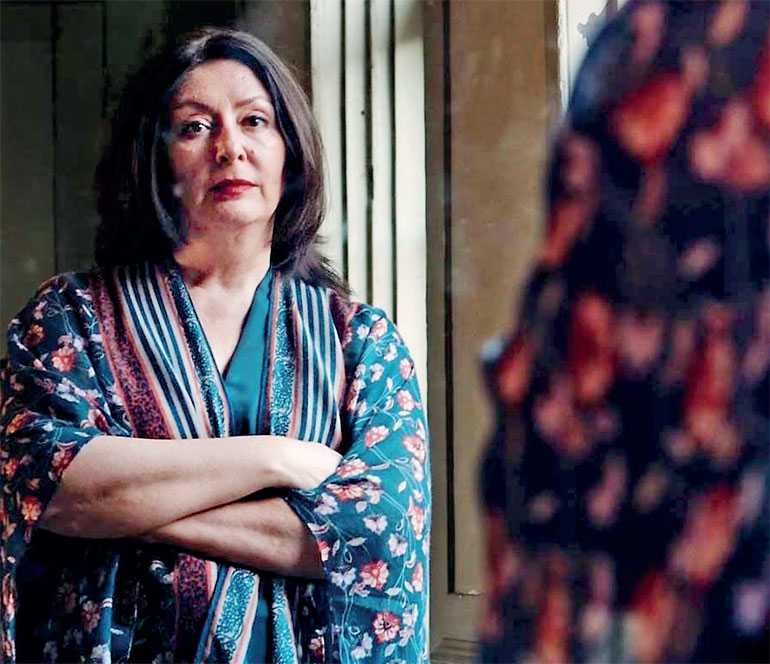

Event Details
17 November, 7-8:00pm See it Live here. Join us for our monthly meet-up on The Ex-Muslim Movement with Maryam Namazie. Meet-ups are run by Ali Malik.
Event Details
17 November, 7-8:00pm
Join us for our monthly meet-up on The Ex-Muslim Movement with Maryam Namazie. Meet-ups are run by Ali Malik.
Maryam Namazie is an Iranian-born writer and activist. She is the Spokesperson of One Law for All and the Council of Ex-Muslims of Britain.
She is on the International Advisory Board of the Raif Badawi Foundation for Freedom and Euromind; a Laureate of the International Academy of Humanism, National Secular Society Honorary Associate; Honorary Associate of Rationalist International; Emeritus Member of the Secular Humanist League of Brazil and a Patron of Pink Triangle Trust.
Maryam and the Council of Ex-Muslims of Britain were featured in a 2016 film by Deeyah Khan called Islam’s Non-Believers. She was also a character in DV8 Physical Theatre’s Can We Talk About This?, which deals with freedom of speech, censorship and Islam.
She was joint winner of the 2019 Emma Humphreys Memorial Prize; awarded the 2017 Henry H. Zumach Freedom From Religious Fundamentalism award; 2016 International Secularism (Laicite) Prize from the Comité Laïcité République and was honoured by the National Secular Society for her campaigning work defending free speech at universities (2016) despite attempts at barring her by Student Unions or Islamic Society efforts to intimidate and cancel her talks. She was also awarded Atheist of the Year by Kazimierz Lyszczynski (2014); Journalist of the Year at the Dods Women in Public Life Awards (2013); selected one of the top 45 women of the year by Elle magazine Quebec (2007); one of 2006’s most intriguing people by DNA, awarded the National Secular Society’s Secularist of the Year Award (2005); selected ‘Iranian of the Year’ by Iranian.com readers (1997 and 1998); International Rescue Committee medal recipient (1988); and received the Julia B. Friedman Humanitarian Award (1987).
The Islamic regime of Iran’s media outlets has called Namazie ‘immoral and corrupt’ and did an ‘exposé’ on her entitled Meet this anti-religion woman. In 2019, the Islamic regime’s intelligence service did a TV programme, where Namazie was featured as “anti-God”.
She published The Woman’s Quran with the Council of Ex-Muslims of Britain and organised the first ever Apostasy Day on 22 August and Atheist Day on 21 March with an international coalition of ex-Muslim groups. She also organised the largest gatherings of ex-Muslims in history, including at De Balie’s Celebrating Dissent; led a topless protest at Pride London in 2017 in defense of LGBT rights with placards saying “Allah is Gay” and “LGBT rights are universal”. She also took part in a nude protest in defense of women’s rights in the Middle East and North Africa, initiated a Day to Stand with Bangladesh’s Bloggers and Activists; an International Day to Defend Amina and the Nude Photo Revolutionary Calendar 2012-2013, founded Iran Solidarity, and helped launch the Manifesto for a Free and Secular Middle East and North Africa.
She has spoken and written numerous articles on women’s rights issues, free expression, Islamism, and secularism. She has co-authored Sharia Law in Britain: A Threat to One Law for All and Equal Rights (One Law for All, June 2010), Enemies Not Allies: The Far-Right (One Law for All, August 2011), and The Political and Legal Status of Apostates in Islam (CEMB, August 2017). She also has an essay entitled ‘When the Hezbollah came to my School’ in 50 Voices of Disbelief: Why We Are Atheists (Wiley-Blackwell, October 2009) and is featured in A Better Life: A Hundred Atheists Speak out on Joy and Meaning in a World Without God (2013) amongst others.
Talk will be followed by Q&A.
more
Time
(Tuesday) 7:00 pm - 8:30 pm
Event Details
14 November 2020, Ghent, Belgium Night of the Freethinker 2020
Event Details
14 November 2020, Ghent, Belgium
Night of the Freethinker 2020
Time
All Day (Saturday)
2020tue03nov6:30 pmtue8:00 pmOnline Support Group6:30 pm - 8:00 pm















































































































Event Details
Join us for our monthly support group, to talk about issues that still affect us after leaving Islam. If you would like to come along, please email exmuslimcouncil@gmail.com for details of
Event Details
Join us for our monthly support group, to talk about issues that still affect us after leaving Islam.
If you would like to come along, please email exmuslimcouncil@gmail.com for details of virtual support group meeting.
Five person 90 minute support group sessions are led by Savin Bapir Tardy
Time
(Tuesday) 6:30 pm - 8:00 pm
2020mon02nov6:30 pmmon8:00 pmOnline Support Group6:30 pm - 8:00 pm















































































































Event Details
Join us for our monthly support group, to talk about issues that still affect us after leaving Islam. If you would like to come along, please email exmuslimcouncil@gmail.com for details of
Event Details
Join us for our monthly support group, to talk about issues that still affect us after leaving Islam.
If you would like to come along, please email exmuslimcouncil@gmail.com for details of virtual support group meeting.
Five person 90 minute support group sessions are led by Savin Bapir Tardy
Time
(Monday) 6:30 pm - 8:00 pm
december 2020
2020tue15dec8:00 pmtue10:00 pmEnd-Year Drinks on Zoom8:00 pm - 10:00 pm
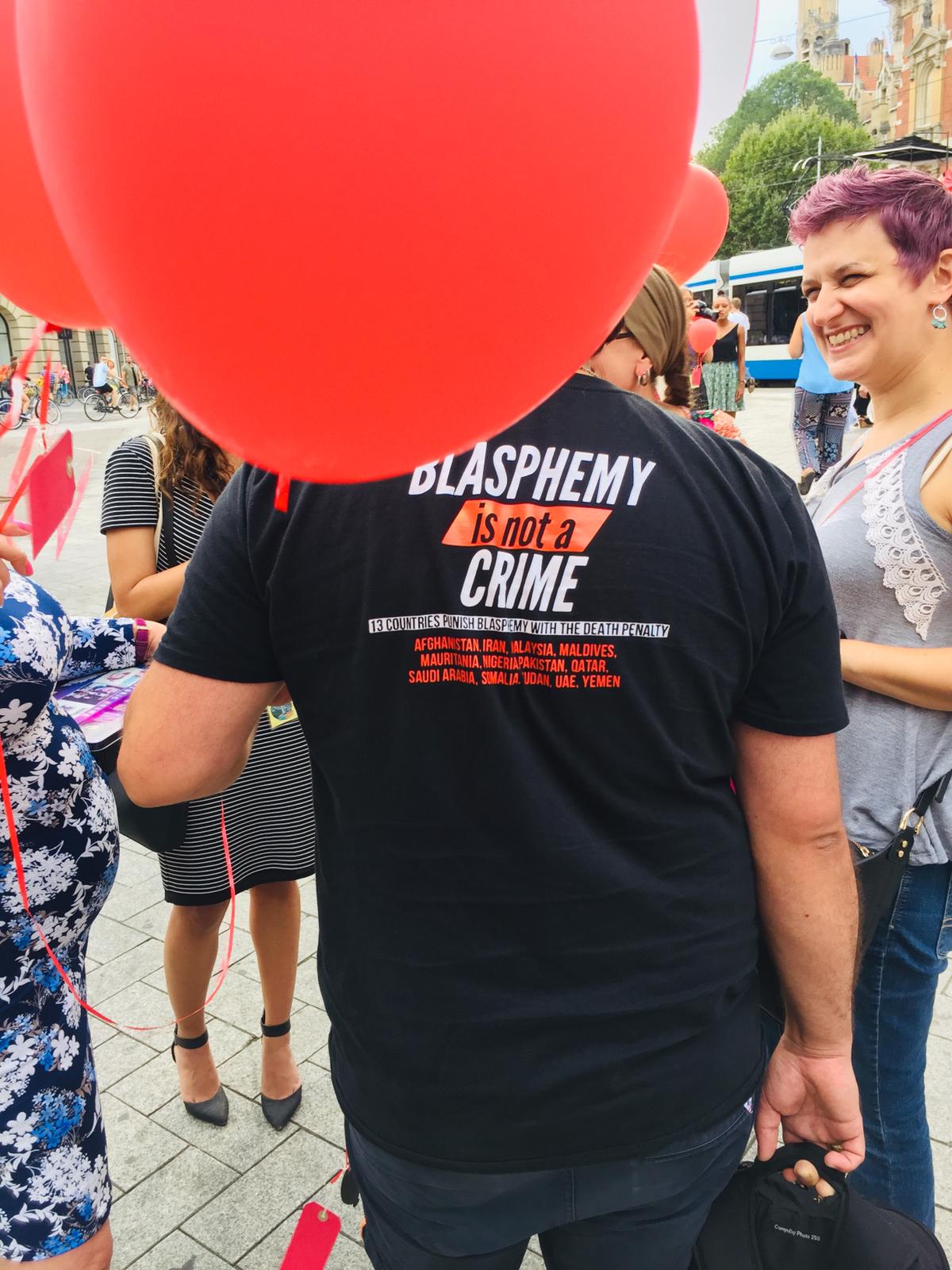

Event Details
15 December 2020, 8-10pm Please join CEMB for our end-year drinks on Zoom following our last meet-up of the year. Please RSVP by emailing hello@council-of-ex-muslims-of-britain-e5a565.ingress-baronn.ewp.live.
Event Details
15 December 2020, 8-10pm
Please join CEMB for our end-year drinks on Zoom following our last meet-up of the year.
Please RSVP by emailing hello@council-of-ex-muslims-of-britain-e5a565.ingress-baronn.ewp.live.
Time
(Tuesday) 8:00 pm - 10:00 pm
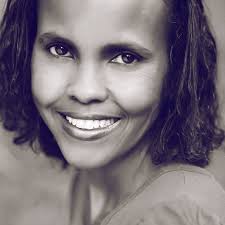

Event Details
15 December, 7-8:00pm Online Meetup with Halima Salat on growing up in Islam and raising children without it. She is an ex-Muslim Kenyan Somali. She defines herself as a free thinker, a
Event Details
15 December, 7-8:00pm
Online Meetup with Halima Salat on growing up in Islam and raising children without it.
She is an ex-Muslim Kenyan Somali. She defines herself as a free thinker, a rebel and an atheist. She was born Muslim but no longer believes in Islam. She was a closet non-believer for a while until when she came to live in the Netherlands 3 years ago. Halima just recently had her “coming out” declaration in Amsterdam. She has many problems with Islam but the core problem is that she truly believes Islam is against a woman’s individual right to steer her own path. Halima is also a spoken word artist and reads her poetry in the few English spoken word scenes in Amsterdam.
Join us for our monthly meet-up. Meet-ups are run by Ali Malik.
more
Time
(Tuesday) 7:00 pm - 8:00 pm
2020thu10dec7:00 pmthu8:45 pmAdvanced Screening of New Film: Women Leaving Islam7:00 pm - 8:45 pm
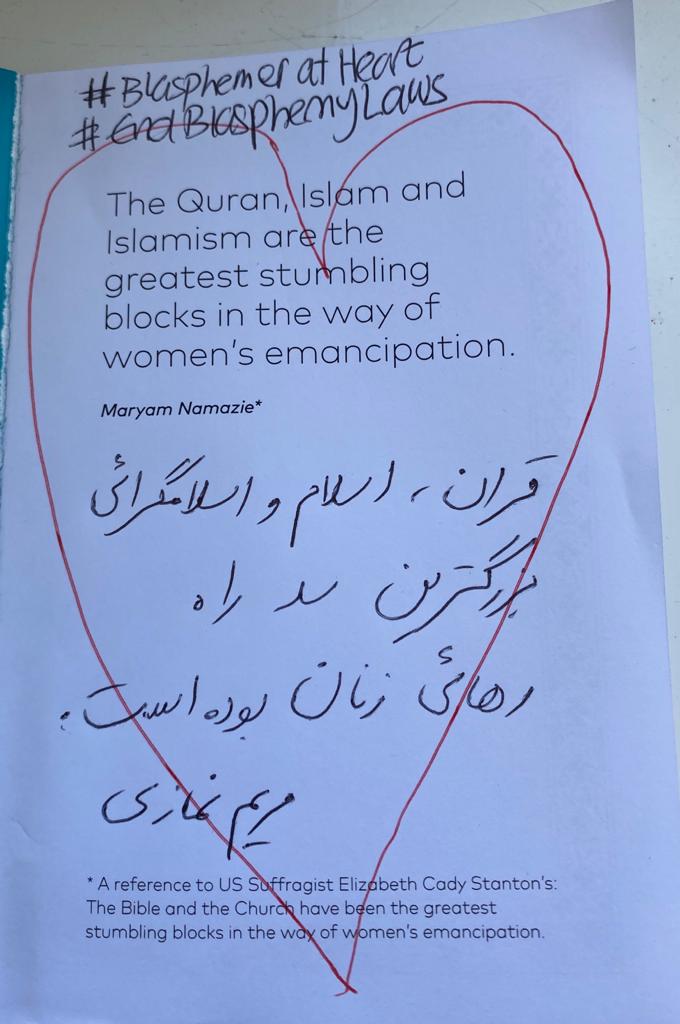

Event Details
10 December 2020, 7:00-8:45pm, Online Advanced Screening of CEMB’s New Film: Women Leaving Islam More details to follow.
Event Details
10 December 2020, 7:00-8:45pm, Online Advanced Screening of CEMB’s New Film: Women Leaving Islam
More details to follow.
Time
(Thursday) 7:00 pm - 8:45 pm
2020tue01dec6:30 pmtue8:00 pmOnline Support Group6:30 pm - 8:00 pm















































































































Event Details
Join us for our monthly support group, to talk about issues that still affect us after leaving Islam. If you would like to come along, please email exmuslimcouncil@gmail.com for details of
Event Details
Join us for our monthly support group, to talk about issues that still affect us after leaving Islam.
If you would like to come along, please email exmuslimcouncil@gmail.com for details of virtual support group meeting.
Five person 90 minute support group sessions are led by Savin Bapir Tardy. Larger 15 group sessions are led by Marwa Wain.
Time
(Tuesday) 6:30 pm - 8:00 pm
january 2019
2019thu31jan6:00 pmthu8:00 pmBirmingham Support Group6:00 pm - 8:00 pm address











Event Details
Join us for our monthly support group, to talk about issues that still affect us after leaving Islam. If you would like to come along, please email Sadia on sadia.hameed@council-of-ex-muslims-of-britain-e5a565.ingress-baronn.ewp.live for details of
Event Details
Join us for our monthly support group, to talk about issues that still affect us after leaving Islam.
If you would like to come along, please email Sadia on sadia.hameed@council-of-ex-muslims-of-britain-e5a565.ingress-baronn.ewp.live for details of the venue.
Time
(Thursday) 6:00 pm - 8:00 pm
Location
See post
address
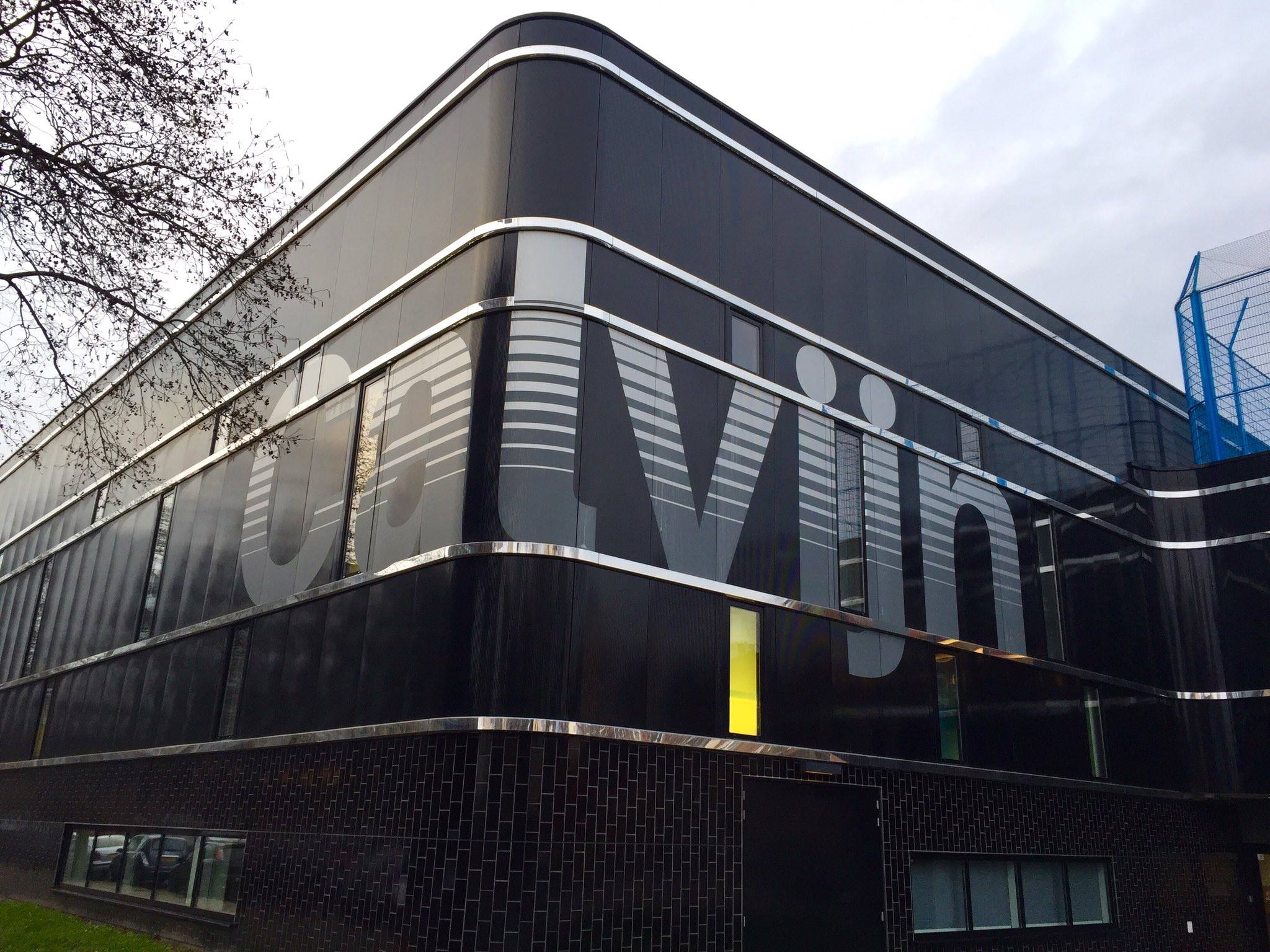

Event Details
31 January 2019, Amsterdam Talk to students of Calvijn College Amsterdam and Het Amsterdams Lyceum
Event Details
31 January 2019, Amsterdam
Talk to students of Calvijn College Amsterdam and Het Amsterdams Lyceum
Time
(Thursday) 10:00 am - 12:00 pm
Location
See post
address
2019wed30jan8:00 pmwed10:00 pmDe Balie Freedom Lecture, Amsterdam8:00 pm - 10:00 pm address
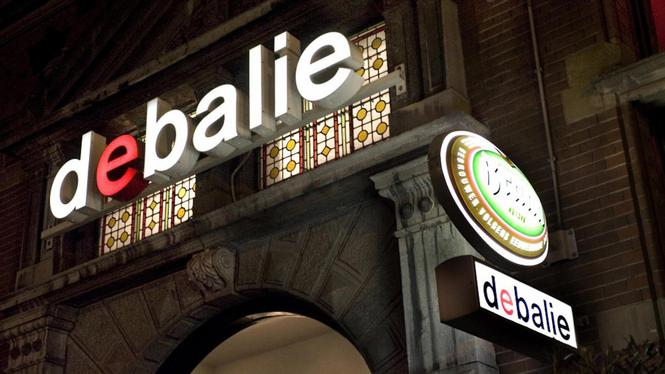

Event Details
30 January 2019, Amsterdam De Balie Freedom Lecture
Event Details
30 January 2019, Amsterdam
De Balie Freedom Lecture
Time
(Wednesday) 8:00 pm - 10:00 pm
Location
See post
address
2019tue29jan7:00 pmtue9:00 pmFreedom Lecture, Brussels7:00 pm - 9:00 pm address
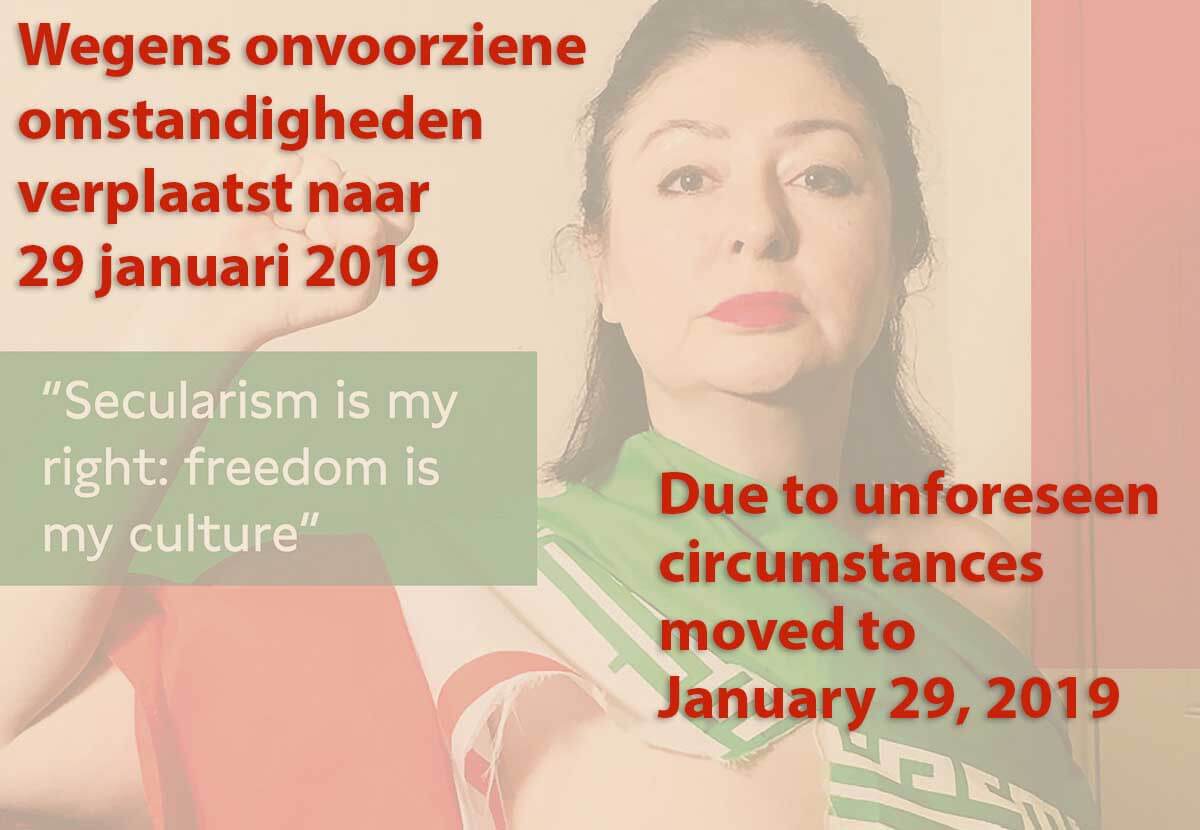

Event Details
29 January 2019, Brussels Freedom Lecture on Tour De Balie ism Het huisvandeMens Brussel
Event Details
29 January 2019, Brussels
Freedom Lecture on Tour
De Balie ism Het huisvandeMens Brussel
Time
(Tuesday) 7:00 pm - 9:00 pm
Location
See post
address


Event Details
22 January 2019, University of Warwick Warwick for Free Speech and Human Rights on Free Speech, Religion and Gender Equality Warwick for Free Speech and Human Rights at the University
Event Details
22 January 2019, University of Warwick
Warwick for Free Speech and Human Rights on Free Speech, Religion and Gender Equality
Warwick for Free Speech and Human Rights at the University of Warwick is organising an event to tackle the issue of Free Speech and Gender Equality in Religious as well as Secular countries / politics / governments.
Maryam Namazie will be speaking about Iran and secularism. She will be speaking about her campaigns targeted at fighting Islamist extremists and patriarchal norms in Iran and in the UK.
Steven Kettell, an Associate Professor at the University of Warwick, in the department of Politics and International Studies. He is a specialist in the politics of secularism, non-religion and the role of religion in the public sphere.
more
Time
(Tuesday) 6:00 pm - 8:00 pm
Location
See post
address
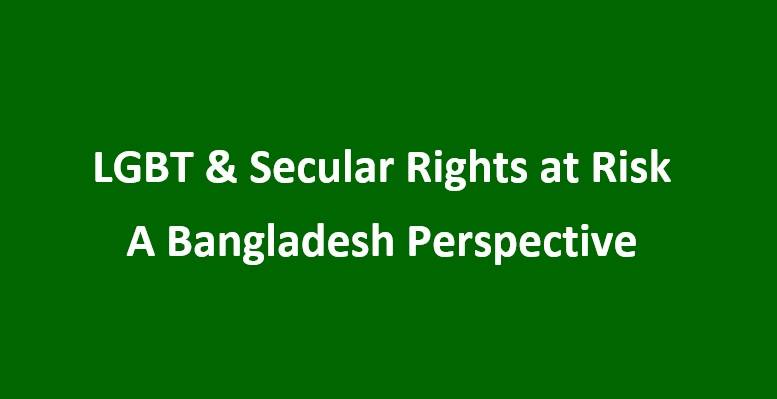

Event Details
LGBT & Secular Rights At Risk: A Bangladesh Perspective 20 January 2019, Conway Hall 12:00-5:00pm Human Rights are at risk in Bangladesh. Especially, the rights of the LGBT+ community and the
Event Details
LGBT & Secular Rights At Risk: A Bangladesh Perspective
20 January 2019, Conway Hall
12:00-5:00pm
Human Rights are at risk in Bangladesh. Especially, the rights of the LGBT+ community and the secular community are the most vulnerable. We want to speak on behalf of these communities and raise our voice. We want to defend their rights. We want to reach towards the wider communities and gain support through this conference.
Speakers: Maryam Namazie, Gita Sahgal, Sadia Hameed, Lizzie Streeter, Hsien Chew, Henna Khanom, Sadikur Rahman Rana, Jimi Bangash, Mediah Ahmed, Bonya Ahmed, Jamie Jane, Riaz Osmani, Asif Mohiuddin, Simon Ware.
More information can be found on Facebook event page.
Get free tickets here.
more
Time
(Sunday) 12:00 pm - 5:00 pm
Location
See post
address
2019sat19jan2:00 pmsat5:00 pmCEMB Social - Movies & Munchies2:00 pm - 5:00 pm address
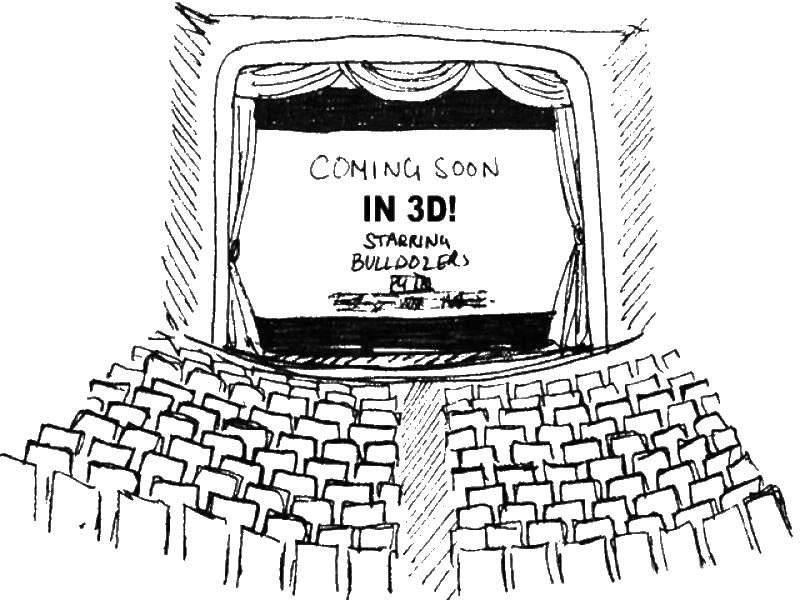







Event Details
Join us for a movie and some food (either bring our or order something on arrival) For further details, please get in touch.
Event Details
Join us for a movie and some food (either bring our or order something on arrival)
For further details, please get in touch.
Time
(Saturday) 2:00 pm - 5:00 pm
Location
See post
address
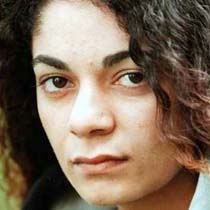

Event Details
16 January 2019, Stockholm, Sweden Never Forget Fadime International Conference in Swedish Parliament
Event Details
16 January 2019, Stockholm, Sweden
Never Forget Fadime International Conference in Swedish Parliament
Time
All Day (Wednesday)
Location
See post
address
2019tue08jan6:00 pmtue8:00 pmMonthly Support Group6:00 pm - 8:00 pm address























Event Details
Join us for our monthly support group, to talk about issues that still affect us after leaving Islam. If you would like to come along, please email us for details.
Event Details
Join us for our monthly support group, to talk about issues that still affect us after leaving Islam.
If you would like to come along, please email us for details.
Time
(Tuesday) 6:00 pm - 8:00 pm
Location
See post
address
february 2019
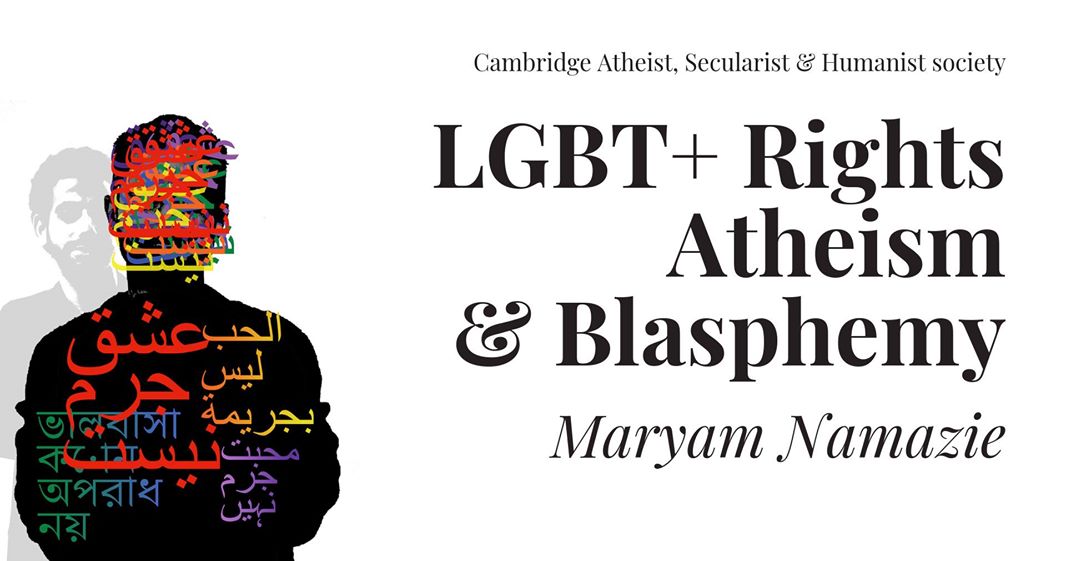

Event Details
28 February 2019, 7pm, Cambridge University Maryam will speak to the Cambridge Atheist, Secular and Humanist Society on LGBT Rights, Atheism and Blasphemy
Event Details
28 February 2019, 7pm, Cambridge University
Maryam will speak to the Cambridge Atheist, Secular and Humanist Society on LGBT Rights, Atheism and Blasphemy
Time
(Thursday) 7:00 pm - 9:00 pm
Location
See post
address
2019thu28feb6:00 pmthu8:00 pmBirmingham Support Group6:00 pm - 8:00 pm address











Event Details
Join us for our monthly support group, to talk about issues that still affect us after leaving Islam. If you would like to come along, please email Sadia on sadia.hameed@council-of-ex-muslims-of-britain-e5a565.ingress-baronn.ewp.live for details of
Event Details
Join us for our monthly support group, to talk about issues that still affect us after leaving Islam.
If you would like to come along, please email Sadia on sadia.hameed@council-of-ex-muslims-of-britain-e5a565.ingress-baronn.ewp.live for details of the venue.
Time
(Thursday) 6:00 pm - 8:00 pm
Location
See post
address


Event Details
A frank and open panel discussion on the menstrual taboo: why it exists, how it manifests itself, and how we can lift it. The natural, biological process
Event Details
A frank and open panel discussion on the menstrual taboo: why it exists, how it manifests itself, and how we can lift it.
The natural, biological process of menstruating is a source of shame, inconvenience and awkwardness for millions of women all over the world. Many hide that they’re on their periods, and are made to feel ashamed of it. Menstruation has been used across many cultures, religions and even in folklore to vilify and taint women.
In some countries the taboos and myths that surround it can be extremely harmful and lead to devastating consequences. Such as in Nepal where in December 2016, a 15-year-old girl died after being banished to a badly ventilated shed during her period. She was victim of an old tradition known as chhaupadi, practised in rural areas in the west of the country, which have forced women into seclusion, often in cattle sheds alongside the animals. From extreme to subtle, many societies shun mentsruatinxg women and shroud periods in euphemism. Even adverts for sanitary protection use blue liquid instead of red to demonstrate absorbency of period products. Why the fear of menstrual blood?
A UK government health report published in 2018 details that women’s concerns about period pains and periods are their third biggest reproductive health worry. They just don’t dare speak about it. It’s time we did!
Our panellists are historian Louise Foxcroft, activist Sadia Hameed and Obstetrician and Gynaecologist Shazia Malik, comedian and campaigner Chella Quint.
The debate will be followed by a drinks reception during which you will also have the opportunity to meet brands who offer a range of alternative period products, such as period pants and mentruation cups. Take the opportunity to speak freely about bleeding! Let’s lift the shame.
Get your tickets using the following links:
https://www.eventbrite.com/e/bloody-shame-how-to-lift-the-menstrual-taboo-debate-drinks-tickets-53583908914
or
http://www.equationx.co.uk/
more
Time
(Wednesday) 6:30 pm - 9:00 pm
Location
See post
address
2019sun24feb9:00 amsun7:00 pmBritish Muslim Conference9:00 am - 7:00 pm address


Event Details
Muslims vs Ex-Muslims In a time where our country in increasingly divided, important conversations about how to sew broken communities together again are vital. A difference in belief should not result
Event Details
Muslims vs Ex-Muslims
In a time where our country in increasingly divided, important conversations about how to sew broken communities together again are vital. A difference in belief should not result in family and relationship breakdown. This talk will urge people to look beyond their ideas and beliefs, at the loving relationships they have.
Book your tickets now https://www.britishislamconference.com/
Time
(Sunday) 9:00 am - 7:00 pm
Location
See post
address
2019sat16feb2:00 pmsat5:00 pmCEMB Social - Movie & Munchies2:00 pm - 5:00 pm address








Event Details
Join us for a movie and some food (either bring our or order something on arrival) For further details, please get in touch.
Event Details
Join us for a movie and some food (either bring our or order something on arrival)
For further details, please get in touch.
Time
(Saturday) 2:00 pm - 5:00 pm
Location
See post
address


Event Details
14 February, 6:30pm-10pm, Conway Hall, London Why we defended Rushdie and why it is still important today: 30 Years After On this Valentine’s Day, the 30th anniversary of the fatwa against Salman
Event Details
14 February, 6:30pm-10pm, Conway Hall, London
Why we defended Rushdie and why it is still important today: 30 Years After
On this Valentine’s Day, the 30th anniversary of the fatwa against Salman Rushdie, join Feminist Dissent to defend the right to apostasy, to love, to flee persecution and seek asylum/Oppose blasphemy laws, the threat to free speech and the deportation of apostates.
Programme:
6:30 pm: Registration and Refreshments
7:00 pm: Film Screening
“Hullabaloo over The Satanic Verses” and “Struggle or Submission? Women in Islam” (films by Gita Sahgal)
8:00 pm: Panel Discussion
Maureen Freely (editorial collective member of Feminist Dissent; author, journalist, translator and academic; Chair of English PEN and advocate for writers at risk, especially in Turkey)
Maryam Namazie (secularist and human rights activist, commentator and broadcaster; co-founder of Council of Ex-Muslims of Britain and the One Law for All campaign)
Pragna Patel (editorial collective member of Feminist Dissent; co-founder of Women Against Fundamentalism, Director of Southall Black Sisters)
Gita Sahgal (editorial collective member of Feminist Dissent; writer, film-maker, human rights activist; founder of the Centre for Secular Space which challenges fundamentalism in all religions and co-founder of Women Against Fundamentalism)
Salil Tripathi (writer and journalist; PEN International, Writers in Prison committee; author of The Colonel Who Would Not Repentand Offence: the Hindu Case.)
Background: On May 27, 1989, 40 women of many religions and none stood at Parliament Square to oppose a massive march of orthodox Muslims demanding the banning of Salman Rushdie’s novel The Satanic Verses, as well as a National Front demonstration making racist attacks on Muslims in Britain. The march by orthodox Muslims called for the promulgation of blasphemy law to protect Islam from what they saw as an attack on their religion. They were supporting a fatwa by Ayatollah Khomeni demanding that Rushdie be killed. Under the banner, ‘Our Tradition, Struggle Not Submission’, the women’s stand for Rushdie was part of their defence of their secular traditions and for their own right to read and dissent and to defend secular values and religious freedom. This was a foundational moment for Women Against Fundamentalism, a group committed to opposing the rise of fundamentalism in all religions across the world.
Although WAF no longer exists as a formal organization, many of its members have allied with other organisations to continue to campaign against fundamentalism’s impact on women and sexual minorities, as well as against blasphemy laws, and to support the growing movement of people known and unknown across the world who are fleeing from fundamentalist violence. In Britain, they oppose the UK government’s hostile environment against migrants and refugees, as well as the police’s failure to deal with death threats against atheists.
Conway Hall was the location of a benefit/fundraiser for WAF in August 1989. We are proud to be returning to this historic location to continue WAF’s work against fundamentalism and racism.
more
Time
(Thursday) 6:30 pm - 10:00 pm
Location
See post
address
2019tue05feb6:00 pmtue8:00 pmMonthly Support Group6:00 pm - 8:00 pm address























Event Details
Join us for our monthly support group, to talk about issues that still affect us after leaving Islam. If you would like to come along, please email Sadia on sadia.hameed@council-of-ex-muslims-of-britain-e5a565.ingress-baronn.ewp.live for details of
Event Details
Join us for our monthly support group, to talk about issues that still affect us after leaving Islam.
If you would like to come along, please email Sadia on sadia.hameed@council-of-ex-muslims-of-britain-e5a565.ingress-baronn.ewp.live for details of the venue, as it will be different every time.
Time
(Tuesday) 6:00 pm - 8:00 pm
Location
See post
address
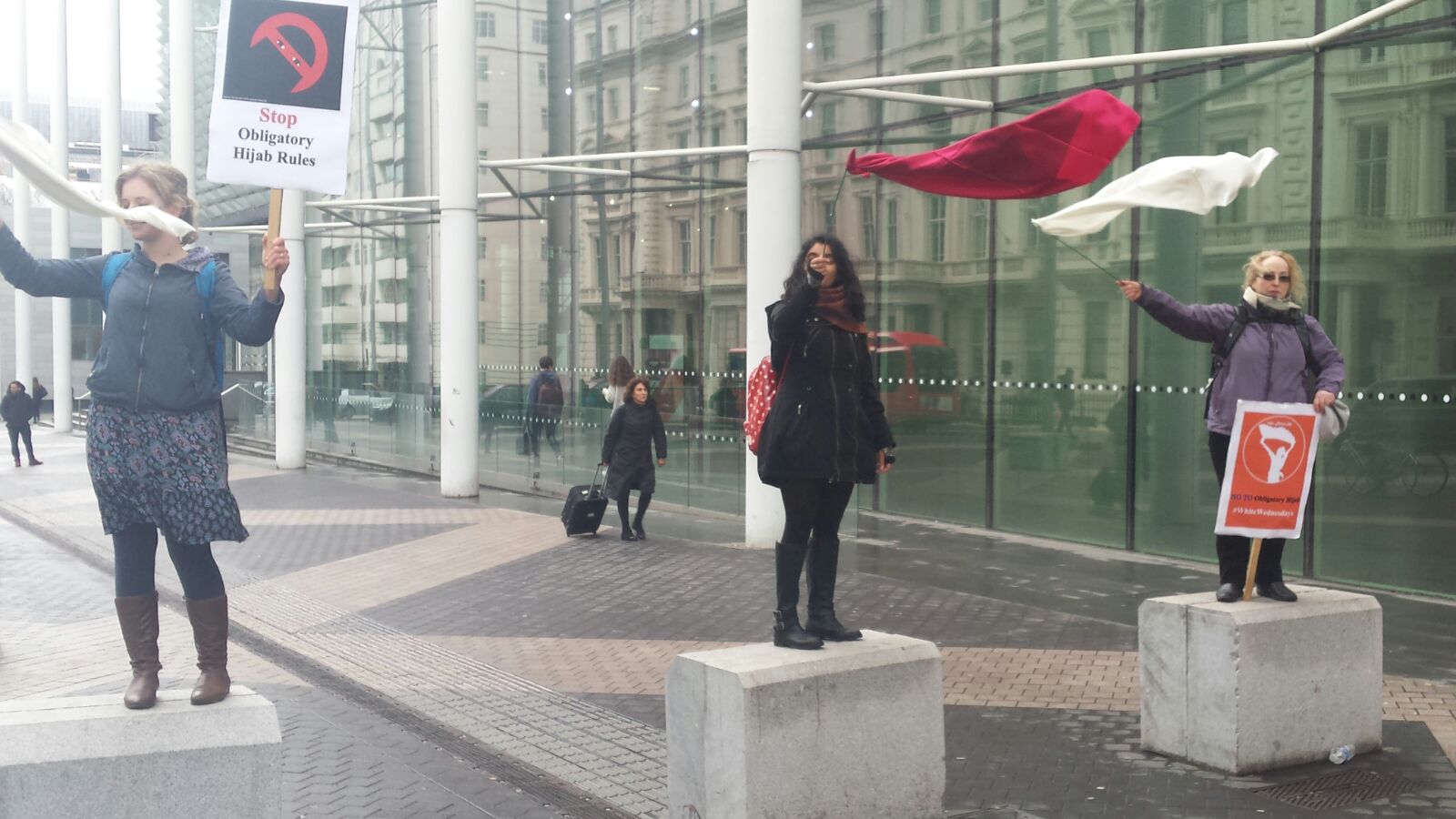

Event Details
World Hijab Day protest CANCELLED – CANCELLED – CANCELLED – CANCELLED – CANCELLED – CANCELLED –
Event Details
more
Time
(Friday) 2:00 pm - 3:00 pm
Location
See post
address
march 2019
2019fri29marAll Daysun31Days of Atheism, Warsaw, Poland(All Day) address
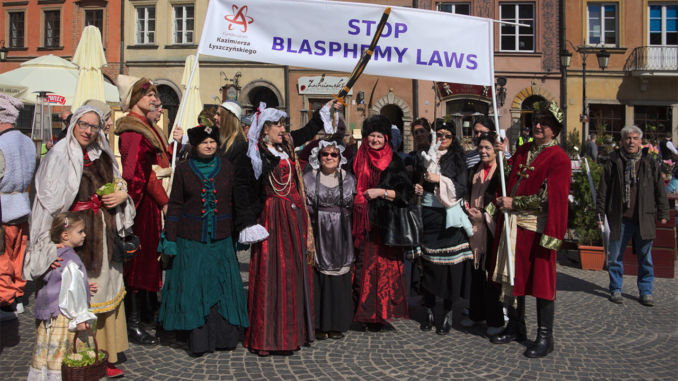

Event Details
29-31 March 2019, Warsaw, Poland Days of Atheism See details of the weekend here.
Event Details
29-31 March 2019, Warsaw, Poland
Days of Atheism
See details of the weekend here.
Time
march 29 (Friday) - 31 (Sunday)
Location
See post
address











Event Details
Join us for our monthly support group, to talk about issues that still affect us after leaving Islam. If you would like to come along, please email Sadia on sadia.hameed@council-of-ex-muslims-of-britain-e5a565.ingress-baronn.ewp.live for details of
Event Details
Join us for our monthly support group, to talk about issues that still affect us after leaving Islam.
If you would like to come along, please email Sadia on sadia.hameed@council-of-ex-muslims-of-britain-e5a565.ingress-baronn.ewp.live for details of the venue.
Time
(Thursday) 6:00 pm - 8:00 pm
Location
See post
address
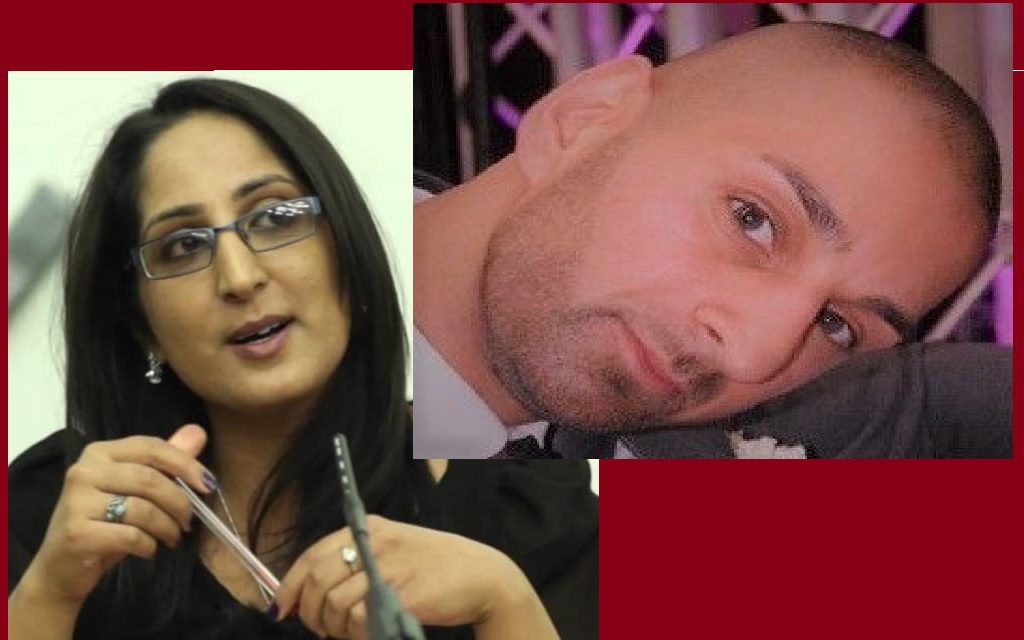

Event Details
Come along for a meet up with 2 of the contributors of the book Leaving Faith Behind, a compilation of true accounts of the experiences of people that turned their
Event Details
Come along for a meet up with 2 of the contributors of the book Leaving Faith Behind, a compilation of true accounts of the experiences of people that turned their back on Islam and why.
Speaker jimmy Bangash and Aliyah Saleem will share their experiences and talk about their contribution to the book.
If you would like to come along, please email Sadia on sadia.hameed@council-of-ex-muslims-of-britain-e5a565.ingress-baronn.ewp.live for details of the venue.
Time
(Tuesday) 6:00 pm - 8:00 pm
Location
See post
address


Event Details
23 March 2019, 18:00-23:00 hours to celebrate the first ever International Atheist Day Holborn, Central London Council of Ex-Muslims of Britain will celebrate the first ever International Atheist Day with
Event Details
23 March 2019, 18:00-23:00 hours to celebrate the first ever International Atheist Day
Holborn, Central London
Council of Ex-Muslims of Britain will celebrate the first ever International Atheist Day with a panel discussion of ex-Muslim women speaking out, namely Somali Poet Halima Salat, Moroccan Activist Ibtissame Betty Lachgar, CEMB Spokespersons Maryam Namazie and Sadia Hameed, Ex-Muslim YouTuber Mimzy Vidz and Faithless Hijabi Founder Zara Kay. Singer/Songwriter Shelley Segal will perform her new songs and there will be an art exhibition by Samint. CEMB’s 2019 awards and Coming Out Ceremonies will follow. Nahla Mahmoud will MC the event.
SCHEDULE
18:00 Registration with drinks and appetisers and Artwork by Samint
19:00 Opening
19:20 Panel Discussion on Ex-Muslim Women Coming Out
20:30 Comedy
20:40 Poetry
20:50 Coming out Certificates
21:00 CEMB 2019 Awards Ceremony
21:30 Shelley Segal: Premiere of Our Way to Freedom, a new CEMB Anthem for ex-Muslims and atheists
21:45 Drinks and Music
23:00 End of Event
SPEAKER BIOS
Halima Salat is an ex-Muslim Kenyan Somali. She defines herself as a free thinker, a rebel and an atheist. She was born Muslim but no longer believes in Islam. She was a closet non-believer for a while until when she came to live in the Netherlands 3 years ago. Halima just recently had her “coming out” declaration in Amsterdam. She has many problems with Islam but the core problem is that she truly believes Islam is against a woman’s individual right to steer her own path. Halima is also a spoken word artist and reads her poetry in the few English spoken word scenes in Amsterdam.
Ibtissame Betty Lachgar is a clinical psychologist specialised in criminology and victimology, particularly violence against women and sexual violence. She is co-founder and Leader of MALI (Alternative Movement for Individual Liberties), which is universalist, feminist and secularist. The civil disobedience movement fights for individual liberties, against discrimination and breaks taboos. Their first action in 2009 was a picnic during the day in Ramadan to protest against the law which condemns those “known as Muslim” who do not fast to 6 months in prison. In 2012, she invited the NGO Women on Waves from the Netherlands (Abortion Boat) to fight for the right to abortion and for the decriminalisation of abortion. She also organised a Kiss-in in 2013 and coloured Rabat’s fountains in red in 2017 in the fight against violence against women. She initiated the first LGBT movement in Morocco in 2012, the IDAHOT. Her work is censored by the majority of organisations in Morocco, even progressive and feminist ones. Ibtissame has been the victim of sexual assault by the police whilst in custody for her protests in Sept 2016. There is a trial in progress against her and she has faced numerous threats as a result of her work.
Maryam Namazie is Co-Spokesperson for One Law for All, the Council of Ex-Muslims of Britain and Fitnah. She hosts a weekly television programme called Bread and Roses. She is on the International Advisory Board of the Raif Badawi Foundation for Freedom; National Secular Society Honorary Associate; a Patron of London Black Atheists and Pink Triangle Trust; International Advisory Board Member of Feminist Dissent and a columnist for The Freethinker. The Islamic regime of Iran’s media outlets has called Namazie immoral and corrupt and did an ‘exposé’ on her entitled “Meet this anti-religion woman.” Maryam was a character in DV8 Physical Theatre’s Can We Talk About This?, which deals with freedom of speech, censorship and Islam. She was awarded the 2017 Henry H. Zumach Freedom From Religious Fundamentalism award; 2016 International Secularism (Laicite) Prize from the Comité Laïcité République and was honoured by the National Secular Society for her campaigning work defending free speech at universities (2016) despite attempts at barring her by Student Unions or Islamic Society efforts to intimidate her and cancel her talks. She was also awarded Atheist of the Year by Kazimierz Lyszczynski (2014); Journalist of the Year at the Dods Women in Public Life Awards (2013); selected one of the top 45 women of the year by Elle magazine Quebec (2007); one of 2006′s most intriguing people by DNA, awarded the National Secular Society’s Secularist of the Year Award (2005), amongst others.
Mimzy Vidz (Marwa) is an ex-Muslim Youtuber who discusses issues that Muslims and non Muslims face. She is part of the movement to normalise ex Muslims and put an end to blamsphemy and apostate scrutiny in Muslim communities and raise awareness of these problems. Marwa went to a Muslim school most of her life in London. She was a very religious Muslim and involved in various Muslim organisations and communities before becoming an Atheist 2 years ago.
Nahla Mahmoud is an environment and human rights activist originally from Sudan. She works with a number of campaigns in the UK, including One Law for All and Secular Middle East and North Africa. She leads the Sudanese Humanists Group and is former Spokesperson for the Council of Ex-Muslims of Britain.
Sadia Hameed is a Spokesperson of the Council of Ex-Muslims of Britain and has been featured in a 2016 film, “Islam’s Non Believers”, by award-winning filmmaker Deeyah Khan. She is also a human rights activist and Honour Based Violence, Forced Marriage and FGM Consultant, based in Gloucestershire, working in the sexual violence field, with a focus on Black Minority Ethnic women. Sadia organised a hugely successful event titled ‘Let’s Talk Honour’ in October 2016, which was held at Gloucester University. She also launched Critical Sisters. She is Winner of IKWRO Special Recognition: Activist of the Year 2017.
Samint is a painter and a universalist secularist feminist who uses her art as a weapon against patriarchy. Her goal is to highlight and expose the violence due to male domination, and to condemn the numerous religious precepts imposed on girls and women. Her recent collection, entitled ‘the basics of patriarchy’, denounces the oppression of the islamic veil through works entitled “my hair is mine” and “modest men,” the extremism of islamist group Boko Haram through hashtag #BringBackOurGirls, and against female circumcision and the commodification of women’s bodies.
Shelley Segal is a singer-songwriter involved in secular activism. Her first record, “An Atheist Album” is a passionate response to dogmatic belief, inequality, religious oppression and the idea that only the devout can be grateful and good. The record gives a voice to the often underrepresented views of non-religious people, the fastest growing minority in many countries. It also creates opportunities to discuss issues of secularism with the mainstream media. Her voice has taken her around the world including England, Australia and ten tours of the United States. She has released seven recording projects of her own and runs independent record label True Music where she works with other artists. An award winning songwriter, powerful performer and explicit story-teller, Shelley uses her music not only to express the way she sees the world but to create the world she wants to see.
Zara Kay is a Tanzanian ex-Muslim Atheist Activist, based in Australia. Zara spent most of her childhood in Tanzania and was brought up as a Shia Muslim in the Khoja Shia Ithnasheri Jamaat society. Zara is the founder of Faithless Hijabi, a platform to enable ExMuslim women to share their stories, about their journey from religion to reason. Over time FH expanded to being an advocate for women’s rights, from organising funding to collaborating with teams internationally to ensure women who had left Islam are getting the support they need.
More information on Seular Conference 2019 website or email maryamnamazie@gmail.com.
more
Time
(Saturday) 6:30 pm - 9:00 pm
Location
See post
address
2019sat23marAll DayAtheist Coming Out Day(All Day: saturday) address


Event Details
23 March 2019 Atheist coming out Day
Event Details
23 March 2019
Atheist coming out Day
Time
All Day (Saturday)
Location
See post
address
2019thu21mar6:00 pmthu8:00 pmDebate at Brunel University6:00 pm - 8:00 pm address


Event Details
Brunel University Debate Society have arrange a Religious Q & A with our spokesperson Sadia Hameed, The Rev’d Canon Andrew Studdert-Kennedy: Uxbridge Parish & Umar Nasser: Hillingdon Ahmadiyya Community. Join us
Event Details
Brunel University Debate Society have arrange a Religious Q & A with our spokesperson Sadia Hameed, The Rev’d Canon Andrew Studdert-Kennedy: Uxbridge Parish & Umar Nasser: Hillingdon Ahmadiyya Community.
Join us for a lively debate.
Time
(Thursday) 6:00 pm - 8:00 pm
Location
See post
address
2019sat16mar2:00 pmsat5:00 pmCEMB Social - Movie & Munchies2:00 pm - 5:00 pm address








Event Details
Join us for a movie and some food (either bring our or order something on arrival) For further details, please get in touch.
Event Details
Join us for a movie and some food (either bring our or order something on arrival)
For further details, please get in touch.
Time
(Saturday) 2:00 pm - 5:00 pm
Location
See post
address


Event Details
On 8 March International Women’s Day Protest, join #WomenAgainstAllah #WomenAgainstGod #WomenAgainstReligions #WomenAgainstQuran #WomenAgainstSharia #NotHalfAMan
Event Details
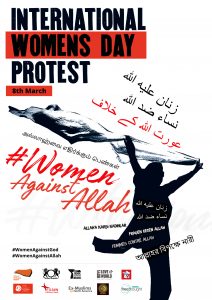

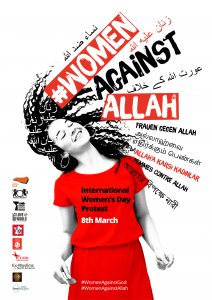

#WomenAgainstAllah
#WomenAgainstGod
#WomenAgainstReligions
#WomenAgainstQuran
#WomenAgainstSharia
#NotHalfAMan
#NoShame
FARSI
زنان_علیه_الله#
زنان_علیه_خدا#
زنان_علیه_مذاهب#
زنان_علیه_قرآن#
زنان_علیه_شریعت#
نیمی_از_مرد_نیستم#
بدون_شرم#
TURKISH
#AllahaKarşıKadınlar
#TanrıyaKarşıKadınlar
#DinlereKarşıKadınlar
#KuranaKarşıKadınlar
#ŞeriataKarşıKadınlar
#ErkeğinYarısıDeğil
#AyıpDeğil
ARABIC
نساء_ضد_الله#
نساء_ضد_الإله#
نساء_ضد_الأديان#
نساء_ضد_القرآن#
نساء_ضد_الشريعة#
لست_نصف_رجل#
لا_عار#
URDU
عورت_اللہ_کے_خلاف#
عورت_خدا_کے_خلاف#
عورت_مذہب_کے_خلاف#
عورت_قرآن_کے_خلاف #
عورت_شر یعت_کے_خلاف#
عورت_آدھی_گوا ہی#
عورت_ہونا_کوئی_شرمندگی_نہیں#
BENGALI
#আল্লাহর_বিপক্ষে_নারী
#ঈশ্বরের_বিপক্ষে_নারী
#ধর্মের_বিপক্ষে_নারী
#কুরআনের_বিপক্ষে_নারী
#শরিয়ার_বিপক্ষে_নারী
#পুরুষের_অর্ধেক_নয়
#কোন_লজ্জা_নয়
FRENCH
#FemmesContreAllah
#FemmesContreDieu
#FemmesContreLesReligions
#FemmesContreLeCoran
#FemmesContreSharia
#PasunDemiHomme
#PasdeHonte
GERMAN
#FrauenGegenAllah
#FrauenGegenGott
#FrauenGegenReligionen
#FrauenGegenQuran
#FrauenGegenSharia
#NichtHalberMann
#KeineSchande
TAMIL
#அல்லாஹ்வைஎதிர்க்கும்பெண்கள்
#கடவுளைஎதிர்க்கும்பெண்கள்
#மதங்களைஎதிர்க்கும்பெண்கள்
#குர்ஆனைஎதிர்க்கும்பெண்கள்
#ஷரியாவைஎதிர்க்கும்பெண்கள்
#நாம்ஆணில்பாதிஅல்ல
#வெட்கம்தேவையற்றது
more
Time
All Day (Friday)
Location
See post
address
2019mon04mar6:00 pmmon8:00 pmMonthly Support Group6:00 pm - 8:00 pm address























Event Details
Join us for our monthly support group, to talk about issues that still affect us after leaving Islam. If you would like to come along, please email Sadia on sadia.hameed@council-of-ex-muslims-of-britain-e5a565.ingress-baronn.ewp.live for details of
Event Details
Join us for our monthly support group, to talk about issues that still affect us after leaving Islam.
If you would like to come along, please email Sadia on sadia.hameed@council-of-ex-muslims-of-britain-e5a565.ingress-baronn.ewp.live for details of the venue, as it will be different every time.
Time
(Monday) 6:00 pm - 8:00 pm
Location
See post
address
april 2019
2019tue30apr7:00 pmtue8:30 pmFinding Acceptance: LGBT and Apostasy7:00 pm - 8:30 pm address
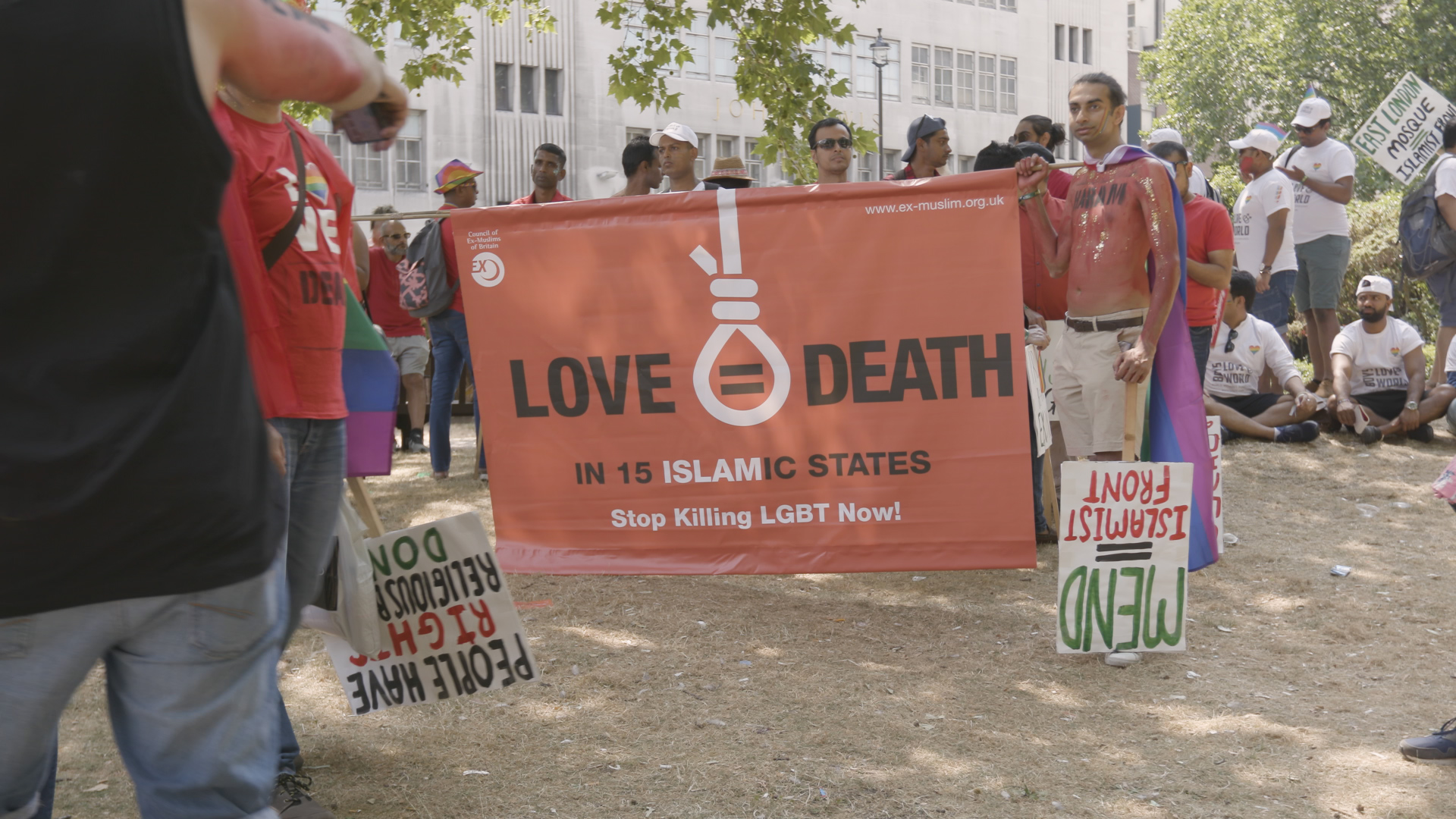

Event Details
Belief and identity are fundamental human rights. Unfortunately, this is not afforded to everyone, and for some people leaving their faith can be a complicated, challenging, and even dangerous process.
Event Details
Belief and identity are fundamental human rights. Unfortunately, this is not afforded to everyone, and for some people leaving their faith can be a complicated, challenging, and even dangerous process. There are religious communities that consider apostasy a source of shame and dishonour and as a result, apostates often experience emotional and sometimes physical abuse.
Apostates who happen to be LGBT almost always find the path to acceptance even more challenging. In this discussion panel event, survivors who have escaped these abuses and are now living free from harm will talk of their experiences. Experts who work with victims will also raise awareness of these highly sensitive issues.
To register for this event please click here.
Panellists from five organisations include:
Jimmy Bangash, Council of Ex-Muslims of Britain.
Jimmy was raised in a traditional Pashtun family in London. As a gay man, he struggled with the homophobia and ardent misogyny within his community.
Matt Mahmood-Ogston, Founder of Naz and Matt Foundation.
Following the tragic loss of Matt’s fiancé, Naz, who took his own life two days after his deeply religious family confronted him about his sexuality, Matt was moved to help others. He set up the foundation to support LGBT individuals, their friends and family to work towards resolving challenges linked to sexuality or gender identity, particularly where religion is heavily influencing.
Ste Richardsson, XJW Friends
Ste comes from a long line of prominent elders, his great grandfather was one of the first Jehovah’s Witnesses in the Caribbean. After leaving the religion in 2007 and coming out as gay, Ste was disowned by his family and made homeless. Today, he leads the Faith to Faithless apostate meet-ups and museum tours and is a French and Japanese translator.
Edward Prout, Humanists UK.
Teddy is an ex-evangelical Christian. ‘Born again’ at 16 years old he struggled with the theological condemnation of being gay while identifying as a gay Christian. He was repeatedly offered gay conversion therapy throughout his time in the church. He left the religion in his mid-30s.
Aliyah Saleem, Faith to Faithless
Aliyah was born into a Sunni family and was educated at an Islamic girls’ private boarding school in Nottingham before studying Islamic theology in Pakistan. She is an advocate for secular education and in 2015 co-founded Faith to Faithless to raise awareness of apostasy. In 2018 she published her first book, ‘Leaving Faith Behind’.
Following the discussion, there will be an opportunity for Q&A with the panel. We hope you’ll join us for what promises to be an informative and thought-provoking event.
more
Time
(Tuesday) 7:00 pm - 8:30 pm
Location
See post
address
2019thu25apr6:00 pmthu8:00 pmBirmingham Support Group6:00 pm - 8:00 pm address











Event Details
Join us for our monthly support group, to talk about issues that still affect us after leaving Islam. If you would like to come along, please email Sadia on sadia.hameed@council-of-ex-muslims-of-britain-e5a565.ingress-baronn.ewp.live for details of
Event Details
Join us for our monthly support group, to talk about issues that still affect us after leaving Islam.
If you would like to come along, please email Sadia on sadia.hameed@council-of-ex-muslims-of-britain-e5a565.ingress-baronn.ewp.live for details of the venue.
Time
(Thursday) 6:00 pm - 8:00 pm
Location
See post
address
2019tue23apr6:30 pmtue8:00 pmMeet-Up with Maryam Namazie on Open Borders6:30 pm - 8:00 pm address


Event Details
Join us for our monthly meet-up with Maryam Namazie on Open Borders. If you would like to come along, please email Sadia on sadia.hameed@council-of-ex-muslims-of-britain-e5a565.ingress-baronn.ewp.live for details of the venue.
Event Details
Join us for our monthly meet-up with Maryam Namazie on Open Borders.
If you would like to come along, please email Sadia on sadia.hameed@council-of-ex-muslims-of-britain-e5a565.ingress-baronn.ewp.live for details of the venue.
Time
(Tuesday) 6:30 pm - 8:00 pm
Location
See post
address
2019sat20apr2:00 pmsat5:00 pmCEMB Social - Movie & Munchies2:00 pm - 5:00 pm address








Event Details
Join us for a movie and some food (either bring our or order something on arrival) For further details, please get in touch.
Event Details
Join us for a movie and some food (either bring our or order something on arrival)
For further details, please get in touch.
Time
(Saturday) 2:00 pm - 5:00 pm
Location
See post
address
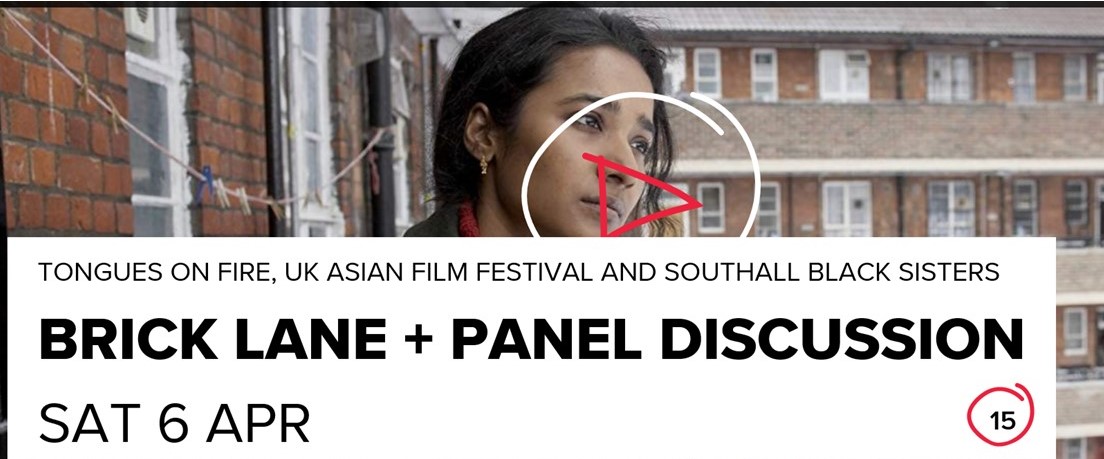

Event Details
Sat 6 April, 2.15pm | Rich Mix, London Screening of Brick Lane Director: Sarah Gavron Cast: Tannishtha Chatterjee, Satish Kaushik, Christopher Simpson and Harvey Virdi UK, 101 mins, 1985, English and
Event Details
Sat 6 April, 2.15pm | Rich Mix, London
Screening of Brick Lane
In Association with Southall Black Sisters
Brick Lane picks up on some of these themes of defiant sexuality and secular identities in the face of rising fundamentalism. It focuses on a newly arrived migrant woman from Bangladesh whose nostalgia for home is compounded by an unsatisfactory relationship with her husband. She is driven into an affair with a young man who responds to the racism of white youth in Tower Hamlets by embracing religious fundamentalism.
Followed by a panel discussion on Subversion and Dissent
Chaired by: Samira Ahmed
Guest speakers: Sukhwant Dhaliwal, Geeta Sahgal, Rashmi Varma, Maryam Namazie and Monica Ali.
Venue: Rich Mixa, London
Sat 6 April, 2.15pm
Ticket Price: £10.95
more
Time
(Saturday) 2:15 pm - 6:00 pm
Location
See post
address
2019tue02apr6:00 pmtue8:00 pmMonthly Support Group6:00 pm - 8:00 pm address























Event Details
Join us for our monthly support group, to talk about issues that still affect us after leaving Islam. If you would like to come along, please email Sadia on sadia.hameed@council-of-ex-muslims-of-britain-e5a565.ingress-baronn.ewp.live for details of
Event Details
Join us for our monthly support group, to talk about issues that still affect us after leaving Islam.
If you would like to come along, please email Sadia on sadia.hameed@council-of-ex-muslims-of-britain-e5a565.ingress-baronn.ewp.live for details of the venue, as it will be different every time.
Time
(Tuesday) 6:00 pm - 8:00 pm
Location
See post
address
may 2019
2019thu30may6:00 pmthu8:00 pmBirmingham Support Group6:00 pm - 8:00 pm address











Event Details
Join us for our monthly support group, to talk about issues that still affect us after leaving Islam. If you would like to come along, please email Sadia on sadia.hameed@council-of-ex-muslims-of-britain-e5a565.ingress-baronn.ewp.live for details of
Event Details
Join us for our monthly support group, to talk about issues that still affect us after leaving Islam.
If you would like to come along, please email Sadia on sadia.hameed@council-of-ex-muslims-of-britain-e5a565.ingress-baronn.ewp.live for details of the venue.
Time
(Thursday) 6:00 pm - 8:00 pm
Location
See post
address
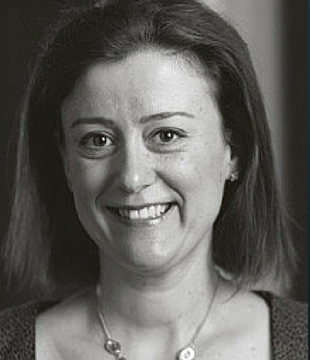




Event Details
Join us for our monthly meet-up with Lawyer Ana Gonzalez on apostasy and asylum. If you would like to come along, please email Sadia on sadia.hameed@council-of-ex-muslims-of-britain-e5a565.ingress-baronn.ewp.live for details of the venue.
Event Details
Join us for our monthly meet-up with Lawyer Ana Gonzalez on apostasy and asylum.
If you would like to come along, please email Sadia on sadia.hameed@council-of-ex-muslims-of-britain-e5a565.ingress-baronn.ewp.live for details of the venue.
Time
(Tuesday) 6:00 pm - 8:00 pm
Location
See post
address
2019sun19may2:00 pmsun5:00 pmCEMB Social - Meet & Eat2:00 pm - 5:00 pm address







Event Details
Please join us at Camden Market for our meet and eat. We will be meeting outside Camden tube station at 2pm and heading towards the lock where we all buy whatever
Event Details
Please join us at Camden Market for our meet and eat.
We will be meeting outside Camden tube station at 2pm and heading towards the lock where we all buy whatever we want to eat and have a natter.
Time
(Sunday) 2:00 pm - 5:00 pm
Location
See post
address
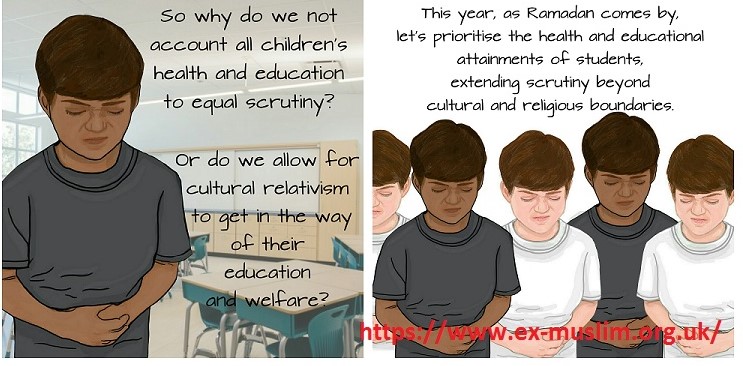

Event Details
In the past years, Council of Ex-Muslims of Britain has held fast-defying protests at embassies in solidarity with those who are persecuted for eating and drinking during Ramadan. This year, CEMB’s
Event Details
In the past years, Council of Ex-Muslims of Britain has held fast-defying protests at embassies in solidarity with those who are persecuted for eating and drinking during Ramadan.
This year, CEMB’s fast-defying action included a protest at the Department for Education on 17th May at 12pm to highlight the Department’s inaction with regards to child fasting in schools. Child fasting should be banned as it is harmful to children.
If a child is sent to school without breakfast and not allowed to eat lunch or drink water whilst going about their normal school day for an entire month, this would rightly trigger safeguarding procedures and be considered a form of neglect. However, when it comes to BME children of religious parents, the Department for Education readily turns a blind eye.
Being forced to not eat or drink water for an entire month for 12+ hours a day is clearly harmful to children and child development. It causes sickness, dizziness, migraines, sunstrokes, lack of focus and tiredness as a result of dehydration or lack of sustenance. It also can lead to depression, anxiety, mood swings, irritability, anger, apathy, reduced alertness, diminished comprehension… Children have been known to faint as have teachers who are fasting.
Adults, of course, can fast if they choose. It’s important to remember that there is a corresponding right NOT to fast if one chooses not to. Nonetheless, when it comes to children, imposing fasting rules is child abuse and neglect.
The Department for Education has a duty of care for school children and must act immediately to put child welfare above religious demands of the child’s parents.
#ChildFastingChildAbuse
DETAILS OF THE EVENTS FOR RAMADAN
17 May, 12pm
Fast defying protest outside Department for Education, 20 Great Smith St, Westminster, London, SW1P 3BT
#ChildFastingChildAbuse
more
Time
(Friday) 12:00 pm - 2:00 pm
Location
See post
address
2019tue07may6:00 pmtue8:00 pmMonthly Support Group6:00 pm - 8:00 pm address























Event Details
Join us for our monthly support group, to talk about issues that still affect us after leaving Islam. If you would like to come along, please email Sadia on sadia.hameed@council-of-ex-muslims-of-britain-e5a565.ingress-baronn.ewp.live for details of
Event Details
Join us for our monthly support group, to talk about issues that still affect us after leaving Islam.
If you would like to come along, please email Sadia on sadia.hameed@council-of-ex-muslims-of-britain-e5a565.ingress-baronn.ewp.live for details of the venue, as it will be different every time.
Time
(Tuesday) 6:00 pm - 8:00 pm
Location
See post
address
june 2019
2019wed26jun6:00 pmwed8:00 pmBirmingham Support Group6:00 pm - 8:00 pm address











Event Details
Join us for our monthly support group, to talk about issues that still affect us after leaving Islam. If you would like to come along, please email Sadia on sadia.hameed@council-of-ex-muslims-of-britain-e5a565.ingress-baronn.ewp.live for details of
Event Details
Join us for our monthly support group, to talk about issues that still affect us after leaving Islam.
If you would like to come along, please email Sadia on sadia.hameed@council-of-ex-muslims-of-britain-e5a565.ingress-baronn.ewp.live for details of the venue.
Time
(Wednesday) 6:00 pm - 8:00 pm
Location
See post
address
2019fri21junAll DayLGBT Humanist Conference(All Day: friday) address


Event Details
CEMB Spokesperson Jimmy Bangash will be speaking at the LGBT Humanist Conference on June 21. For more information, click here.
Event Details
CEMB Spokesperson Jimmy Bangash will be speaking at the LGBT Humanist Conference on June 21. For more information, click here.
Time
All Day (Friday)
Location
See post
address
2019tue18jun6:00 pmtue8:00 pm#RefugeeToo Open Mic meet Up6:00 pm - 8:00 pm address
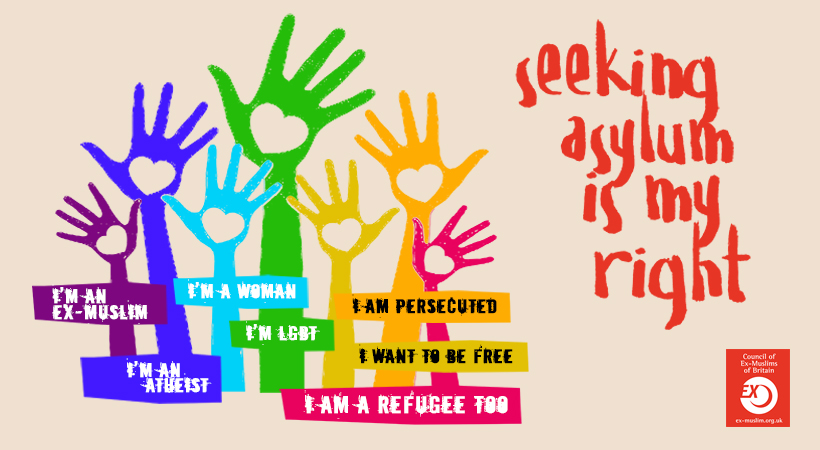

Event Details
#RefugeeToo is CEMB movement that allows refugees to talk about their experiences of being a refugee, be that their experiences in their home countries and why they had to leave,
Event Details
#RefugeeToo is CEMB movement that allows refugees to talk about their experiences of being a refugee, be that their experiences in their home countries and why they had to leave, their journey to “safety” or their experinces with the home office.
Come and have your say at the first #RefugeeToo open Mic night. Share with us your experinces.
If you would like to come along, please email Sadia on sadia.hameed@council-of-ex-muslims-of-britain-e5a565.ingress-baronn.ewp.live for details of the venue.
Time
(Tuesday) 6:00 pm - 8:00 pm
Location
See post
address
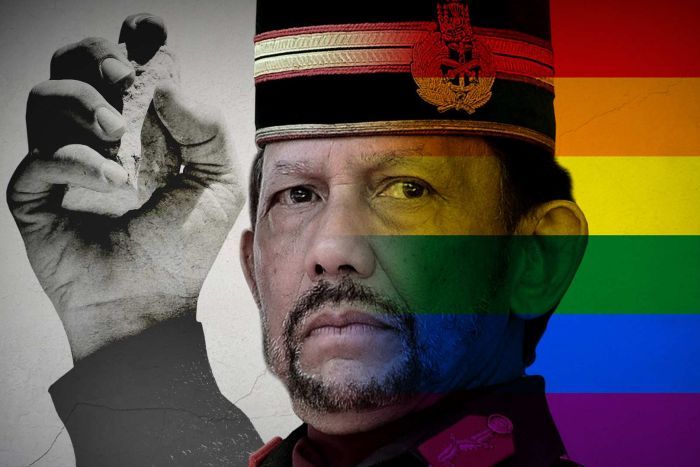

Event Details
In the run-up to Gay Pride, CEMB will be organising a protest outside the Brunei Embassy to condemn Brunei’s new stoning sentences for homosexuality and adultery. The protest will be
Event Details
In the run-up to Gay Pride, CEMB will be organising a protest outside the Brunei Embassy to condemn Brunei’s new stoning sentences for homosexuality and adultery. The protest will be held on 17 June at 12pm at 19-20 Belgrave Square, Belgravia, London SW1X 8PG. In April, CEMB joined protests at the Dorchester Hotel, which is owned by the Sultan of Brunei.
Time
(Monday) 12:00 pm - 2:00 pm
Location
See post
address
2019sat15jun2:00 pmsat5:00 pmCEMB Social - Meet & Eat2:00 pm - 5:00 pm address







Event Details
Please join us at Camden Market for our meet and eat. We will be meeting outside Camden tube station at 2pm and heading towards the lock where we all buy whatever
Event Details
Please join us at Camden Market for our meet and eat.
We will be meeting outside Camden tube station at 2pm and heading towards the lock where we all buy whatever we want to eat and have a natter.
Time
(Saturday) 2:00 pm - 5:00 pm
Location
See post
address
2019tue04jun6:00 pmtue8:00 pmMonthly Support Group6:00 pm - 8:00 pm address























Event Details
Join us for our monthly support group, to talk about issues that still affect us after leaving Islam. If you would like to come along, please email Sadia on sadia.hameed@council-of-ex-muslims-of-britain-e5a565.ingress-baronn.ewp.live for details of
Event Details
Join us for our monthly support group, to talk about issues that still affect us after leaving Islam.
If you would like to come along, please email Sadia on sadia.hameed@council-of-ex-muslims-of-britain-e5a565.ingress-baronn.ewp.live for details of the venue, as it will be different every time.
Time
(Tuesday) 6:00 pm - 8:00 pm
Location
See post
address
2019sat01jun1:00 pmsat6:00 pmRamadan Fast-Defying Picnic1:00 pm - 6:00 pm address


Event Details
In the past years, Council of Ex-Muslims of Britain has held fast-defying protests at embassies in solidarity with those who are persecuted for eating and drinking during Ramadan. This year, CEMB’s
Event Details
In the past years, Council of Ex-Muslims of Britain has held fast-defying protests at embassies in solidarity with those who are persecuted for eating and drinking during Ramadan.
This year, CEMB’s fast-defying action will include a picnic for ex-Muslims on 1 June, 1pm
To join picnic, email sadia.hameed@council-of-ex-muslims-of-britain-e5a565.ingress-baronn.ewp.live
Time
(Saturday) 1:00 pm - 6:00 pm
Location
See post
address
july 2019


Event Details
27-28 July 2018, Cambridge Rationalist International Conference
Event Details
27-28 July 2018, Cambridge
Rationalist International Conference
Time
july 27 (Saturday) - 28 (Sunday)
Location
University of Cambridge Møller House
Churchill College, Cambridge Cambridge CB1 8RN United Kingdom
2019wed24jul6:00 pmwed8:00 pmBirmingham Support Group6:00 pm - 8:00 pm Different venue every time











Event Details
Join us for our monthly support group, to talk about issues that still affect us after leaving Islam. If you would like to come along, please email Sadia on sadia.hameed@council-of-ex-muslims-of-britain-e5a565.ingress-baronn.ewp.live for details of
Event Details
Join us for our monthly support group, to talk about issues that still affect us after leaving Islam.
If you would like to come along, please email Sadia on sadia.hameed@council-of-ex-muslims-of-britain-e5a565.ingress-baronn.ewp.live for details of the venue.
Time
(Wednesday) 6:00 pm - 8:00 pm
Location
Venue varies
Different venue every time
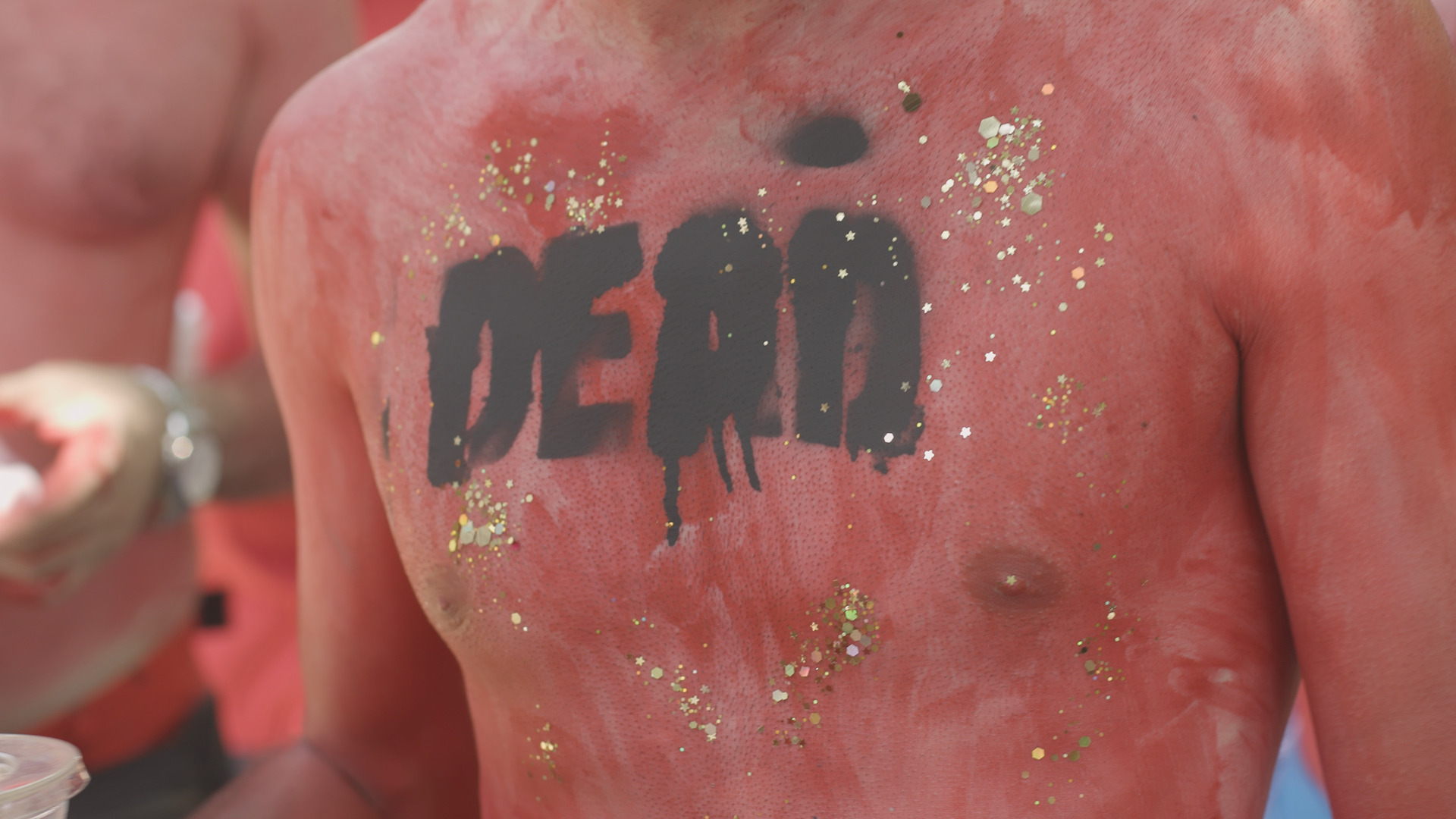

Event Details
4 July 2019, 6:00pm for a 6:45pm start until 10:00pm, London Join Council of Ex-Muslims of Britain and One Law for All for an evening of film, poetry and a panel
Event Details
4 July 2019, 6:00pm for a 6:45pm start until 10:00pm, London
Join Council of Ex-Muslims of Britain and One Law for All for an evening of film, poetry and a panel discussion on LGBT rights, Apostasy and Blasphemy.
GET YOUR TICKETS TODAY. NO TICKETS SOLD AT DOOR.
Film: ‘Ferdous’ by Shakila Taranum Maan
Poetry: By Kenyan Somali Poet Halima Salat
Panel discussion: With Drew Dalton (Hidayah Chair), Jimmy Bangash (CEMB Spokesperson), Khakan Qureshi (Birmingham South Asians LGBT Founder), Nadia El Fani (Tunisian Filmmaker), Sadia Hameed (CEMB Spokesperson), Shakila Taranum Maan (British Director) and Syed Isteak Hossain Shawon (Bangladeshi LGBT activist and Editor of Boys Love World). Facilitated by Maryam Namazie (CEMB and One Law for All Spokesperson)
Nahla Mahmoud will be the MC of the evening.
Tickets are £5 waged; £3 unwaged. No tickets sold at the door. Venue will be disclosed to ticket holders a few days before the event.
For more information, please contact m.namazie@council-of-ex-muslims-of-britain-e5a565.ingress-baronn.ewp.live.
more
Time
(Thursday) 6:00 pm - 10:00 pm
Location
See post
address
2019mon01jul6:00 pmmon8:00 pmMonthly Support Group6:00 pm - 8:00 pm address























Event Details
Join us for our monthly support group, to talk about issues that still affect us after leaving Islam. If you would like to come along, please email Sadia on sadia.hameed@council-of-ex-muslims-of-britain-e5a565.ingress-baronn.ewp.live for details of
Event Details
Join us for our monthly support group, to talk about issues that still affect us after leaving Islam.
If you would like to come along, please email Sadia on sadia.hameed@council-of-ex-muslims-of-britain-e5a565.ingress-baronn.ewp.live for details of the venue, as it will be different every time.
Time
(Monday) 6:00 pm - 8:00 pm
Location
See post
address
august 2019
2019sat31augAll Daysun01sepCelebrating Dissent Festival at De Balie, Amsterdam(All Day) address
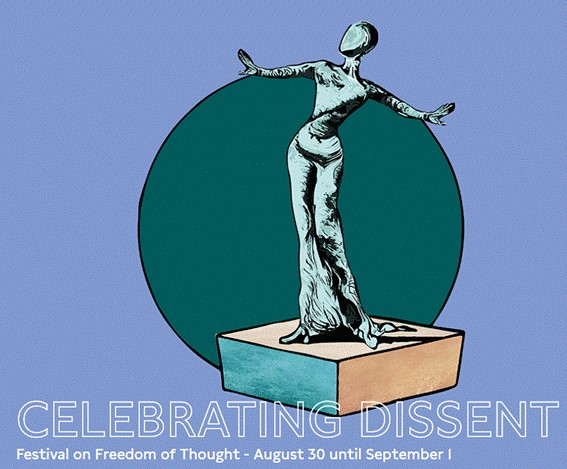


Event Details
Celebrating Dissent Festival during August 31 – September 1 in Amsterdam at De Balie will be a huge and historic event with nearly 50 contributors from 30 countries worldwide
Event Details
Celebrating Dissent Festival during August 31 – September 1 in Amsterdam at De Balie will be a huge and historic event with nearly 50 contributors from 30 countries worldwide coming together to celebrate freedom through theatre, talks, poetry, film and stand-up comedy.
The festival Celebrating Dissent honours freedom: freedom to think differently, freedom not to believe and freedom to be yourself.
31 AUGUST 2019
11:00: A Conversation on Women’s Dissent with Inna Shevchenko, Maryam Namazie, Taslima Nasrin and Zineb El Razoui. Music by Shelley Segal. Protest Art by Victoria Guggenheim.
14:00: Touching the Holy Subject with Nadia El Fani, Rishvin Ismath, Saif Ul Malook and Sarah Haider. Music by Veedu Vidz.
16:00: Comedy, the Sacred and Islamophobia with Shabana Rehman, Ali Rizvi and Armin Nabavi.
17:40: Public Art Protest celebrating dissenters in public square.
19:00: Separation of Religion from the State with Afsana Lachaux, Annie Laurie Gaylor, Elżbieta Podleśna, Homa Arjomand and Marieme Helie Lucas.
21:00: Women against Gods with Gita Sahgal, Houzan Mahmoud, Ibtissame Betty Lachgar, Mineke Schipper and Rana Ahmad. Performance by Atoosa Farahmand.
1 SEPTEMBER 2019
10:00: Film Screening Neither Allah Nor Master by Nadia El Fani followed by a conversation with Hind Bariaz, Ismail Mohamed, Karrar Al Asfoor, Wissam Charafeddine and Zara Kay.
12:00: Film Screening No Longer without You by Nazmiyeh Oral followed by a conversation with Cemal Knudsen Yucel, Fauzia Ilyas, Mimzy Vidz, Omar Makram, Rishvin Ismath, Sohail Ahmad and Zehra Pala.
16:00: On Identity with Kenan Malik, Harris Sultan, Jimmy Bangash, Rahila Gupta and Yasmin Rehman. Poetry by Halima Salat.
20:00: Fighting the Far-Right; Celebrating Dissent with Halima Salat, Maryam Namazie, Mohamed Hisham, Muhammed Syed, Sadia Hameed and Sami Abdallah. Music by Shelley Segal.
There will also be artwork by Mahshad Afshar and Jenny Wenhammar.
You can purchase day passes or passes for the full festival here.
You can also buy tickets for individual events or find out more information here.
more
Time
August 31 (Saturday) - September 1 (Sunday)
Location
See post
address
2019thu29aug6:00 pmthu8:00 pmBirmingham Support Group6:00 pm - 8:00 pm address











Event Details
Join us for our monthly support group, to talk about issues that still affect us after leaving Islam. If you would like to come along, please email Sadia on sadia.hameed@council-of-ex-muslims-of-britain-e5a565.ingress-baronn.ewp.live for details of
Event Details
Join us for our monthly support group, to talk about issues that still affect us after leaving Islam.
If you would like to come along, please email Sadia on sadia.hameed@council-of-ex-muslims-of-britain-e5a565.ingress-baronn.ewp.live for details of the venue.
Time
(Thursday) 6:00 pm - 8:00 pm
Location
See post
address
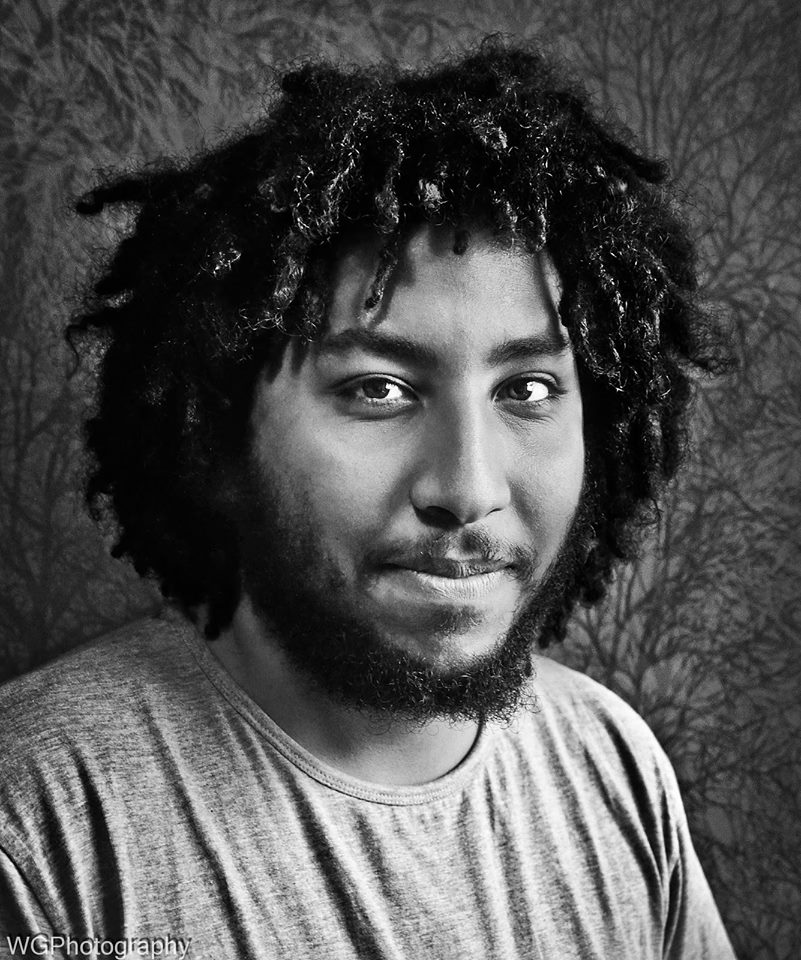


Event Details
Jon us for an evening with CEMB spokesperson Imad Iddine Habib If you would like to come along, please email Sadia on sadia.hameed@council-of-ex-muslims-of-britain-e5a565.ingress-baronn.ewp.live for details of the venue.
Event Details
Jon us for an evening with CEMB spokesperson Imad Iddine Habib
If you would like to come along, please email Sadia on sadia.hameed@council-of-ex-muslims-of-britain-e5a565.ingress-baronn.ewp.live for details of the venue.
Time
(Tuesday) 6:00 pm - 8:00 pm
Location
See post
address
2019sat17aug2:00 pmsat5:00 pmCEMB Social - Meet & Eat2:00 pm - 5:00 pm address







Event Details
Please join us at Camden Market for our meet and eat. We will be meeting outside Camden tube station at 2pm and heading towards the lock where we all buy whatever
Event Details
Please join us at Camden Market for our meet and eat.
We will be meeting outside Camden tube station at 2pm and heading towards the lock where we all buy whatever we want to eat and have a natter.
Time
(Saturday) 2:00 pm - 5:00 pm
Location
See post
address
2019fri16aug6:00 pmfri11:00 pmAN EVENING WITH VEEDU & MIMZY6:00 pm - 11:00 pm address
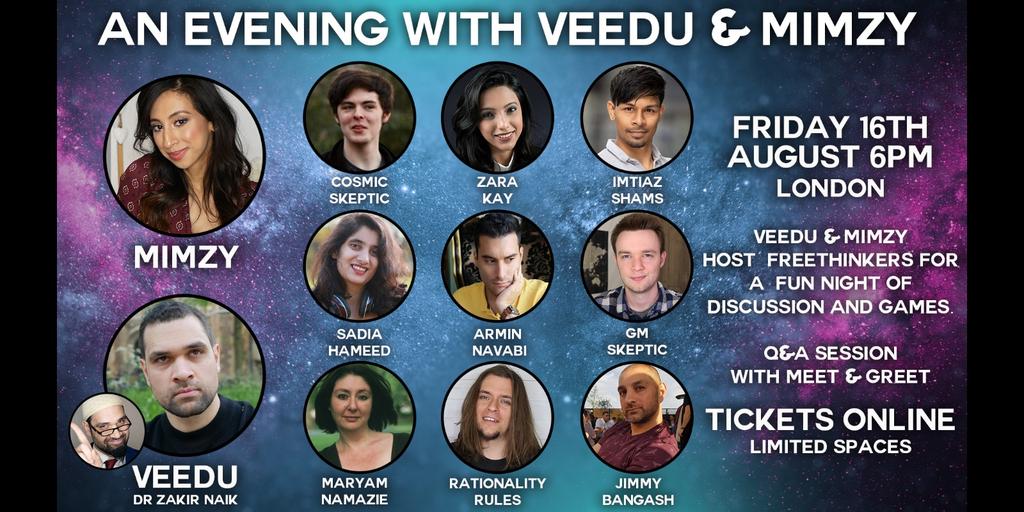

Event Details
Veedu and Mimzy will host Atheist activists and YouTubers from Europe and North America in their first public event. Guest speakers include;Armin Navabi, Alex O’ Connor (Cosmic Skeptic), Maryam Namazie, Sadia
Event Details
Veedu and Mimzy will host Atheist activists and YouTubers from Europe and North America in their first public event.
Guest speakers include;Armin Navabi, Alex O’ Connor (Cosmic Skeptic), Maryam Namazie, Sadia Hameed, Stephen Woodford (Rationality Rules), Jimmy Bangash, Drew McCoy (GM Skeptic), Imtiaz Shams, Zara Kay.
We discuss a range of topics, take questions from the audience and most importantly play fun and interesting games to celebrate the occasion.
Don’t miss this great opportunity to speak and listen to influencers in the secular community and take part in a night of fun!
IMPORTANT NOTE
When buying a ticket please make sure to fill out your telephone number and email address to be sent the location and other details of the event.
more
Time
(Friday) 6:00 pm - 11:00 pm
Location
See post
address
2019tue06aug6:00 pmtue8:00 pmMonthly Support Group6:00 pm - 8:00 pm Different venue every time























Event Details
Join us for our monthly support group, to talk about issues that still affect us after leaving Islam. If you would like to come along, please email Sadia on sadia.hameed@council-of-ex-muslims-of-britain-e5a565.ingress-baronn.ewp.live for details of
Event Details
Join us for our monthly support group, to talk about issues that still affect us after leaving Islam.
If you would like to come along, please email Sadia on sadia.hameed@council-of-ex-muslims-of-britain-e5a565.ingress-baronn.ewp.live for details of the venue, as it will be different every time.
Time
(Tuesday) 6:00 pm - 8:00 pm
Location
Venue varies
Different venue every time
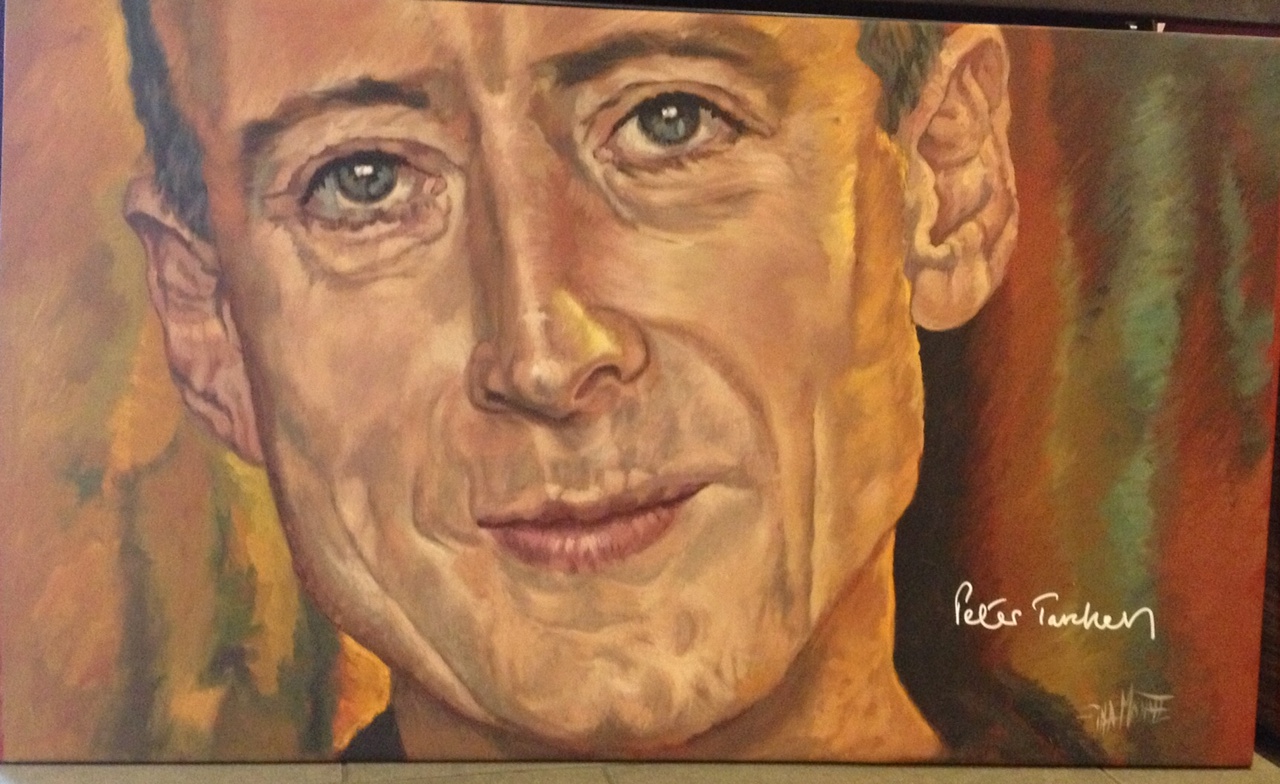


Event Details
Tuesday 24 October 2017, 6:30pm-8:30pm, central London by Kings Cross Evening with Peter Tatchell, Human Rights Campaigner, on the links between the gay rights and ex-Muslim rights PLEASE NOTE: This is
Event Details
Tuesday 24 October 2017, 6:30pm-8:30pm, central London by Kings Cross
Evening with Peter Tatchell, Human Rights Campaigner, on the links between the gay rights and ex-Muslim rights
PLEASE NOTE: This is a new venue for our monthly meet-ups; if you would like to attend, please email exmuslimcouncil@gmail.com to register and receive further information. If you already know the new location, just show up.
Suggested donation: £3 waged; £1 unwaged.
Biography:
Peter Tatchell has been campaigning for human rights and global justice since 1967. New Statesman readers voted him sixth on their list of “Heroes of our Time” 2006. He won Campaigner of the Year at The Observer Ethical Awards 2009, as well as Secularist of the Year 2012. He writes and broadcasts on many human rights and social justice issues. In protest against the Archbishop of Canterbury’s support for legal discrimination against LGBT people, he interrupted Dr Carey’s Easter Sunday Sermon in 1998. He attempted a citizen’s arrest of Zimbabwean President Robert Mugabe in 1999 and again in 2001, and was beaten unconscious the second time. He was also arrested and beaten when he went to support Moscow LGBT Pride in 2007. Both attacks left him with brain and eye damage. He is currently the Director of the human rights organisation, the Peter Tatchell Foundation.
more
Time
(Saturday) 9:33 pm - 9:33 pm
Location
See post
address
2019sat03aug9:33 pmsat9:33 pmLondon Feminist Conference9:33 pm - 9:33 pm address
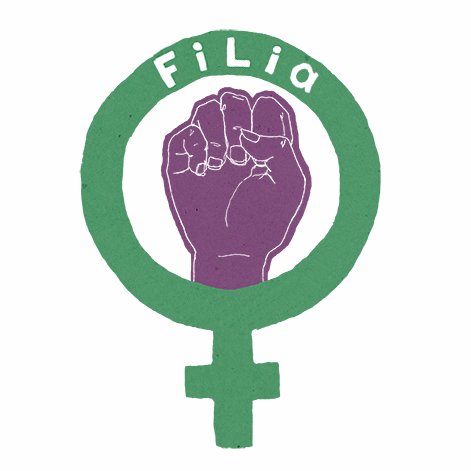




Event Details
14-15 October 2017 London Feminist Conference
Event Details
14-15 October 2017
London Feminist Conference
Time
(Saturday) 9:33 pm - 9:33 pm
Location
See post
address
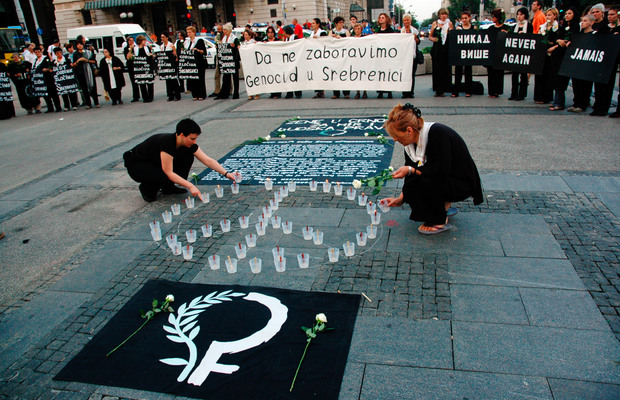

Event Details
Growing Signs of Fundamentalism – Democratic and Feminist Response, Feminist roundtable discussion, October 13-15, 2017, Belgrade. Organised by Women in Black
Event Details
Growing Signs of Fundamentalism – Democratic and Feminist Response, Feminist roundtable discussion, October 13-15, 2017, Belgrade. Organised by Women in Black
Time
(Saturday) 9:30 pm - 9:30 pm
Location
See post
address
september 2019
2019thu26sep6:00 pmthu8:00 pmBirmingham Support Group6:00 pm - 8:00 pm address











Event Details
Join us for our monthly support group, to talk about issues that still affect us after leaving Islam. If you would like to come along, please email Sadia on sadia.hameed@council-of-ex-muslims-of-britain-e5a565.ingress-baronn.ewp.live for details of
Event Details
Join us for our monthly support group, to talk about issues that still affect us after leaving Islam.
If you would like to come along, please email Sadia on sadia.hameed@council-of-ex-muslims-of-britain-e5a565.ingress-baronn.ewp.live for details of the venue.
Time
(Thursday) 6:00 pm - 8:00 pm
Location
See post
address
2019tue24sep6:00 pmtue8:00 pmArts Meet up with Salma Zulfiqar6:00 pm - 8:00 pm address
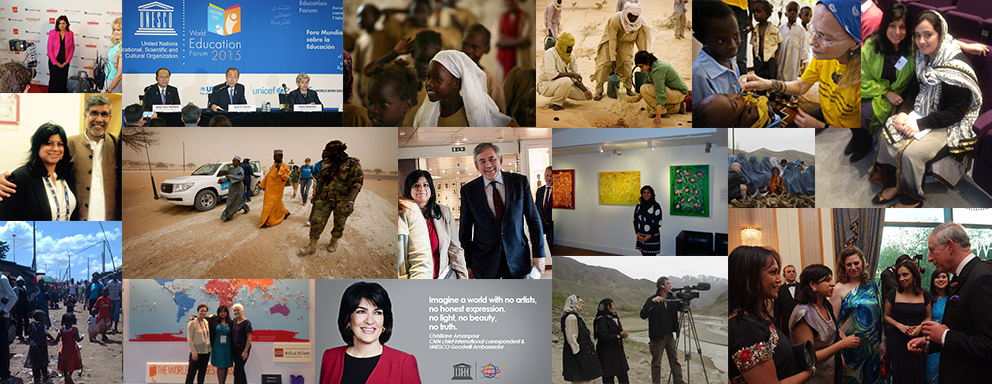

Event Details
Join us for an arts meet up with Salma Zulfiqar Salma Zulfiqar is an International Artist and Activist working on migration. Her current creative projects, such as ARTconnects & The Migration
Event Details
Join us for an arts meet up with Salma Zulfiqar
Salma Zulfiqar is an International Artist and Activist working on migration. Her current creative projects, such as ARTconnects & The Migration Blanket, focus on empowering refugee and migrant women by promoting integration, working towards preventing hate crimes and extremism.
If you would like to come along, please email Sadia on sadia.hameed@council-of-ex-muslims-of-britain-e5a565.ingress-baronn.ewp.live for details of the venue.
Time
(Tuesday) 6:00 pm - 8:00 pm
Location
See post
address
2019sat21sep2:00 pmsat5:00 pmCEMB Social - Movie & Munchies2:00 pm - 5:00 pm address








Event Details
Join us for a movie and some food (either bring our or order something on arrival) For further details, please get in touch.
Event Details
Join us for a movie and some food (either bring our or order something on arrival)
For further details, please get in touch.
Time
(Saturday) 2:00 pm - 5:00 pm
Location
See post
address
2019tue10sep6:00 pmtue8:00 pmMonthly Support Group6:00 pm - 8:00 pm address























Event Details
Join us for our monthly support group, to talk about issues that still affect us after leaving Islam. If you would like to come along, please email Sadia on sadia.hameed@council-of-ex-muslims-of-britain-e5a565.ingress-baronn.ewp.live for details of
Event Details
Join us for our monthly support group, to talk about issues that still affect us after leaving Islam.
If you would like to come along, please email Sadia on sadia.hameed@council-of-ex-muslims-of-britain-e5a565.ingress-baronn.ewp.live for details of the venue, as it will be different every time.
Time
(Tuesday) 6:00 pm - 8:00 pm
Location
See post
address
2019sat31augAll Daysun01sepCelebrating Dissent Festival at De Balie, Amsterdam(All Day) address



Event Details
Celebrating Dissent Festival during August 31 – September 1 in Amsterdam at De Balie will be a huge and historic event with nearly 50 contributors from 30 countries worldwide
Event Details
Celebrating Dissent Festival during August 31 – September 1 in Amsterdam at De Balie will be a huge and historic event with nearly 50 contributors from 30 countries worldwide coming together to celebrate freedom through theatre, talks, poetry, film and stand-up comedy.
The festival Celebrating Dissent honours freedom: freedom to think differently, freedom not to believe and freedom to be yourself.
31 AUGUST 2019
11:00: A Conversation on Women’s Dissent with Inna Shevchenko, Maryam Namazie, Taslima Nasrin and Zineb El Razoui. Music by Shelley Segal. Protest Art by Victoria Guggenheim.
14:00: Touching the Holy Subject with Nadia El Fani, Rishvin Ismath, Saif Ul Malook and Sarah Haider. Music by Veedu Vidz.
16:00: Comedy, the Sacred and Islamophobia with Shabana Rehman, Ali Rizvi and Armin Nabavi.
17:40: Public Art Protest celebrating dissenters in public square.
19:00: Separation of Religion from the State with Afsana Lachaux, Annie Laurie Gaylor, Elżbieta Podleśna, Homa Arjomand and Marieme Helie Lucas.
21:00: Women against Gods with Gita Sahgal, Houzan Mahmoud, Ibtissame Betty Lachgar, Mineke Schipper and Rana Ahmad. Performance by Atoosa Farahmand.
1 SEPTEMBER 2019
10:00: Film Screening Neither Allah Nor Master by Nadia El Fani followed by a conversation with Hind Bariaz, Ismail Mohamed, Karrar Al Asfoor, Wissam Charafeddine and Zara Kay.
12:00: Film Screening No Longer without You by Nazmiyeh Oral followed by a conversation with Cemal Knudsen Yucel, Fauzia Ilyas, Mimzy Vidz, Omar Makram, Rishvin Ismath, Sohail Ahmad and Zehra Pala.
16:00: On Identity with Kenan Malik, Harris Sultan, Jimmy Bangash, Rahila Gupta and Yasmin Rehman. Poetry by Halima Salat.
20:00: Fighting the Far-Right; Celebrating Dissent with Halima Salat, Maryam Namazie, Mohamed Hisham, Muhammed Syed, Sadia Hameed and Sami Abdallah. Music by Shelley Segal.
There will also be artwork by Mahshad Afshar and Jenny Wenhammar.
You can purchase day passes or passes for the full festival here.
You can also buy tickets for individual events or find out more information here.
more
Time
August 31 (Saturday) - September 1 (Sunday)
Location
See post
address
october 2019
2019thu31oct6:00 pmthu8:00 pmBirmingham Support Group6:00 pm - 8:00 pm address











Event Details
Join us for our monthly support group, to talk about issues that still affect us after leaving Islam. If you would like to come along, please email Sadia on sadia.hameed@council-of-ex-muslims-of-britain-e5a565.ingress-baronn.ewp.live for details of
Event Details
Join us for our monthly support group, to talk about issues that still affect us after leaving Islam.
If you would like to come along, please email Sadia on sadia.hameed@council-of-ex-muslims-of-britain-e5a565.ingress-baronn.ewp.live for details of the venue.
Time
(Thursday) 6:00 pm - 8:00 pm
Location
See post
address
2019tue29oct6:00 pmtue8:00 pmFGM & Male circumcision Meet up6:00 pm - 8:00 pm address


Event Details
Join us for a discussion about Female genital mutilation and male circumcision. If you would like to come along, please email Sadia on sadia.hameed@council-of-ex-muslims-of-britain-e5a565.ingress-baronn.ewp.live for details of the venue.
Event Details
Join us for a discussion about Female genital mutilation and male circumcision.
If you would like to come along, please email Sadia on sadia.hameed@council-of-ex-muslims-of-britain-e5a565.ingress-baronn.ewp.live for details of the venue.
Time
(Tuesday) 6:00 pm - 8:00 pm
Location
See post
address
2019sat19oct2:00 pmsat5:00 pmCEMB Social - Movie & Munchies2:00 pm - 5:00 pm address








Event Details
Join us for a movie and some food (either bring our or order something on arrival) For further details, please get in touch.
Event Details
Join us for a movie and some food (either bring our or order something on arrival)
For further details, please get in touch.
Time
(Saturday) 2:00 pm - 5:00 pm
Location
See post
address
2019sat19octAll Daysun2019-20 October, FiLia 2019, Bradford(All Day) address
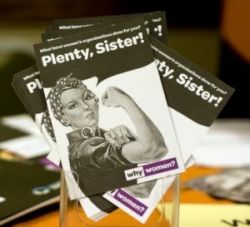

Event Details
Maryam Namazie and Sadia Hameed are on Apostasy and Blasphemy Panel on 19th October, FiLia Conference. More details here. 19th – 20th October FiLia Conference The Bradford Hotel Hall Ings
Event Details
Maryam Namazie and Sadia Hameed are on Apostasy and Blasphemy Panel on 19th October, FiLia Conference. More details here.
19th – 20th October
FiLia Conference
The Bradford Hotel
Hall Ings
Bradford
BD1 5SH
Time
october 19 (Saturday) - 20 (Sunday)
Location
See post
address
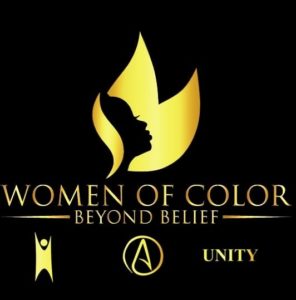

Event Details
Women of Color Beyond Belief Conference ACTIVISM, FEMINISM AND SECULARISM IN ACTION! “The Women of Color Beyond Belief Conference was created to achieve the following goals: *To highlight the social justice work
Event Details
Women of Color Beyond Belief Conference
ACTIVISM, FEMINISM AND SECULARISM IN ACTION!
“The Women of Color Beyond Belief Conference was created to achieve the following goals:
*To highlight the social justice work of women of color within the secular community.
*To provide an intersectional vision of women of color leadership and activism in secularism.
*To create more inclusive opportunities in secular organizing, policy and practice.
*To foster an environment of encouragement, growth, and sustainability.
Panels, presentations, workshops and performances will cover the following topics:
*Church-state separation activism
*Religion in marginalized communities
*Violence against women
*Feminism, anti-racism and racial justice action
*LGBTQI and queer rights
*Reproductive justice
*Sexual expression and liberation
*Organizing techniques and secular community building
*Secular humanist childrearing in PoC communities
*Combatting “isms” and creating safe spaces in the secular community
*Marijuana legalization and decriminalization
Follow the link to register for the event : https://wocbeyondbelief.com/
more
Time
4 (Friday) 9:00 am - 6 (Sunday) 8:00 pm
Location
Marriott Midway Hotel
Marriott Midway Hotel 6520
2019tue01oct6:00 pmtue8:00 pmMonthly Support Group6:00 pm - 8:00 pm address























Event Details
Join us for our monthly support group, to talk about issues that still affect us after leaving Islam. If you would like to come along, please email Sadia on sadia.hameed@council-of-ex-muslims-of-britain-e5a565.ingress-baronn.ewp.live for details of
Event Details
Join us for our monthly support group, to talk about issues that still affect us after leaving Islam.
If you would like to come along, please email Sadia on sadia.hameed@council-of-ex-muslims-of-britain-e5a565.ingress-baronn.ewp.live for details of the venue, as it will be different every time.
Time
(Tuesday) 6:00 pm - 8:00 pm
Location
See post
address
november 2019
2019sat16nov2:00 pmsat5:00 pmCEMB Social - Movie & Munchies2:00 pm - 5:00 pm address








Event Details
Join us for a movie and some food (either bring our or order something on arrival) For further details, please get in touch.
Event Details
Join us for a movie and some food (either bring our or order something on arrival)
For further details, please get in touch.
Time
(Saturday) 2:00 pm - 5:00 pm
Location
See post
address
2019sat16novAll DayIncredible Atheism Event in Oslo(All Day: saturday)


Event Details
15 November 2019, Oslo Norwegian Atheist Event
Event Details
15 November 2019, Oslo
Norwegian Atheist Event
Time
All Day (Saturday)





Event Details
Join us for our monthly meet-up with Lawyer Ana Gonzalez on apostasy and asylum. If you would like to come along, please email Sadia on sadia.hameed@council-of-ex-muslims-of-britain-e5a565.ingress-baronn.ewp.live for details of the venue.
Event Details
Join us for our monthly meet-up with Lawyer Ana Gonzalez on apostasy and asylum.
If you would like to come along, please email Sadia on sadia.hameed@council-of-ex-muslims-of-britain-e5a565.ingress-baronn.ewp.live for details of the venue.
Time
(Tuesday) 6:00 pm - 8:00 pm
Location
See post
address
2019tue05nov6:00 pmtue8:00 pmMonthly Support Group6:00 pm - 8:00 pm address























Event Details
Join us for our monthly support group, to talk about issues that still affect us after leaving Islam. If you would like to come along, please email Sadia on sadia.hameed@council-of-ex-muslims-of-britain-e5a565.ingress-baronn.ewp.live for details of
Event Details
Join us for our monthly support group, to talk about issues that still affect us after leaving Islam.
If you would like to come along, please email Sadia on sadia.hameed@council-of-ex-muslims-of-britain-e5a565.ingress-baronn.ewp.live for details of the venue, as it will be different every time.
Time
(Tuesday) 6:00 pm - 8:00 pm
Location
See post
address


Event Details
4 November 2019, Edinburgh Maryam to speak to Edinburgh University Atheist, Secularist and Humanist Society on Celebrating Apostasy, Blasphemy and Dissent.
Event Details
4 November 2019, Edinburgh
Maryam to speak to Edinburgh University Atheist, Secularist and Humanist Society on Celebrating Apostasy, Blasphemy and Dissent.
Time
All Day (Monday)
december 2019
2019tue03dec6:00 pmtue8:00 pmMonthly Support Group6:00 pm - 8:00 pm address























Event Details
Join us for our monthly support group, to talk about issues that still affect us after leaving Islam. If you would like to come along, please email Sadia on sadia.hameed@council-of-ex-muslims-of-britain-e5a565.ingress-baronn.ewp.live for details of
Event Details
Join us for our monthly support group, to talk about issues that still affect us after leaving Islam.
If you would like to come along, please email Sadia on sadia.hameed@council-of-ex-muslims-of-britain-e5a565.ingress-baronn.ewp.live for details of the venue, as it will be different every time.
Time
(Tuesday) 6:00 pm - 8:00 pm
Location
See post
address
january 2018


Event Details
Tuesday 30th January 2018, The ex-Muslim experience through art workshop with award-winning artist Victoria Gugenheim and Nigerian artist Sarah Peace, central London by Kings Cross, 6:30-8:30pm PLEASE NOTE: This is
Event Details
Tuesday 30th January 2018, The ex-Muslim experience through art workshop with award-winning artist Victoria Gugenheim and Nigerian artist Sarah Peace, central London by Kings Cross, 6:30-8:30pm
PLEASE NOTE: This is our regular monthly meet-ups venue; if you would like to attend, please email exmuslimcouncil@gmail.com to register and receive further information. If you already know the new location, just show up.
Suggested donation: £3 waged; £1 unwaged.
Time
(Tuesday) 6:30 pm - 8:30 pm
Location
See post
address
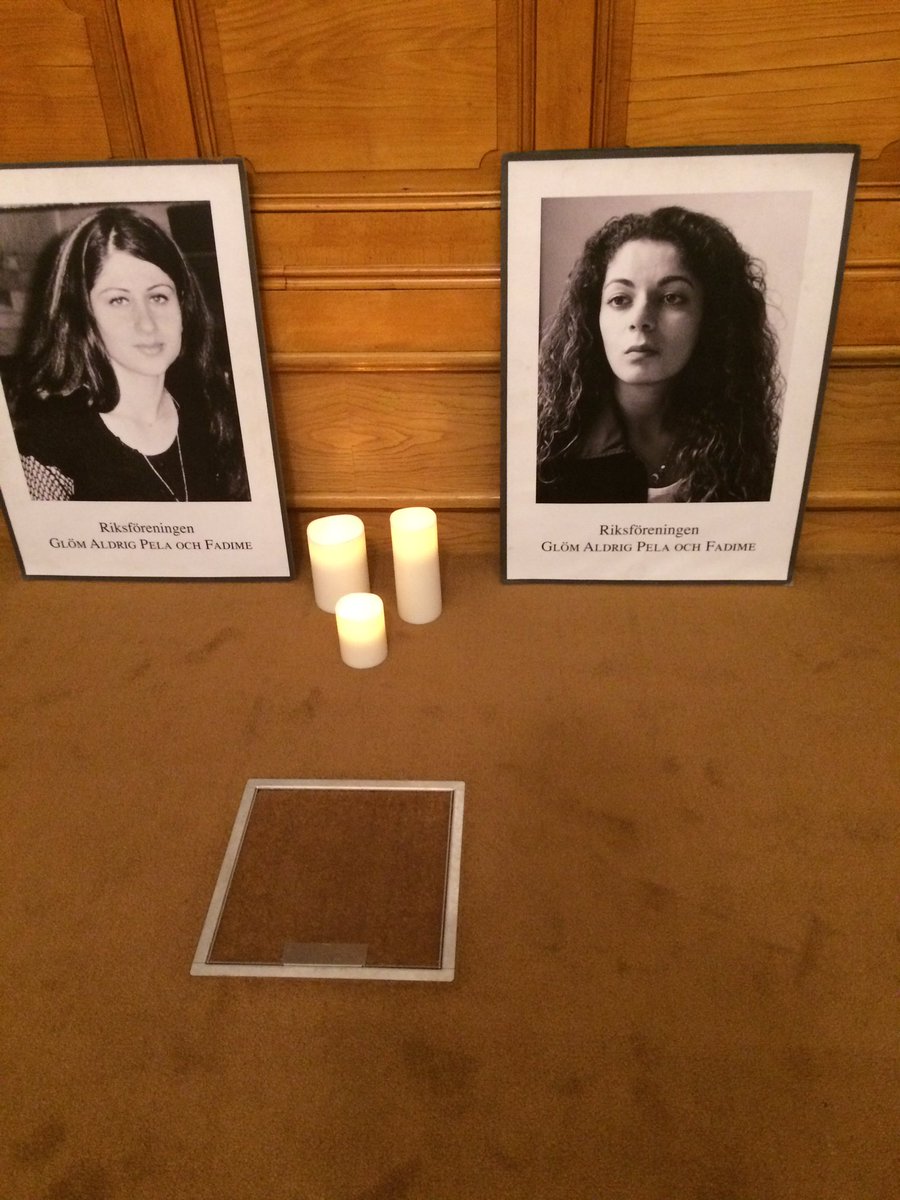

Event Details
20-22 January 2018, Stockholm Maryam Namazie will be speaking at GAPF International Conference to commemorate Fadime killed in the name of ‘honour’. More information can be seen here.
Event Details
20-22 January 2018, Stockholm
Maryam Namazie will be speaking at GAPF International Conference to commemorate Fadime killed in the name of ‘honour’. More information can be seen here.
Time
20 (Saturday) 10:00 am - 22 (Monday) 5:30 pm
Location
See post
address
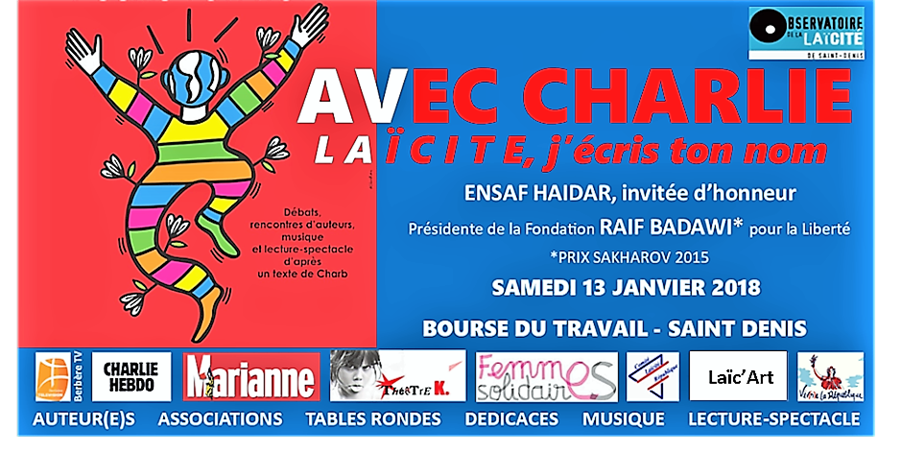

Event Details
13 January 2018, Paris AVEC CHARLIE, Laïcité, j’écris ton nom, Observatoire de la Laïcité de Saint Denis For tickets click here.
Event Details
13 January 2018, Paris
AVEC CHARLIE, Laïcité, j’écris ton nom, Observatoire de la Laïcité de Saint Denis
For tickets click here.
Time
All Day (Saturday)
Location
See post
address
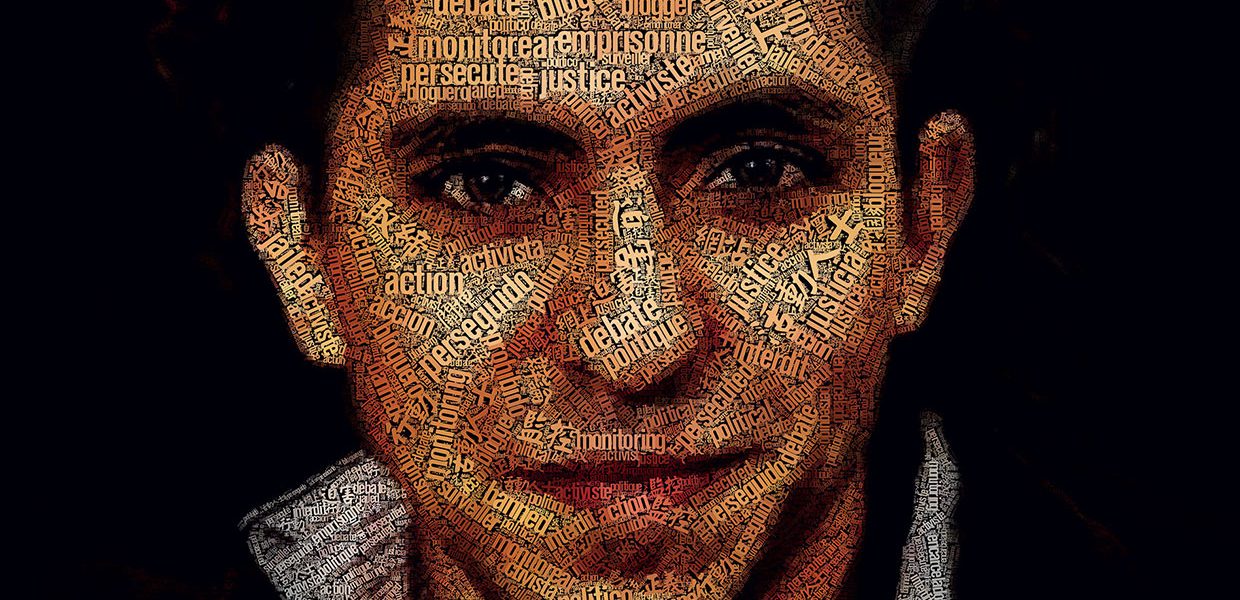

Event Details
9 January 2018, 1:00 pm-2:00 pm At the Curzon Street entrance to the Embassy of the Kingdom of Saudi Arabia, Mayfair, London On 9 January, English PEN and Reporters Without
Event Details
9 January 2018, 1:00 pm-2:00 pm
At the Curzon Street entrance to the Embassy of the Kingdom of Saudi Arabia, Mayfair, London
On 9 January, English PEN and Reporters Without Borders will hold a special lunchtime vigil at the Saudi Embassy in London to mark three years since Raif Badawi was first flogged. Please join us between 1-2pm, even if just for a few minutes on your lunchbreak, to show the Saudi authorities we will not forget him. Activists are asked to meet at the Curzon Street entrance to the Embassy of the Kingdom of Saudi Arabia, Mayfair, London (note: the postal address of the Embassy is 30-32 Charles Street).
The vigil will be co-sponsored by other organisations active on Raif Badawi’s case including Amnesty International UK, Bread and Roses TV, the Council of Ex-Muslims of Britain, International Humanist and Ethical Union – IHEU, and One Law For All.
Three years ago, on 9 January 2015, reports emerged that the imprisoned blogger Raif Badawi had been flogged in Saudi Arabia. Although Badawi had been arrested in June 2012 and sentenced almost two years later – to ten years in prison and 1000 lashes – it was the brutal public flogging that took place that January morning, covert footage of which began to make its way around the world, that forced the international community to pay any real attention to his plight.
TAKE ACTION
Join our vigil
On 9 January, English PEN and Reporters Without Border will hold a special lunchtime vigil at the Saudi Embassy in London to mark three years since Raif Badawi was flogged. Please join us between 1-2pm (even if just for a few minutes on your lunchbreak!) to show the Saudi authorities we will not forget him. Let us know if you’re coming and please invite your friends.
The vigil will be co-sponsored by other organisations active on Raif Badawi’s case including Amnesty International UK, Bread and Roses TV, the Council of Ex-Muslims of Britain, International Humanist and Ethical Union – IHEU, and One Law For All.
Send a card
PEN’s annual Season’s Greetings initiative encourages members and supporters to send messages to writers at risk around the world and their families. #PENgreetings
Ask your MP for their support
Write to your MP urging them to support this Early Day Motion for Raif Badawi’s release via https://www.writetothem.com/
Spread the word
Share details of Raif Badawi’s case on social media #FreeRaif
more
Time
(Tuesday) 1:00 pm - 2:00 pm
Location
See post
address
2018sat06janAll Day#Toujours Charlie, Paris(All Day: saturday) address


Event Details
On 6 January 2018 Maryam Namazie will be joining Charlie Hebdo and others to mark the 3rd anniversary of the shooting of Charlie Hebdo at Les Folies Bergères in Paris,
Event Details
On 6 January 2018 Maryam Namazie will be joining Charlie Hebdo and others to mark the 3rd anniversary of the shooting of Charlie Hebdo at Les Folies Bergères in Paris, #ToujoursCharlie.
Time
All Day (Saturday)
Location
See post
address
february 2018





Event Details
CANCELLED DUE TO POOR WEATHER THE EVENT WILL BE RESCHEDULED Tuesday 27 February 2018, 6:00pm-8:00pm, central London by Kings Cross Evening with lawyer Ana González on apostasy and asylum Ana will go
Event Details
CANCELLED DUE TO POOR WEATHER
THE EVENT WILL BE RESCHEDULED
Tuesday 27 February 2018, 6:00pm-8:00pm, central London by Kings Cross
Evening with lawyer Ana González on apostasy and asylum
Ana will go through asylum procedures and also provide one-on-one advice during the evening.
PLEASE NOTE: This is a new venue for our monthly meet-ups; if you would like to attend, please email onelawforall@gmail.com to register and receive further information.
Suggested donation: £3 waged; £1 unwaged.
Biography:
Ana Gonzalez was born in Spain and graduated in Employment Law at the University of La Coruna. She moved to the UK in 1994 and qualified as a solicitor in 2003.
Ana became a partner at Wilson Solicitors LLP in 2010.
Having trained in asylum, nationality and public law, she now practises in immigration and asylum work, and has interests in human rights and European Law. Ana is an internationally recognised expert in gender and sexuality-based asylum claims as well as having extensive expertise in representing victims of human trafficking.
Ana is praised in Chambers and Partners for her “constant attention to cases, leading client care and real knowledge of the law.” She “continues to stand out for significant work on human trafficking cases, often raising new country guidance points” (2012). “She is a stand-out practitioner in the field of refugee law, with particular expertise in trafficking cases” (2014). She “is very experienced, passionate and has very good judgement.” (2016)
She practises in all aspects of immigration and asylum work, and has a specialist interest in European law.
Ana has been with Wilson since 1999. Prior to joining us Ana was at the well respected Refugee Legal Centre. She has been a guest speaker at the London School of Economics and is currently involved in the ILPA asylum sub-committee group.
Ana has been featured in the New Statesman for her excellent work.
She has been instrumental in supporting asylum cases of those deemed “apostates” from Islam.
more
Time
(Tuesday) 6:00 pm - 8:00 pm
Location
See post
address
2018sat10febAll DayLosing your Religion: ex-Muslims Speak, Melbourne(All Day: saturday) address


Event Details
10 February 2018, Melbourne, Australia “Losing your Religion: ex-Muslims Speak” You can get your tickets here.
Event Details
10 February 2018, Melbourne, Australia
“Losing your Religion: ex-Muslims Speak”
You can get your tickets here.
Time
All Day (Saturday)
Location
See post
address
march 2018
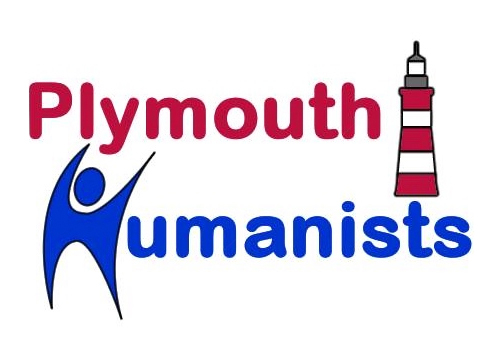

Event Details
Come and join CEMB at Plymouth humanists in a discussion about Islamist Fundamentalism and how it impacts the lives of women.
Event Details
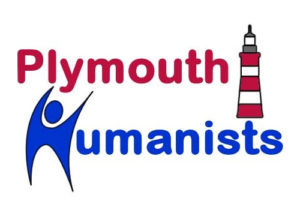

Come and join CEMB at Plymouth humanists in a discussion about Islamist Fundamentalism and how it impacts the lives of women.
Time
(Tuesday) 7:30 pm - 9:30 pm
Organizer


Event Details
6 March 2018, Evening with Houzan Mahmoud to celebrate International Women’s Day, central London by Kings Cross, 6:30-8:30pm PLEASE NOTE: This is our regular space for our monthly meet-ups; if
Event Details
6 March 2018, Evening with Houzan Mahmoud to celebrate International Women’s Day, central London by Kings Cross, 6:30-8:30pm
PLEASE NOTE: This is our regular space for our monthly meet-ups; if you would like to attend, please email exmuslimcouncil@gmail.com to register and receive further information. If you already know the location, just show up.
Suggested donation: £3 waged; £1 unwaged.
Biography:
Houzan Mahmoud is a women’s rights campaigner, public lecturer and co-founder of Culture Project, a transnational project formed recently to raise awareness about feminism and gender in Kurdistan and diaspora. She has an MA in Gender Studies from SOAS, London University. She worked as a representative of the Organisation of Women’s Freedom in Iraq for many years. She was born in Iraqi Kurdistan in 1973 and currently resides and works in London. Her articles have been published in The Independent, The Guardian, The Tribune, The New Statesman and others. Houzan has led many campaigns internationally, including campaigns against the rape and abduction of women in Iraq, and against the imposition of Islamic sharia law in Kurdistan and the Iraqi constitution. She has also led other campaigns against so called honour killings, and against violations of freedom of expression. She is the winner of 2016 Emma Humphrey’s Memorial Award.
more
Time
(Tuesday) 6:30 pm - 8:30 pm
Location
See post
address
2018sun04mar11:30 amsun5:00 pmMarch4Women - 4th March 201811:30 am - 5:00 pm address
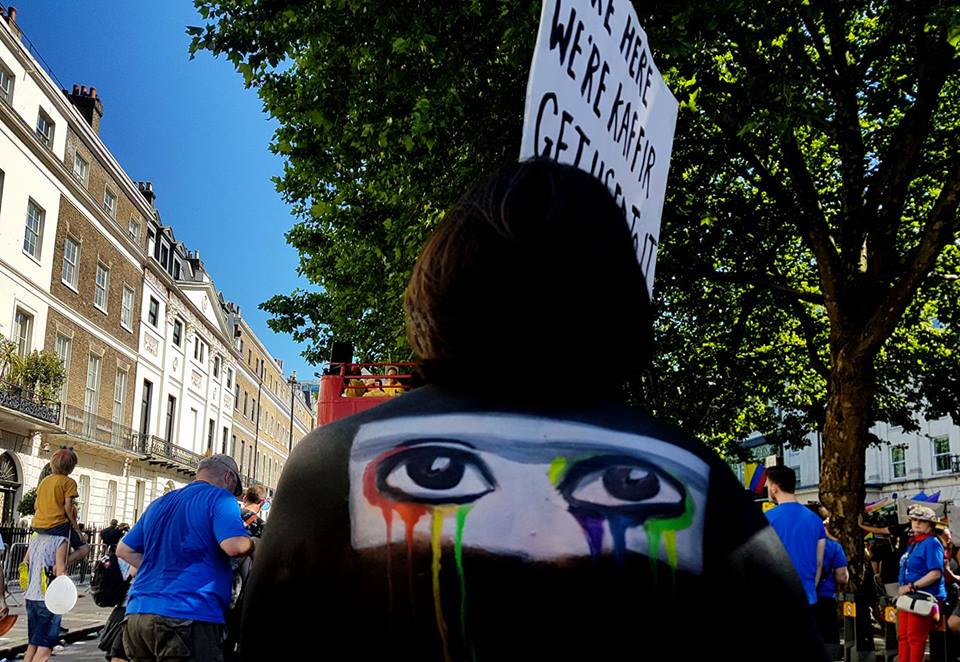

Event Details
Hello On Sunday 4th March 2018 Council of Ex-Muslims of Britain are going to be joining the , organised by international development charity Care International
Event Details
Hello
On Sunday 4th March 2018 Council of Ex-Muslims of Britain are going to be joining the , organised by international development charity Care International UK, ahead of International Women’s Day. We would love it if you could join us on the march. The aims of the march:
- Equal rights for people of all genders
- The right to speak out and be heard
- The right to work free of harassment and abuse
- The right of every woman and girl around the world to live, learn and earn with safety, dignity and respect
This is a march for people of all genders, adults and children.
What’s more, we will also be using the march as an opportunity to show our support for the brave women of Iran who are currently protesting the country’s the mandatory hijab laws. We wish to show solidarity with these brave women as well as encourage other groups to support the women of Iran. This is a great opportunity to bring this issue to the attention of the wider public. Please feel free to bring a white scarf on a stick, to hold up in solidarity.
Please see this report by Amnesty International for more details about compulsory veiling protests in Iran, and the mistreatment of protesters:
We will meet at 11.30am at the Monument to Emmeline Pankhurst. We will join the main march at 11.50, which starts at midday at Millbank. We will have some scarves on sticks and banners to give out, please feel free to bring your own. If you are running late and need to find the group on the march you can call Hana on 07740049689.
To be part of the March4Women, you need to register with Care International. You can do so at the address below:
https://www.careinternational. org.uk/march4women
You can find out more about the March4Women here:
https://www.careinternational. org.uk/march4women/map-and- timetable
https://www.careinternational. org.uk/march4women/ march4women-faqs
Hope to see you there.
Best wishes,
Sadia Hameed and the Council of Ex-Muslims of Britain
more
Time
(Sunday) 11:30 am - 5:00 pm
Location
See post
address
april 2018
2018thu19apr7:00 pmthu12:00 amFEMEN 10th Anniversary: Riot Party7:00 pm - 12:00 am address
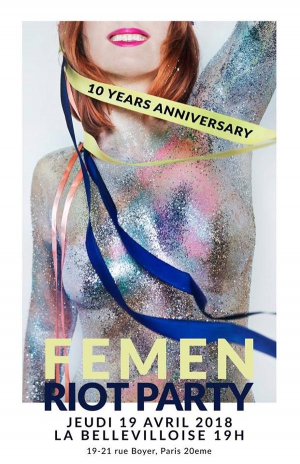

Event Details
19 April 2018, 7pm-1am La Bellevilloise 19-21 Rue Boyer 75020 Paris Maryam Namazie will speak at Femen’s 10th Anniversary: Riot Party in Paris. To get free tickets.
Event Details
19 April 2018, 7pm-1am
La Bellevilloise
19-21 Rue Boyer
75020 Paris
Maryam Namazie will speak at Femen’s 10th Anniversary: Riot Party in Paris. To get free tickets.
Time
(Thursday) 7:00 pm - 12:00 am
Location
See post
address
2018tue17apr6:30 pmtue8:30 pmSpring Coming Out Party, London6:30 pm - 8:30 pm address
Event Details
17th April 2018 – Spring Coming out Party, central London by Kings Cross, 6:30-8:30pm PLEASE NOTE: This is our regular space for our monthly meet-ups; if you would like to
Event Details
17th April 2018 – Spring Coming out Party, central London by Kings Cross, 6:30-8:30pm
PLEASE NOTE: This is our regular space for our monthly meet-ups; if you would like to attend, please email exmuslimcouncil@gmail.com to register and receive further information. If you already know the location, just show up. If you would like to “come out” at this event, and receive a certificate, please email Sadia at exmuslimcouncil@gmail.com.
Suggested donation: £3 waged; £1 unwaged.
Time
(Tuesday) 6:30 pm - 8:30 pm
Location
See post
address
2018wed04apr6:00 pmwed8:00 pmMonthly Support Group6:00 pm - 8:00 pm address























Event Details
Join us for our monthly support group, to talk about issues that still effect us after leaving Islam. If you would like to come along, please email Sadia on ExMuslim.council@gmail.com for details
Event Details
Join us for our monthly support group, to talk about issues that still effect us after leaving Islam.
If you would like to come along, please email Sadia on ExMuslim.council@gmail.com for details of the venue, as it will be different every time.
Time
(Wednesday) 6:00 pm - 8:00 pm
Location
See post
address
may 2018
2018thu31may6:30 pmCEMB swimming lesson6:30 pm address


Event Details
Date: 31st May 2018 Meet at 6.30pm in reception of the pool – please contact us for full address of the venue Bring: towel, swim suit, shower gel and shampoo,
Event Details
Date: 31st May 2018
Meet at 6.30pm in reception of the pool – please contact us for full address of the venue
Bring: towel, swim suit, shower gel and shampoo, a £1 coin for the lockers, goggles (not essential but you may need to have them as some of the games will involve picking things up off the bottom of the pool). If you can’t swim and you want to bring a buoyancy aid, float or arm bands that’s fine too.
Don’t eat for an hour before going in the water
more
Time
(Thursday) 6:30 pm
Location
See post
address





Event Details
An evening with Lawyer Ana Gonzalez on Apostasy and Asylum Tuesday 29 May 2018, 6:00pm-8:00pm, central London by Kings Cross Evening with lawyer Ana González on apostasy and asylum Ana will
Event Details
An evening with Lawyer Ana Gonzalez on Apostasy and Asylum
Tuesday 29 May 2018, 6:00pm-8:00pm, central London by Kings Cross
Evening with lawyer Ana González on apostasy and asylum
Ana will go through asylum procedures and also provide one-on-one advice during the evening.
PLEASE NOTE: If you would like to attend, please email exmuslimcouncil@gmail.com to register and receive further information.
Suggested donation: £3 waged; £1 unwaged.
Biography:
Ana Gonzalez was born in Spain and graduated in Employment Law at the University of La Coruna. She moved to the UK in 1994 and qualified as a solicitor in 2003.
Ana became a partner at Wilson Solicitors LLP in 2010.
Having trained in asylum, nationality and public law, she now practises in immigration and asylum work, and has interests in human rights and European Law. Ana is an internationally recognised expert in gender and sexuality-based asylum claims as well as having extensive expertise in representing victims of human trafficking.
Ana is praised in Chambers and Partners for her “constant attention to cases, leading client care and real knowledge of the law.” She “continues to stand out for significant work on human trafficking cases, often raising new country guidance points” (2012). “She is a stand-out practitioner in the field of refugee law, with particular expertise in trafficking cases” (2014). She “is very experienced, passionate and has very good judgement.” (2016)
She practises in all aspects of immigration and asylum work, and has a specialist interest in European law.
Ana has been with Wilson since 1999. Prior to joining us Ana was at the well respected Refugee Legal Centre. She has been a guest speaker at the London School of Economics and is currently involved in the ILPA asylum sub-committee group.
Ana has been featured in the New Statesman for her excellent work.
She has been instrumental in supporting asylum cases of those deemed “apostates” from Islam.
more
Time
(Tuesday) 6:00 pm - 8:00 pm
Location
See post
address


Event Details
22 May 2018, Brussels Seminar at European Parliament on Fundamentalism & Neo-Liberalism in Europe: Their Collusion and Impact on Women’s Rights and Ethnic Minorities Rights
Event Details
22 May 2018, Brussels
Seminar at European Parliament on Fundamentalism & Neo-Liberalism in Europe: Their Collusion and Impact on Women’s Rights and Ethnic Minorities Rights
Time
22 (Tuesday) 9:00 am - 23 (Wednesday) 12:00 pm
Location
See post
address
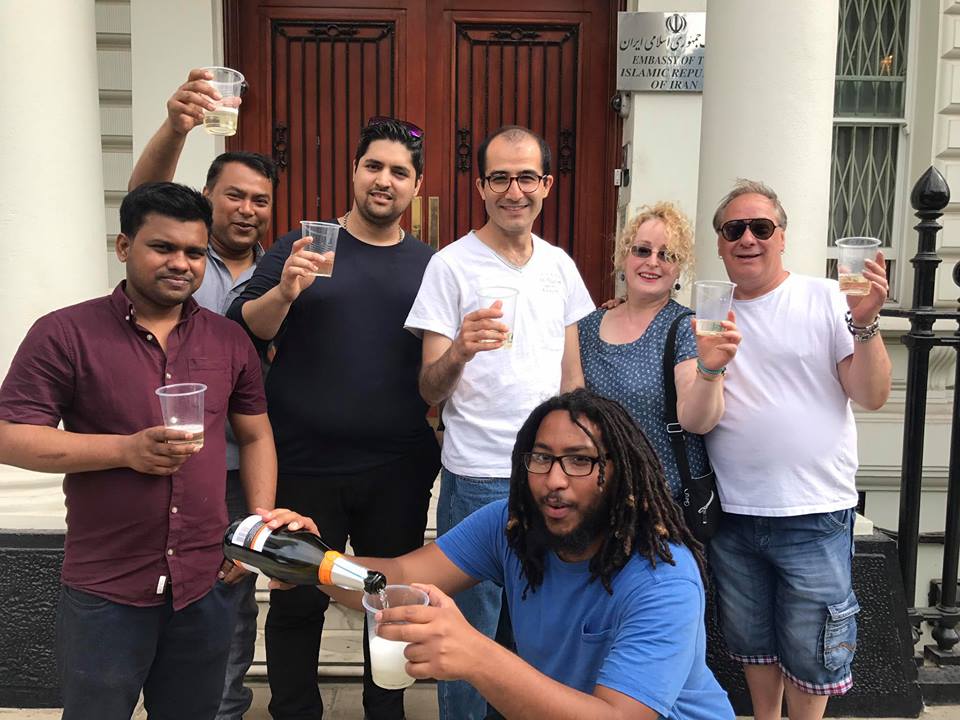

Event Details
18 May 2018, London Fast-defying Protest in solidarity with those persecuted during Ramadan Meet at 12 noon at Saudi Embassy,30 Charles St, Mayfair, London W1J 5DZ The nearest tube station
Event Details
18 May 2018, London
Fast-defying Protest in solidarity with those persecuted during Ramadan
Meet at 12 noon at Saudi Embassy,30 Charles St, Mayfair, London W1J 5DZ
The nearest tube station is: Green Park
Time
(Friday) 12:00 pm - 2:00 pm
Location
See post
address
2018fri04mayAll Daysun06Giornate Della Laicità 2018, Reggio Emilia, Italy(All Day) address


Event Details
4-6 May 2018 Maryam Namazie will be speaking at Giornate Della Laicità 2018, organised by Iniziativa Laica in Reggio Emilia, Italy For more details click here.
Event Details
4-6 May 2018
Maryam Namazie will be speaking at Giornate Della Laicità 2018, organised by Iniziativa Laica in Reggio Emilia, Italy
For more details click here.
Time
may 4 (Friday) - 6 (Sunday)
Location
See post
address
2018tue01may6:00 pmtue8:00 pmMonthly Support Group6:00 pm - 8:00 pm address























Event Details
Join us for our monthly support group, to talk about issues that still effect us after leaving Islam. If you would like to come along, please email Sadia on ExMuslim.council@gmail.com for details
Event Details
Join us for our monthly support group, to talk about issues that still effect us after leaving Islam.
If you would like to come along, please email Sadia on ExMuslim.council@gmail.com for details of the venue, as it will be different every time.
Time
(Tuesday) 6:00 pm - 8:00 pm
Location
See post
address
june 2018
2018sat23junAll Day2018 Muslimish Conference(All Day: saturday) address


Event Details
23 June 2018, NYC 2018 Muslimish Conference
Event Details
23 June 2018, NYC
2018 Muslimish Conference
Time
All Day (Saturday)
Location
See post
address
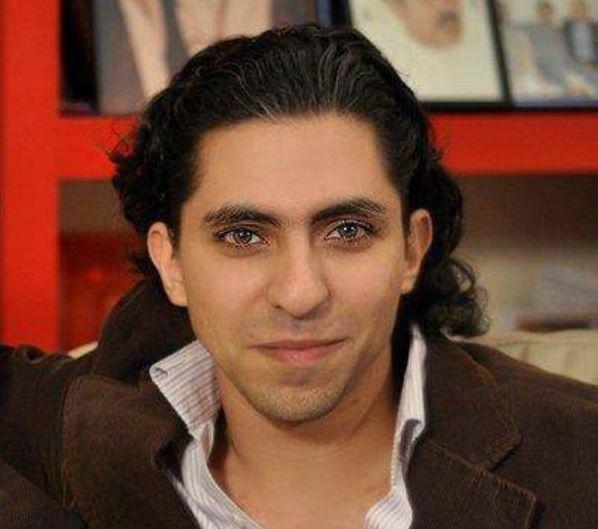

Event Details
This month marks six years blogger Raif Badawi organised a conference to mark ‘a day of liberalism’ in his native Saudi Arabia. The conference, which was to have taken place
Event Details
This month marks six years blogger Raif Badawi organised a conference to mark ‘a day of liberalism’ in his native Saudi Arabia. The conference, which was to have taken place in Jeddah on 7 May 2012, was banned by the authorities. Raif was arrested shortly afterwards, on 17 June 2012. Two years later, on 7 May 2014, he was sentenced to ten years in prison and 1,000 lashes. Four years on, he remains in prison with the threat of further lashings looming large.
Join our upcoming vigils on Friday 18 May (9-10am) and Monday 18 June (1-2pm) to continue calls for Raif Badawi’s immediate and unconditional release.
We will also be continuing our calls for the release of award-winning human rights defender Waleed Abulkhair – also Raif’s lawyer – who is serving 15 years in prison for ‘undermining the regime and officials’, ‘inflaming public opinion’, and ‘distorting the kingdom’s reputation’ and of Palestinian poet and artist Ashraf Fayadh, currently serving eight years in prison in Saudi Arabia and facing the threat of 800 lashes.
Activists are asked to meet at the Curzon Street entrance to the Embassy. (note: the postal address of the Embassy is 30-32 Charles Street, Mayfair, London).
#FreeRaif #FreeWaleed #FreeAshraf #SaudiArabia
https://www.englishpen.org/event/vigil-imprisoned-writers-saudi-arabia-2/
more
Time
(Monday) 9:00 am - 2:00 pm
Location
See post
address
2018sat16jun2:00 pmsat4:00 pmCEMB social - meet and eat2:00 pm - 4:00 pm address







Event Details
Please join us at Camden Market for our meet and eat. We will be meeting outside Camden tube station at 2pm and heading towards the lock where we all buy whatever
Event Details
Please join us at Camden Market for our meet and eat.
We will be meeting outside Camden tube station at 2pm and heading towards the lock where we all buy whatever we want to eat and have a natter.
Time
(Saturday) 2:00 pm - 4:00 pm
Location
See post
address
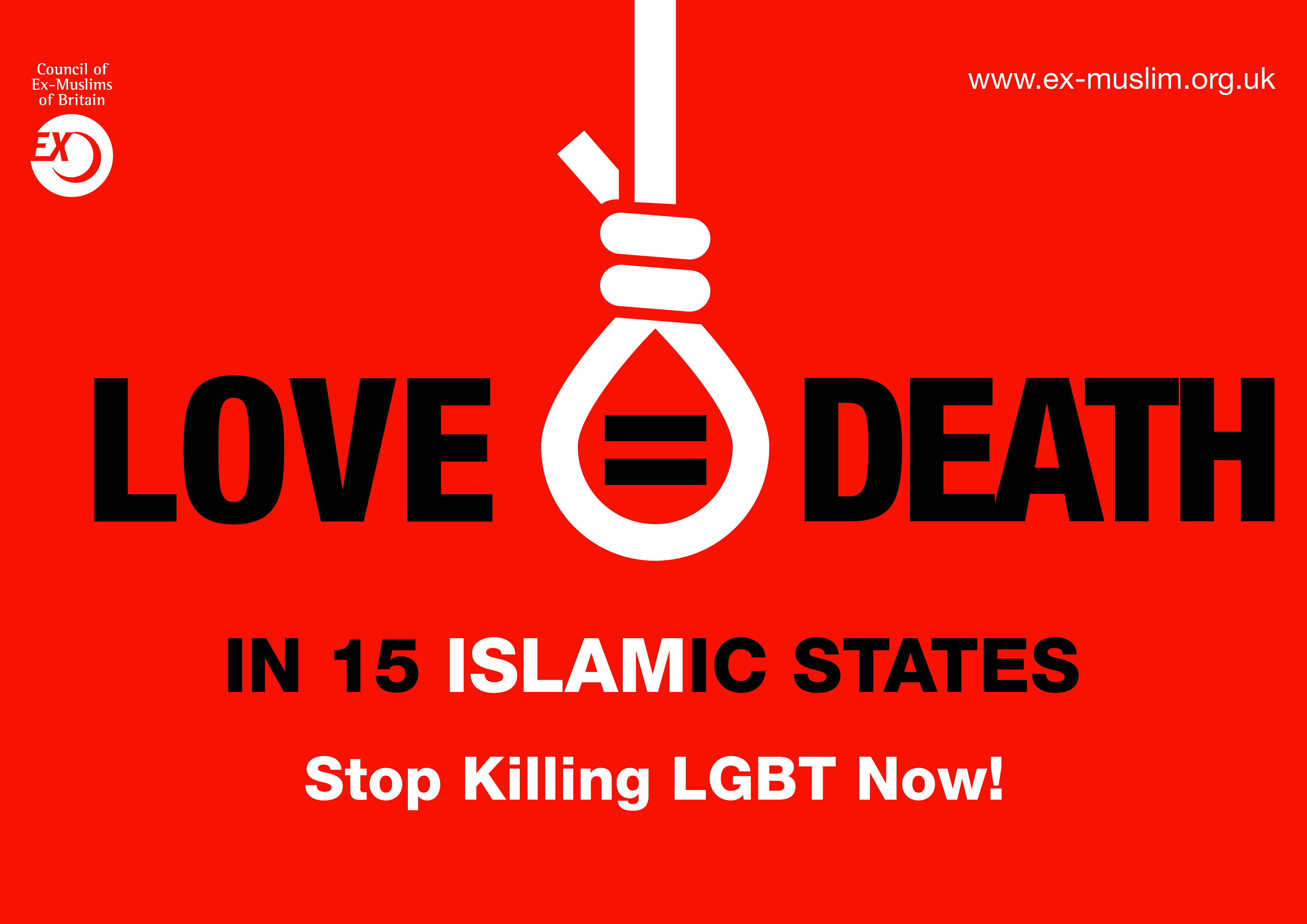


Event Details
Council of Ex-Muslims of Britain (CEMB) is organising a screening of the film, Islam’s Non-Believers, by award-winning filmmaker Deeyah Khan on 14th June, from 6:00-9:00pm, as part of
Event Details
Council of Ex-Muslims of Britain (CEMB) is organising a screening of the film, Islam’s Non-Believers, by award-winning filmmaker Deeyah Khan on 14th June, from 6:00-9:00pm, as part of London Pride Festival to raise awareness amongst those who are unfamiliar with CEMB & the ex-Muslim movement.
The screening will be followed by a panel discussion and Q&A on LGBT Rights, Apostasy and Blasphemy. Imaan, Mend, East London Mosque, Pride and Pink News have been invited to join the discussion.
Confirmed Speakers:
Jimmy Bangash, LGBT Activist
Matthew Mahmood-Ogston, Founder & Trustee of Naz and Matt Foundation
Sadia Hameed, Spokesperson of Council of Ex-Muslims of Britain
Syed Isteak Hossain Shawon, LGBT activist from Bangladesh and Editor of Boys Love World
The panel discussion will be chaired by Gita Sahgal, Chair of Centre for Secular Space.
The format of the evening is as follows:
6:00pm – Welcoming guests
6:30pm – Screening of Islam’s Non-belivers
7:15pm – Break for drinks
7:30pm – Panel Discussion
9:00pm – Finish
The venue location will be given to ticket holders closer to the date of the event. Please note that tickets cannot be bought at the door and must be purchased prior to the event.
For more information, please contact exmuslimcouncil@gmail.com.
Biographies
Deeyah Khan is a critically acclaimed music producer and Emmy and Peabody award-winning documentary film director. She was born in Norway to immigrant parents of Pashtun and Punjabi ancestry. Her 2012 multi-award winning documentary “Banaz: A Love Story” chronicles the “honour killing” of a young British Kurdish woman killed in 2006 in London. Deeyah’s second film the Bafta-nominated “Jihad” involved two years of interviews and filming with Islamic extremists, convicted terrorists and former jihadis. Her third film is on ex-Muslims, called “Islam’s Non Believers”. She has also received several awards for her work supporting freedom of expression, human rights and peace, including the Ossietzky prize by Norwegian PEN and the University of Oslo’s Human Rights Award. She received the 2016 Peer Gynt Prize from the Parliament of Norway. Deeyah is also the CEO of Fuuse. One of the most recent Fuuse initiatives is “sister-hood”, a digital magazine and a series of live events spotlighting the voices of women of Muslim heritage.
Gita Sahgal is a writer, journalist, film-maker and rights activist. She is currently Founder and Director of Centre for Secular Space. She was formerly Head of the Gender Unit at Amnesty International; she was suspended in 2010 after she was quoted criticising Amnesty for its high-profile associations with the Islamist Moazzam Begg, the director of a group called Cageprisoners. For many years she served on the board of Southall Black Sisters and was a founder of Women Against Fundamentalism and Awaaz: South Asia Watch. With Nira Yival Davis, she edited “Refusing Holy Orders: Women and Fundamentalism in Britain” ( London, 1992). Among her articles are “Legislating Utopia? Violence Against Women, Identities and Interventions” in “The Situated Politics of Belonging”. During the 1980s, she worked for a Black current affairs programme called “Bandung File” on Channel 4 TV. She made two films about the Rushdie affair, “Hullaballoo Over Satanic Verses” and “Struggle or Submission”. She has also made two programmes for Dispatches Channel 4, “The Provoked Wife” on the case of Kiranjit Ahluwalia and “The War Crimes File” an investigation into allegations of war crimes committed by members of the Jamaat i Islami in Bangladesh in 1971.
Jimmy Bangash is a gay British ex-Muslim Pakistani living in the UK. He grew up in a traditional Pashtun family in London where he struggled with both the homophobia and ardent misogyny within his community. He has written poems and prose about these experiences; many of which have been published on Sedaa. As an LGBT ex-Muslim activist, he is committed to unbridling the reins of patriarchy on gays and women of Muslim heritage. As a coach, he seeks to empower those individuals liberated from problematic ideologies to live a life of authenticity, self-assurance and self-expression.
Matthew Mahmood-Ogston is Founder & Trustee of Naz and Matt Foundation. In 2001, soon after coming out to himself, Matt met his soulmate Naz in a nightclub in Birmingham. Naz was 21, Matt was 23. They quickly fell in love and ran away to London to be themselves and escape the intense pressures of not being out to family. They had to keep their relationship a secret for fear of what might happen if they were found out. After 13 years together and engaged to be married, Naz (Dr Nazim Mahmood) sadly took his own life, just two days after being confronted about his sexuality by his deeply religious family during Eid. It was the first time they had heard that their son was gay, in a long term relationship with another man, in love, and planning to get married. Their solution was to tell Naz that he needed to see a psychiatrist to be ‘cured’ for being gay. For ‘shame’ not to be brought on the family. In memory of Naz, Matt set up “Naz and Matt Foundation”, a registered charity that tackles religious and cultural homophobia. The organisation helps families learn how to accept their LGBTQI+ children for who they really are – for who they were born to be. The Foundation’s mission is to “Never let religion, any religion, come in the way of the unconditional love between parents and their children.”
Sadia Hameed is a Spokesperson of the Council of Ex-Muslims of Britain and has been featured in a 2016 film, “Islam’s Non Believers”, by award-winning filmmaker Deeyah Khan. She is also a human rights activist and Honour Based Violence, Forced Marriage and FGM Consultant, based in Gloucestershire, working in the sexual violence field, with a focus on Black Minority Ethnic women. Sadia organised a hugely successful event titled ‘Let’s Talk Honour’ in October 2016, which was held at Gloucester University. She also launched Critical Sisters. She is Winner of IKWRO Special Recognition: Activist of the Year 2017.
Syed Isteak Hossain Shawon is an LGBT activist from Bangladesh and Editor of Boys Love World, which has been established in 2011 as an online Magazine for Bangladeshi LGBT Activists. The mission of the Boys Love World is to advocate and defend LGBT community and its members. Bangladeshi LGBT rights activists and bloggers from different country contributes to Boys Love World with their quality writings and engages with the readers. Boys Love World has many readers not only in Bangladesh but around the world. Our main aim is to educate mass people about LGBT community and cultivating a sentiment in favour of equality and diversity to create a safe environment where LGBT people can promote and explore their culture and work in the interests of the public benefit to remove any social exclusion. We achieve our aims and objectives by holding various events, workshops and seminars throughout the year.
more
Time
(Thursday) 6:00 pm - 9:00 pm
Location
See post
address
Organizer
2018tue05jun6:00 pmtue8:00 pmMonthly Support Group6:00 pm - 8:00 pm address Event Organized ByCEMB























Event Details
Join us for our monthly support group, to talk about issues that still affect us after leaving Islam. If you would like to come along, please email Sadia on sadia.hameed@council-of-ex-muslims-of-britain-e5a565.ingress-baronn.ewp.live
Event Details
Join us for our monthly support group, to talk about issues that still affect us after leaving Islam.
If you would like to come along, please email Sadia on sadia.hameed@council-of-ex-muslims-of-britain-e5a565.ingress-baronn.ewp.live for details of the venue, as it will be different every time.
Time
(Tuesday) 6:00 pm - 8:00 pm
Location
See post
address
Organizer
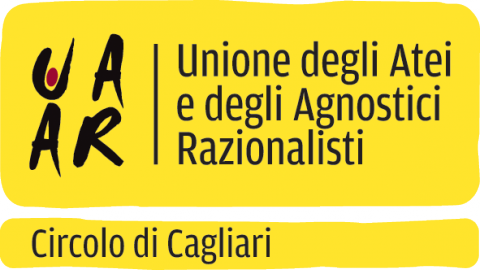

Event Details
2 June 2018, Cagliari, Italy UAAR Cagliari – Public debate on state secularism and civil rights More details here.
Event Details
2 June 2018, Cagliari, Italy
UAAR Cagliari – Public debate on state secularism and civil rights
Time
All Day (Saturday)
Location
See post
address
july 2018
2018tue24jul6:00 pmtue8:00 pmMeet up with Hassan Radwan - 24th July at 6pm6:00 pm - 8:00 pm address


Event Details
Join us for an evening with Ex Muslim Hassan Radwan, who will be sharing his story with our members. Hassan founded the Agnostic Muslims & Friends group on Facebook and runs the blog Agnostic
Event Details
Join us for an evening with Ex Muslim Hassan Radwan, who will be sharing his story with our members.
Hassan founded the Agnostic Muslims & Friends group on Facebook and runs the blog Agnostic Muslim Khutbahs. He spent 15 years as a teacher at the Islamia primary school in London and has written four books for Muslim children.
To find out more about Hassan, watch his story at: https://www.youtube.com/watch?v=wsrEjfNmJ_g
Please contact us for details about the venue.
Entry: Waged £3 Unwaged: £1
more
Time
(Tuesday) 6:00 pm - 8:00 pm
Location
See post
address


Event Details
Join us for a fun day out at Thorpe Park Meeting at the gates at 10:30 AM. Getting there: Get a train from Waterloo station to Staines From Staines, get the 950 express bus
Event Details
Join us for a fun day out at Thorpe Park
Meeting at the gates at 10:30 AM.
Getting there:
Get a train from Waterloo station to Staines
From Staines, get the 950 express bus to Thorpe Park
The bus goes from Staines station every 15-20 minutes.
Please be on time or you will be left behind!
If you are on a low income, please get in touch in advance and CEMB may be able to contribute towards your entry.
Time
(Saturday) 10:30 am - 5:00 pm
Organizer
2018tue03jul6:00 pmtue8:00 pmMonthly Support Group6:00 pm - 8:00 pm address Event Organized ByCEMB























Event Details
Join us for our monthly support group, to talk about issues that still affect us after leaving Islam. If you would like to come along, please email Sadia on sadia.hameed@council-of-ex-muslims-of-britain-e5a565.ingress-baronn.ewp.live
Event Details
Join us for our monthly support group, to talk about issues that still affect us after leaving Islam.
If you would like to come along, please email Sadia on sadia.hameed@council-of-ex-muslims-of-britain-e5a565.ingress-baronn.ewp.live for details of the venue, as it will be different every time.
Time
(Tuesday) 6:00 pm - 8:00 pm
Location
See post
address
Organizer
august 2018



Event Details
Join us for a meet up with CEMB spokesperson Imad Iddine Habib to explore the Similarities between Islamists and the Far-Right. Imad is a Moroccan atheist threatened for his atheism. He
Event Details
Join us for a meet up with CEMB spokesperson Imad Iddine Habib to explore the Similarities between Islamists and the Far-Right.
Imad is a Moroccan atheist threatened for his atheism. He is founder of the Council of Ex-Muslims of Morocco, the first public atheist organisation in a country with Islam as the state religion and He is currently co-Spokesperson of Council of Ex-Muslims of Britain.
Please contact us for details about the venue.
Entry: Waged £3 Unwaged: £1
Time
(Tuesday) 6:00 pm - 8:00 pm
Location
See post
address
2018tue21aug5:00 pmtue9:00 pmBring and Share Heathen Veggie Eid Party5:00 pm - 9:00 pm address


Event Details
Join us to take the Islam and sacrificial elements out of Eid. At CEMB, we don’t believe in Islam, or sacrificing poor animals to fictitious characters in the sky, but we
Event Details
Join us to take the Islam and sacrificial elements out of Eid.
At CEMB, we don’t believe in Islam, or sacrificing poor animals to fictitious characters in the sky, but we love a celebration! Come and join us to celebrate Eid, the Heathenway!
Bring something delicious to share with other attending heathens, you don’t have to cook if you don’t have the time, buy something yummy and come and party with us.
For more information, email us at: Sadia.Hameed@Ex-muslim.org.uk
Time
(Tuesday) 5:00 pm - 9:00 pm
Location
See post
address
2018sat18aug2:00 pmsat4:00 pmCEMB social - Meet and Eat2:00 pm - 4:00 pm address







Event Details
Please join us at Camden Market for our meet and eat. We will be meeting outside Camden tube station at 2pm and heading towards the lock where we all buy whatever
Event Details
Please join us at Camden Market for our meet and eat.
We will be meeting outside Camden tube station at 2pm and heading towards the lock where we all buy whatever we want to eat and have a natter.
Time
(Saturday) 2:00 pm - 4:00 pm
Location
See post
address
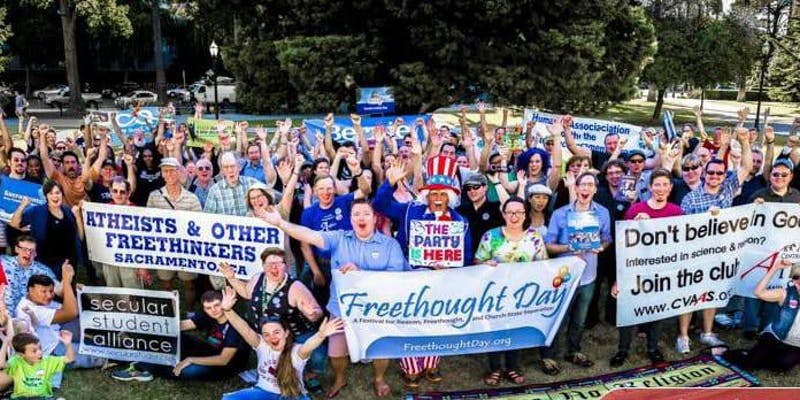

Event Details
Festival of Reason & Freethought 2018 (For Ex-Believers & Non-Believers) – 11th August This event is a celebration of Reason and Freethought. The aim is for people of the ex-believing, non-believing
Event Details
Festival of Reason & Freethought 2018 (For Ex-Believers & Non-Believers) – 11th August
This event is a celebration of Reason and Freethought. The aim is for people of the ex-believing, non-believing and freethinking world to get together and celebrate Atheism, Humanism, free-thought, reason, scepticism and Enlightenment values. A time to contemplate being an ex-believer or a non-believer in a world that is still predominantly superstitious.
Speakers:
Clive Aruede – an African Ex-Christian and Founder of London Black Atheists
Andrew Copson – Chief Executive, Humanists UK
A C Grayling – Professor of Philosophy
Imtiaz Shams – of Faith to Faithless
Jimmy Bangash – LGBT Ex-Muslim of The CEMB: Council of Ex-Muslims of Britain
Sadia Hameed – Spokesperson for The CEMB: Council of Ex-Muslims of Britain
Stells Dessoy – an Ex-Catholic and a Humanist
Terri O’Sullivan – an Ex-Jehovah’s Witness
Ste Richardsson – an LGBT Ex-Jehovah’s Witness
Imad Iddine Habib – a Black African Ex-Muslim
Mwahamadu – a Black Caribbean Ex-Muslim, leading the masked members of London Black Atheists, (masked due to fear of being ‘outed’ as atheists).
MCs:
Tavian Oladapo – an African Ex-Christian
Ste Richardsson – an LGBT Ex-Jehovah’s Witness
(NOTE: Red Lion Square Gardens is opposite Conway Hall: nearest station, Holborn)
Get your tickets now at: https://www.eventbrite.co.uk/e/festival-of-reason-freethought-2018-for-ex-believers-non-believers-tickets-48015662138
more
Time
(Saturday) 2:00 pm - 6:00 pm
Location
See post
address
2018tue07aug6:00 pmtue8:00 pmMonthly Support Group6:00 pm - 8:00 pm address Event Organized ByCEMB























Event Details
Join us for our monthly support group, to talk about issues that still affect us after leaving Islam. If you would like to come along, please email Sadia on sadia.hameed@council-of-ex-muslims-of-britain-e5a565.ingress-baronn.ewp.live for
Event Details
Join us for our monthly support group, to talk about issues that still affect us after leaving Islam.
If you would like to come along, please email Sadia on sadia.hameed@council-of-ex-muslims-of-britain-e5a565.ingress-baronn.ewp.live for details of the venue, as it will be different every time.
Time
(Tuesday) 6:00 pm - 8:00 pm
Location
See post
address
Organizer
september 2018
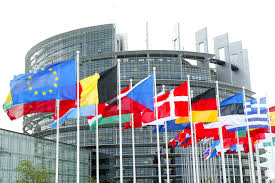

Event Details
25 September 2018, 3-5pm, Brussels Maryam Namazie and Zineb El Rhazoui will speak at the European Parliament in Brussels on “New Media and political communication in the Mediterranean”.
Event Details
25 September 2018, 3-5pm, Brussels
Maryam Namazie and Zineb El Rhazoui will speak at the European Parliament in Brussels on “New Media and political communication in the Mediterranean”.
Time
All Day (Tuesday)
Location
See post
address







Event Details
Please join us at Camden Market for our meet and eat. We will be meeting outside Camden tube station at 2pm and heading towards the lock where we all buy whatever
Event Details
Please join us at Camden Market for our meet and eat.
We will be meeting outside Camden tube station at 2pm and heading towards the lock where we all buy whatever we want to eat and have a natter.
Time
(Saturday) 2:00 pm - 4:00 pm
Location
See post
address
Organizer
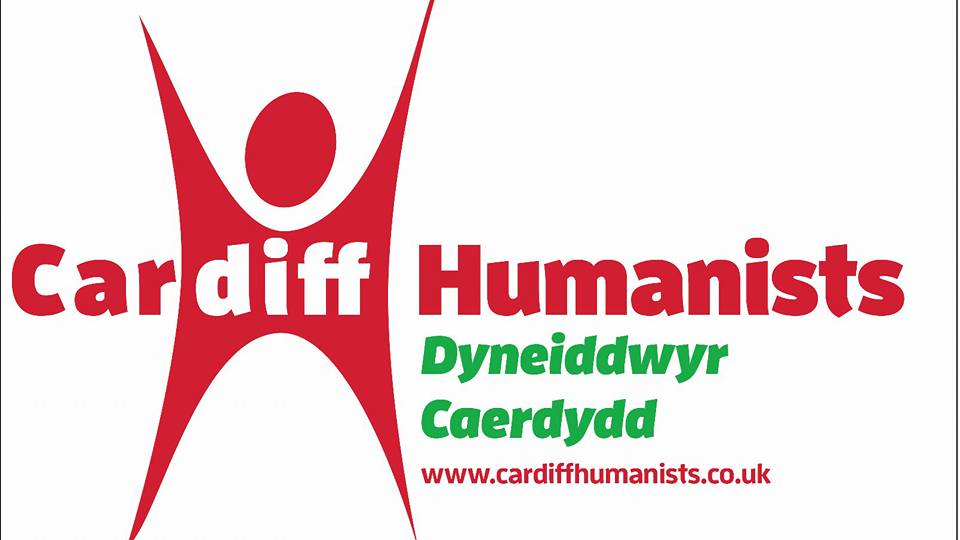

Event Details
Join CEMB at Cardiff humanist to discuss heresy, blasphemy and apostasy since early Islam up to the present day. More information about the event can be found here: https://www.facebook.com/events/2152772681669810/?active_tab=about&__mref=mb
Event Details
Join CEMB at Cardiff humanist to discuss heresy, blasphemy and apostasy since early Islam up to the present day.
More information about the event can be found here: https://www.facebook.com/events/2152772681669810/?active_tab=about&__mref=mb
Time
(Monday) 7:15 pm - 9:30 pm
Location
See post
address
2018tue04sep6:00 pmtue8:00 pmMonthly Support Group6:00 pm - 8:00 pm address Event Organized ByCEMB























Event Details
Join us for our monthly support group, to talk about issues that still affect us after leaving Islam. If you would like to come along, please email Sadia on sadia.hameed@council-of-ex-muslims-of-britain-e5a565.ingress-baronn.ewp.live for
Event Details
Join us for our monthly support group, to talk about issues that still affect us after leaving Islam.
If you would like to come along, please email Sadia on sadia.hameed@council-of-ex-muslims-of-britain-e5a565.ingress-baronn.ewp.live for details of the venue, as it will be different every time.
Time
(Tuesday) 6:00 pm - 8:00 pm
Location
See post
address
Organizer
october 2018
2018sun21oct1:45 pmsun3:15 pmFilia talk - Feminism and Class Struggle1:45 pm - 3:15 pm address





Event Details
BRINGING RACE, CLASS AND SEX BACK TOGETHER Race, class and sex struggles were once joint together, they have been torn apart, as it is far easier to control communities divided. We
Event Details
BRINGING RACE, CLASS AND SEX BACK TOGETHER
Race, class and sex struggles were once joint together, they have been torn apart, as it is far easier to control communities divided.
We will explore how and when these divides began and how we join them together once again.
Get your tickets now at: https://filia.org.uk/tickets/
Time
(Sunday) 1:45 pm - 3:15 pm
Location
See post
address





Event Details
The panel will focus on the rise of religious fundamentalism(s) in Europe, Africa and Middle East, its relation with the concurrent rise of (neo)liberal ideologies and their combined impact on
Event Details
The panel will focus on the rise of religious fundamentalism(s) in Europe, Africa and Middle East, its relation with the concurrent rise of (neo)liberal ideologies and their combined impact on the rights of women & ethnic minorities. From the attack on women’s sexual-reproductive autonomy and re-establishment of “traditional values” by the Catholic, Christian Orthodox and Islamic ideologues, to the appropriation of the feminist language & struggle, we will explore how the two seemingly mutually exclusive movements – one of “tradition” and the other of “modernity”, in fact, work hand in hand, to roll back the universal rights, liberties of women and minority groups.
Book your tickets at: https://filia.org.uk/tickets/
more
Time
(Saturday) 5:45 pm - 7:15 am
Location
See post
address
2018tue16oct6:30 pmtue9:00 pmAutumn Coming Out Party6:30 pm - 9:00 pm address Event Organized ByCEMB
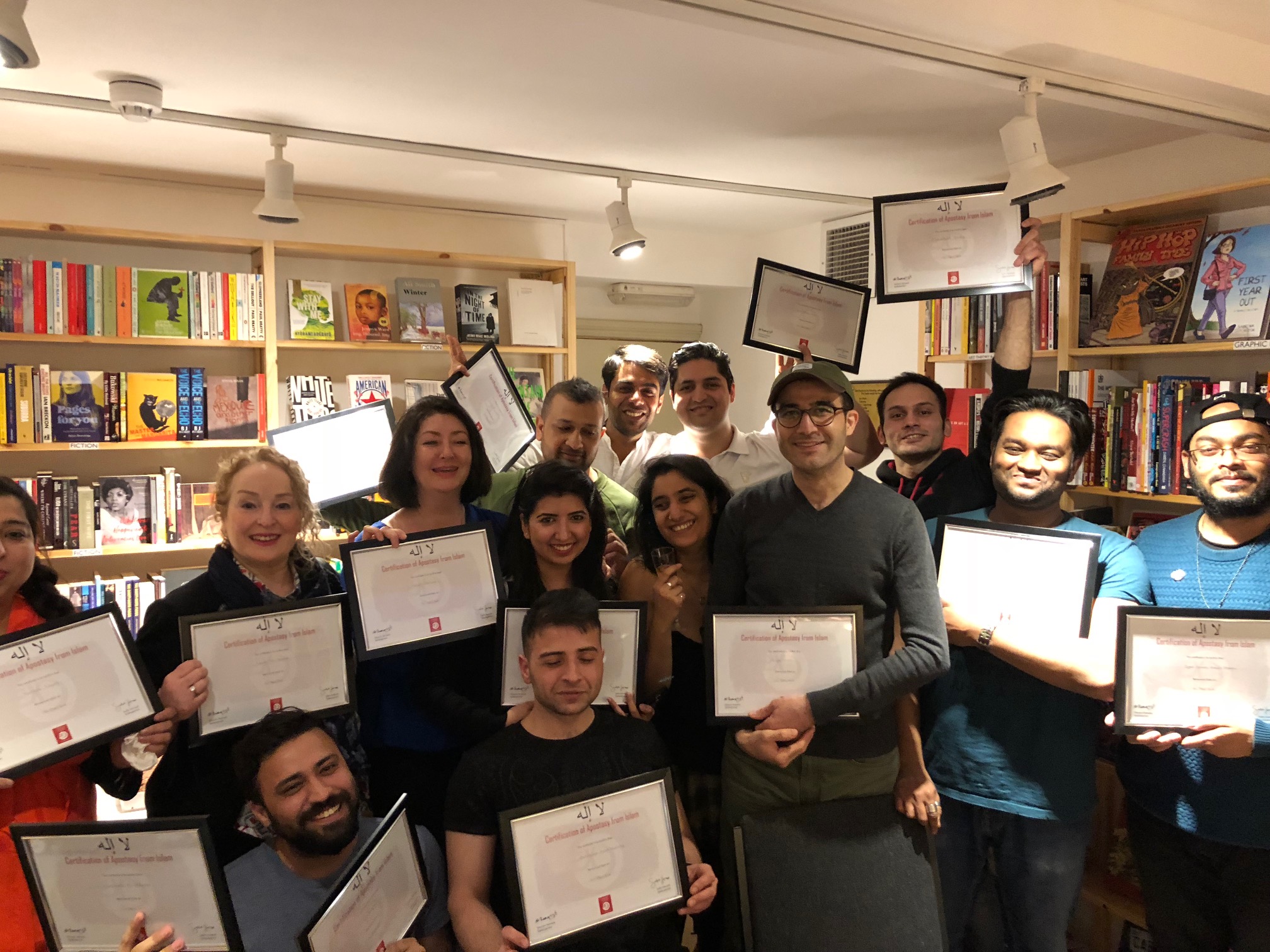

Event Details
Autumn Coming out party If you would like to “come out” at this event, and receive a certificate, please email Sadia at sadia.hameed@council-of-ex-muslims-of-britain-e5a565.ingress-baronn.ewp.live To find out details of the venue, please
Event Details
Autumn Coming out party
If you would like to “come out” at this event, and receive a certificate, please email Sadia at sadia.hameed@council-of-ex-muslims-of-britain-e5a565.ingress-baronn.ewp.live
To find out details of the venue, please contact Sadia at: sadia.hameed@council-of-ex-muslims-of-britain-e5a565.ingress-baronn.ewp.live
Time
(Tuesday) 6:30 pm - 9:00 pm
Location
See post
address
Organizer
2018wed10oct7:00 pmwed10:00 pmBullet Hole By Gloria Williams7:00 pm - 10:00 pm address
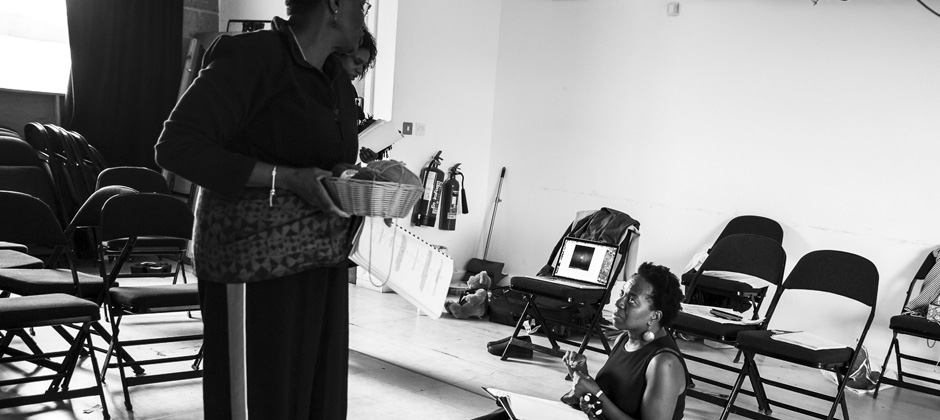

Event Details
Young Cleo was given her ‘gift’ at age seven – except that ‘gift’ left her with type 3 Female Mutilation. How can Cleo love her body, when her husband brutally sexually
Event Details
Young Cleo was given her ‘gift’ at age seven – except that ‘gift’ left her with type 3 Female Mutilation.
How can Cleo love her body, when her husband brutally sexually assaults her? Finding strength after this hideous act, Cleo resolves to go against her family’s wishes and seek reversal surgery. On her journey of healing, Cleo meets Eve, a fellow FGM survivor who is instantly drawn to her. Will Cleo overcome her own struggles, empower Eve to stand against this traditional practice and stop women’s unnecessary suffering? A fight for love, hope and acceptance in a culture where a ‘gift’ can bear the ultimate price.
Shortlisted for the Alfred Fagon Audience Award 2017
more
Time
(Wednesday) 7:00 pm - 10:00 pm
Location
See post
address
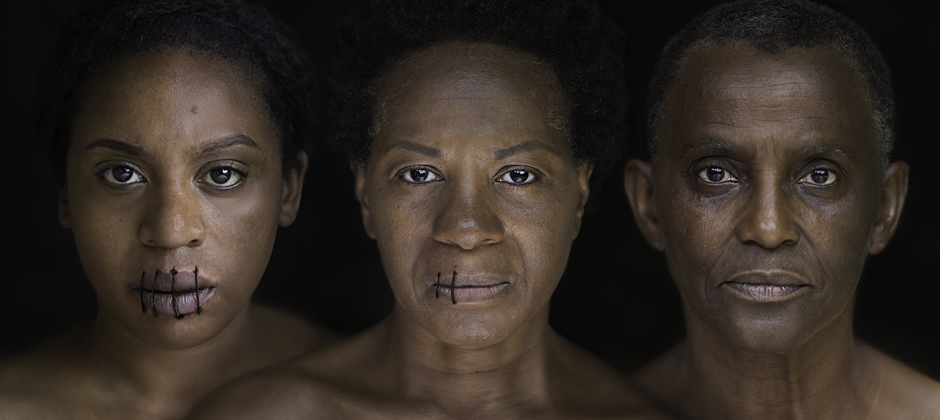

Event Details
This black history month, an all-female team are taking over Park90 with a powerful production, Bullet Hole. Young Londoner Cleo was given her ‘gift’ at age seven – except that ‘gift’ left
Event Details
This black history month, an all-female team are taking over Park90 with a powerful production, Bullet Hole.
Young Londoner Cleo was given her ‘gift’ at age seven – except that ‘gift’ left her with type 3 Female Genital Mutilation.
How can Cleo love her body, when her husband brutally sexually assaults her? Finding strength after this hideous act, Cleo resolves to go against her family’s wishes and seek reversal surgery. On her journey of healing, she meets Eve, a fellow FGM survivor who is instantly drawn to her…
A story of hope, love and human rights played by an all-female cast.
Shortlisted for the Alfred Fagon Audience Award 2017.
This performance is sponsored by the CEMB.
more
Time
(Tuesday) 7:45 pm
Organizer
2018tue02oct6:00 pmtue8:00 pmMonthly Support Group6:00 pm - 8:00 pm address Event Organized ByCEMB























Event Details
Join us for our monthly support group, to talk about issues that still affect us after leaving Islam. If you would like to come along, please email Sadia on sadia.hameed@council-of-ex-muslims-of-britain-e5a565.ingress-baronn.ewp.live
Event Details
Join us for our monthly support group, to talk about issues that still affect us after leaving Islam.
If you would like to come along, please email Sadia on sadia.hameed@council-of-ex-muslims-of-britain-e5a565.ingress-baronn.ewp.live for details of the venue, as it will be different every time.
Time
(Tuesday) 6:00 pm - 8:00 pm
Location
See post
address
Organizer
november 2018
2018sun25novAll DayConference on Sharia, Segregation and Secularism(All Day: sunday) address


Event Details
Sunday 25 November 2018 Conference on Sharia, Segregation and Secularism 9:30am registration for 10:00am start Central London Tickets can be purchased here. Conference venue will be given to ticket
Event Details
Sunday 25 November 2018
Conference on Sharia, Segregation and Secularism
9:30am registration for 10:00am start
Central London
Tickets can be purchased here. Conference venue will be given to ticket holders closer to the date of the event. Please note that tickets cannot be bought at the door and must be purchased prior to the event.
Time
All Day (Sunday)
Location
See post
address
2018tue06nov6:00 pmtue8:00 pmMonthly Support Group6:00 pm - 8:00 pm address Event Organized ByCEMB























Event Details
Join us for our monthly support group, to talk about issues that still affect us after leaving Islam. If you would like to come along, please email Sadia on sadia.hameed@council-of-ex-muslims-of-britain-e5a565.ingress-baronn.ewp.live for details of
Event Details
Join us for our monthly support group, to talk about issues that still affect us after leaving Islam.
If you would like to come along, please email Sadia on sadia.hameed@council-of-ex-muslims-of-britain-e5a565.ingress-baronn.ewp.live for details of the venue, as it will be different every time.
Time
(Tuesday) 6:00 pm - 8:00 pm
Location
See post
address
Organizer
december 2018
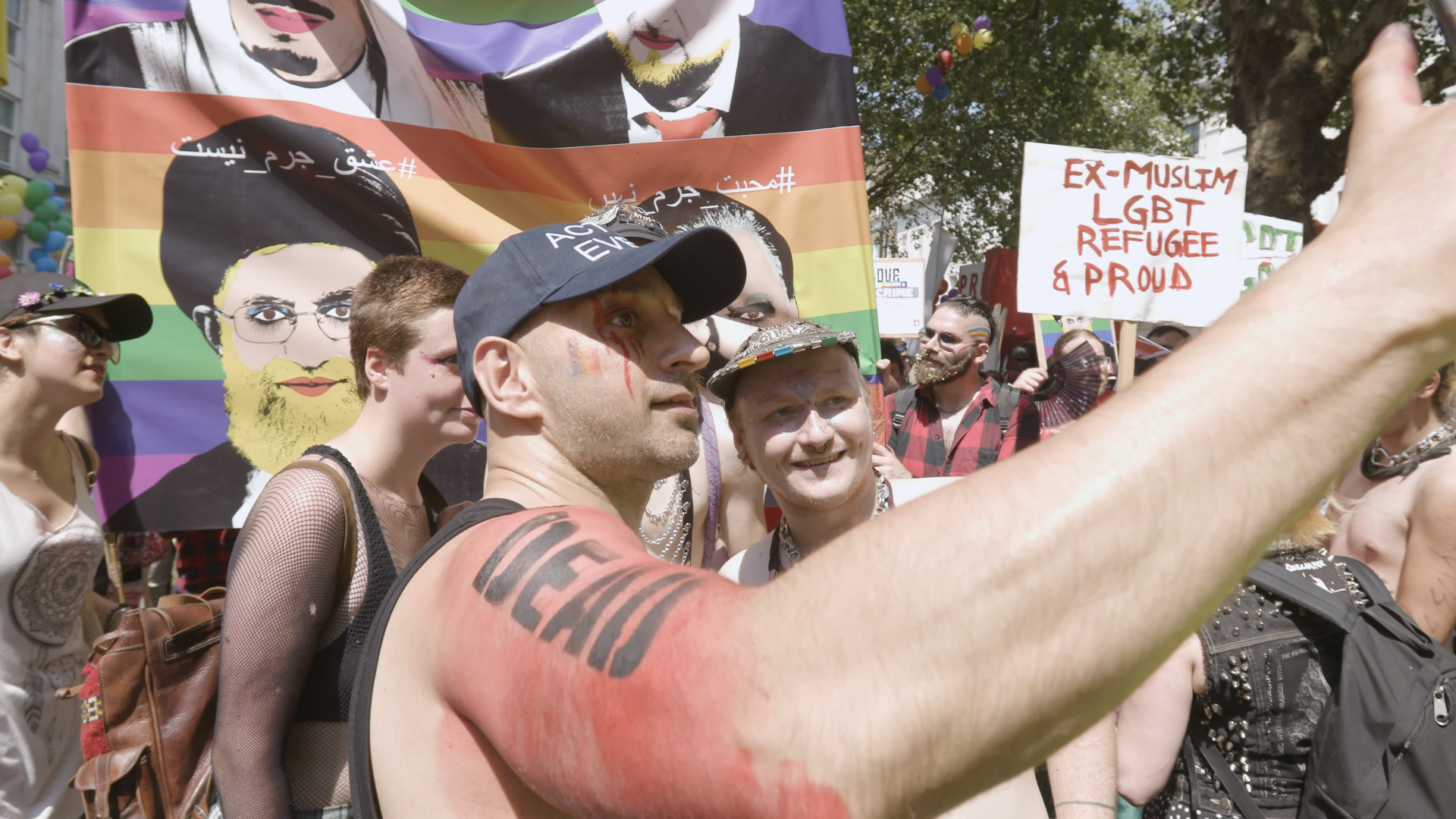

Event Details
Our very own spokesperson Jimmy Bangash will be speaking about the book he contributed to, leaving faith behind on the 6th December. Spaces are
Event Details
Our very own spokesperson Jimmy Bangash will be speaking about the book he contributed to, leaving faith behind on the 6th December.
Spaces are limited, so get your tickets now!
https://humanism.org.uk/events/?page=CiviCRM&q=civicrm%2Fevent%2Finfo&reset=1&id=383
Time
(Thursday) 7:00 pm - 8:30 pm
Location
See post
address
2018tue04dec6:00 pmtue8:00 pmMonthly Support Group6:00 pm - 8:00 pm address Event Organized ByCEMB























Event Details
Join us for our monthly support group, to talk about issues that still affect us after leaving Islam. If you would like to come along, please email Sadia on sadia.hameed@council-of-ex-muslims-of-britain-e5a565.ingress-baronn.ewp.live
Event Details
Join us for our monthly support group, to talk about issues that still affect us after leaving Islam.
If you would like to come along, please email Sadia on sadia.hameed@council-of-ex-muslims-of-britain-e5a565.ingress-baronn.ewp.live for details of the venue, as it will be different every time.
Time
(Tuesday) 6:00 pm - 8:00 pm
Location
See post
address
Organizer
january 2017
2017fri27jan6:00 pmfri9:00 pmLSE Human Rights Society Debate6:00 pm - 9:00 pm address
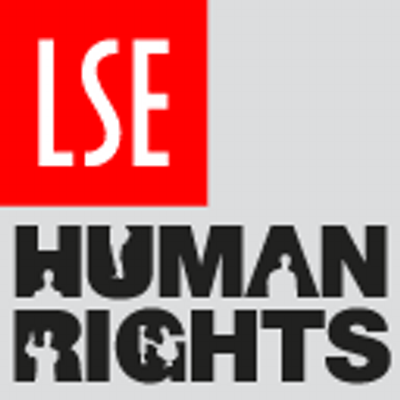

Event Details
Spokesperson Maryam Namazie is speaking on Friday 27 January at a debate on whether human rights and Sharia are compatible. The person she was to debate has pulled out so
Event Details
Spokesperson Maryam Namazie is speaking on Friday 27 January at a debate on whether human rights and Sharia are compatible. The person she was to debate has pulled out so she will now be giving a talk followed by Q&A. The event is organised by LSE Human Rights Society. The University is not allowing the public to attend (London students can attend) due to “security concerns” and is following “special procedures” for this talk – because it is apparently “controversial” to say Sharia and human rights are incompatible.
more
Time
(Friday) 6:00 pm - 9:00 pm
Location
See post
address
february 2017
2017fri24feb8:00 pmfri9:00 pmOxford Brookes University8:00 pm - 9:00 pm address


Event Details
24 February 2017 Sadia Hameed will speak at Oxford Brookes University to speak about The Soft Racism of Low Expectations at event organised by Quilliam Society during the One World
Event Details
24 February 2017
Sadia Hameed will speak at Oxford Brookes University to speak about The Soft Racism of Low Expectations at event organised by Quilliam Society during the One World Week.
Time
(Friday) 8:00 pm - 9:00 pm
Location
See post
address


Event Details
Secularism and Diversity: Tariq Modood and Maryam Namazie in Conversation at Westminster University on 24 February 2017. For more details, visit here.
Event Details
Secularism and Diversity: Tariq Modood and Maryam Namazie in Conversation at Westminster University on 24 February 2017. For more details, visit here.
Time
(Friday) 6:00 pm - 8:00 pm
Location
See post
address
2017thu23feb1:00 amthu1:00 amUniversity of Nottingham1:00 am - 1:00 am address
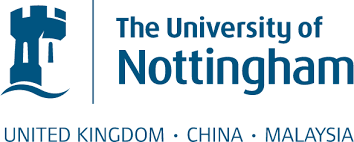

Event Details
Spokesperson Sadia Hameed will be speaking at the University of Nottingham at an event organised by the Agnostic, Secularist and Humanist Society after the screening of Deeyah Khan’s film Islam’s
Event Details
Spokesperson Sadia Hameed will be speaking at the University of Nottingham at an event organised by the Agnostic, Secularist and Humanist Society after the screening of Deeyah Khan’s film Islam’s Non Believers.
Time
(Thursday) 1:00 am - 1:00 am
Location
See post
address


Event Details
15.02.17 Conference on Islam, Secular Integration, Freedom of Speech, Oslo, Norway. More details to follow.
Event Details
15.02.17 Conference on Islam, Secular Integration, Freedom of Speech, Oslo, Norway. More details to follow.
Time
All Day (Wednesday)
Location
See post
address


Event Details
Tuesday 7 February 2017, 6:30pm-8:30pm, central London by Kings Cross Evening with lawyer Ana González on apostasy and asylum Ana will go through asylum procedures and also provide one-on-one advice
Event Details
Tuesday 7 February 2017, 6:30pm-8:30pm, central London by Kings Cross
Evening with lawyer Ana González on apostasy and asylum
Ana will go through asylum procedures and also provide one-on-one advice during the evening.
PLEASE NOTE: This is a new venue for our monthly meet-ups; if you would like to attend, please email exmuslimcouncil@gmail.com to register and receive further information.
Suggested donation: £3 waged; £1 unwaged.
Biography:
Ana Gonzalez was born in Spain and graduated in Employment Law at the University of La Coruna. She moved to the UK in 1994 and qualified as a solicitor in 2003.
Ana became a partner at Wilson Solicitors LLP in 2010.
Having trained in asylum, nationality and public law, she now practises in immigration and asylum work, and has interests in human rights and European Law. Ana is an internationally recognised expert in gender and sexuality-based asylum claims as well as having extensive expertise in representing victims of human trafficking.
Ana is praised in Chambers and Partners for her “constant attention to cases, leading client care and real knowledge of the law.” She “continues to stand out for significant work on human trafficking cases, often raising new country guidance points” (2012). “She is a stand-out practitioner in the field of refugee law, with particular expertise in trafficking cases” (2014). She “is very experienced, passionate and has very good judgement.” (2016)
She practises in all aspects of immigration and asylum work, and has a specialist interest in European law.
Ana has been with Wilson since 1999. Prior to joining us Ana was at the well respected Refugee Legal Centre. She has been a guest speaker at the London School of Economics and is currently involved in the ILPA asylum sub-committee group.
Ana has been featured in the New Statesman for her excellent work.
She has been instrumental in supporting asylum cases of those deemed “apostates” from Islam.
more
Time
(Tuesday) 6:30 pm - 8:30 pm
Location
See post
address
march 2017
2017tue14mar7:00 pmtue9:00 pmUniversity of Edinburgh Humanist Society7:00 pm - 9:00 pm address


Event Details
14 March 2017 Maryam speaks to a meeting organised by University of Edinburgh Humanist Society. More information here.
Event Details
14 March 2017
Maryam speaks to a meeting organised by University of Edinburgh Humanist Society. More information here.
Time
(Tuesday) 7:00 pm - 9:00 pm
Location
See post
address
2017sat11mar10:30 amsat2:00 pmCritical Sisters Launch, Cheltenham10:30 am - 2:00 pm address


Event Details
11 March 2017, 10:30-2pm Cheltenham This ground-breaking launch event of Critical Sisters will bring together the insights and experience of three brilliant and proudly outspoken women. A panel discussion will be
Event Details
11 March 2017, 10:30-2pm
Cheltenham
This ground-breaking launch event of Critical Sisters will bring together the insights and experience of three brilliant and proudly outspoken women. A panel discussion will be followed by a workshop with a focus on feminism and free speech. More details here.
Julie Bindel is a fearless campaigner for the rights of women and renowned journalist. Her conviction that it is impossible to change sex has led to calls for her to be no-platformed. Julie has been banned from university campuses across the U.K. and the National Union of Students officially considers her ‘vile.’
Maryam Namazie as a prominent atheist who founded the Council of Ex-Muslims of Britain. Maryam has been no-platformed across university campuses in the UK for her principled stance on religion. In 2015 she was harassed and silenced by Islamist attendees at an event to explore apostasy at Goldsmiths Students’ Union.
Sarah Ditum is Comment writer for the New Statesman, book reviewer for the Guardian and others, TV and radio pundit and a self-described ‘anti-fun feminist.’ Last year she found herself at the centre of a media storm following the cancellation of an NSPCC ‘Dare to Debate’ event about treatments for children who identify as trans.
Arrive from 10.30am
Panel discussion from 11am until 12.30pm
Workshop 13.00 until 14.00
more
Time
(Saturday) 10:30 am - 2:00 pm
Location
See post
address


Event Details
On 8 March 2017, Goldsmiths Atheist Society will sponsor the viewing of Deeyah Khan’s film, Islam’s Non Believers. Spokespersons Maryam Namazie, Sadia Hameed and Imad Iddin Habib will be there
Event Details
On 8 March 2017, Goldsmiths Atheist Society will sponsor the viewing of Deeyah Khan’s film, Islam’s Non Believers. Spokespersons Maryam Namazie, Sadia Hameed and Imad Iddin Habib will be there to respond to Q&A following the film. More details here.
Time
(Wednesday) 7:00 pm - 9:00 pm
Location
See post
address
april 2017
2017sat29aprAll Day‘Defending Progressivism’ London Conference(All Day: saturday) address
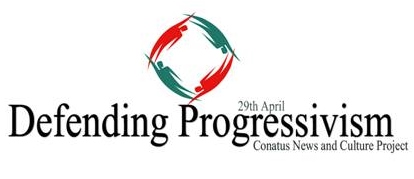

Event Details
29th of April Conference ‘Defending Progressivism’ at Conway Hall hosted by Conatus News and Culture Project. More details on their websites.
Event Details
29th of April Conference ‘Defending Progressivism’ at Conway Hall hosted by Conatus News and Culture Project. More details on their websites.
Time
All Day (Saturday)
Location
See post
address


Event Details
Tuesday 4 April 2017, 6:30pm-8:30pm, central London by Kings Cross Evening with Wissam Charafeddine, Co-Founder, Muslimish Support Network on Why the Classical Proof of God Does Not Work Anymore (based
Event Details
Tuesday 4 April 2017, 6:30pm-8:30pm, central London by Kings Cross
Evening with Wissam Charafeddine, Co-Founder, Muslimish Support Network on Why the Classical Proof of God Does Not Work Anymore (based on his background on Islamic theology)
PLEASE NOTE: This is a new venue for our monthly meet-ups; if you would like to attend, please email exmuslimcouncil@gmail.com to register and receive further information. If you already know the new location, just show up.
Suggested donation: £3 waged; £1 unwaged.
Biography:
Wissam Charafeddine, was born in United Arab Emirates from Lebanese parents. He attended the Islamic Hanbaly Educational Institute and graduated with a diploma in Islamic Shariah. After the first Gulf war, his family immigrated to the U.S. During his academic studies, Wissam continued to study and give lectures on Islamic Shariah through distant-study programs with Hawzah of Ahlulbait in Qum, Iran, and with local scholars. He was the founder of Halakat Imam AlBaqir, an Islamic Studies Institute in Dearborn where he taught, among other teachers, various topics in Islamic studies. He was a co-founder of the Muslim Scouts of Michigan, Islamic Monitor Action Network, Islamic Unity Magazine, and was a member of various organizations, among which were the Council of American Islamic Relations (CAIR), Islamic House of Wisdom, and Amnesty International.
In 2005, he co-founded IRSHAD (the Institute for Religious Studies, Humanities, and Dialogue) to seek free coexistence between human beings and the aspiration for building a better life centered around the well being of humanity. IRSHAD functions in its Islamic branch as a reform movement that calls for freedom of belief and expression, and a less literal interpretation of Quran.
In 2008-2009, while researching to write an article about Islam and Evolution, Wissam found new understanding of science, and adapted a new understanding of life based on it. The article was never finished, but a new intellectual journey started.
Wissam co-founded Muslimish in 2012, which is an organization that seeks to create an environment for support and dialogue among ex-Muslims and questioning Muslims, and fight for the freedom of expression and against blasphemy laws in countries under Islamic rules.
more
Time
(Tuesday) 6:30 pm - 8:30 pm
Location
See post
address
may 2017
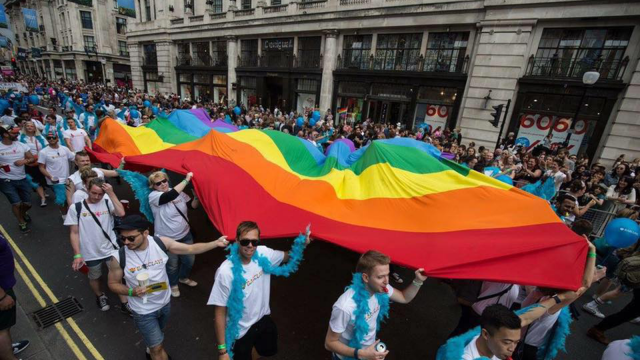

Event Details
Tuesday 23 May 2017, 6:30pm-8:30pm, central London by Kings Cross Evening with Imad Iddine Habib and Jimmy Bangash on Pride and the CEMB contingent which will march in the gay pride
Event Details
Tuesday 23 May 2017, 6:30pm-8:30pm, central London by Kings Cross
Evening with Imad Iddine Habib and Jimmy Bangash on Pride and the CEMB contingent which will march in the gay pride parade in London on 8 July 2017.
PLEASE NOTE: This is a new venue for our monthly meet-ups; if you would like to attend, please email exmuslimcouncil@gmail.com to register and receive further information. If you already know the new location, just show up.
Suggested donation: £3 waged; £1 unwaged.
Biographies:
Imad Iddine Habib is a Moroccan atheist threatened for his atheism. He is founder of the Council of Ex-Muslims of Morocco, the first public atheist organisation in a country with Islam as the state religion. The Council of Ex-Muslims of Britain declared May 15 “International Imad Day” in order to galvanise support for his case. His case was also highlighted in a 2013 CEMB report on the political and legal status of apostates in Islam. He is currently co-Spokesperson of Council of Ex-Muslims of Britain.
Jimmy Bangash is a gay British Ex-Muslim Pakistani living in the UK. He grew up in a traditional Pashtun family in London where he struggled with both the homophobia and ardent misogyny within his community. He has written poems and prose about these experiences; many of which have been published on Sedaa. As an LGBT Ex-Muslim activist he is committed to unbridling the reins of patriarchy from gays and women of Muslim heritage. As a coach, he seeks to empower those individuals liberated from problematic ideologies to live a life of authenticity, self-assurance and self-expression.
more
Time
(Tuesday) 6:30 pm - 8:30 pm
Location
See post
address
2017fri12mayAll Daysun14Rationalist International Conference, Helsinki, Finland(All Day) address
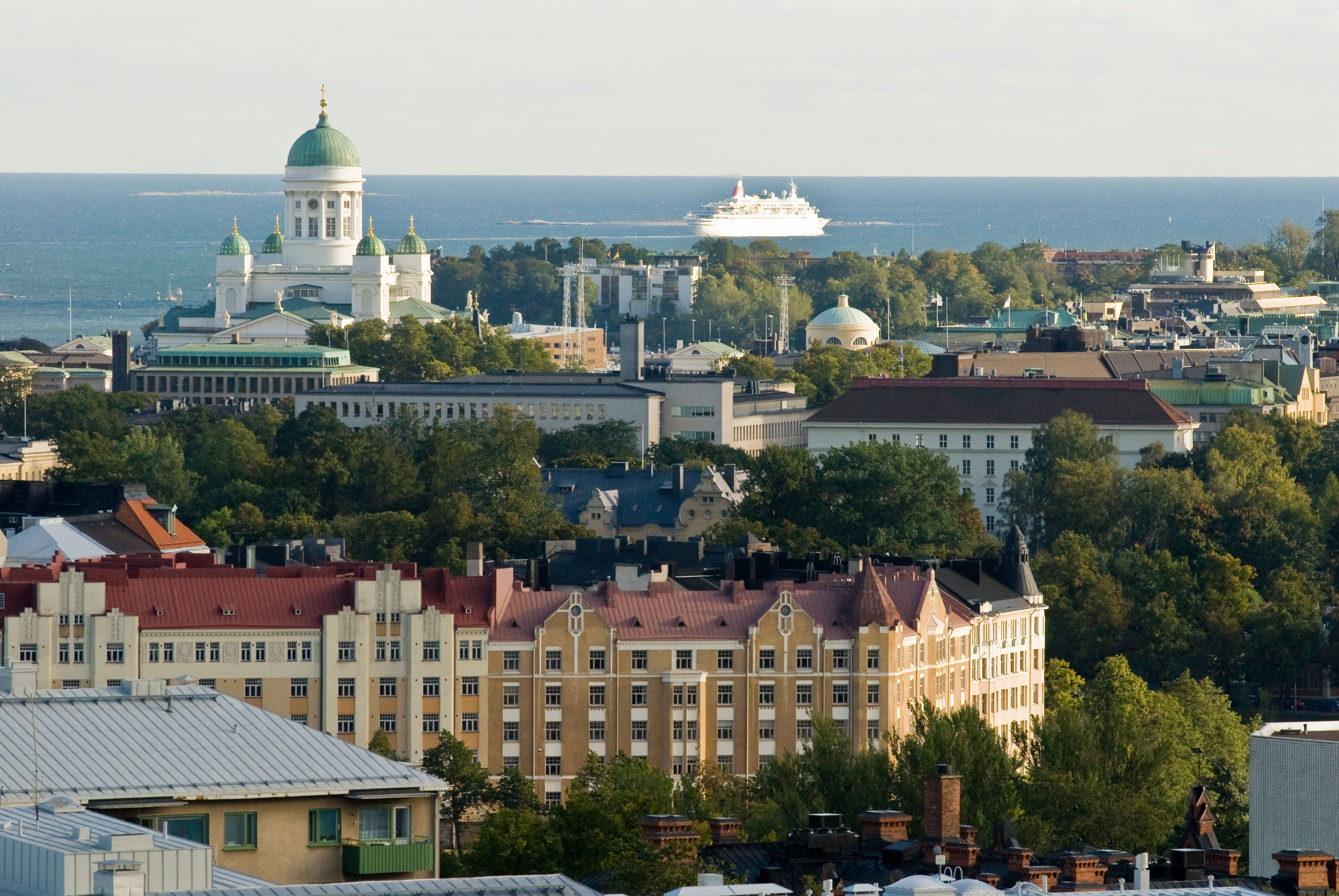

Event Details
12-14 May, Helsinki, Finland Rationalist International Conference
Event Details
12-14 May, Helsinki, Finland
Rationalist International Conference
Time
may 12 (Friday) - 14 (Sunday)
Location
See post
address
june 2017
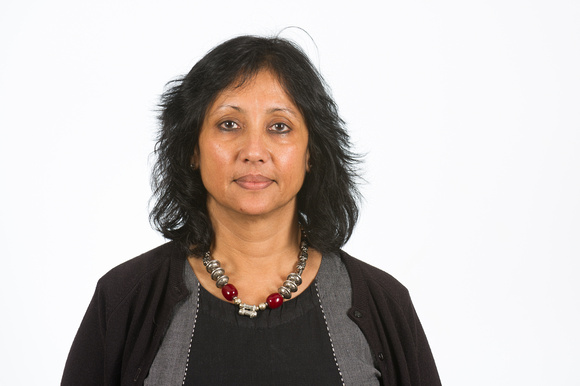

Event Details
Tuesday 27 June 2017, 6:30pm-8:30pm, central London by Kings Cross Evening with Rahila Gupta, Journalist and Activist who will speak on Rojava, Northern Syria and secular space in the middle
Event Details
Tuesday 27 June 2017, 6:30pm-8:30pm, central London by Kings Cross
Evening with Rahila Gupta, Journalist and Activist who will speak on Rojava, Northern Syria and secular space in the middle of a war
PLEASE NOTE: This is a new venue for our monthly meet-ups; if you would like to attend, please email exmuslimcouncil@gmail.com to register and receive further information. If you already know the new location, just show up.
Suggested donation: £3 waged; £1 unwaged.
Biography:
Rahila Gupta is a freelance journalist, writer and activist, a longstanding member of Southall Black Sisters, an advocacy and campaigning women’s group for women escaping domestic violence and chair of the Nihal Armstrong Trust which funds families of children with cerebral palsy to buy cutting-edge equipment and services. Her articles are published in the Guardian, New Humanist, New Internationalist and openDemocracy among other magazines, journals and websites. She is also a part-time commissioning editor for openDemocracy, 5050. She and Beatrix Campbell are collaborating on a book, Why Doesn’t Patriarchy Die? which will investigate how patriarchy fits with diverse political systems.
more
Time
(Tuesday) 6:30 pm - 8:30 pm
Location
See post
address
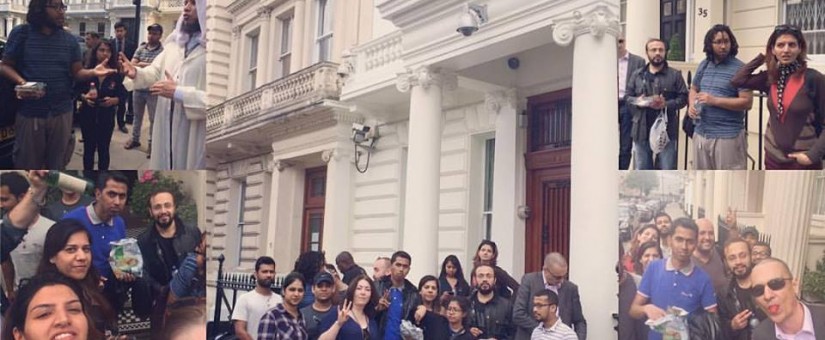

Event Details
On 23 June 2017 at 14:00, we will meet at Green Park station and go on to “eat-in” at the Saudi, Iranian, Egyptian, Bangladeshi, Pakistani, Moroccan and other embassies in
Event Details
On 23 June 2017 at 14:00, we will meet at Green Park station and go on to “eat-in” at the Saudi, Iranian, Egyptian, Bangladeshi, Pakistani, Moroccan and other embassies in London in solidarity with those defying fasting rules during Ramadan. This is hugely important given that there are many people across the globe who are arrested, beaten and fined for eating during the month; many others are pressured into fasting, including in Europe. Join us at the ‘eat-in’ if you can.
Alternately, you can upload photos of yourself eating during fasting times or holding signs with messages of solidarity using hashtag: #IWillNotFast #لن_اصوم #روزه خوارى #Ramadan until the end of Ramadan. Happy fast-defiance!
To participate, just show up. Email exmuslimcouncil@gmail.com for more details.
Here are photos of this year’s fast-defying:
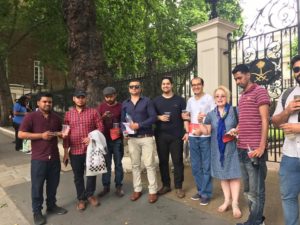

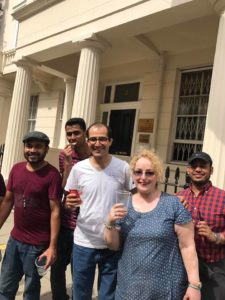

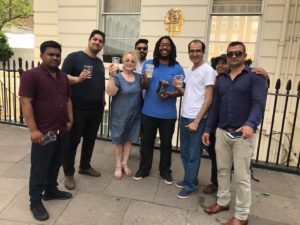

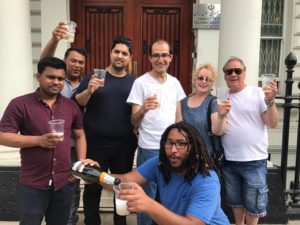

more
Time
All Day (Friday)
Location
See post
address
2017fri16jun9:26 pmfri9:26 pmMark fifth anniversary of Raif Badawi’s arrest9:26 pm - 9:26 pm address
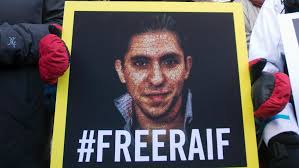

Event Details
Event Details
Today I carry a message from my husband and my three children who have been deprived of their father for exercising a natural right to express his opinion.
I bring you a message of hope that one day, I will see my husband, Raif Badawi, standing among you on this platform, to talk to you about freedom and human rights, to tell you how freedom cannot be incarcerated, flogged, or executed. No matter how hard some try.
I also carry a message of determination:
A determined Saudi woman, standing here, and saying that a peaceful transition in Saudi Arabia is possible. With this new generation, the generation of globalisation, Internet, and blogs; ideas can no longer be prevented or blocked. It is a new change, a new revolution, from Morocco to Jakarta, young people today will determine the future and we must support and stand by them. Thus, your role here is participating in this change.
Raif Badawi’s message can be summed up as follows: The peaceful expression of opinion and thought is a non-negotiable human right, which is the right of all human beings with no exception.
However, the real prisoners are those who can defend freedom but do not….
Raif has not lost hope, but he is mentally and physically suffering from this unjust sentence. I can tell you that he is fine and very optimistic, but I will be lying. His mental health is worsening. So I beg you for more mobilisation and solidarity. What frightens every detainee is to be forgotten by the supporters of freedom.
TAKE ACTION
Join our protest at the Saudi Embassy
9-10am, Friday 16 June
To mark the five year anniversary of Raif Badawi’s arrest and the birthday of his lawyer Waleed Abu Al-Khair, who himself is currently serving a 15-year prison sentence, English PEN will be hosting a vigil at the Saudi Embassy in London and continuing to call for their immediate release.
We will be joined by colleagues from Bread and Roses TV, Campaign Against Arms Trade, Council of Ex-Muslims of Britain, Index on Censorship, One Law For All, the Peter Tatchell Foundation and Reporters Without Borders. Please join us if you can.
NB Activists are asked to meet at the Curzon Street entrance to the Embassy. (note: the postal address of the Embassy is 30-32 Charles Street, Mayfair, London).
Spread the word
Please keep sharing details of Raif Badawi’s case and calls for his release on social media. Follow @Raif_Badawi on Twitter and tweet your support with the hashtag #FreeRaif
Join the photo action for Raif Badawi
We are aiming to get 1000 images to represent the 1000 lashes to which Raif has been sentenced. As well as helping to raise and maintain awareness of his case, these photos will serve as a powerful visual representation of the widespread support for Raif and his family .
Please share your photo, ideally with details of where it was taken (eg Embassy of Saudi Arabia, London, UK), with us before the 17 June 2017.
Send us your photos
Via Twitter: Please share your photo with the hashtag #FreeRaif and tag @englishpen
Via Facebook: Please tag English PEN Writers at Risk in your photos, and use the hashtag #FreeRaif https://www.facebook.com/English-PEN-Writers-at-Risk-78698626750/
Via Email: Please email your photos, with the subject line ‘Free Raif photo’ to cat@englishpen.org
more
Time
(Friday) 9:26 pm - 9:26 pm
Location
See post
address
july 2017
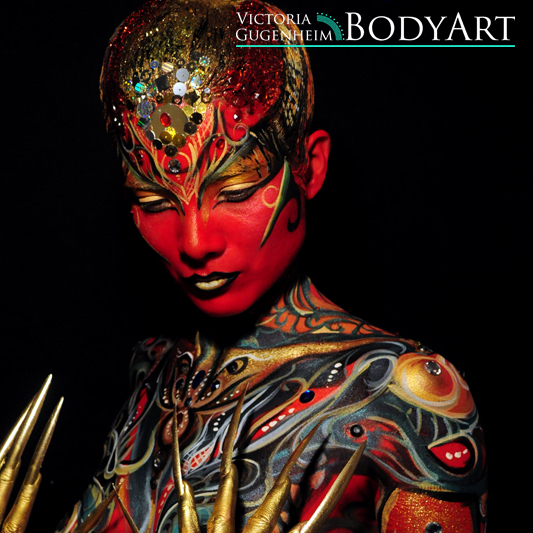

Event Details
Calling all volunteers who want to make a statement for our cause: We need you! Mass body painting by award-winning body-painter Victoria Gugenheim on 24 July from 1400 hours in
Event Details
Calling all volunteers who want to make a statement for our cause: We need you! Mass body painting by award-winning body-painter Victoria Gugenheim on 24 July from 1400 hours in London.
Participants will be painted as the logo of Council of Ex-Muslims of Britain (CEMB) and photographed from above. The public is welcome to join in order to support the work of the CEMB.
Time
(Monday) 2:00 pm - 8:00 pm GMT
Location
Kings Cross
Organizer


Event Details
Calling all volunteers who want to make a statement for our cause: We need you! Mass bodypainting by award-winning bodypainter Victoria Gugenheim on 24 July from 1400 hours in London.
Event Details
Calling all volunteers who want to make a statement for our cause: We need you! Mass bodypainting by award-winning bodypainter Victoria Gugenheim on 24 July from 1400 hours in London.
Participants will be painted as the logo of Council of Ex-Muslims of Britain (CEMB) and photographed from above. The public are welcome to join in order to support the work of the CEMB.
For further information, contact: exmuslimcouncil@gmail.com.
The event is free.
FAQs:
Do I have to be nude?
No. Flesh coloured underwear can be worn; plain, beige coloured, brown or black bras can also be painted over.
Will I get cold?:
The weather should be good, but bring a warm dressing gown and sandals!
Will the paint stain?
Although we recommend not wearing anything crisp new and white, no. The paint comes off in the shower with shower gel, and off of clothes with normal biological washing powder or capsules.
How long will it take?
From 14:00-20:00 hours, and painting groups of people will be done in stages, with multiple groups. If you’re later, you’ll be in group 2 or 3 for example, and not group 1.
more
Time
(Monday) 2:00 pm - 6:00 pm
Location
See post
address
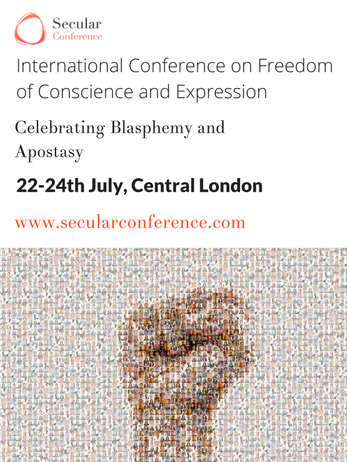


Event Details
International Conference on Freedom of Conscience and Expression in the 21st Century Saturday and Sunday 22-24 July 2017 Central London, UK BUY TICKETS TODAY. NO TICKETS SOLD AT DOOR.
Event Details
International Conference on Freedom of Conscience and Expression in the 21st Century
Saturday and Sunday 22-24 July 2017
Central London, UK
BUY TICKETS TODAY. NO TICKETS SOLD AT DOOR.
Join over 70 notable free-thinkers from around the world for a weekend of discussions and debates on freedom of conscience and expression in the 21st century at a spectacular venue in central London during 22-23 July 2017.
On 24 July, an activist strategy meeting will be followed by body-painting in support of ex-Muslims, which will be open to the public.
The two-day conference will discuss censorship and blasphemy laws, freedom of and from religion, apostasy, the limits of religion’s role in society, LGBT and women’s rights, atheism, secular values and more.
Speakers from countries or the Diaspora as diverse as Algeria, Bangladesh, Canada, Egypt, France, India, Iran, Iraq, Iraqi Kurdistan, Ireland, Lebanon, Malaysia, Morocco, Nigeria, Norway, Pakistan, Palestinian Territories, Poland, Saudi Arabia, Sri Lanka, Sudan, Sweden, Switzerland, Syria, Turkey, Tunisia, UK, Ukraine, US and Yemen will gather in London to defend freedom of conscience and expression and argue that freedoms are not western but universal.
The conference will highlight the voices of people on the frontlines of resistance – many of them persecuted and exiled – as well as address challenges faced by activists and freethinkers, elaborate on the links between democratic politics and free expression and conscience, promote secular and rights-based alternatives, and establish priorities for collective action.
Art and culture will be integral to the event as will lively debate with the dauntless use of the free word.
Confirmed Distinguished Speakers:
A C Grayling, Philosopher
Aliaa Magda Elmahdy, Egyptian Feminist Activist
Ani Zonneveld, Founder and President of Muslims for Progressive Values
Annie Laurie Gaylor, Co-President of the Freedom From Religion Foundation
Armin Navabi, Founder of Atheist Republic
Aryan Arian, Photographer/Filmmaker
Asher Fainman, President of Goldsmiths Atheist Society
Benjamin David, Editor-in-Chief of Conatus News
Bonya Ahmed, Activist, Writer and Blogger at Mukto-Mona
Cemal Knudsen Yucel, Co-Founder and Chair of Ex-Muslims of Norway
Chris Moos, Secular Activist
Damon Conlan and Neil Edwards, Magicians
Dan Barker, Co-President of the Freedom From Religion Foundation
Dave Silverman, President of American Atheists
Deeyah Khan, Filmmaker
Djemila Benhabib, Author and Activist
Elham Manea, Yemeni-born Author and Human Rights Campaigner
Fariborz Pooya, Bread and Roses TV Presenter and Editor
Fauzia Ilyas, Founder of Atheist & Agnostic Alliance Pakistan
Gina Khan, One Law for All Spokesperson
Gita Sahgal, Director of Centre for Secular Space
Gona Saed, Co-Founder of Kurdistan Secular Centre
Gurpreet Kaur Bhatti, Award-winning Playwright
Halima Begum, Ex-Muslim Activist and Blogger
Hassan Radwan, Agnostic Muslim Khutbahs blog
Houzan Mahmoud, Culture Project Co-Founder
Imad Iddine Habib, Founder of Council of Ex-Muslims of Morocco
Inna Shevchenko, FEMEN Leader
Iram Ramzan, Journalist and Founder of Sedaa
Ismail Mohamed, Egyptian Atheist and Founder of Black Ducks Talk Show
Jane Donnelly, Atheist Ireland’s Human Rights Officer
Jimmy Bangash, LGBT Ex-Muslim Activist
Jodie Ginsberg, CEO of Index on Censorship
Karima Bennoune, UN Special Rapporteur in the Field of Cultural Rights
Karrar D. Al Asfoor, Co-founder of Atheist Alliance Middle East and North Africa (Visa Denied)
Kate Smurthwaite, Comedian
Kenan Malik, Author and Broadcaster
London Humanist Choir
Marieme Helie Lucas, Algerian Sociologist and Founder of Secularism is a Women’s Issue
Maryam Namazie, Iranian-born Rights Activist, Writer and Conference Organiser
Mazen Abou Hamdan, Co-Founder of Freethought Lebanon
Michael Nugent, Atheist Ireland’s Chairperson
Mohammed Alkhadra, Founder of Jordanian Atheists Group
Nadia El Fani, Tunisian Filmmaker
Nina Sankari, Polish Secular Activist
Noura Embabi, Muslim-ish President
Peter Tatchell, Human Rights Campaigner
Pragna Patel, Director of Southall Black Sisters
Rahila Gupta, Writer and Journalist
Rana Ahmad, Head of the RDF Arab Atheist Community
Richard Dawkins, Author and Scientist
Sadia Hameed, Spokesperson of the Council of Ex-Muslims of Britain
Sanal Edamaruku, Founder and President of Rationalist International
Sarah Haider, Co-founder of Ex-Muslims of North America
Sarah Peace, Nigerian Artist and Director of Fireproof Library
Savin Bapir Tardy, Lecturer in Psychology at UWL
Shabana Rehman, Performance Artist and Human and Animal Rights Advocate
Shelley Segal, Singer/Songwriter
Tasneem Khalil, Swedish-Bangladeshi Journalist and Editor of Independent World Report
Teresa Gimenez Barbat, MEP, Group of the Alliance of Liberals and Democrats for Europe and Euromind
Victoria Gugenheim, Award-winning Body Artist
Waleed Al Husseini, Palestinian Writer and Founder of Council of Ex-Muslims of France
Yasmin Rehman, Women’s Rights Campaigner
Zehra Pala, President of Atheism Association of Turkey
Zineb El Rhazoui, Moroccan-born Author
READ MORE ABOUT OUR DISTINGUISHED SPEAKERS.
Saturday Day Delegate Rate: £85
Sunday Day Delegate Rate: £85
Sunday Dinner with Entertainment: £65
Saturday and Sunday Day Delegate Rate: £170
FULL CONFERENCE TICKET INCLUDING SATURDAY AND SUNDAY DAY DELEGATE RATE, COCKTAILS, AND DINNER WITH ENTERTAINMENT: £230 unwaged; £260 waged; £350 organisations
All tickets must be purchased beforehand. No tickets will be sold at the door.
Organisations/vendors can book stalls for the two-day conference for a flat rate of £500.
For more information, contact:
Maryam Namazie
maryamnamazie@gmail.com
Tel: +44 (0)7719166731
www.secularconference.com
The conference is sponsored by: Alliance of Liberals and Democrats for Europe; Atheist International Alliance; Bread and Roses TV; Center for Inquiry; Centre for Secular Space; Council of Ex-Muslims of Britain; Culture Project; Euromind; Equal Rights Now; Fitnah; Freedom from Religion Foundation; National Secular Society; One Law for All; Richard Dawkins Foundation for Reason and Science; Southall Black Sisters; Secularism is a Women’s Issue, amongst others.
more
Time
july 22 (Saturday) - 24 (Monday)
Location
See post
address



Event Details
Join over 70 notable free-thinkers from around the world for a weekend of discussions and debates on freedom of conscience and expression in the 21st century at a spectacular venue
Event Details
Join over 70 notable free-thinkers from around the world for a weekend of discussions and debates on freedom of conscience and expression in the 21st century at a spectacular venue in central London during 22-23 July 2017.
Time
july 22 (Saturday) - 23 (Sunday) GMT
Location
Covent Garden
Organizer
2017sat08julAll DayCEMB to join Gay Pride London(All Day: saturday) address


Event Details
A CEMB contingent will march in the gay pride parade in London on 8 July 2017. Those who want to be part of the CEMB contingent, please email exmuslimcouncil@gmail.com.
Event Details
A CEMB contingent will march in the gay pride parade in London on 8 July 2017. Those who want to be part of the CEMB contingent, please email exmuslimcouncil@gmail.com.
Time
All Day (Saturday)
Location
See post
address
september 2017
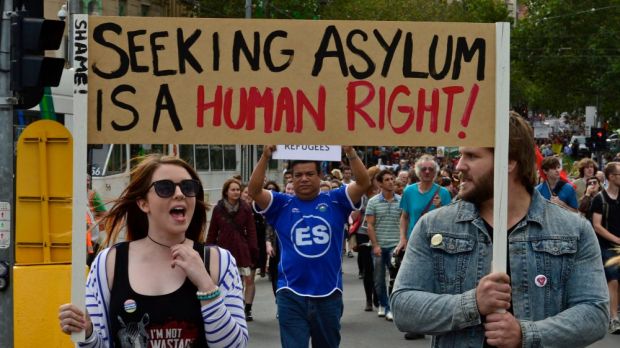

Event Details
Ana will go through asylum procedures and also provide one-on-one advice during the evening.
Event Details
Ana will go through asylum procedures and also provide one-on-one advice during the evening.
Time
(Tuesday) 6:30 pm - 8:30 pm GMT
Location
Kings Cross
Organizer
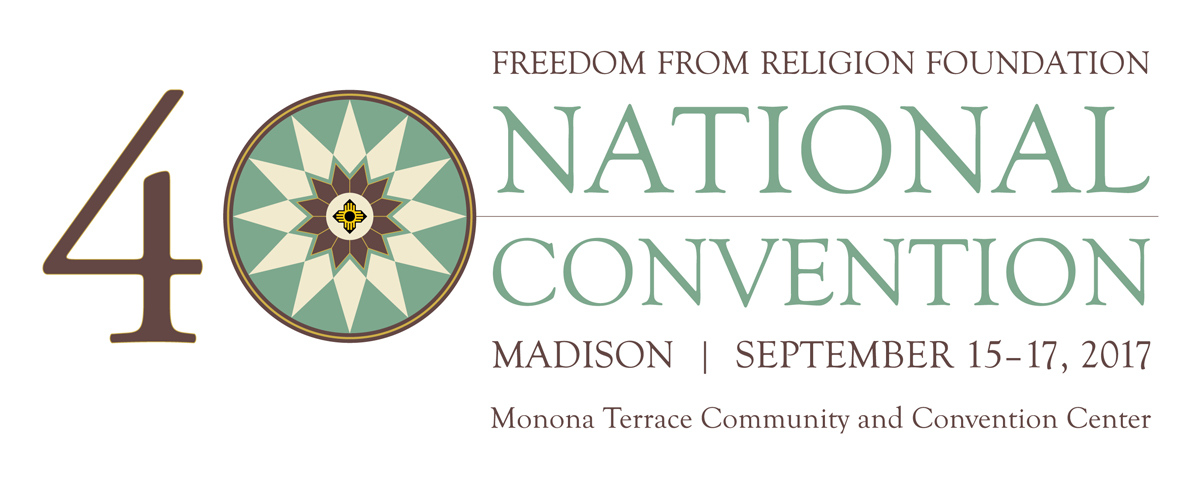

Event Details
The Freedom From Religion Foundation is proud to be hosting its 40th annual national convention in Madison, Wisconsin, this year! The event will include speeches and entertainment by illustrious personalities,
Event Details
The Freedom From Religion Foundation is proud to be hosting its 40th annual national convention in Madison, Wisconsin, this year! The event will include speeches and entertainment by illustrious personalities, a tour of FFRF’s Freethought Hall headquarters, and a two-hour leisurely boat cruise around Lake Monona.
The convention takes place the weekend of September 15-17, primarily at the lakeside Frank Lloyd Wright-designed Monona Terrace Convention Center in Madison, Wis. Early-birds signing up for FFRF’s 40th convention get a discounted rate of only $40! You can sign up now.
more
Time
september 15 (Friday) - 17 (Sunday) DST
Location
Monona Terrace Convention Center
october 2017
2017sat28octAll DayAnarchist Book Fair(All Day: saturday) address
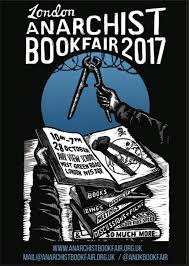

Event Details
On 28th October at 5pm, Sadia Hameed will speak at the anarchist book fair. More information here.
Event Details
On 28th October at 5pm, Sadia Hameed will speak at the anarchist book fair. More information here.
Time
All Day (Saturday)
Location
See post
address



Event Details
24 October 2017, Evening Meetup with Peter Tatchell, central London by Kings Cross, 6:30-8:30pm PLEASE NOTE: This is our regular space for our monthly meet-ups; if you would like to
Event Details
24 October 2017, Evening Meetup with Peter Tatchell, central London by Kings Cross, 6:30-8:30pm
PLEASE NOTE: This is our regular space for our monthly meet-ups; if you would like to attend, please email exmuslimcouncil@gmail.com to register and receive further information. If you already know the location, just show up.
Suggested donation: £3 waged; £1 unwaged.
Biography:
Peter Tatchell has been campaigning for human rights and global justice since 1967. New Statesman readers voted him sixth on their list of “Heroes of our Time” 2006. He won Campaigner of the Year at The Observer Ethical Awards 2009, as well as Secularist of the Year 2012. He writes and broadcasts on many human rights and social justice issues. In protest against the Archbishop of Canterbury’s support for legal discrimination against LGBT people, he interrupted Dr. Carey’s Easter Sunday Sermon in 1998. He attempted a citizen’s arrest of Zimbabwean President Robert Mugabe in 1999 and again in 2001, and was beaten unconscious the second time. He was also arrested and beaten when he went to support Moscow LGBT Pride in 2007. Both attacks left him with brain and eye damage. He is currently the Director of the human rights organisation, the Peter Tatchell Foundation.
more
Time
(Tuesday) 6:30 pm - 8:30 pm GMT
Location
Kings Cross
Organizer


Event Details
20-22 October 2017, Rome, Italy Maryam Namazie will be speaking at Women’s Freedom in the 21st Century: Thoughts and Practices Conference, Beyond all the Fundamentalisms, Casa Internazionale delle donne, Rome,
Event Details
20-22 October 2017, Rome, Italy
Maryam Namazie will be speaking at Women’s Freedom in the 21st Century: Thoughts and Practices Conference, Beyond all the Fundamentalisms, Casa Internazionale delle donne, Rome, Italy
Time
20 (Friday) 9:30 am - 22 (Sunday) 12:30 pm
Location
See post
address
2017sat14octAll Daysun15London Feminist Conference(All Day) Event Organized ByFiLiA





Event Details
Sadia Hameed will be speaking on a panel discussion at the conference. Get your Ticket Today!
Event Details
Sadia Hameed will be speaking on a panel discussion at the conference.
Time
october 14 (Saturday) - 15 (Sunday) GMT
Location
the Institute of Education
Organizer
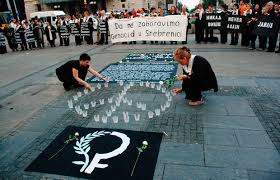

Event Details
13-15 October 2017 Growing Signs of Fundamentalism – Democratic and Feminist Response, Feminist roundtable discussion by Women in Black, Belgrade
Event Details
Time
13 (Friday) 9:00 am - 15 (Sunday) 5:30 pm
Location
See post
address
november 2017
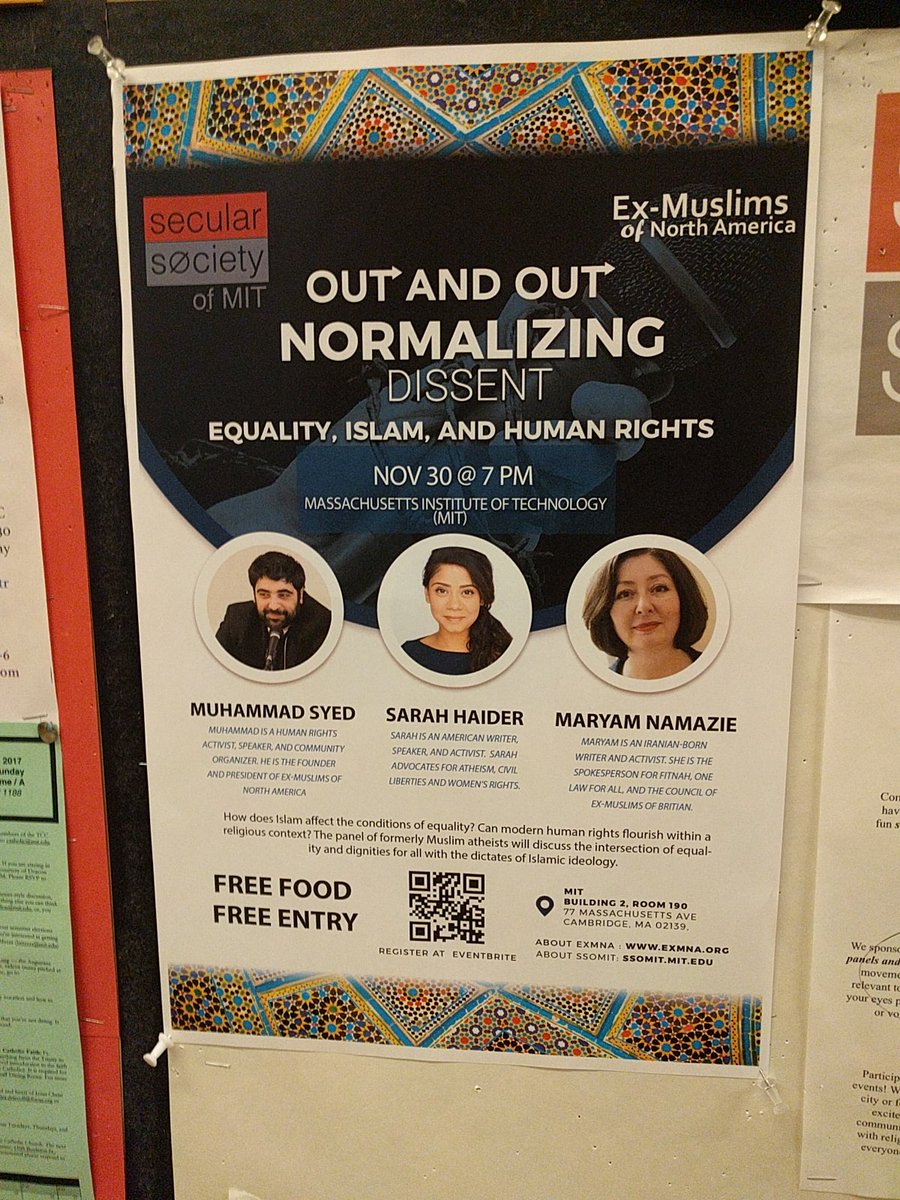


Event Details
Maryam Namazie will join Ex-Muslims of North America at MIT for their Normalising Dissent Tour on 30 November, 7pm, to discuss Equality, Islam and Human Rights. For details see their
Event Details
Maryam Namazie will join Ex-Muslims of North America at MIT for their Normalising Dissent Tour on 30 November, 7pm, to discuss Equality, Islam and Human Rights. For details see their website.
Time
November 30 (Thursday) - December 1 (Friday)
Location
See post
address
2017fri17novAll DayCouncil of Ex-Muslims of Germany Event, Koln(All Day: friday) address


Event Details
17 November 2017, Koln, Germany Event organised by the Council of Ex-Muslims of Germany and Giordano Bruno Society
Event Details
17 November 2017, Koln, Germany
Event organised by the Council of Ex-Muslims of Germany and Giordano Bruno Society
Time
All Day (Friday)
Location
See post
address
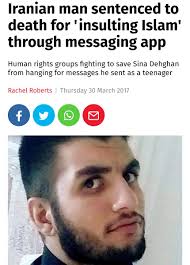

Event Details
10 November 2017, 12pm Join CEMB at a protest at the Iranian and Pakistani embassies in support of individuals imprisoned or facing execution because of blasphemy or apostasy. Time: Meeting
Event Details
10 November 2017, 12pm
Join CEMB at a protest at the Iranian and Pakistani embassies in support of individuals imprisoned or facing execution because of blasphemy or apostasy.
Time: Meeting outside Pakistani embassy, 34-36 Lowndes Square, Belgravia, London SW1X 9JN at 12:00noon
Then walk to Iranian embassy, 16 Prince’s Gate, London, SW7 1PT.
Time
(Friday) 12:00 pm - 3:30 pm
Location
See post
address
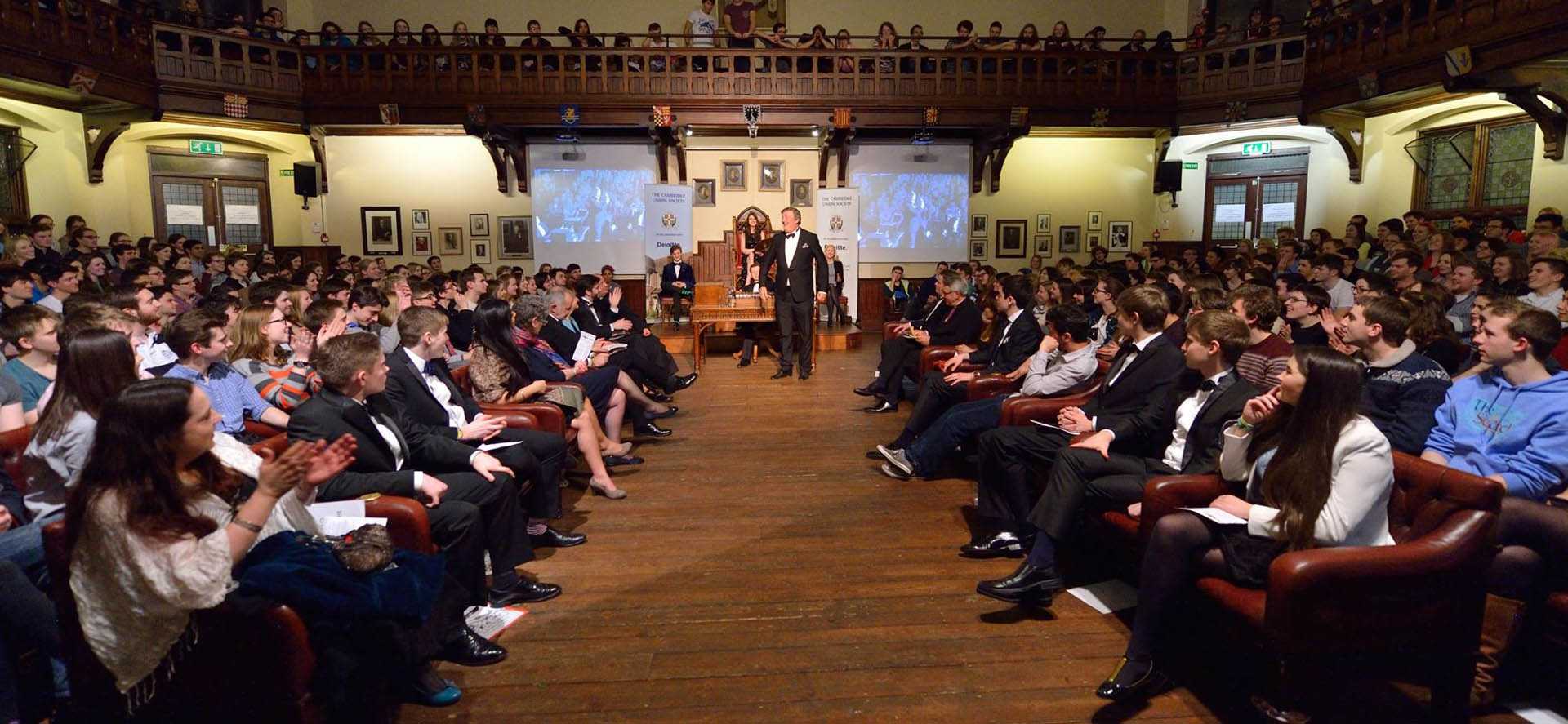

Event Details
9th November 2017, Sadia Hameed is debating “This House Has Lost Faith in Faith” at Cambridge Union Time: 7:30pm 9A Bridge St, Cambridge CB2 1UB For more information, visit
Event Details
9th November 2017, Sadia Hameed is debating “This House Has Lost Faith in Faith” at Cambridge Union
Time: 7:30pm
9A Bridge St, Cambridge CB2 1UB
For more information, visit site.
Time
(Thursday) 7:30 pm - 9:30 pm
Location
See post
address
2017tue07nov6:30 pmtue8:30 pmEvening with Installation Artist Sadia Sadia6:30 pm - 8:30 pm address


Event Details
7 November 2017, Evening Meetup with Sadia Sadia, central London by Kings Cross, 6:30-8:30pm PLEASE NOTE: This is our regular space for our monthly meet-ups; if you would like to
Event Details
7 November 2017, Evening Meetup with Sadia Sadia, central London by Kings Cross, 6:30-8:30pm
PLEASE NOTE: This is our regular space for our monthly meet-ups; if you would like to attend, please email exmuslimcouncil@gmail.com to register and receive further information. If you already know the location, just show up.
Suggested donation: £3 waged; £1 unwaged.
Biography:
Sadia Sadia is a Canadian-born British installation artist. She was one of the first women in the world to be signed to a major label as a record producer, and became the first female member of the British Record Producer’s Guild (now the MPG Music Producer’s Guild), under the chairmanship of Sir George Martin. Her work has been sequenced to film and television by companies such as Polygram/Miramax, Interscope and Universal Pictures. Sadia was the music producer of the inaugural TUC ‘Respect: Unite Against Racism’ campaign, featuring dozens of international musicians. As an artist and film maker, Sadia’s work has been screened around the world in venues including the Melbourne International Film Festival, the Tricycle Theatre, the National Science and Media Museum and the Cinematheque Francaise. Her work forms part of the permanent collection of ACMI (the Australian Centre for the Moving Image). Sadia has a master’s degree in design from Central St Martin’s as well as a master’s degree in political science and economics with a specialisation in gender from Birkbeck University. She was born to a Pakistani Muslim father and is an atheist and ex-Muslim.
more
Time
(Tuesday) 6:30 pm - 8:30 pm
Location
See post
address
december 2017
2017sun10dec2:00 pmsun6:00 pmEnd-Year Celebration, London2:00 pm - 6:00 pm address


Event Details
Join Council of Ex-Muslims of Britain to celebrate the end of 2017 and bring in the New Year. Date: Sunday 10 December 2017 Time: 2-6pm Place: Kings Cross Speakers will include Human Rights Campaigner
Event Details
Join Council of Ex-Muslims of Britain to celebrate the end of 2017 and bring in the New Year.
Date: Sunday 10 December 2017
Time: 2-6pm
Place: Kings Cross
Speakers will include Human Rights Campaigner Peter Tatchell, CEMB spokespersons Maryam Namazie and Sadia Hameed, Morrocan Ex-Muslim Council Founder Imad Iddine Habib and Jordanian atheist Mohammed AlKhadra.
Tickets: £25 including a drink and appetisers plus speeches, music and dancing with DJ Zee Jay. Get your tickets today!
Venue details will be sent to those who have purchased tickets.
Hope to see you there!
more
Time
(Sunday) 2:00 pm - 6:00 pm
Location
See post
address
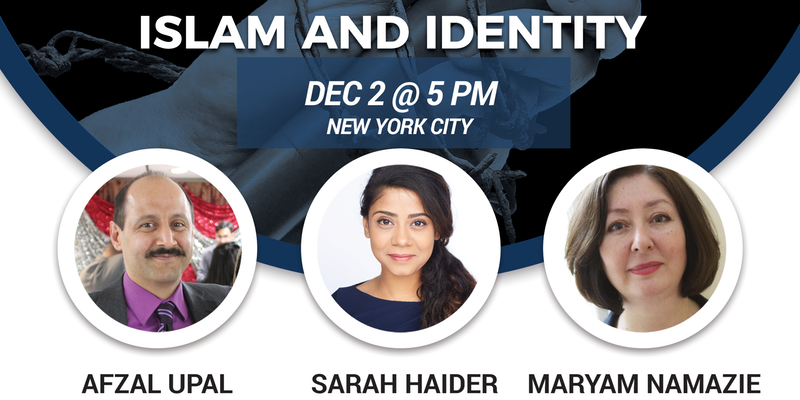

Event Details
Maryam Namazie will join Ex-Muslims of North America in NYC for their Normalising Dissent Tour on 2 December 2017, 5pm, to discuss Islam and Identity. To register for tickets,
Event Details
Maryam Namazie will join Ex-Muslims of North America in NYC for their Normalising Dissent Tour on 2 December 2017, 5pm, to discuss Islam and Identity. To register for tickets, click here.
Time
(Saturday) 5:00 pm - 7:00 pm
Location
See post
address



Event Details
Maryam Namazie will join Ex-Muslims of North America at MIT for their Normalising Dissent Tour on 30 November, 7pm, to discuss Equality, Islam and Human Rights. For details see their
Event Details
Maryam Namazie will join Ex-Muslims of North America at MIT for their Normalising Dissent Tour on 30 November, 7pm, to discuss Equality, Islam and Human Rights. For details see their website.
Time
November 30 (Thursday) - December 1 (Friday)
Location
See post
address
january 2016



Event Details
18 January 2016, central London by Kings Cross station, 19:00-21:00 hours Apostasy and Asylum Meet-up with Lawyer Ana Gonzales. £3 entry (waged);
Event Details
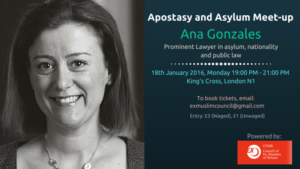

Apostasy and Asylum Meet-up with Lawyer Ana Gonzales.
£3 entry (waged); £1 entry (unwaged). E-mail exmuslimcouncil@gmail.com to register if this is the first time you will be attending our monthly meetups.
Time
(Monday) 7:00 pm - 9:00 pm
Location
Kings Cross
february 2016
2016sat27feb7:00 pmsat9:00 pmPlace of Religion in 21 Century, Birmingham University7:00 pm - 9:00 pm
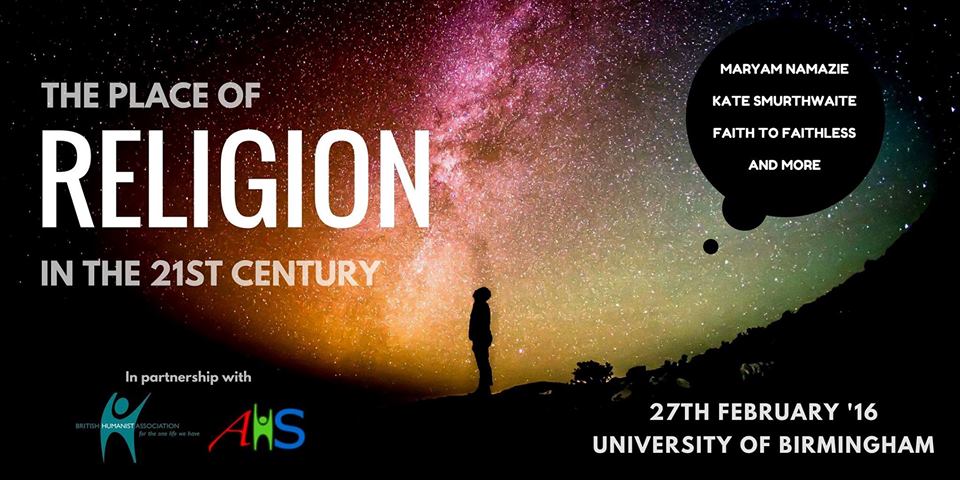

Event Details
27 February 2016 Place of Religion in 21 Century, Birmingham University. More information here.
Event Details


Place of Religion in 21 Century, Birmingham University. More information here.
Time
(Saturday) 7:00 pm - 9:00 pm
Location
Birmingham University
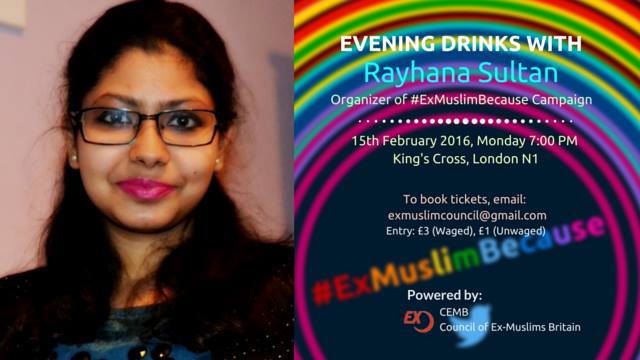

Event Details
15 February 2016, central London by Kings Cross station, 19:00-21:00 hours Evening with CEMB Spokesperson and #ExMuslimBecause organiser Rayhana Sultan £3 entry (waged);
Event Details
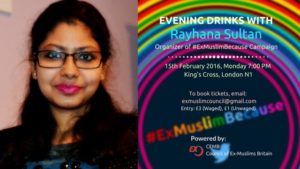

Evening with CEMB Spokesperson and #ExMuslimBecause organiser Rayhana Sultan
£3 entry (waged); £1 entry (unwaged). E-mail exmuslimcouncil@gmail.com to register if this is the first time you will be attending our monthly meetups.
more
Time
(Monday) 7:00 pm - 9:00 pm
Location
Kings Cross
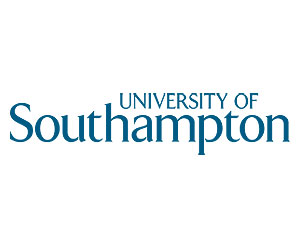

Event Details
Imad Iddine Habib will speak on behalf of Council of Ex-Muslims of Britain at panel on Ex-Muslim & Black Atheist Experiences Date: Monday 8th February Time: 7pm-9pm Place: University of
Event Details
Imad Iddine Habib will speak on behalf of Council of Ex-Muslims of Britain at panel on Ex-Muslim & Black Atheist Experiences
Date: Monday 8th February
Time: 7pm-9pm
Place: University of Southampton Atheist Society
Time
(Monday) 7:00 pm - 9:00 pm
Location
University of Southampton Atheist Society
march 2016
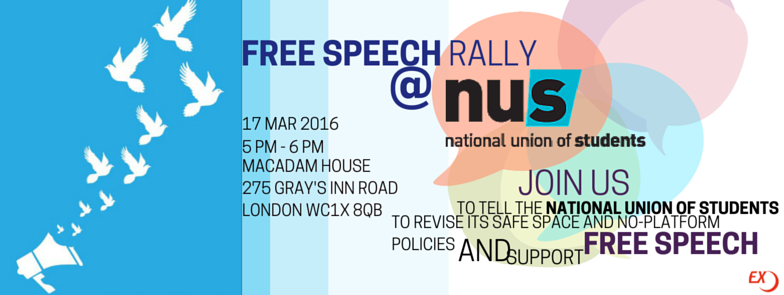

Event Details
On 17 March 2016 from 5-6pm Council of Ex-Muslims of Britain and Right2Debate will be holding
Event Details
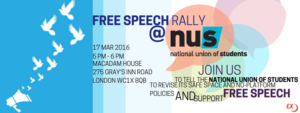

NUS: Revise Safe Space and No Platform Policies to Facilitate not Restrict Free Expression and Thought
We are deeply concerned by the increasing attempts by the National Union of Students (NUS) and its affiliated Student Unions to silence dissenters – including feminists, apostates, LGBTI rights campaigners, anti-racists, anti-fascists and anti-Islamists – through its use of No-Platform and Safe Space policies.
We stand against all prejudice and discrimination. We agree that free speech does not mean giving bigots a free pass. A defence of free speech includes the right and moral imperative to challenge, oppose and protest bigoted views.
Educational institutions must be a place for the exchange and criticism of all ideas – even those deemed unpalatable by some – providing they don’t incite violence against peoples or communities. Bigoted ideas are most effectively defeated by open debate, backed up by ethics, reason and evidence.
The student body is not homogeneous; there will be differences of opinion among students. The NUS’s restrictive policies infringe upon the right of students to hear and challenge dissenting and opposing views.
We, therefore, call on the NUS to revise its No-Platform and Safe Space policies to facilitate freedom of expression and thought, rather than restrict it.
Signed:
FINAL UPDATED 18 March 2016 AM
(Students, Activists and Academics are welcome to sign on to the letter, which will be updated regularly. To sign on to the letter, please email below contact persons.)
AC Grayling, Philosopher
Adrian Hart, Author ‘The Myth of Racist Kids’, ‘That’s Racist!’ and occasional contributor to Spiked
Afsaneh Vahdat, Women’s Rights Activist
Alexa Robertson, Secretary of UNASH at Nottingham and Campaigns Officer for the National Federation of Atheist, Humanist and Secular Student Societies
Alicia McElhill, President City of Leicester NUT
Amanda Jane Brown, Humanist/Secular Activist, Newcastle Upon Tyne
Amanda Sebestyen, Asylum Education and Legal Fund
Andrew Browne, University Student
Andrew Kekwick, Activist
Annie Sugier, President of the Ligue du Droit International des Femmes
Ansar Ahmed Ullah, International Forum for Secular Bangladesh
Asher Fainman, President of Goldsmiths Atheist, Secularist and Humanist Society
Asqar Karimi, Executive Board of the Worker-communist Party of Iran
Ateizm Dernegi in Turkey
Atheist Alliance International
Author, Jesus & Mo
Babak Yazdi, Spokesperson of Kanoon-e Khavaran
Bahram Soroush, Activist
Becky Lavelle, President of Hull University Secularist, Atheist, and Humanist Society
Benjamin David, President of Warwick Atheists, Secularists and Humanists
Bernárd J. Lynch, Catholic priest and Chair of Camden LGBT Forum
Bread and Roses TV
Brendan O’Neill, Editor of Spiked
Brian Robinson, Retired Psychiatrist
Brighton Secular Humanists
Caroline Fourest, Author
Center for Inquiry
Central London Humanist Group
Centre for Secular Space
Chichester Humanists
Chris Austin, Physicist
Chris Moos, Secularist Activist
Christine M. Shellska, President of Atheist Alliance International
Christy Walsh LLM
Coel Hellier, Professor of Astrophysics, Keele University
Connor Naylor, External Outreach Officer of the LSESU Free Speech Society
Council of Ex-Muslims of Britain
Coventry and Warwickshire Humanists
David Browne, LLM Student in International Human Rights Law
Durham Atheist, Secularist and Humanist Society
Eda Ulus, Lecturer, University of Leicester
Elham Manea, Academic and human Rights advocate
Emma Humphreys Memorial Prize
Equal Rights Now – Organisation against Women’s Discrimination in Iran
Erin Dopp, Activist
Esam Shoukry, Defense of Secularism and Civil Rights in Iraq
Evelyne Abitbol, General Director and Co-Founder of Raif Badawi Foundation for Freedom
Faisal Saeed Al-Mutar, Iraqi Writer and Human Rights Activist
Faizun Zackariya, Citizens’ Voice for Justice and Peace
Fariborz Pooya, Host of Bread and Roses TV
Farzana Hassan, Author
Farzaneh Derakhshan, Activist
Feminism in London
Fireproof Library
Fitnah – Movement for Women’s Liberation
Fredric M. London, Activist
Frederick Money, Undergraduate, Merton College Oxford
Free Speech Society – LSE Speakeasy
Gino Ragnoli, Treasurer for the University of Leicester Atheist, Humanist and Secular Society
Gita Sahgal, Director of Centre for Secular Space
Gregory Kent, Academic and Journalist
Gush Bhumbra, President of Leicester Secular Society
Halima Begum, ExMuslim Researcher and Blogger
Hamid Taqvaee, Leader of Worker-communist Party of Iran
Hassan Radwan, Founder Member of Agnostic Muslims Facebook Group and Admin/Blogger of Agnostic Muslim Khutbahs
Helen Chamberlain, President of Durham Atheist, Secularist and Humanist Society
Houzan Mahmoud, Women’s Rights Activist, Kurdistan
Hull University Secularist, Atheist, and Humanist Society
Ian Leaver, Secretary City of Leicester NUT
Ian Symons, Secretary of Central London Humanist Group
Imad Iddine Habib, Spokesperson of Council of Ex-Muslims of Britain
Index on Censorship
Indian Rationalist Association
International Forum for Secular Bangladesh
James Burchett, Activist
Jane Donnelly, Atheist Ireland
Jodie Ginsberg, CEO, Index on Censorship
Josh Crossman, Psychology graduate from Aberystwyth University, and a Health Psychology MSc student at Surrey University
Julie Bindel, Justice for Women and the Emma Humphreys Memorial Prize
Justice for Women
Kalsoom Bashir, co-directors of Inspire
Kameron J. St. Clare, President of the Middle Common Room, St. Hilda’s College, Oxford
Karrar Al Asfoor, Arab Atheists and Forum for Humanitarian Dialogue
Kate Smurthwaite, Comedian and Activist
Katha Pollitt, Feminist Poet, Essayist and Critic
Kazem Nik-Khah, Political Activist
Kazimierz Lyszczynski Foundation
Kenan Malik, Author
Keyvan Javid, Director of New Channel TV
Keziah Conroy, UCLU Atheist, Secularity and Humanist society President
Kieron Kavanagh, Retired Paramedic
Kojin Mirizayi, Law student and President of the Kurdish Society at the University of Kent
Laura Guidetti, Marea Italian feminist magazine
Lee Jones, Queen Mary, University of London
Leicester Secular Society
Leo Gibbons-Plowright, Blogger, Secularist and Free Speech Campaigner
Lesley Dove, Animal Rights and Pro-life Activist
Ligue du Droit International des Femmes
Lila Ghobady, Filmmaker
Linda Weil-Curiel, Lawyer, Paris Bar
Lisa-Marie Taylor, Chair of Feminism in London
Lloyd Newson OBE
Maajid Nawaz, Author and Counter-extremism Activist
Maggie Hall, Chair, Brighton Secular Humanists
Magi Gibson, Scottish Poet and Author
Marea Italian Feminist Magazine
Marek Lukaszewicz, Polish Atheist and Feminist
Marieme Helie Lucas, Algerian Sociologist and Founder of Women Living Under Muslims Laws and Secularism is a Women’s Issue
Maryam Namazie, Spokesperson of Council of Ex-Muslims of Britain, One Law for All and Host of Bread and Roses TV
Matilda Dow, Fourth Wave Edinburgh Feminist Activist group
Matt Corden, Undergraduate at Newcastle University
Melody Patry, Advocacy Officer at Index on Censorship
Mersedeh Ghaedi, London Spokesperson for Iran Tribunal
Michael Nugent, Atheist Ireland
Mick Hall, Organized Rage
Mina Ahadi, Coordinator of International Committee against Stoning and Execution
Miranda Yardley, Writer, Publisher and Activist
Mohamed Atef Saad Hegazy, Aerospace Engineering student
Nadia El Fani, Tunisian Filmmaker
Nahla Mahmoud, Spokesperson of Council of Ex-Muslims of Britain
National Secular Society
Nazanin Afshin-Jam, Co founder of Stop Child Executions
Nazanin Boroumand, Council of Ex-Muslims of Germany
Nick Cohen, Author
Nina Sankari, Polish Atheist and Feminist
Nira Yuval-Davis, Director of the Research Centre on Migration, Refugees and Belonging at the University of East London
Ollie Burton, President of Newcastle University Atheists’ and Secular Humanists’ Society
One Law for All
Ophelia Benson, Writer
Peter Flack, Leicester Social Forum
Peter Tatchell, Human Rights Campaigner
Pink Triangle Trust
Pragna Patel, Director of Southall Black Sisters
Rationalist International
Rayhan Rashid, Oxford
Rayhana Sultan, Spokesperson of Council of Ex-Muslims of Britain
Renas Siti, Student at the University of East Aglia
Rhys Morgan, Undergraduate student at Oxford Brookes University
Richard Barton, Ex Roman Catholic Priest
Richard Dawkins, Scientist and Author
Right2Debate
Risalat Khan, activist
Roberto Malini, Poet Laureate, Human Rights Defender and Co-President of EveryOne Group
Robin Blick, Musician and Artist
Roger Corcho, Assistant to MEP María Teresa Giménez Barbat
Ronald Lindsay, President of Center for Inquiry
Roy Brown, International Representative and former President of International Humanist and Ethical Union
Rumana Hashem, Founder of Community Women’s Blog and Adviser at Nari Diganta
Rumy Hasan, Senior Lecturer (Science Policy Research Unit), University of Sussex
Ryan Smith, Student
Salil Tripathi, Writer
Salman Rushdie, Writer
Sanal Edamaruku, Founder of Rationalist International and Indian Rationalist Association
Sara Khan, co-director of Inspire
Sarah Peace, Fireproof Library
Secularism is a Women’s Issue
Shahla Daneshfar, Coordinator of the International Labour Solidarity Committee of the Worker-communist Party of Iran
Shelley Segal, Singer/Songwriter
Shiva Mahbobi, Women’s Rights Activist and Spokesperson for Campaign to Free Political Prisoners in Iran
Sikivu Hutchinson, Author, Moral Combat: Black Atheists, Gender Politics, and the Values Wars
Siôn Trewyn, History and Politics student at the University of Sheffield
Southall Black Sisters
Spiked
Stephen Evans, Campaigns Manager of National Secular Society
Steven Pinker, Johnstone Family Professor, Dept. of Psychology, Harvard University
Susan Moore, Journalist
Swadhinata Trust
Taha Hosseini, Political Activist
Tehmina Kazi, Director of Media, Outreach and Lobbying for British Muslims for Secular Democracy
Terry Sanderson, President of National Secular Society
The National Federation of Atheist, Humanist and Secular Student Societies
Thor Halland, Comedy Actor
Tom Holland, Author and Historian
Tym Szala, Third year Student at the British and Irish Modern Music Institute
Udo Schuklenk, Professor of Philosophy and Ontario Research Chair in Bioethics
University of Leicester Atheist, Humanist and Secular Society
Waleed El Husseini, Founder of Council of Ex-Muslims of France
Zahra Asli, Friends of women in the Middle East
For more information, Contact
Benjamin David, benjamin.david@hotmail.co.uk
Haydar Zaki, Haydar.zaki@quilliamfoundation.org
Maryam Namazie, maryamnamazie@gmail.com
more
Time
(Thursday) 5:00 pm - 6:00 pm
Location
NUS
Macadam House 275 Gray's Inn Road
2016tue15mar6:00 pmtue9:00 pmLSE Atheist Society, London6:00 pm - 9:00 pm address
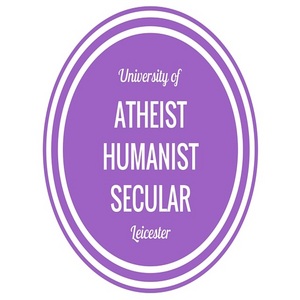

Event Details
15 March 2016 LSE Atheist Society Event
Event Details
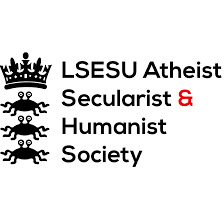

LSE Atheist Society Event
Time
(Tuesday) 6:00 pm - 9:00 pm
Location
See post
address
2016mon14mar6:00 pmmon8:00 pmWomen's Rights in the Middle East, UCLU6:00 pm - 8:00 pm address
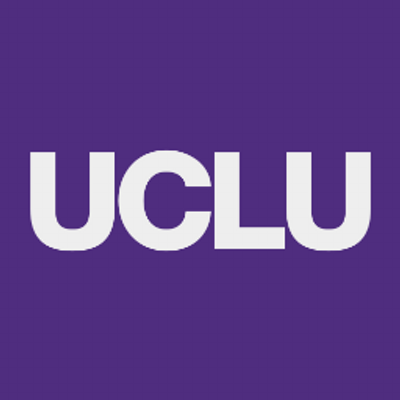




Event Details
UCLU Iranian and Kurdish Societies are organising an event on Women’s Rights in The Middle East on 14 March 2016 from 6-8pm. Maryam Namazie will be speaking on the issue
Event Details
UCLU Iranian and Kurdish Societies are organising an event on Women’s Rights in The Middle East on 14 March 2016 from 6-8pm. Maryam Namazie will be speaking on the issue with Quilliam’s Usama Hassan.
Time
(Monday) 6:00 pm - 8:00 pm
Location
See post
address
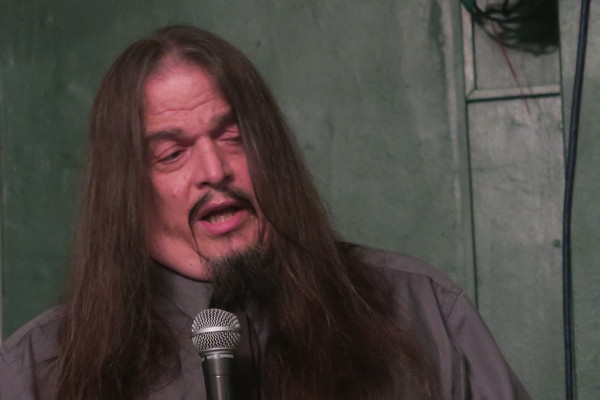

Event Details
10 March 2016, central London by Kings Cross station, 19:00-21:00 hours Evening with Atheist Vlogger and Activist AronRa £3 entry (waged); £1 entry (unwaged). E-mail exmuslimcouncil@gmail.com to register if this is the first time you will be attending our monthly meetups.
Event Details
10 March 2016, central London by Kings Cross station, 19:00-21:00 hours
Evening with Atheist Vlogger and Activist AronRa
£3 entry (waged); £1 entry (unwaged). E-mail exmuslimcouncil@gmail.com to register if this is the first time you will be attending our monthly meetups.
Time
(Thursday) 7:00 pm - 9:00 pm
Location
Kings Cross
2016wed09mar7:00 pmwed9:00 pmWomen's Liberation in Middle East, University of Kent7:00 pm - 9:00 pm
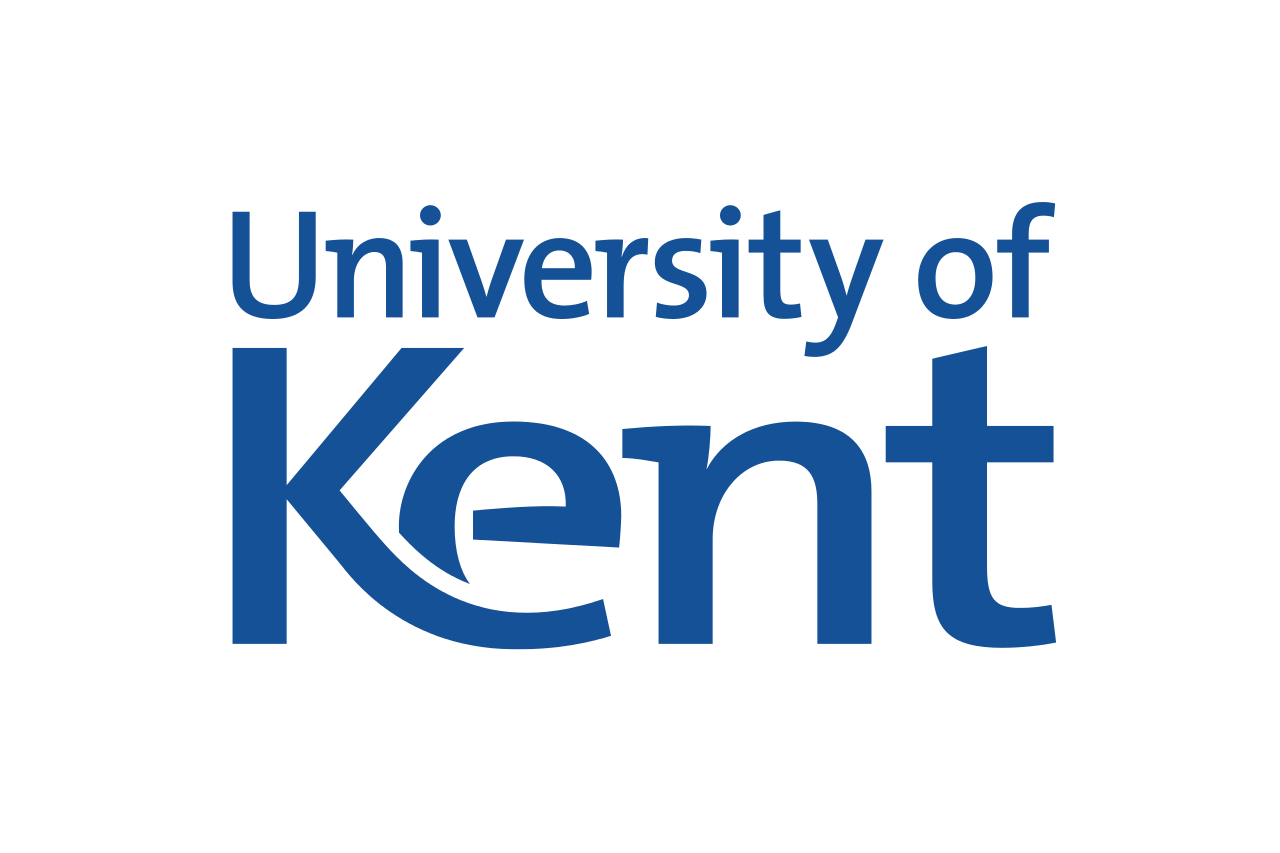

Event Details
9 March 2016, University of Kent Maryam Namazie will take part in a panel on women’s liberation in the Middle East
Time
(Wednesday) 7:00 pm - 9:00 pm
Location
University of Leicester
2016mon07mar7:00 pmmon9:00 pmUniversity of Leicester7:00 pm - 9:00 pm address


Event Details
7 March 2016 Maryam will be speaking at University of Leicester at event organised by Atheists Society.
Event Details
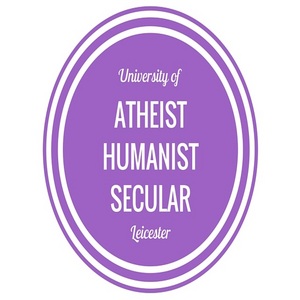

Maryam will be speaking at University of Leicester at event organised by Atheists Society.
Time
(Monday) 7:00 pm - 9:00 pm
Location
See post
address
april 2016
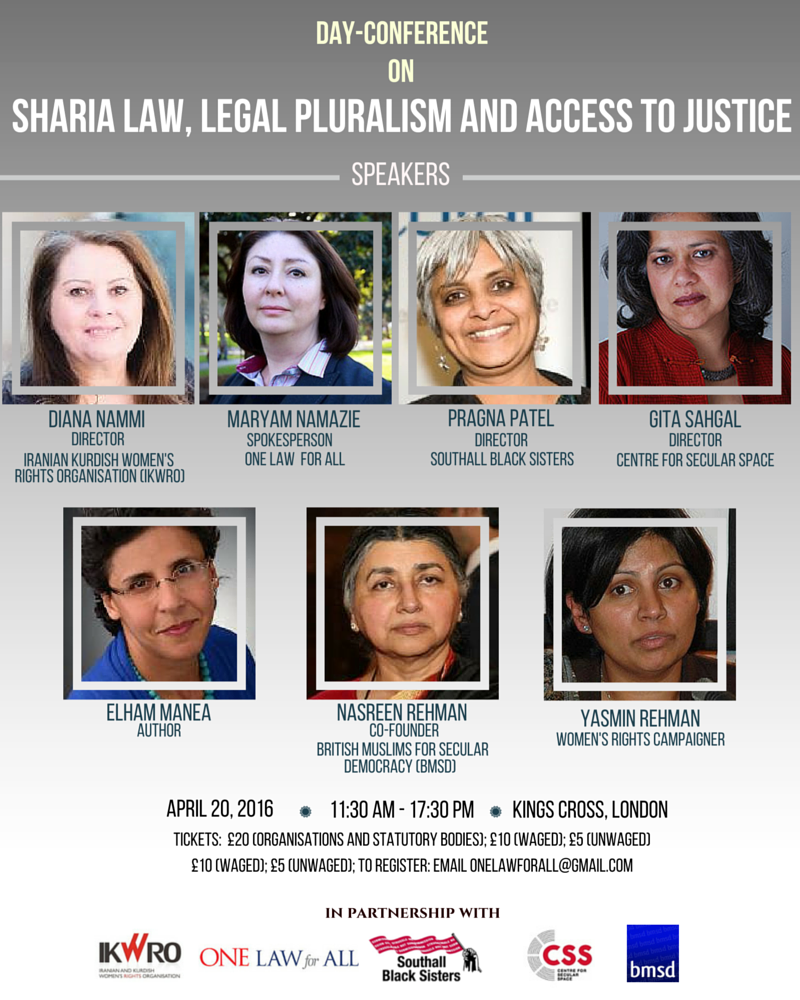

Event Details
Day Conference on Sharia Law, Legal Pluralism and Access to Justice 30 April 2016 11:30am-5:30pm Central
Event Details
Elham Manea will present the findings of her new book Women And Sharia Law: The Impact Of Legal Pluralism In The UK. Women’s rights groups that led successful campaigns preventing public authorities such as the governing body of UK Universities and the Law Society from incorporating aspects of Sharia laws into their public policies will further present their case against Sharia courts and the Beth Din, legal aid cuts, and the denial of access to equality and human rights.
Speakers include:
Diana Nammi, Director of Iranian Kurdish Women’s Rights Organisation
Elham Manea, Author of Women And Sharia Law: The Impact Of Legal Pluralism In The UK
Gita Sahgal, Director of Centre for Secular Space
Pragna Patel, Director of Southall Black Sisters
Maryam Namazie, Spokesperson of One Law for All and Council of Ex-Muslims of Britain
Nareen Rehman, Co-Founder and Chair of British Muslims for Secular Democracy
Yasmin Rehman, Women’s Rights Campaigner
Tickets cost: £20 (organisations and statutory bodies); £10 (waged); £5 (unwaged). No tickets will be sold at the door. To register for the event, please post your name and telephone number with a cheque made payable to One Law for All to BM Box 2387, London WC1N 3XX, UK. You can also purchase tickets on Eventbrite. The event location will be sent to those who purchase tickets.
For any questions or to register, please email onelawforall@gmail.com.
SCHEDULE
11:00-11:30am Registration with tea/coffee
11:30-11:40am Opening with MC Rayhana Sultan, Spokesperson of Council of Ex-Muslims of Britain
11:40-1:10pm Elham Manea, Academic and Author of “Women And Sharia Law: The Impact Of Legal Pluralism In The UK”
1:10-2:30pm Lunch (on your own)
2:30-3:00pm Tea/Coffee Break
3:00-3:15pm Comedy by Kate Smurthwaite
3:15-5:15pm Panel Discussion with Diana Nammi, Director of Iranian Kurdish Women’s Rights Organisation; Gita Sahgal, Director of Centre for Secular Space; Pragna Patel, Director of Southall Black Sisters; Maryam Namazie, Spokesperson of One Law for All and Council of Ex-Muslims of Britain; Nasreen Rehman, Co-Founder of British Muslims for Secular Democracy and Yasmin Rehman, Women’s Rights Campaigner. Panel Chair: Women’s Rights Activist Gina Khan.
5:15-5:30pm Next Steps and Closing
BIOGRAPHIES
Diana Nammi is the Director of Iranian Kurdish Women’s Rights Organisation, which she founded in 2002 to provide advice, advocacy, training and counselling to women and girls from Middle Eastern and North African communities affected by so called “honour” based violence, including forced marriage and Female Genital Mutilation as well as domestic violence. In 2012 she was named in a list of 150 women who shake the world by Newsweek and The Daily Beast. In 2014 she received the Special Jury Women on the Move Award from UNHCR, The Forum and Migrants Rights Network, she was honoured with the Woman of the Year Award and was recognised as one of BBC’s 100 Women. In 2015 she won the Women of Courage Award from the Women’s Refugee Commission in New York, the XX1 Premis Ones Mediterrania Award in Spain and the Red Woman of the Year Community and Charity Award.
Elham Manea is an Associate Professor specialised on the Middle East, a writer, and a human rights activist. She is a Fulbright scholar who holds a PhD degree in political science from the University of Zurich, Master degree in comparative politics from the American University in Washington D.C, and a Bachelor degree in political science from Kuwait University. She has published several academic and non-fiction books including The Arab State and Women’s Rights: The Trap of Authoritarian Governance. She works at the Political Science Institute at the University of Zurich and a consultant for Swiss government agencies and international human rights organizations. Recently, she has been appointed by the Swiss Federal Council as a Member of the Federal Commission for Women Affairs. Her concept of humanistic Islam was first published in a series of articles in Arabic. Her most recent book is: Women And Sharia Law: The Impact Of Legal Pluralism In The UK.
Gina Khan was born in Birmingham to Pakistani Muslim parents. Gina is a Human Rights activist and researcher. Personal experiences prompted Gina to break her silence in 2005 by speaking out in radio debates and writing to local Birmingham newspapers following a traumatic divorce and experience of living as a lone woman and parent in Birmingham. Gina focuses on two main subjects; the rise of pro-jihad ideologies within Muslim communities and the position and status of women within those communities. Gina believes these two twin phenomena to be symptomatic of deeper problems. After speaking out against Jihadism in Birmingham, Gina and her children were forced to leave her home after it was attacked.
Gita Sahgal is a writer, journalist, film-maker and rights activist. She is currently Founder and Director of Centre for Secular Space. She was formerly Head of the Gender Unit at Amnesty International; she was suspended in 2010 after she was quoted criticizing Amnesty for its high-profile associations with the Islamist Moazzam Begg, the director of a campaign group called Cageprisoners. For many years she served on the board of Southall Black Sisters and was a founder of Women Against Fundamentalism and Awaaz : South Asia Watch. With Nira Yival Davis, she edited Refusing Holy Orders: Women and Fundamentalism in Britain (London, 1992). Among her articles are ‘Legislating Utopia? Violence Against Women, Identities and Interventions’ in ‘The Situated Politics of Belonging. During the 1980s, she worked for a Black current affairs programme called ‘Bandung File’ on Channel 4 TV. She made two films about the Rushdie affair, ‘Hullaballoo Over Satanic Verses’ and ‘Struggle or Submission’. She has also made two programmes for Dispatches Channel 4, ‘The Provoked Wife’ on the case of Kiranjit Ahluwalia and ‘The War Crimes File’ an investigation into allegations of war crimes committed by members of the Jamaat I Islami in Bangladesh in 1971.
Kate Smurthwaite is a stand-up comedian and political activist. She has appeared on more than 500 TV and radio shows including This Morning, The Big Questions, Woman’s Hour and The Moral Maze. In 2013 she won a Three Week’s Editor’s Choice Award for her show at the Edinburgh Festival. Kate is a writer for BBC Three show The Revolution Will Be Televised and is the Vice Chair of Abortion Rights UK.
Maryam Namazie is the Spokesperson for One Law for All Campaign against Sharia Law in Britain and the Council of Ex-Muslims of Britain. She hosts a weekly television programme called Bread and Roses broadcast in Iran via New Channel TV. She is on the International Advisory Board of the Raif Badawi Foundation for Freedom; Humanist Laureate at the International Academy of Humanism, Central Committee member of the Worker-communist Party of Iran; National Secular Society Honorary Associate; Honorary Associate of Rationalist International; Emeritus Member of the Secular Humanist League of Brazil; a Patron of London Black Atheists and Pink Triangle Trust and a member of the International Advisory Board of Feminist Dissent. She was awarded Atheist of the Year by Kazimierz Lyszczynski (2014); Journalist of the Year at the Dods Women in Public Life Awards (2013); selected one of the top 45 women of the year by Elle magazine Quebec (2007); one of 2006’s most intriguing people by DNA, awarded the National Secular Society’s Secularist of the Year Award (2005), amongst others.
Nasreen Rehman is an award winning playwright and screenplay writer. She co-founded British Muslims for Secular Democracy. Nasreen believes that for far too long the British public sphere has been ceded to obscurantist voices representing their own version of Islam. BMSD is an organisation that challenges these voices and seeks to appropriate this space in order to forward a different and more enlightened face of Islam – one that is more democratic and equitable. She represents BMSD at conferences in the U.K. and Europe and engages in media debates on topics such as Islamophobia and the hijab. She also serves on the Board of Akademi, a lead organisation for South Asian dance, in Britain; and is a founder member of the Women’s Action Forum (WAF) a women’s rights movement in Pakistan. In the past, she has worked as an economist in the private sector and in development, in the U.K and in Pakistan. As director of the Mahbubul Haq Human Development Centre, in Islamabad she steered the publication of the Report on the Crises of Governance in South Asia, and helped to develop the terms of reference for the Centre’s report on Gender in the region. As trustee of the Runnymede Trust, she served on two national commissions on anti-Semitism and Islamophobia, respectively.
Pragna Patel is Founder and Director of the Southall Black Sisters and Women Against Fundamentalism. SBS is, a multi-award-winning women’s organisation founded in 1979 to address the needs of black and minority women experiencing gender violence. It successfully campaigned for the release of Kiranjit Ahluwalia, a landmark case in which an Asian woman was convicted of the murder of her violent husband. The case reformed homicide law, creating greater awareness within and outside minority communities. Pragna is also a co-founder of Women Against Fundamentalism. She has also written extensively on race, gender and religion, including ‘Citizenship: Whose Rights?’, ‘Faith in the State? Asian Women’s Struggles for Human Rights in the UK’, and ‘Shrinking Secular Spaces: Asian Women at the Intersect of Race, Religion and Gender’. She was listed in The Guardian’s Top 100 women: activists and campaigners.
Yasmin Rehman is a freelance consultant and doctoral candidate at the School of Oriental and African Studies. Her area of research is polygamy and the law. She has worked for more than 20 years predominantly on violence against women, race, faith and gender, and human rights. Yasmin has worked for Local Government, the Metropolitan Police Service as Director of Partnerships and Diversity (2004-08) during which time she also held the Deputy national lead for forced marriage and honour based violence. Yasmin has most recently been commissioned as founding CEO of a race equality charity in East London, followed by Transforming Rehabilitation bid and now reviewing police responses to domestic abuse for national charities. Yasmin is currently member of the Board of EVAW (End Violence Against Women Coalition), an Independent Adviser for City of London Police and a member of the Centre for Secular Space.
more
Time
(Saturday) 11:30 am - 5:30 pm
Location
See post
address
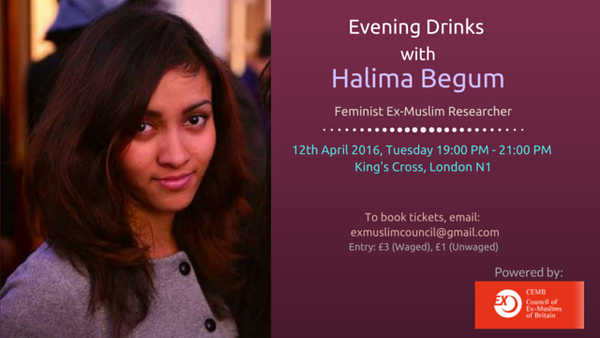

Event Details
12 April 2016, central London by Kings Cross station, 19:00-21:00 hours Evening with Halima Begum, ex-Muslim feminist researcher and blogger. After a decade-long journey from Sunni and Shia Islam over Islamism to Secular
Event Details
12 April 2016, central London by Kings Cross station, 19:00-21:00 hours
Evening with Halima Begum, ex-Muslim feminist researcher and blogger. After a decade-long journey from Sunni and Shia Islam over Islamism to Secular Liberalism, Halima wrote a study on “British ex-Muslims: Negotiating the Essential and the Revolutionary”, which won the Best Dissertation Award at Birkbeck University in 2014. Halima plans to expand her research to incorporate a gendered experience of Ex-Muslim apostasy. Being a seasoned Ex-Muslim, Halima is keen to promote freedom of expression and uphold rights of personal autonomy. She hopes to share her journey and help others find the best way they can be true to themselves.
£3 entry (waged); £1 entry (unwaged). E-mail exmuslimcouncil@gmail.com to register if this is the first time you will be attending our monthly meetups.
more
Time
(Tuesday) 7:00 pm - 9:00 pm
Location
Kings Cross
may 2016
june 2016


Event Details
27 June 2016, central London by Kings Cross station, 19:00-21:00 hours Evening with Yasmin Rehman, Centre for Secular Space on Polygamy £3 entry (waged); £1 entry (unwaged). E-mail exmuslimcouncil@gmail.com to
Event Details
27 June 2016, central London by Kings Cross station, 19:00-21:00 hours
Evening with Yasmin Rehman, Centre for Secular Space on Polygamy
£3 entry (waged); £1 entry (unwaged). E-mail exmuslimcouncil@gmail.com to register if this is the first time you will be attending our monthly meetups.
Time
(Monday) 7:00 pm - 9:00 pm
Location
See post
address
2016sat25jun6:00 amsat9:00 amLondon Black Atheists6:00 am - 9:00 am address
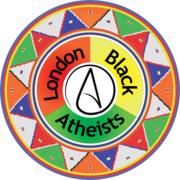



Event Details
Imad Iddine Habib and Rayhana Sultan speak at a London Black Atheist event on Saturday 25th June on “We won’t fast: Defying fasting laws in North Africa”
Event Details
Imad Iddine Habib and Rayhana Sultan speak at a London Black Atheist event on Saturday 25th June on “We won’t fast: Defying fasting laws in North Africa”
Time
(Saturday) 6:00 am - 9:00 am
Location
See post
address
2016fri24jun12:00 amfri6:21 pmFast-defying during Ramadan12:00 am - 6:21 pm address


Event Details
On 24 June, from 12:00, we will be organising an “eat-in” at the Saudi, Iranian, Egyptian, Bangladeshi, Pakistani and Moroccan embassies
Event Details
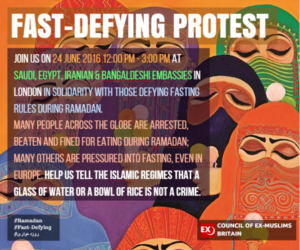

Alternately, you can upload photos of yourself eating during fasting times or holding signs with messages of solidarity using hashtag: #IWillNotFast #لن_اصوم #روزه خوارى #Ramadan until the end of Ramadan. Happy fast-defiance!
To participate, join Facebook page or email exmuslimcouncil@gmail.com.
Here is more information on the day:
ENGLISH
ARABIC
FRENCH
URDU
FARSI
more
Time
(Friday) 12:00 am - 6:21 pm
Location
See post
address
2016sat18jun10:00 amsat7:00 pmMuslimish 2016 Annual Conference10:00 am - 7:00 pm address






Event Details
It is with great pleasure that we invite you to the Muslimish 2016 Annual Conference! The conference will be held on June 18, 2016, from 10:00 AM to 7:00 PM
Event Details
It is with great pleasure that we invite you to the Muslimish 2016 Annual Conference! The conference will be held on June 18, 2016, from 10:00 AM to 7:00 PM (EDT) at the Pennsylvania Hotel – 401 7th Ave, New York, NY 10001. The full-day event will host many speakers and cover a wide range of topics, including Why Muslimish?, The Right to Dissent, Promoting Science, and Fighting Blasphemy Laws. If you are a pioneer of truth and believe in freedom of conscience for all human beings, this conference is for you!
Background:
In recent years, progressive Muslims, ex-Muslims, and even regular Muslims are finding less and less space to question the establishment and live according to their own conscience. One of the main objectives of Muslimish is to provide an environment that supports and fosters discussion, questioning, and free speech. Additionally, in a century marked by great scientific progress and advancements in human thought, blasphemy and apostasy are still illegal in many countries, with Muslim-majority countries accounting for 75% of all countries that outlaw blasphemy and 100% that outlaw apostasy! This is simply unacceptable and must be stopped!
Muslimish Mission Statement:
Create a safe, supportive, and open-minded environment for the exchange of thoughts and ideas among current and former Muslims, foster a pluralist society that respects the rights of all individuals to live according to their conscience, and strive to abolish blasphemy and apostasy laws across the globe.
The Conference:
Entry into the conference will begin at 9:00 AM (EDT). Bagels and coffee refreshments will be provided. The conference will also contain two breaks for lunch and dinner. Please visit Muslimish website to reserve your spot. We hope to see you there!
You can also sign up to the Facebook Event Page.
more
Time
(Saturday) 10:00 am - 7:00 pm
Location
See post
address
2016sun12junAll Day“Mean Tweets party”(All Day: sunday) address


Event Details
12 June 2016 “Mean Tweets party” – reading and filming mean tweets received by apostates. To join, email exmuslimcouncil@gmail.com or join
Event Details


“Mean Tweets party” – reading and filming mean tweets received by apostates. To join, email exmuslimcouncil@gmail.com or join Facebook Page.
Time
All Day (Sunday)
Location
See post
address
july 2016



Event Details
18 July 2016 Evening Drinks with lawyer Ana González on apostasy and asylum. Ana will go through the procedures and also provide one-on-one advice during the evening. E-mail exmuslimcouncil@gmail.com to
Event Details
18 July 2016
Evening Drinks with lawyer Ana González on apostasy and asylum. Ana will go through the procedures and also provide one-on-one advice during the evening. E-mail exmuslimcouncil@gmail.com to register if this is the first time you will be attending our monthly London meetups – otherwise just show up.
Time
(Monday) 7:00 pm - 9:00 pm
Location
See post
address
2016sat09julAll DayWorkers' Liberty annual summer festival(All Day: saturday) address
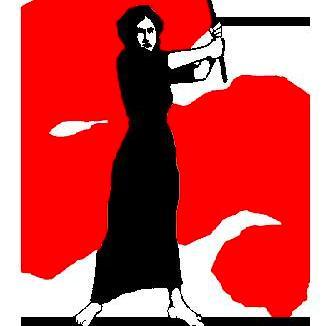

Event Details
9-10 July 2016 Workers’ Liberty annual summer festival, Ideas for Freedom Can religion play a progressive role in politics? With Maryam Namazie; Kate Harris; and Lev Taylor. The fight for free speech
Event Details
9-10 July 2016
Workers’ Liberty annual summer festival, Ideas for Freedom
Can religion play a progressive role in politics? With Maryam Namazie; Kate Harris; and Lev Taylor.
The fight for free speech around the world with Gita Sahgal; Melanie Gingell; Imad Habib; and Omar Raii.
Time
All Day (Saturday)
Location
See post
address
september 2016
2016wed14sepAll Dayfri16Keele international symposium on child protection, Shaffordshire(All Day)


Event Details
14-16 September 2016 Keele international symposium on Changing times, changing minds: Child Protection and bodily integrity, Staffordshire
Time
september 14 (Wednesday) - 16 (Friday)
Location
Staffordshire
october 2016


Event Details
24 October 2016 Religion, Spirituality and End of Life Care Event organised by Royal Society of Medicine
Event Details
24 October 2016
Religion, Spirituality and End of Life Care Event organised by Royal Society of Medicine
Time
(Monday) 7:00 pm - 9:00 pm
Location
See post
address
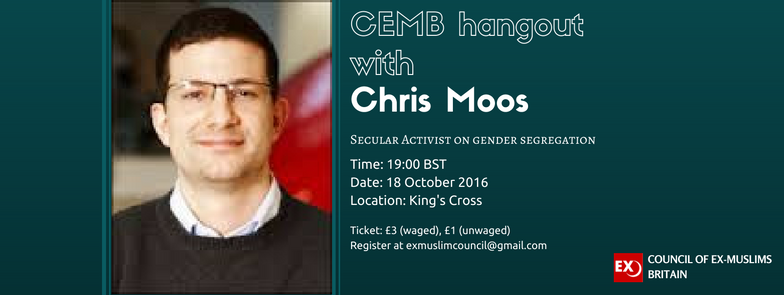

Event Details
18 October 2016, central London by Kings Cross station, 19:00-21:00 hours Evening drinks with Secular Activist Chris Moos on gender segregation at universities The event will be held at our
Event Details
18 October 2016, central London by Kings Cross station, 19:00-21:00 hours
Evening drinks with Secular Activist Chris Moos on gender segregation at universities
The event will be held at our regular meet-up space near Kings Cross station on a Tuesday from now on. You need to register if you have not been to our events before by emailing exmuslimcouncil@gmail.com with your name and phone number. Entry can be paid at the door: £1 unwaged; £3 waged.
Time
(Tuesday) 7:00 pm - 9:00 pm
Location
See post
address
november 2016
2016wed09nov7:00 pmwed9:00 pmBristol University7:00 pm - 9:00 pm address
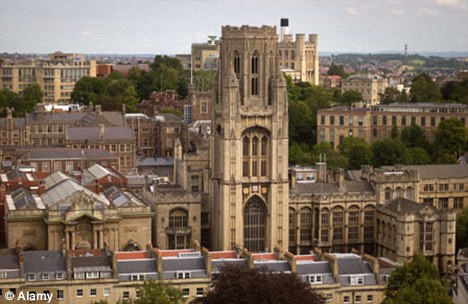

Event Details
Sadia Hameed will be speaking at event organised by Bristol International Affairs Society at Bristol University on 9 November after the screening of Deeyah Khan’s Islam’s Non Believers.
Event Details
Sadia Hameed will be speaking at event organised by Bristol International Affairs Society at Bristol University on 9 November after the screening of Deeyah Khan’s Islam’s Non Believers.
Time
(Wednesday) 7:00 pm - 9:00 pm
Location
See post
address
2016thu03novAll DayAsturian Cooperation for Development, Oviedo, Spain(All Day: thursday) address
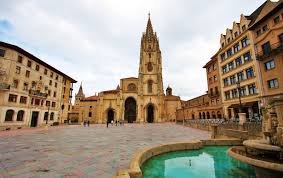

Event Details
Maryam will be debating Islam and women’s equality at the IX Meeting of Asturian Cooperation for Development to be held in Oviedo, Spain on 3 November 2016. This event is
Event Details
Maryam will be debating Islam and women’s equality at the IX Meeting of Asturian Cooperation for Development to be held in Oviedo, Spain on 3 November 2016. This event is organised every two years in Asturias, promoted by CODOPA and organised by a working group consisting of various NGOs that works in Human Development issues. This year’s focus is Refugees and Migration.
Time
All Day (Thursday)
Location
See post
address
december 2016
2016fri09dec6:00 pmfri9:00 pmSecularism, Freedom of Women, LGBT Rights, UCL6:00 pm - 9:00 pm address


Event Details
UCLU Kurdish Society and Culture Project Present: An evening of discussion with activists and experts debating women and LGBTQ rights under Islam. They will be debating why they are struggling for
Event Details
UCLU Kurdish Society and Culture Project Present:
An evening of discussion with activists and experts debating women and LGBTQ rights under Islam. They will be debating why they are struggling for a just, secular and egalitarian world. In addition to why they believe in critiquing and rejecting religious and conventional gender norms and relations.
Date: 09/12/2016
Time: 6:00 pm – 9:00 pm
Address:
Wilkins building, Gustave Tuck Lecture Theatre
2nd Floor, South Junction,
Gower Street WC1E 6BT
Speakers:
Houzan Mahmoud (Kurdish feminist and Cofounder of Culture Project)
Maryam Namazie (Secularist & cofounder of One Law for All)
Farhana Mayer ( Farhana Mayer: Senior Researcher in Islamic Studies)
Berivan Gunes (LLM Student and co-founder of LGBTQ Kurdish platform UK)
Kojin Mirzayi (LLM Student and co-founder of LGBTQ platform UK)
To find out more, please visit event Facebook page.
more
Time
(Friday) 6:00 pm - 9:00 pm
Location
See post
address
january 2015





Event Details
Living in outrageous times: Charlie Hebdo and the culture of offence UCLU Atheist, Secularist and Humanist society hosts this highly topical panel discussion with three excellent speakers. 29 January 2015
Event Details
Living in outrageous times: Charlie Hebdo and the culture of offence
UCLU Atheist, Secularist and Humanist society hosts this highly topical panel discussion with three excellent speakers.
29 January 2015
Chadwick G08, UCL
18:00 hours
Peter Bradley is the director of Speakers’ Corner Trust and former Labour MP. Maryam Namazie is an international firebrand and spokesperson for Iran Solidarity, One Law for All and the Council of ex-Muslims of Britain. She was the first recipient of the National Secular Society’s Secularist of the Year Award. Charlie Klendjian is the secretary of Lawyers’ Secular Society.
In light of the recent events in Paris, we ask: do you have the right not to be offended? And if so, at what cost?
There will be free drinks for members.
For more information, go to Facebook Page.
more
Time
(Thursday) 6:00 pm - 9:00 pm
Location
Chadwick
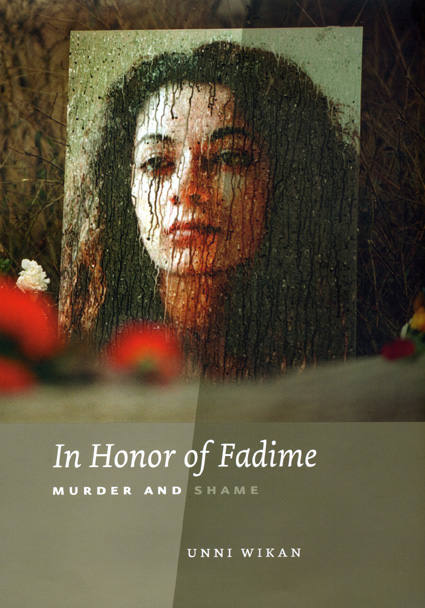

Event Details
17-19 January 2015 12th Anniversary of Fadime Sahindal's honour killing, Stockholm, Sweden Maryam Namazie will take part in events commemorating the honour killing of Fadime Sahindal. She will speak at 17 January 2015 event from 14.30-17.00 in Berns Salongerand and also at an International Conference at the Swedish parliament.
Event Details
17-19 January 2015
12th Anniversary of Fadime Sahindal’s honour killing, Stockholm, Sweden
Maryam Namazie will take part in events commemorating the honour killing of Fadime Sahindal. She will speak at 17 January 2015 event from 14.30-17.00 in Berns Salongerand and also at an International Conference on Förstakammarsalen at the Swedish parliament in cooperation with FP and MP Robert Hannah on 19 January from 10.00-17.00 organised by Never forget Pela and Fadime National organisation- GAPF. For more detailed information please visit their website.
more
Time
january 17 (Saturday) - 19 (Monday)
Location
Stockholm
february 2015
2015sat28feb7:00 pmsat9:00 pmSheffield Freethought Convention, Sheffield7:00 pm - 9:00 pm
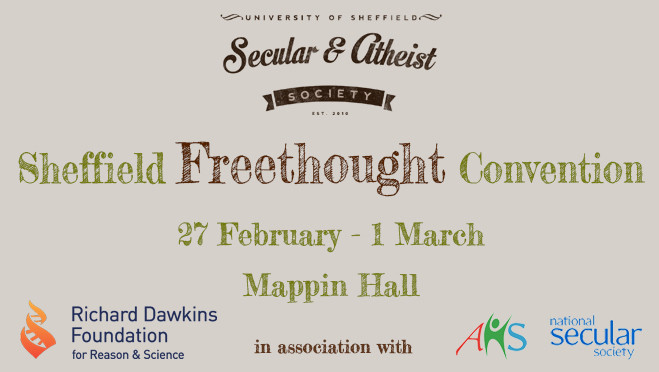

Event Details
28 February 2015 Sheffield Freethought Convention, Sheffield Amal Farah will speak at the Sheffield Freethought Convention organised by the University of Sheffield Atheist and Secular Society.
Event Details
28 February 2015
Sheffield Freethought Convention, Sheffield
Amal Farah will speak at the Sheffield Freethought Convention organised by the University of Sheffield Atheist and Secular Society. More information is available here.
Time
(Saturday) 7:00 pm - 9:00 pm
Location
Sheffield
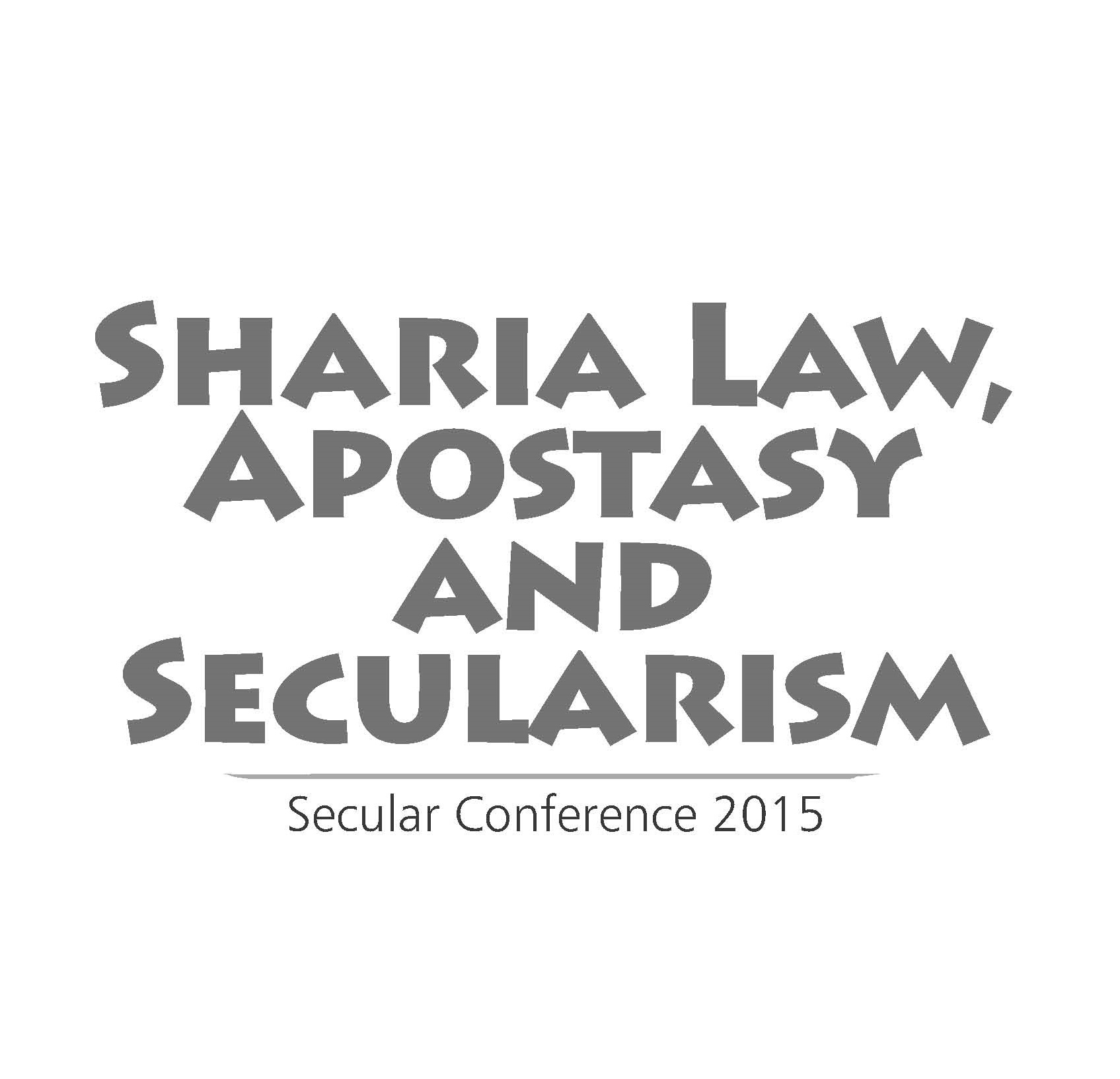

Event Details
CONFERENCE HAS SOLD OUT – NO MORE TICKETS AVAILABLE. 7 February 2015 Sharia Law, Apostasy and Secularism Day-Conference Near London Kings Cross 9:30am registration for 10:30am start The day-conference will include discussions on Charlie
Event Details
CONFERENCE HAS SOLD OUT – NO MORE TICKETS AVAILABLE.
7 February 2015 Sharia Law, Apostasy and Secularism Day-Conference
Near London Kings Cross
9:30am registration for 10:30am start
The day-conference will include discussions on Charlie Hebdo and freedom of expression, apostasy and blasphemy laws, Islamism and the religious-Right, Sharia in the Law, Educational System and Public Policy, as well as Secularism and Citizenship Rights. Speakers will discuss the successful campaigns against the Law Society and Universities UK and how the fight for equal rights and an end to discrimination against ex-Muslims and for free expression are integral to the urgent fight against Islamism and the religious-Right and for a secular society. See agenda below.
Speakers at the 7 February conference will include Activist Ahmed Idris, Campaigner for Secular Education Aliyah Saleem, Spokesperson of the Council of Ex-Muslims of Britain Amal Farah, Activist Atoosa Khatiri, Secular Activist Chris Moos, Director of the Centre for Secular Space Gita Sahgal, Founder of the Council of Ex-Muslims of Morocco Imad Iddine Habib, Spokesperson of One Law for All Maryam Namazie, Spokesperson of the Council of Ex-Muslims of Britain Nahla Mahmoud, Human Rights Campaigner Peter Tatchell, Southall Black Sisters Director Pragna Patel, Founder of Ex-Muslims of Scotland Ramin Forghani, Nari Diganta’s Rumana Hashem, National Secular Society President Terry Sanderson and Women’s Rights Campaigner Yasmin Rehman. See full biographies below.
CONFERENCE AGENDA
9:30-10:30 Registration with Tea/Coffee
10:30-10:35 Welcome by MCs Ahmed Idris and Atoosa Khatiri
10:35-10:50 Opening Address by Pragna Patel: “The most dangerous and deadly illusion…is to underestimate fundamentalism” – (Salah Chouaki)
10:50-11:00 Tribute by Maryam Namazie to Charlie Hebdo and others: “The Right and Need to Criticise Islam”
11:00-13:00 Sharia Law in State, Law and Education Panel
Chair: Peter Tatchell
Panellists: Aliyah Saleem (“Faith schools in Britain: music is out, compulsory headscarves and CCTV cameras are in”), Chris Moos (“Lessons of Denial and Neglect: New Evidence on Gender Segregation in UK Universities”), Pragna Patel (“Accommodating Religious Codes in the Law: A Case of Moral Blindness”), Rumana Hashem (“Fighting Religion or Fighting Gendered Violence? A Muslim Girl and Sharia in a Secular State”), Yasmin Rehman (“Sometimes it’s hard to be a Muslim”)
13:00-13:05 Ouech Dek Yal Qadi, 20 Ans Barakat
13:05-14:30 Lunch (on your own)
14:30-14:50 Tea/Coffee with Cakes
14:50-15:00 Comedian Kate Smurthwaite
15:00-15:15 Gita Sahgal: “The Power of the Pen: Defending Comic Liberty”
15:15:-15:20 Mali’s Songhoy Blues will not be silenced
15:20-15:25 Julius Wiedemann: “Poster Competition against Hate”
15:25-15:30 Shahin Najafi’s Istadeh Mordan
15:30-17:15 Apostasy, Free Expression and Hate Speech Panel
Chair: Terry Sanderson
Panellists: Amal Farah (“Somali Attitudes to Apostasy”), Imad Iddine Habib (“Blasphemy and Apostasy in Morocco”), Magdulien Abaida (“”Murtad under Islamic Sharia”), Nahla Mahmoud (“The Rise of Islamic Hate Speech and Apostasy Culture in the UK”), Ramin Forghani (“Defending Secularism and its importance for Apostates”)
17:15-17:25 Closing by Maryam Namazie: “Fighting on Multiple Fronts”
1725:-17:30 End
SPEAKER BIOGRAPHIES
Ahmed Idris is an aspiring journalist who has worked with senior politicians (including Lynne Featherstone MP and Diane Abbott MP); researched for think-tanks (including the Royal Institute for International Affairs); contributed to media publications (including Think Africa Press) and is currently an active member of the Liberal Democrats, One Law for All and Council of Ex-Muslims of Britain. He holds a BSc in Law from University of East London.
Aliyah Saleem spent 6 years in an Islamic school in Britain and 1 year in Pakistan. In Britain, she was veiled, prohibited from using a camera and mobile phone. She was expelled when a camera was confiscated during a surprise room check and revealed an unveiled photo of herself. The experience traumatised her and she now campaigns for secular education for all.
Amal Farah is Spokesperson for the Council of Ex-Muslims of Britain and One Law for All. She is Somali-born and was raised in a conservative and literalist Muslim household. Her story was covered in the Telegraph: “I renounced Islam, so my family think I should die” and the Independent: “Allah vs atheism: ‘Leaving Islam was the hardest thing I’ve done’”.
Atoosa Khatiri is an aspiring solicitor, with experience of human rights and medical law. She is an active member of One Law for All and Council of Ex-Muslims of Britain, and co-author of the report Political and Legal Status of Apostates in Islam. She holds a BSc in Law from the University of East London and postgraduate degree from Nottingham Law School.
Chris Moos is a secular student activist. After getting harassed and threatened with physical removal by his university he has led a successful campaign for the right to wear ‘Jesus and Mo’ t-shirts, and co-organised the campaign against gender segregation, as well as the campaign in support of Maajid Nawaz, all of which received national news coverage. Chris was a nominee for the Secularist of the Year 2014 award.
Gita Sahgal is an Indian-born writer, journalist, film-maker and rights activist. She is currently Director of Centre for Secular Space, and a co-founder and active member of Southall Black Sisters and Women against Fundamentalism. In February 2010, she was suspended by Amnesty International as head of its Gender Unit after she was quoted criticizing Amnesty for its high-profile associations with Moazzam Begg, the director of a campaign group called Cageprisoners.
Imad Iddine Habib is a Moroccan atheist threatened for his atheism. He is founder of the Council of Ex-Muslims of Morocco, the first public atheist organisation in a country with Islam as the state religion. The Council of Ex-Muslims of Britain declared May 15 “International Imad Day” in order to galvanise support for his case. His case was also highlighted in a 2013 CEMB report on the political and legal status of apostates in Islam.
Kate Smurthwaite is a stand-up comedian and political activist. She has appeared on more than 500 TV and radio shows including This Morning, The Big Questions, Woman’s Hour and The Moral Maze. In 2013 she won a Three Week’s Editor’s Choice Award for her show at the Edinburgh Festival. Kate is a writer for BBC Three show The Revolution Will Be Televised and is the Vice Chair of Abortion Rights UK.
Maryam Namazie is Spokesperson for Fitnah, One Law for All and Council of Ex-Muslims of Britain; editor of Fitnah’s Unveiled; Central Committee member of the Worker-communist Party of Iran; and National Secular Society Honorary Associate. She was awarded Journalist of the Year Dods Women in Public Life Awards and was NSS’s 2005 Secularist of the Year Award winner. She is the producer and co-host of Bread and Roses TV.
Nahla Mahmoud is an environmentalist and human right activist originally from Sudan. She works with a number of campaigns in the UK including One Law for All and Secular Middle East and North Africa. She leads the Sudanese Humanists Group and is Spokesperson for the Council of Ex-Muslims of Britain.
Peter Tatchell has been campaigning for rights and global justice since 1967. He is a member of the queer human rights group OutRage! and is the Green Party’s spokesperson on human rights. New Statesman readers voted him sixth on their list of “Heroes of our time”; he was Campaigner of the Year in The Observer Ethical Awards, Evening Standard’s 1000 Most Influential Londoners and the 2012 Secularist of the Year winner amongst others.
Pragna Patel is a founding member of the Southall Black Sisters and Women Against Fundamentalism. She has also written extensively on race, gender and religion, including ‘Citizenship: Whose Rights?’, ‘Faith in the State? Asian Women’s Struggles for Human Rights in the UK’, and ‘Shrinking Secular Spaces: Asian Women at the Intersect of Race, Religion and Gender’. She was listed in The Guardian’s Top 100 women: activists and campaigners.
Ramin Forghani is the Iranian-born founder of Ex-Muslims of Scotland, an organisation affiliated with the Council of Ex-Muslims of Britain and the Vice Chair of the Scottish Secular Society.
Rumana Hashem is a Bangladeshi-born rights activist and a political-sociologist. She is a founding member of Nari Diganta, a secular Bangladeshi women’s organisation in Britain. Currently based at the Centre for Research on Migration, Refugees and Belonging at the University of East London, she completed a doctoral research on gendered and sexualised violence in the armed conflict in south-east Bangladesh. Rumana represents Nari Diganta in the campaign against Sharia Law in the UK.
Terry Sanderson is a writer and journalist and current President of the National Secular Society, which campaigns for the separation of church and state. He was prominent in organising the Protest the Pope demonstrations and is a frequent broadcaster and columnist. He is also a well-known gay rights activist and wrote a media monitoring column for Gay Times for 25 years. He has written seven books.
Yasmin Rehman is a freelance consultant and doctoral candidate at the School of Oriental and African Studies. Her area of research is polygamy and the law. She has worked for more than 20 years predominantly on violence against women, race, faith and gender, and human rights. Yasmin has worked for Local Government, the Metropolitan Police Service as Director of Partnerships and Diversity (2004-08) during which time she also held the Deputy national lead for forced marriage and honour based violence. Yasmin has most recently been commissioned as founding CEO of a race equality charity in East London, followed by Transforming Rehabilitation bid and now reviewing police responses to domestic abuse for national charities. Yasmin is currently member of the Board of EVAW (End Violence Against Women Coalition), an Independent Adviser for City of London Police and a member of the Centre for Secular Space.
CONFERENCE SPONSORS
Bread and Roses TV
Council of Ex-Muslims of Britain
Equal Rights Now-Organisation against Women’s Discrimination in Iran
Fitnah – Movement for Women’s Liberation
National Secular Society
One Law for All
Richard Dawkins Foundation for Reason and Science UK
Secularism is a Women’s Issue
CONFERENCE CONVENERS
Council of Ex-Muslims of Britain
ex-muslim.org.uk
One Law for All
www.onelawforall.org.uk
more
Time
(Saturday) 9:00 am - 6:00 pm
Location
Kings Cross
march 2015
2015fri27marAll Daytue31Marea Feminist Review Anniversary, Italy(All Day)
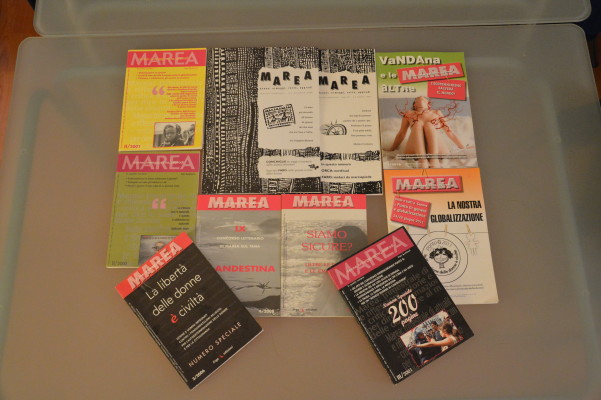

Event Details
27-31 March 2015 Marea Feminist Review Anniversary Maryam Namazie will be speaking at the anniversary celebrations of a feminist review in Genoa, Torino and Imola, Italy.
Event Details
27-31 March 2015
Marea Feminist Review Anniversary, Italy
Maryam Namazie will be speaking at the anniversary celebrations of a feminist review in Genoa, Torino and Imola, Italy with Inna Shevchenko, Nadia El Fani, Marieme Helie Lucas and others.
Details of Genoa event can be found here.
Details of Torino event can be found here: depliant Manifesto Laicità.
More information to follow.
Time
march 27 (Friday) - 31 (Tuesday)
Location
Italy
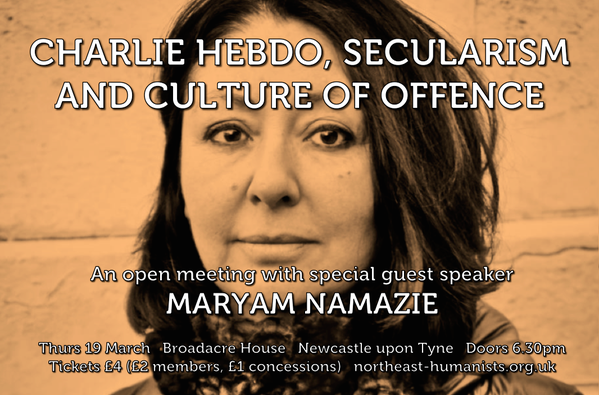

Event Details
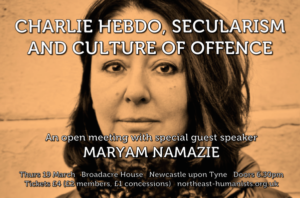


Event Details



18:30 to 21:00 (GMT)
NE Humanists Event, Newcastle
Maryam Namazie will be speaking in Newcastle. More details here,
Time
(Thursday) 6:30 pm - 9:00 pm
Location
Newcastle
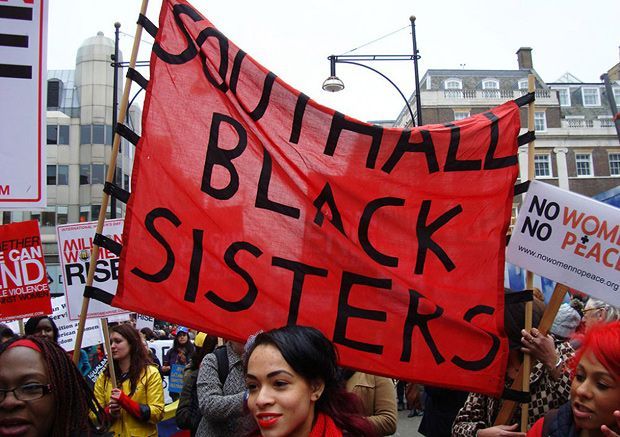

Event Details
16 March 2015, central London by Kings Cross station, 19:00-21:00 hours International Women’s Day evening drinks with Pragna Patel from Southall Black Sisters.
Event Details
16 March 2015, central London by Kings Cross station, 19:00-21:00 hours
International Women’s Day evening drinks with Pragna Patel from Southall Black Sisters.
£3 entry (waged); £1 entry (unwaged). E-mail exmuslimcouncil@gmail.com to register.
Time
(Monday) 7:00 pm - 9:00 pm
Location
Kings Cross
2015sun08mar5:00 pmsun9:00 pmInternational Women's Day with Nari Diganta, London5:00 pm - 9:00 pm
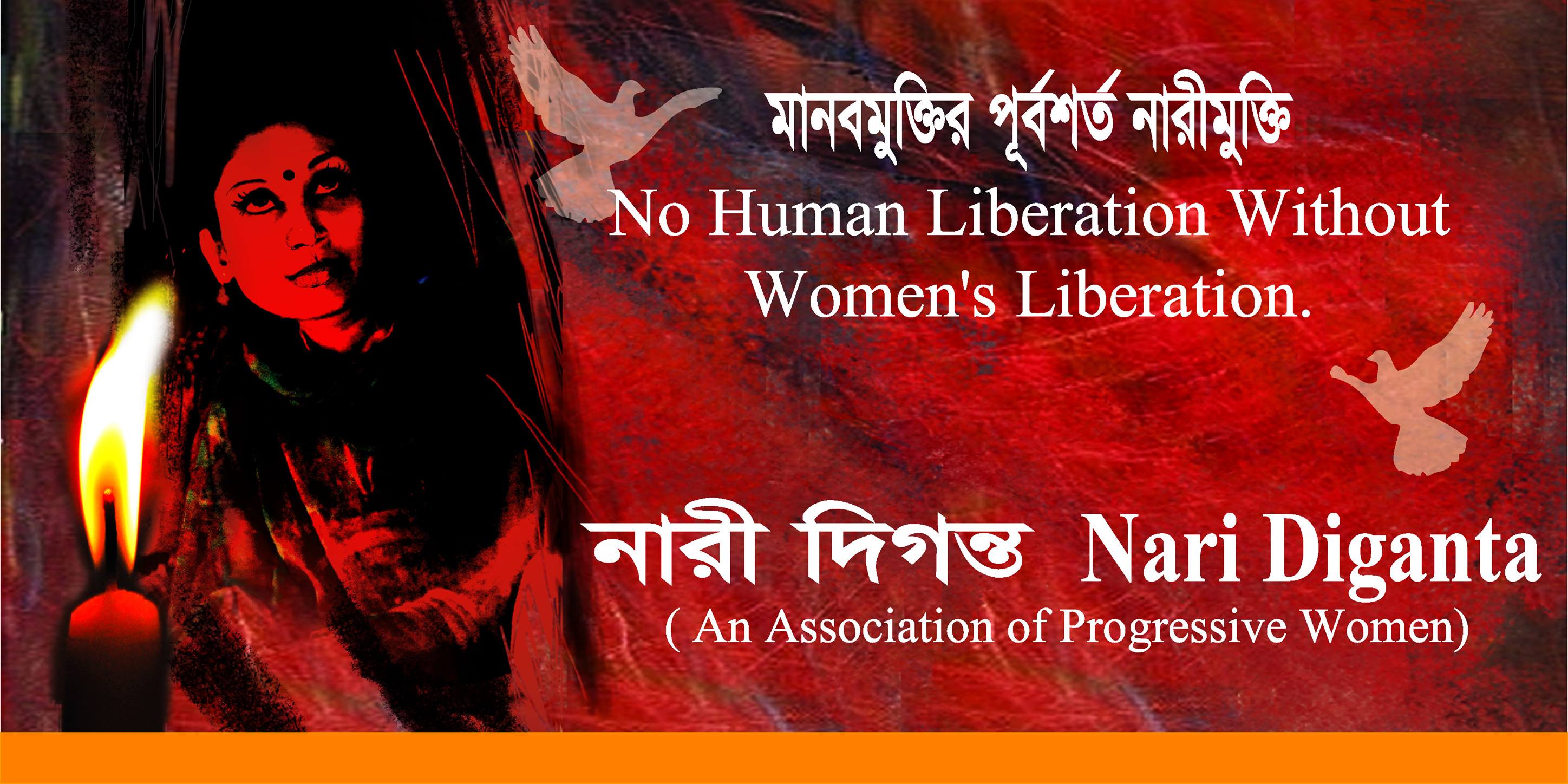

Event Details
Listening to Voices of Creative Bengali Women in London An evening with Film, Dialogue, Music, and Bangla-Feast with Creative Bengali Women on International Women’s Day 2015
Event Details
Listening to Voices of Creative Bengali Women in London
An evening with Film, Dialogue, Music, and Bangla-Feast with Creative Bengali Women on
International Women’s Day 2015
When? 8 March, Sunday, at 5pm – 9pm
Where? Brady Arts Centre, 192- 196 Hanbury Street, London, E1 5HU
Who? Nari Diganta – the Women in Movement for Equality, Social Justice and Secularism
Nari Diganta recognises and celebrates Bengali women’s achievements and struggles in a particular field on every International Women’s Day since its foundation. In 2013 we have celebrated the success and struggles of our women in the field of education, and last year we have focused on Bangladeshi-British women’s struggle in public political sphere. This year Nari Diganta organises an evening to recognise the success and voices of creative Bengali women against bigotry and oppression. We will explore our women’s contribution in the creative field to celebrate and scrutinise the International Women’s Day 2015. You are cordially invited to this free event!
Building on their rich cultural heritage, Bengali women in the UK, particularly the new generation are taking on increasingly confident steps into the British creative landscape in the fields of literature, film making, music, dance, theatre, fine arts and other unusual creative works. Many of these outstanding talents are indigenous to Tower Hamlets. Nari Diganta undertakes a ‘talent hunt’ of creative Bengali women in Tower Hamlets and beyond to celebrate and critically examine these women’s achievements by inviting them to present their talents to a diverse audience. Our core group members and experienced women’s rights activists will engage in a dialogue with the creative women to understand how their works address issues of oppression, inequity and bigotry. This exchange of ideas will address the question as to how loud and clear our creative Bengali women’s works are in terms of addressing minority women’s oppression and bigotry in a world of injustice.
The event is Free. Its filled with fun, film, timely exchange, music and entertainment. But space is limited, so please reserve your place asap.
Programme
5pm: Welcome by Nasima Kajol ‘Greetings from the Four Years Old Nari Diganta’
5:05: Opening Speech by Shamima Begum – ‘Its Time to be Loud and Clear’
5:10pm: Screening of Amazon Souls – An award winning film by Sarah Begum, young British-Bengali woman exploring the Amazon and challenging the environmental destruction through creative work
5:45pm: Creative Women Voices against Oppression – How Loud and Clear Do We Sound?
An Exchange of Ideas between Creative Women and Bengali Women’s Rights Campaigners
6:40pm: ‘Needs to Move Forward’: Commentary by BME Women’s Rights Campaigners
Gita Sahgal and Maryam Namazie
6:50pm: Remarks by Special Guest, High Commissioner of Bangladesh Embassy in London
7:00pm: Bangla Dinner with Special Guest, Creative Women and Women’s Rights Campaigners
7:40pm: Nach Gan Kabita O Bajna – Performance by Bengali Women Artists and Musicians
8:40pm: End of Evening Choir – Presentation by Women in Movement for Equality, Social Justice & Secularism
This programme is intended for a diverse audience and the medium of instruction are English and Bangla. All welcome!
Note: The event will be filmed and it is open to public and mainstream media. Please check out www.naridiganta.org.uk and www.facebook.com/naridiganta for updates and further information.
more
Time
(Sunday) 5:00 pm - 9:00 pm
Location
Brady Arts Centre
2015tue03marAll DayThe Future of Secularism in a Multi-Ethnic UK, LSE(All Day: tuesday)
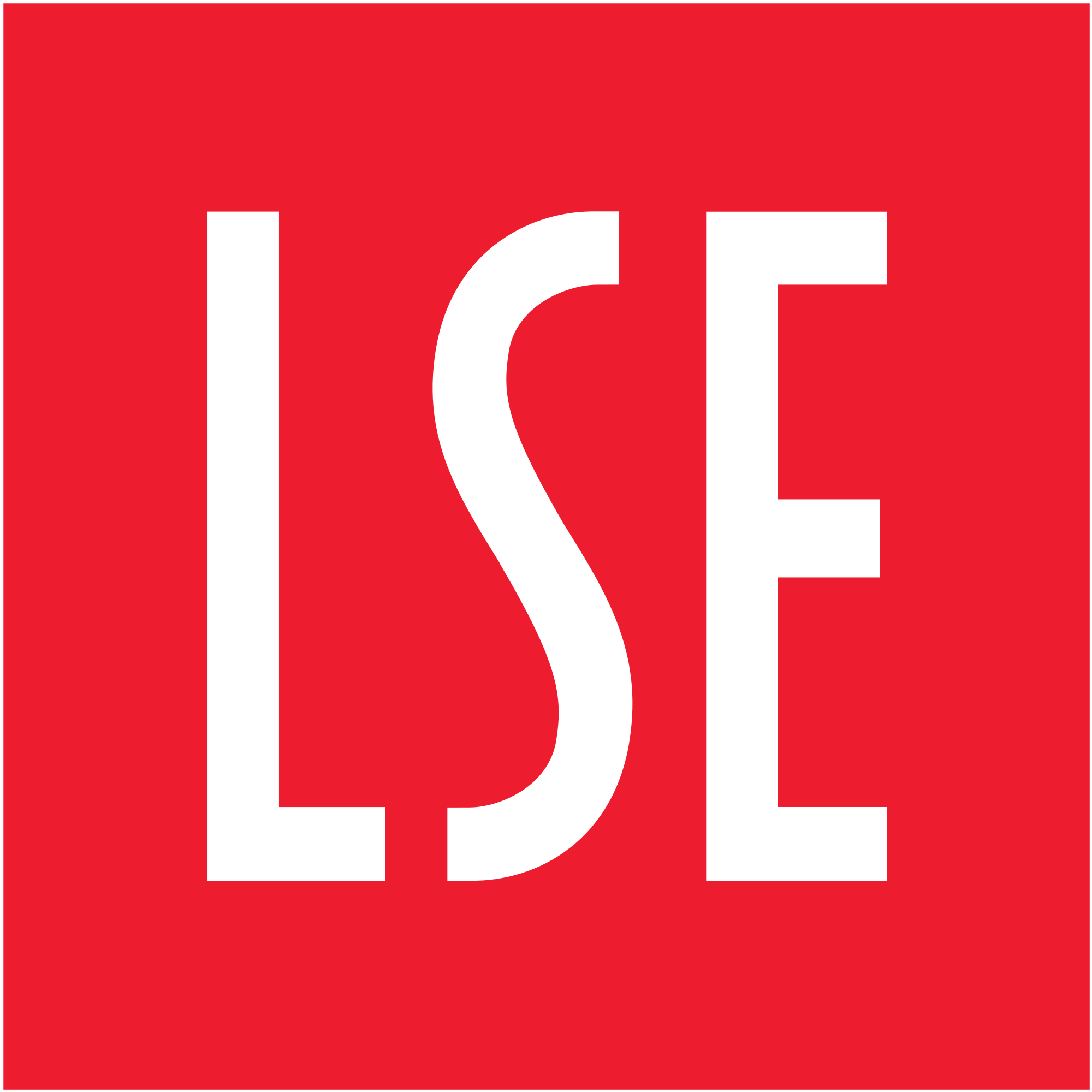




Event Details
Join the LSESU Atheist, Secularist and Humanist Society for an enlightening discussion about the future of secularism in an increasingly multicultural UK. How is secularism in the UK failing ethnic minorities? Does secularism need to change? What type of secularism do we want to see in the UK? Our panel will discuss these and many more tough questions.
Event Details
More information on the event here.
We have always believed the developed world to be an exemplar of secular states. But recent events such as the Charlie Hebdo massacre, as well as the surge in anti-Muslim hate crime, are starting to put this to the test.
Join the LSESU Atheist, Secularist and Humanist Society for an enlightening discussion about the future of secularism in an increasingly multicultural UK. How is secularism in the UK failing ethnic minorities? Does secularism need to change? What type of secularism do we want to see in the UK? Our panel will discuss these and many more tough questions.
The panel consists of such luminaries as-
Pragna Patel – Pragna Patel is Director of Southall Black Sisters and a founding member of Women Against Fundamentalism. She has written extensively on race, gender and religion. Her publications include ‘Citizenship: Whose Rights?’ in Women and Citizenship in Europe: Borders, Rights and Duties, ed. A. Ward et al. (Trentham Books), the ‘The Time Has Come … Asian Women in Struggle’ in Black British Feminism – A Reader, ed. H. S. Mirza (Taylor & Francis), several essays in From homebreakers to jailbreakers 2003 ed. R. Gupta (Zed Books), the ‘Faith in the State? Asian Women’s Struggles for Human Rights in the UK’. Feminist Legal Studies, (2008) Spring issue, R v Zoora (Ghulam) Shah in Feminist Judgments from Theory to Practice September 2010 ed, and ‘Shrinking Secular Spaces: Asian Women at the Intersect of Race, Religion and Gender with Hannana Siddiqui in ‘Violence Against Women in South Asian Communities’ (Jessica Kinglsey Publishers).
Gita Sahgal – Gita Sahgal is world-renowned activist , and a founder of the Centre for Secular Space, which opposes fundamentalism, amplifies secular voices and promotes universality in human rights. She was formerly Head of the Gender Unit at Amnesty International. She is a film maker and writer. For many years she served on the board of Southall Black Sisters and she was a founder of Women Against Fundamentalism and Awaaz: South Asia Watch.
Maryam Namazie – Maryam Namazie is a political activist, campaigner and blogger. She is the Spokesperson for Fitnah – Movement for Women’s Liberation, Equal Rights Now, One Law for All Campaign against Sharia Law in Britain and the Council of Ex-Muslims of Britain. She works closely with Iran Solidarity, which she founded, and the International Committee against Stoning. She is current editor of Fitnah’s monthly English publication Unveiled and hosts a weekly television programme in Persian and English called Bread and Roses broadcast in Iran and the Middle East via New Channel TV. Maryam is a Fellow at the Secular Global Institute (2014), Humanist Laureate at the International Academy of Humanism (2013), Central Committee member of the Worker-communist Party of Iran; National Secular Society Honorary Associate; Honorary Associate of Rationalist International and Emeritus Member of the Secular Humanist League of Brazil. In June 2012, The Islamic regime of Iran’s media outlets did an ‘exposé’ on Maryam entitled ‘Meet this anti-religion woman’. Maryam was a character in DV8 Physical Theatre’s Can We Talk About This?, which deals with freedom of speech, censorship and Islam. She was awarded Journalist of the Year at the Dods Women in Public Life Awards (2013); selected one of the top 45 women of the year by Elle magazine Quebec (2007); awarded the National Secular Society’s Secularist of the Year Award (2005); selected ‘Iranian of the Year’ by @[NjQyMTgzOTU5MjA4MTA3Omh0dHBcYS8vSXJhbmlhbi5jb20vOjo=:Iranian.com] readers (1997 and 1998); International Rescue Committee medal recipient (1988); and received the Julia B. Friedman Humanitarian Award (1987).
Tehmina Kazi – Tehmina Kazi took up the position of Director of British Muslims for Secular Democracy in May 2009. Her role includes staff management, governance responsibilities, fundraising, outreach, lobbying, advocacy, media work, policy and strategy development, workshop facilitation and event management. Prior to joining bmsd, she was a Project Officer at the Equality and Human Rights Commission, where she worked on a ground-breaking inquiry into the Human Rights Act and its impact on public service delivery, undertaking research, writing policy briefings, facilitating focus groups and interviewing victims of human rights violations. She also co-organised the first awards ceremony of its kind to acknowledge the achievements of the UK’s most powerful Muslim women, which received widespread coverage in the national press. Tehmina has done extensive research on domestic and international human rights issues, particularly religious freedom, the detention of foreign nationals and gender-based violence. She regularly contributes to forums on civil liberties and citizenship. Tehmina was shortlisted for Cosmopolitan Magazine’s “Ultimate Women of the Year Awards 2011” in the “Campaigner” category for her work. She also won an “Outstanding Achievement” Award at the Syeda Fatima Interfaith Conference at the House of Lords in June 2012.
Keith Porteous Wood – Keith Porteous Wood has been the executive director of the National Secular Society for 17 years. Keith has had major involvement with freedom of expression and equality legislation at the UK and European level; contributing to bills in Commons and Lords on equality, education, blasphemy, freedom of expression, constitutional, home affairs, justice and Racial and Religious Hatred as well as working through the European Parliament Platform for Secularism in Politics (as a member of the advisory board) and on the UN Geneva team of the international umbrella body International Humanist & Ethical Union. He also campaigns actively in Edinburgh, Cardiff and Brussels parliaments and at the Council of Europe and was on the EU Fundamental Rights Agency advisory board in Vienna.
In 2007 Keith received the Distinguished Service to Humanism Award from the International Humanist and Ethical Union for his work in building up the National Secular Society and campaigning for secularism both nationally and internationally.
As the end of term approaches, there couldn’t be a better way to become part of resolving what have already become the year’s most important questions!
The discussion will be followed by a 20 minute Q&A.
It is free and open to all; first come, first served!
This event was made possible by a generous grant from the ‘LSE Annual Fund’.
more
Time
All Day (Tuesday)
Location
LSE
april 2015
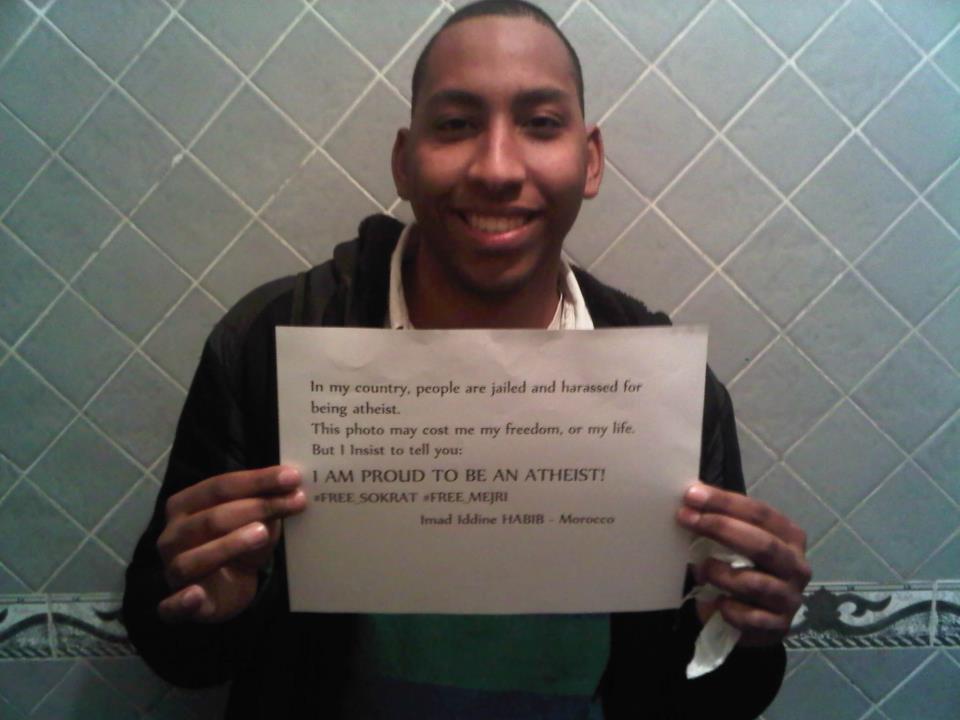

Event Details
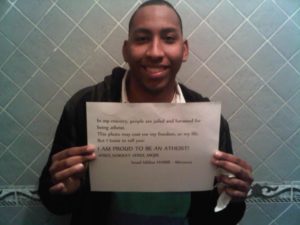


Event Details



Evening drinks with Imad Iddine Habib, Founder of the Council of Ex-Muslims of Morocco.
£3 entry (waged); £1 entry (unwaged).
E-mail exmuslimcouncil@gmail.com to register.
Time
(Monday) 7:00 pm - 9:00 pm
Location
Kings Cross
may 2015
2015sat30mayAll DayBergen International Festival, Norway(All Day: saturday) Norway
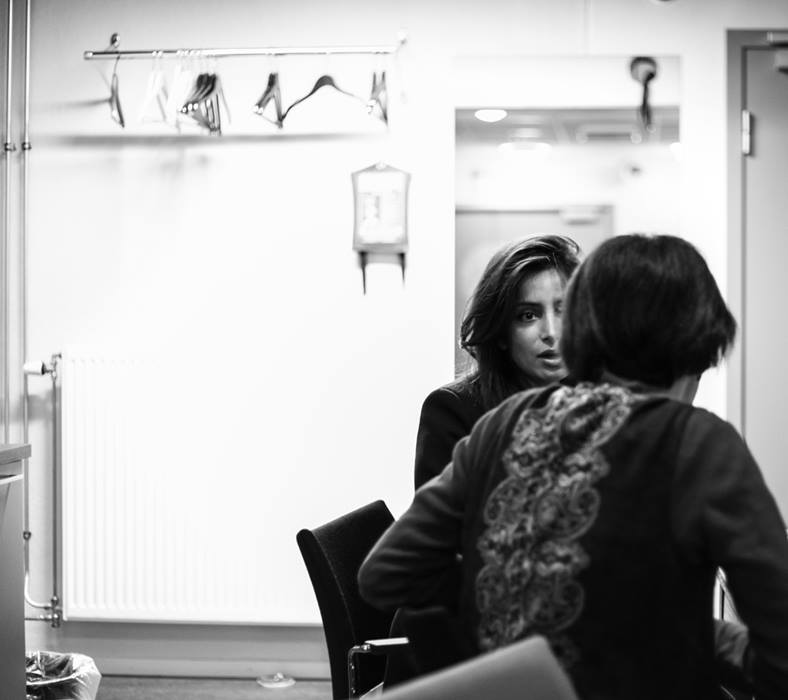

Event Details
Maryam Namazie will be contributing to a panel discussion at the Bergen International Festival, one of the largest music and theatre festivals in the Nordic countries on “Violence against women is the greatest human rights scandal of our times”.
Event Details
30 May 2015
Bergen International Festival, Norway
Maryam Namazie will be contributing to a panel discussion at the Bergen International Festival, one of the largest music and theatre festivals in the Nordic countries on “Violence against women is the greatest human rights scandal of our times”. Other panellists are Film Director and Music producer Deeyah Khan, president of the International Religious Liberty Association andMember of the Nobel committee Gunnar Stålsett, general secretary of Amnesty International Norway John Peder Egenæs and Composer Cecilie Ore whose chamber opera Adam & Eve – a Divine Comedy criticizes ‘how the three monotheistic, patriarch religions: Judaism, Christianity and Islam have promoted the acceptance of violence against women throughout history and are doing so still today.’ More details will follow.
more
Time
All Day (Saturday)
Location
Bergan
Norway
2015fri22mayAll Daysun24International Atheist Convention, Cologne, Germany(All Day)
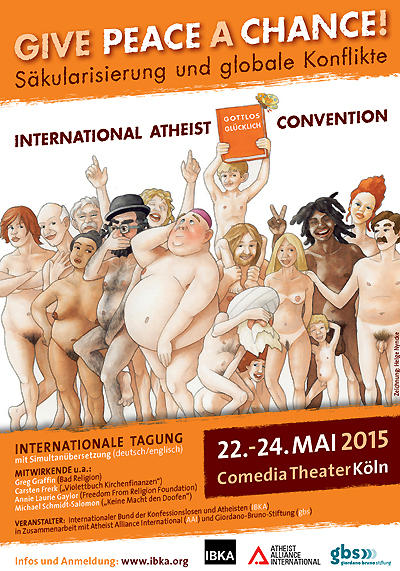

Event Details
22-24 May 2015 International Atheist Convention “Give Peace A Chance -Secularization and global conflicts”, Cologne, Germany Maryam Namazie will be speaking at the conference. More details here.
Event Details
22-24 May 2015
International Atheist Convention “Give Peace A Chance -Secularization and global conflicts”, Cologne, Germany
Maryam Namazie will be speaking at the conference. More details here.
Time
may 22 (Friday) - 24 (Sunday)
Location
Cologne
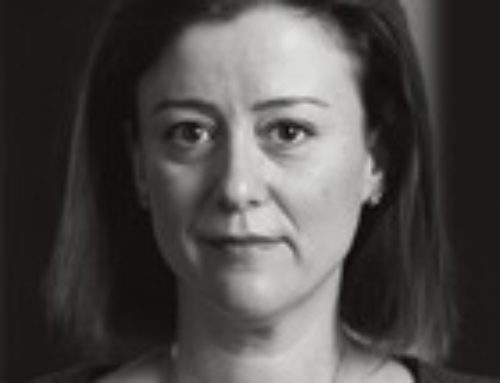


Event Details
18 May 2015, central London by Kings Cross station, 19:00-21:00 hours Apostasy and Asylum Meet-up with Lawyer Ana Gonzales.
Event Details
18 May 2015, central London by Kings Cross station, 19:00-21:00 hours
Apostasy and Asylum Meet-up with Lawyer Ana Gonzales.
£3 entry (waged); £1 entry (unwaged). E-mail exmuslimcouncil@gmail.com to register.
Time
(Monday) 7:00 pm - 9:00 pm
Location
Kings Cross
june 2015












Event Details
Join us for appetisers, drinks, music, speeches and laughs to celebrate the CEMB’s 8th anniversary. Saturday 20 June 2015, 1500-1800 Hours near London Kings Cross Speakers and acts include: Philosopher A C
Event Details
Join us for appetisers, drinks, music, speeches and laughs to celebrate the CEMB’s 8th anniversary.
Saturday 20 June 2015, 1500-1800 Hours near London Kings Cross
Speakers and acts include:
Philosopher A C Grayling
Singer Alya Marquardt
Secular activist Aliyah Saleem
Ex-Muslims North Founder Behzad Sandbad
London Black Atheists Clive Aruede and Lola Tinubu
Bread and Roses TV Host Fariborz Pooya
Centre for Secular Space Director Gita Sahgal
Council of Ex-Muslims of Morocco Founder Imad Iddine Habib
Comedian Kate Smurthwaite
Women’s Rights Activist Magdulien Abaida
Maajid Nawaz, Founder of Quilliam Foundation
CEMB Spokesperson Maryam Namazie
Master Magician Neil Edwards
Southall Black Sisters Director Pragna Patel
Women’s Rights Activist Rumana Hashem
National Secular Society President Terry Sanderson
Tickets: £18 (waged); £10 (unwaged)
To register, please email your name and mobile number to exmuslimcouncil@gmail.com.
You can purchase your ticket(s) via Paypal or by sending a cheque made payable to ‘CEMB’ to: BM Box 1919, London WC1N 3XX.
Space is limited so buy your tickets today.
No tickets will be sold at the door.
more
Time
(Saturday) 3:00 pm - 8:00 pm
Location
Kings Cross












Event Details
Video clips of the speeches at the Council of Ex-Muslim’s 8th Anniversary celebrations can be seen here. Pragna Patel and Kenan Malik who were unable to attend sent CEMB
Event Details
Video clips of the speeches at the Council of Ex-Muslim’s 8th Anniversary celebrations can be seen here. Pragna Patel and Kenan Malik who were unable to attend sent CEMB messages of support, which can be read below.
Message from Pragna Patel, Director of Southall Black Sisters
Dear Friends and Comrades,
I am sorry that I cannot be with you today but my heart and thoughts are with you on your 8th birthday.
SBS is proud to be an ally of CEMB whose courageous work and campaigns against religious fundamentalism and religious dogma continues to inspire and move us. Your very existence moves us to attain new heights in our struggle for freedom and equality and for that I am thankful. Personally, I have a lot to learn from the grit and bravery (and sometimes sheer audacity) shown by Maryam and all the CEMB members who never seem to waver or compromise in the search for truth and justice. We live in truly challenging and depressing times characterised by the resurgence of racism and murderous, reactionary right wing religious political movements with which many on the Left are complicit. The Left’s stance on religious fundamentalism is unfathomable but it continues to terrify me even more than the rise of religious fascism. SBS is only able to confront these chilling developments because of allies like CEMB. You have stood up when no one else will to the enemies of humanity. You have stood up for the rights of apostates and atheists and all dissenters who are punished and killed for their right to challenge, criticise and even leave religion. You are showing the rest of us what true courage means. We are so proud to walk side by side with you.
A Happy, Happy Birthday – you are so needed!
In sisterhood and solidarity
Message from author Kenan Malik
Dear friends,
I am sorry not to be with you today at your celebration. The CEMB is a vital organization whose work is of great importance.
We live in an age of much political and moral confusion. An age in which much of the left has lost its attachment to traditional progressive politics of liberty, equality and free speech. When the meaning of such ideas has often been turned on its head, when concepts of liberty and equality are often used to deny people those very rights.
The CEMB plays an immense role in defending the rights and liberties that need defending, in challenging bigotry from both sides, and in standing in solidarity with so many fighting for the most basic of rights. It has been an honour working with Maryam and the CEMB over many years and on many issues.
So, have a great day today. And I hope to see you all at the 9th anniversary celebrations.
In solidarity
more
Time
(Saturday) 1:00 am - 1:00 am
Location
See post
address
2015sat20junAll Day8th Anniversary Celebrations of CEMB Videos(All Day: saturday)












Event Details
Council of Ex-Muslims of Britain’s 8th anniversary celebrations, London, 20 June 2015 Masters of Ceremony: Fariborz Pooya and Behzad Sandbad Council of Ex-Muslims of Britain held its 8th anniversary celebrations in London
Event Details
Council of Ex-Muslims of Britain’s 8th anniversary celebrations, London, 20 June 2015
Masters of Ceremony: Fariborz Pooya and Behzad Sandbad
Council of Ex-Muslims of Britain held its 8th anniversary celebrations in London on 20 June 2015. Below are the videos of the event. You can also see some photos here.
CEMB gives inspiration and hope across the world
National Secular Society President Terry Sanderson
It’s people fleeing religious persecution that will stand against Islamism not representatives of “British Islam”
Centre for Secular Space Director Gita Sahgal
I don’t remember the voice of my mother any more
Founder of Council of Ex-Muslims of Morocco’s Imad Iddine Habib
I hope one day there will be no need for CEMB
London Black Atheist Lola Tinubu
Support means the world to ex-Muslims
Secular Activist Aliyah Saleem
Being ex-Muslim is not a sin
Women’s Rights Activist Magdulien Abaida
CEMB is the name of emancipation
Women’s Rights Activist Rumana Hashem
Like having a secret you cannot share
Comedian Kate Smurthwaite
Activist Rayhana Sultan reads a message from Pragna Patel, Director of Southall Black Sisters
Read message from Southall Black Sisters Director Pragna Patel here.
Read message from author Kenan Malik here.
Importance of being liberated
Philosopher AC Grayling
Universal values are worth fighting for
Maajid Nawaz, Founder of Quilliam Foundation
In the age of ISIS, we refuse to submit
Maryam Namazie, Spokesperson of the Council of Ex-Muslims of Britain
more
Time
All Day (Saturday)
Location
London
2015wed17junAll Day17 June Day of Action for Raif Badawi(All Day: wednesday)
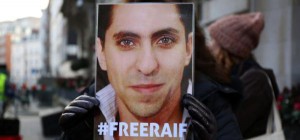

Event Details
Activist and blogger Raif Badawi was first arrested on 17 June 2012. Three years later he remains in prison on charges
Event Details
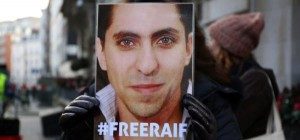

Activist and blogger Raif Badawi was first arrested on 17 June 2012. Three years later he remains in prison on charges that are politically motivated. To mark the third anniversary of his arrest we are holding a Day of Action here in London.
Raif Badawi had already spent almost two years in prison before being convicted in May 2014 for ‘insulting Islam’ and founding a liberal website. He received a fine of 1 million riyals (£175,000) and a ten-year prison sentence. In addition, the court in Jeddah sentenced Badawi to 1,000 lashes.
On 9 January 2015, after morning prayers, Badawi was flogged 50 times. This punishment was due to continue every Friday until he had received a total of 1,000 lashes. However, subsequent floggings have not gone ahead, initially because Badawi was deemed not to have recovered sufficiently from the previous punishment. No explanation has been given for the postponement of further floggings. Furthermore, the Supreme Court has now announced its decision to uphold this draconian sentence.
Meanwhile, Badawi’s lawyer and brother-in-law Waleed Abulkhair, is serving 15 years in prison, for his peaceful activism.
We call for Raif Badawi’s sentence of flogging to be overturned, as well as for his conviction to be quashed.
We demand that the Saudi authorities release Raif Badawi and Waleed Abulkhair immediately.
We urge the UK government to cease providing arms to the Saudi government whilst it continues to abuse human rights.
Join us.
17 June 2015 Day of Action for Raif Badawi
From 1.30pm – Protest Letter Delivery at Downing Street:
Organisations and individuals actively campaigning for Raif Badawi’s release will be holding a rally opposite Downing Street from 1.30pm. At 2pm, comedian Kate Smurthwaite and activist Peter Tatchell will join Jo Glanville (Director, English PEN), Maryam Namazie (One Law for All and International Front for Secularism), Pete Radcliff (Free Raif UK) and Melody Patry (Index on Censorship) to deliver a letter signed by over 600 groups and individuals to the Prime Minister.
From 6.30pm – Public meeting at Portcullis House:
Representatives of campaigning organisations will come together with MPs to discuss and consider how best to secure the release of Raif Badawi and Waleed Abulkhair. Speakers include:
• Natalie Bennett, Leader, Green Party
• Ann Feltham, Parliamentary Co-ordinator, Campaign Against Arms Trade
• Jo Glanville, Director, English PEN
• Stewart McDonald, Scottish National Party
• John McDonnell, Labour Party, Hayes and Harlington
• Maryam Namazie, Spokesperson, One Law for All
• Peter Tatchell, Director, Peter Tatchell Foundation
The meeting will take place in the Boothroyd Room on the first floor of Portcullis House. The entrance to Portcullis House is on the Victoria Embankment. Please be aware that there will be standard security searches as with many other government buildings.
Social Media Protest
We’re also asking people across the world to join the Day of Action on social media, by lobbying the Saudi authorities and sending messages of support to Raif and his family. Join the call for Raif Badawi and Waleed Abulkhair’s immediate release using the hashtags #FreeRaif and #FreeWaleed
Please consider pledging a tweet or Facebook message to our Thunderclap for Raif Badawi. The message will be sent en masse as part of the Day of Action.
You may also wish to include the following Twitter handles:
Raif Badawi – @raif_badawi
Ensaf Haider – @miss9afi
Waleed Abulkhair – @WaleedAbulkhair
For more information on the campaign and to get involved, visit website.
#freeraif
more
Time
All Day (Wednesday)
Location
London
2015mon15junAll DayCEMB 8th Anniversary Photos(All Day: monday)
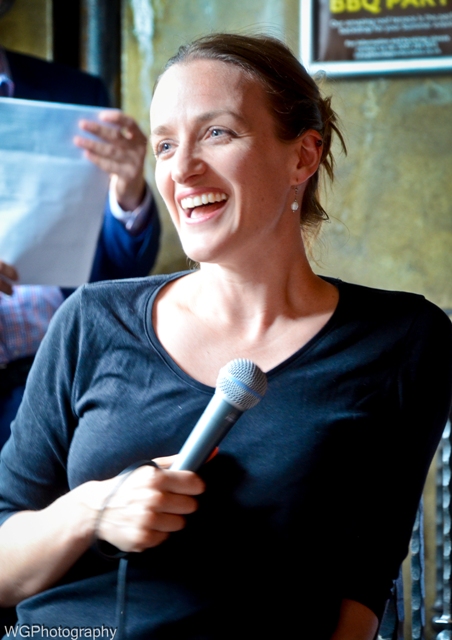

Event Details
Council of Ex-Muslims of Britain held a successful 8th anniversary celebrations in London on 20 June 2015. Videos of the acts and speeches can be seen here. Photos below
Event Details
Council of Ex-Muslims of Britain held a successful 8th anniversary celebrations in London on 20 June 2015. Videos of the acts and speeches can be seen here. Photos below have been taken by William Glen. If you have other photos of the event you would like to share with us, please email them to exmuslimcouncil@gmail.com.
more
Time
All Day (Monday)
Location
London
2015fri05junAll Day5th Imagine No Religion Conference, Vancouver, Canada(All Day: friday)
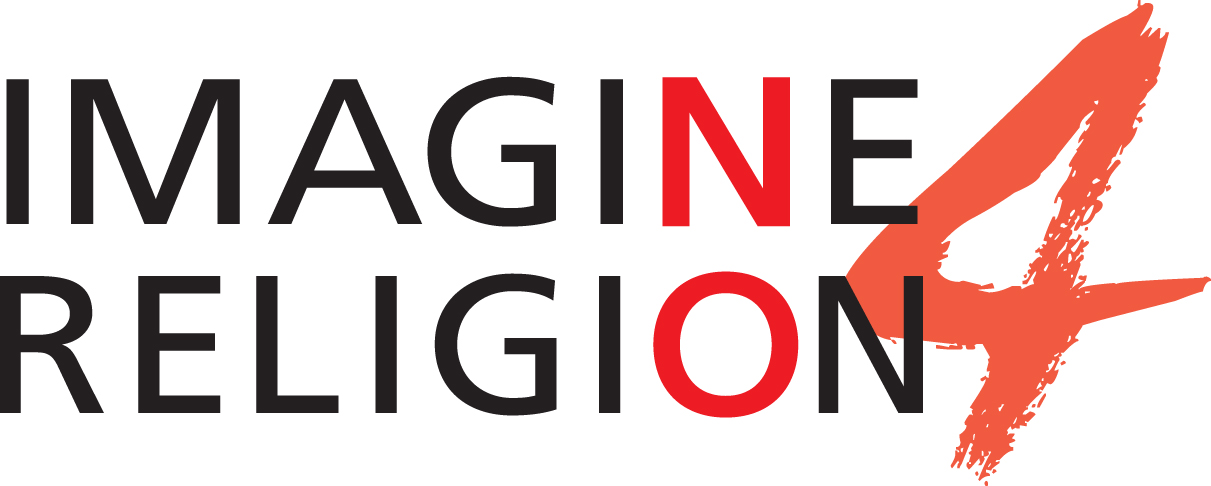

Event Details
Maryam Namazie will be speaking at the 5th Imagine No Religion Conference in Vancouver, Canada.
Event Details
Maryam Namazie will be speaking at the 5th Imagine No Religion Conference in Vancouver, Canada.
Time
All Day (Friday)
Location
Vancouver
july 2015


Event Details
27 July 2015, central London by Kings Cross station, 19:00-21:00 hours with Karima Bennoune, Author of Your Fatwa does not Apply Here marking one month anniversary of the ISIS attack
Event Details
27 July 2015, central London by Kings Cross station, 19:00-21:00 hours
with Karima Bennoune, Author of Your Fatwa does not Apply Here marking one month anniversary of the ISIS attack in Sousse.
£3 entry (waged); £1 entry (unwaged). E-mail exmuslimcouncil@gmail.com to register
Time
(Monday) 7:00 pm - 9:00 pm
Location
Kings Cross
2015wed08jul7:00 pmwed9:00 pmSutton Humanists Event7:00 pm - 9:00 pm


Event Details
8 July 2015 Sutton, UK Imad Iddine Habib will be speaking at an event organised by Sutton Humanists. More details on their website.
Event Details
8 July 2015
Sutton, UK
Imad Iddine Habib will be speaking at an event organised by Sutton Humanists. More details on their website.
Time
(Wednesday) 7:00 pm - 9:00 pm
Location
Sutton


Event Details
CANCELLED 6 July 2015, central London by Kings Cross station, 19:00-21:00 hours With iconic Founder of Women Living Under Muslims Laws and Secularism is a Women’s Issue Marieme Helie Lucas. She will
Event Details
CANCELLED
6 July 2015, central London by Kings Cross station, 19:00-21:00 hours
With iconic Founder of Women Living Under Muslims Laws and Secularism is a Women’s Issue Marieme Helie Lucas. She will be speaking about why we need strong international secular networks.
£3 entry (waged); £1 entry (unwaged). E-mail exmuslimcouncil@gmail.com to register.
Hello
Tonight’s evening drinks with Marieme Helie Lucas has been cancelled because of a double booking per the venue.
We are not sure if this is an honest mistake or if there are other “reasons” involved but for now the event is cancelled.
Our apologies to all who intended to attend and especially Marieme who was set to speak tonight.
We will inform everyone about whether there will be a venue change for the 27 July evening drinks with Karima Bennoune as soon as possible.
All the best
Maryam
more
Time
(Monday) 7:00 pm - 9:00 pm
Location
Kings Cross
august 2015
2015sat29augAll DayWomen and Gods, Paris(All Day: saturday)
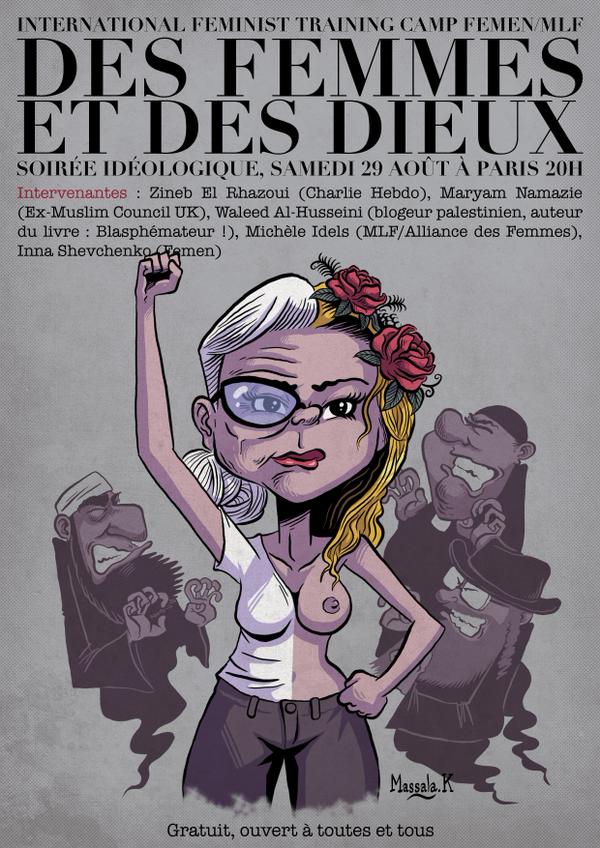

Event Details
29 August 2015 Paris, France Maryam Namazie will join a debate on Women and Gods with FEMEN’s Inna Shevchenko, Council
Event Details
Time
All Day (Saturday)
Location
Paris
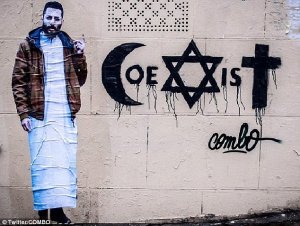

Event Details
Lettera aperta alle autorità del Bangladesh, Agora Vox, 21 August 2015
Event Details
Lettera aperta alle autorità del Bangladesh, Agora Vox, 21 August 2015
Time
All Day (Friday)
Location
See post
address
september 2015


Event Details
29 September 2015, 7-9pm Leicester, UK Maryam will be speaking on “Blogging in the Age of Intolerance” at the Everybody’s Reading festival. More details here.
Event Details
29 September 2015, 7-9pm
Leicester, UK
Maryam will be speaking on “Blogging in the Age of Intolerance” at the Everybody’s Reading festival. More details here.
Time
(Tuesday) 7:00 pm - 9:00 pm
Location
Leicester


Event Details
28 September 2015, central London by Kings Cross station, 19:00-21:00 hours Evening drinks with Arif Rahman, Bangladeshi Blogger. £3 entry (waged); £1 entry (unwaged). E-mail exmuslimcouncil@gmail.com to register.
Event Details
28 September 2015, central London by Kings Cross station, 19:00-21:00 hours
Evening drinks with Arif Rahman, Bangladeshi Blogger.
£3 entry (waged); £1 entry (unwaged). E-mail exmuslimcouncil@gmail.com to register.
Time
(Monday) 7:00 pm - 9:00 pm
Location
Kings Cross
2015sat12sep2:00 pmsat4:00 pmLosing my religion, Bournemouth2:00 pm - 4:00 pm
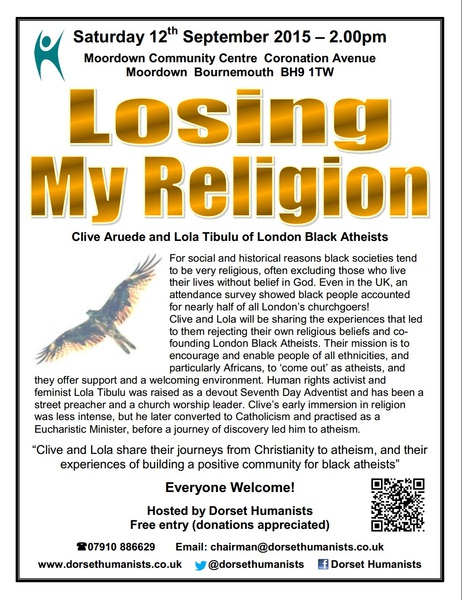

Event Details
12 September 2015, 2pm Imad Iddine Habib speaks on “Losing My Religion” for Dorset Humanists. More information here.
Event Details
12 September 2015, 2pm
Imad Iddine Habib speaks on “Losing My Religion” for Dorset Humanists. More information here.
Time
(Saturday) 2:00 pm - 4:00 pm
Location
Dorset
2015thu10sep7:00 pmthu9:00 pmAmong Unbelievers, The Netherlands7:00 pm - 9:00 pm
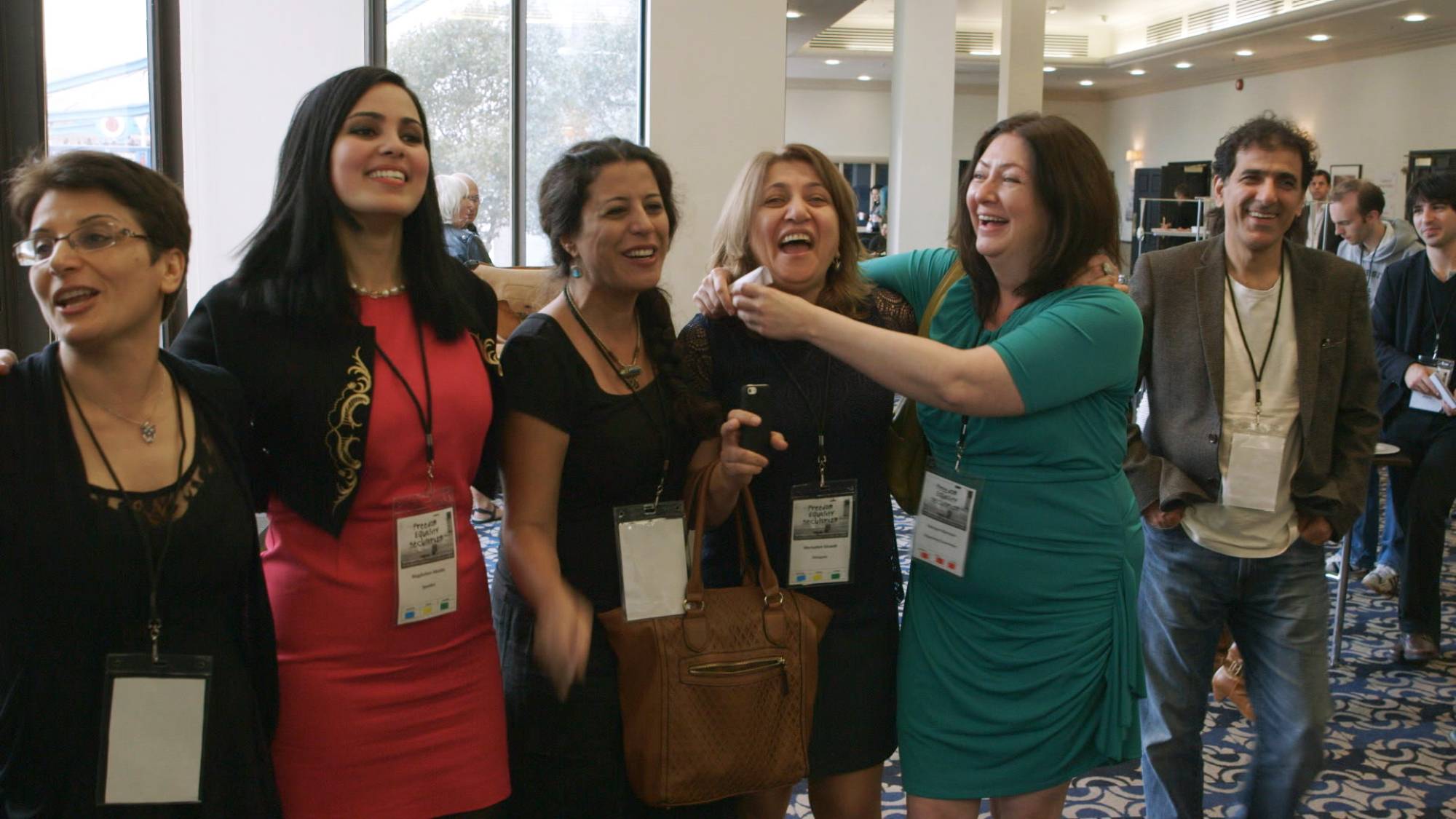


Event Details
Maryam Namazie will be speaking at Among Unbelievers events on 10 September in Leeuwarden and 15 September in Rotterdam. More details here.
Event Details
Maryam Namazie will be speaking at Among Unbelievers events on 10 September in Leeuwarden and 15 September in Rotterdam. More details here.
Time
(Thursday) 7:00 pm - 9:00 pm
Location
Leeuwarden
october 2015
2015thu29oct7:00 pmthu9:00 pmUCLU, Black History Month7:00 pm - 9:00 pm address





Event Details
29 October 2015 More information here. As part of Black History Month 2015, UCLU Atheist, Secularist and Humanist Society are pleased to host this talk with two prominent atheist
Event Details
29 October 2015
As part of Black History Month 2015, UCLU Atheist, Secularist and Humanist Society are pleased to host this talk with two prominent atheist activists, on atheism within black & minority ethnic communities.
Clive Aruede is the organiser of London Black Atheists, which is a support group for people of all races who wish to come out as atheists and fear being ostracised by friends and relatives. A former Eucharistic Minister in the Roman Catholic Church, Clive escaped from the grip of religion when conducting research to answer a simple question posed by one of his daughters: “Daddy, what is science?”. Puzzled by the lack of black atheists at Atheist and Humanist events, he and three friends founded London Black Atheists, which has grown from four people to well over 350 members.
Clive will be giving a talk linking atheism, humanism, the black churches, Martin Luther King Jr. and civil rights in the context of Black History Month.
Imadd Iddine Habib founded the Council of Ex-Muslims of Morocco CEMM مجلس المسلمين السابقين بالمغرب – the first public atheist organisation in a country with Islam as state religion – an act which led to death threats and forced him to live in hiding.
more
Time
(Thursday) 7:00 pm - 9:00 pm
Location
See post
address
2015wed28oct7:00 pmwed9:00 pmWarwick University Atheist Society7:00 pm - 9:00 pm



Event Details
BREAKING NEWS 27 September 2015: Warwick Student Union has now approved the Warwick Atheists’ request to have me speak there and Isaac Leigh, President and Jacqui Clements, Chief
Event Details
BREAKING NEWS 27 September 2015: Warwick Student Union has now approved the Warwick Atheists’ request to have me speak there and Isaac Leigh, President and Jacqui Clements, Chief Executive of the Warwick Student Union have issued a gracious apology that is very appreciated. The event will go ahead as planned. I am really excited that I will be able to speak to students there and am grateful for all the brilliant support from Warwick Atheists and from so many wonderful people listed below but also on social media.
***
Maryam was meant to speak at Warwick University Atheist Society event on 28 October but the student union there has declined the request to have her speak. The Society is appealing.
UPDATE: 27 September: Warwick Student Union and the Islamist Narrative
Here is Maryam Namazie’s statement on it:
Warwick University Student Union: the Islamists incite hatred, not us
I was invited to speak at Warwick University by the Warwick Atheists, Secularists and Humanists’ Society on 28 October 2015. The University Student Union has declined the request for me to speak saying the following:
This is because after researching both her and her organisation, a number of flags have been raised. We have a duty of care to conduct a risk assessment for each speaker who wishes to come to campus.
There a number of articles written both by the speaker and by others about the speaker that indicate that she is highly inflammatory, and could incite hatred on campus. This is in contravention of our external speaker policy:
The President (or equivalent) of the group organising any event is responsible for the activities that take place within their events. All speakers will be made aware of their responsibility to abide by the law, the University and the Union’s various policies, including that they:
- must not incite hatred, violence or call for the breaking of the law
- are not permitted to encourage, glorify or promote any acts of terrorism including individuals, groups or organisations that support such acts
- must not spread hatred and intolerance in the community and thus aid in disrupting social and community harmony
- must seek to avoid insulting other faiths or groups, within a framework of positive debate and challenge
- are not permitted to raise or gather funds for any external organisation or cause without express permission of the trustees.
In addition to this, there are concerns that if we place conditions on her attendance (such as making it a member only event and having security in attendance, asking for a transcript of what she intends to say, recording the speech) she will refuse to abide by these terms as she did for Trinity College Dublin.
The Atheist group is of course appealing their decision, however, it’s important for me to comment briefly on the Student Union’s position. I will be writing a more detailed letter to the university to formally complain about the Student Union accusations against me after taking legal advice.
For now, though, suffice it to say that criticising religion and the religious-Right is not incitement of hatred against people. If anything, it’s the religious-Right, namely Islamism in this case, which incites hatred against those of us who dare to leave Islam and criticise it.
The Student Union seems to lack an understanding of the difference between criticising religion, an idea, or a far-Right political movement on the one hand and attacking and inciting hate against people on the other. Inciting hatred is what the Islamists do; I and my organisation challenge them and defend the rights of ex-Muslims, Muslims and others to dissent.
The Student Union position is of course nothing new. It is the predominant post-modernist “Left” point of view that conflates Islam, Muslims and Islamists, homogenises the “Muslim community”, thinks believers are one and the same as the religious-Right and sides with the Islamist narrative against its many dissenters.
It is the “anti-colonialist” perspective which always unsurprisingly coincides with that of the ruling classes in the so-called “Islamic world” or “Muslim communities” – an understanding that is Eurocentric, patronising and racist.
This type of politics denies universalism, sees rights as ‘western,’ justifies the suppression of women’s rights, freedoms and equality under the guise of respect for other ‘cultures’ imputing on innumerable people the most reactionary elements of culture and religion, which is that of the religious-Right. In this type of politics, the oppressor is victim, the oppressed are perpetrators of “hatred”, and any criticism is racist.
These sort of Lefties have one set of progressive politics for themselves – they want gay rights, equality for women and the right to criticise the pope and the Christian-Right, and another for us.
We are not worthy of the same rights and freedoms.
We can only make demands within the confines of religion and Islam. If we dissent, if we demand equality, if we demand to live our lives without the labels of “kafir” or “immoral” – and all that which they imply, then we are inciting hatred…
It’s a topsy turvy world when “progressives” who are meant to be on our side take a stand with our oppressors and try to deny us the only tool we have to resist – our freedom of expression.
Well, it’s not up for sale or subject to the conditions of a Student Union too enamoured with Islamism to take a principled position.
By the way Warwick, in case you’re wondering, I will speak at your university – as I will be soon at Trinity College Dublin despite my initial talk being cancelled by organisers.
more
Time
(Wednesday) 7:00 pm - 9:00 pm
Location
Warwick University
2015mon26oct9:00 pmmon11:00 pmKafir Comedy Night with Maha Kamal9:00 pm - 11:00 pm Kings Cross
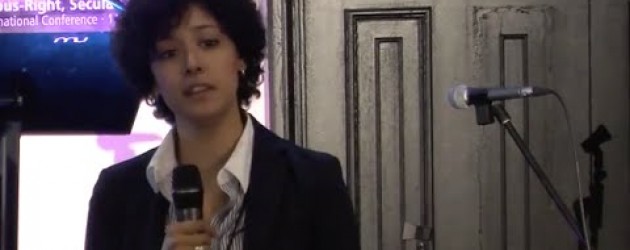

Event Details
26 October 2015, central London by Kings Cross station, 21:00-23:00 hours Evening drinks with Tom Holland, Historian and Author of In the Shadow of the Sword is followed by Kafir
Event Details
26 October 2015, central London by Kings Cross station, 21:00-23:00 hours
Evening drinks with Tom Holland, Historian and Author of In the Shadow of the Sword is followed by Kafir Comedy night with Maha Kamal.
Time
(Monday) 9:00 pm - 11:00 pm
Location
Kings Cross
2015mon26oct7:00 pmmon9:00 pmEvening drinks with historian Tom Holland7:00 pm - 9:00 pm Kings Cross
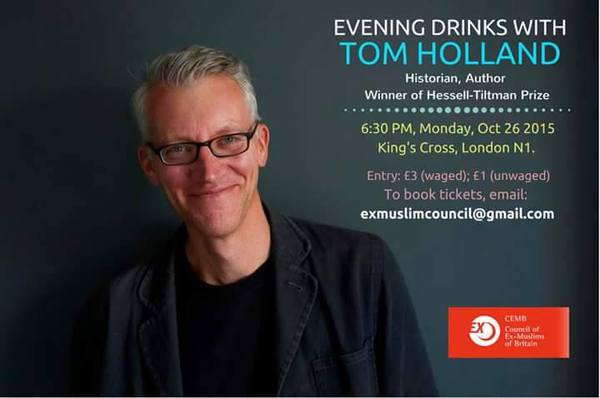

Event Details
26 October 2015, central London by Kings Cross station, 19:00-21:00 hours Evening drinks with Tom Holland, Historian and Author of In the Shadow of the Sword. £3 entry (waged); £1
Event Details
26 October 2015, central London by Kings Cross station, 19:00-21:00 hours
Evening drinks with Tom Holland, Historian and Author of In the Shadow of the Sword.
£3 entry (waged); £1 entry (unwaged). E-mail exmuslimcouncil@gmail.com to register.
Time
(Monday) 7:00 pm - 9:00 pm
Location
Kings Cross
2015sat24octAll DayLondon Feminist Conference(All Day: saturday)
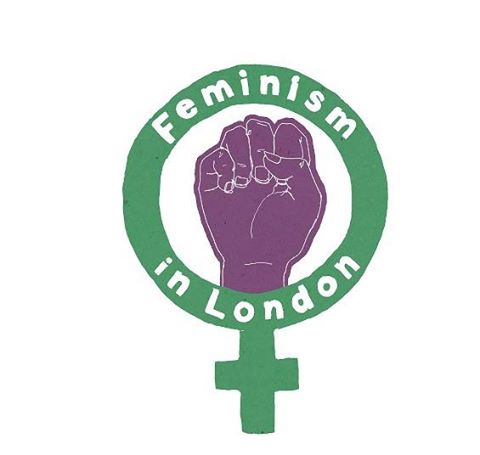

Event Details
24 October 2015 London, UK Maryam Namazie joins Pragna Patel, Gita Sahgal and Houzan Mahmoud in a discussion on religious fundamentalisms at the London Feminist Conference. More details here.
Event Details
24 October 2015
London, UK
Maryam Namazie joins Pragna Patel, Gita Sahgal and Houzan Mahmoud in a discussion on religious fundamentalisms at the London Feminist Conference. More details here.
Time
All Day (Saturday)
Location
London



Event Details
Maryam Namazie will be speaking at Among Unbelievers events on 10 September in Leeuwarden and 15 September in Rotterdam. Ramin Forghani will be speaking at Among Unbelievers events in London
Event Details
Maryam Namazie will be speaking at Among Unbelievers events on 10 September in Leeuwarden and 15 September in Rotterdam. Ramin Forghani will be speaking at Among Unbelievers events in London on 16 September and on October 21st, Maastricht, and October 28th, Apeldoorn.
More details here.
Time
All Day (Wednesday)
Location
The Netherlands


Event Details
Maryam Namazie will be speaking to University Philosophical Society at Trinity College, Dublin on Apostasy and the Rise of Islamism on 20 October 2015. Her speaking engagement follows her last
Event Details
Maryam Namazie will be speaking to University Philosophical Society at Trinity College, Dublin on Apostasy and the Rise of Islamism on 20 October 2015. Her speaking engagement follows her last speech being cancelled after she refused restrictions on her talk. For more information, click here.
Time
(Tuesday) 7:00 pm - 9:00 pm
Location
Trinity College
Dublin
2015sat17oct6:00 pmsat11:00 pmLondon Black Atheists 3rd Anniversary6:00 pm - 11:00 pm




Event Details
17 October 2015 London London Black Atheists 3rd anniversary celebrations. For more information, click here.
Event Details
17 October 2015
London
London Black Atheists 3rd anniversary celebrations. For more information, click here.
Time
(Saturday) 6:00 pm - 11:00 pm
Location
London
november 2015
2015mon30nov7:00 pmmon9:00 pmGoldsmiths University7:00 pm - 9:00 pm
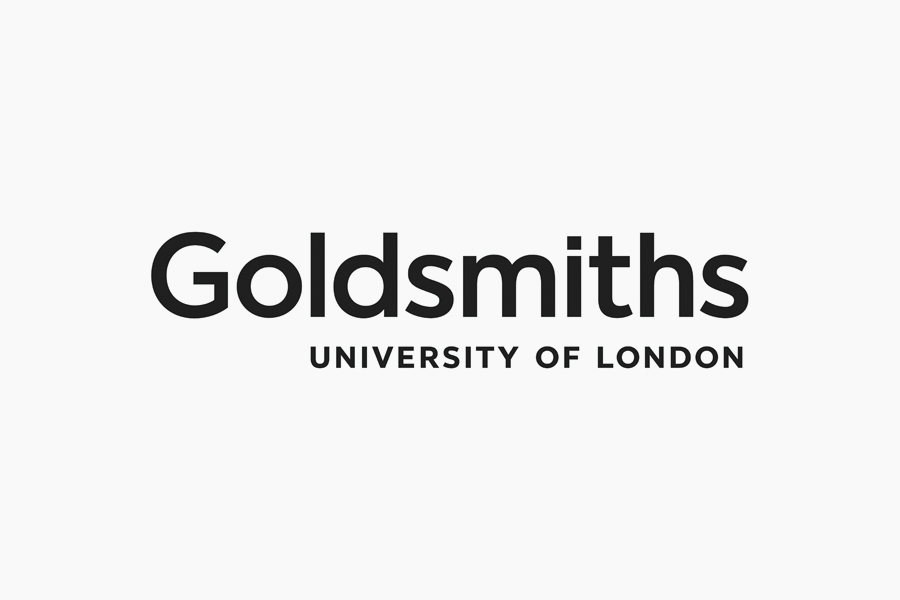

Event Details
Maryam Namazie will speak at Goldsmiths University Atheist, Secularist and Humanist Society on 30 November. More details to follow.
Event Details
Maryam Namazie will speak at Goldsmiths University Atheist, Secularist and Humanist Society on 30 November. More details to follow.
Time
(Monday) 7:00 pm - 9:00 pm
Location
Goldsmiths University
2015wed25nov7:00 pmwed9:00 pmUniversity of Exeter7:00 pm - 9:00 pm


Event Details
25 November 2015 at 19:00 hours Maryam Namazie will be speaking at an event organised by University of Exeter’s Atheist, Humanist, and Secular Society. More details here.
Event Details
25 November 2015 at 19:00 hours
Maryam Namazie will be speaking at an event organised by University of Exeter’s Atheist, Humanist, and Secular Society. More details here.
Time
(Wednesday) 7:00 pm - 9:00 pm
Location
University of Exeter






Event Details
16 November 2015, central London by Kings Cross station, 19:00-21:00 hours Evening drinks with Ibrahim Abdallah, Muslimish New York Organiser.
Event Details
16 November 2015, central London by Kings Cross station, 19:00-21:00 hours
Evening drinks with Ibrahim Abdallah, Muslimish New York Organiser.
£3 entry (waged); £1 entry (unwaged). E-mail exmuslimcouncil@gmail.com to register.
Time
(Monday) 7:00 pm - 9:00 pm
Location
Kings Cross
2015thu12nov5:30 pmthu7:00 pmNottingham University5:30 pm - 7:00 pm
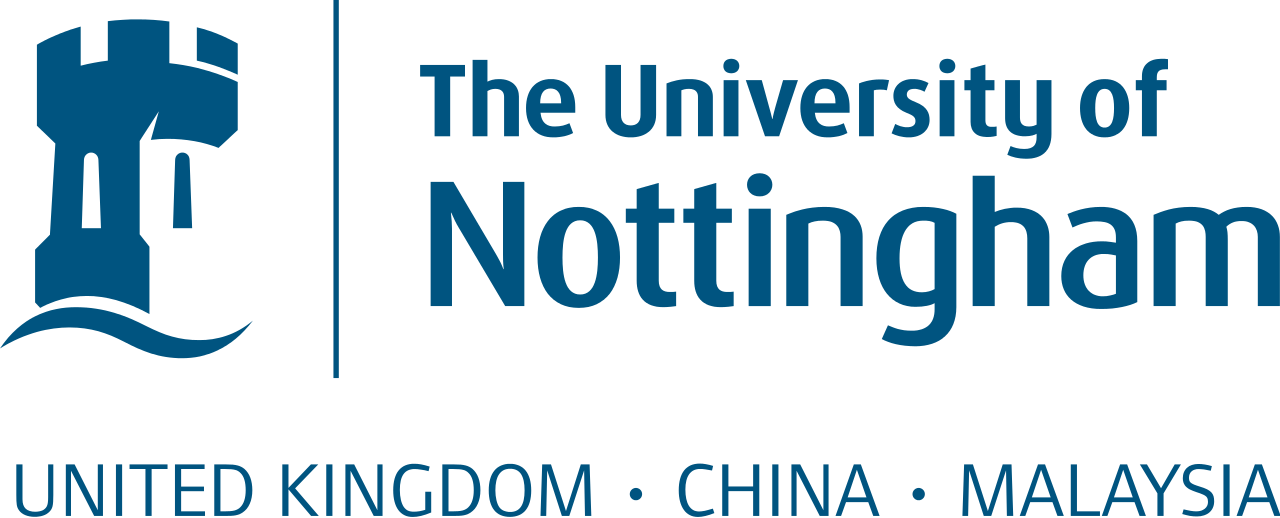

Event Details
Maryam Namazie speaks at Nottingham University on 12 November 2015 at 17:30 during "Non-Prophet Week". More details here.
Event Details
Maryam Namazie speaks at Nottingham University on 12 November 2015 at 17:30 during “Non-Prophet Week”. More details here.
Time
(Thursday) 5:30 pm - 7:00 pm
Location
Nottingham University
december 2015
2015sun13dec3:00 pmsun6:00 pmEnd-year Celebration!3:00 pm - 6:00 pm
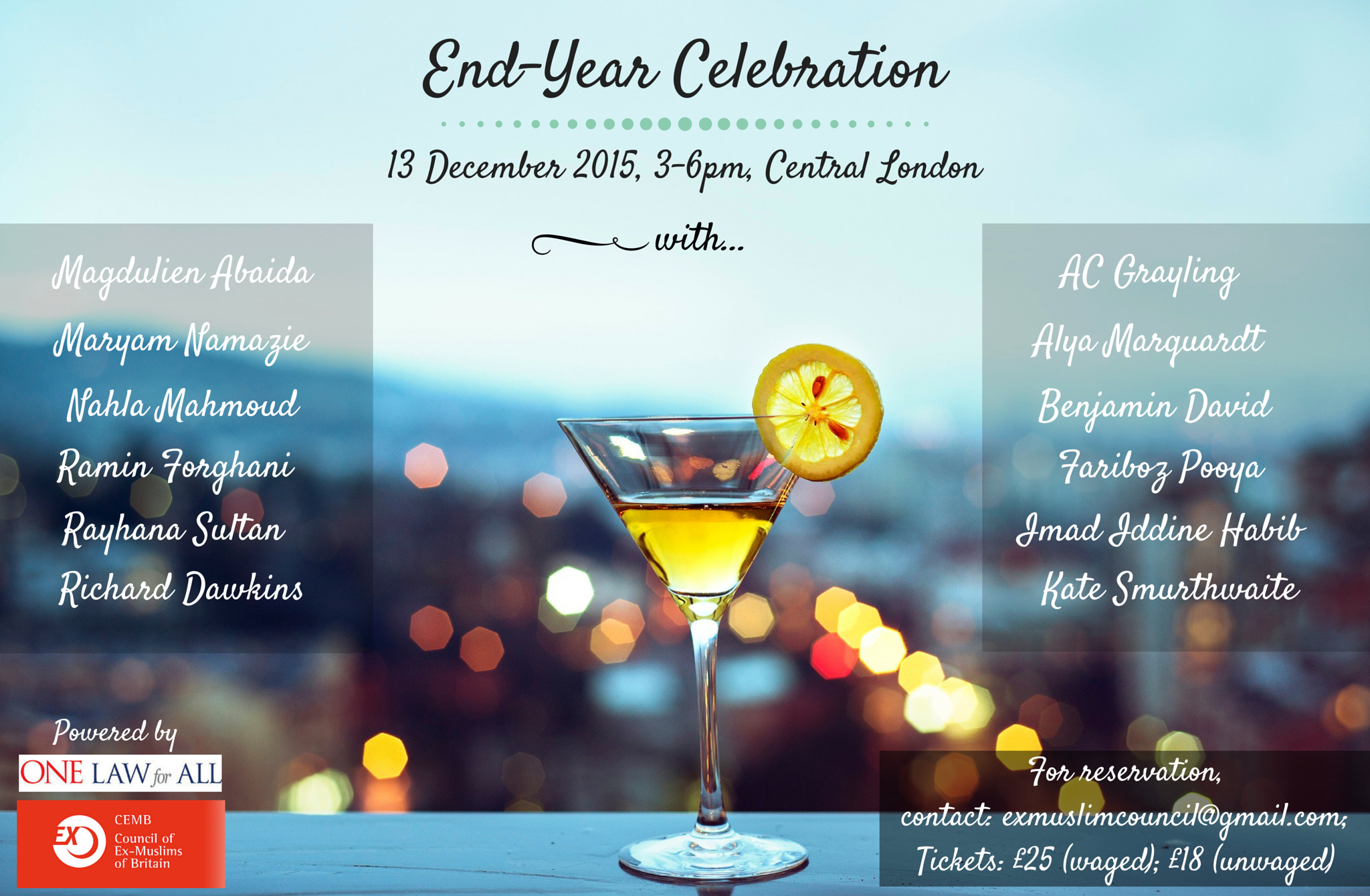

Event Details
13 December 2015, 3-6pm, central London Tickets are selling fast for One the Law for All and CEMB end-year
Event Details
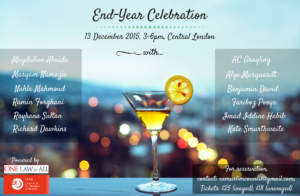

Tickets are selling fast for One the Law for All and CEMB end-year celebration with Philosopher AC Grayling, Secular Activist Aliyah Saleem, British Iraqi singer Alya Marquardt, Warwick Atheist Society President Benjamin David, London Black Atheists Clive Aruede and Lola Tinubu, Magician Neil Edwards, Bread and Roses TV Host Fariborz Pooya, Houzan Mahmoud of Organisation for Women’s Freedom in Iraq, Founder of Council of Ex-Muslims of Morocco Imad Iddine Habib, Comedian Kate Smurthwaite, Libyan Women’s Rights Campaigner Magdulien Abaida, CEMB Spokesperson Maryam Namazie, CEMB Spokesperson Nahla Mahmoud, Ex-Muslims of Scotland founder Ramin Forghani, Bangladeshi campaigner Rayhana Sultan, and special guest Scientist Richard Dawkins.
To reserve a place, please register by emailing exmuslimcouncil@gmail.com with your name and mobile number and purchase ticket(s): £25 (waged); £18 (unwaged) by “donating” price of ticket via Paypal: https://ex-muslim.org.uk/donate/ or by sending a cheque made payable to CEMB to: CEMB, BM Box 1919, London WC1N 3XX.
No tickets will be sold at the door so please buy tickets as soon as possible.
more
Time
(Sunday) 3:00 pm - 6:00 pm
Location
London
2015thu10decAll Day10 Downing Street(All Day: thursday)


Event Details
Hundreds have signed a joint statement calling for the dismantling of parallel legal systems in Britain. The statement will be handed in by Diana Nammi of Iranian Kurdish Women's Rights Organisation, Gita Sahgal of Centre for Secular Space, One Law for All's Maryam Namazie, Nasreen Rehman of British Muslims for Secular Democracy, Pragna Patel of Southall Black Sisters and Women's Rights Campaigner Yasmin Rehman to mark 10 December, Human Rights Day.
Event Details
Hundreds have signed a joint statement calling for the dismantling of parallel legal systems in Britain.
The statement will be handed in by Diana Nammi of Iranian Kurdish Women’s Rights Organisation, Gita Sahgal of Centre for Secular Space, One Law for All’s Maryam Namazie, Nasreen Rehman of British Muslims for Secular Democracy, Pragna Patel of Southall Black Sisters and Women’s Rights Campaigner Yasmin Rehman to mark 10 December, Human Rights Day.
If you and/or your organisation would like to sign the statement, there’s still time. Just email onelawforall@gmail.com so your name can be added to the list until 8 December.
more
Time
All Day (Thursday)
Location
London
february 2014


Event Details


Event Details


Venue: Conway Hall, 25 Red Lion Square, London WC1R 4RL
Date: Thursday 27 February 2014
Join Terry Sanderson as he explores the extraordinary life and career of one of the 20th century’s great entertainers. Using generous extracts from her films, he’ll examine her fantastic Hollywood career, and then accessing rare archive material, will look at her heroic war time efforts against the Nazis. The show culminates with a complete showing on the big screen of her famous one-woman show with which she toured the world. Accompanied by Burt Bacharach and his orchestra, this is Dietrich at her peak. You can buy tickets here.
The event is a fundraiser for the Council of Ex-Muslims of Britain and coincides with LGBT history month.
more
Time
(Thursday) 7:30 pm - 9:45 pm
Location
Conway Hall
25 Red Lion Square
2014sat15feb7:00 pmsat10:00 pmLeeds 10-pin Bowling Night7:00 pm - 10:00 pm


Event Details
Saturday 15 February 2014 7:00 PM Join Ex-Muslim North at 10-pin Bowling Night in Leeds. To join visit here.
Event Details
Saturday 15 February 2014
7:00 PM
Join Ex-Muslim North at 10-pin Bowling Night in Leeds. To join visit here.
Time
(Saturday) 7:00 pm - 10:00 pm
Location
Leeds
2014sat01feb1:00 pmsat3:00 pmEx-Muslim North Meet and Greet1:00 pm - 3:00 pm
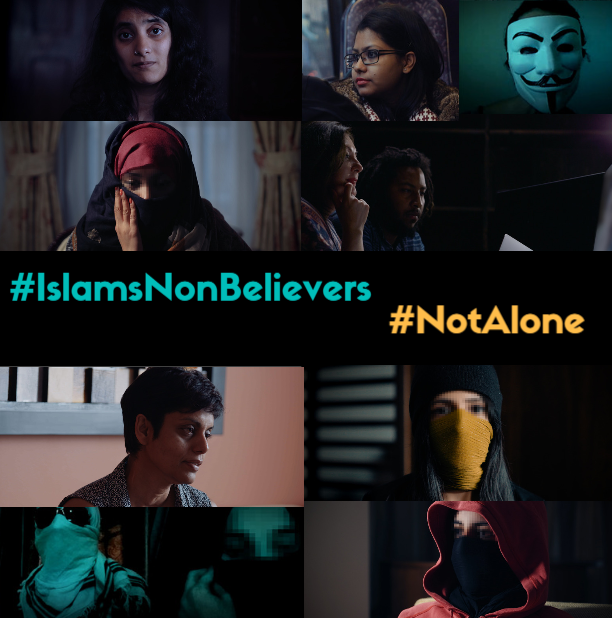

Event Details
To join the 1 February Ex-Muslim North Meet and Greet in Manchester at 1pm, visit here.
Event Details
To join the 1 February Ex-Muslim North Meet and Greet in Manchester at 1pm, visit here.
Time
(Saturday) 1:00 pm - 3:00 pm
Location
Manchester
march 2014
2014fri28marAll Daysun30Atheist Films, March and Congress in Warsaw(All Day)
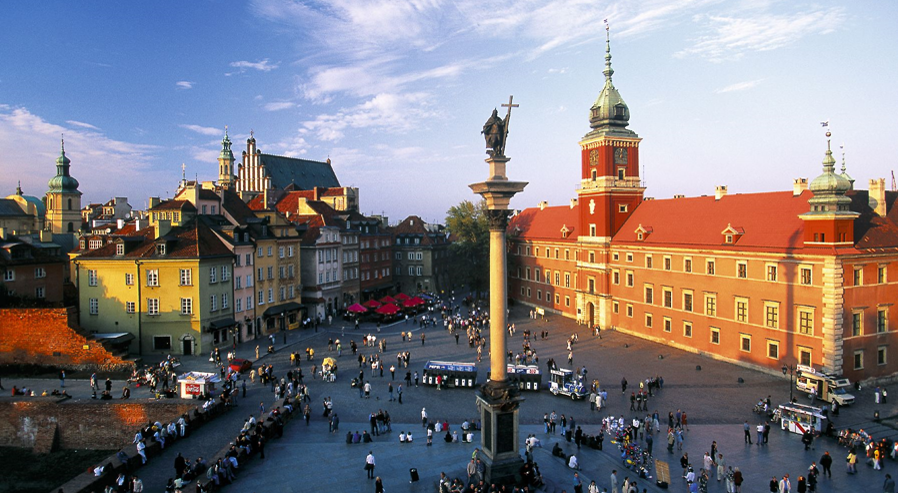

Event Details
28-30 March 2014 Warsaw, Poland Maryam Namazie will be speaking at an event organised by Polish Rationalists. More details to follow.
Event Details
28-30 March 2014
Warsaw, Poland
Maryam Namazie will be speaking at the first Atheist Days in Poland on 28-30 March. The event starts on Friday (28.03) with an evening of atheist movies. On 29.03, there will be a March of atheists followed by the historical reconstruction of the execution of the nobleman Lyszczynski , the author of the treaty “On non existentia dei” accused of atheism 325 years ago. This will be followed by the Atheist Congress and Dinner. Maryam will be speaking on a panel on religion and women’s discrimination at the congress. You can see the programme in Polish here.
more
Time
march 28 (Friday) - 30 (Sunday)
Location
Warsaw


Event Details
15-16 March 2014 Columbia, Missouri Maryam Namazie will be speaking at the Missouri University SASHA (Skeptics, Atheists, Secular Humanists and Agnostics) conference in Columbia, Missouri. More information here.
Event Details
15-16 March 2014
Columbia, Missouri
Maryam Namazie will be speaking at the Missouri University SASHA (Skeptics, Atheists, Secular Humanists and Agnostics) conference in Columbia, Missouri. More information here.
Time
march 15 (Saturday) - 16 (Sunday)
Location
Columbia
Organizer
2014mon10mar7:00 pmmon9:00 pmSecond Kafir Comedy Night Hosted by Maha7:00 pm - 9:00 pm 213 Strand
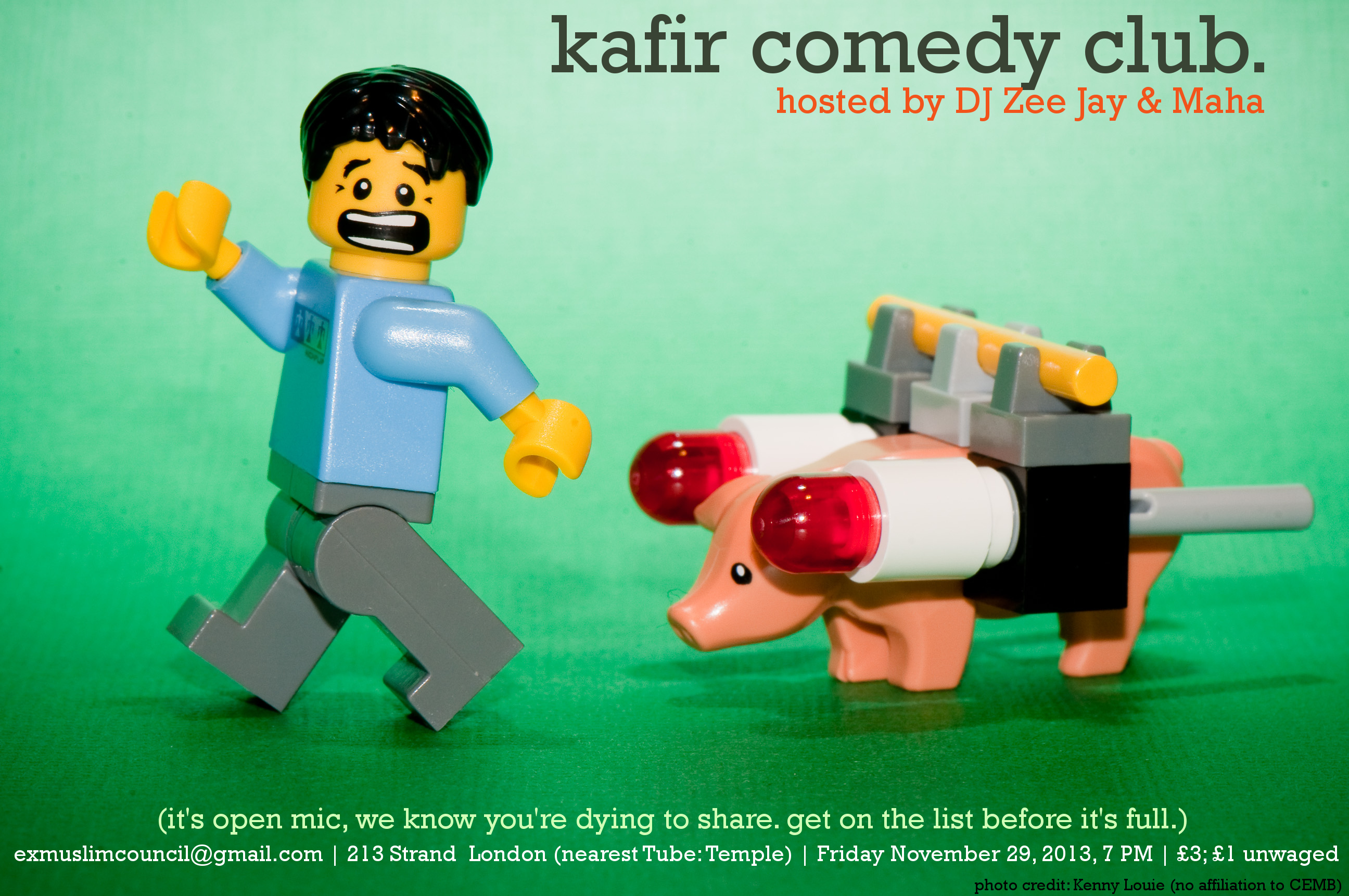

Event Details
Second Kafir Comedy Night Hosted by Maha Date: Monday 10 March 2014 Time: 19:00-21:00 Venue: The George, 213 Strand, London WC2R 1AP (nearest Tube: Temple) Open mic comedy for interested kuffar starts at 8pm. Look, we know it's not easy defending yourself constantly against a religious mob. So take a break from the Facebook forums and let out the frustration with a laugh. If you've got some steam to let off, this is your night to do it. RSVP at exmuslimcouncil@gmail.com. But don't laugh too much, Hell awaits us all later.* Entry: £3; £1 unwaged. * "Let them laugh a little: much will they weep: a recompense for the (evil) that they do." (Surah At-Taubah 9:82)
Event Details
Second Kafir Comedy Night Hosted by Maha
Date: Monday 10 March 2014
Time: 19:00-21:00
Venue: The George, 213 Strand, London WC2R 1AP (nearest Tube: Temple)
Open mic comedy for interested kuffar starts at 8pm. Look, we know it’s not easy defending yourself constantly against a religious mob. So take a break from the Facebook forums and let out the frustration with a laugh. If you’ve got some steam to let off, this is your night to do it. RSVP at exmuslimcouncil@gmail.com. But don’t laugh too much, Hell awaits us all later.*
Entry: £3; £1 unwaged.
* “Let them laugh a little: much will they weep: a recompense for the (evil) that they do.” (Surah At-Taubah 9:82)
more
Time
(Monday) 7:00 pm - 9:00 pm
Location
The George
213 Strand
april 2014



Event Details
Evening drinks with Ana Gonzalez on Apostasy and Asylum Date: Monday 28 April 2014 Time: 18:30-20:00 Venue: The George, 213 Strand, London (nearest Tube: Temple) Ana Gonzalez, a lawyer of a well-respected law firm which has represented a number of apostasy asylum claimants and CEMB members will speak to the audience about the right to asylum and apostasy. Entry: £3; £1 unwaged.
Event Details
Evening drinks with Ana Gonzalez on Apostasy and Asylum
Date: Monday 28 April 2014
Time: 18:30-20:00
Venue: The George, 213 Strand, London (nearest Tube: Temple)
Ana Gonzalez, a lawyer of a well-respected law firm which has represented a number of apostasy asylum claimants and CEMB members will speak to the audience about the right to asylum and apostasy.
Entry: £3; £1 unwaged.
Time
(Monday) 6:30 pm - 8:00 pm
Location
The George
213 Strand
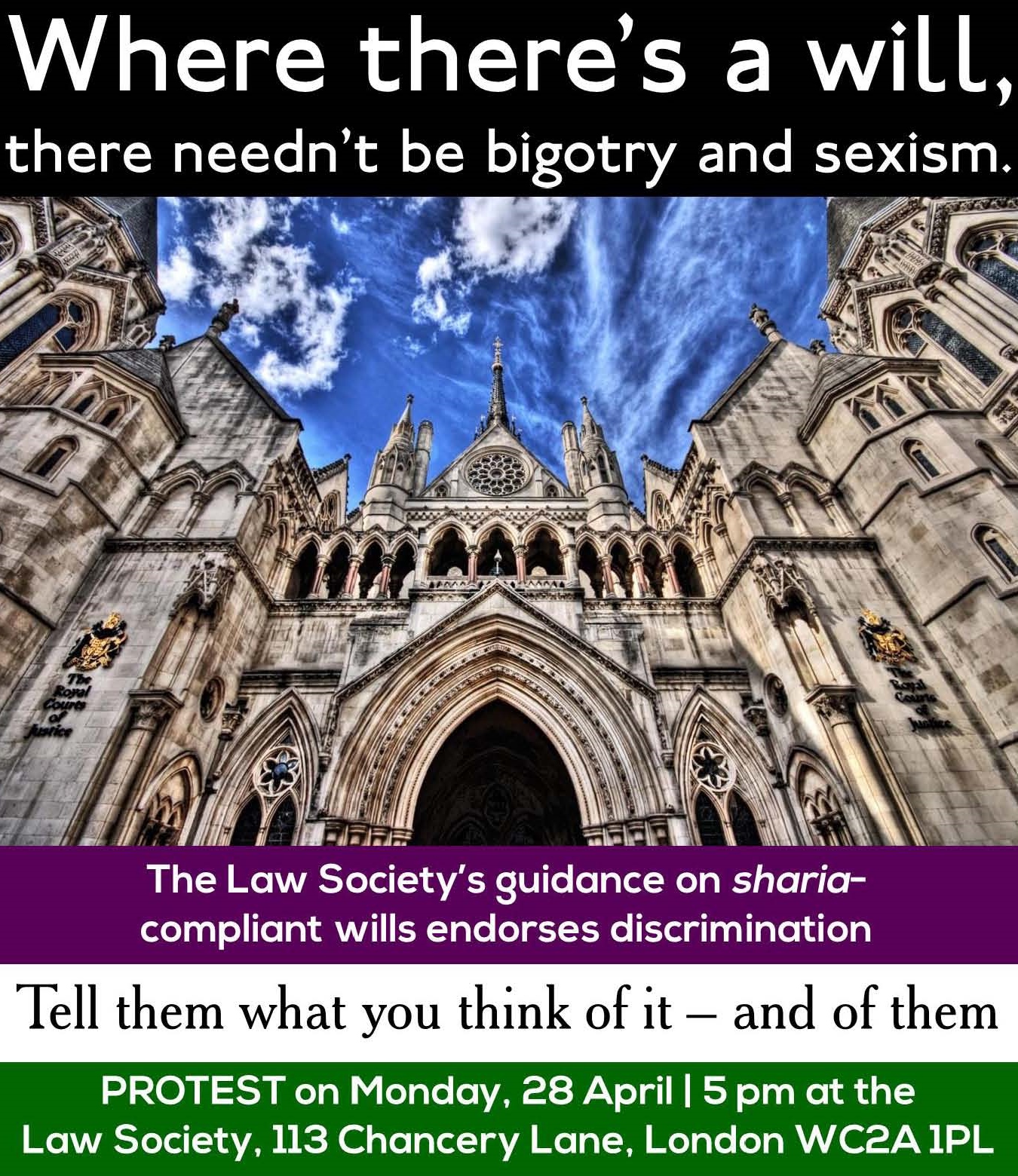

Event Details
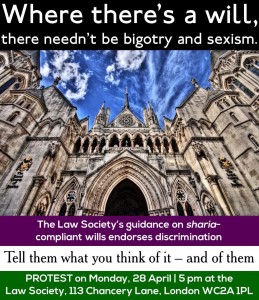

Event Details


DATE: Monday 28 April 2014
TIME: 17:00-18:00 hours
PLACE: The Law Society, 113 Chancery Lane, London WC2A 1PL
Just show up. Also join the Facebook Page,
Speakers include: Maryam Namazie, Spokesperson, One Law For All; Pragna Patel, Founder, Southall Black Sisters; Peter Tatchell, Founder, Peter Tatchell Foundation; Yasmin Rehman, Fellow of Muslim Institute and Centre for Secular Space; Kate Smurthwaite, Comedian and activist; James Bloodworth, Editor, Left Foot Forward; Abhishek Phadnis, President, LSESU Atheist, Secularist and Humanist Society; Diana Nammi, Executive Director, Iranian Kurdish Women’s Refugee Organisation and others.
The protest is organised by One Law for All, Southall Black Sisters, Centre for Secular Space and LSE SUASH.
Here’s an open letter signed by a number of well known personalities explaining why the guidance is discriminatory and must be withdrawn.
The Law Society, the representative body for solicitors in England and Wales, has issued Sharia-related guidance on wills, succession and inheritance.
“Certain principles of Sharia are different to English succession laws. For example, it is not possible to inherit under Sharia rules via a deceased relative. No distinction is made between children of different marriages, but illegitimate and adopted children are not Sharia heirs.
“The male heirs in most cases receive double the amount inherited by a female heir of the same class. Non-Muslims may not inherit at all, and only Muslim marriages are recognised. Similarly, a divorced spouse is no longer a Sharia heir, as the entitlement depends on a valid Muslim marriage existing at the date of death”.
Whilst not binding, the guidance legitimises rules which are highly contested by many Muslims themselves and which discriminates against Muslim women, non-Muslims, and ‘illegitimate’ and adopted children. The guidance seriously undermines the Equality Act, citizenship rights and one law for all.
Since individuals are already free to dispense of their estate as they see fit (as long as they provide for their dependants) such guidance unwittingly aids and abets Islamist attempts at subverting democratic laws and principles with a de facto parallel legal system where minority women and children have increasingly fewer rights than other citizens.
This scandalous guidance is similar to that which Universities UK published endorsing gender segregation at universities in Britain. UUK was promptly forced to withdraw its guidance after widespread condemnation.
This protest will call for a withdrawal of the guidelines and make clear to the Law Society and the wider public that guidance that legitimises discrimination and bigotry is unacceptable.
You can find the list of signatories, including Maryam Namazie, Aliaa Magda Elmahdy, Gita Sahgal, Peter Tatchell, Pragna Patel, Kate Smurthwaite, Sue Cox, Taslima Nasrin, and Richard Dawkins, here.
more
Time
(Monday) 5:00 pm - 6:00 pm
Location
The Law Society
113 Chancery Lane


Time
april 17 (Thursday) - 20 (Sunday)
Location
Salt Lake City
Organizer
june 2014


Event Details
28 June 2014, 14:00 - 17:00 CitizenM Hotel, 60 Renfrew St, Glasgow, G2 3BW Apostasy, Atheism, Secularism and Ex-Muslims First Public Seminar of Ex-Muslims Scotland
Event Details
Apostasy, Atheism, Secularism and Ex-Muslims
THE FIRST PUBLIC SEMINAR Of Ex-Muslims Scotland
28th of June 2014
14:00 – 17:00
CitizenM Hotel
60 Renfrew St, Glasgow, G2 3BW
How to reach the venue?
The CitizenM Hotel is located in Glasgow City centre, at 60 Renfrew St, Glasgow, G2 3BW; it is less than 15 minute walk from the Glasgow Central train Station and less than 10 minute walk from the Glasgow Buchannan Bus Station.
Who can join the seminar?
The seminar is open to all members of public and everyone is welcome to join the launch meeting of ExMuslims Scotland.
Who will be there?
There will be a panel of speakers including Maryam Namazie and Ramin Forghani speaking on issues facing apostates and ExMuslims.
I cannot make it to the meeting; can I get involved by internet?
You will be able to watch the seminar live by Google Hangouts and on YouTube. You will also be able to ask questions from the panel by tweeting to @ExMuslimsScot. Follow our twitter feed @ExMuslimsScot and website for more information.
What is ExMuslims Scotland?
ExMuslims Scotland is the Scottish affiliation of the Council of ExMuslims of Britain. Its aim is to be a community for atheists and agnostics who were formerly Muslims.
ExMuslims Scotland
272 Bath Street
Glasgow G2 4JR
E-mail: info@exmuslims-scotland.org.uk
www.ExMuslims-Scotland.org.uk
@ExMuslimsScot
more
Time
(Saturday) 2:00 pm - 5:00 pm
Location
CitizenM Hotel
60 Renfrew St
2014thu12junAll Daysun15Nordic Forum - New Action on Women's Rights, Malmo, Sweden(All Day)
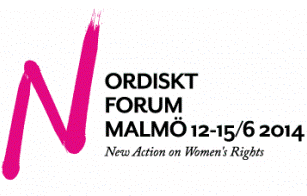

Event Details
12-15 June 2014 Nordic Forum – New Action on Women’s Rights, Malmo, Sweden Maryam Namazie will be speaking at the Nordic Forum on Nude Protest, Secularism and Equality. More
Event Details
12-15 June 2014
Nordic Forum – New Action on Women’s Rights, Malmo, Sweden
Maryam Namazie will be speaking at the Nordic Forum on Nude Protest, Secularism and Equality. More information here.
Time
june 12 (Thursday) - 15 (Sunday)
Location
Malmo
august 2014


Event Details
9 August 2014 Oxford, UK Maryam will participate in a panel “Is there something about Islam?” with Majid Nawaaz and Kenan Malik amongst others. More details to follow.
Event Details
9 August 2014
Oxford, UK
Maryam will participate in a panel “Is there something about Islam?” with Majid Nawaaz and Kenan Malik amongst others. More details to follow.
Time
(Saturday) 7:00 pm - 9:00 pm
Location
Oxford
2014sun03aug2:00 pmsun6:00 pmCEMB Picnic, London's Hyde Park2:00 pm - 6:00 pm
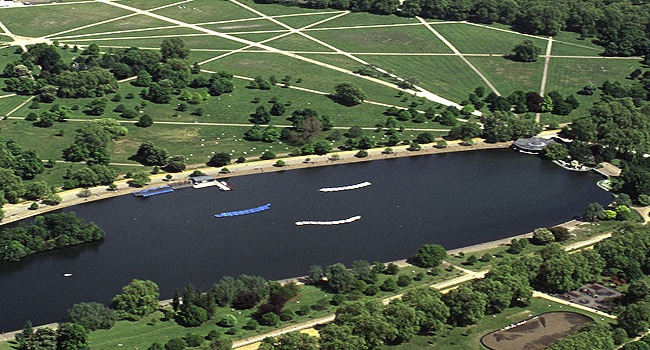

Event Details
CEMB Picnic London's Hyde Park Near Speakers' Corner 3 August 2014, 2pm For more details, contact: sandbad_behzad@yahoo.com
Event Details
CEMB Picnic
London’s Hyde Park
Near Speakers’ Corner
3 August 2014, 2pm
For more details, contact: sandbad_behzad@yahoo.com
Time
(Sunday) 2:00 pm - 6:00 pm
Location
Hyde Park
october 2014
Event Details
![]()
![]()
Event Details
Conference Leaflet for Distribution Available Here.
Conference of a life-time on the Religious-Right, Secularism and Civil Rights
11-12 October 2014
The Tower Hotel, St Katharine’s Way, London E1W 1LD, UK
Dear Friend
“Secularism is probably the one big issue for our century. This century is not, as many still think, marked by a religious or spiritual revival. What we are actually witnessing is the rise of extreme-Right political movements, working under the cover of religion. Everywhere. No one is spared… Secularists are being attacked in many places in the world today: they are jailed, killed, tortured; their very existence is considered an offense to believers in many non-secular states. … There is a need for secularists around the world to come together and examine their situations, to exchange information, to strategize and to join hands,” writes Algerian secularist Marieme Helie Lucas.
This is the impetus behind the 11-12 October 2014 International Conference on the Religious Right, Secularism and Civil Rights in London with speakers from countries or the Diaspora as diverse as Algeria, Bangladesh, Canada, Egypt, France, India, Iran, Iraq, Israel, Libya, Morocco, Pakistan, Palestine, Poland, Senegal, Sudan, Switzerland, Syria, Tunisia, UK, USA and Yemen.
Join Us!
Join this historic conference which will establish an international front of secularists against the religious-Right.
Secularism. Today. Now.
Register for the conference today.
See the conference agenda here.
See the biographies of our distinguished speakers here.
See a short Bread and Roses Video on the conference here.
The conference is endorsed by Atheist Alliance International; Bread and Roses TV; Children First Now; Center for Inquiry; Council of Ex-Muslims of Britain; Equal Rights Now – Organisation against Women’s Discrimination in Iran; Fitnah – Movement for Women’s Liberation; International Committee against Stoning; International Committee against Execution; International Federation of Iranian Refugees; Iran Solidarity; National Secular Society; One Law for All; Secularism is a Women’s Issue; The Richard Dawkins Foundation for Reason and Science UK; and Women Living Under Muslim Laws amongst others.
Richard Dawkins will be attending the conference.
For more information, contact:
Amal Farah, Atoosa Khatiri, Eileen McFadden, Gaby Grammeno, Marieme Helie Lucas and Maryam Namazie
Conference Organising Committee
Email: maryamnamazie@gmail.com
Facebook
Twitter
Website
more
Time
october 11 (Saturday) - 12 (Sunday)
Location
The Tower Hotel
St Katharine’s Way
november 2014
2014sat29nov2:00 pmsat4:00 pmNSS AGM, London2:00 pm - 4:00 pm address



Event Details
29 November 2014 NSS AGM, London Maryam Namazie will be speaking at the NSS AGM on Secularism as a response to the religious-Right.
Event Details
29 November 2014
NSS AGM, London
Maryam Namazie will be speaking at the NSS AGM on Secularism as a response to the religious-Right.
Time
(Saturday) 2:00 pm - 4:00 pm
Location
See post
address
2014fri07novAll Daysat08International Feminist and Secular Network, Paris(All Day)


Event Details
Maryam Namazie will speak at the first conference organised by the International Feminist and Secular Network in Paris during 7-8 November 2014. More information to follow.
Event Details
Maryam Namazie will speak at the first conference organised by the International Feminist and Secular Network in Paris during 7-8 November 2014. More information to follow.
Time
november 7 (Friday) - 8 (Saturday)
Location
Paris
january 2013
2013thu31jan5:15 pmthu7:00 pmEngage Leeds Speakers Forum5:15 pm - 7:00 pm address
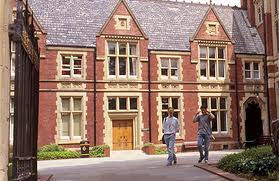

Event Details
Maryam Namazie will be speaking at ‘Engage: Leeds Speakers Forum' on 31 January 2013 at 17.15 at the University of Leeds in the Maurice Keyworth building G.31. Her talk will be: Islam in Public Policy: A look at Sharia courts in Britain, multiculturalism and gender inequality. For more information, email fergus-simpson@hotmail.co.uk. There is no need to register for the event.
Event Details
Maryam Namazie will be speaking at ‘Engage: Leeds Speakers Forum’ on 31 January 2013 at 17.15 at the University of Leeds in the Maurice Keyworth building G.31. Her talk will be: Islam in Public Policy: A look at Sharia courts in Britain, multiculturalism and gender inequality. For more information, email fergus-simpson@hotmail.co.uk. There is no need to register for the event.
Time
(Thursday) 5:15 pm - 7:00 pm
Location
See post
address
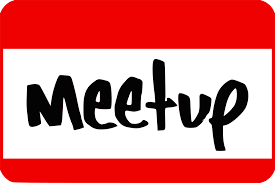
















Event Details
28 January 2013 Meet-Up for ex-Muslims asylum seekers and refugees There will be a meet-up for ex-Muslim refugees and asylum seekers in January from 1:30-2:30pm. To RSVP, email exmuslimcouncil@gmail.com.
Event Details
28 January 2013
Meet-Up for ex-Muslims asylum seekers and refugees
There will be a meet-up for ex-Muslim refugees and asylum seekers in January from 1:30-2:30pm. To RSVP, email exmuslimcouncil@gmail.com.
Time
(Monday) 1:30 pm - 2:30 pm
Location
See post
address
2013mon28jan11:30 ammon1:00 pmLondon Coffee Morning for Ex-Muslim Women11:30 am - 1:00 pm address

















Event Details
28 January 2013 There will be an ex-Muslim women’s coffee morning in January from 11:30-1:00pm. To RSVP, email exmuslimcouncil@gmail.com.
Event Details
28 January 2013
There will be an ex-Muslim women’s coffee morning in January from 11:30-1:00pm. To RSVP, email exmuslimcouncil@gmail.com.
Time
(Monday) 11:30 am - 1:00 pm
Location
See post
address

















Event Details
26 January 2013 2pm Northern Ex-Muslim Meet-up Group is organising a "Home Cooked Food Festival" in Manchester. To join the event, visit here.
Event Details
26 January 2013
2pm
Northern Ex-Muslim Meet-up Group is organising a “Home Cooked Food Festival” in Manchester. To join the event, visit here.
Time
(Saturday) 2:00 pm - 4:00 pm
Location
See post
address
february 2013
2013thu28feb11:30 amthu1:30 pmLondon Ex-Muslim Women's Luncheon11:30 am - 1:30 pm address


Event Details
The ex-Muslim women's group will meet for lunch on 28 February from 1130am-1:30pm in central London. To RSVP, email exmuslimcouncil@gmail.com.
Event Details
The ex-Muslim women’s group will meet for lunch on 28 February from 1130am-1:30pm in central London. To RSVP, email exmuslimcouncil@gmail.com.
Time
(Thursday) 11:30 am - 1:30 pm
Location
See post
address
2013tue26feb7:00 pmtue8:30 pmBirmingham Reason Week7:00 pm - 8:30 pm address
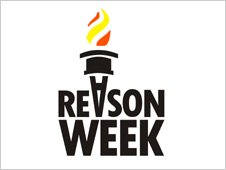

Event Details
26 February 2013 Birmingham, UK Maryam Namazie will be speaking at Birmingham University Reason Week on 26 February hosted by the Atheist, Secular and Humanist Society on Apostasy and Freedom of Conscience from 1900-2030 hours. Arts Building LR7.
Event Details
26 February 2013
Birmingham, UK
Maryam Namazie will be speaking at Birmingham University Reason Week on 26 February hosted by the Atheist, Secular and Humanist Society on Apostasy and Freedom of Conscience from 1900-2030 hours. Arts Building LR7.
For more information, go here.
Time
(Tuesday) 7:00 pm - 8:30 pm
Location
See post
address

















Event Details
25 February 2013 Ex-Muslim apostate and refugee meet-up group from 11:30am-1:00pm. To RSVP and receive further details, email exmuslimcouncil@gmail.com.
Event Details
25 February 2013
Ex-Muslim apostate and refugee meet-up group from 11:30am-1:00pm. To RSVP and receive further details, email exmuslimcouncil@gmail.com.
Time
(Monday) 11:30 am - 1:30 pm
Location
See post
address

















Event Details
23 February 2013, 12pm, the Northern Ex-Muslim Meet-up Group is organising an Infidelicious lunch in Leeds. To join the event, visit here.
Event Details
23 February 2013, 12pm, the Northern Ex-Muslim Meet-up Group is organising an Infidelicious lunch in Leeds. To join the event, visit here.
Time
(Saturday) 12:00 pm - 2:00 pm
Location
Leeds
2013fri15febAll DayMuslimish launch in Washington, DC(All Day: friday) address






Event Details
15 February 2013 Muslimish is launching a new group in Washington DC, USA. If you or someone you know is an ex-Muslim who is willing to start a meet-up in your city or wants to participate in the NYC, Detroit, Washington DC, Chicago or the online meetings please contact us at muslimishnyc@gmail.com. Muslimish is affiliated with the Council of Ex-Muslims of Britain.
Event Details
15 February 2013
Muslimish is launching a new group in Washington DC, USA. If you or someone you know is an ex-Muslim who is willing to start a meet-up in your city or wants to participate in the NYC, Detroit, Washington DC, Chicago or the online meetings please contact us at muslimishnyc@gmail.com. Muslimish is affiliated with the Council of Ex-Muslims of Britain.
Time
All Day (Friday)
Location
See post
address
2013thu14feb6:00 pmthu9:00 pmNorthern Ex-Muslim Meet-up in Manchester6:00 pm - 9:00 pm address








Event Details
14 February 2013, 6pm, the Northern Ex-Muslim Meet-up Group is organising a meet-up in Manchester. To join the event, visit here.
Event Details
14 February 2013, 6pm, the Northern Ex-Muslim Meet-up Group is organising a meet-up in Manchester. To join the event, visit here.
Time
(Thursday) 6:00 pm - 9:00 pm
Location
See post
address
2013mon11feb7:00 pmmon9:00 pmLondon Launch of Centre for Secular Space book7:00 pm - 9:00 pm
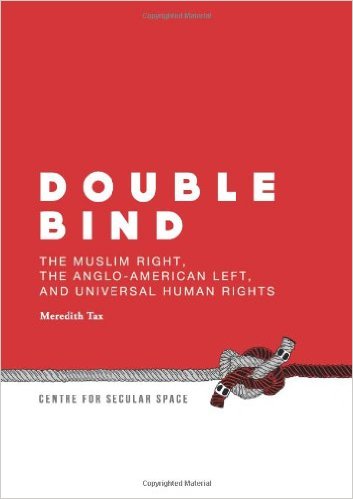

Event Details
On February 11th, at 7pm at Toynbee Hall in East London, the Centre for Secular Space launches its first publication, Double Bind: the Muslim Right, the Anglo-American Left, and Universal Human Rights by Meredith Tax. Speakers at the event include Meredith Tax, Gita Sahgal, Maryam Namazie and Ansar Ahmed Ullah. For more information, contact: admin@centreforsecularspace.org.
Event Details
On February 11th, at 7pm at Toynbee Hall in East London, the Centre for Secular Space launches its first publication, Double Bind: the Muslim Right, the Anglo-American Left, and Universal Human Rights by Meredith Tax. Speakers at the event include Meredith Tax, Gita Sahgal, Maryam Namazie and Ansar Ahmed Ullah. For more information, contact: admin@centreforsecularspace.org.
Time
(Monday) 7:00 pm - 9:00 pm
Location
Toynbee Hall
2013sat09febAll DayNorthern Ex-Muslim Meet-Up Group Day trip to Liverpool(All Day: saturday) address

















Event Details
9 February 2013, the Northern Ex-Muslim Meet-up Group is organising a day trip to Liverpool. To join the event, visit here.
Event Details
9 February 2013, the Northern Ex-Muslim Meet-up Group is organising a day trip to Liverpool. To join the event, visit here.
Time
All Day (Saturday)
Location
See post
address
march 2013
2013sat30mar12:00 pmsat2:00 pmManch March Lunch12:00 pm - 2:00 pm address

















Event Details
30 March 2013, 12pm Northern Ex-Muslim Meet-Up Group is doing a Manch March Lunch in Manchester. To join the event, visit here.
Event Details
30 March 2013, 12pm
Northern Ex-Muslim Meet-Up Group is doing a Manch March Lunch in Manchester. To join the event, visit here.
Time
(Saturday) 12:00 pm - 2:00 pm
Location
See post
address


Event Details
24 March 2013, 2:30pm Northern Ex-Muslim Meet-Up Group is celebrating Spring equinox/Nowroz with a party in Manchester. To join the event, visit here.
Event Details
24 March 2013, 2:30pm
Northern Ex-Muslim Meet-Up Group is celebrating Spring equinox/Nowroz with a party in Manchester. To join the event, visit here
Time
(Sunday) 2:30 pm - 4:00 pm
Location
Manchester
2013fri15marAll DayMuslimish launch in Chicago(All Day: friday) address






Event Details
15 March 2013 Muslimish is launching a new group in Chicago, USA. If you or someone you know is an ex-Muslim who is willing to start a meet-up in your city or wants to participate in the NYC, Detroit, Washington DC, Chicago or the online meetings please contact us at muslimishnyc@gmail.com. Muslimish is affiliated with the Council of Ex-Muslims of Britain.
Event Details
15 March 2013
Muslimish is launching a new group in Chicago, USA. If you or someone you know is an ex-Muslim who is willing to start a meet-up in your city or wants to participate in the NYC, Detroit, Washington DC, Chicago or the online meetings please contact us at muslimishnyc@gmail.com. Muslimish is affiliated with the Council of Ex-Muslims of Britain.
Time
All Day (Friday)
Location
See post
address
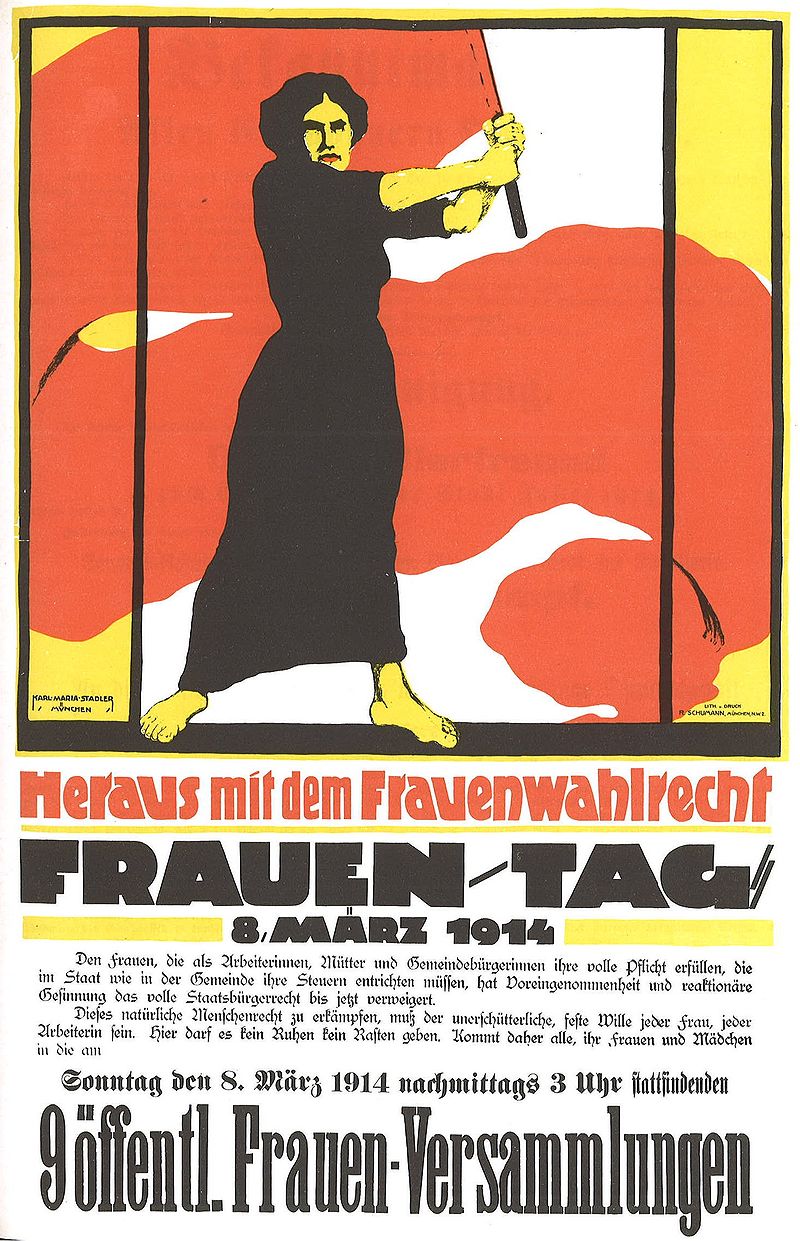

Event Details
8 March 2013, 4pm Frankfurt, Germany Seminar to mark International Women’s Day Speakers: Mina Ahadi, International Committee against Stoning and Council of Ex-Muslims of Germany; Nadeen Gamil, Egyptian Women's Union; Necla Kelek, Sociologist; Houzan Mahmoud, Organisation of Women's Freedom in Iraq; Maryam Namazie, One Law for All, Council of Ex-Muslims of Britain and Equal Rights Now - Organisation against Women's Discrimination in Iran; Taslima Nasrin, Writer; and Zana Ramadani, FEMEN Germany. Place: (Uni Frankfurt) Asta, Festsaal, Bockenheimer Warte, Merton Str.26-28, 60325 Frankfurt am Main. For more information: 015774650186.
Event Details
8 March 2013, 4pm
Frankfurt, Germany
Seminar to mark International Women’s Day
Speakers: Mina Ahadi, International Committee against Stoning and Council of Ex-Muslims of Germany; Nadeen Gamil, Egyptian Women’s Union; Necla Kelek, Sociologist; Houzan Mahmoud, Organisation of Women’s Freedom in Iraq; Maryam Namazie, One Law for All, Council of Ex-Muslims of Britain and Equal Rights Now – Organisation against Women’s Discrimination in Iran; Taslima Nasrin, Writer; and Zana Ramadani, FEMEN Germany. Place: (Uni Frankfurt) Asta, Festsaal, Bockenheimer Warte, Merton Str.26-28, 60325 Frankfurt am Main. For more information: 015774650186.
more
Time
(Friday) 4:00 pm - 8:00 pm
Location
See post
address

















Event Details
2 March 2013, 2pm, the Northern Ex-Muslim Meet-up Group is going out bowling in Leeds. To join the event, visit here.
Event Details
2 March 2013, 2pm, the Northern Ex-Muslim Meet-up Group is going out bowling in Leeds. To join the event, visit here.
Time
(Saturday) 2:00 pm - 5:00 pm
Location
Leeds
april 2013
may 2013
2013fri17mayAll Daysun19Washington DC Women in Secularism 2 Conference(All Day) address



Event Details
Maryam Namazie will be speaking at the Women in Secularism Conference 2 in Washington, DC during 17-19 May 2012. For more details, click here.
Event Details
Maryam Namazie will be speaking at the Women in Secularism Conference 2 in Washington, DC during 17-19 May 2012. For more details, click here.
Time
may 17 (Friday) - 19 (Sunday)
Location
See post
address
2013thu09may6:30 pmthu8:00 pmLondon Evening Drinks with Author Rumy Hassan6:30 pm - 8:00 pm address
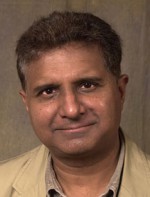

Event Details
9 May 2013 Evening drinks with author Rumy Hassan. 6:30-8:00pm. To RSVP and receive further details, email exmuslimcouncil@gmail.com. £3 entry; £1 for unwaged. 15 June 2013 CEMB sixth anniversary luncheon with keynote speaker Kenan Malik. More details to follow. 20 July 2013 Ex-Muslim Picnic. More details to follow. 19 September 2013 Evening Drinks with philosopher Arif Ahmed. More details to follow.
Event Details
9 May 2013
Evening drinks with author Rumy Hassan. 6:30-8:00pm. To RSVP and receive further details, email exmuslimcouncil@gmail.com. £3 entry; £1 for unwaged.
15 June 2013
CEMB sixth anniversary luncheon with keynote speaker Kenan Malik. More details to follow.
20 July 2013
Ex-Muslim Picnic. More details to follow.
19 September 2013
Evening Drinks with philosopher Arif Ahmed. More details to follow.
Time
(Thursday) 6:30 pm - 8:00 pm
Location
See post
address
june 2013








Time
(Saturday) 12:00 pm - 2:00 pm
Location
Manchester
2013sat29junAll Daysun30International Conference on Women and Secularism, Dublin(All Day) address


Event Details
29-30 June 2013 Dublin, Ireland Atheist Ireland is hosting an international conference on Empowering Women Through Secularism.
Event Details
29-30 June 2013
Dublin, Ireland
Atheist Ireland is hosting an international conference on Empowering Women Through Secularism.
Time
june 29 (Saturday) - 30 (Sunday)
Location
See post
address
2013sat15jun12:00 pmsat6:00 pm6th Anniversary Luncheon12:00 pm - 6:00 pm address












Event Details
Join us to celebrate the 6th anniversary of the Council of Ex-Muslims of Britain 15 June 2013 at 12pm for a 12:30pm start at an Italian restaurant in central London. The keynote speaker will be writer Kenan Malik. Other speakers and acts include Magician Neil Edwards, Centre for Secular Space's Executive Director Gita Sahgal, comedian Kate Smurthwaite and CEMB spokesperson Maryam Namazie. Nahla Mahmoud will be the MC for the event. Special guests present include scientist Richard Dawkins. Book your tickets today.
Event Details
Join us to celebrate the 6th anniversary of the Council of Ex-Muslims of Britain 15 June 2013 at 12pm for a 12:30pm start at an Italian restaurant in central London.
The keynote speaker will be writer Kenan Malik. Other speakers and acts include Magician Neil Edwards, Centre for Secular Space’s Executive Director Gita Sahgal, comedian Kate Smurthwaite and CEMB spokesperson Maryam Namazie. Nahla Mahmoud will be the MC for the event.
Special guests present include scientist Richard Dawkins.
Book your tickets today.
Tickets for the event, which includes a three-course meal and glass of wine at a wonderful Italian restaurant, are £35.00 per person or £30.00 for students/unwaged.
To purchase tickets, send a cheque made payable to CEMB to BM Box 1919, London WC1N 3XX or pay via Paypal or Worldpay. Please make sure to include an email address and/or telephone number so that further details can be provided. Additional donations are welcome to help ensure the attendance of CEMB volunteers at the event.
more
Time
(Saturday) 12:00 pm - 6:00 pm
Location
See post
address
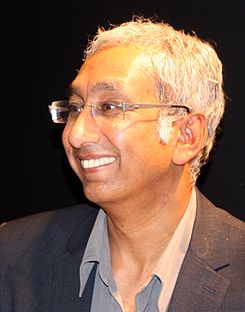

Event Details
15 June 2013 15 June 2013 CEMB sixth anniversary luncheon with keynote speaker Kenan Malik. Other speakers/acts include comedian Kate Smurthwaite and CEMB Spokesperson Maryam Namazie. 12pm for 1230pm start. Central London location. Tickets are £35; £30 unwaged and include a three course meal. Reserve your space now by emailing exmuslimcouncil@gmail.com.
Event Details
15 June 2013
15 June 2013
CEMB sixth anniversary luncheon with keynote speaker Kenan Malik. Other speakers/acts include comedian Kate Smurthwaite and CEMB Spokesperson Maryam Namazie. 12pm for 1230pm start. Central London location. Tickets are £35; £30 unwaged and include a three course meal. Reserve your space now by emailing exmuslimcouncil@gmail.com.
Time
(Saturday) 12:00 pm - 2:00 pm
Location
See post
address
july 2013








Event Details
Northern Ex-Muslim Meet-Up Group is organising a camping trip.
Event Details
22 July 2013
Northern Ex-Muslim Meet-Up Group is organising a camping trip. For more details, see the full listing.
Time
All Day (Monday)
Location
See post
address


Event Details
FRENCH BELOW Saturday 6 July 2013, 14.00-17.00 hours Paris, France Launch of the Council of Ex-Muslims of France. Maison des Ensembles, 3-5 rue
Event Details
Saturday 6 July 2013, 14.00-17.00 hours
Paris, France
Launch of the Council of Ex-Muslims of France.
Maison des Ensembles, 3-5 rue d’Aligre, Paris 75012. ( Salle au premier étage, à côté des locaux de Femmes Solidaires et de Clara Magazine).
Join us for the launch of the Council of Ex-Muslims of France. Speakers include Palestinian blogger Waleed Al-Husseini, Tunisian Filmmaker Nadia El-Fani, Secularism is a Women’s Issue Coordinator Marieme Helie Lucas, and Council of Ex-Muslims of Britain’s Maryam Namazie.
PLEASE NOTE YOU MUST REGISTER FOR THE MEETING AT cafem1310@live.fr. IF YOU ARE NOT REGISTERED, YOU WILL NOT BE GIVEN ENTRY INTO THE MEETING.
On 1 July, the young Frenchman Jean-François Lefevre de la Barre (September 12, 1745 – July 1, 1766) was tortured and murdered before his body was burnt on a pyre along with Voltaire’s “Philosophical Dictionary” for refusing to remove his hat while a religious procession passed by.
Today, countless la Barres face threats, torture, imprisonment and death for apostasy, blasphemy, heresy, and refusing to comply with Islamist norms.
To commemorate la Barre and to stand with the many men and women who refuse and resist, we announce the launch of the Council of Ex-Muslims of France on Saturday 6 July 2013, 14.00-17.00 hours.
Speakers include Palestinian blogger Waleed Al-Husseini, Tunisian Filmmaker Nadia El-Fani, Secularism is a Women’s Issue Coordinator Marieme Helie Lucas, Council of Ex-Muslims of Britain’s Maryam Namazie and more.
The Council of Ex-Muslims of France has the following aims:
1. We call for universal rights and full equality and oppose tolerance of inhuman beliefs, discrimination and ill-treatment in the name of respecting religion and culture.
2. Freedom to criticise religion. Prohibition of restrictions on unconditional freedom of criticism and expression using so-called religious ‘sanctities’.
3. Freedom of religion and atheism
4. Separation of religion from the state and the educational and legal system
5. Prohibition of religious customs, rules, ceremonies or activities that are incompatible with or infringe people’s rights and freedoms
6. Abolition of all restrictive and repressive cultural and religious customs which hinder and contradict woman’s independence, free will and equality. Prohibition of segregation of sexes.
7. Prohibition of interference by any authority, family members or relatives, or official authorities in the private lives of women and men and their personal, emotional and sexual relationships and sexuality
8. Protection of children from manipulation and abuse by religion and religious institutions
9. Prohibition of any kind of financial, material or moral support by the state or state institutions to religion and religious activities and institutions.
10. Prohibition of all forms of religious intimidation and threats.
We look forward to your joining us. If you have any questions, please contact us.
Waleed Al-Husseini, Palestinian Blogger
Maryam Namazie, Council of Ex-Muslims of Britain
CONSEIL DES EX-MUSULMANS DE FRANCE
LE 6 JUILLET À PARIS
Le 1er juillet 1766, le jeune Chevalier de la Barre (1745 –1766) fut torturé et mis à mort, son corps ensuite brulé sur un bucher en compagnie du Dictionnaire Philosophique de Voltaire: son seul crime fut d’avoir refusé de soulever son chapeau au passage d’une procession religieuse.
Aujourd’hui, d’innombrables Jean-François Lefevre de la Barre sont menacés, torturés, emprisonnés, mis à mort pour apostasie, blaspheme, hérésie et pour refus de se plier aux dictats islamistes.
En commémoration de l’assassinat de La Barre et en solidarité avec les nombreux hommes et femmes qui, comme lui, refusent et résistent aujourd’hui, nous annonçons le lancement d’une nouvelle organisation: le Conseil des ex-Musulmans de France, qui aura lieu le samedi 6 juillet 2013, de 14 à 17h à la Maison des Ensembles, 3-5 rue d’Aligre, Paris 75012. ( Salle au premier étage, à côté des locaux de Femmes Solidaires et de Clara Magazine).
Le bloggeur palestinien Waleed Al-Husseini, la cinéaste tunisienne Nadia El-Fani, la journaliste laïque Caroline Fourest, la sociologue algérienne Marieme Helie Lucas, la fondatrice du Conseil des ex-Musulmans de Grande Bretagne Maryam Namazie et beaucoup d’autres seront parmi les intervenants…
Le Conseil des ex-Musulmans de France se donne les objectifs suivants:
Nous réclamons les droits universels, l’égalité totale, et nous nous opposons à toute tolérance envers des croyances inhumaines, envers toute discrimination et tout mauvais traitement, infligés au nom du respect de la religion et de la culture.
2. La liberté de critiquer les religions. L’interdiction de toute restriction à la liberté inconditionnelle de critique et d’expression, sous couleur du caractère sacré de la religion.
3. La liberté de religion et d’athéisme
4. La séparation de la religion d’avec l’Etat, le système éducatif, et le système légal.
5. L’interdiction des coutumes, règles, cérémonies ou activités religieuses qui sont incompatibles avec ou violents les droits et libertés des peuples
6. La prohibition de toute coutume culturelle ou religieuse qui freine ou s’oppose à l’autonomie des femmes, à leur volonté et à l’égalité. La prohibition de la ségrégation des sexes.
7. La prohibition de toute interférence par quelque autorité, familiale ou parentale, ou par les autorités officielles dans la vie privée des femmes et des hommes et dans leur relations personnelles émotionnelles et sexuelles, et leur sexualité.
8. La protection des enfants contre toute manipulation et abus par la religion et les institutions religieuses
9. L’interdiction de toute forme de soutien financier, matériel ou moral accordé par l’Etat ou les institutions de l’Etat aux religions, aux activités religieuses et à leurs institutions.
10. L’interdiction de toute forme de menaces et d’intimidations religieuses.
Nous comptons sur votre présence et votre soutien,
Waleed Al-Husseini, bloggeur palestinien
Maryam Namazie, Conseil des ex-Musulmans de Grande Bretagne
more
Time
(Saturday) 2:00 pm - 4:00 pm
Location
Maison des Ensembles
3-5 rue d’Aligre








Event Details
6 July 2013, 1pm The Northern Ex-Muslim Meetup Group is organising a Pre-Ramadhan Lunch in Bradford. For more details, see the full listing.
Event Details
6 July 2013, 1pm
The Northern Ex-Muslim Meetup Group is organising a Pre-Ramadhan Lunch in Bradford. For more details, see the full listing.
Time
(Saturday) 1:00 pm - 3:00 pm
Location
Bradford
august 2013



Event Details
30 August - 2 September 2013 Boston, USA Maryam Namazie will be speaking at Atheist Alliance of America Conference. For more information, click here.
Event Details
30 August – 2 September 2013
Boston, USA
Maryam Namazie will be speaking at Atheist Alliance of America Conference. For more information, click here.
Time
August 30 (Friday) - September 2 (Monday)
Location
Boston
Organizer












Event Details
24 August 2013 Northern Ex-Muslim Meet-Up Group is organising a lunch in Manchester. For more details, see the full listing.
Event Details
24 August 2013
Northern Ex-Muslim Meet-Up Group is organising a lunch in Manchester. For more details, see the full listing.
Time
(Saturday) 7:00 pm - 9:00 pm
Location
Manchester
2013thu22augAll Daysat24Discussion on Arab revolutions and Feminism in Marseilles(All Day)


Event Details
22-24 August 2013 Marseilles, France Maryam Namazie will be speaking on Arab revolutions and Feminism panel organised by the Green Party's Feminism Group. More information can be found here.
Event Details
22-24 August 2013
Marseilles, France
Maryam Namazie will be speaking on Arab revolutions and Feminism panel organised by the Green Party’s Feminism Group. More information can be found here.
Time
august 22 (Thursday) - 24 (Saturday)
Location
Marseilles
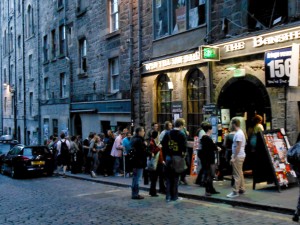

Event Details
11 August 2013 Edinburgh, Scotland 3:30 pm - 4:30 pm at: The Jam House, 5 Queen Street, EH2 1JE Maryam will be speaking at Skeptics on the Fringe Festival on "Secularism is my right; freedom my culture".
Event Details
11 August 2013
Edinburgh, Scotland
3:30 pm – 4:30 pm at: The Jam House, 5 Queen Street, EH2 1JE
Maryam will be speaking at Skeptics on the Fringe Festival on “Secularism is my right; freedom my culture”. More details here.
Time
(Sunday) 3:30 pm - 4:30 pm
Location
The Jam House
5 Queen Street












Event Details
10 August 2013 Northern Ex-Muslim Meet-Up Group is organising a lunch in Dewsbury. For more details, see the full listing.
Event Details
10 August 2013
Northern Ex-Muslim Meet-Up Group is organising a lunch in Dewsbury. For more details, see the full listing.
Time
(Saturday) 7:00 pm - 9:00 pm
Location
Dewsbury
september 2013


Event Details
Maryam Namazie will be speaking at a Glasgow Skeptics organised meeting on 30 September 2013 and at the University of Edinburgh Humanists on 1 October to mark International blasphemy day. More details to follow.
Event Details
Maryam Namazie will be speaking at a Glasgow Skeptics organised meeting on 30 September 2013 and at the University of Edinburgh Humanists on 1 October to mark International blasphemy day. More details to follow.
Time
(Monday) 7:00 pm - 9:00 pm
Location
See post
address
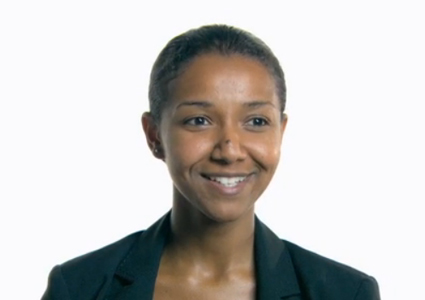


Event Details
Nahla Mahmoud will be speaking on Friday, 27th September 2013 at 7:30pm at an event organised by Nottingham Secular Society. Subject : International Apostasy Laws: a Journey of an Ex-Muslim Place: The Nottingham Mechanics, 3 North Sherwood Street, Nottingham NG1 4EZ. More details can be found here: http://www.nottinghamsecularsociety.org.uk/
Event Details
Nahla Mahmoud will be speaking on Friday, 27th September 2013 at 7:30pm at an event organised by Nottingham Secular Society.
Subject: International Apostasy Laws: a Journey of an Ex-Muslim
Place: The Nottingham Mechanics, 3 North Sherwood Street, Nottingham NG1 4EZ. More details can be found here: http://www.nottinghamsecularsociety.org.uk/
Time
(Friday) 7:30 am - 9:00 am
Location
The Nottingham Mechanics
3 North Sherwood Street
Organizer
2013thu19sep6:30 pmthu9:00 pmEvening Drinks with Arif Ahmed6:30 pm - 9:00 pm 213 Strand
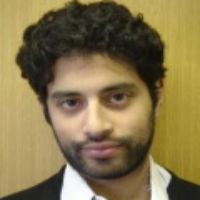

Event Details
Evening Drinks with philosopher Arif Ahmed. 6:30-8:00pm at The George on the Strand, 213 Strand, London WC2R 1AP. Entry is £3; £1 for unwaged, which can be paid at the door. All are welcome. For more information, email exmuslimcouncil@gmail.com.
Event Details
Evening Drinks with philosopher Arif Ahmed. 6:30-8:00pm at The George on the Strand, 213 Strand, London WC2R 1AP. Entry is £3; £1 for unwaged, which can be paid at the door. All are welcome. For more information, email exmuslimcouncil@gmail.com.
Time
(Thursday) 6:30 pm - 9:00 pm
Location
The George
213 Strand

















Event Details
There will be a CEMB London meetup for apostate refugees and asylum seekers on 19 September from 5-6pm at The George on the Strand, 213 Strand, London WC2R 1AP. For more information, email exmuslimcouncil@gmail.com.
Event Details
There will be a CEMB London meetup for apostate refugees and asylum seekers on 19 September from 5-6pm at at The George on the Strand, 213 Strand, London WC2R 1AP. All are welcome. For more information, email exmuslimcouncil@gmail.com.
Time
(Thursday) 5:00 pm - 6:00 pm
Location
The George
213 Strand
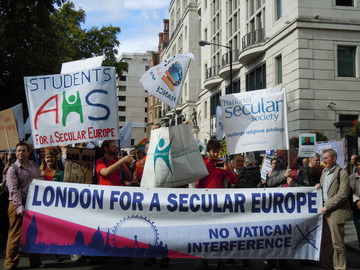

Event Details
The Central London Humanist Group are organising a Secular Europe Campaign March and Rally on Saturday 14th September 2013. We will assemble at 12.30pm in Temple Place, next to Temple Tube Station, the March will start at 1.00pm and end in a Rally at Richmond Terrace, opposite Downing Street. We will be using hashtag #SECM2013. More details to follow.
Event Details
Council of Ex-Muslims of Britain is endorsing the Central London Humanist Group’s Secular Europe March and Rally on Saturday 14th September 2013.
We will assemble at 12.30pm in Temple Place, next to Temple Tube Station, the March will start at 1.00pm and end in a Rally at Richmond Terrace, opposite Downing Street at around 2pm.
Confirmed speakers include Sue Cox (Survivors Voice), Charlie Klendjian (Lawyers Secular Society), Rory Fenton (AHS President), Philosopher AC Grayling, Adam Knowles (Chair of GALHA – LGBT Humanists), Philosopher Stephen Law, Houzan Mahmoud (Organisation for Iraqi Women’s Freedom), Nahla Mahmoud (Council of Ex Muslims of Britain), Maryam Namazie (Fitnah, CEMB and One Law for All), Pragna Patel (Southall Black Sisters), Naomi Phillips (Chair of Labour Humanists), Nina Sankari (Polish Rationalist Association) and Anne Marie Waters (One Law for All) amongst others.
More information available here: Join event page on Facebook and Event page on Meetup. We will be using the hashtag #SECM2013.
Join us!
more
Time
(Saturday) 12:30 pm - 2:00 pm
Location
Temple Place
Organizer



Event Details
30 August - 2 September 2013 Boston, USA Maryam Namazie will be speaking at Atheist Alliance of America Conference. For more information, click here.
Event Details
30 August – 2 September 2013
Boston, USA
Maryam Namazie will be speaking at Atheist Alliance of America Conference. For more information, click here.
Time
August 30 (Friday) - September 2 (Monday)
Location
Boston
Organizer
october 2013
2013tue29oct6:00 pmtue11:00 pmEx-Muslim North In Da Pub6:00 pm - 11:00 pm address








Event Details
29 October 2013 6:00pm Ex-Muslim North In Da Pub For more details, see the full listing. .
Event Details
29 October 2013
6:00pm
Ex-Muslim North In Da Pub
For more details, see the full listing.
Time
(Tuesday) 6:00 pm - 11:00 pm
Location
See post
address
2013thu24oct6:00 pmthu8:00 pmMaryam Namazie on women's movements at House of Lords6:00 pm - 8:00 pm


Event Details
24 October 2013 London, UK Maryam Namazie will speak on a panel entitled 'Women's Movements Changing Women Changing the World' at a House of Lord Seminar organised by Women Worldwide Advancing Freedom & Equality (WWAFE). Place: Committee Room 1, 6.00pm to 8.00pm House of Lords. [We will begin promptly, so arrival at 5.30pm will ensure you gain a seat.]
Event Details
24 October 2013
London, UK
Maryam Namazie will speak on a panel entitled ‘Women’s Movements Changing Women Changing the World’ at a House of Lord Seminar organised by Women Worldwide Advancing Freedom & Equality (WWAFE). Place: Committee Room 1, 6.00pm to 8.00pm House of Lords. [We will begin promptly, so arrival at 5.30pm will ensure you gain a seat.]
Time
(Thursday) 6:00 pm - 8:00 pm
Location
London





Event Details
LSESU Atheist, Secularist and Humanist Society public debate Date: Tuesday 15 October 2013 Time: 6.30-8pm Venue: CLM4.02, Clement House Speakers: Akeela Ahmed, Dr Edie Friedman, Dr Taj Hargey, Maryam Namazie Chair: Professor Chetan Bhatt Is the Niqab (face veil) a human right, a security concern or a symbol of oppression? Given the most recent events, this debate will shed some light on this controversial topic. Akeela Ahmed is the Director of the Christian Muslim Forum. Edie Friedman is the founder and Executive Director of the Jewish Council for Racial Equality. Taj Hargey is the Director of the Muslim Educational Centre of Oxford. Maryam Namazie is the founder and spokesperson for One Law for All and the Council of Ex-Muslims of Britain. This event is free and open to all with no ticket required. Entry is on a first come, first served basis. For any queries email c.m.moos@lse.ac.uk or call 074 2872 0599.
Event Details
LSESU Atheist, Secularist and Humanist Society public debate
Date: Tuesday 15 October 2013
Time: 6.30-8pm
Venue: CLM4.02, Clement House
Speakers: Akeela Ahmed, Dr Edie Friedman, Dr Taj Hargey, Maryam Namazie
Chair: Professor Chetan Bhatt
Is the Niqab (face veil) a human right, a security concern or a symbol of oppression? Given the most recent events, this debate will shed some light on this controversial topic.
Akeela Ahmed is the Director of the Christian Muslim Forum.
Edie Friedman is the founder and Executive Director of the Jewish Council for Racial Equality.
Taj Hargey is the Director of the Muslim Educational Centre of Oxford.
Maryam Namazie is the founder and spokesperson for One Law for All and the Council of Ex-Muslims of Britain.
This event is free and open to all with no ticket required. Entry is on a first come, first served basis. For any queries email c.m.moos@lse.ac.uk or call 074 2872 0599.
more
Time
(Tuesday) 6:30 pm - 8:00 pm
Location
CLM4.02, Clement House
2013sat12oct2:30 pmsat6:30 pmCelebrating Black Atheist History2:30 pm - 6:30 pm 22 Fleet Street




Event Details
Saturday 12 October 2013 – 2.30 pm – 6.30 pm at Ye Olde Cock Tavern – Upstairs – 22 Fleet Street, London EC4Y 1AA This is a fun event to recognise, value and celebrate black atheist history, including a variety show. The first part will include two talks. The first to recognise the place of black atheists in the organisation of the March on Washington, in the year of its 50th anniversary. The second, a video especially created for the event by Professor Chris Stringer of the Natural History Museum, who is a leading authority in the field of human evolution. The second part of the event is to celebrate the creativity and joy of black atheism with performances of comedy, magic and music.
Event Details
Saturday 12 October 2013 – 2.30 pm – 6.30 pm at Ye Olde Cock Tavern – Upstairs – 22 Fleet Street, London EC4Y 1AA
This is a fun event to recognise, value and celebrate black atheist history, including a variety show.
The first part will include two talks. The first to recognise the place of black atheists in the organisation of the March on Washington, in the year of its 50th anniversary. The second, a video especially created for the event by Professor Chris Stringer of the Natural History Museum, who is a leading authority in the field of human evolution.
The second part of the event is to celebrate the creativity and joy of black atheism with performances of comedy, magic and music, which will include:
Jobeda Ali – comedian
Nayim Kahn – magician/illusionist
Lola Tinubu – making her stand up comedy debut
Henri Gaobi – master drummer from Côte d’Ivoire
London Black Atheists is suggesting a voluntary donation of £3.00.
Tickets are limited due to the size of the venue (please only book if you are sure you will attend).
more
Time
(Saturday) 2:30 pm - 6:30 pm
Location
Ye Olde Cock Tavern
22 Fleet Street
november 2013
2013fri29nov7:00 pmfri9:00 pmKafir Comedy Club7:00 pm - 9:00 pm 213 Strand


Event Details


Event Details
Kafir Comedy Club
29 November 2013 @ 7-9 PM
Hosted by DJ Zee Jay & Maha
Open mic comedy for interested kuffar starts at 8 pm.
Look, we know it’s not easy defending yourself constantly against a religious mob. So take a break from the Facebook forums and let out the frustration with a laugh. If you’ve got some steam to let off, this is your night to do it. RSVP below to get on the list. But don’t laugh too much, Hell awaits us all later.*
Please note: We care about the safety of our guests attending this night of fun and laughs. For your security, staff will be doing bag checks and general supervision during the show. Please note that unauthorized recording (audio or video) via mobile or otherwise is strictly prohibited.
Sponsored by the Council of Ex-Muslims Britain.
exmuslimcouncil@gmail.com | The George, 213 Strand, London (nearest Tube: Temple) | Friday November 29, 2013, 7 PM
* “Let them laugh a little: much will they weep: a recompense for the (evil) that they do.” (Surah At-Taubah 9:82)
Entry: £3. £1 for unwaged.
more
Time
(Friday) 7:00 pm - 9:00 pm
Location
The George
213 Strand

















Event Details
29 November 2013 5:00-6:00pm There will be a CEMB London meetup for apostate refugees and asylum seekers at The George on the Strand, 213 Strand, London WC2R 1AP. To register your attendance, email exmuslimcouncil@gmail.com.
Event Details
29 November 2013
5:00-6:00pm
There will be a CEMB London meetup for apostate refugees and asylum seekers at The George on the Strand, 213 Strand, London WC2R 1AP. To register your attendance, email exmuslimcouncil@gmail.com.
Time
(Friday) 5:00 pm - 6:00 pm
Location
The George
213 Strand
2013fri15novAll Daysat16Global Secularism Conference, New York(All Day)
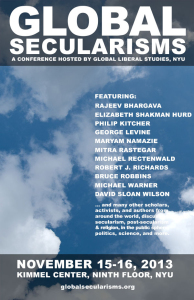

Event Details
Maryam Namazie will be speaking at the Global Secularisms Conference at New York University.
Event Details
15-16 November 2013
New York, USA
Maryam Namazie will be speaking at the Global Secularisms Conference at New York University. For more details, visit here.
Time
november 15 (Friday) - 16 (Saturday)
Location
New York
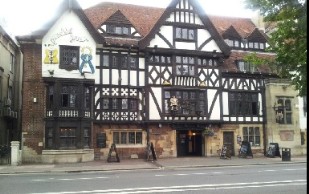

Event Details
6 November 2013 Brighton, UK Maryam Namazie will be speaking at a meeting organised by the Brighton and Hove Humanist Society at 730pm at "The Sussex" Pub, 17 St. Catherine's Terrace, Hove, East Sussex, BN3 2RH. More information available here.
Event Details
6 November 2013
Brighton, UK
Maryam Namazie will be speaking at a meeting organised by the Brighton Secular Humanists at 730pm at Sallis Benney Theatre, Brighton University, Grand Parade, Brighton, East Sussex, BN2 0JY. More information available here.
Time
(Wednesday) 7:30 pm - 9:00 pm
Location
Sallis Benney Theatre, Brighton University
Grand Parade
Organizer
2013sat02nov12:00 pmsat2:00 amEx-Muslim North Buffet in Manchester12:00 pm - 2:00 am








Event Details
2 November 2013 12:00 noon Ex-Muslim North Buffet in Manchester For more details, see the full listing.
Event Details
2 November 2013
12:00 noon
Ex-Muslim North Buffet in Manchester
For more details, see the full listing.
Time
(Saturday) 12:00 pm - 2:00 am
Location
Manchester
december 2013
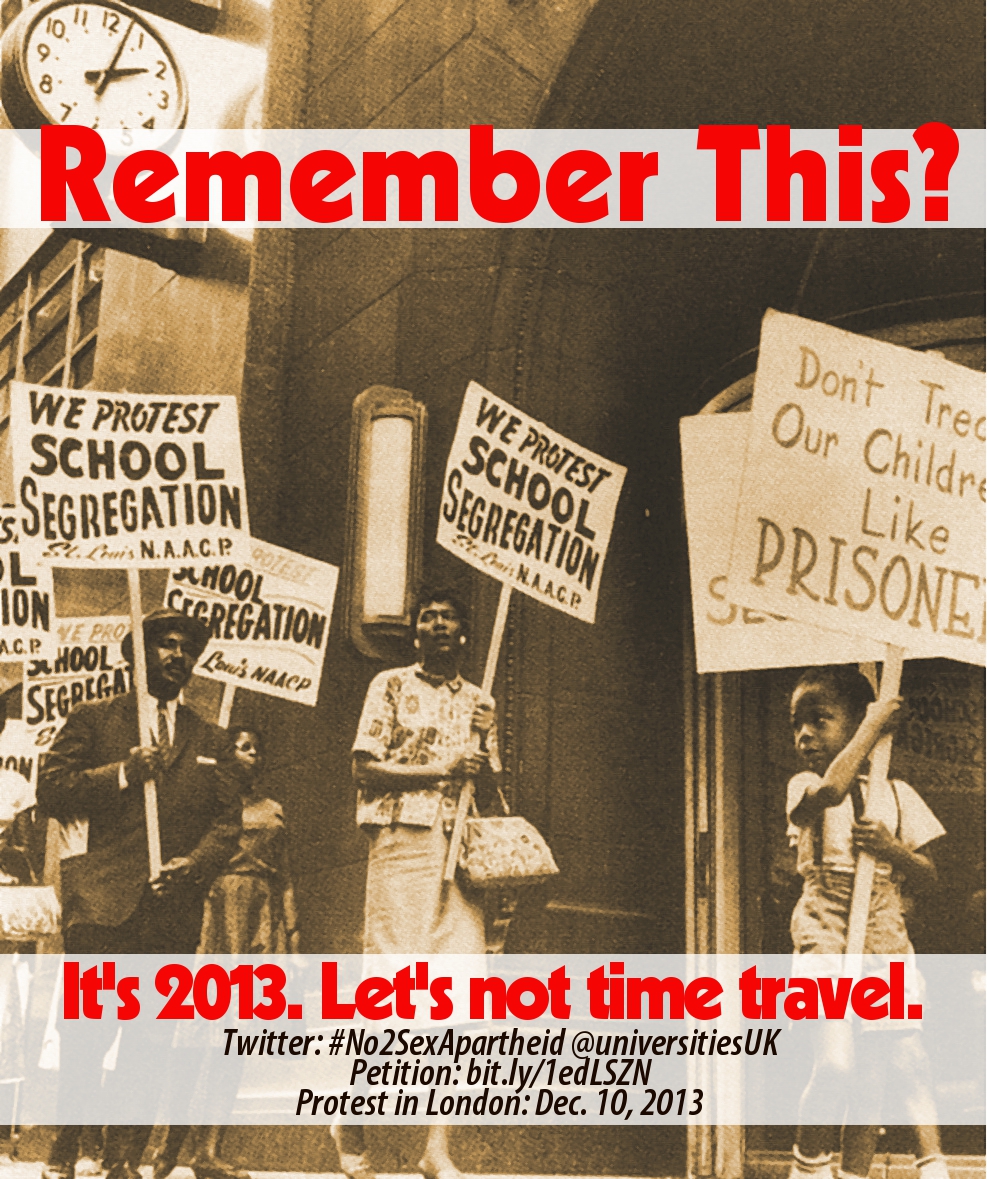

Event Details
DATE: Tuesday 10 December 2013 TIME: 5:00-6:30pm AT: Universities UK, Woburn House, 20 Tavistock Square, London WC1H 9HQ (Closest Underground Stations: Euston
Event Details


TIME: 5:00-6:30pm
AT: Universities UK, Woburn House, 20 Tavistock Square, London WC1H 9HQ (Closest Underground Stations: Euston or Russell Square)
Universities UK (UUK) guidance to universities on external speakers endorses gender apartheid by saying that segregation of the sexes at universities is not discriminatory as long as “both men and women are being treated equally, as they are both being segregated in the same way!”
Any form of segregation, whether by race, sex or otherwise is discriminatory. Separate is never equal and segregation is never applied to those who are considered equal.
Join Us on International Human Rights Day to unequivocally reject gender apartheid.
It’s 2013. Let’s not time travel.
Contacts: Maryam Namazie, maryamnamazie@gmail.com, 077 1916 6731 or Chris Moos, c.m.moos@lse.ac.uk, 074 2872 0599.
http://fitnah.org/fitnah_campaign_english/uk_sex_segregation.html
more
Time
(Tuesday) 5:00 am - 6:30 am
Location
Universities UK
Woburn House 20 Tavistock Square
january 2012
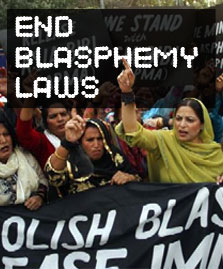


Event Details
28 January 2012 Conway Hall, London Maryam Namazie will be speaking at a conference on ‘Blasphemy!’ – blasphemy, religious hatred, and human rights: who speaks for the sacred? The title of her talk: Blasphemy, Offence, and Islamophobia limiting Citizen Rights. Maryam will be speaking on how accusations of blasphemy, offensive speech and ‘Islamophobia’ censor and restrict free speech, limit citizen rights, and aid and abet Islamism. More information here.
Event Details
28 January 2012
Conway Hall, London
Maryam Namazie will be speaking at a conference on ‘Blasphemy!’ – blasphemy, religious hatred, and human rights: who speaks for the sacred? The title of her talk: Blasphemy, Offence, and Islamophobia limiting Citizen Rights. Maryam will be speaking on how accusations of blasphemy, offensive speech and ‘Islamophobia’ censor and restrict free speech, limit citizen rights, and aid and abet Islamism.
More information here.
Time
(Saturday) 7:00 pm - 9:00 pm
Location
See post
address
february 2012
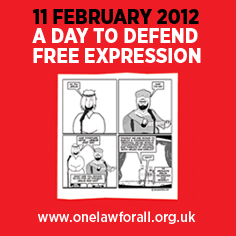

Event Details
The One Law for All 11 February rally for Free Expression is being held in London from
Event Details
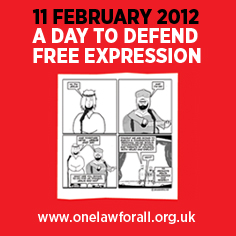

Speakers are: Richard Dawkins (Scientist); A C Grayling (Philosopher); Alex Gabriel (Blogger); Anne Marie Waters (One Law for All); Caroline Cox (Peer); Derek Lennard (Gay and Lesbian Humanist Association); Faisal Gazi (Spittoon.org); Gita Sahgal, (Centre for Secular Space); Hasan Afzal (Stand for Peace); Jennifer Hardy (Queen Mary Atheism Humanism and Secularism Society); Jenny Bartle (National Federation of Atheist, Humanist and Secular Student Societies); Jim Fitzpatrick (MP); Kate Smurthwaite (Comedian); Kenan Malik (Writer); Lilith (Poet, Anti-Injustice Movement) ; Marco Tranchino (Central London Humanist Group); Mark Embleton (Atheism UK); Maryam Namazie (One Law for All and Council of Ex-Muslims of Britain); Nick Cohen (Writer); Nick Doody (Comedian); Pragna Patel (Southall Black Sisters); Rashid Ali (Centri); Rhys Morgan (Student activist); Roy Brown (International Humanist and Ethical Union); Rupert Sutton (Student Rights); Sohaila Sharifi (Equal Rights Now); Sue Cox (Survivors Voice Europe); Sundas Hoorain (London School of Economics Atheist, Secularist, and Humanist Society); Susan Zhuang (University College London Atheist, Secularist and Humanist Society); Terry Sanderson/Keith Porteous Wood (National Secular Society); and Yasmin Rehman (Campaigner). There will also be a message from Jesus and Mo creator. Iranian Secular Society’s Fariborz Pooya will be the Master of Ceremonies.
The call for action follows an increased number of attacks on free expression in the UK, including a 17 year old Rhys Morgan being forced to remove a Jesus and Mo cartoon or face expulsion from his Sixth Form College and demands by the UCL Union that the Atheist society remove a Jesus and Mo cartoon from its Facebook page. It also follows threats of violence, police being called, and the cancellation of a meeting at Queen Mary College where One Law for All spokesperson Anne Marie Waters was to deliver a speech on Sharia. More recently, the LSE Student Union has asked the atheist society to remove its affiliation to the union again due to a Jesus and Mo cartoon.
[To read Maryam Namazie’s recent speech on how accusations of offence and Islamophobia are secular fatwas, click here.]
The Day of Action has already been endorsed by nearly 100 groups and individuals including Jessica Ahlquist, Equal Rights Now, Taslima Nasrin, National Federation of Atheist, Humanist and Secular Student Societies, National Secular Society, Salman Rushdie, Southall Black Sisters, and Peter Tatchell. To see the list and add your own, click here.
In addition to the London rally, there will be actions and acts of solidarity in other cities, including Australia, France, Gambia, Germany, Poland and South Africa. To see the list or to add your own action or event, click here.
Clearly, the time has come to take a firm and uncompromising stand for free expression and against all forms of bogus accusations, threats and censorship.
The right to criticise religion is a fundamental right that is crucial to many, including Muslims.
11 February is our chance to take that stand.
You need to be there.
Enough is enough.
NOTES:
1. Join 11 February Free Expression Day of Action Facebook page here and Tweet #11FebFEDay.
2. The rally is sponsored by The Richard Dawkins Foundation for Reason and Science UK.
3. See recent media coverage of the rally and/or attacks on free expression:
A Day to Stand up for Free Expression, South African Times Live, 24 January 2012 [external link]
How freedom goes, The Spectator, 22 January 2012 [external link]
Strong religious belief is no excuse for intimidation, The Independent, 22 January 2012 [external link]
11 February: A Day to Defend Free Expression, New Zealand’s Scoop, 20 January 2012 [external link]
Islamist stops university talk with threats of violence, National Secular Society Newsline, 17 January 2012 [external link]
3. For more information, and details of the Day of Action, contact:
Maryam Namazie
Anne Marie Waters
One Law for All
BM Box 2387
London WC1N 3XX, UK
Tel: +44 (0) 7719166731
onelawforall@gmail.com
more
Time
(Saturday) 4:00 pm - 6:00 pm
Location
See post
address
2012sat04feb1:00 pmsat2:00 pmSharia law, Stockholm, Sweden1:00 pm - 2:00 pm address




Event Details
4 February 2012, 13.00 hours Stockholm, Sweden Maryam Namazie will be speaking on Sharia law at a public meeting in Stockholm, Sweden. ABF huset, Sveavägen 41, Stockholm. For more information, contact: Afsaneh Vahdat, 070-246 84 54
Event Details
4 February 2012, 13.00 hours
Stockholm, Sweden
Maryam Namazie will be speaking on Sharia law at a public meeting in Stockholm, Sweden.
ABF huset, Sveavägen 41, Stockholm. For more information, contact: Afsaneh Vahdat, 070-246 84 54
Time
(Saturday) 1:00 pm - 2:00 pm
Location
See post
address
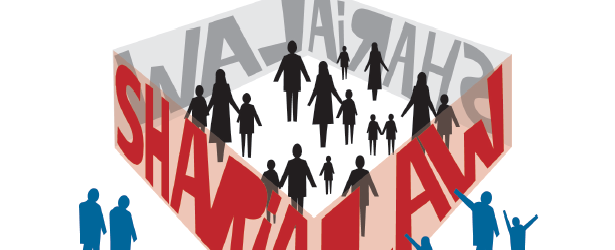





Event Details
1 February 2012 Sheffield Maryam Namazie will be speaking at a meeting organised by the Sheffield Humanist Society on Wednesday 1st February at The Friends Meeting House, 10 St James Street, Sheffield S1 2EW from 6:30 to 8:00pm. The talk will be on "One Law for All, Sharia and Secularism".
Event Details
1 February 2012
Sheffield
Maryam Namazie will be speaking at a meeting organised by the Sheffield Humanist Society on Wednesday 1st February at The Friends Meeting House, 10 St James Street, Sheffield S1 2EW from 6:30 to 8:00pm. The talk will be on “One Law for All, Sharia and Secularism”.
Time
(Wednesday) 6:30 pm - 8:00 pm
Location
See post
address
march 2012
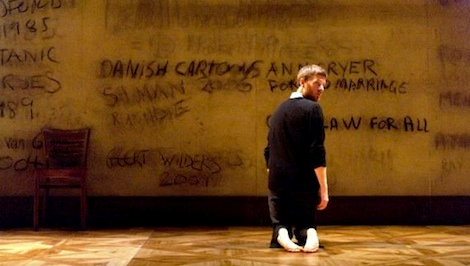

Event Details
DV8: Can We Talk About This? with Inayat Bunglawala, Maryam Namazie and DV8's Lloyd Newson Freedom of speech, multiculturalism and Islam; a panel discussion about the issues raised in the new production with guests Inayat Bunglawala, Founder and Chair of Muslims4UK, Maryam Namazie, campaigner and Spokesperson for One Law for All, and DV8's Artistic Director Lloyd Newson. Tickets £4 (£3 concessions) Running time: 6-7pm Date: 19 March 2012 At: Lyttleton Theatre, National Theatre For more information and to purchase tickets, click here.
Event Details
DV8: Can We Talk About This? with Inayat Bunglawala, Maryam Namazie and DV8’s Lloyd Newson
Freedom of speech, multiculturalism and Islam; a panel discussion about the issues raised in the new production with guests Inayat Bunglawala, Founder and Chair of Muslims4UK, Maryam Namazie, campaigner and Spokesperson for One Law for All, and DV8’s Artistic Director Lloyd Newson.
Tickets £4 (£3 concessions)
Running time: 6-7pm
Date: 19 March 2012
At: Lyttleton Theatre, National Theatre
For more information and to purchase tickets, click here.
more
Time
(Monday) 6:00 pm - 7:00 pm
Location
See post
address
2012sat10marAll Daysun11QED conference, Manchester(All Day) address
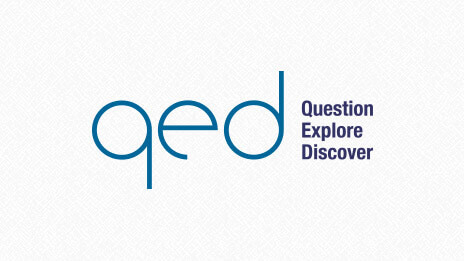

Event Details
Maryam Namazie will be speaking at the QED science and skepticism conference taking place in the Piccadilly Hotel, Manchester on the 10th-11th March 2012. For more information, visit here.
Event Details
Maryam Namazie will be speaking at the QED science and skepticism conference taking place in the Piccadilly Hotel, Manchester on the 10th-11th March 2012. For more information, visit here.
Time
march 10 (Saturday) - 11 (Sunday)
Location
See post
address





Event Details
5 March 2012, 7-8.30pm Maryam Namazie and Sundas Hoorain will be speaking on “Sharia law – Divine claims and harsh realities” at the LSE KSW.1.04 opposite the Peacock Theatre. Maryam Namazie is Spokesperson for One Law for All and the Council of Ex-Muslims of Britain; Sundas Hoorain is a Human Rights Lawyer from Pakistan. The event is organised by the LSESU Atheist, Secularist and Humanist Society.
Event Details
5 March 2012, 7-8.30pm
Maryam Namazie and Sundas Hoorain will be speaking on “Sharia law – Divine claims and harsh realities” at the LSE KSW.1.04 opposite the Peacock Theatre. Maryam Namazie is Spokesperson for One Law for All and the Council of Ex-Muslims of Britain; Sundas Hoorain is a Human Rights Lawyer from Pakistan. The event is organised by the LSESU Atheist, Secularist and Humanist Society. A map can be found here.
more
Time
(Monday) 7:00 pm - 8:30 pm
Location
See post
address
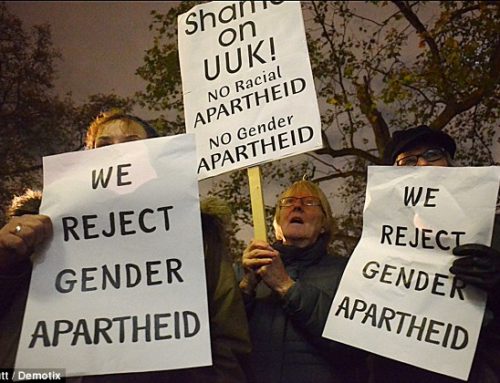

Event Details
Maryam Namazie will be speaking at a debate organised by ‘Freethinking Women’s Organisation of Oost-Vlaanderen' on 3 March 2012 in Ghent, Belgium on 'Can universal values be other than secular values?' Other speakers are: Muslim Feminist Nahed Selim, MEP Sophie in 't Veld, and politician Ann Brusseel. The event begins at 10.00am and will be held at Geuzenhuis gent, Kantienberg 9, 9000 Gent. Here is more information.
Event Details
Maryam Namazie will be speaking at a debate organised by ‘Freethinking Women’s Organisation of Oost-Vlaanderen’ on 3 March 2012 in Ghent, Belgium on ‘Can universal values be other than secular values?’ Other speakers are: Muslim Feminist Nahed Selim, MEP Sophie in ‘t Veld, and politician Ann Brusseel. The event begins at 10.00am and will be held at Geuzenhuis gent, Kantienberg 9, 9000 Gent. Here is more information.
Time
(Saturday) 10:00 am - 6:00 pm
Location
See post
address
may 2012
2012sat26may4:30 pmsat6:00 amWhere do you draw the line, Brighton4:30 pm - 6:00 am address
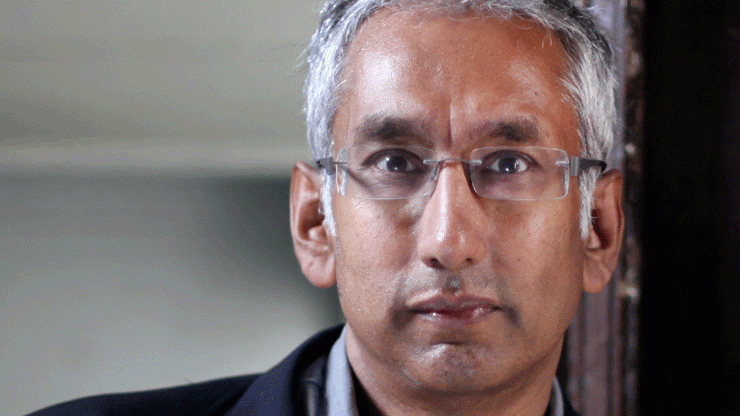

Event Details
26 May 2012 Brighton, UK 4.30 - 6pm at the Brighton Dome, Corn Exchange Maryam Namazie will join a panel staged by Index on Censorship and Free Word as part of this year’s Brighton Festival on the afternoon of 26th May called ‘Where do you draw the line?’ Open dialogue is the key to a healthy, cohesive society, but some fear the disruptive, dangerous potential of truly free speech. Inspired by themes of DV8’s show Can We Talk About This? the event presents an interactive conversation about how, when and why we censor ourselves. Chaired by Kenan Malik, author of From Fatwa to Jihad and regular guest on The Moral Maze, the discussion moves between panellists and the audience using electronic polling terminals, with poll results screened live.
Event Details
26 May 2012
Brighton, UK
4.30 – 6pm at the Brighton Dome, Corn Exchange
Maryam Namazie will join a panel staged by Index on Censorship and Free Word as part of this year’s Brighton Festival on the afternoon of 26th May called ‘Where do you draw the line?’ Open dialogue is the key to a healthy, cohesive society, but some fear the disruptive, dangerous potential of truly free speech. Inspired by themes of DV8’s show Can We Talk About This? the event presents an interactive conversation about how, when and why we censor ourselves. Chaired by Kenan Malik, author of From Fatwa to Jihad and regular guest on The Moral Maze, the discussion moves between panellists and the audience using electronic polling terminals, with poll results screened live.
more
Time
(Saturday) 4:30 pm - 6:00 am
Location
See post
address
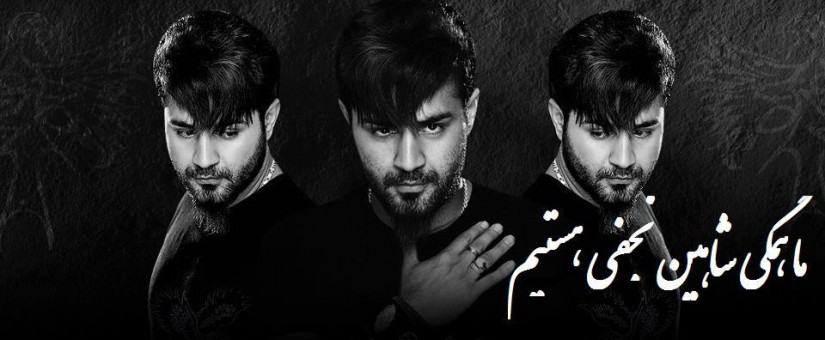

Event Details
The Council of Ex-Muslims of Britain (CEMB) supports the International Day of Action in support of Shahin Najafi, an Iranian rapper and songwriter living in Germany who has received a
Event Details
The Council of Ex-Muslims of Britain (CEMB) supports the International Day of Action in support of Shahin Najafi, an Iranian rapper and songwriter living in Germany who has received a fatwa of death by the two Iranian Ayatollahs Makarem Shirazi and Safi Golpayegani. Shahin has been accused of offending Islam in his rap, Naghi. A bounty of 100,000 US dollars has been offered as reward for his murder on a website affiliated to the Islamic regime of Iran.
The CEMB calls on all to join in the various meetings, rallies and actions to be held on 26 May in order to defend Shahin’s right to free expression and his right to be free from threats and intimidation. A criticism of religion is key to the basic right to free expression.
To support Shahin and to stand up for freedom of expression, please join the Facebook page and visit his website.
For more information, contact:
Maryam Namazie
Spokesperson
Council of Ex-Muslims of Britain
BM Box 1919
London WC1N 3XX
telephone: +44(0)7719166731
e-mail: ex-muslimcouncil@googlemail.com
website: ex-muslim.org.uk
more
Time
All Day (Saturday)
Location
See post
address
2012fri18mayAll Daysun20Sharia law, Kamloops, Canada(All Day) address




Event Details
18-20 May 2012 Kamloops, BC Canada Maryam Namazie will be speaking at the Imagine No Religion 2 Conference in Kamloops, BC Canada during 18-20 May 2012.
Event Details
18-20 May 2012
Kamloops, BC Canada
Maryam Namazie will be speaking at the Imagine No Religion 2 Conference in Kamloops, BC Canada during 18-20 May 2012.
Time
may 18 (Friday) - 20 (Sunday)
Location
See post
address
june 2012
2012sat23jun1:00 pmsat4:00 pm5th anniversary celebrations1:00 pm - 4:00 pm address












Event Details
Join us to celebrate the 5th anniversary of the Council of Ex-Muslims of Britain on Saturday 23 June 2012 from 13.00-16.00hours in London. Book your tickets today. Speakers and acts include: Renowned Philosopher AC Grayling Writer and Documentary-maker Gita Sahgal Comedian Kate Smurthwaite Theoretical Physicist Lawrence Krauss and Best-selling Author of A Universe From Nothing DV8 Physical Theatre Director Lloyd Newson with a clip from Can we Talk about This? CEMB Founder and Campaigner Maryam Namazie Magician Neil Edwards Singer and Songwriter Shelley Segal
Event Details
Join us to celebrate the 5th anniversary of the Council of Ex-Muslims of Britain on Saturday 23 June 2012 from 13.00-16.00hours in London.
Book your tickets today.
Speakers and acts include:
Renowned Philosopher AC Grayling
Writer and Documentary-maker Gita Sahgal
Comedian Kate Smurthwaite
Theoretical Physicist Lawrence Krauss and Best-selling Author of A Universe From Nothing
DV8 Physical Theatre Director Lloyd Newson with a clip from Can we Talk about This?
CEMB Founder and Campaigner Maryam Namazie
Magician Neil Edwards
Singer and Songwriter Shelley Segal
Ticket(s) for the event, which includes a three-course meal and glass of wine at a wonderful Italian restaurant, are £45.00 per person or £35.00 for students/unwaged.
If you are unable to attend the luncheon but would like to help, please donate or organise an event on 23 June, such as a coffee morning or a luncheon party in your home or a local cafe, to raise much needed funds for the CEMB.
You can also send a message of support to the CEMB to exmuslimcouncil@gmail.com. All messages will be published. Here are some of the messages of support we have received.
To purchase tickets, send a cheque made payable to CEMB to BM Box 1919, London WC1N 3XX or pay via Paypal or Worldpay. Please make sure to include an email address and/or telephone number so that further details can be provided. Additional donations are welcome to help ensure the attendance of CEMB volunteers at the event.
In the five years since our establishment, the CEMB has been a beacon of hope for thousands of ex-Muslims who have renounced Islam and religion. It has helped to break the taboo and challenge Islamism, which punishes apostasy with the death penalty.
And during this time, we have done it all – from helping to return a young woman back to Britain from North Africa where she had been sent as punishment for her ‘disobedience’ to securing the release from detention and the right to asylum for many across Europe. We have also given large numbers of people a new ‘home’ via our forum. Moreover, we have helped to highlight the plight of ex-Muslims, apostates and blasphemers internationally, including Indonesian atheist Alex Aan currently in prison and German-Iranian rapper Shahin Najafi facing a death fatwa from Iran’s ayatollahs. The One Law for All campaign against Sharia law in Britain, which we initiated at our first international conference, has also made waves across the globe as has our unequivocal defence of free expression, equality and citizenship rights.
Join us!
For more information, contact:
Maryam Namazie
Spokesperson
Council of Ex-Muslims of Britain
BM Box 2387
London WC1N 3XX, UK
Tel: +44 (0) 7719166731
exmuslimcouncil@gmail.com
more
Time
(Saturday) 1:00 pm - 4:00 pm
Location
See post
address
2012sat23jun1:00 pmsat4:00 pmCEMB's Fifth Anniversary Luncheon1:00 pm - 4:00 pm address












Event Details
To celebrate the work, significance and achievements of this unique organisation on our fifth birthday, we are holding a fundraising luncheon on Saturday 23 June 2012 in London from 13.00-16:00 hours. We hope to have another successful five years with your continued support. You can do this by attending the 23 June luncheon. Ticket(s) are £45.00 per person or £35.00 for students/unwaged.
Event Details
Join us to celebrate the 5th anniversary of the Council of Ex-Muslims of Britain on Saturday 23 June 2012 from 13.00-16.00hours in London.
Book your tickets today.
Speakers and acts include:
Renowned Philosopher AC Grayling
Writer and Documentary-maker Gita Sahgal
Comedian Kate Smurthwaite
Theoretical Physicist Lawrence Krauss and Best-selling Author of A Universe From Nothing
DV8 Physical Theatre Director Lloyd Newson with a clip from Can we Talk about This?
CEMB Founder and Campaigner Maryam Namazie
Magician Neil Edwards
Singer and Songwriter Shelley Segal
Ticket(s) for the event, which includes a three-course meal and glass of wine at a wonderful Italian restaurant, are £45.00 per person or £35.00 for students/unwaged.
If you are unable to attend the luncheon but would like to help, please donate or organise an event on 23 June, such as a coffee morning or a luncheon party in your home or a local cafe, to raise much needed funds for the CEMB.
You can also send a message of support to the CEMB to exmuslimcouncil@gmail.com. All messages will be published.
To purchase tickets, send a cheque made payable to CEMB to BM Box 1919, London WC1N 3XX or pay via Paypal or Worldpay. Please make sure to include an email address and/or telephone number so that further details can be provided. Additional donations are welcome to help ensure the attendance of CEMB volunteers at the event.
In the five years since our establishment, the CEMB has been a beacon of hope for thousands of ex-Muslims who have renounced Islam and religion. It has helped to break the taboo and challenge Islamism, which punishes apostasy with the death penalty.
And during this time, we have done it all – from helping to return a young woman back to Britain from North Africa where she had been sent as punishment for her ‘disobedience’ to securing the release from detention and the right to asylum for many across Europe. We have also given large numbers of people a new ‘home’ via our forum. Moreover, we have helped to highlight the plight of ex-Muslims, apostates and blasphemers internationally, including Indonesian atheist Alex Aan currently in prison and German-Iranian rapper Shahin Najafi facing a death fatwa from Iran’s ayatollahs. The One Law for All campaign against Sharia law in Britain, which we initiated at our first international conference, has also made waves across the globe as has our unequivocal defence of free expression, equality and citizenship rights.
Join us!
For more information, contact:
Maryam Namazie
Spokesperson
Council of Ex-Muslims of Britain
BM Box 2387
London WC1N 3XX, UK
Tel: +44 (0) 7719166731
exmuslimcouncil@gmail.com
ex-muslim.org.uk
more
Time
(Saturday) 1:00 pm - 4:00 pm
Location
See post
address
july 2012


Event Details
On 25 July 2012 in conjunction with the opening of the London Olympics, ‘London 2012: Justice for Women’ is organising a protest against the Olympics Committee’s failure to implement principles of equality and neutrality. The group’s concerns include the banning of female athletes in contravention of principles of equality by Saudi Arabia and the inclusion of veiled women in contravention to neutrality principles. The group is also calling for homage to women pioneers in sports, amongst other demands. The protest begins with a public meeting on the Hispaniola (moored near Embankment tube station) from 10.30am-13.00pm, focusing on the concepts of neutrality versus politico-religious symbols, and how women’s rights to equality and universalism are being ignored and denied by the Olympics Committee. Speakers at the public meeting include representatives of the European Women’s Lobby, secularists and women’s rights defenders, including from countries under Islamic laws. Drinks, sandwiches and a New-Orleans jazz band will be made available at the meeting. After the public meeting, delegates, accompanied by the jazz band, will proceed to a festive and symbolic burial of the Olympics Charter and its abandoned principles, and recall the “7 demands for Justice for women in the Olympics”.
Event Details
On 25 July 2012 in conjunction with the opening of the London Olympics, ‘London 2012: Justice for Women’ is organising a protest against the Olympics Committee’s failure to implement principles of equality and neutrality. The group’s concerns include the banning of female athletes in contravention of principles of equality by Saudi Arabia and the inclusion of veiled women in contravention to neutrality principles. The group is also calling for homage to women pioneers in sports, amongst other demands.
The protest begins with a public meeting on the Hispaniola (moored near Embankment tube station) from 10.30am-13.00pm, focusing on the concepts of neutrality versus politico-religious symbols, and how women’s rights to equality and universalism are being ignored and denied by the Olympics Committee. Speakers at the public meeting include representatives of the European Women’s Lobby, secularists and women’s rights defenders, including from countries under Islamic laws.
Drinks, sandwiches and a New-Orleans jazz band will be made available at the meeting.
After the public meeting, delegates, accompanied by the jazz band, will proceed to a festive and symbolic burial of the Olympics Charter and its abandoned principles, and recall the “7 demands for Justice for women in the Olympics”.
more
Time
(Wednesday) 10:30 am - 1:00 pm
Location
See post
address
2012thu19jul7:30 pmthu9:00 pmSharia Law, Reading Skeptics Meeting7:30 pm - 9:00 pm address




Event Details
19 July 2012, 7.30pm Maryam Namazie will be speaking to a meeting organised by Reading Skeptics on Sharia law at Copa, 76-78A Kings Road, Reading, RG1 3BJ .
Event Details
19 July 2012, 7.30pm
Maryam Namazie will be speaking to a meeting organised by Reading Skeptics on Sharia law at Copa, 76-78A Kings Road, Reading, RG1 3BJ . More details here.
Time
(Thursday) 7:30 pm - 9:00 pm
Location
See post
address
2012fri13jul11:30 amfri1:00 pmJoin Coffee Morning for Women Ex-Muslims11:30 am - 1:00 pm address

















Event Details
The Council of Ex-Muslims of Britain is organising monthly coffee mornings for women who want to meet like-minded ex-Muslims to chat, discuss problems and concerns and make new friends. The first coffee morning will be held this Friday 13 July from 11:30am-1pm in central London.
Event Details
The Council of Ex-Muslims of Britain is organising monthly coffee mornings for women who want to meet like-minded ex-Muslims to chat, discuss problems and concerns and make new friends.
The first coffee morning will be held this Friday 13 July from 11:30am-1pm in central London.
If you would like to join us, email Maryam Namazie at exmuslimcouncil@gmail.com for further details.
Council of Ex-Muslims of Britain
BM Box 1919 London WC1N 3XX
Telephone: +44(0)7719166731
E-mail: ex-muslimcouncil@googlemail.com
Website: ex-muslim.org.uk
Company limited by guarantee and registered in England and Wales under company name Committee of Ex-Muslims in Britain and number 8059509.
more
Time
(Friday) 11:30 am - 1:00 pm
Location
See post
address
august 2012
2012wed08augAll Daysat11Jersey Human Rights Festival(All Day) address
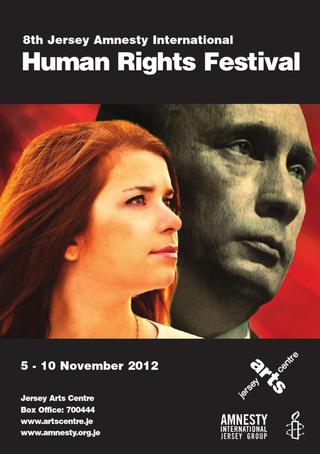


Event Details
Maryam Namazie will be speaking on situation in Iran and Sharia law at the 8th Jersey Human Rights Festival during 8-11 November 2012. More details to follow.
Event Details
Maryam Namazie will be speaking on situation in Iran and Sharia law at the 8th Jersey Human Rights Festival during 8-11 November 2012. More details to follow.
Time
august 8 (Wednesday) - 11 (Saturday)
Location
See post
address
2012sun05aug10:00 amsun5:00 pmSex and Secularism, Montreal, Canada10:00 am - 5:00 pm address



Event Details
4 August 2012, 10.00am Montreal, Canada Sharia law, the veil and sexual apartheid Maryam Namazie will be speaking at a conference on Sex and Secularism hosted by Humanist Canada, the Quebec Humanist Association and the Quebec Secular Movement.
Event Details
4 August 2012, 10.00am
Montreal, Canada
Sharia law, the veil and sexual apartheid
Maryam Namazie will be speaking at a conference on Sex and Secularism hosted by Humanist Canada, the Quebec Humanist Association and the Quebec Secular Movement. More details can be found here.
Time
(Sunday) 10:00 am - 5:00 pm
Location
See post
address
2012fri03augAll Daysun05Sharia law, free expression and Secularism, CFI event(All Day) address


Event Details
Maryam Namazie will be speaking at a conference on Sex and Secularism hosted by Humanist Canada, the Quebec Humanist Association and the Quebec Secular Movement during 3-5 August 2012 in Montreal, Canada. More details can be found here.
Event Details
Maryam Namazie will be speaking at a conference on Sex and Secularism hosted by Humanist Canada, the Quebec Humanist Association and the Quebec Secular Movement during 3-5 August 2012 in Montreal, Canada. More details can be found here.
Time
august 3 (Friday) - 5 (Sunday)
Location
See post
address
september 2012
2012sat22sep9:00 amsat5:00 pmOne Day London conference on Secularism9:00 am - 5:00 pm address



Event Details
22 September 2012, 9am-5pm Maryam Namazie will be speaking at the National Secular Society One Day Conference on Secularism along with other speakers including Richard Dawkins and Peter Tatchell. For more information, click here.
Event Details
22 September 2012, 9am-5pm
Maryam Namazie will be speaking at the National Secular Society One Day Conference on Secularism along with other speakers including Richard Dawkins and Peter Tatchell. For more information, click here.
Time
(Saturday) 9:00 am - 5:00 pm
Location
See post
address
2012wed19sep7:30 pmwed9:00 pmSharia Law, Coventry Skeptics7:30 pm - 9:00 pm address



Event Details
19 September 2012, 7.30pm Coventry, UK Maryam Namazie will be speaking to a meeting organised by Coventry Skeptics in the Pub on Sharia law at The Albany, 24 Albany Road, Coventry, CV5 6JU.
Event Details
19 September 2012, 7.30pm
Coventry, UK
Maryam Namazie will be speaking to a meeting organised by Coventry Skeptics in the Pub on Sharia law at The Albany, 24 Albany Road, Coventry, CV5 6JUMore information here.
Time
(Wednesday) 7:30 pm - 9:00 pm
Location
See post
address
2012wed19sep7:30 pmwed9:00 pmOn sharia law, Coventry Skeptics in the Pub7:30 pm - 9:00 pm address



Event Details
19 September 2012, 7.30pm Coventry, UK Maryam Namazie will be speaking to a meeting organised by Coventry Skeptics in the Pub on Sharia law at The Albany, 24 Albany Road, Coventry, CV5 6JUMore information here.
Event Details
19 September 2012, 7.30pm
Coventry, UK
Maryam Namazie will be speaking to a meeting organised by Coventry Skeptics in the Pub on Sharia law at The Albany, 24 Albany Road, Coventry, CV5 6JUMore information here.
Time
(Wednesday) 7:30 pm - 9:00 pm
Location
See post
address
2012sat15sep1:00 pmsat2:00 pmLondon Secular March and Rally1:00 pm - 2:00 pm address
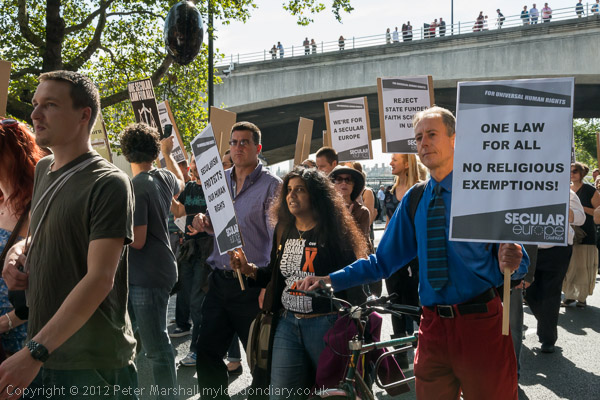

Event Details
Activist Nahla Mahmood will be speaking at the 15 September march and rally for secularism in London. For more details visit here.
Event Details
Activist Nahla Mahmood will be speaking at the 15 September march and rally for secularism in London. For more details visit here.
Time
(Saturday) 1:00 pm - 2:00 pm
Location
See post
address
2012fri07sep11:30 amfri1:00 pmLondon Meet-up for ex-Muslim women11:30 am - 1:00 pm address

















Event Details
The Council of Ex-Muslims of Britain is organising a second meet-up for ex-Muslim women after the summer term to provide a safe space for meeting like-minded friends and discussing concerns. The
Event Details
The Council of Ex-Muslims of Britain is organising a second meet-up for ex-Muslim women after the summer term to provide a safe space for meeting like-minded friends and discussing concerns.
The second meet-up will be held on Friday 7 September from 11:30am-1pm in central London.
If you would like to join us, email Maryam Namazie at exmuslimcouncil@gmail.com for further details.
Council of Ex-Muslims of Britain
BM Box 1919 London WC1N 3XX
Telephone: +44(0)7719166731
E-mail: ex-muslimcouncil@googlemail.com
Website: ex-muslim.org.uk
Company limited by guarantee and registered in England and Wales under company name Committee of Ex-Muslims in Britain and number 8059509.
more
Time
(Friday) 11:30 am - 1:00 pm
Location
See post
address
november 2012
2012fri30novAll Daysun02decTexas Symposium on theism and public policy(All Day) address



Event Details
30 November - 2 December 2012 Houston, Texas Maryam will be speaking at a two-day symposium organised by the Institute of Humanist Studies entitled 'Does theism have an impact on public policy and, if it does, what is it and how should humanists respond to this situation?' held on the Rice University campus, in Houston, Texas, November 30-December 2, 2012.
Event Details
30 November – 2 December 2012
Houston, Texas
Maryam will be speaking at a two-day symposium organised by the Institute of Humanist Studies entitled ‘Does theism have an impact on public policy and, if it does, what is it and how should humanists respond to this situation?’ held on the Rice University campus, in Houston, Texas, November 30-December 2, 2012.
Time
November 30 (Friday) - December 2 (Sunday)
Location
See post
address
2012sat17nov1:00 pmsat2:00 pmCEMB Forum's 4th anniversary Lunch1:00 pm - 2:00 pm address


Event Details
17 November 2012 Private Luncheon Forum members are invited to a private luncheon to celebrate the CEMB’s forum 5th anniversary. If you are interested in attending, please email exmuslimcouncil@gmail.com.
Event Details
17 November 2012
Private Luncheon
Forum members are invited to a private luncheon to celebrate the CEMB’s forum 5th anniversary. If you are interested in attending, please email exmuslimcouncil@gmail.com.
Time
(Saturday) 1:00 pm - 2:00 pm
Location
See post
address
2012thu08novAll Daysun11Jersey Amnesty International Human Rights Festival(All Day) address



Event Details
Maryam Namazie will be speaking on situation in Iran and Sharia law at the 8th Jersey Human Rights Festival during 8-11 November 2012. For more details, click here.
Event Details
Maryam Namazie will be speaking on situation in Iran and Sharia law at the 8th Jersey Human Rights Festival during 8-11 November 2012. For more details, click here.
Time
november 8 (Thursday) - 11 (Sunday)
Location
See post
address
december 2012
2012sat29dec12:00 pmsat2:00 pmManchester Ex-Muslim Meet-Up Group Lunch12:00 pm - 2:00 pm address

















Event Details
29 December 2012 Ex-Muslim Manchester Meet-Up Group Lunch A CEMB-affiliated Manchester meet-up group has just been established by Sandbad. To join the group, visit here.
Event Details
29 December 2012
Ex-Muslim Manchester Meet-Up Group Lunch
A CEMB-affiliated Manchester meet-up group has just been established by Sandbad. To join the group, visit here.
Time
(Saturday) 12:00 pm - 2:00 pm
Location
See post
address
2012sun16dec12:00 pmsun2:00 pmManchester Ex-Muslim Meet-Up Group12:00 pm - 2:00 pm address

















Event Details
16 December 2012 Ex-Muslim Manchester Meet-Up Group A CEMB-affiliated Manchester meet-up group has just been established by Sandbad. To join the group, visit here.
Event Details
16 December 2012
Ex-Muslim Manchester Meet-Up Group
A CEMB-affiliated Manchester meet-up group has just been established by Sandbad. To join the group, visit here.
Time
(Sunday) 12:00 pm - 2:00 pm
Location
See post
address
2012tue11dec6:30 pmtue8:00 pmEnd-Year Drinks with AC Grayling6:30 pm - 8:00 pm address
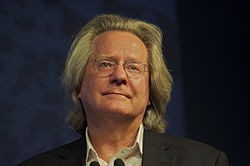

Event Details
11 December 2012, 6:30-8:00pm End of Year Drinks with A C Grayling CEMB will be holding an end of year drinks function for members and supporters. To RSVP, email exmuslimcouncil@gmail.com.
Event Details
Members and supporters are invited to join the Council of Ex-Muslims of Britain for end-year drinks.
Date: Tuesday 11 December 2012
Time: 18:30-20:00 Hours
Location: Central London
Entry: £10 per person; £7 for unwaged (including one drink and canapés).
Special Guest Speaker: Philosopher A C Grayling on ‘Secularism as a Human Right’.
To RSVP, please email the below information to us.
Name __________________________________________________________________
Tel: ______________________ AND/OR Email: ________________________________
Payment (please tick)
____ £10 individual ____ £7 unwaged £_______ Other (donations welcome)
Form of Payment
Cheques can be made payable to CEMB and posted to CEMB, BM Box 1919, London WC1N 3XX, UK. Payment can also be made online via Worldpay.
For further details on the CEMB’s official monthly Meet-ups and Events, click here. Upcoming events include a November private luncheon for CEMB web-forum users and a January coffee morning for ex-Muslim women.
Please note that the CEMB is willing to hold Meet-Ups for ex-Muslims in other cities. If you want to set up a meet-up group locally, contact the CEMB to help facilitate it.
For more information:
Maryam Namazie
Spokesperson
Council of Ex-Muslims of Britain
BM Box 1919, London WC1N 3XX, UK
tel: +44 (0) 7719166731
email: exmuslimcouncil@gmail.com
web: https://ex-muslim.org.uk/
Company limited by guarantee and registered in England and Wales under company number 8059509.
more
Time
(Tuesday) 6:30 pm - 8:00 pm
Location
See post
address
2012thu06dec7:00 pmthu10:00 pmFree Expression Day at Reading University7:00 pm - 10:00 pm address


Event Details
6 December 2012, 7:00-10:00pm Reading, UK On Wednesday 3rd October, the Reading University Atheist, Humanist, and Secularist Society (RAHS) were expelled from its student's union Freshers' Fayre on the grounds of causing offence - all because they put a label on a pineapple that read "Mohammed". They are now facing disciplinary charges over the incident. To add to the debate on free expression, they are organising a Free Speech Day on campus at which Maryam Namazie will be speaking. The event will be held from 7pm-10pm on 6th December at the University of Reading's London Road campus. For more details, email readingahs@gmail.com.
Event Details
6 December 2012, 7:00-10:00pm
Reading, UK
On Wednesday 3rd October, the Reading University Atheist, Humanist, and Secularist Society (RAHS) were expelled from its student’s union Freshers’ Fayre on the grounds of causing offence – all because they put a label on a pineapple that read “Mohammed”. They are now facing disciplinary charges over the incident. To add to the debate on free expression, they are organising a Free Speech Day on campus at which Maryam Namazie will be speaking. The event will be held from 7pm-10pm on 6th December at the University of Reading’s London Road campus. For more details, email readingahs@gmail.com.
more
Time
(Thursday) 7:00 pm - 10:00 pm
Location
See post
address
2012fri30novAll Daysun02decTexas Symposium on theism and public policy(All Day) address



Event Details
30 November - 2 December 2012 Houston, Texas Maryam will be speaking at a two-day symposium organised by the Institute of Humanist Studies entitled 'Does theism have an impact on public policy and, if it does, what is it and how should humanists respond to this situation?' held on the Rice University campus, in Houston, Texas, November 30-December 2, 2012.
Event Details
30 November – 2 December 2012
Houston, Texas
Maryam will be speaking at a two-day symposium organised by the Institute of Humanist Studies entitled ‘Does theism have an impact on public policy and, if it does, what is it and how should humanists respond to this situation?’ held on the Rice University campus, in Houston, Texas, November 30-December 2, 2012.
Time
November 30 (Friday) - December 2 (Sunday)
Location
See post
address
january 2011
2011wed26jan6:30 pmwed8:30 pmSeminar on 'Enemies not Allies'6:30 pm - 8:30 pm address
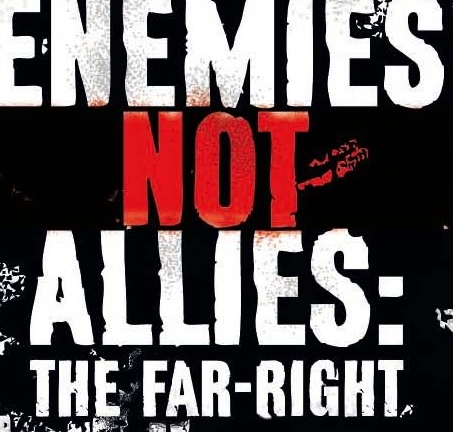

Event Details
The One Law for All campaign is holding a seminar to expose how important debates including on Sharia law have been hijacked by the far-Right to promote their racist agenda, and by anti-racist and anti-war groups to defend Islamism, both at the expense of people’s rights and lives. The seminar will focus on: The British National Party, the English Defence League, Stop Islamisation of Europe (also Stop Islamization of America), the Stop the War Coalition, the Respect Party, and Unite Against Fascism.
Event Details
18.30-20.00 hours (Registration at 18.00)
Conway Hall, 25 Red Lion Square, London WC1R 4RL
Entry fee: £5 individuals; £10 voluntary and statutory organisations
Bigots and neo-Nazis feigning to campaign for rights… ‘anti-racist’ groups promoting fascism… ‘anti-war’ rallies run by supporters of terrorism and dictatorship… Enough!
The One Law for All campaign is holding a seminar to expose how important debates including on Sharia law have been hijacked by the far-Right to promote their racist agenda, and by anti-racist and anti-war groups to defend Islamism, both at the expense of people’s rights and lives. The seminar will focus on: The British National Party, the English Defence League, Stop Islamisation of Europe (also Stop Islamization of America), the Stop the War Coalition, the Respect Party, and Unite Against Fascism.
Speakers at the seminar are:
- Adam Barnett (One Law for All)
- Rahila Gupta (Women’s Rights Campaigner)
- Marieme Helie Lucas (Secularism is a Women’s Issue)
- Ghaffar Hussain (Quilliam Foundation)
- Douglas Murray (Centre for Social Cohesion)
- Maryam Namazie (One Law for All),
- Shiraz Maher (International Centre for the Study of Radicalisation)
John Adams (Emeritus Professor at the University of Hertfordshire) to chair.
more
Time
(Wednesday) 6:30 pm - 8:30 pm
Location
See post
address
february 2011
2011thu10feb6:30 pmthu8:30 pmLSE Atheist and Humanist Society Meeting6:30 pm - 8:30 pm address





Event Details
Maryam Namazie and Anne Marie Waters will speak on Sharia Law and Human Rights at a meeting sponsored by the LSE Atheist and Humanist Society at 18.30pm.
Event Details
Maryam Namazie and Anne Marie Waters will speak on Sharia Law and Human Rights at a meeting sponsored by the LSE Atheist and Humanist Society at 18.30pm.
Time
(Thursday) 6:30 pm - 8:30 pm
Location
See post
address
march 2011
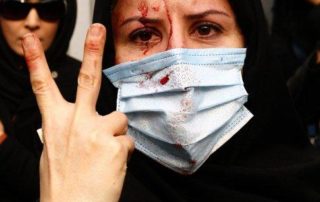

Event Details
University of London Union, Malet Street, London WC1E
10:00-19:00 (Registration begins at 10:00 for a 10:30 start)
The one day conference marking International Women’s Day will discuss Religion’s Impact on Women’s Rights; Religion and Secularism and Religion and the Law.
Philosopher AC Grayling will give the keynote address
Event Details
University of London Union, Malet Street, London WC1E
10:00-19:00 (Registration begins at 10:00 for a 10:30 start)
The one day conference marking International Women’s Day will discuss Religion’s Impact on Women’s Rights; Religion and Secularism and Religion and the Law.
Philosopher AC Grayling will give the keynote address
Speakers include:
- Ahlam Akram (Joint Action for Israeli Palestinian Peace)
- Helle Merete Brix (Journalist); Patty Debonitas (Iran Solidarity)
- Nadia Geerts (Réseau d’ Actions pour la Promotion d’un Etat Laïque)
- Maria Hagberg (Network against Honour-related Violence)
- Anne-marie Lizin (Honorary Speaker of Belgian Senate)
- Maryam Namazie (One Law for All and Council of Ex-Muslims of Britain)
- Elizabeth O’Casey (National Secular Society); Yasmin Rehman (Women’s Rights Activist)
- Gita Sahgal (Women’s Rights Campaigner); Nina Sankari (European Feminist Initiative Poland)
- Sohaila Sharifi (Equal Rights Now); Annie Sugier (La Ligue du Droit International des Femmes)
- Michele Vianes (Regard des Femmes); Anne Marie Waters (One Law for All)
There will also be a showing of Ghazi Rabihavi’s play Stoning – ‘A very strong and powerful piece of work, beautifully constructed’ as described by Harold Pinter.
Entry fee: £10 individuals; £3 unwaged and students.
The Conference is sponsored by the Council of Ex-Muslims of Britain, International Committee against Stoning, Iran Solidarity, Equal Rights Now and One Law for All.
For more information and to pre-register, contact:
One Law for All
BM Box 2387
London WC1N 3XX, UK
Telephone: +44 (0) 7719166731
www.onelawforall.org.uk
onelawforall@gmail.com
more
Time
(Saturday) 10:00 am - 7:00 pm
april 2011
2011mon04apr7:00 pmmon9:00 pmBradford Humanist and Atheist Soceity meeting7:00 pm - 9:00 pm address


Event Details
Bradford University, Bradford, UK Maryam Namazie will be speaking to students about apostasy and sharia law at an event organised by Bradford Humanist and Atheist Society.
Event Details
Bradford University, Bradford, UK
Maryam Namazie will be speaking to students about apostasy and sharia law at an event organised by Bradford Humanist and Atheist Society.
Time
(Monday) 7:00 pm - 9:00 pm
Location
See post
address
may 2011
2011tue17may7:30 amtue9:30 amBirmingham Humanists meeting7:30 am - 9:30 am address
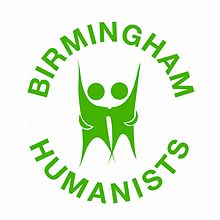

Event Details
Maryam Namazie will be speaking on the One Law for All campaign in Birmingham organised by Birmingham Humanists at Moseley Exchange, 149 Alcester Road B13 8JP from 19.30-21.30.
Event Details
Maryam Namazie will be speaking on the One Law for All campaign in Birmingham organised by Birmingham Humanists at Moseley Exchange, 149 Alcester Road B13 8JP from 19.30-21.30.
Time
(Tuesday) 7:30 am - 9:30 am
Location
See post
address
2011fri06may7:00 pmfri9:00 pmOxford Union, Multiculturalism Debate7:00 pm - 9:00 pm address
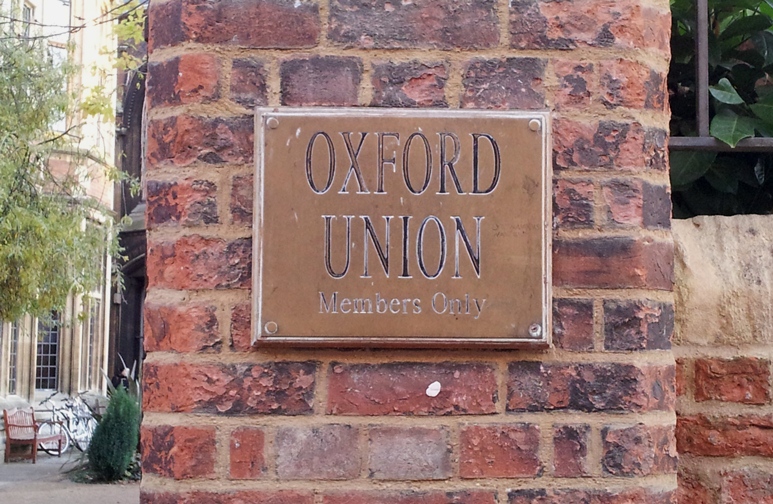

Event Details
Maryam Namazie will be proposing the motion that multiculturalism has been a failure at Oxford University.
Event Details
Maryam Namazie will be proposing the motion that multiculturalism has been a failure at Oxford University.
Time
(Friday) 7:00 pm - 9:00 pm
Location
See post
address
june 2011
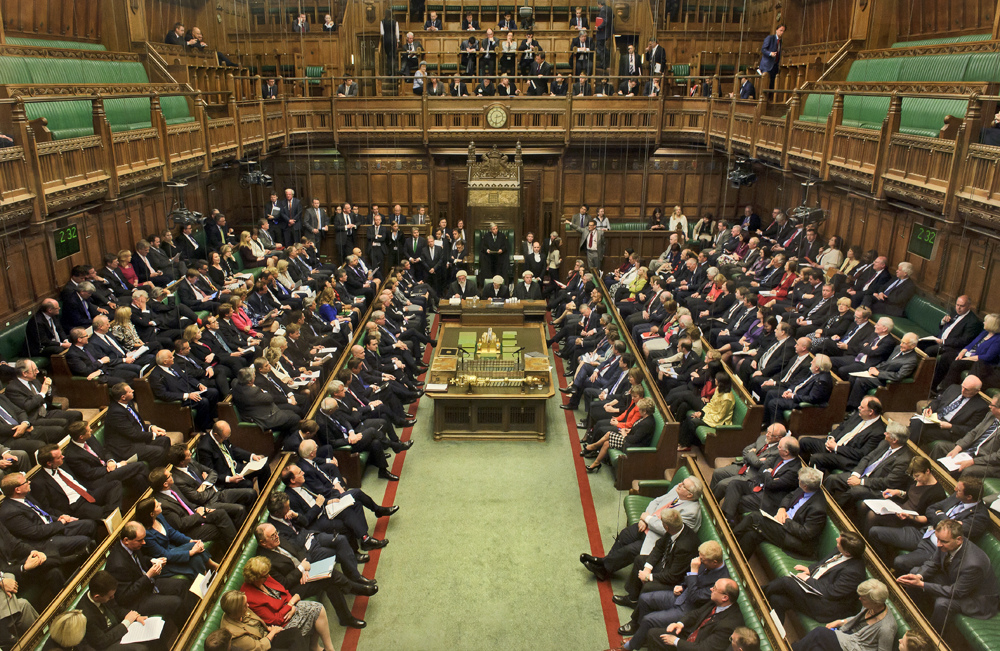

Event Details
Should the practice of sharia law be permitted under the powers of the Arbitration Act? One Law for All and the National Secular Society are organising a debate at 6pm. Chair – Jim Fitzpatrick MP.
Event Details
Should the practice of sharia law be permitted under the powers of the Arbitration Act? One Law for All and the National Secular Society are organising a debate at 6pm. Chair – Jim Fitzpatrick MP.
Time
(Tuesday) 6:00 pm - 8:00 pm
Location
See post
address
2011fri24jun10:00 amfri5:00 pmGenoa, Gender and Globalization Conference10:00 am - 5:00 pm address
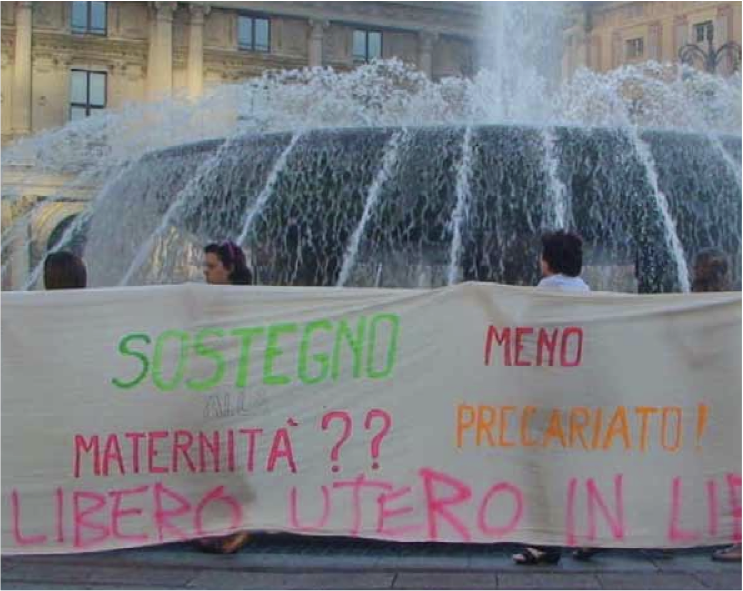

Event Details
Punto G: Gender and Globalization Conference Maryam Namazie will be speaking at a global debate organised by Marea Review.
Event Details
Punto G: Gender and Globalization Conference
Maryam Namazie will be speaking at a global debate organised by Marea Review.
Time
(Friday) 10:00 am - 5:00 pm
Location
See post
address
2011sun19jun10:30 amsun4:30 pmNewcastle, NE Humanists Conference10:30 am - 4:30 pm address


Event Details
Maryam Namazie will be speaking at the NE Humanists Conference held from 10.30am to 16.30pm at the Royal Station Hotel. More details here.
Event Details
Maryam Namazie will be speaking at the NE Humanists Conference held from 10.30am to 16.30pm at the Royal Station Hotel. More details here.
Time
(Sunday) 10:30 am - 4:30 pm
Location
See post
address
2011sun05junAll DayDublin, European Atheist Conference(All Day: sunday) address
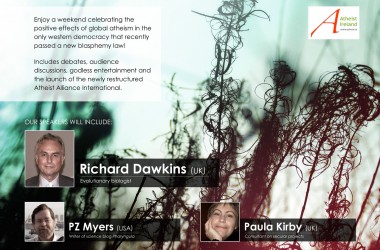

Event Details
Maryam Namazie will be speaking at the European Atheist Conference. More information.
Event Details
Maryam Namazie will be speaking at the European Atheist Conference. More information.
Time
All Day (Sunday)
Location
See post
address
2011sat04jun2:00 pmsat4:00 pmHay on Wye, HowTheLightGetsIn Festival2:00 pm - 4:00 pm address
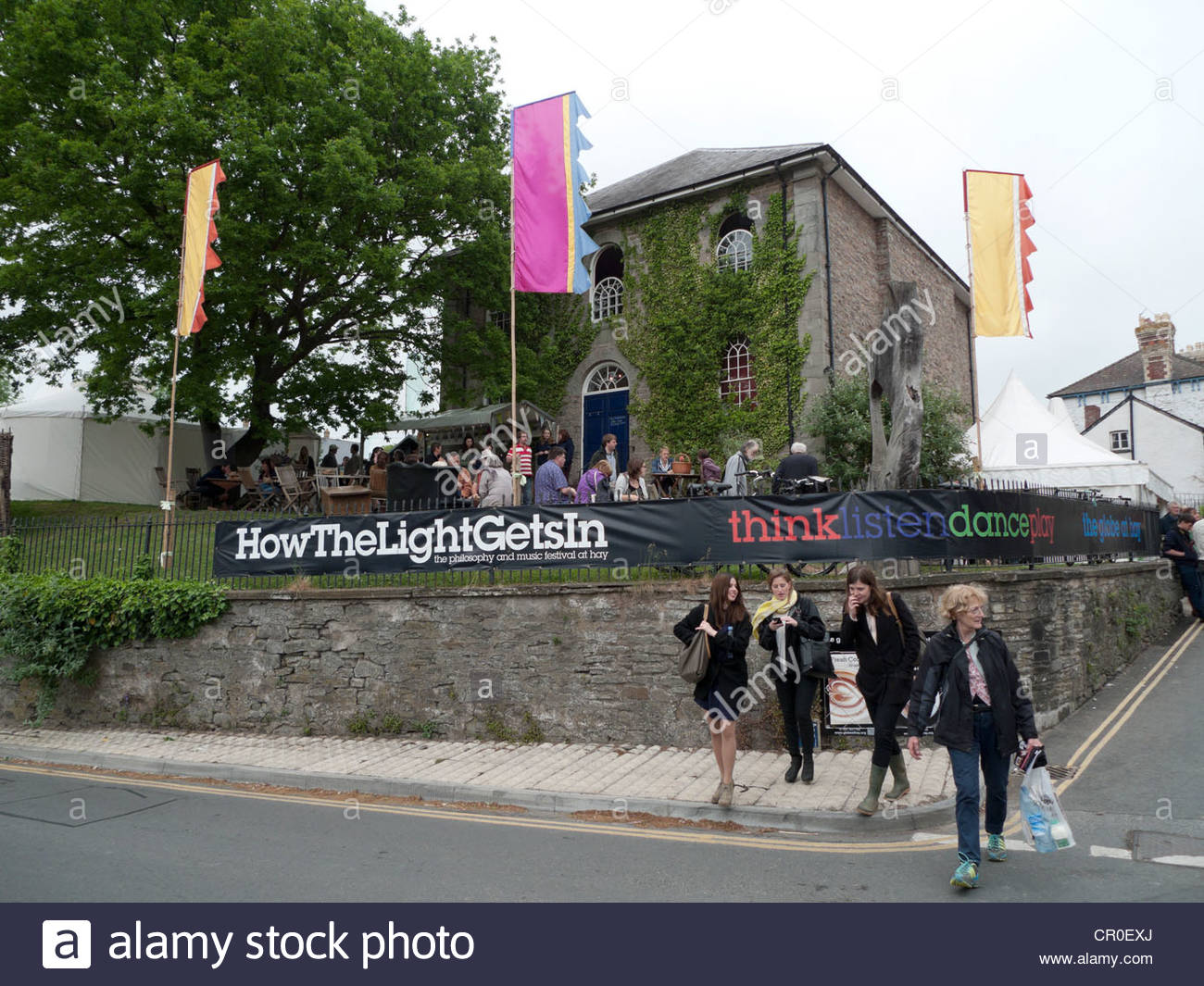

Event Details
Maryam Namazie will be giving a solo talk at 14.00 entitled the Islamist Inquisition at HowTheLightGetsIn philosophy festival at Hay on Wye. She will also be debating Islam in a panel discussion at 10.30am entitled the Scimitar’s Edge with Lauren Booth and Iain Edgar. Mary Ann Sieghart chairs. Other speakers include:
- A C Grayling
- Baroness Mary Warnock
- Philip Pullman
- Dame Athene Donald
- Tessa Jowell
- Leela Gandhi
- Alex Callinicos
- Lord Layard
- Baroness Susan Greenfield
- David Aaronovitch
- Nassim Nicholas Taleb
Event Details
Maryam Namazie will be giving a solo talk at 14.00 entitled the Islamist Inquisition at HowTheLightGetsIn philosophy festival at Hay on Wye. She will also be debating Islam in a panel discussion at 10.30am entitled the Scimitar’s Edge with Lauren Booth and Iain Edgar. Mary Ann Sieghart chairs.
Other speakers include:
- A C Grayling
- Baroness Mary Warnock
- Philip Pullman
- Dame Athene Donald
- Tessa Jowell
- Leela Gandhi
- Alex Callinicos
- Lord Layard
- Baroness Susan Greenfield
- David Aaronovitch
- Nassim Nicholas Taleb
more
Time
(Saturday) 2:00 pm - 4:00 pm
Location
See post
address
july 2011
august 2011
2011thu25aug6:00 pmthu8:00 pmSydney, Australia6:00 pm - 8:00 pm address






Event Details
6.00-8.00pm
Talk on “Sharia law” at the University of Western Sydney’s Open Forum. Building EE room G.03 at the Parramatta South campus UWS. Convenor: Sev Ozdowski, Director, Equity and Diversity, University of Western Sydney
Event Details
6.00-8.00pm
Talk on “Sharia law” at the University of Western Sydney’s Open Forum. Building EE room G.03 at the Parramatta South campus UWS. Convenor: Sev Ozdowski, Director, Equity and Diversity, University of Western Sydney
Time
(Thursday) 6:00 pm - 8:00 pm
Location
See post
address
2011wed24aug6:30 pmwed8:30 amMelbourne, Australia6:30 pm - 8:30 am address
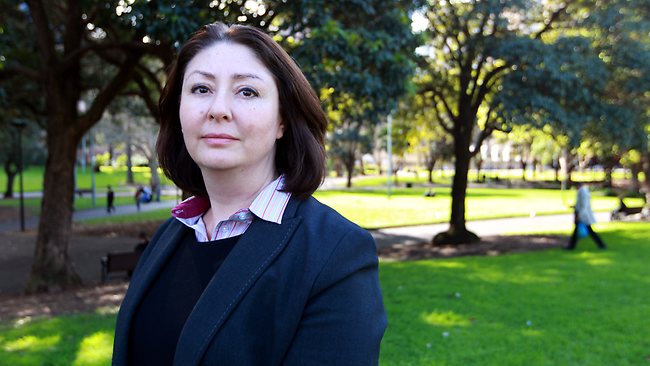




Event Details
6.30 pm
Religious Courts in the Secular State
Melbourne Free University’s open discussion space at Dexter Bar, Clifton Hill, Melbourne
Event Details
6.30 pm
Religious Courts in the Secular State
Melbourne Free University’s open discussion space at Dexter Bar, Clifton Hill, Melbourne
Time
(Wednesday) 6:30 pm - 8:30 am
Location
See post
address
2011mon22aug6:30 pmmon9:00 pmSydney, Australia6:30 pm - 9:00 pm address





Event Details
6.30pm
Should Australia follow Britain in accommodating Islamic sharia law? Talk by Maryam Namazie and fundraising dinner for One Law for All at Finola’s Restaurant, 156 Darling St Balmain, Sydney
Event Details
6.30pm
Should Australia follow Britain in accommodating Islamic sharia law? Talk by Maryam Namazie and fundraising dinner for One Law for All at Finola’s Restaurant, 156 Darling St Balmain, Sydney
Time
(Monday) 6:30 pm - 9:00 pm
Location
See post
address


Event Details
Maryam Namazie will be speaking at the Congress held during 900am to 530pm and organised by the International Liaison Committee for Atheists and Freethinkers. It is held in conjunction with the World Humanist Congress of the International Humanist and Ethical Union. Other speakers include: Marc Blondel, Jacques Lafouge, Keith Porteus Wood, Charles Susanne, David Silverman, Tanya Smith, Christian Eyschen, and Roger Lepeix.
Event Details
Maryam Namazie will be speaking at the Congress held during 900am to 530pm and organised by the International Liaison Committee for Atheists and Freethinkers. It is held in conjunction with the World Humanist Congress of the International Humanist and Ethical Union. Other speakers include: Marc Blondel, Jacques Lafouge, Keith Porteus Wood, Charles Susanne, David Silverman, Tanya Smith, Christian Eyschen, and Roger Lepeix.
Time
(Wednesday) 9:00 am - 5:30 pm
Location
See post
address
september 2011






Event Details
Maryam Namazie will be speaking at a meeting organised by the Danish Atheist Society on 27 September 2011 at 7pm at Designmuseum. Address: Bredgade 68 1260 København. She will be speaking about the discriminatory nature of Sharia law courts in Europe, the need to oppose Sharia law within the context of a fight against the far-Right and multi-culturalism, and the historical task and duty to defend universal rights, citizenship and secularism. More information available in the Atheist Society's press release.
Event Details
Maryam Namazie will be speaking at a meeting organised by the Danish Atheist Society on 27 September 2011 at 7pm at Designmuseum. Address: Bredgade 68
1260 København.
She will be speaking about the discriminatory nature of Sharia law courts in Europe, the need to oppose Sharia law within the context of a fight against the far-Right and multi-culturalism, and the historical task and duty to defend universal rights, citizenship and secularism.
More information available in the Atheist Society’s press release.
more
Time
(Tuesday) 7:00 pm - 9:00 pm
Location
See post
address
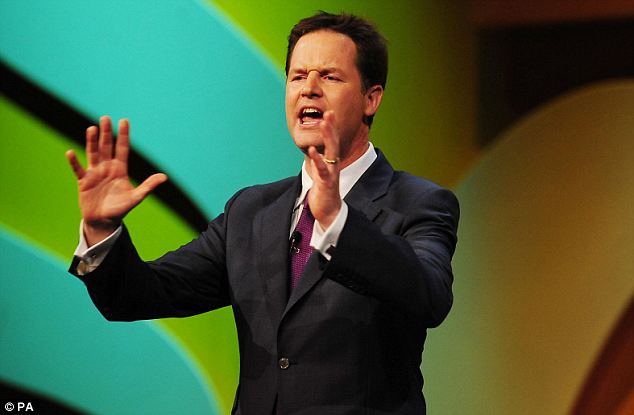

Event Details
Maryam Namazie will be speaking at a fringe meeting at the LibDem Federal Conference in Birmingham at 7pm. The discussion entitled the 'Liberal response to Sharia' is organised by the LibDem Humanist and Secularist group. Other speakers include LibDem Peer Baroness Kishwer Falkner. Venue of conference.
Event Details
Maryam Namazie will be speaking at a fringe meeting at the LibDem Federal Conference in Birmingham at 7pm. The discussion entitled the ‘Liberal response to Sharia’ is organised by the LibDem Humanist and Secularist group. Other speakers include LibDem Peer Baroness Kishwer Falkner. Venue of conference.
Time
(Tuesday) 7:00 pm - 9:00 pm
Location
See post
address


Event Details
Maryam Namazie will be speaking at the rally in London. For more information, click here.
Event Details
Maryam Namazie will be speaking at the rally in London. For more information, click here.
Time
(Saturday) 12:00 pm - 1:00 pm
Location
See post
address






Event Details
Maryam Namazie will be speaking on a panel discussion on Islam in a secular Europe at Conway Hall, 25 Red Lion Square, London, WC1R 4RL from 7:00pm – 9:30pm, on Friday 16 September 2011. Other speakers are Yahya Birt, the Commissioning Editor at Kube Publishing and co-editor of British Secularism and Religion: Islam, Society and the State; David Blatherwick, diplomat, writer, distinguished supporter of Humanism, and current Trustee for the British University in Egypt; Humeira Iqtida, lecturer at King's College London and author of Secularising Islamists? Jamaat-e-Islami and Jamaat-ud-Dawa in Pakistan;and Maleiha Malik, Professor in Law at King's College London teacher of courses in Jurisprudence and Legal Theory, Discrimination Law and European Law.
Event Details
Maryam Namazie will be speaking on a panel discussion on Islam in a secular Europe at Conway Hall, 25 Red Lion Square, London, WC1R 4RL from 7:00pm – 9:30pm, on Friday 16 September 2011. Other speakers are Yahya Birt, the Commissioning Editor at Kube Publishing and co-editor of British Secularism and Religion: Islam, Society and the State; David Blatherwick, diplomat, writer, distinguished supporter of Humanism, and current Trustee for the British University in Egypt; Humeira Iqtida, lecturer at King’s College London and author of Secularising Islamists? Jamaat-e-Islami and Jamaat-ud-Dawa in Pakistan;and Maleiha Malik, Professor in Law at King’s College London teacher of courses in Jurisprudence and Legal Theory, Discrimination Law and European Law.
Tickets: £10 general (£8 concession)
For more information and to register for the discussion, click here.
more
Time
(Friday) 7:00 pm - 9:30 pm
Location
See post
address
october 2011
2011sat29oct6:00 pmsat9:00 pmPassion for Freedom Art Festival, London, UK6:00 pm - 9:00 pm address
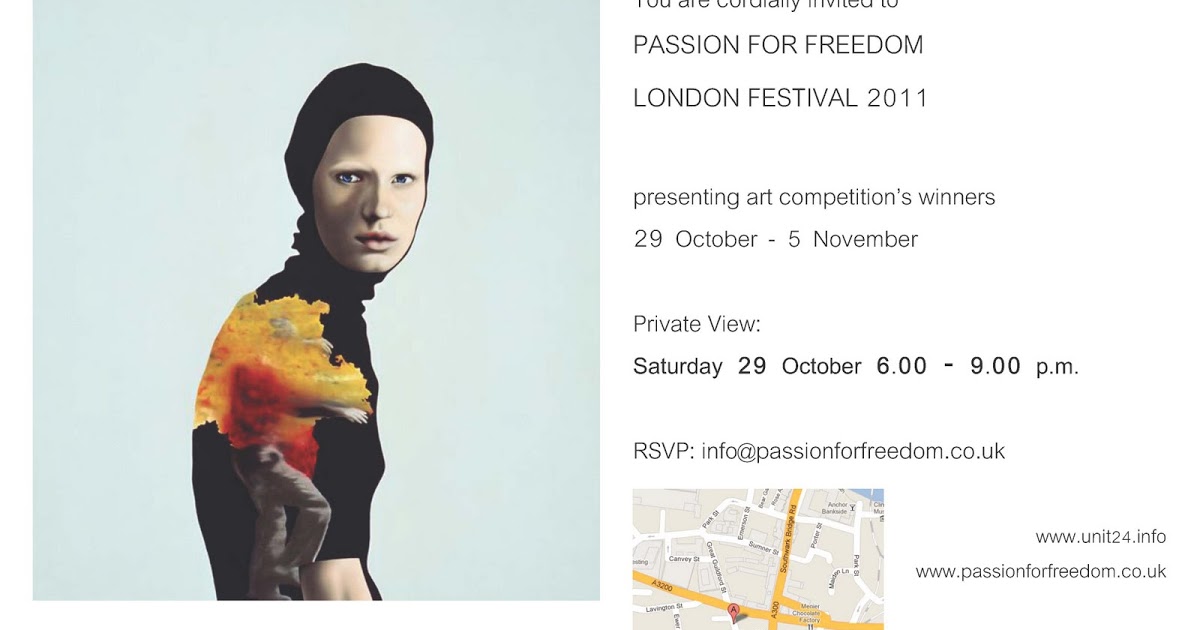

Event Details
One Law for All presents its 2011 Passion for Freedom Art Festival showcasing a shortlist of international artists discussing religion, equality and one secular law for all through painting, drawing, sculpture, film and installation. Private View: Saturday 29 October 2011, 18.00 - 21.00 hours Gallery: UNIT24 Gallery, 24 Great Guildford Street, London SE1 0FD (Transport Underground stations: Southwark) Exhibition: 29 October – 5 November 2011 Opening Hours: Monday – Wednesday 8.00 - 18.00 hours; Thursday – Friday 8.00 - 18.30 hoursEvent Details
One Law for All presents its 2011 Passion for Freedom Art Festival showcasing a shortlist of international artists discussing religion, equality and one secular law for all through painting, drawing, sculpture, film and installation.
Exhibited artists are Sandra Ackermann, Karin Roy Andersson, Eskild Beck, Milena Buljan, Victoria Burgher, Edna Cantoral Acosta, Magdalena Czubak Vlasak, Fiona Dent, ARINA, Heather MCDonald, Roland Okon, Despina Papadopoulou, Polina Pakhomova, Mario Raoli, Steve Rosenthal, Flora Robertson, Axelle Russo, Govinda Sah, Karine Schneider, Fianne Stanford, Paula Stevens-Hoare, Zoe Sua Kay, Valeriya Vygodnaya, Ewa Zasada, and Artur Zarczynski.
Competition judges include Polly Toynbee (Writer and Columnist), Francisco Laranjo (Artist and Head of School of Arts at Porto University) and Deeyah (Singer and Composer).
Private View: Saturday 29 October 2011, 18.00 – 21.00 hours
Gallery: UNIT24 Gallery, 24 Great Guildford Street, London SE1 0FD (Transport Underground stations: Southwark)
Exhibition: 29 October – 5 November 2011
Opening Hours: Monday – Wednesday 8.00 – 18.00 hours; Thursday – Friday 8.00 – 18.30 hours
To RSVP for the private viewing, please email your name and mobile number to onelawforall@gmail.com.
For more information, visit Passion for Freedom website.
Passion for Freedom Art Competition, Second Edition, 2010
Passion for Freedom Art Competition, First Edition, 2009
NOTES
To donate to the crucial work of One Law for All, please either send a cheque made payable to One Law for All to BM Box 2387, London WC1N 3XX, UK or pay via Paypal.
We need regular support that we can rely on and are asking for supporters to commit to giving at least £5-10 a month via direct debit. You can find out more about how to join the 100 Club here.
The One Law for All Campaign was launched on 10 December 2008, International Human Rights Day, to call on the UK Government to recognise that Sharia and religious courts are arbitrary and discriminatory against women and children in particular and that citizenship and human rights are non-negotiable. To join the campaign, sign our petition here.
For further information contact:
Maryam Namazie and Anne Marie Waters
Spokespersons
One Law for All
BM Box 2387
London WC1N 3XX, UK
Tel: +44 (0) 7719166731
onelawforall@gmail.com
www.onelawforall.org.uk
more
Time
(Saturday) 6:00 pm - 9:00 pm
Location
See post
address
2011tue18oct7:30 pmtue9:00 pmSharia Law and Women's Rights, Lymington, UK7:30 pm - 9:00 pm address






Event Details
18 October 2011 Lymington, UK Maryam Namazie will be speaking on Sharia Law and Women’s Rights at a meeting organised by Amnesty International New Forest Group on 18 October. Lymington Community Centre at 7.30pm.
Event Details
18 October 2011
Lymington, UK
Maryam Namazie will be speaking on Sharia Law and Women’s Rights at a meeting organised by Amnesty International New Forest Group on 18 October. Lymington Community Centre at 7.30pm.
Time
(Tuesday) 7:30 pm - 9:00 pm
Location
See post
address
november 2011






Event Details
18.30-20.30 hours Conway Hall, 25 Red Lion Square, London WC1R 4RL Sponsored by Council of Ex-Muslims of Britain, Children First Now, Iran Solidarity and One Law for All.
Event Details
Seminar on Sharia Law and the Children Act
22 November 2011
18.30-20.30 hours
Brockway Room, Conway Hall, Red Lion Square, London WC1R 4RL
Entry fee: £8 Statutory organisations; £5 individuals; £2.50 student/unwaged
Please complete the below booking form in block letters and post back or email to the address below along with payment before conference. If you are sending a cheque after 10 November, please also email the form to us so that we can add you to the registration list. Please note that registration can also be done on the day from 18.00 hours but pre-registration is preferable.
For a booking form, click here.
more
Time
(Tuesday) 6:30 pm - 8:30 pm
Location
See post
address
2011sat05nov3:00 pmsat5:00 pmOn political Islam, London3:00 pm - 5:00 pm address
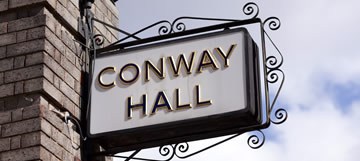

Event Details
Asad Abbas will be speaking on political Islam at the AGM of the Freethought History Research Group at Conway Hall at 3pm on 5 November 2011.
Event Details
Asad Abbas will be speaking on political Islam at the AGM of the Freethought History Research Group at Conway Hall at 3pm on 5 November 2011.
Time
(Saturday) 3:00 pm - 5:00 pm
Location
See post
address
december 2011





Event Details
On Thursday 8th of December, UCLU Atheist, Secular and Humanist Society will be hosting a debate on a very important topic. The proponents of the motion will be arguing that Sharia Law negates human rights. The opposing speakers will attempt to argue otherwise. Co-hosted by UCLU-ASHS and One Law for All, a campaign to protect human rights which believes that Sharia Law opposes the principles of equality enshrined in British law. Drinks will be provided. 8 December 2011, 18:00 - 21:00 Location: Bedford Way LG04, UCL 26 Bedford Way London WC1H 0LP For more information, go to Facebook page or email here.
Event Details
On Thursday 8th of December, UCLU Atheist, Secular and Humanist Society will be hosting a debate on a very important topic. The proponents of the motion will be arguing that Sharia Law negates human rights. The opposing speakers will attempt to argue otherwise. Co-hosted by UCLU-ASHS and One Law for All, a campaign to protect human rights which believes that Sharia Law opposes the principles of equality enshrined in British law. Drinks will be provided.
8 December 2011, 18:00 – 21:00
Location:
Bedford Way LG04, UCL
26 Bedford Way
London WC1H 0LP
For more information, go to Facebook page or email here.
more
Time
(Thursday) 6:00 pm - 9:00 pm
Location
See post
address
january 2010
2010thu28jan7:00 pmthu9:00 pmFundraising Dinner7:00 pm - 9:00 pm address
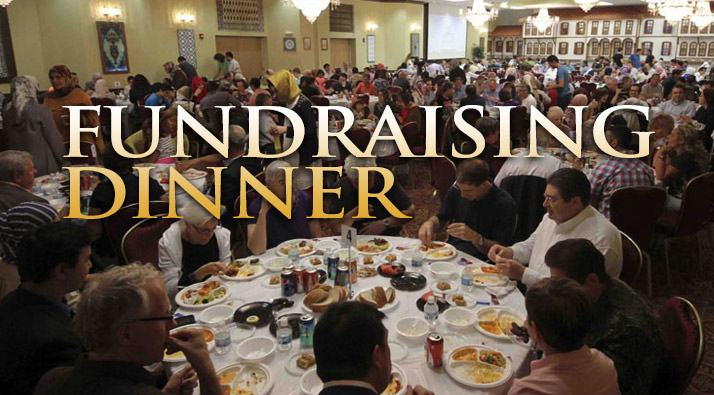

Event Details
Venue: Central London gastropub
Fundraising Dinner to raise money for the Council of Ex-Muslims of Britain and One Law for All
Keynote Speaker: AC Grayling
Comedian Nick Doody, Singer/Songwriter David Fisher and Magician Neil Edward will do acts
To buy tickets to the event, which includes a three-course meal at one of the finest gastropubs in London, contact onelawforall@gmail.com or exmuslimcouncil@gmail.com. Tickets are £45 per person. If you can't come to the event, please donate the equivalent so that volunteers of the campaign can attend the dinner.
Event Details
Venue: Central London gastropub
Fundraising Dinner to raise money for the Council of Ex-Muslims of Britain and One Law for All
Keynote Speaker: AC Grayling
Comedian Nick Doody, Singer/Songwriter David Fisher and Magician Neil Edward will do acts
To buy tickets to the event, which includes a three-course meal at one of the finest gastropubs in London, contact onelawforall@gmail.com or exmuslimcouncil@gmail.com. Tickets are £45 per person. If you can’t come to the event, please donate the equivalent so that volunteers of the campaign can attend the dinner.
more
Time
(Thursday) 7:00 pm - 9:00 pm
Location
See post
address
2010tue26jan7:00 pmtue9:00 pmUniversity College Dublin Law Society7:00 pm - 9:00 pm address
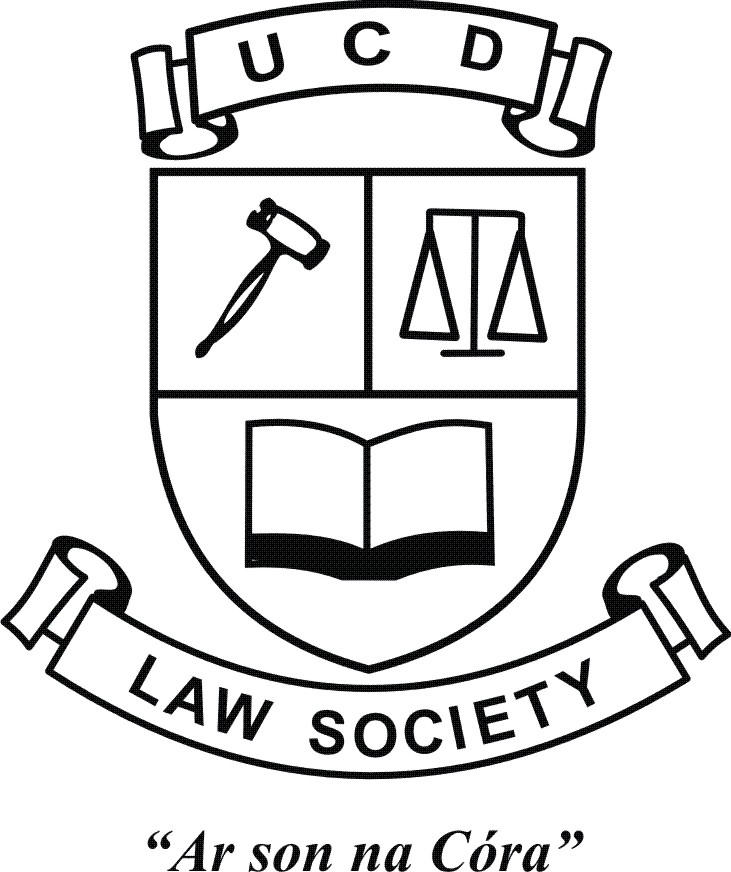

Event Details
Venue: University College Dublin Law Society
Maryam Namazie will debate on the conflict between many of the world's most followed religious doctrines, the place of women, and equality in society.
Event Details
Venue: University College Dublin Law Society
Maryam Namazie will debate on the conflict between many of the world’s most followed religious doctrines, the place of women, and equality in society.
Time
(Tuesday) 7:00 pm - 9:00 pm
Location
See post
address
2010mon25jan7:00 pmmon9:00 pmSharia versus Human Rights, January 25 20107:00 pm - 9:00 pm address






Event Details
Time: Evening
Venue: SW London Humanist Group in Richmond
Maryam Namazie will speak on 'Sharia versus Human Rights'.
Event Details
Time: Evening
Venue: SW London Humanist Group in Richmond
Maryam Namazie will speak on ‘Sharia versus Human Rights’.
Time
(Monday) 7:00 pm - 9:00 pm
Location
See post
address
february 2010
2010thu25feb7:00 pmthu9:00 pmLincoln College Oxford7:00 pm - 9:00 pm address


Event Details
Venue: Lincoln College, Oxford
Maryam will be speaking on topic of Ethics and Freedom and how Sharia law violates it
For more information, visit Oxford Think Week site
Event Details
Venue: Lincoln College, Oxford
Maryam will be speaking on topic of Ethics and Freedom and how Sharia law violates it
For more information, visit Oxford Think Week site
Time
(Thursday) 7:00 pm - 9:00 pm
Location
See post
address
march 2010
2010mon08mar7:00 pmmon9:00 pmConway Hall, Seminar on sharia law7:00 pm - 9:00 pm address
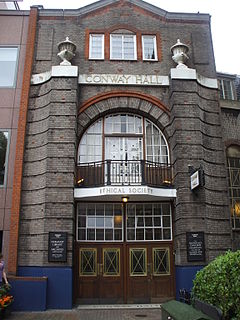



Event Details
Venue: Conway Hall
A seminar with legal experts, legislators, campaigners and activists on the legal and legislative avenues to restrict Sharia law in Britain.
Tickets: £10; £3 unwaged/Students.
Event Details
Venue: Conway Hall
A seminar with legal experts, legislators, campaigners and activists on the legal and legislative avenues to restrict Sharia law in Britain.
Tickets: £10; £3 unwaged/Students.
Time
(Monday) 7:00 pm - 9:00 pm
Location
See post
address
may 2010
2010sun30may7:00 pmsun9:00 pmSouthampton, One Law For All Meeting7:00 pm - 9:00 pm address
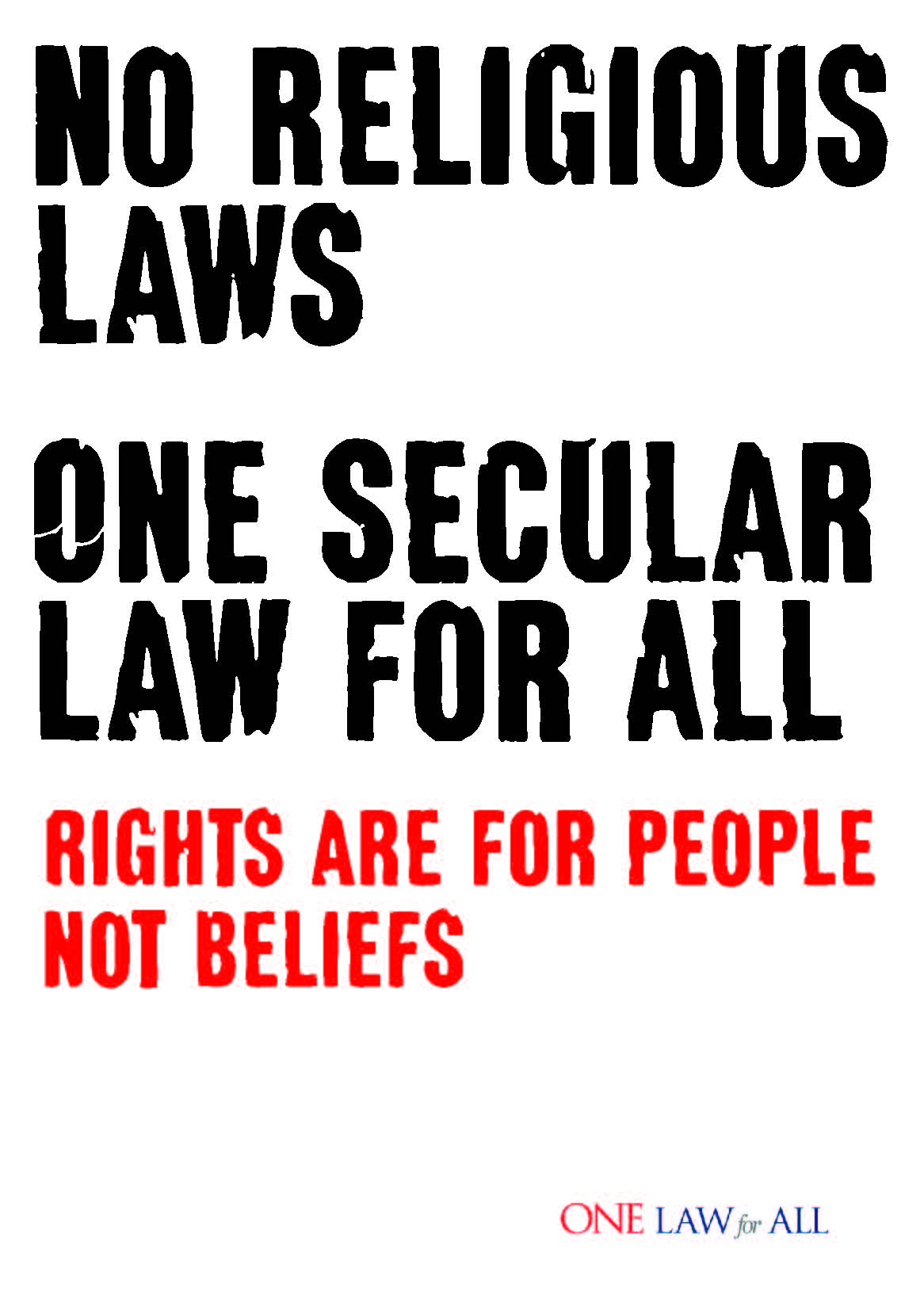


Event Details
Venue: Sembal House, SO15 2FH, Southampton
Maryam Namazie will speak about the One Law for All campaign at a meeting organised by the South Hampshire Humanist Group.
Event Details
Venue: Sembal House, SO15 2FH, Southampton
Maryam Namazie will speak about the One Law for All campaign at a meeting organised by the South Hampshire Humanist Group.
Time
(Sunday) 7:00 pm - 9:00 pm
Location
See post
address
june 2010
2010sun20jun2:00 pmsun4:00 pmOne Law For All Rally/Iran Solidarity March2:00 pm - 4:00 pm address



Event Details
Join us for a Rally organised by One Law for All against Sharia and religious laws and for secularism and universal rights and a march organised by Iran Solidarity to show solidarity with people in Iran who are at the forefront of battling Sharia law and political Islam.
Event Details
Date: 20 June 2010
Where: Richmond Terrace junction with Whitehall opposite Downing Street (SW1A 2).
When: 14:00-16:00 hours
Join us for a Rally organised by One Law for All against Sharia and religious laws and for secularism and universal rights
Then join us for a March organised by Iran Solidarity to show solidarity with people in Iran who are at the forefront of battling Sharia law and political Islam
Where: From Downing Street to the embassy of the Islamic regime of Iran (16 Prince’s Gate, London SW7 1PT; closest underground: Knightsbridge).
When: 16:00-17:00 hours
The march will end at 17:30 hours.
One Law for All and Iran Solidarity call on people everywhere to join the 20 June protest in London or to organise rallies or acts of solidarity in various cities across the globe to mark the day when 27-year-old Neda Agha-Soltan was shot dead by the Islamic regime of Iran’s security forces at a protest in Tehran. Her demand for freedom in the face of all-out repression has made her a symbol of people everywhere.
more
Time
(Sunday) 2:00 pm - 4:00 pm
Location
See post
address
2010sat05junAll DayBirmingham, Atheism in the 21st Century(All Day: saturday) address
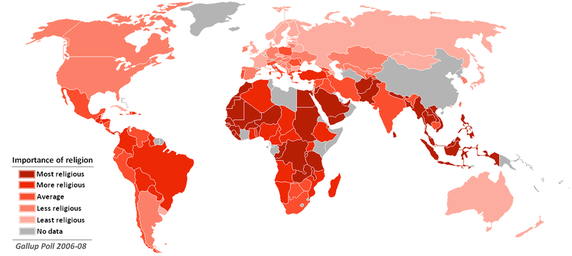

Event Details
Venue: Birmingham Crowne Plaza
Maryam will be speaking at a conference entitled ‘Atheism in the 21 century.’ For more information, click here.
Event Details
Venue: Birmingham Crowne Plaza
Maryam will be speaking at a conference entitled ‘Atheism in the 21 century.’ For more information, click here.
Time
All Day (Saturday)
Location
See post
address
july 2010
2010tue27julAll DayLeicester University, Sea of Faith conference(All Day: tuesday) address


Event Details
Venue: Leicester University Conference Centre Maryam will be speaking at 'Sea of Faith' conference on how religion and social justice are antithetical. For more information, click here.
Event Details
Venue: Leicester University Conference Centre
Maryam will be speaking at ‘Sea of Faith’ conference on how religion and social justice are antithetical. For more information, click here.
Time
All Day (Tuesday)
Location
See post
address
september 2010
2010sat18sep12:00 pmsat1:00 pmLondon, Protest the Pope12:00 pm - 1:00 pm address
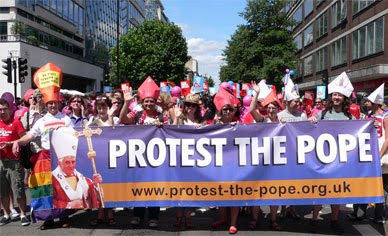

Event Details
Place: London
Maryam Namazie will be speaking at Protest the Pope
Event Details
Place: London
Maryam Namazie will be speaking at Protest the Pope
Time
(Saturday) 12:00 pm - 1:00 pm
Location
See post
address
october 2010
november 2010
2010sat13nov7:00 pmsat9:00 pmDorset Humanists Meeting7:00 pm - 9:00 pm address
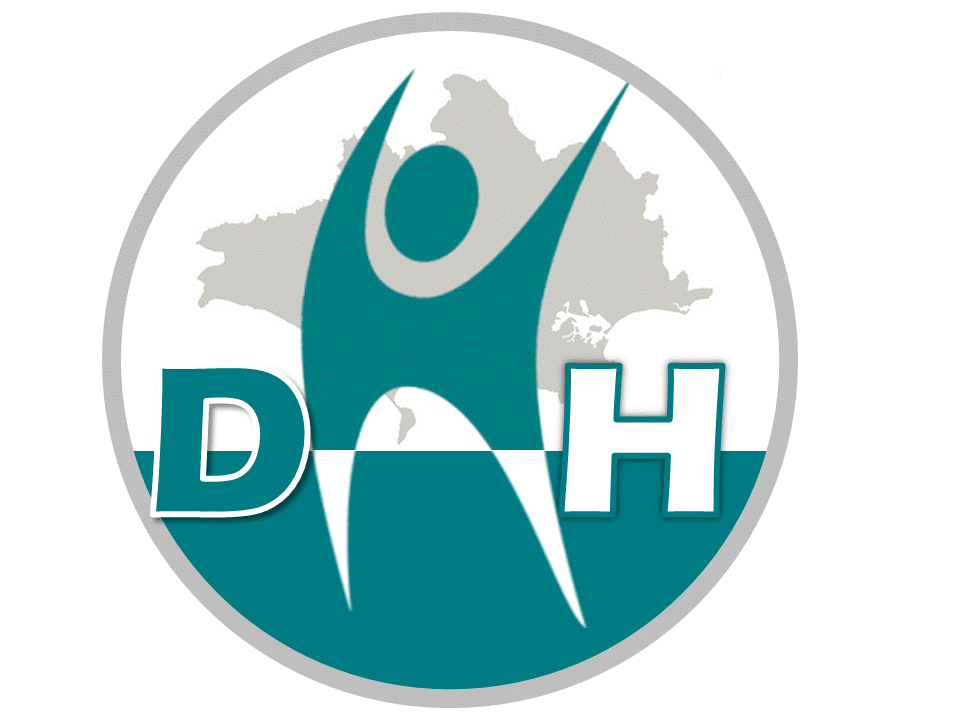

Event Details
Venue: Moordown Community Centre, Bournemouth BH9 1TW
Maryam Namazie will be speaking on Sharia Law and Women’s Rights to a meeting organised by the Dorset Humanists.
Event Details
Venue: Moordown Community Centre, Bournemouth BH9 1TW
Maryam Namazie will be speaking on Sharia Law and Women’s Rights to a meeting organised by the Dorset Humanists.
Time
(Saturday) 7:00 pm - 9:00 pm
Location
See post
address
2010mon08nov7:00 pmmon9:00 pmNorth Yorkshire Humanist Group Meeting7:00 pm - 9:00 pm address
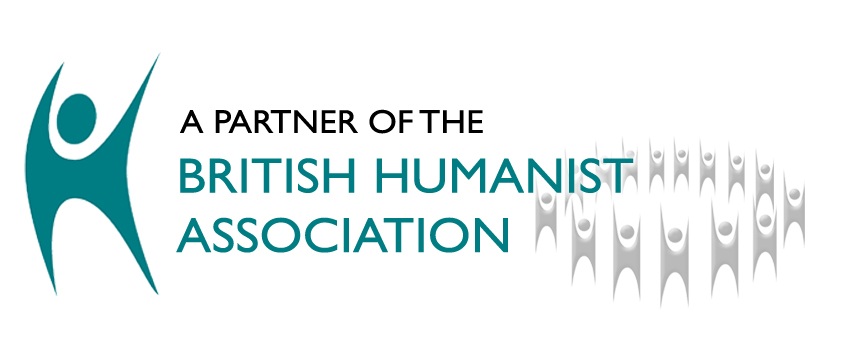

Event Details
Venue: Denham Room, Priory Street Centre, 15 Priory Street, York YO1 6ET
Maryam Namazie will be speaking at a meeting organised by the North Yorkshire Humanist Group
Event Details
Venue: Denham Room, Priory Street Centre, 15 Priory Street, York YO1 6ET
Maryam Namazie will be speaking at a meeting organised by the North Yorkshire Humanist Group
Time
(Monday) 7:00 pm - 9:00 pm
Location
See post
address
2010sun07novAll DayNewcastle, Free Thinking Debate(All Day: sunday) address
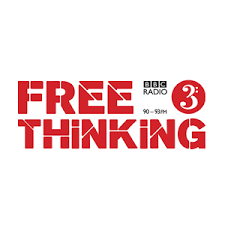

Event Details
Venue: The Sage Gateshead, Newcastle
Maryam Namazie will be joining the Free Thinking Debate: Has God Gone Global at the BBC Radio 3 Freethinking Festival
For more information: http://www.bbc.co.uk/radio3/freethinking/
Event Details
Venue: The Sage Gateshead, Newcastle
Maryam Namazie will be joining the Free Thinking Debate: Has God Gone Global at the BBC Radio 3 Freethinking Festival
For more information: http://www.bbc.co.uk/radio3/freethinking/
Time
All Day (Sunday)
Location
See post
address
december 2010




Event Details
To mark International Human Rights Day, we are co-sponsoring an all day conference on Apostasy, Sharia Law and Human Rights at Conway Hall, 25 Red Lion Square, London.
The conference will highlight urgent cases including Pakistani Asia Bibi who has received a death sentence for blasphemy, Palestinian Waleed Al-Husseini who has been arrested for criticising Islam and campaigners in Iran charged with ‘enmity against God’ and demand their unconditional and immediate release. Conference registration begins at 10.00am for 11.00am start and ends at 19.00 hours, after which there will be a social gathering at a local pub.
Event Details
Date: 11 December 2010
Time: 10am-19hours
Venue: Conway Hall, 25 Red Lion Square, London
Apostasy, Sharia Law and Human Rights
To mark International Human Rights Day, we are co-sponsoring an all day conference on Apostasy, Sharia Law and Human Rights at Conway Hall, 25 Red Lion Square, London.
The conference will highlight urgent cases including Pakistani Asia Bibi who has received a death sentence for blasphemy, Palestinian Waleed Al-Husseini who has been arrested for criticising Islam and campaigners in Iran charged with ‘enmity against God’ and demand their unconditional and immediate release. Conference registration begins at 10.00am for 11.00am start and ends at 19.00 hours, after which there will be a social gathering at a local pub.
Panel discussions include ‘International Apostasy and Religion’, ‘Ex-Muslims in Britain and Europe’ and ‘Multiculturalism and Multifaithism versus Universal Human Rights’.
There will also be a play ‘Masculine Laws’ by Ghazi Rabihavi and a comedy act by Nick Doody.
Confirmed speakers are:
- John Adams (Emeritus Professor at the University of Hertfordshire)
- Mina Ahadi (Spokesperson of the International Committee against Stoning and Council of Ex-Muslims of Germany)
- Roy Brown (International Representative of International Humanist and Ethical Union)
- Goranka Gudelj (Outreach Coordinator of One Law for All)
- Rumy Hassan (Senior Lecturer at the Science Policy Research Unit of the University of Sussex and Author of Multiculturalism: Some Inconvenient Truths)
- Marieme Helie Lucas (Algerian Sociologist and Founder of Women Living Under Muslims Laws and Secularism is a Women’s Issue)
- Maryam Namazie (Spokesperson of One Law for All, Iran Solidarity and the Council of Ex-Muslims of Britain)
- Hassan Radwan (Teacher at an Islamia school for 15 years and presently Management Committee Member of the Council of Ex-Muslims of Britain)
- Gita Sahgal (Women’s Rights Campaigner; former head of Amnesty International’s Gender Unit suspended for questioning AI’s relations with an Islamist organisation)
- Hamed Abdol Samad (German-Egyptian Political Scientist and Author of Farwell to Heaven and The Collapse of the Islamic World)
- Terry Sanderson (President of the National Secular Society)
- Muriel Seltman (Campaigner of One Law for All)
- Alom Shaha (Science Teacher, Writer and Film Maker)
- Joan Smith (Writer, Columnist and Women’s Rights Campaigner)
- Bahram Soroush (Human Rights Campaigner)
- Peter Tatchell (Human Rights Campaigner)
- Anne Marie Waters (Spokesperson of One Law for All).
To book a place at the conference, please complete the booking form found here.
Tickets are £10 for individuals; £25 for organisations and statutory bodies. the conference is free for CEMB members and asylum seekers. Donations are welcome.
The conference is sponsored by Council of Ex-Muslims of Britain, International Humanist and Ethical Union, Iran Solidarity, National Secular Society, One Law for All and South Place Ethical Society.
The event will be dedicated to the Iran stoning case of Sakineh Mohammadi Ashtiani.
more
Time
(Saturday) 10:00 am - 7:00 pm
Location
See post
address
2010sat04dec7:00 pmsat9:00 pmThe Role of Religion in the Law7:00 pm - 9:00 pm address
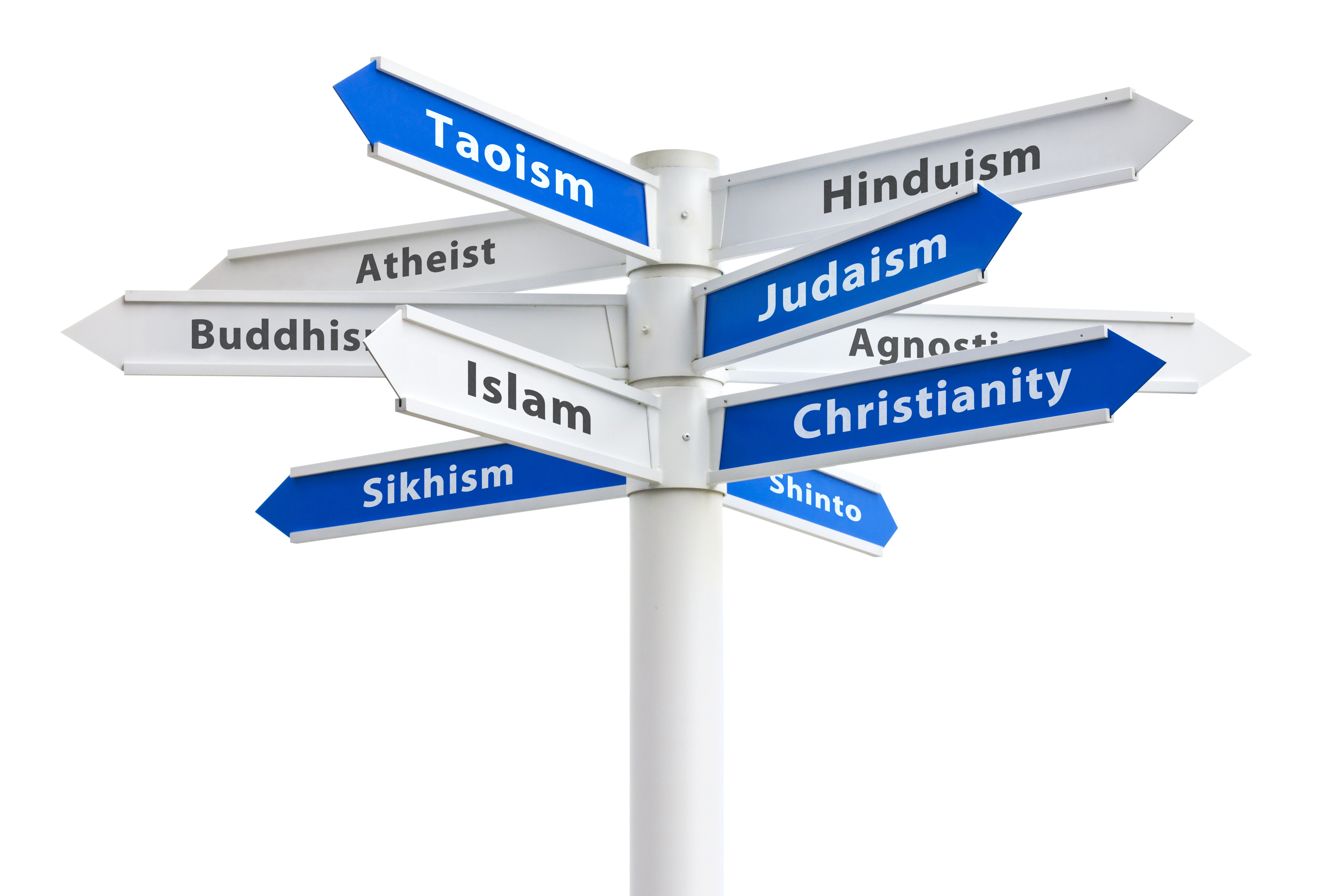

Event Details
Venue: Lord Justice Laws Treasurer of the Inner Temple Maryam Namazie will be speaking at their December student conference on The Role of Religion in the Law.
Event Details
Venue: Lord Justice Laws Treasurer of the Inner Temple
Maryam Namazie will be speaking at their December student conference on The Role of Religion in the Law.
Time
(Saturday) 7:00 pm - 9:00 pm
Location
See post
address
january 2009
march 2009
Event Details
Symbolic demonstration in support of one law for all in Britain and against religious based tribunals followed by a march to Red Lion Square from 4:30-5:30pm
Event Details
Symbolic demonstration in support of one law for all in Britain and against religious based tribunals followed by a march to Red Lion Square from 4:30-5:30pm
Time
(Saturday) 4:30 pm - 5:30 pm
Location
See post
address
Event Details
Venue: Conway Hall, 25 Red Lion Square, London WC1R 4RL
Speakers include:
- Sargul Ahmad (International Campaign against Civil Law in Kurdistan Iraq head)
- Yasmin Alibhai-Brown (Journalist and British Muslims for Secular Democracy Chair)
- Naser Khader (Democratic Muslims Founder), Gina Khan (One Law for All Spokesperson)
- Kenan Malik (Writer and Broadcaster)
- Yasaman Molazadeh (One Law for All Legal Coordinator)
- Maryam Namazie (Equal Rights Now – Organisation against Women's Discrimination in Iran and One Law for All Spokesperson)
- Pragna Patel (Southall Black Sisters and Women Against Fundamentalism founding member)
- Fariborz Pooya (Iranian Secular Society and Council of Ex-Muslims of Britain Chair)
- Carla Revere (Lawyers' Secular Society Chair)
Event Details
Venue: Conway Hall, 25 Red Lion Square, London WC1R 4RL
Speakers include:
- Sargul Ahmad (International Campaign against Civil Law in Kurdistan Iraq head)
- Yasmin Alibhai-Brown (Journalist and British Muslims for Secular Democracy Chair)
- Naser Khader (Democratic Muslims Founder), Gina Khan (One Law for All Spokesperson)
- Kenan Malik (Writer and Broadcaster)
- Yasaman Molazadeh (One Law for All Legal Coordinator)
- Maryam Namazie (Equal Rights Now – Organisation against Women’s Discrimination in Iran and One Law for All Spokesperson)
- Pragna Patel (Southall Black Sisters and Women Against Fundamentalism founding member)
- Fariborz Pooya (Iranian Secular Society and Council of Ex-Muslims of Britain Chair)
- Carla Revere (Lawyers’ Secular Society Chair)
more
Time
(Saturday) 2:00 pm - 6:00 pm
Location
See post
address
april 2009
2009fri17apr7:00 pmfri9:00 pmIslam, Human Rights and Homophobia7:00 pm - 9:00 pm address
Event Details
Venue: Conway Hall, London, UK
A talk by Maryam Namazie sponsored by the Gay And Lesbian Humanist Association.
For more information: www.galha.org
Event Details
Venue: Conway Hall, London, UK
A talk by Maryam Namazie sponsored by the Gay And Lesbian Humanist Association.
For more information: www.galha.org
Time
(Friday) 7:00 pm - 9:00 pm
Location
See post
address
may 2009
2009thu21may7:00 pmthu9:00 pmOxford Humanists7:00 pm - 9:00 pm address
Event Details
Venue: UK, Plowman Room, Oxford Town Hall
Organisation Hosting: Oxford Humanists
Maryam Namazie will speak about the One Law for All campaign
For more information, contact 01865 891876
Event Details
Venue: UK, Plowman Room, Oxford Town Hall
Organisation Hosting: Oxford Humanists
Maryam Namazie will speak about the One Law for All campaign
For more information, contact 01865 891876
Time
(Thursday) 7:00 pm - 9:00 pm
Location
See post
address
june 2009
2009mon29jun7:00 pmmon9:00 pmEssex Humanists7:00 pm - 9:00 pm address
Event Details
Maryam Namazie will speak about the One Law for All campaign
Organisation Hosting: Essex Humanists
Contact: Marie Oatham, eh@oatham.waitrose.com
Event Details
Maryam Namazie will speak about the One Law for All campaign
Organisation Hosting: Essex Humanists
Contact: Marie Oatham, eh@oatham.waitrose.com
Time
(Monday) 7:00 pm - 9:00 pm
Location
See post
address
july 2009
2009wed15jul7:00 pmwed9:00 pmLancashire Secular Humanists, July 15 20097:00 pm - 9:00 pm address
Event Details
Venue: The Village Centre, 59 High Street,The Square,Great Eccleston. (Nr Preston). PR3 0YB
Organisation Hosting: Lancashire Secular Humanists
Maryam Namazie will speak about the One Law for All campaign
Contact: Ian Abbott, ian@ianzere.demon.co.uk
Event Details
Venue: The Village Centre, 59 High Street,The Square,Great Eccleston. (Nr Preston). PR3 0YB
Organisation Hosting: Lancashire Secular Humanists
Maryam Namazie will speak about the One Law for All campaign
Contact: Ian Abbott, ian@ianzere.demon.co.uk
Time
(Wednesday) 7:00 pm - 9:00 pm
Location
See post
address
2009mon13jul12:00 pmmon1:00 pmHouse of Lords, Launch of Iran Solidarity12:00 pm - 1:00 pm address
Event Details
Venue: House of Lords, London Launch of Iran Solidarity, which the CEMB is supporting For more information: contact iransolidaritynow@gmail.com
Event Details
Venue: House of Lords, London
Launch of Iran Solidarity, which the CEMB is supporting
For more information: contact iransolidaritynow@gmail.com
Time
(Monday) 12:00 pm - 1:00 pm
Location
See post
address
august 2009
Event Details
Venue: Stockholm, Sweden
Fariborz Pooya will speak about Islam, Sexuality, and Homophobia
Contact: Afsaneh Vahdat: mailto:afsanehvahdat@yahoo.se
Event Details
Venue: Stockholm, Sweden
Fariborz Pooya will speak about Islam, Sexuality, and Homophobia
Contact: Afsaneh Vahdat: mailto:afsanehvahdat@yahoo.se
Time
(Saturday) 7:00 pm - 9:00 pm
Location
See post
address
november 2009
2009fri27novAll DayA voice from voiceless women, November 27 2009(All Day: friday) address
Event Details
Venue: Malmo, Sweden
Maryam Namazie will be speaking at a conference entitled: A voice from voiceless women.
Event Details
Venue: Malmo, Sweden
Maryam Namazie will be speaking at a conference entitled: A voice from voiceless women.
Time
All Day (Friday)
Location
See post
address
Event Details
Show your opposition to sharia law and all religious-based tribunals in Britain, Iran, Iraq, Afghanistan, Pakistan, Somalia and elsewhere.
Demand and end to cultural relativism and racism.
Demand one secular law and universal rights.
Defend the right to asylum for those who have fled sharia.
Event Details
Date: Saturday 21 November 2009
Time: 1200-1400
Venue: North Carriage Drive, in-between Stanhope Place Gate and Albion Gate, Hyde Park, London (Closest underground: Marble Arch)
SHOW YOUR OPPOSITION TO SHARIA LAW AND ALL RELIGIOUS-BASED TRIBUNALS IN BRITAIN, IRAN, IRAQ, AFGHANISTAN, PAKISTAN, SOMALIA AND ELSEWHERE
DEMAND AN END TO CULTURAL RELATIVISM AND RACISM
DEMAND ONE SECULAR LAW AND UNIVERSAL RIGHTS
DEFEND THE RIGHT TO ASYLUM FOR THOSE WHO HAVE FLED SHARIA
Confirmed speakers and performers include:
- Nazanin Afshin-Jam
- Mina Ahadi,
- ‘AK47’
- Fari B
- Yasmin Alibhai-Brown
- Roy Brown
- Nick Doody
- AC Grayling
- Goranka Gudelj
- Rahila Gupta
- Johann Hari
- Marieme Helie-Lucas
- Mehboob Khan
- ‘Lilith’
- Houzan Mahmoud
- Maryam Namazie
- Taslima Nasrin
- David Pollock
- Fariborz Pooya
- Terry Sanderson
- Muriel Seltman
- Issam Shukri
- Selina aka ‘Jus1Jam’
- Sohaila Sharifi
- Bahram Soroush
- Hanne Stinson
- Peter Tatchell
For more information, contact: Tel: +44 (0) 7719166731 or onelawforall@gmail.com
more
Time
(Saturday) 12:00 pm - 2:00 pm
Location
See post
address
january 2008
Event Details
Maryam Namazie will be speaking at Cambridge University Atheist and Agnostic Society on the ex-Muslim movement and its challenge to political Islam on January 30, 2008 at 7:30pm.
[External Link]
Event Details
Maryam Namazie will be speaking at Cambridge University Atheist and Agnostic Society on the ex-Muslim movement and its challenge to political Islam on January 30, 2008 at 7:30pm.
Time
(Wednesday) 7:30 pm - 9:00 pm
Location
See post
address
february 2008
Event Details
The Iranian Secular Society calls upon groups and individuals to join the protest against this barbaric sentence of Parwiz Kambakhsh and demand his immediate and unconditional release, including by joining the London protest, organising protests in various cities, writing letters of protest and more.
Event Details


Venue: Afghanistan Embassy, 31 Princes Gate, London, SW7
Since October 2007, Parwiz Kambakhsh, a 23 year old Afghan journalist, has been in prison in Balkh province, Northern Afghanistan and sentenced to execution for blasphemy by a local Sharia court in Mazar-e-Sharif. His ‘crime’ was distributing articles downloaded from the internet that questioned the condition of women under Islam. The Afghan government has supported the Islamic court’s ruling.
On Thursday, January 31, 200 people demonstrated for his freedom in Kabul. International public opinion and pressure must join them to save his life.
The Iranian Secular Society calls upon groups and individuals to join the protest against this barbaric sentence and demand the immediate and unconditional release of Kambakhsh, including by joining the London protest, organising protests in various cities, writing letters of protest and more.
Fore more information, contact:
Fariborz Pooya
E-mail: fariborz_pooya@yahoo.co.uk
Telephone: 077 191 66731
Website: www.iransecularsociety.com
The demonstration is endorsed by: Council of Ex-Muslims of Britain, National Secular Society and the Worker-communist Party of Iran-UK committee
more
Time
All Day (Friday)
Location
See post
address
march 2008
Event Details
"We're told that religion today is radical. Islamic extremists, evangelical fundamentalists, Catholic militants - the threat that faith poses to secular society is an aggressive, assertive and vehement one. But historically, the faithful were slated by humanists for their conservatism - where religion went wrong was its opposition to change, not its advocacy of it. So are the religious now radical - or has secular society simply taken on the conservatism of its God-fearing forebears?" Fariborz Pooya will be debating with other panellists on this issue.
Event Details
“We’re told that religion today is radical. Islamic extremists, evangelical fundamentalists, Catholic militants – the threat that faith poses to secular society is an aggressive, assertive and vehement one. But historically, the faithful were slated by humanists for their conservatism – where religion went wrong was its opposition to change, not its advocacy of it. So are the religious now radical – or has secular society simply taken on the conservatism of its God-fearing forebears?” Fariborz Pooya will be debating with other panellists on this issue.
more
Time
(Thursday) 7:00 pm - 9:00 pm
Location
See post
address
april 2008
june 2008
Event Details
Maryam Namazie will be speaking at a plenary session on Political Islam and Freedom of Expression on June 6, 2008 at 1:30pm.
Event Details
Maryam Namazie will be speaking at a plenary session on Political Islam and Freedom of Expression on June 6, 2008 at 1:30pm.
Maryam Namazie’s Speech: Freedom of Expression and Political Islam
Freedom of expression matters. It is not a luxury, a western value and it’s certainly not up for sale (though obviously governments and the UN mistakenly think it to be so).
Sometimes – actually more often than not – it is all we have.
But like many other rights and freedoms, it becomes most significant and finds real meaning when it comes to criticising that which is taboo, forbidden, sacred.
Freedom of expression matters most, therefore, when it comes to criticising religion.
I think this criticism has always been an important vehicle for progress and the betterment of humanity’s lot in centuries past. This is also true today in the 21st century and particularly with regard to Islam.
Of course Islam is no different from other religions. You can find just as much misogyny, cruelty and inhumanity in the Bible or other religious books as you can in the Koran. And I don’t think Islam, Christianity, Judaism or what have you are fundamentally any different from Scientology or Moon’s Unification Church, which are deemed to be cults endangering social and personal development. After all, isn’t that what religion is?
But even so, today – as we speak – there is still a distinction to be made between religion in general and Islam in particular but for no other reason than that it is the ideology behind a movement that is, in many places, part and parcel of the state, the law, criminal so-called ‘justice’ or injustice system or sharia law and educational system.
I think this point is key for a principled criticism of Islam and more importantly a progressive and humane response to the outrage of our era.
This means, firstly, that we have a duty to criticise Islam; this goes beyond the mere right to and freedom of speech and expression.
I am always taken aback by complaints about how reports on Islam often concentrate on the subject of violence and rarely focus on the reality of Islam in everyday life. In fact, though, the reality of Islam in everyday life is far more violent than anything that can be fathomed. Entire generations slaughtered over decades – long before 9/11 – and buried in mass graves in Iran, Iraq, Afghanistan and elsewhere.
The human cost of Islam in power is enough of a reason – the only necessary reason – to make criticism a task and duty.
After all, it is impossible – let me repeat impossible – to challenge a political movement that has wreaked havoc primarily for the people of the Middle East and North Africa if you are not allowed to fully and unequivocally criticise its ideology and banner.
I know some say that the problem is not Islam but the fundamentalist interpretation of Islam. But in my opinion, you can’t have Islamic feminism, Islamic reformism, Islamic democracy, Islamic human rights, and moderate interpretations of Islam when it is in power.
Of course there are innumerable Muslims or those labelled as such who have humanist, secularist, moderate, egalitarian, atheist, communist and other progressive viewpoints but this is not one and the same with Islam in power being as such.
In my opinion, a ‘moderate’ or ‘reformed’ religion is one that has been pushed back and reigned in by an enlightenment. And not before.
But criticism of Islam alone is not enough if it does not also come with a criticism of the political Islamic movement and religion industry. The right wing’s criticism of Islam and its sudden championing of women’s rights in the Middle East – whilst legislating religious morality and misogyny here at home – self-servingly ignores the main issue at hand, which is religion and political power.
If we are going to win this battle again – as in centuries past – we have to push Islam and religion out of the public sphere. Full stop.
And for this, freedom of expression and freedom to criticise religion are key.
I don’t think we can compromise on this because too many lives are at stake. And in my opinion compromise includes the misguided liberal attempts at building interfaith coalitions or deeming all religions and beliefs as equally valid. It also includes the more reactionary sorts of appeasement such as that of the recently launched Tony Blair Faith Foundation, which aims to ‘to promote respect and understanding about the world’s major religions and show how faith is a powerful force for good in the modern world.’
Religion wouldn’t need one public relations campaign after another if it was so good, now would it? Even calling it ‘faith’ and avoiding the term religion won’t get around the fact that it is the genocidaire of our age.
Either way – misguided or purely out of economic and political interests – these endeavours only serve to increase, justify and consolidate the role of religion in society – and are part of the problem rather than any solution.
In my opinion, you have to choose.
You must either defend the human being or you must defend Islam and religion. You can’t defend both because they are incompatible with and antithetical to each other.
Of course this doesn’t mean that people don’t have a right to religion or atheism. Of course they do but as a private affair. Having the right to a religion or belief does not include the right not to be offended or the right to have your belief or religion respected, tolerated, and deemed equal and equally valid. Concepts such as rights, equality, and respect raised vis-à-vis individuals are nowadays more and more applicable to religion at the expense of people and their rights and freedoms. And that’s why a criticism of religion is deemed racism, defamatory, libellous – again concepts originally raised regarding people not religion and beliefs!
Islamists and their apologists have succeeded in blurring the distinction between individuals and beliefs. Their use of rights and anti-racist language – at least in the west – are devious ways of silencing criticism and opposition.
Of course the human being is sacred and worthy of the highest respect, rights and equality but not religions, beliefs, cultures.
Clearly, criticism of Islam and Mohammad are not racist or an attack on Muslims anymore than Christ in a nappy in ‘Jerry Springer the opera’ is an attack or racism against Christians.
Actually it is racist to see Islam and Muslims as one and the same and Islamists and Muslims as one and the same. It is racist to imply that this is the belief of all those deemed to be Muslim when in fact it is the belief system of a ruling class and its parasitical imams, organisations and states. It is racist to imply that people choose to live the way they are forced to. That they actually deserve no better and that their rights are culturally relative. Not that they do but even if everyone believed that women were subhuman and gays perverts, criticism of a belief is not one and the same as attacking the person who holds the belief. Female genital mutilation is a good example. You can criticise and condemn the belief in and practice of FGM, but this does not amount to an attack on women and girls who are mutilated or who support the practice.
This type of politics – knowingly or unwittingly – attempts to make criticism of Islam and religion more difficult. Defining certain beliefs as sacred is a tool for the suppression of society. Saying expression offends is an attempt to restrict it.
I still find it astonishing how religion in power hangs the likes of sweet 16 Atefeh Rajabi and stones Maryam Ayoubi to death – even specifying by law the size of the stone to be used – in Iran or sentences Parwiz Kambakhsh to death in Afghanistan for downloading materials critical of women and Islam from the internet and it is criticism of Islam that is offensive!
In the face of this onslaught, a defence of freedom of expression and a criticism of religion, Islam and political Islam is an historical duty and task but it has to be based within a politics that puts people first, that holds the human being – and nothing else – sacred, if it is to have real meaning and affect real change.
It has to be done in conjunction with a defence of secularism – as the strict separation of religion from the state – rather than mere neutrality. It has to be done alongside a defence of universal rights, citizenship rights, and a humanity without labels other than human.
And it has to be done alongside a criticism of US led militarism – particularly important to say as we are here in Washington, DC. This is not a clash between western and Islamic values. Progressive values were fought for and gained by the working class and progressive social movements and so belong to all of humanity. If we don’t look at it in this way we will make friends with false allies and also fail to make links and show real solidarity with a vast majority fighting on the frontlines against Islam in power and US led militarism in places like Iran.
Also, this is not a clash of civilisations but actually the clash of the uncivilised. Human civilisation exists despite political Islam and US-led militarism and is very much at odds with it. After all, political Islam was brought to centre stage during the Cold War as a green belt around the then Soviet Union and as a response to the rise of the left and working class movement in the Iranian revolution.
Western governments have never had a problem with Islam in power – their only problem was that it had moved out of its sphere of influence since 9/11. In fact, their ‘interventions’ in Iraq for example has only strengthened this movement. In the New World Order, in fact, US-led militarism needs and feeds off political Islam. They are two sides of one coin, with the same capacity for infinite violence and brutality, the same reliance on religion and the same bleak message for the people of the world.
Freedom of expression is one of the only means we have at our disposal to resist both camps of reaction and to protect humanity.
We have to defend it unequivocally and unconditionally.
more
Time
(Wednesday) 1:30 pm - 5:00 pm
Location
See post
address
july 2008
Event Details
We are asking members and supporters to join CEMB executive committee members for drinks to celebrate the one-year anniversary of the establishment of the Council of Ex-Muslims of Britain and to meet other like-minded people in central London on 5th July 2008 from 2pm onwards. The nearest tube stations to the event are Leicester Square & Charring Cross.
If you need directions, please call Zia 07776227112 or Maryam 07719166731
Event Details
We are asking members and supporters to join CEMB executive committee members for drinks to celebrate the one-year anniversary of the establishment of the Council of Ex-Muslims of Britain and to meet other like-minded people in central London on 5th July 2008 from 2pm onwards. The nearest tube stations to the event are Leicester Square & Charring Cross.
If you need directions, please call Zia 07776227112 or Maryam 07719166731
Time
(Saturday) 2:00 pm - 6:00 pm
Location
See post
address
september 2008
october 2008












Event Details


Event Details
Conway Hall London 25 Red Lion Square WC1R 4RL (Closest station: Holborn)
October 10, 10am-6pm (Registration begins at 9am)
Speakers:
- Mina Ahadi
- Mahin Alipour
- Roy Brown
- Andrew Copson
- Richard Dawkins
- Giles Enders
- AC Grayling
- Johann Hari
- Ehsan Jami
- Houzan Mahmoud
- Rony Miah
- Maryam Namazie
- Taslima Nasreen
- Fariborz Pooya
- Terry Sanderson
- Joan Smith
- Bahram Soroush
- Hanne Stinson
- Hamid Taqvaee
- Ibn Warraq
- Keith Porteous Wood
- Zia Zaffar
Event includes a comedy act by Nick Doody, Fitna Remade by Reza Moradi and Breaking the Taboo by Patty Debonitas.
£40 statutory organisations/businesses; £20 voluntary sector; £10 individuals. Donations are welcome.
View report, video footage and photographs of the conference: [internal link]
more
Time
(Friday) 10:00 am - 6:00 pm
Location
See post
address
november 2008
2008sat22nov2:00 pmsat4:00 pmStockholm, On Political Islam2:00 pm - 4:00 pm address
Event Details
Lars Vilks, Mina Ahadi, Maryam Namazie, Rebecca Hybbinette, Jens Ganman, will be speaking on a panel moderated by Afsaneh Vadhat, and Ellis Wohlner in Sweden.
Event Details
Lars Vilks, Mina Ahadi, Maryam Namazie, Rebecca Hybbinette, Jens Ganman, will be speaking on a panel moderated by Afsaneh Vadhat, and Ellis Wohlner in Sweden.
Time
(Saturday) 2:00 pm - 4:00 pm
Location
See post
address
december 2008
june 2007


Event Details
The launch of the Council of Ex-Muslims of Britain will be held on Thursday 21 June from 11am-12pm at the House of Commons, Portcullis House, Wilson Room, London SW1A 2LW. The event is supported by the National Secular Society and the British Humanist Association. Speakers will include: Mina Ahadi, Mahin Alipour and Maryam Namazie.
Event Details
The launch of the Council of Ex-Muslims of Britain will be held on Thursday 21 June from 11am-12pm at the House of Commons, Portcullis House, Wilson Room, London SW1A 2LW. The event is supported by the National Secular Society and the British Humanist Association. Speakers will include: Mina Ahadi, Mahin Alipour and Maryam Namazie.
Images
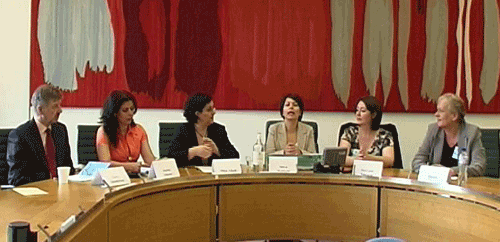

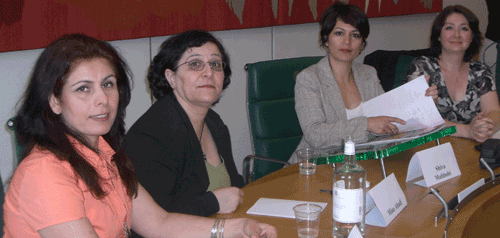

Videos:
Maryam Namazie’s speech
Mina Ahadi’s speech
Supporters speeches
Question and answer (part 1)
Question and answer (part 2)
Question and answer (part 3)
more
Time
(Thursday) 11:00 am - 12:00 pm
Location
See post
address
august 2007
2007fri24aug2:00 pmfri4:00 pmDon't Mention Islam2:00 pm - 4:00 pm address
Event Details
Maryam Namazie will be speaking on a panel on how the media is soft on Islam at the Edinburgh Film Festival.
Other panellists:
- Andrew Anthony, Author and Journalist
- Arzu Merali, Islamic Human Rights Commission
- Inayat Bunglawala, Vice Chair, Muslim Council of Britain
- Kevin Sutcliffe, Deputy Head of News & Current Affairs, Channel 4
- Maryam Namazie, Spokesperson, Council of Ex-Muslims in Britain
- Peter Horrocks, Head of Television News, BBC News
Event Details
Maryam Namazie will be speaking on a panel on how the media is soft on Islam at the Edinburgh Film Festival.
Other panellists:
- Andrew Anthony, Author and Journalist
- Arzu Merali, Islamic Human Rights Commission
- Inayat Bunglawala, Vice Chair, Muslim Council of Britain
- Kevin Sutcliffe, Deputy Head of News & Current Affairs, Channel 4
- Maryam Namazie, Spokesperson, Council of Ex-Muslims in Britain
- Peter Horrocks, Head of Television News, BBC News
Time
(Friday) 2:00 pm - 4:00 pm
Location
See post
address
september 2007
Event Details
On September 12, Maryam Namazie will be giving a statement with other ex-Muslims to the European Parliament Working Group on Separation of Religion and Politics in Brussels on developments regarding Islam and secularism.
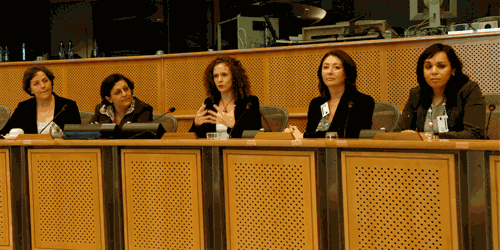

Event Details
On September 12, Maryam Namazie will be giving a statement with other ex-Muslims to the European Parliament Working Group on Separation of Religion and Politics in Brussels on developments regarding Islam and secularism.


Time
(Wednesday) 12:00 pm - 1:00 pm
Location
See post
address
2007tue11sep2:00 pmtue4:00 pmLaunch of the Dutch Ex-Muslim Committee2:00 pm - 4:00 pm address
Event Details
Maryam Namazie will be in the Hague, Holland on September 11 for the formal launch of the Dutch Ex-Muslim Committee led by Ehsan Jami.




Event Details
Maryam Namazie will be in the Hague, Holland on September 11 for the formal launch of the Dutch Ex-Muslim Committee led by Ehsan Jami.




Time
(Tuesday) 2:00 pm - 4:00 pm
Location
See post
address
october 2007
2007mon29oct2:00 pmmon3:00 pmSpeech at British parliament2:00 pm - 3:00 pm address
Event Details
Maryam Namazie was a guest speaker at a meeting on October 29 with Humanist MPs held at parliament. The meeting was organised by the British Humanist Association. Maryam spoke about the importance of the Council of Ex-Muslims and the need for a concerted effort against political Islam through the defence of citizenship rights, secularism and humanity without labels. She noted that the Councils across Europe are representative of a movement in Iran for similar demands, which is bringing political Islam there to its knees. She stressed that a US attack will only further strengthen the Islamic regime of Iran and push back the progressive social movement in that country. October 29, 2007
Event Details
Maryam Namazie was a guest speaker at a meeting on October 29 with Humanist MPs held at parliament. The meeting was organised by the British Humanist Association. Maryam spoke about the importance of the Council of Ex-Muslims and the need for a concerted effort against political Islam through the defence of citizenship rights, secularism and humanity without labels. She noted that the Councils across Europe are representative of a movement in Iran for similar demands, which is bringing political Islam there to its knees. She stressed that a US attack will only further strengthen the Islamic regime of Iran and push back the progressive social movement in that country. October 29, 2007
more
Time
(Monday) 2:00 pm - 3:00 pm
Location
See post
address
2007sat27octAll DayScotland, On Sex and Religion(All Day: saturday) address
Event Details
Maryam Namazie will be one of the main speakers at the humanist annual conference in Scotland on October 27, 2007 at the Fishers Hotel in Pitlochry. The theme will be Sex Matters.
For more information, click here.
Event Details
Maryam Namazie will be one of the main speakers at the humanist annual conference in Scotland on October 27, 2007 at the Fishers Hotel in Pitlochry. The theme will be Sex Matters.
For more information, click here.
Time
All Day (Saturday)
Location
See post
address
november 2007
Event Details
Maryam Namazie will be speaking on a panel entitled: Islam, Religious Diversity and Universal Rights in Multi-Ethnic Democracies
Event Details
On Tuesday November 20, 13.00-14.30 Maryam Namazie will be speaking on a panel entitled: ISLAM, REIGIOUS DIVERSITY AND UNIVERSAL RIGHTS IN MULTI ETHNIC DEMOCRACIES in Stockholm, Sweden.
In 2005, the British parliament was very close to passing a law against “religious hatred”. In the spring of 2006 the United Nations Human Rights Council passed a resolution condemning “defamation of religion” and the member states where requested to ban materials that could lead to hostility towards religious groups. Meanwhile, secular grass root organisations like The Council of Ex-Muslims have been founded in several European countries. Must modern democracies limit the diversity of opinions in order to maintain religious diversity? Or is it the other way around; that religion in the public sphere, being the instrument of power that it is, must be allowed to be examined without limitations?
Participants:
- Sadiq J.Al-Azm, emeritus professor of modern European philosophy at the University of Damascus
- Maryam Namazie, Iranian-born women’s rights activist
- Anne-Sofie Roald, associate professor at the college of higher learning in Malmö
- Suad Mohamed, Sweden’s first female imam.
Moderator: Arne Ruth.
more
Time
(Tuesday) 1:00 pm - 2:30 pm
Location
See post
address

